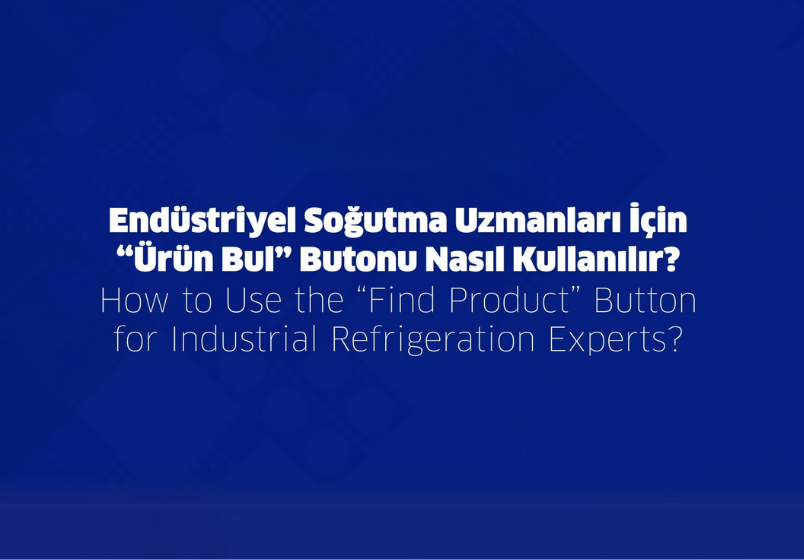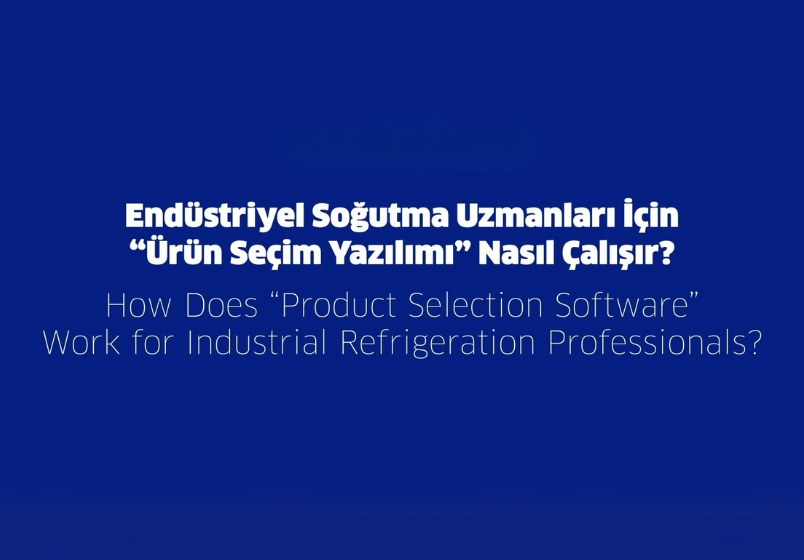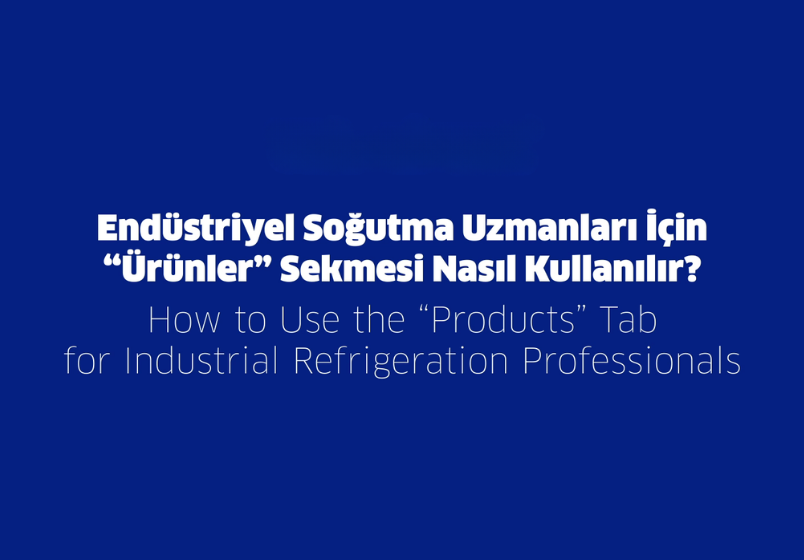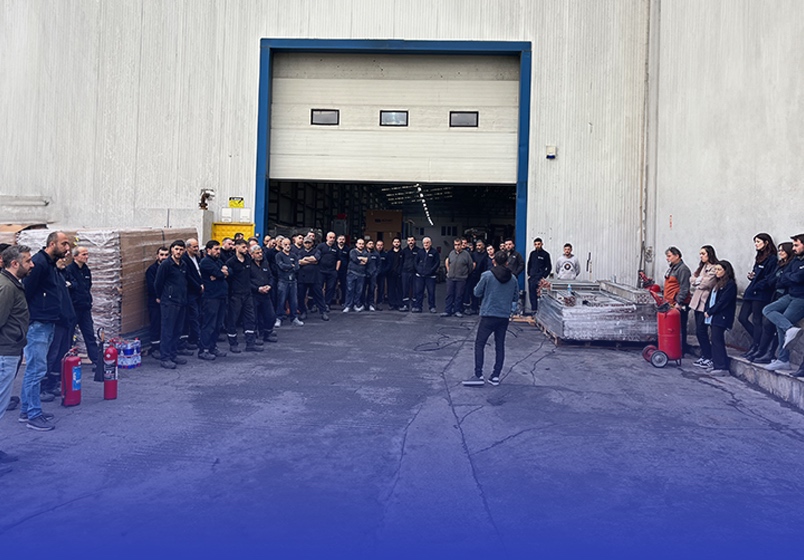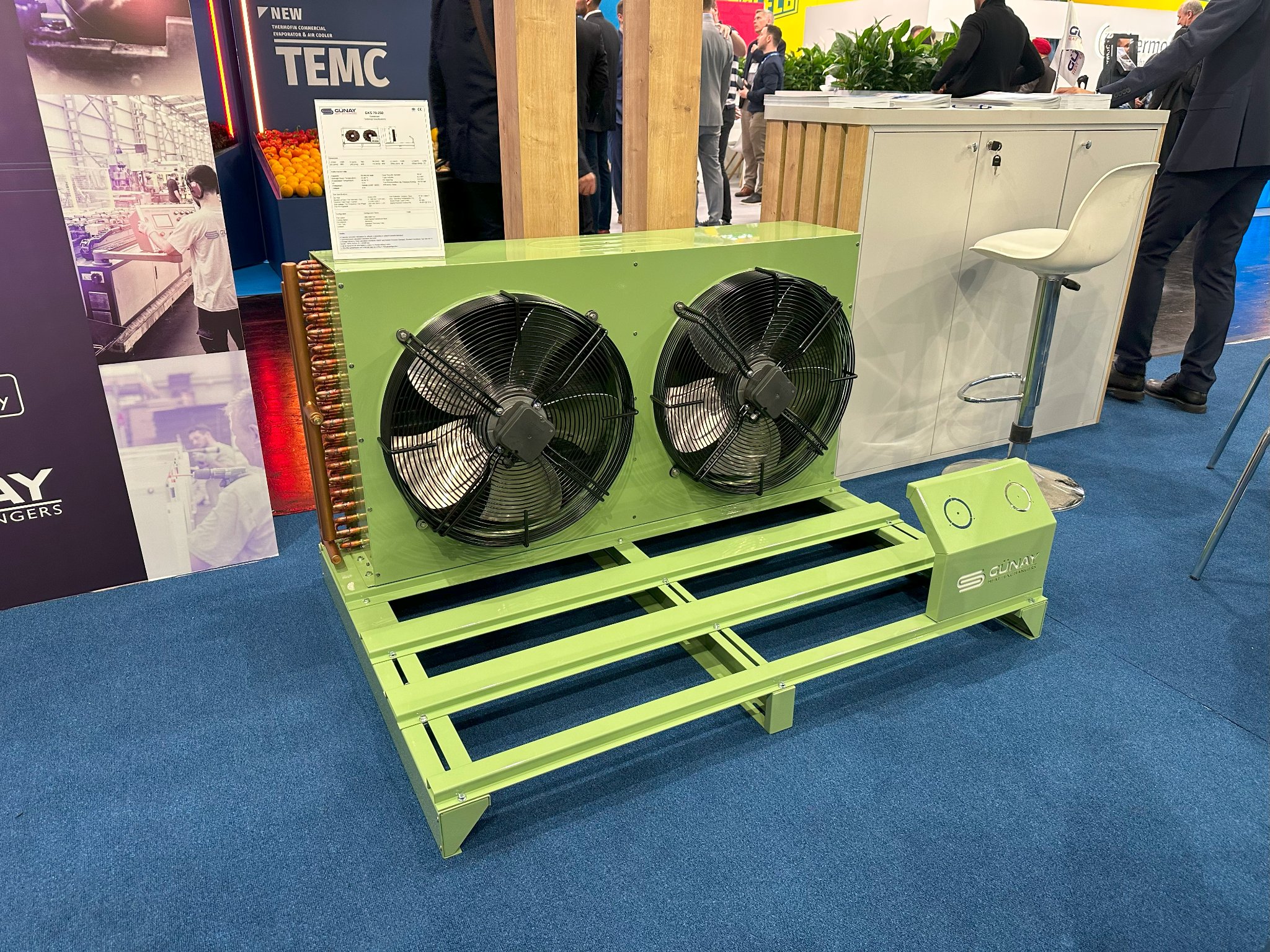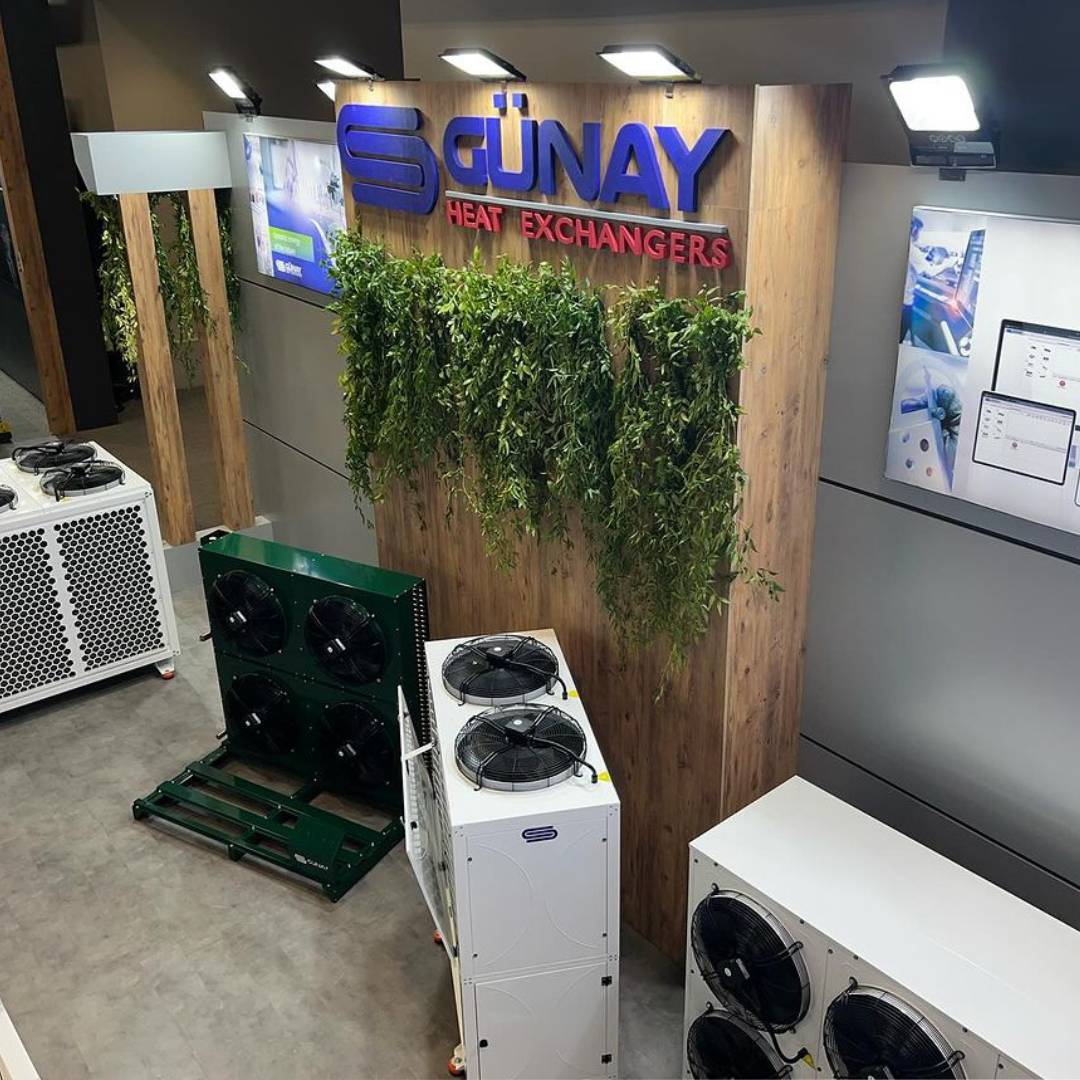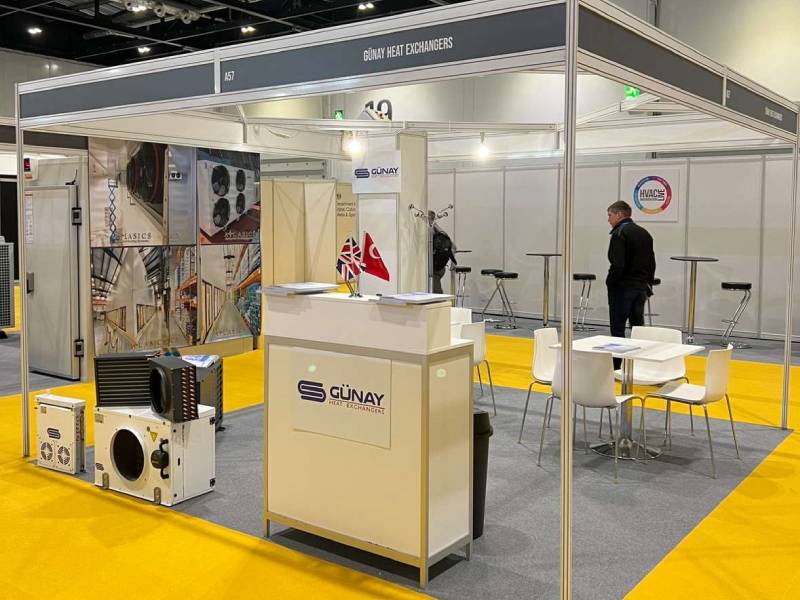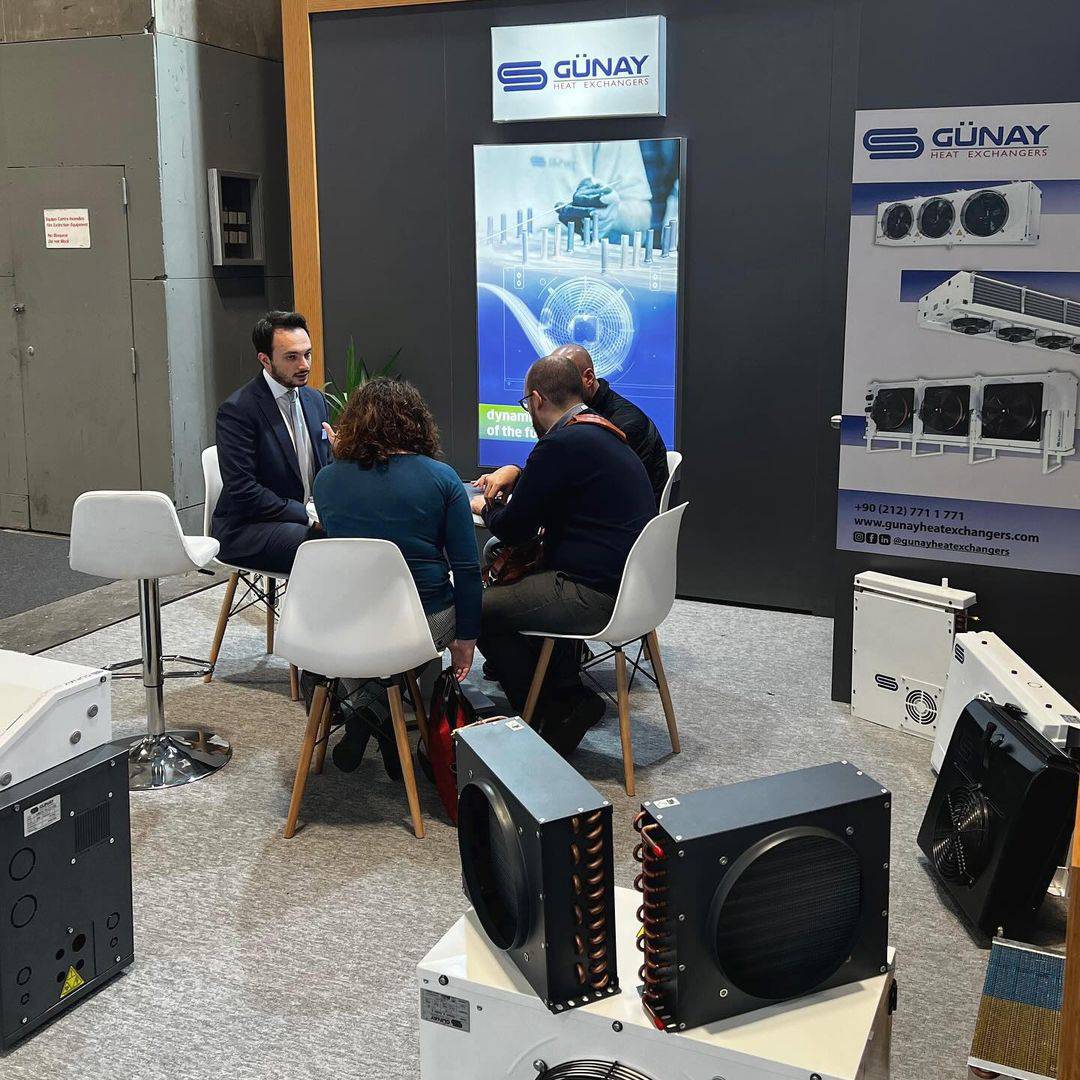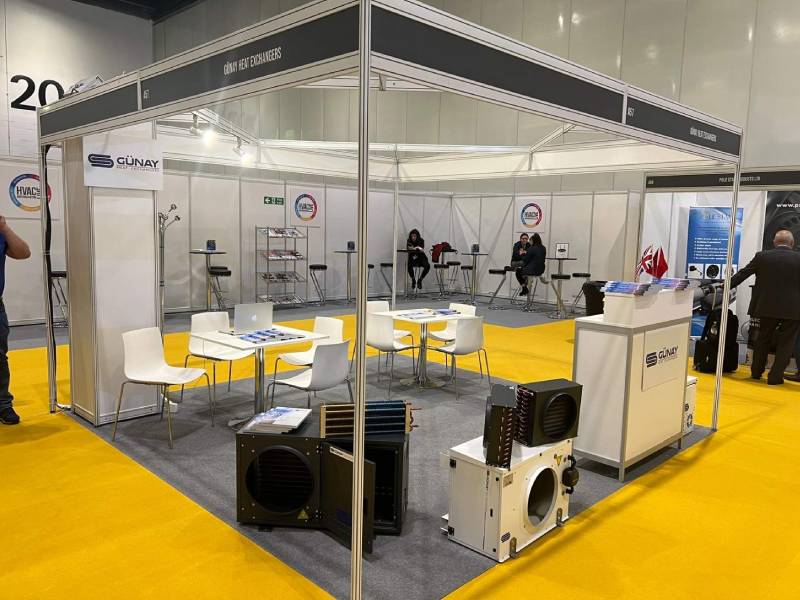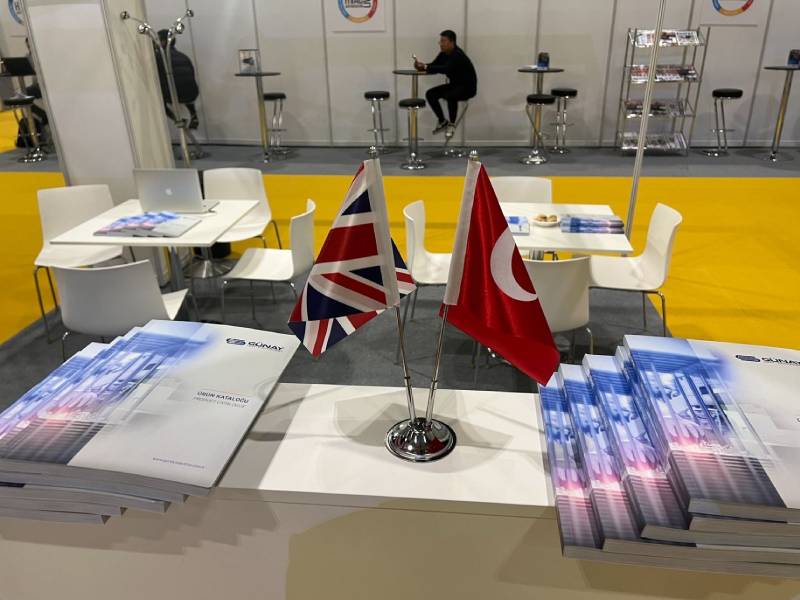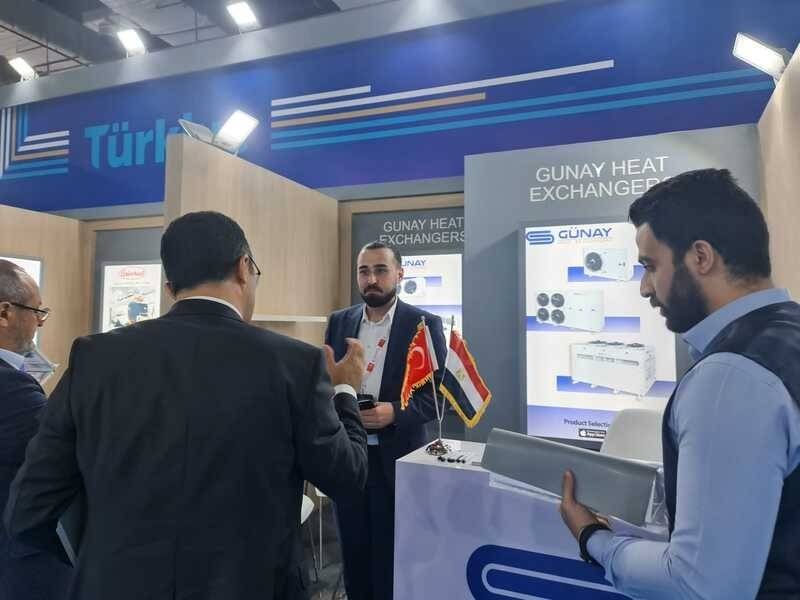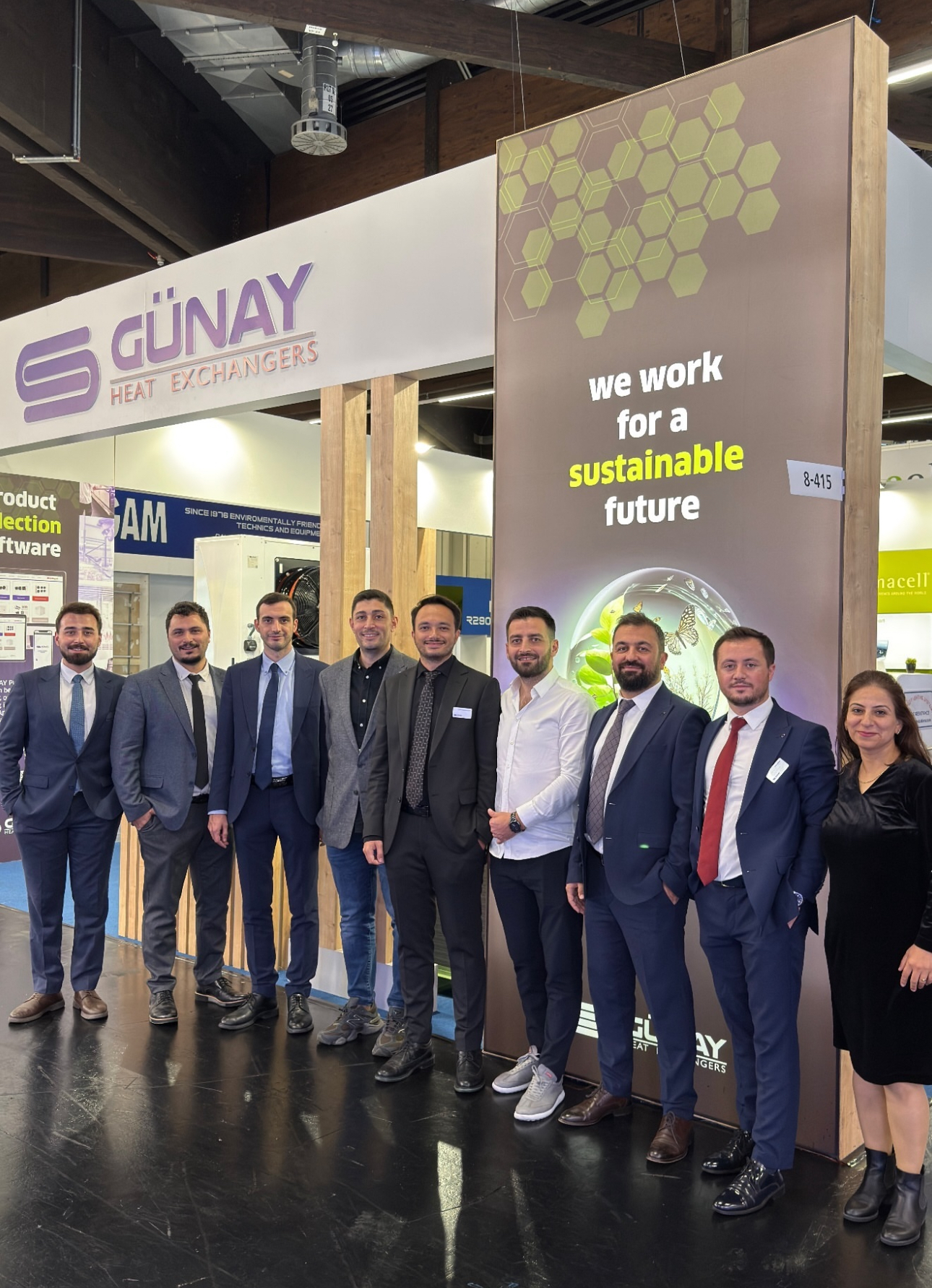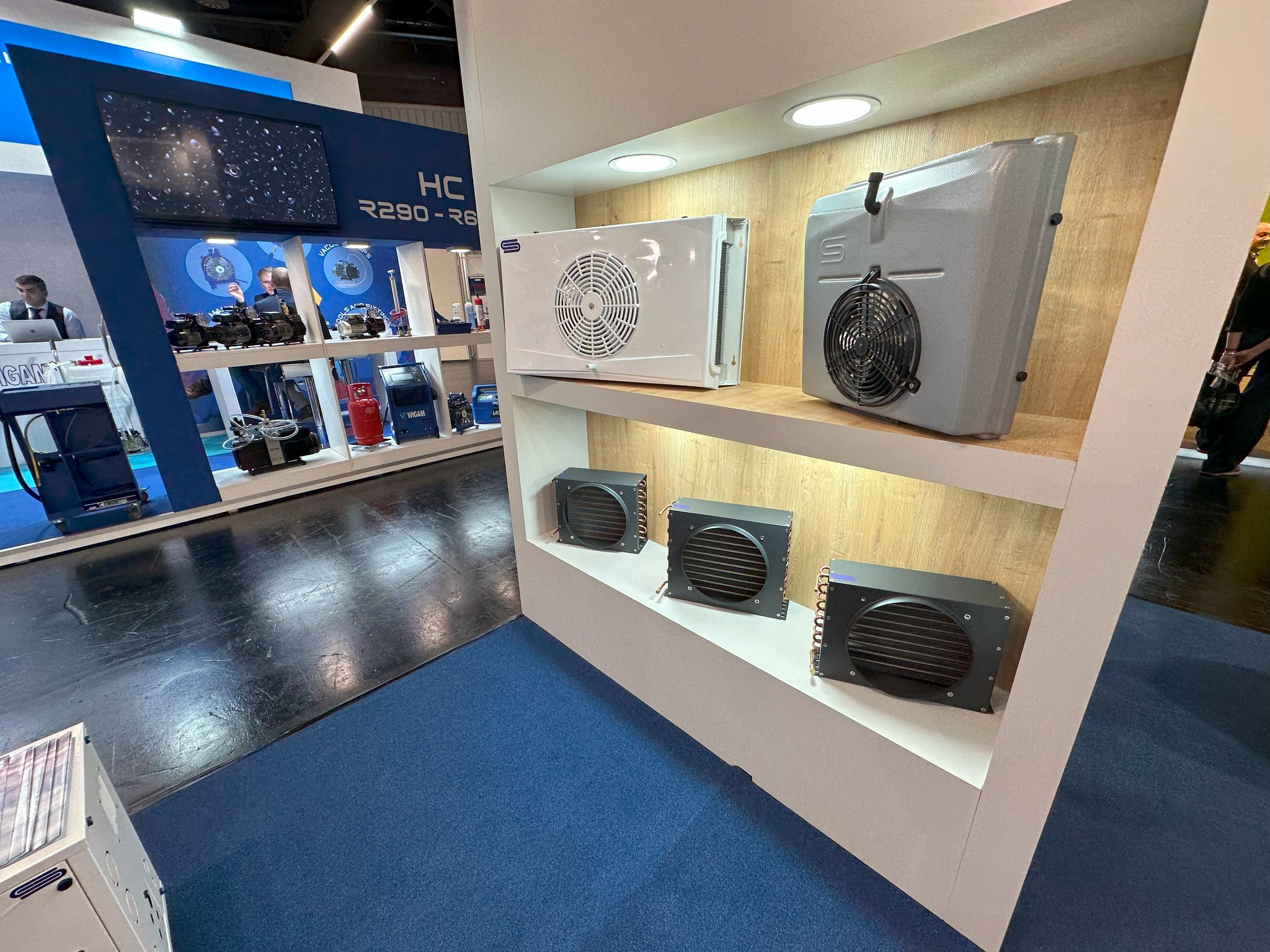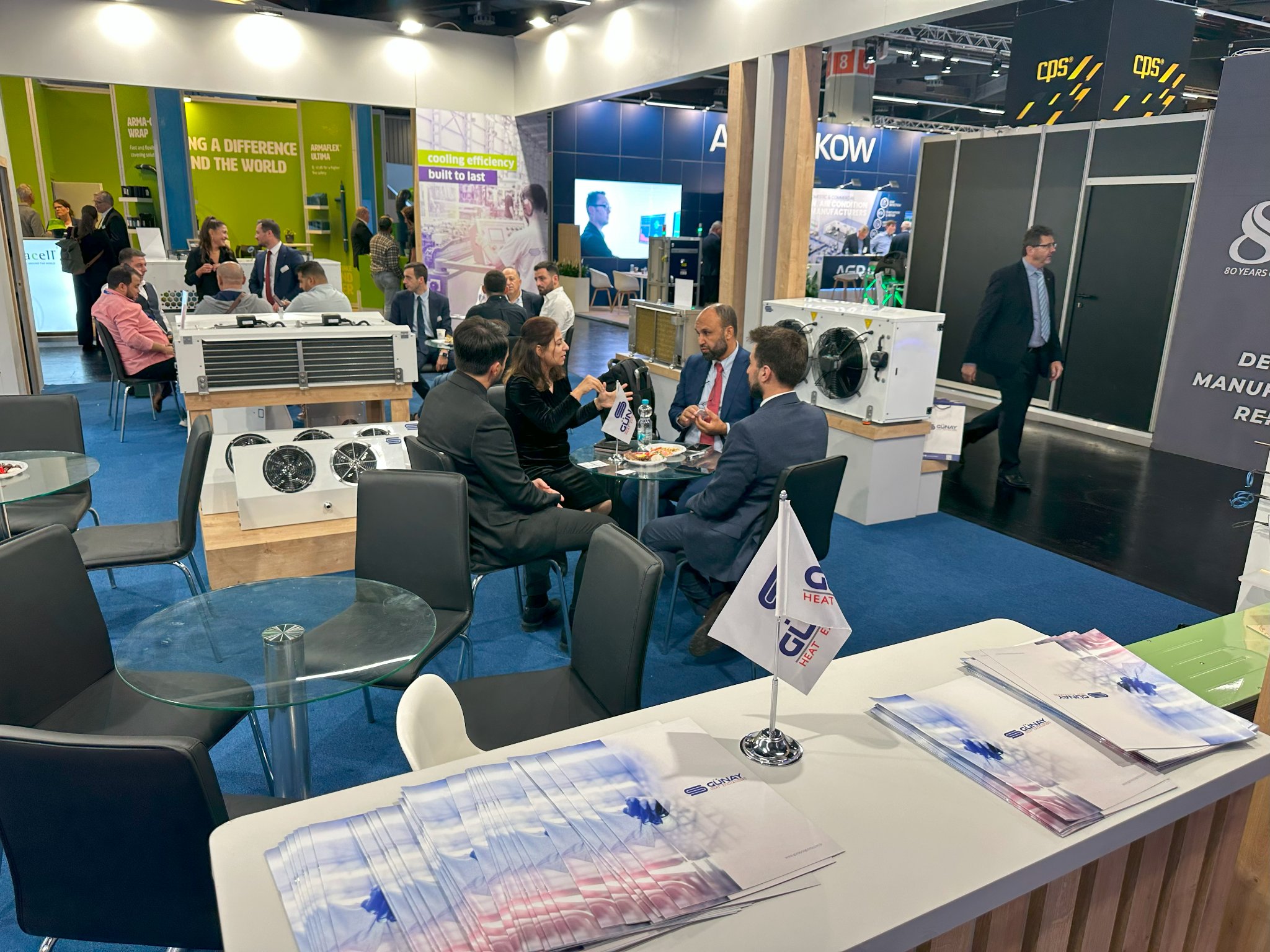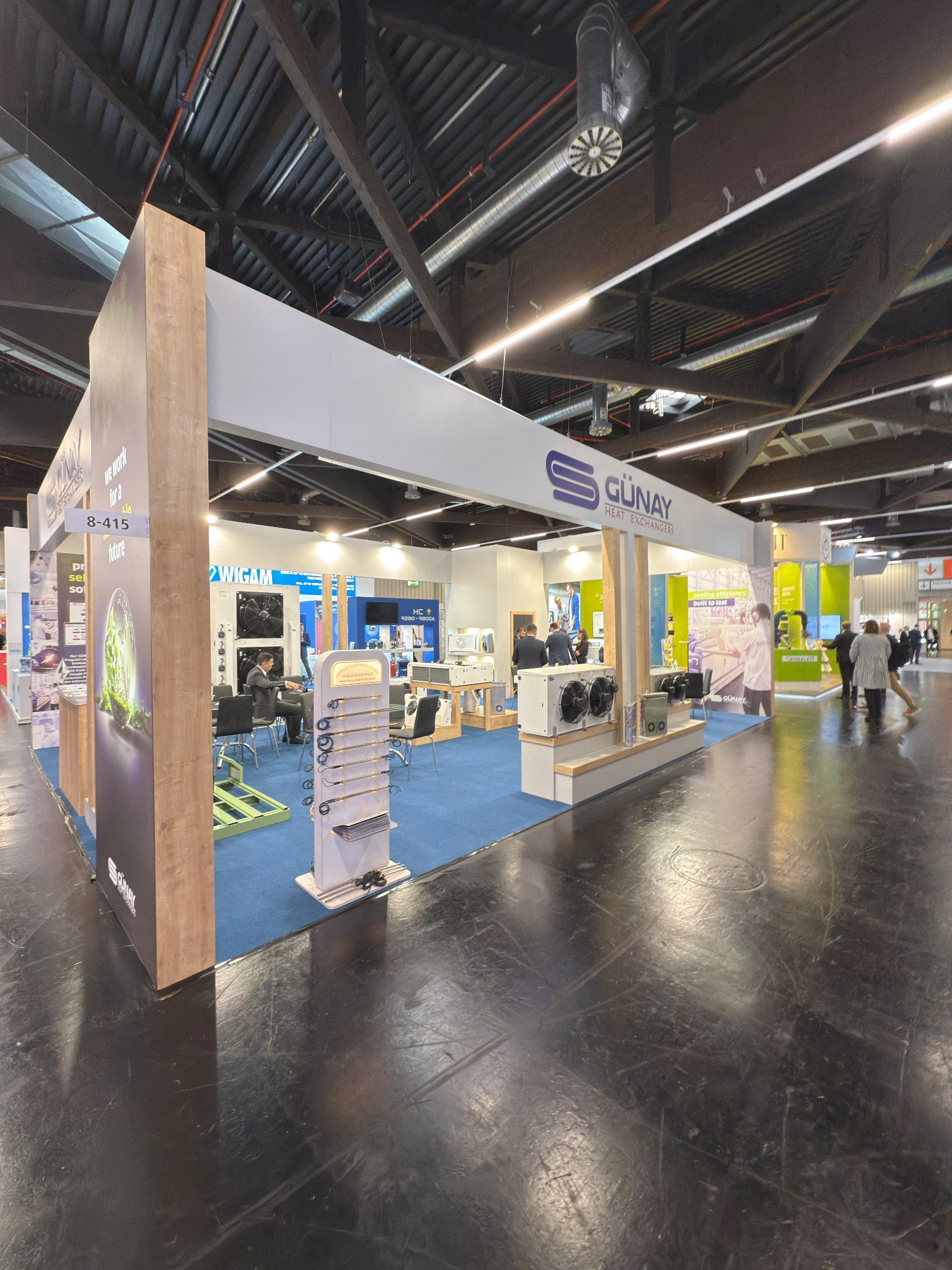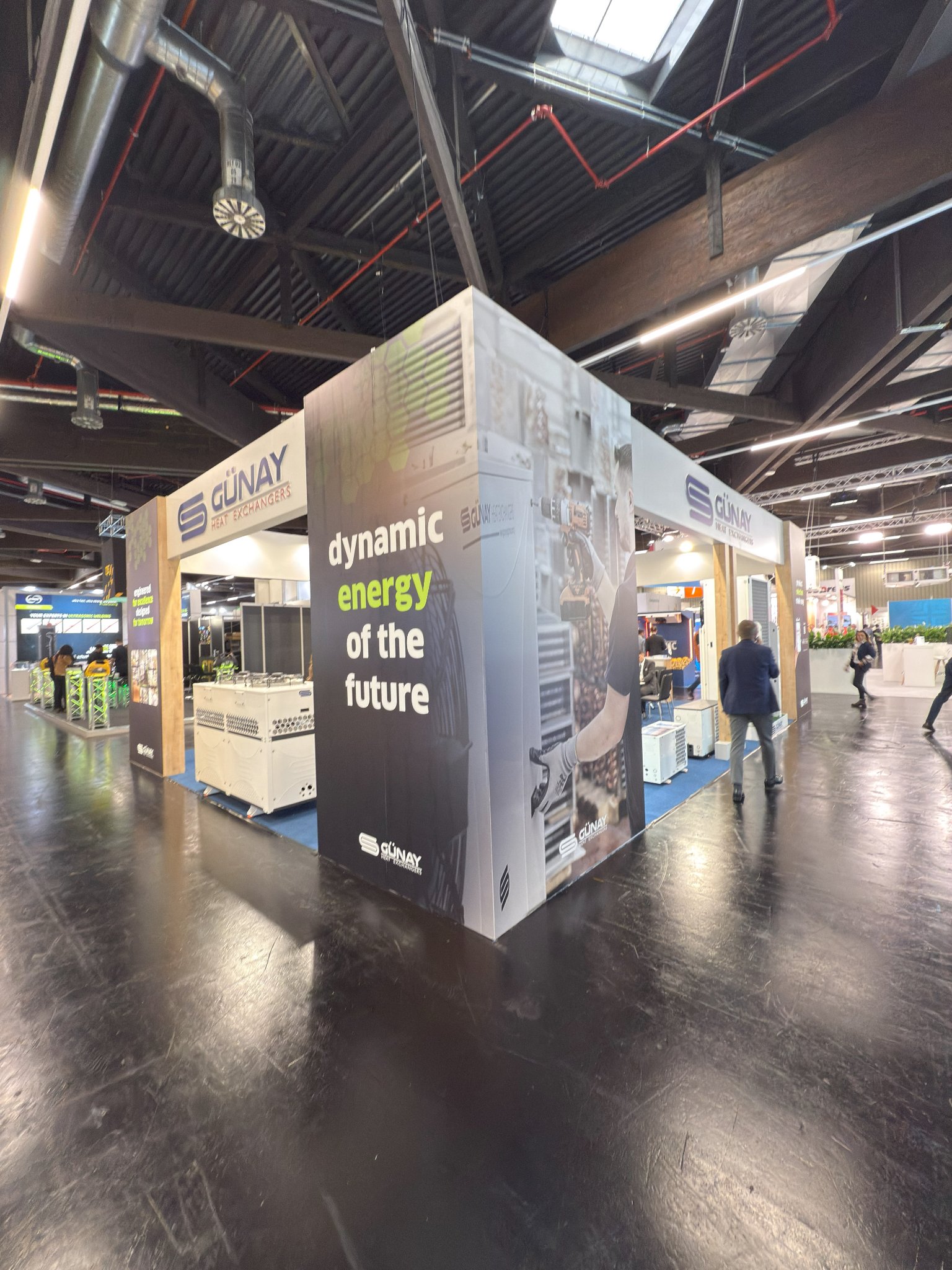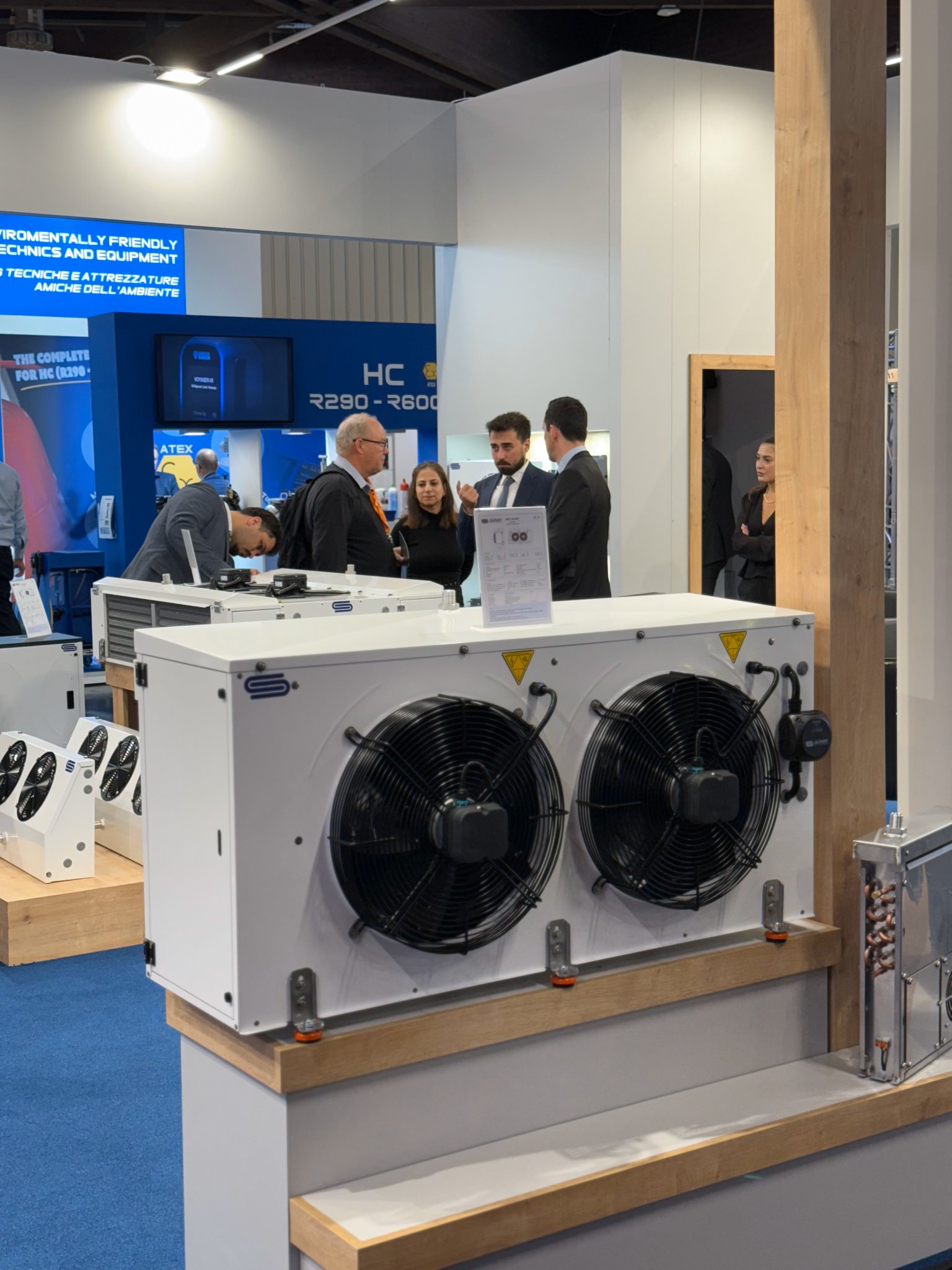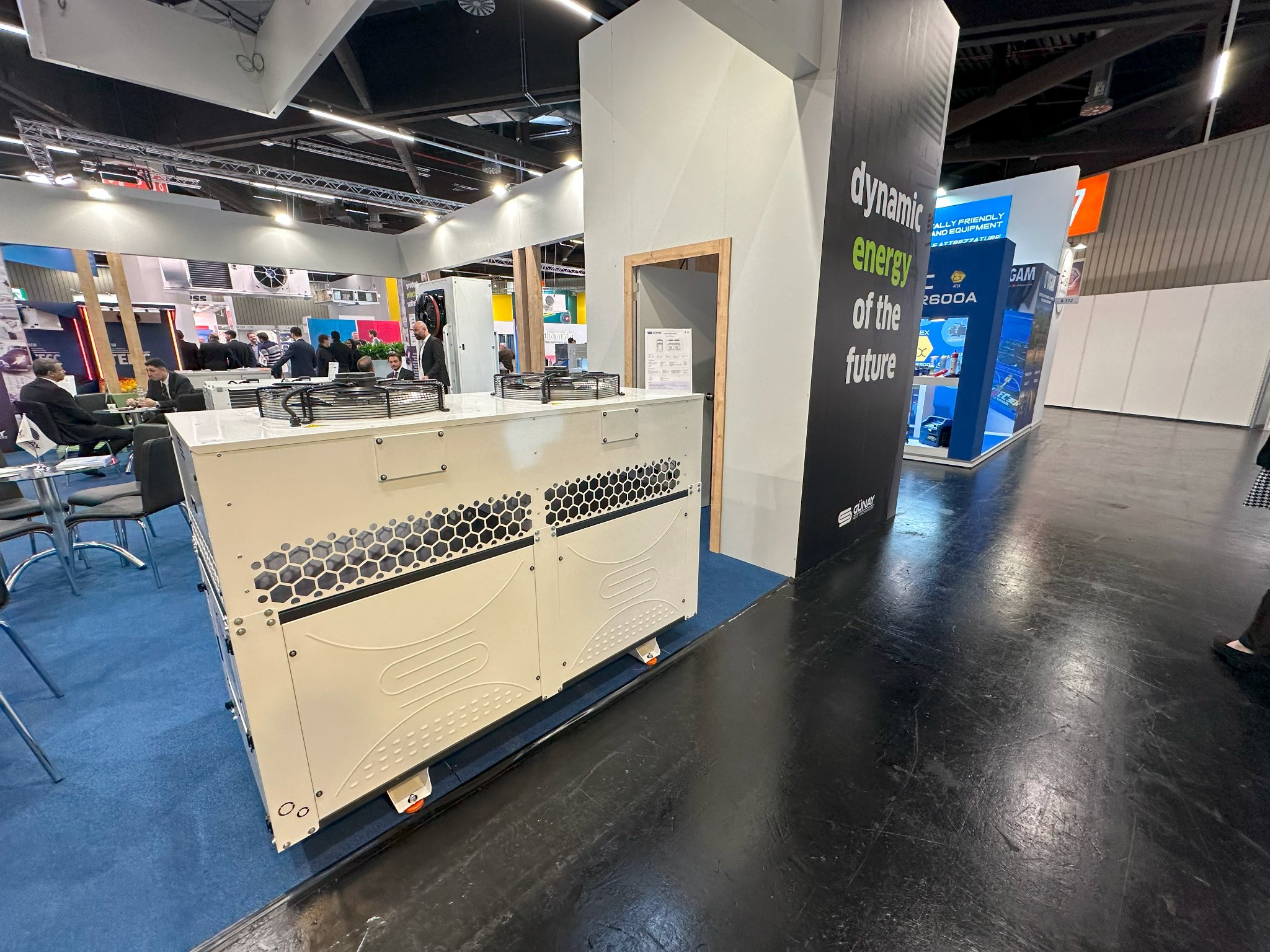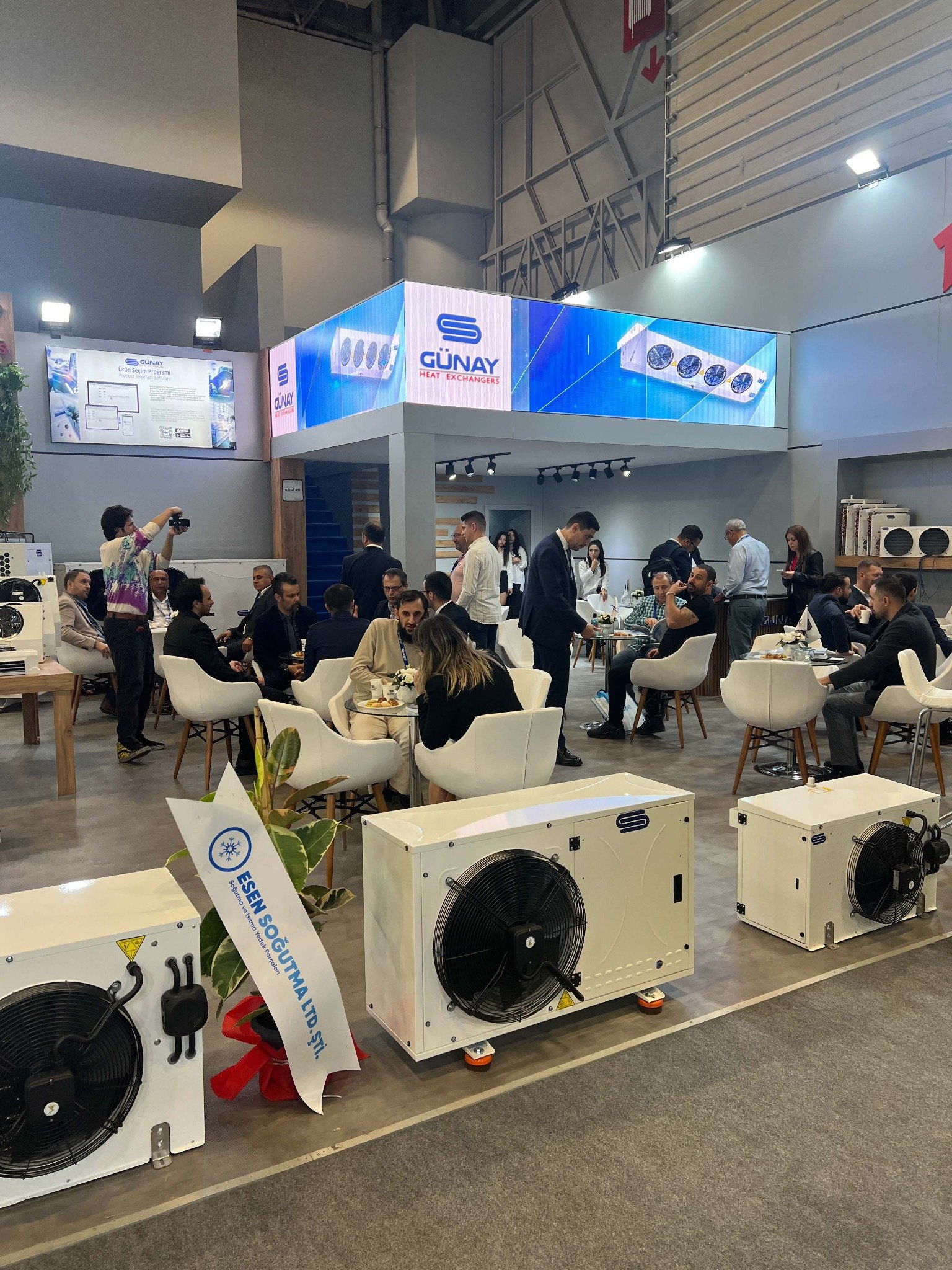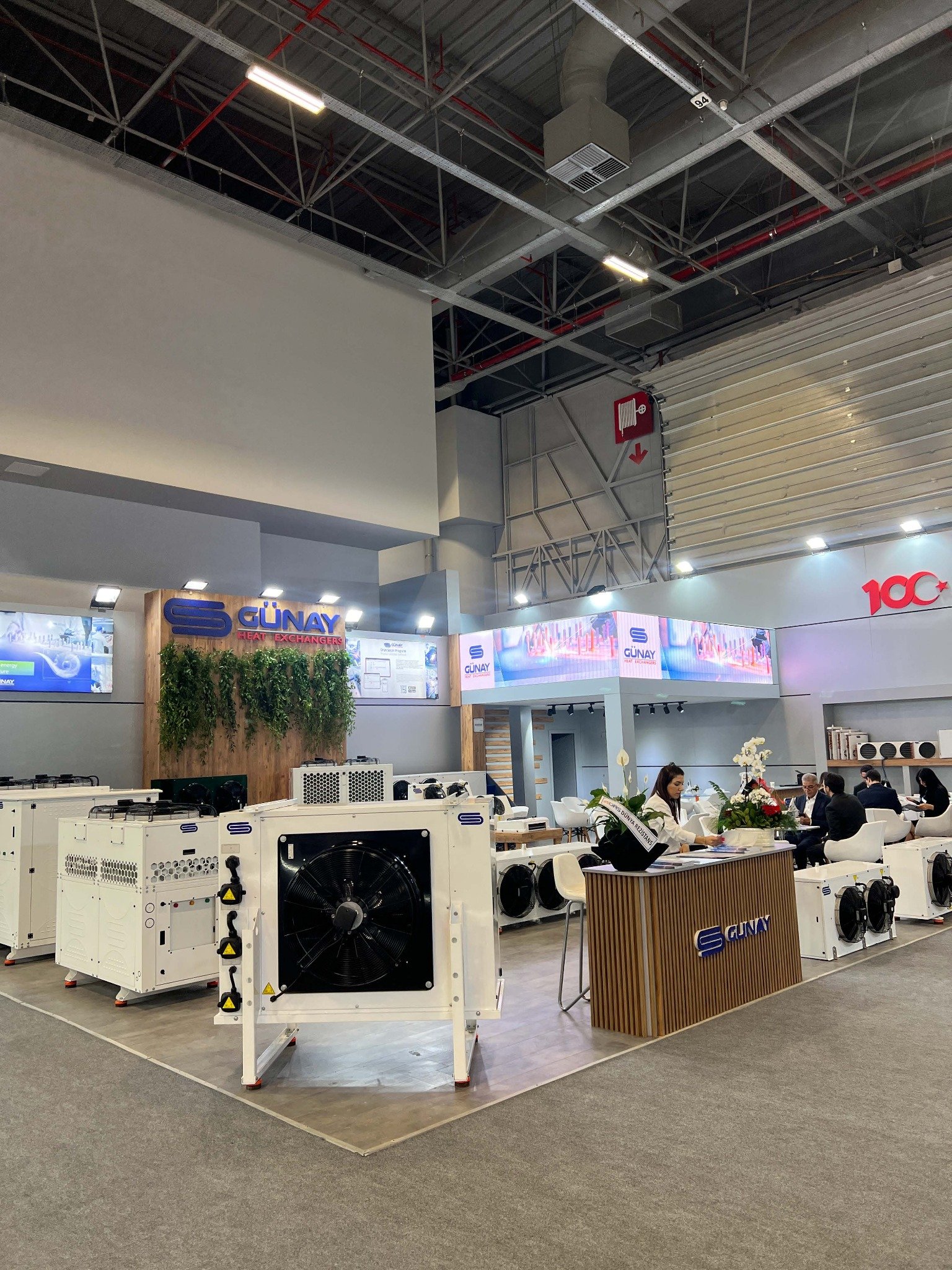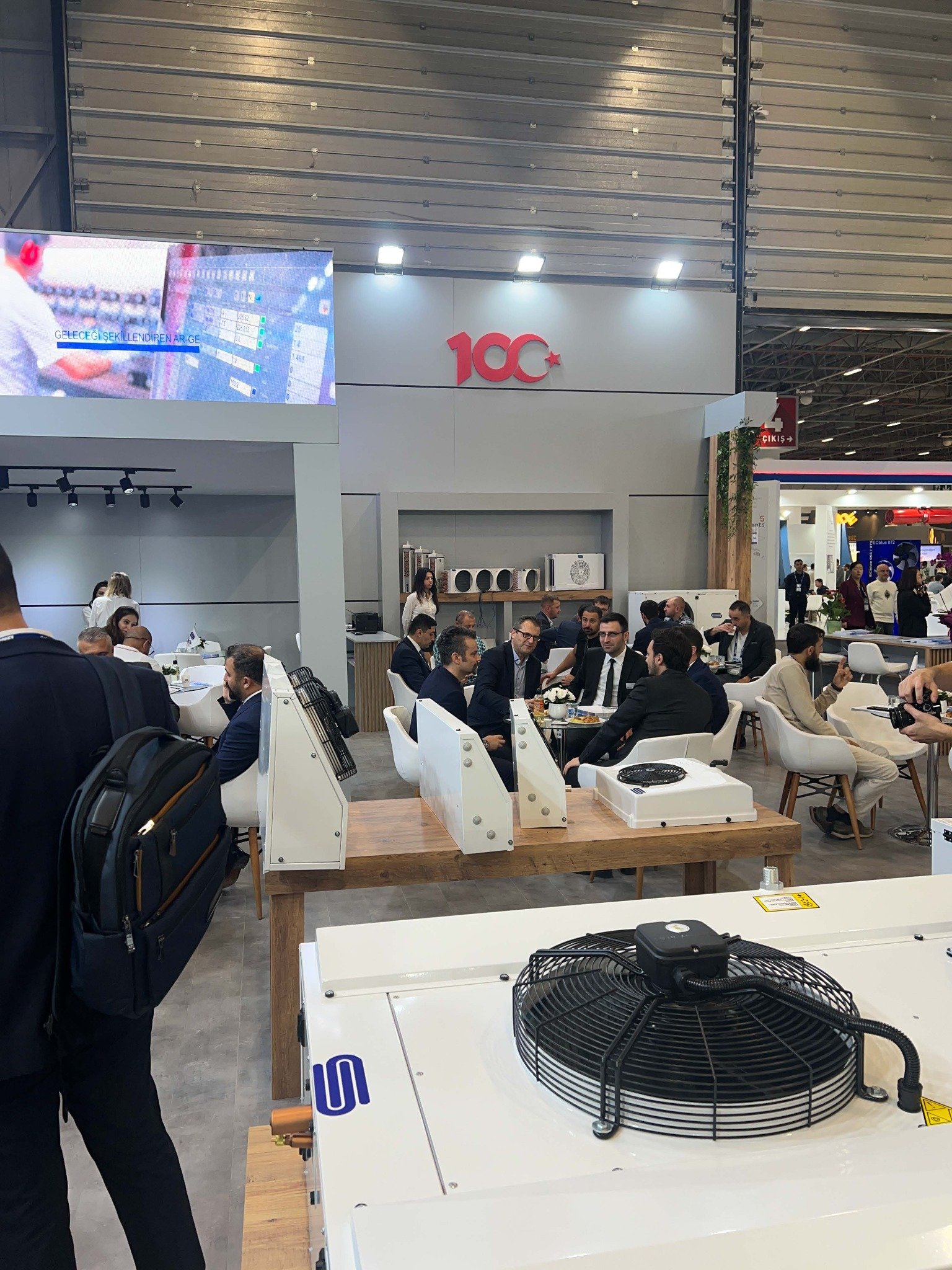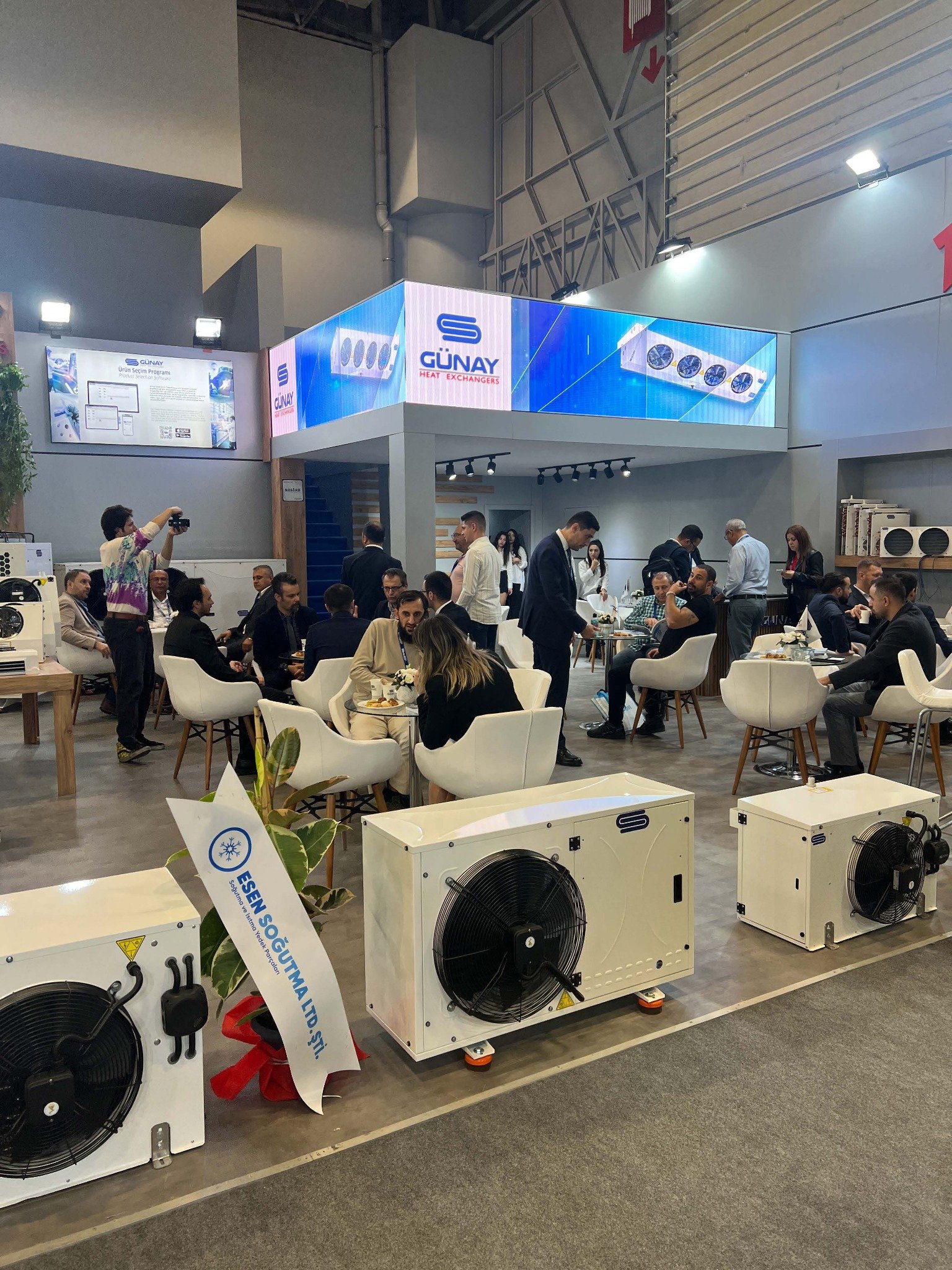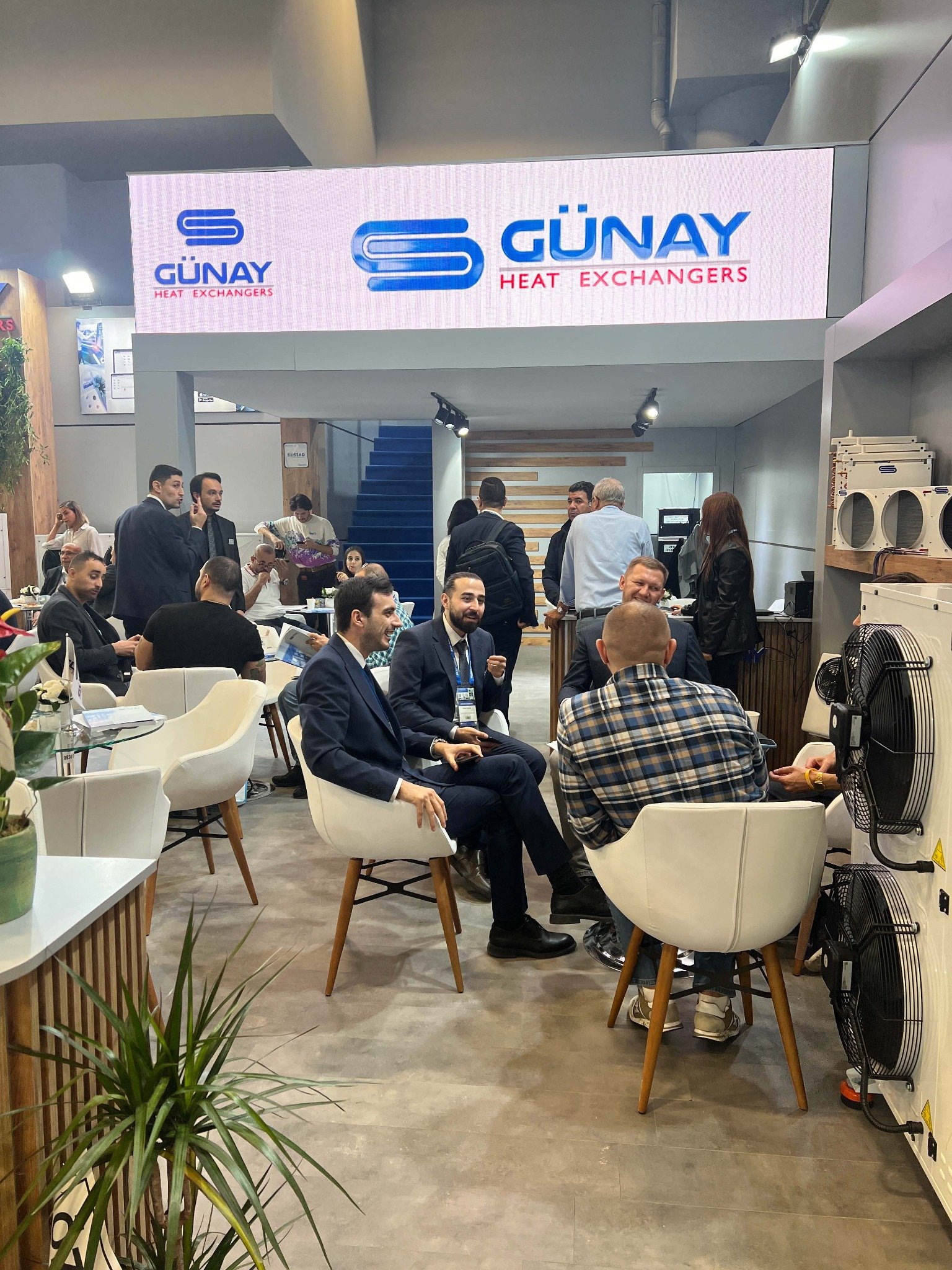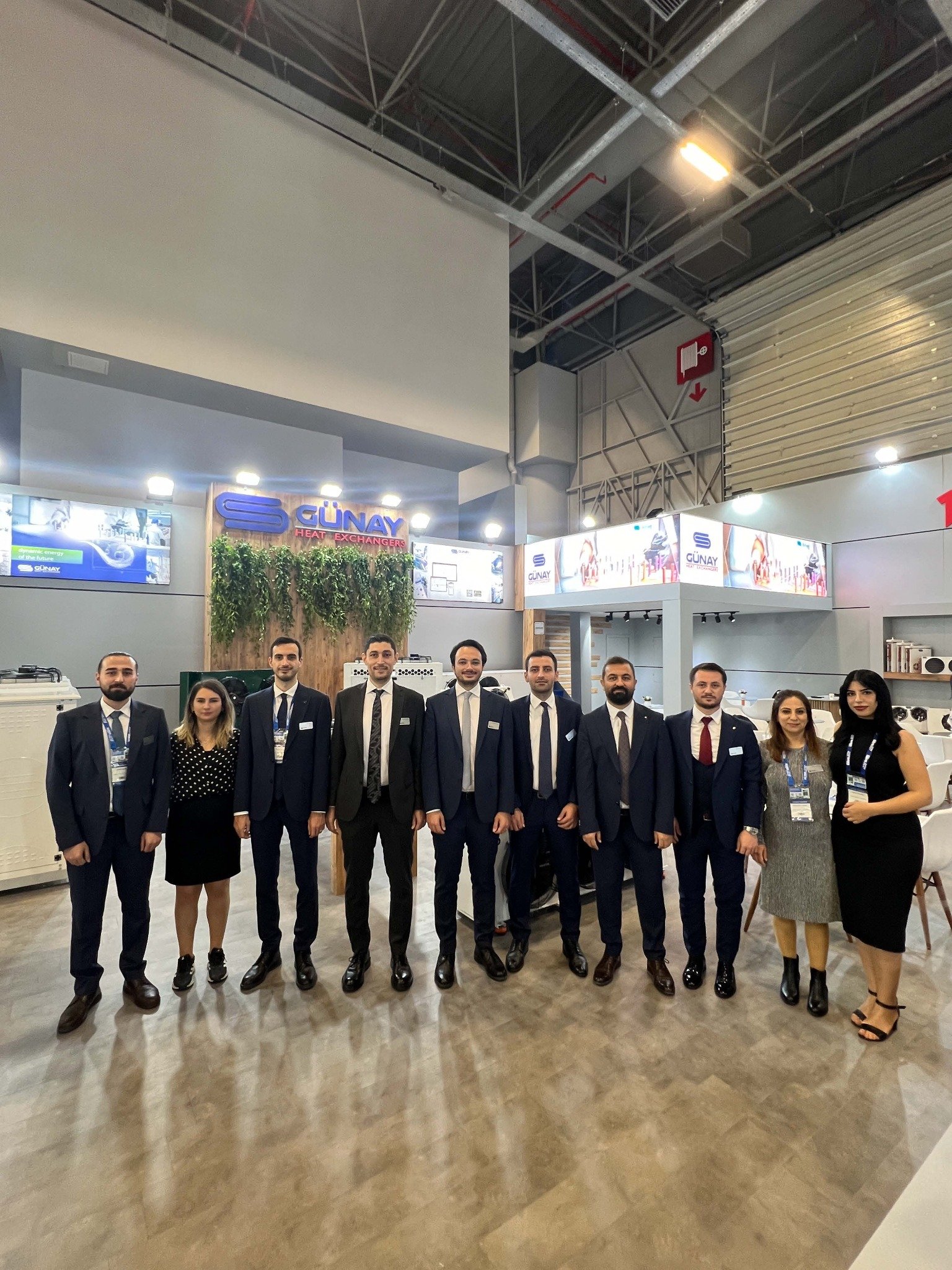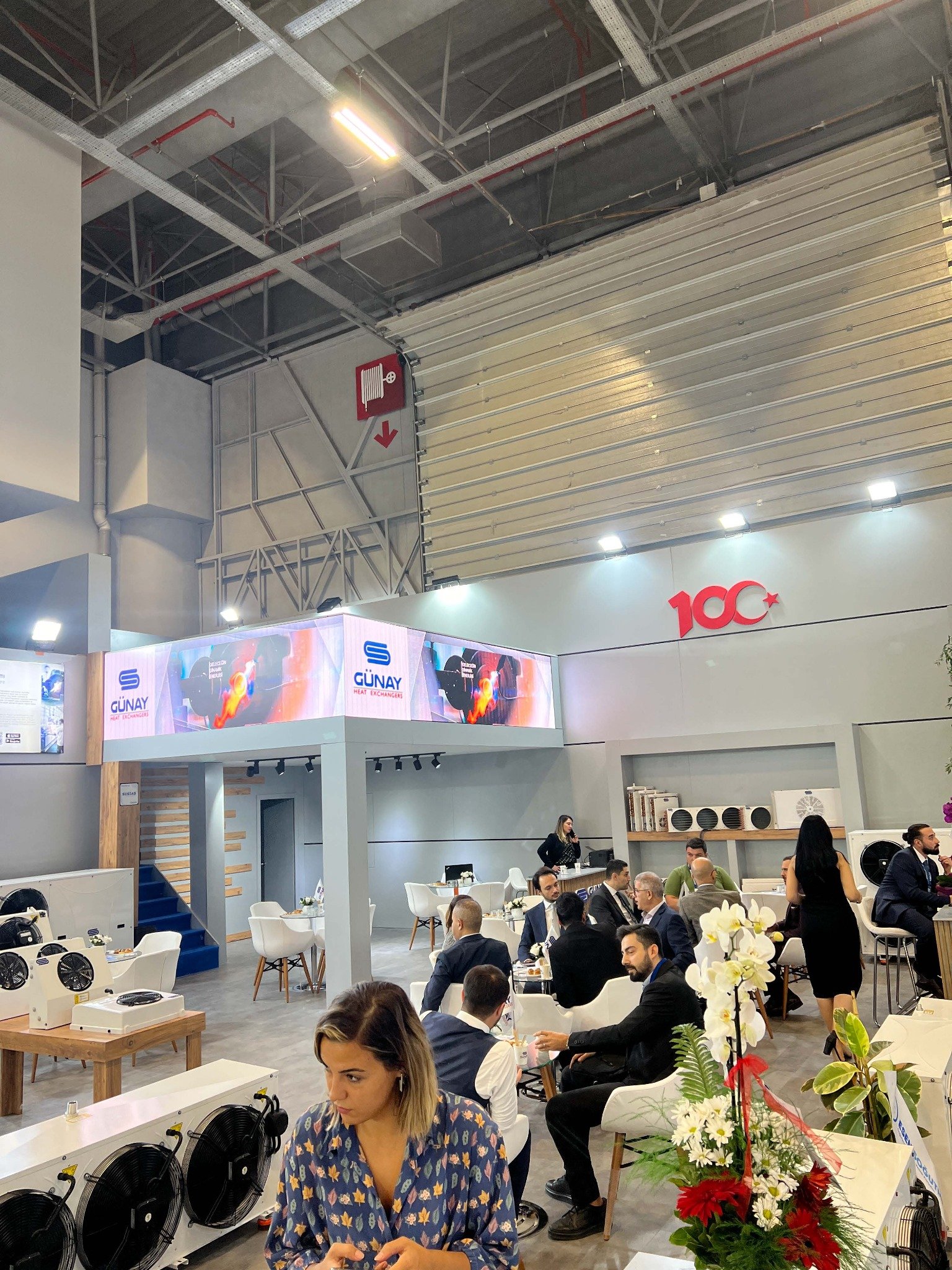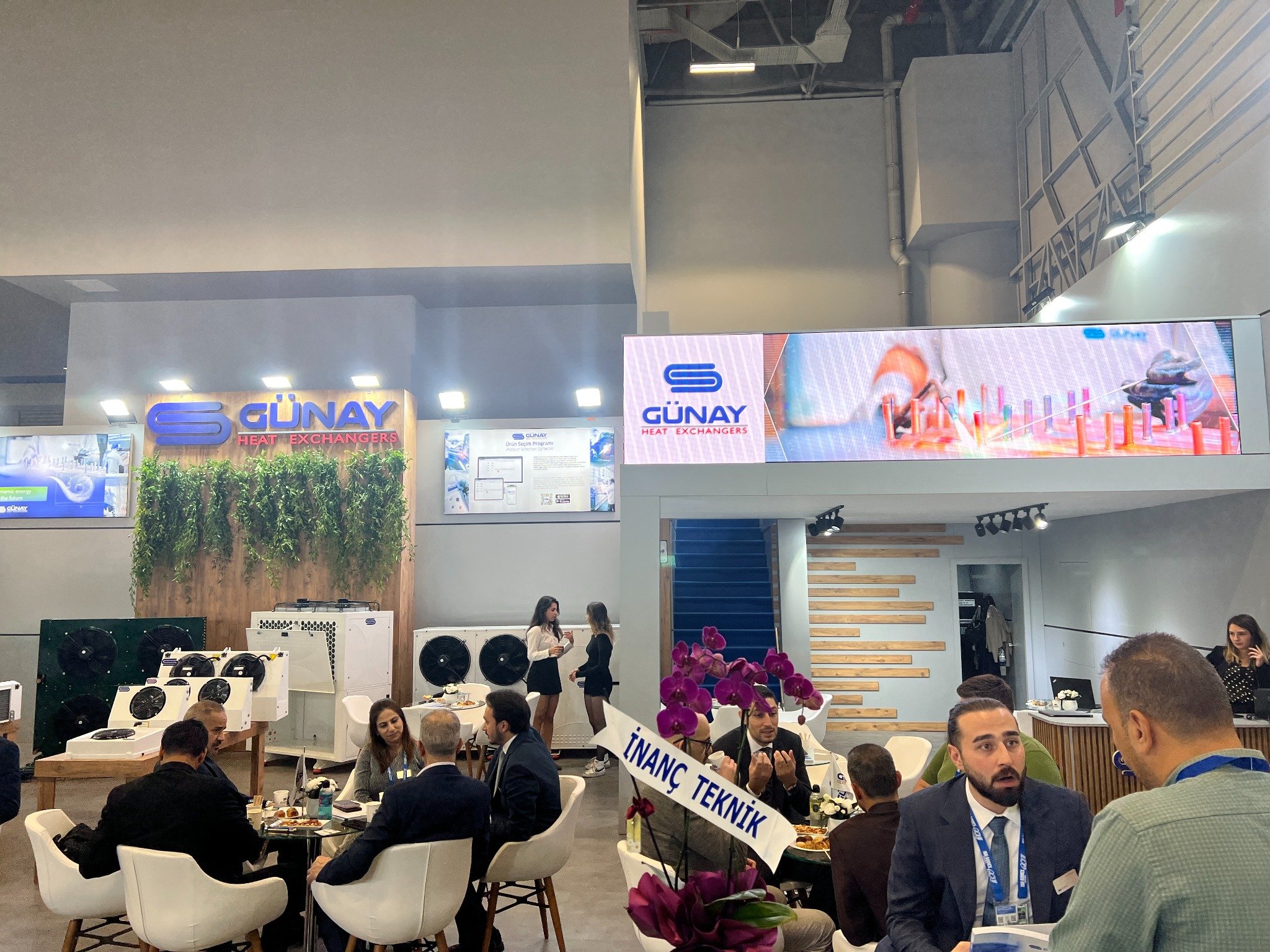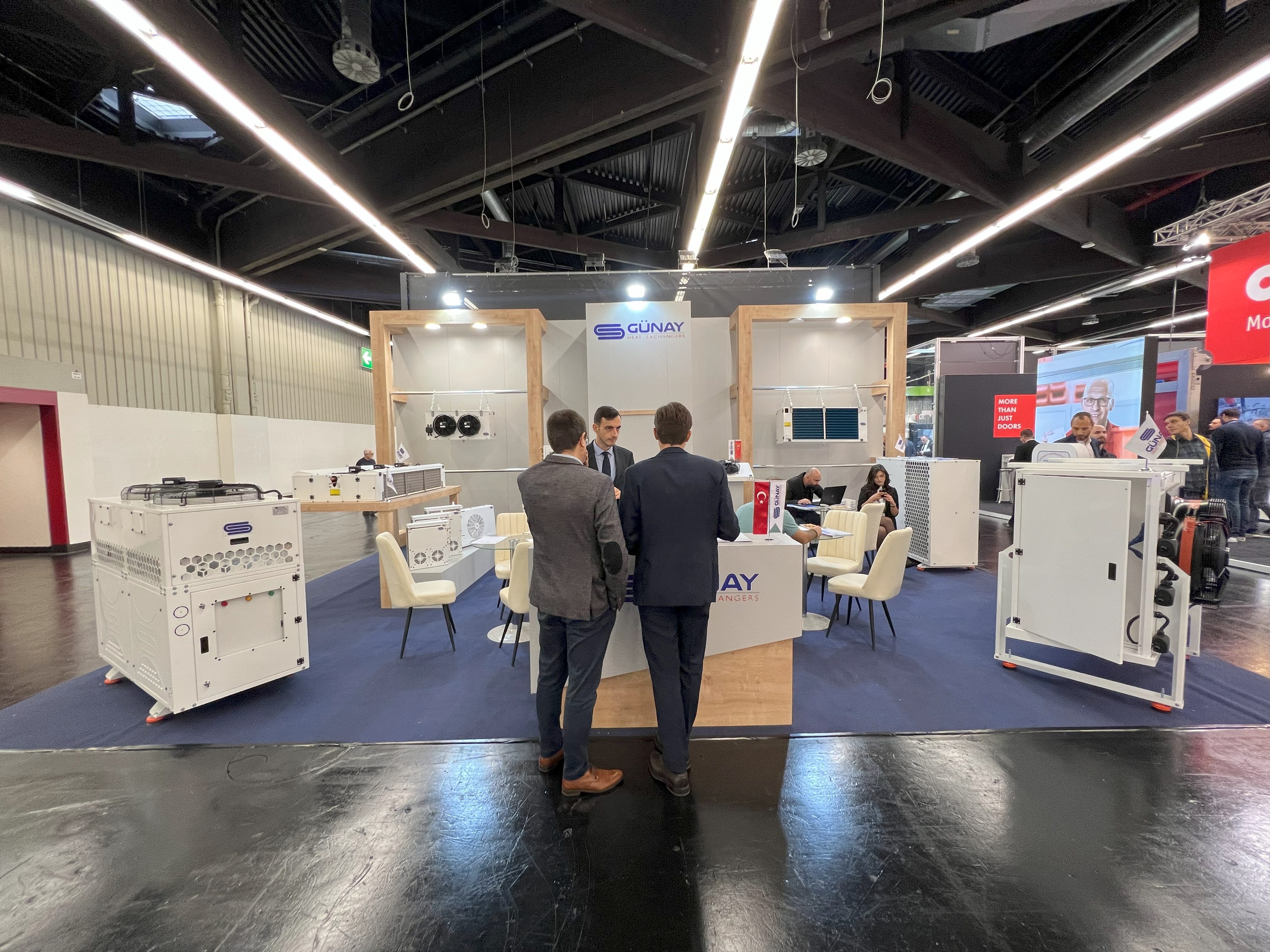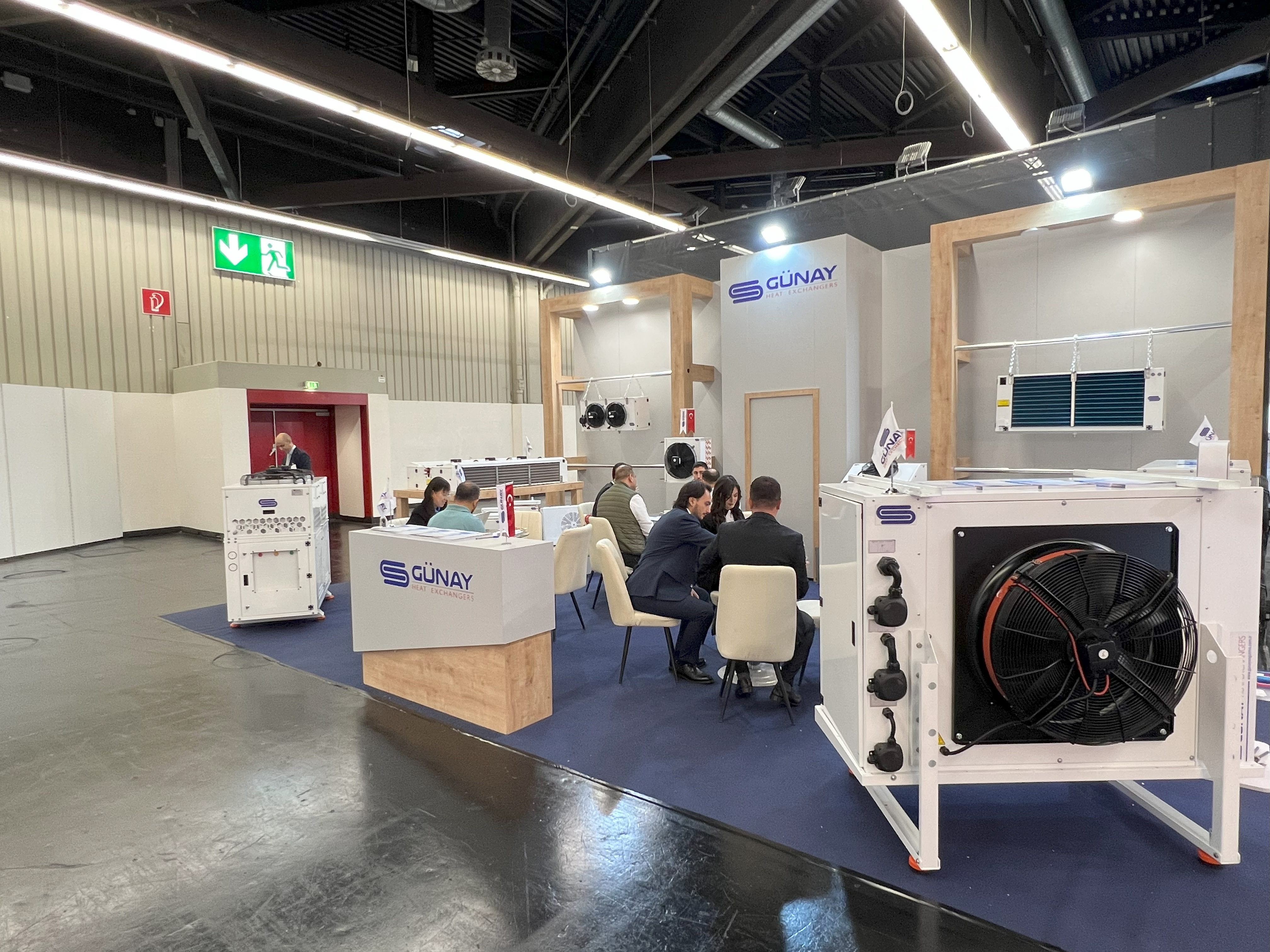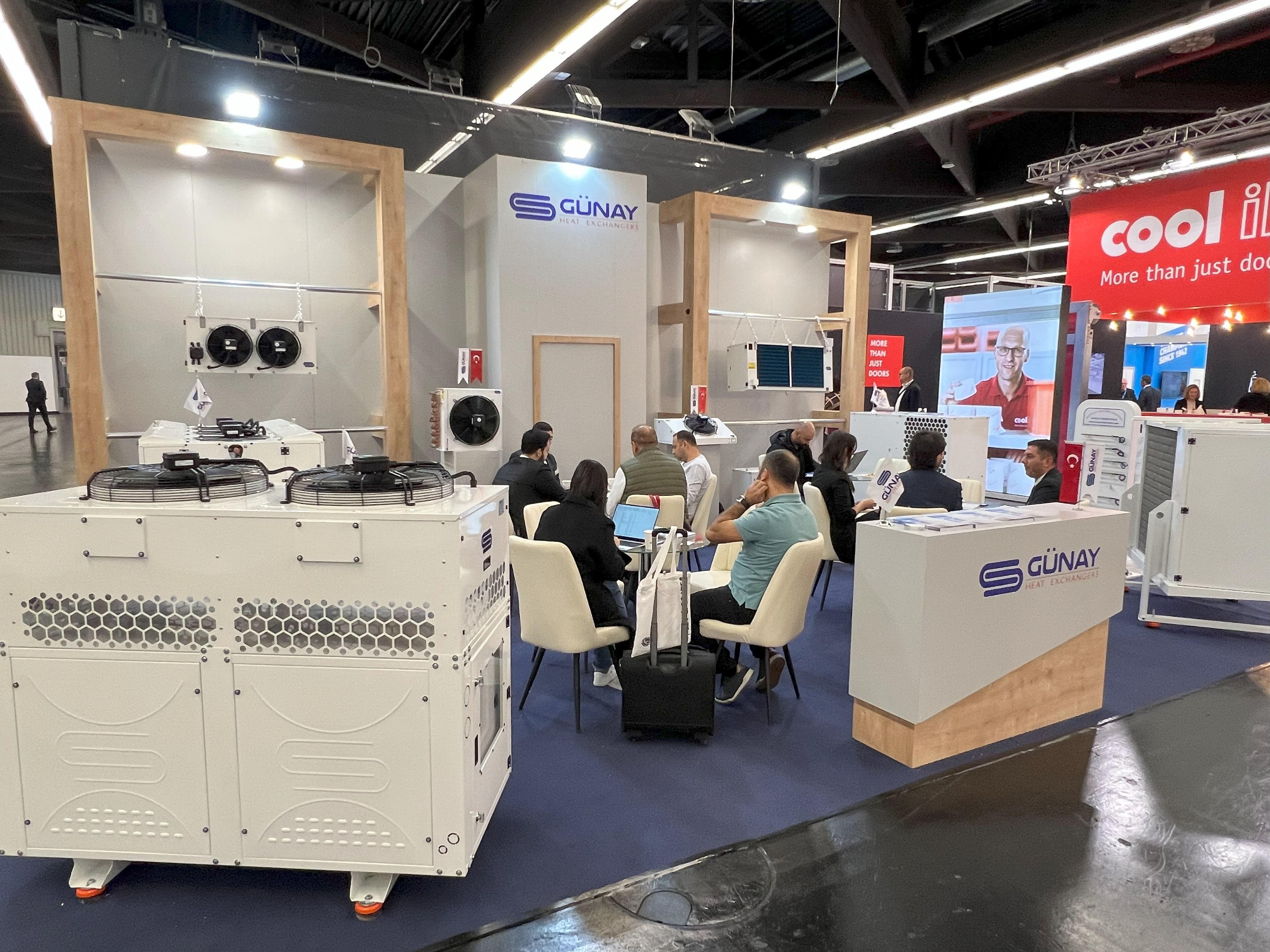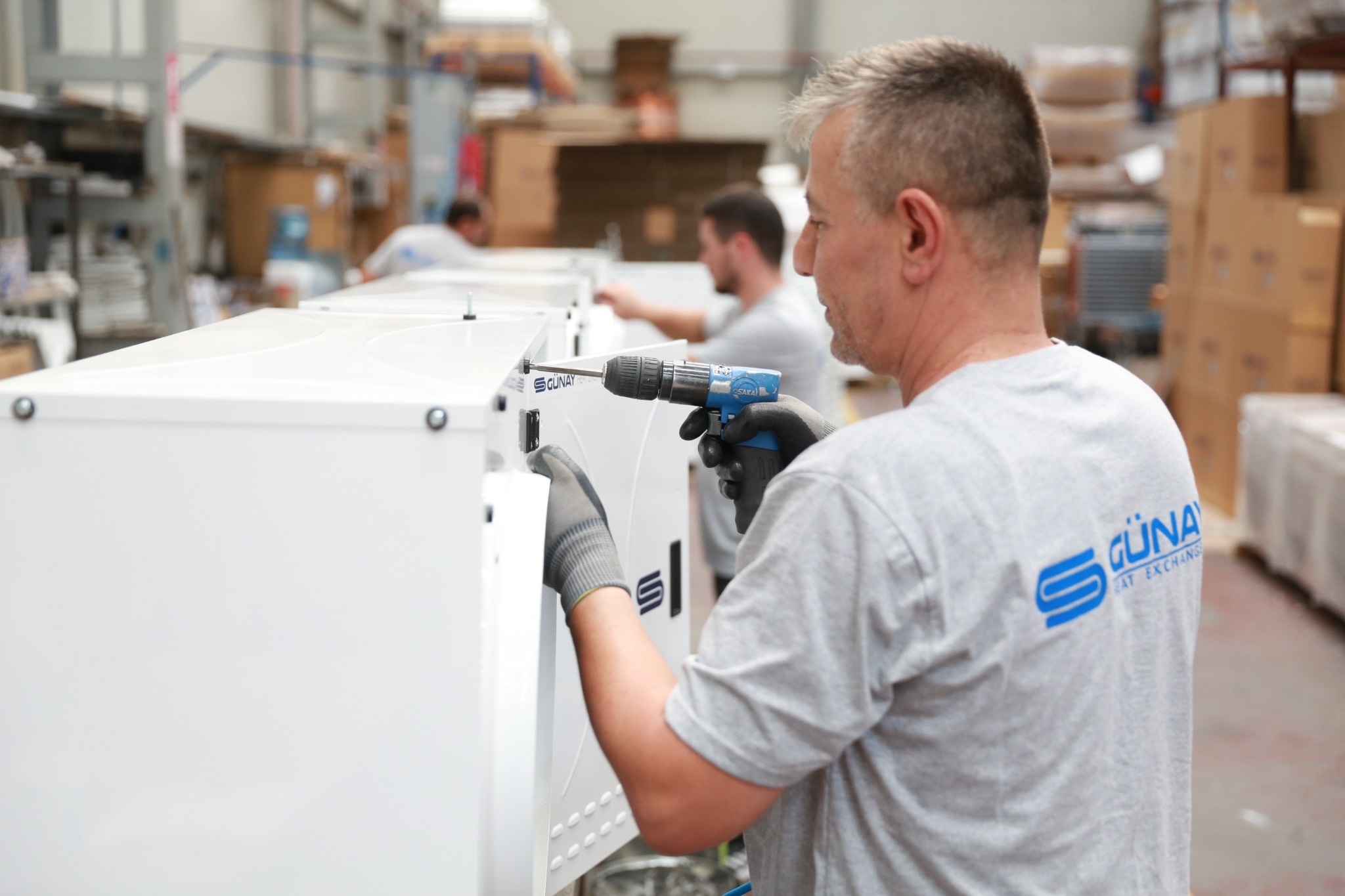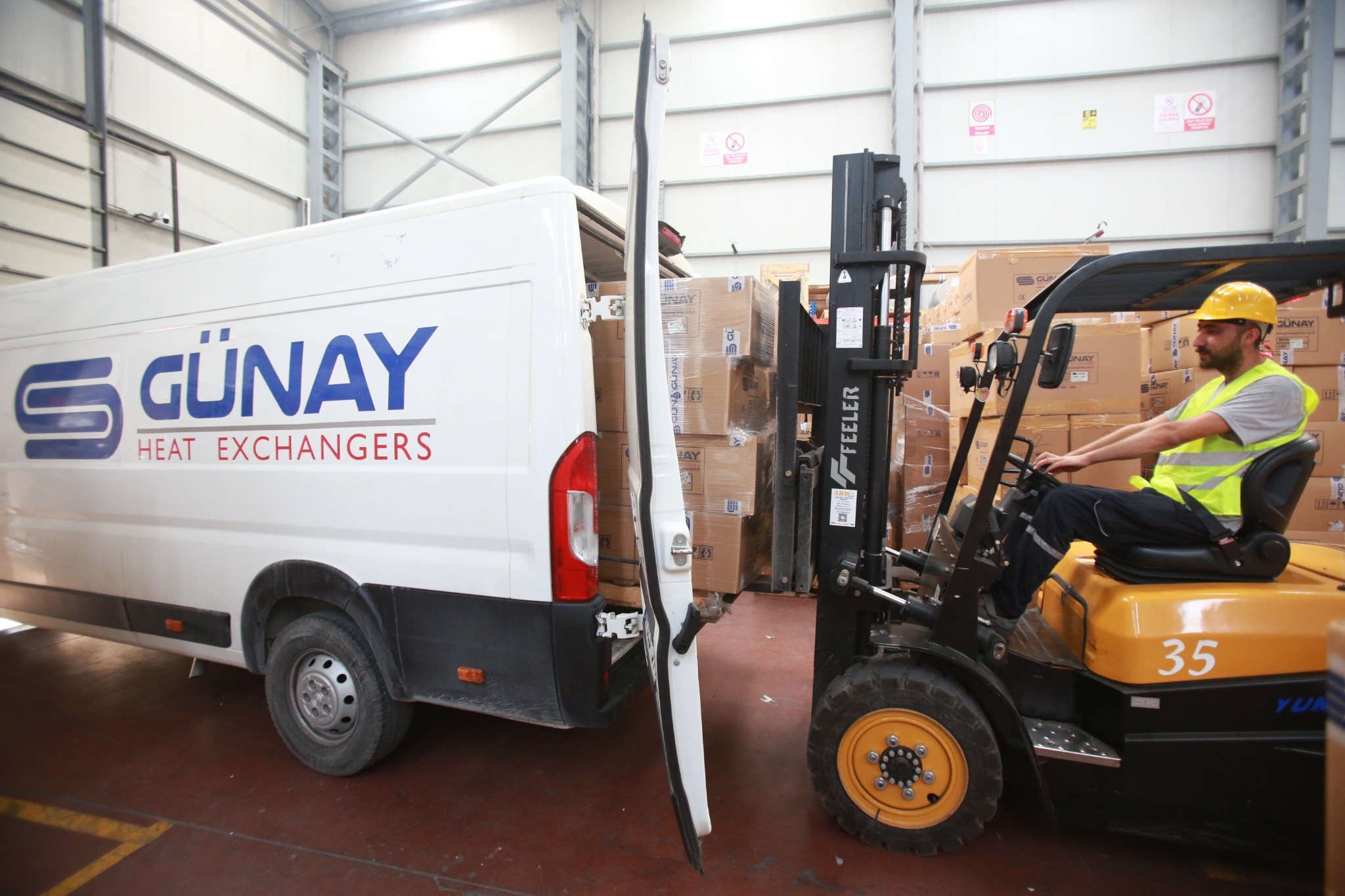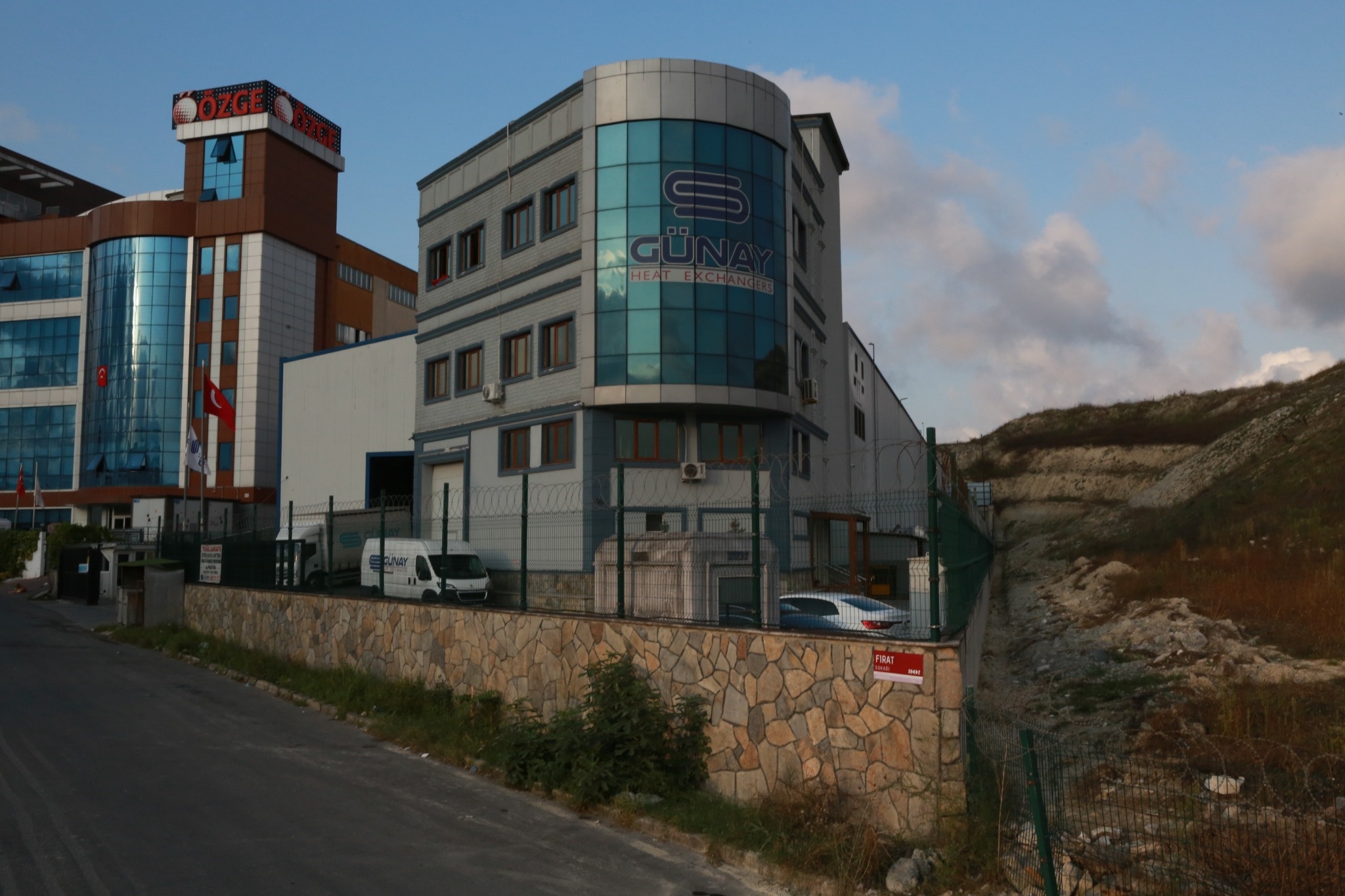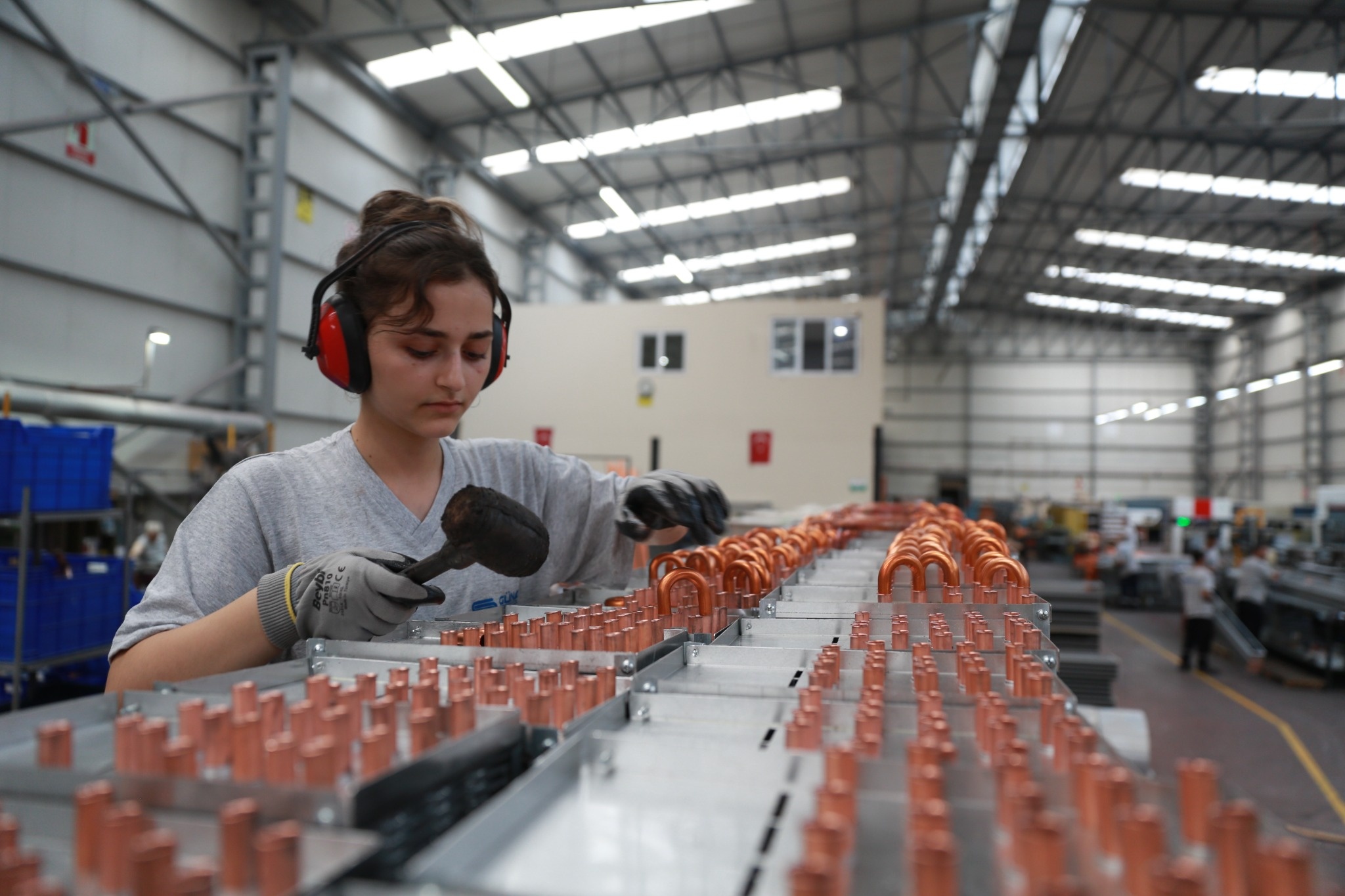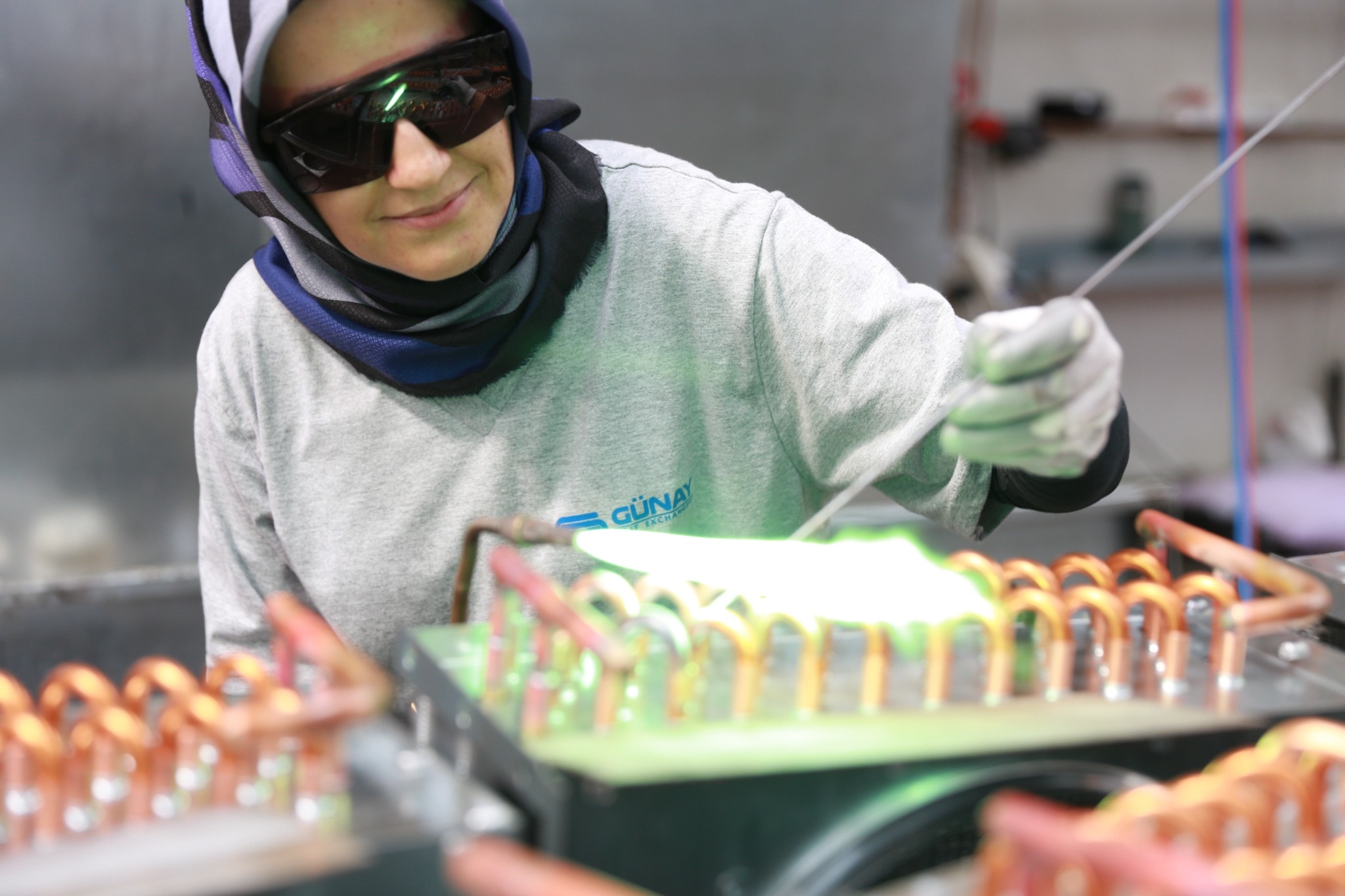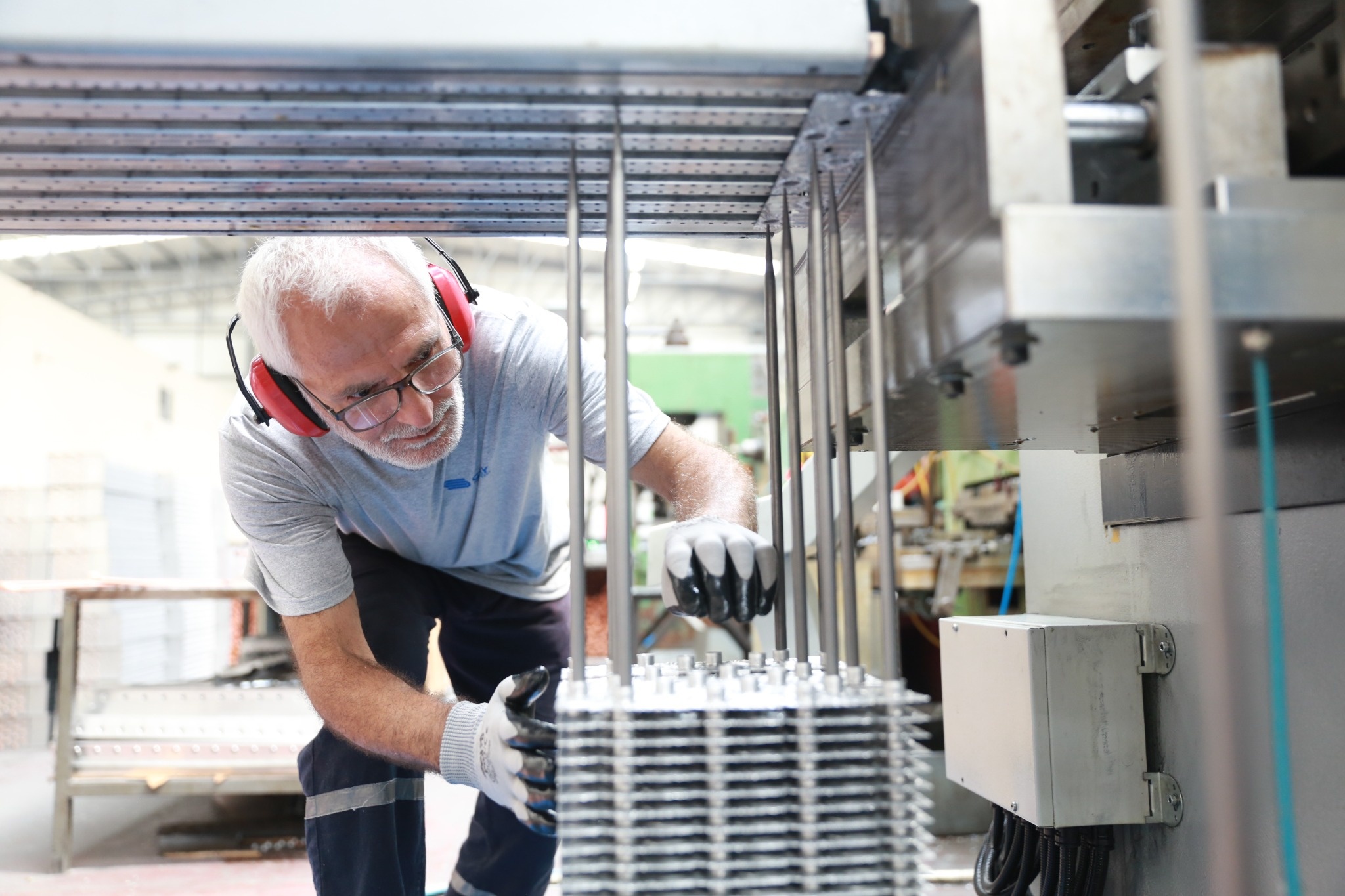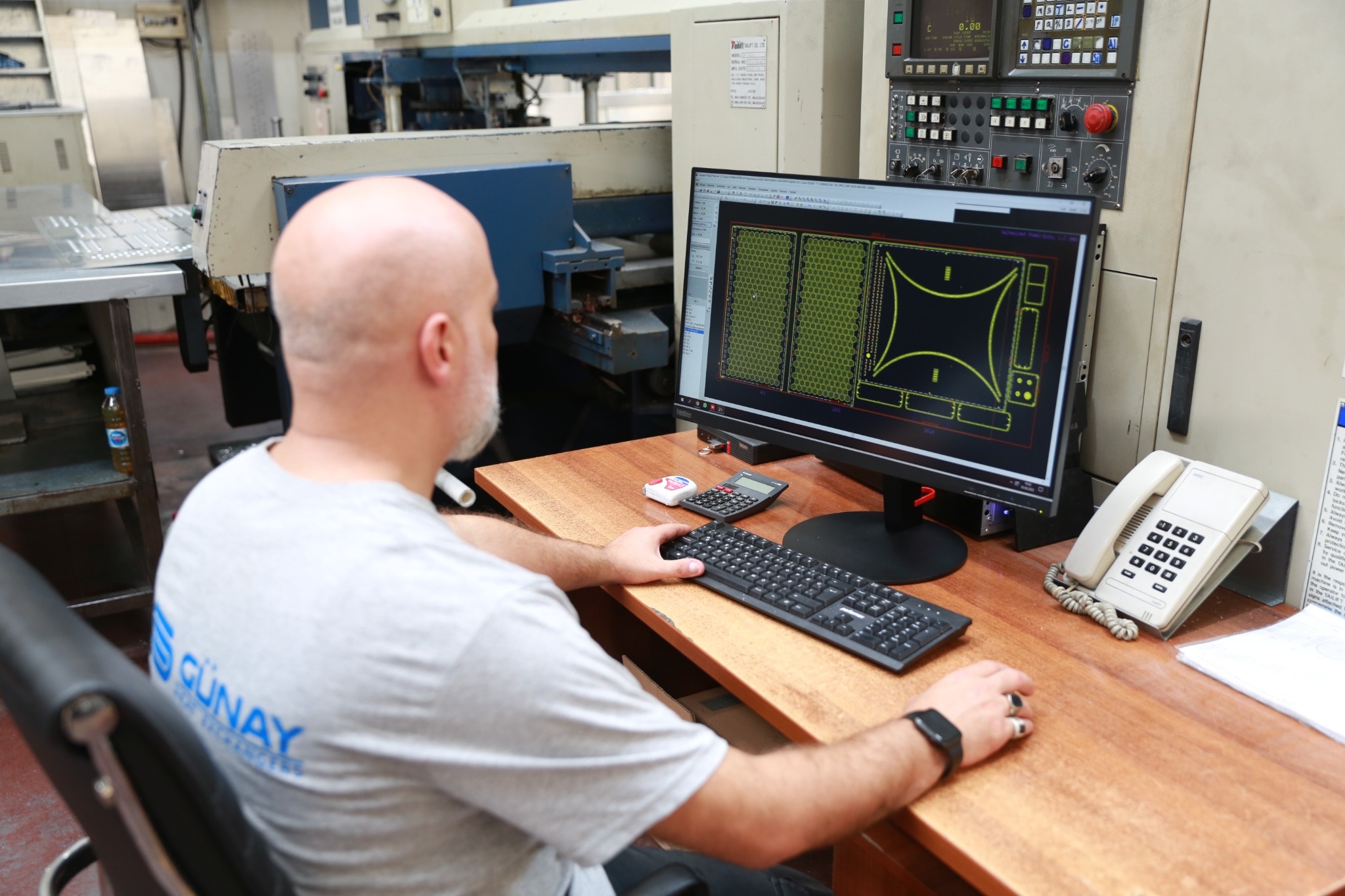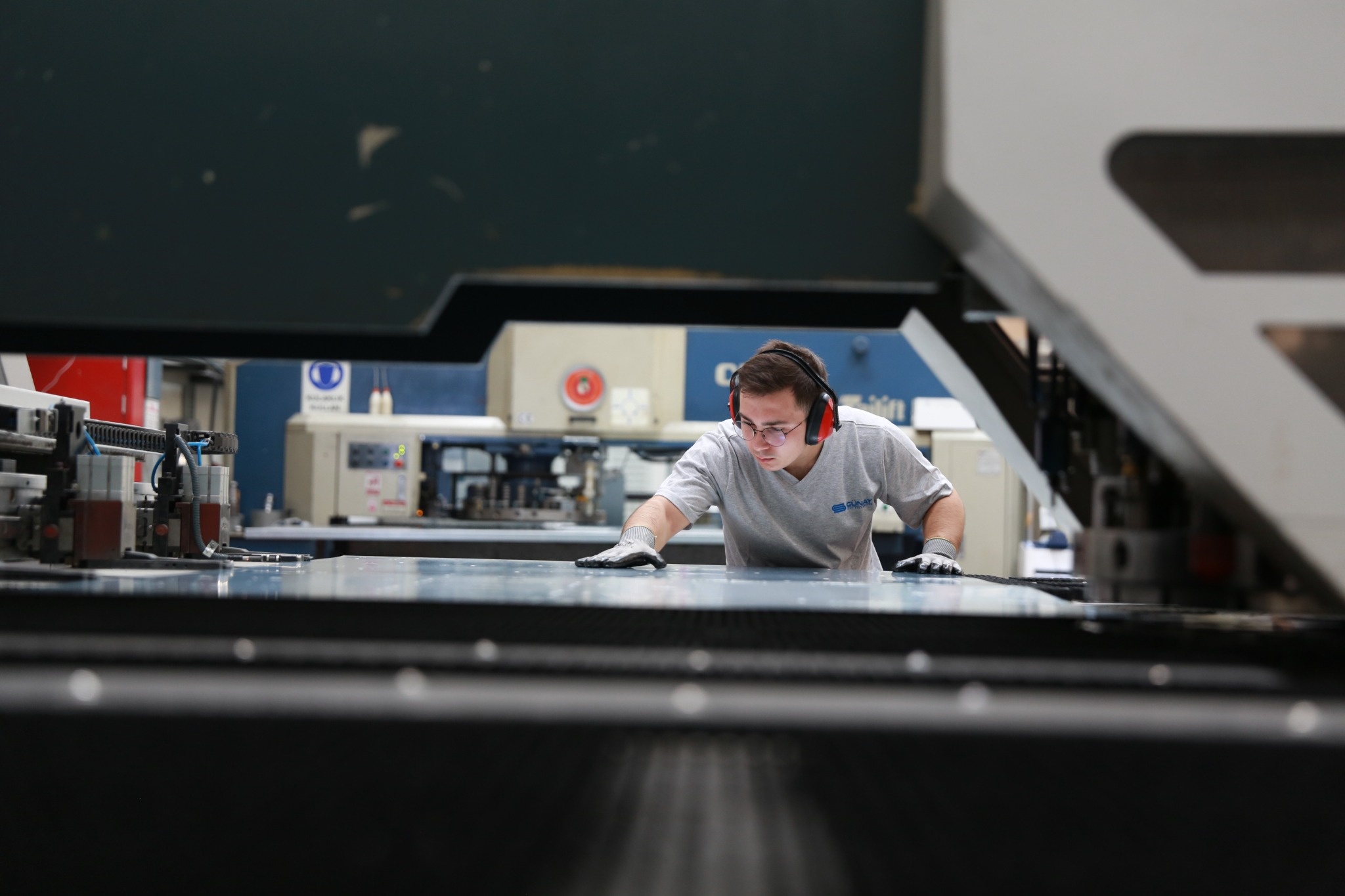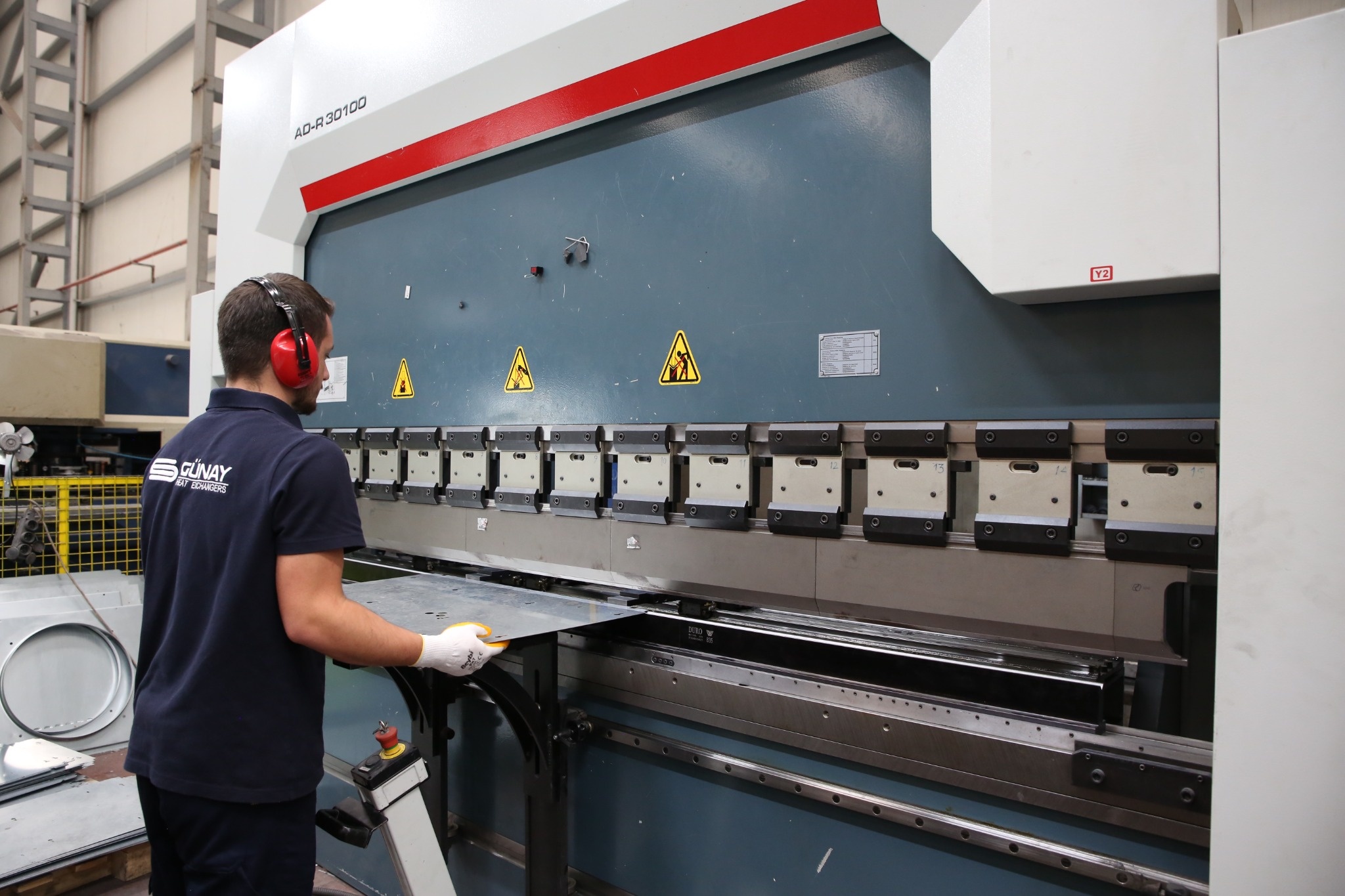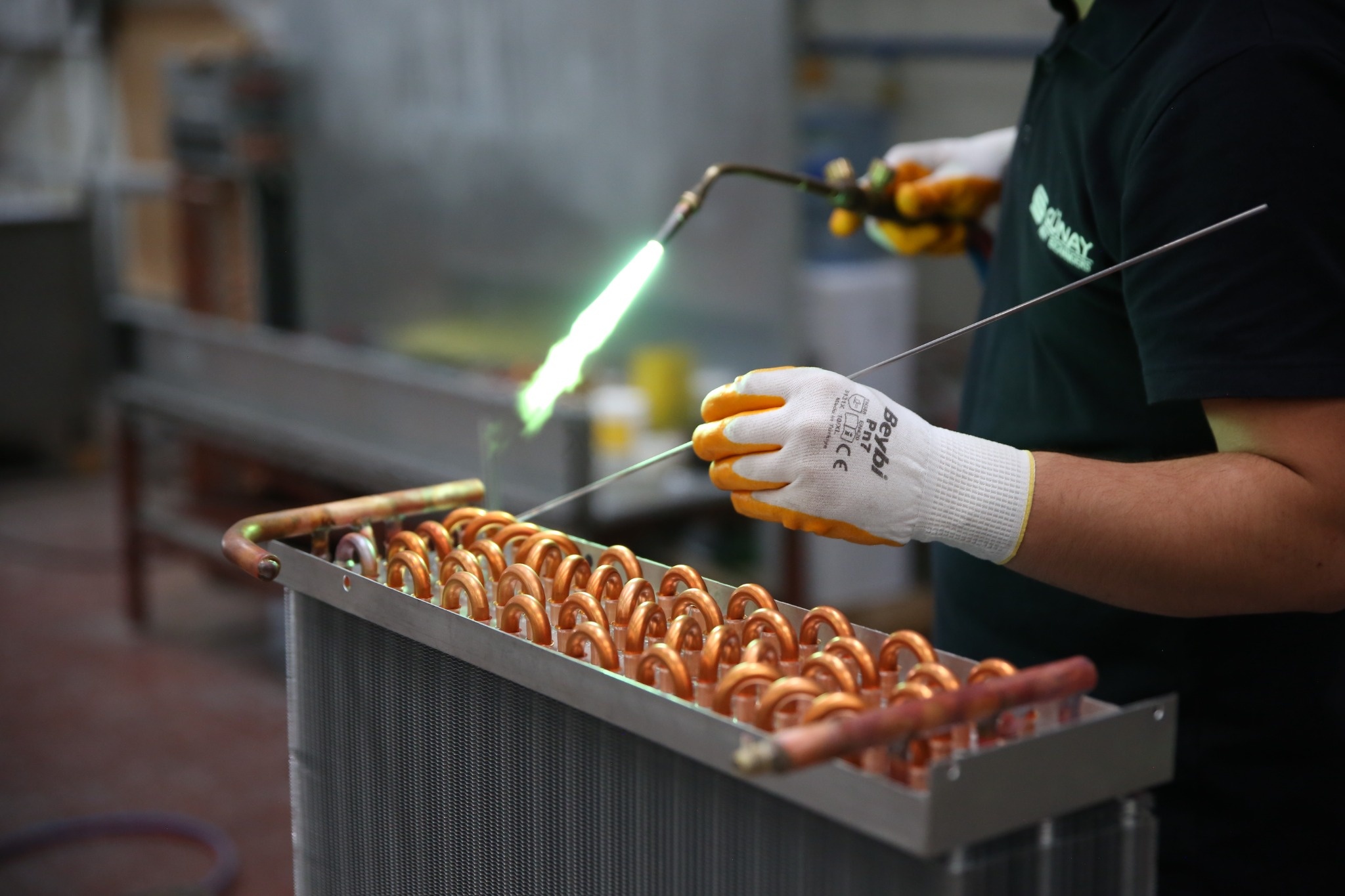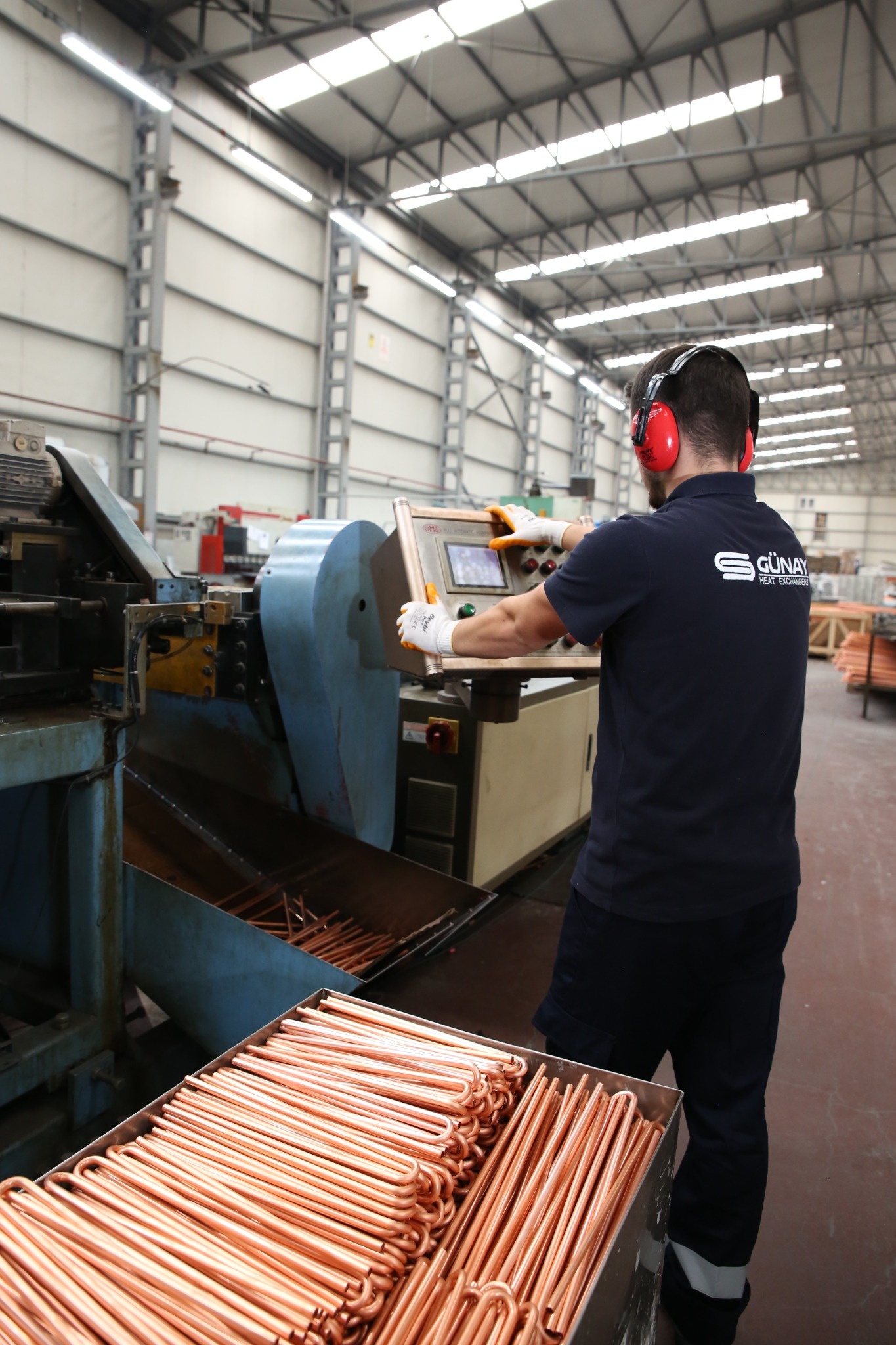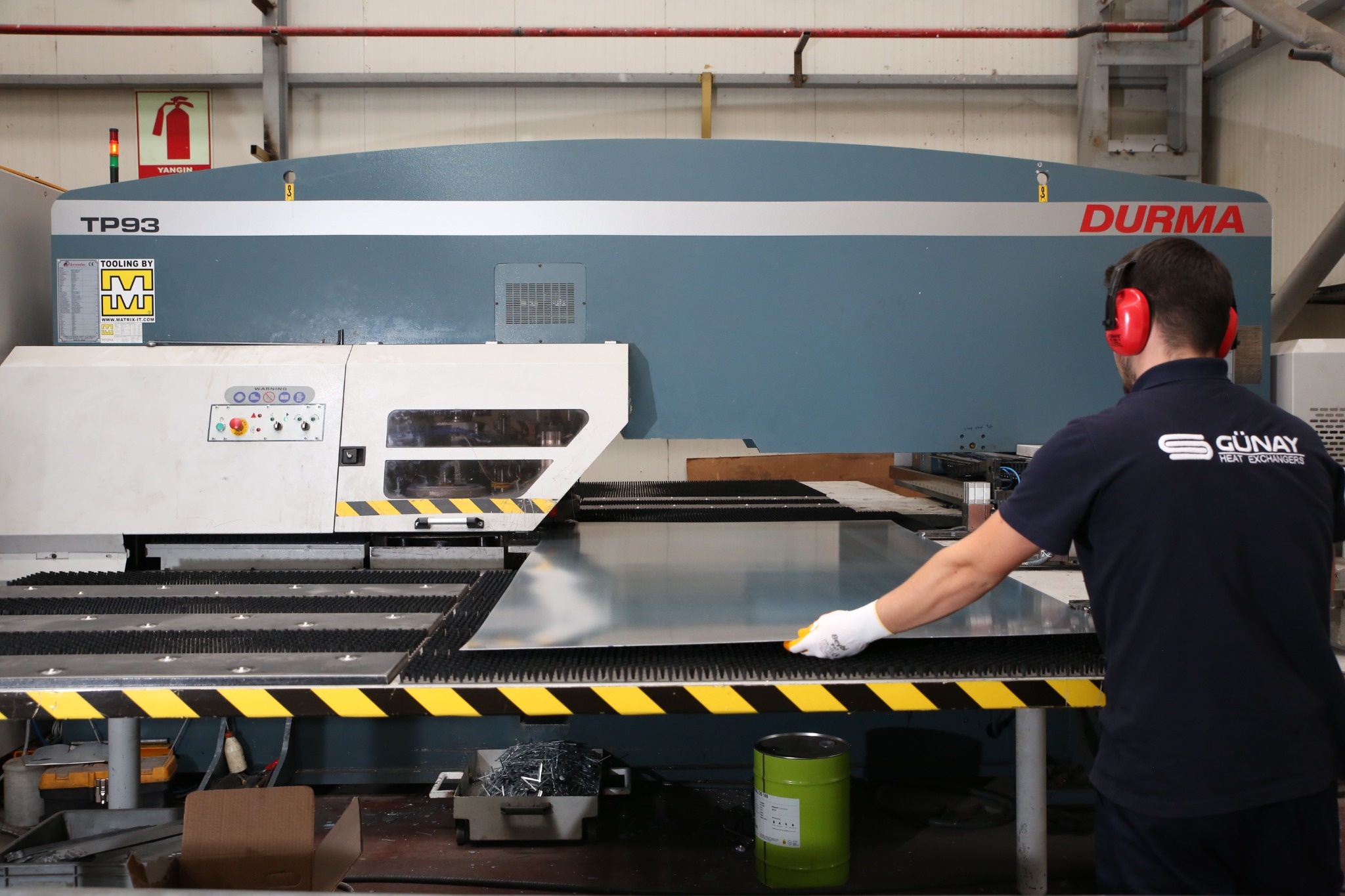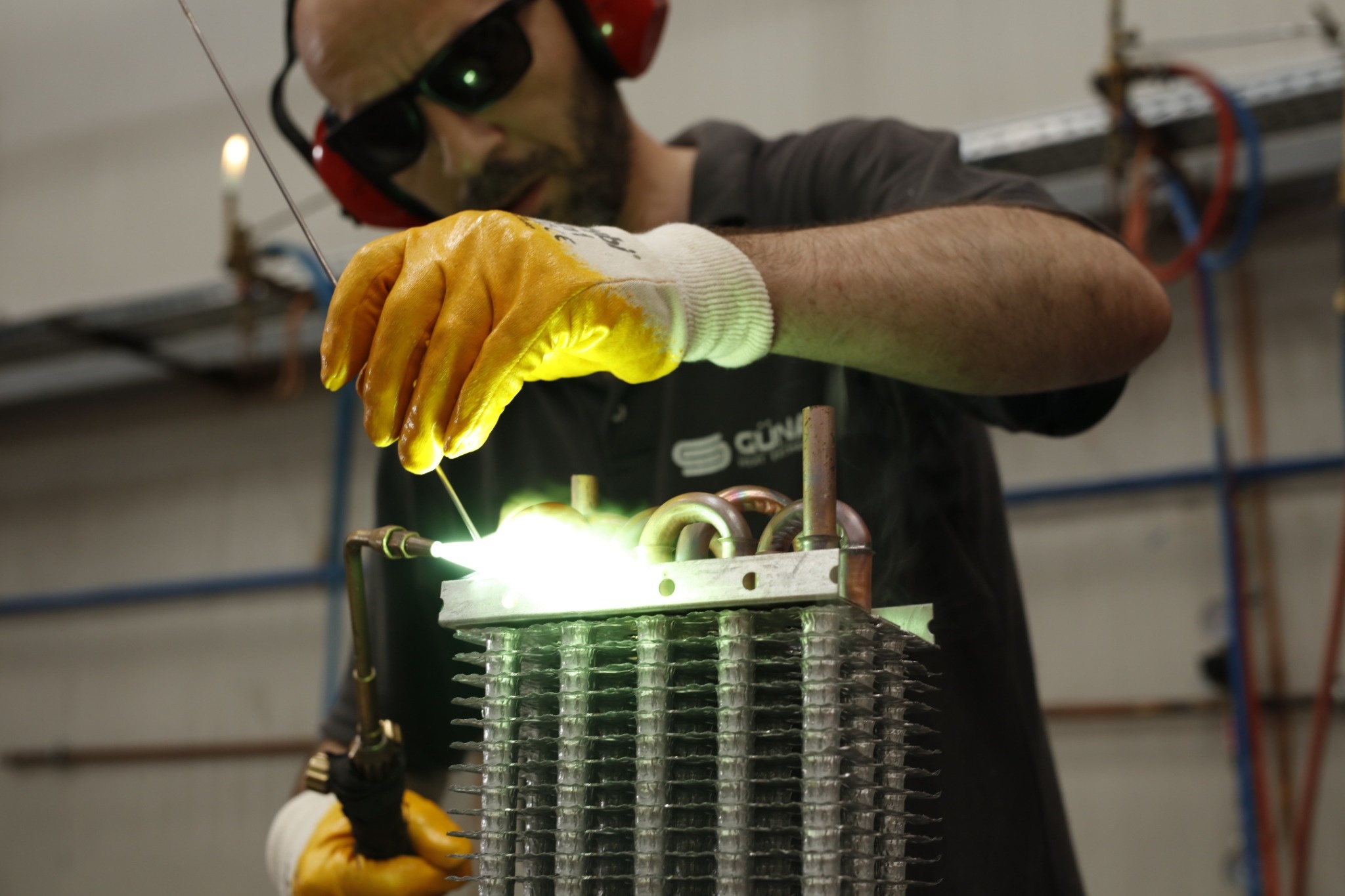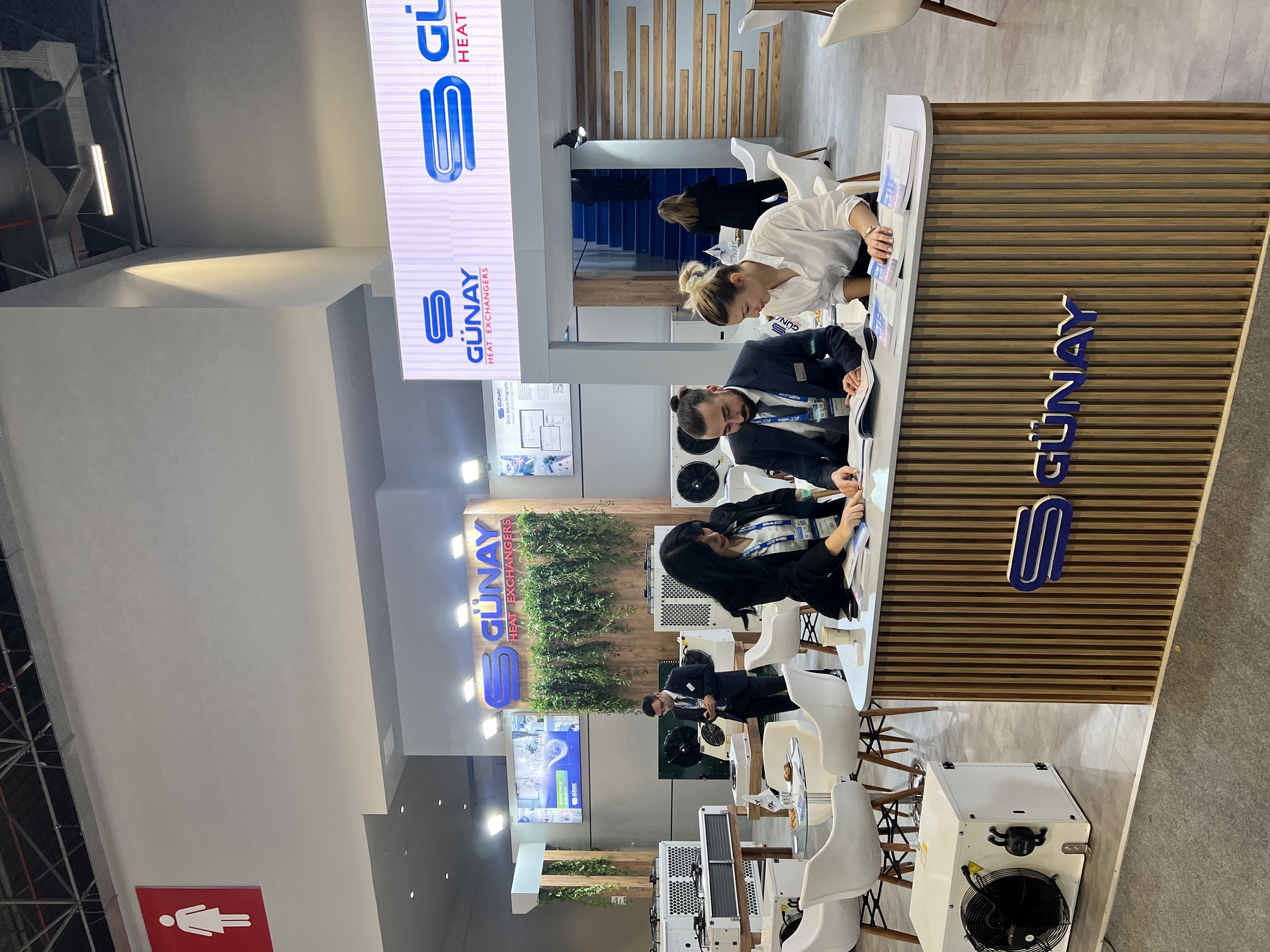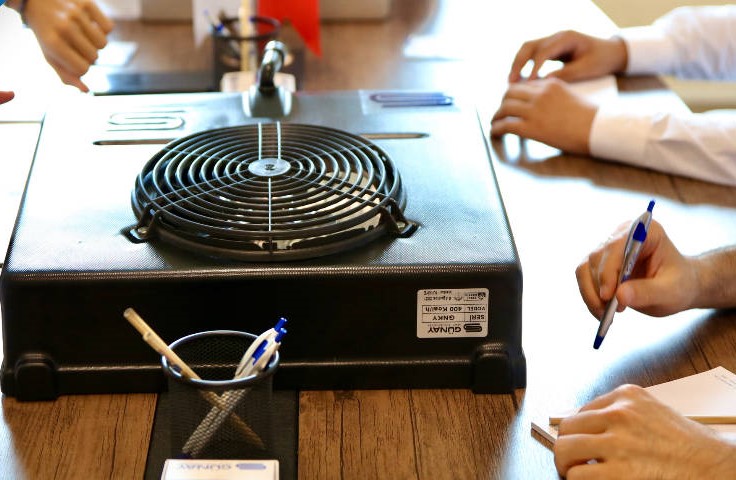At Günay Heat Exchangers, we work to protect natural resources and build a sustainable future. We focus on using eco-friendly practices and maximizing energy efficiency to reduce our impact on the environment. We aim to meet future needs today and add value to society and the environment, ensuring a sustainable life for future generations


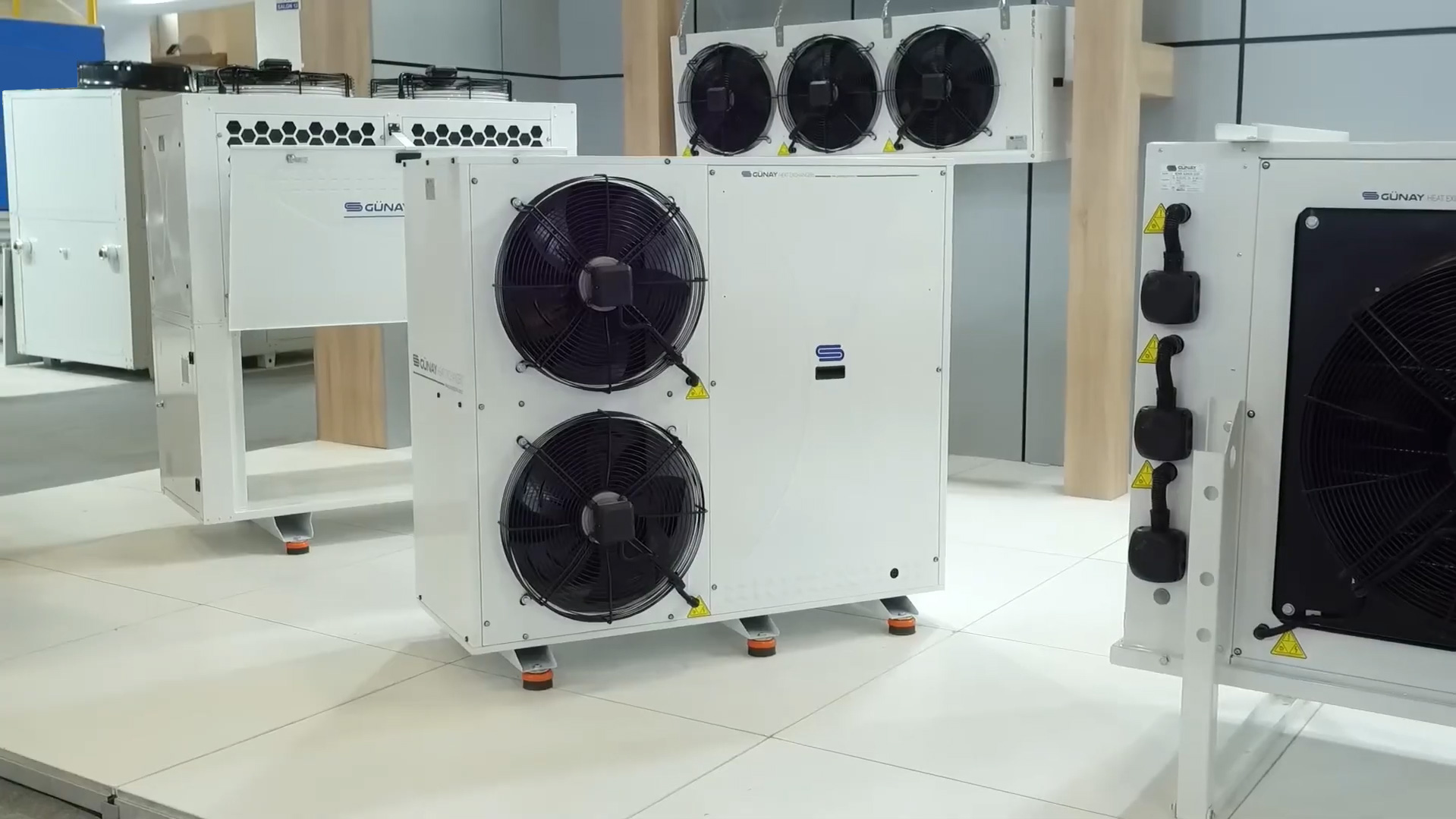
Your Global Solution Partner
We Offer Maximum Efficiency and Satisfaction to Our Customers with Our Services and Products at Global Standards.
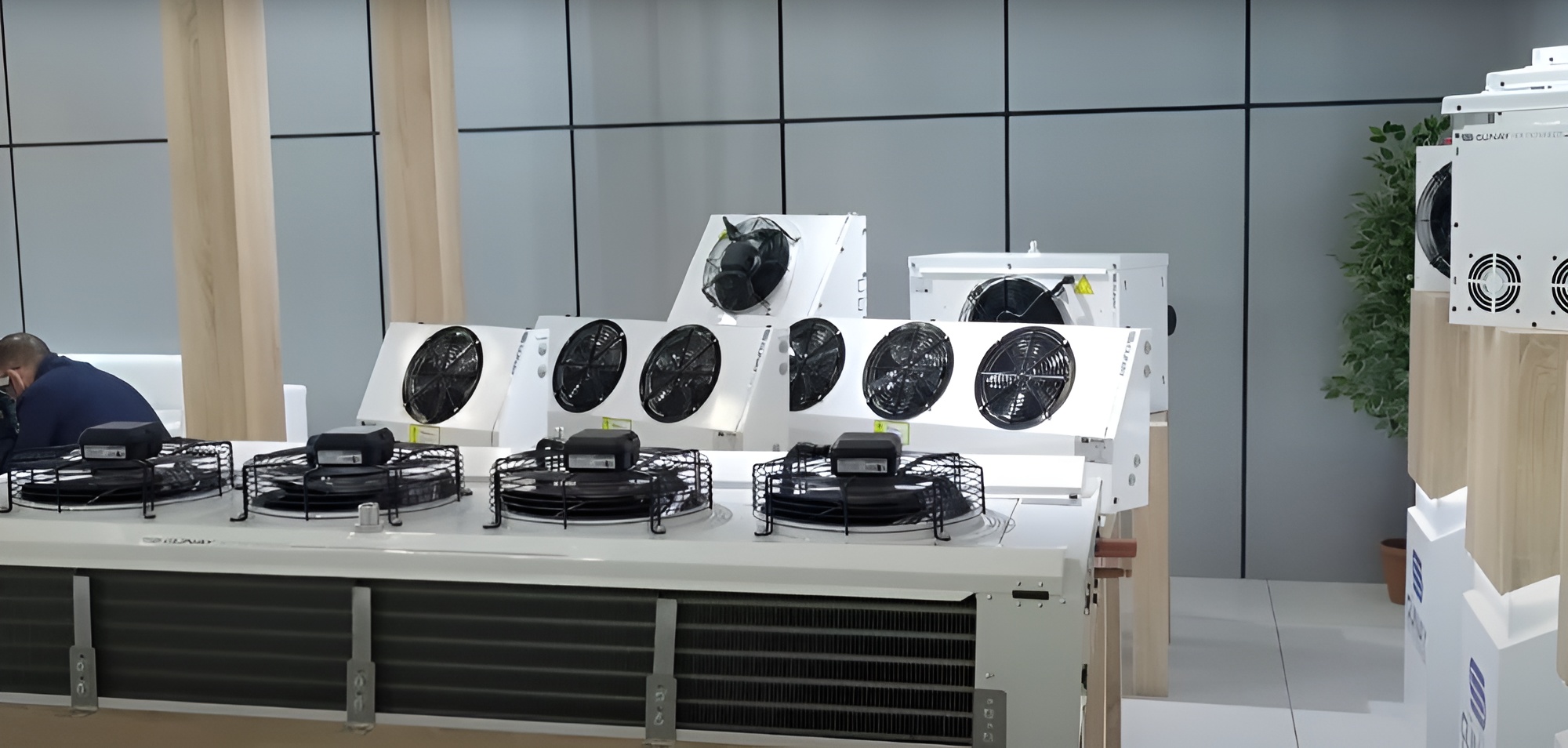
40+ Years of Experience Leading Solutions in Cooling and Heating Sector
Since its establishment in 1986, our company has been serving with serial and special production evaporators, condensers and heat exchangers.

Your Power in the Sector: Gunay Cooling
Since 1986, we offer innovative and customized solutions with our high quality in Evaporators, Condensers and Heat Exchangers. We are working for you with our continuously developing infrastructure and customer-oriented approach.
Innovative Cooling Solutions Offering High Efficiency
Since its establishment in 1986, our company has been offering evaporators, condensers, and heat exchangers both in mass production and as custom-made. Embracing both traditional and modern service approaches, Günay Heat Exchangers continues to evolve by constantly updating its infrastructure in line with industry innovations and customer expectations.
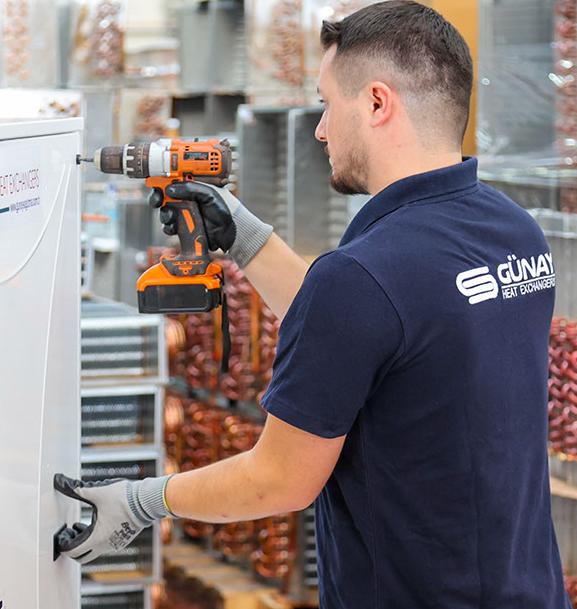
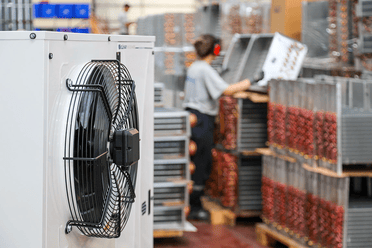
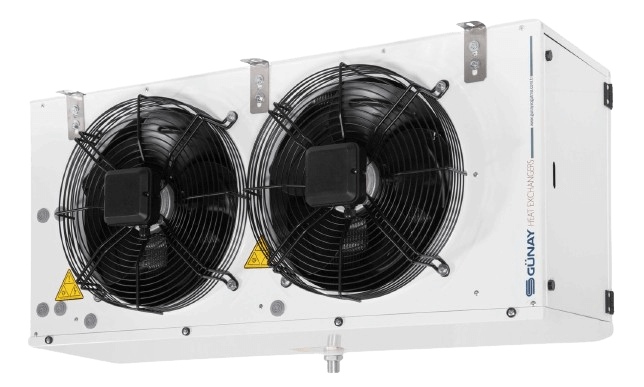
Evaporators
An evaporator is an essential component of cooling systems. Typically designed as a serpentine coil, it enables the refrigerant to evaporate and absorb heat from the surrounding environment. During this process, heat is transferred from the surroundings, thereby lowering the ambient temperature and achieving the desired cooling effect.
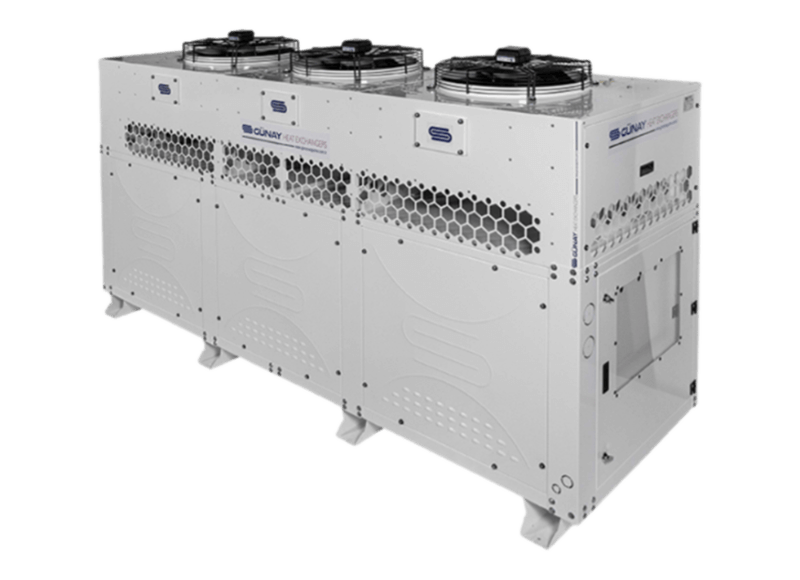
Condensers
The main function of a condenser is to condense the refrigerant gas into a liquid in the cooling cycle. During this process, the heat from the refrigerant gas is released to the surroundings, and the refrigerant condenses into a liquid form.
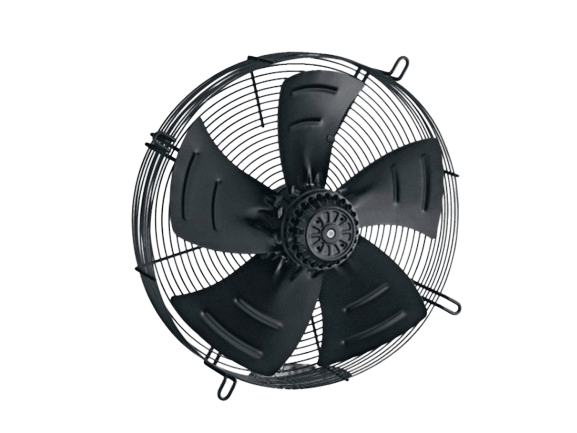
Axial Fans
Axial fans are designed to provide high airflow and play a critical role in industrial cooling solutions. These fans, which move air forward along the axis of the fan blades, are known for delivering high-volume airflow at low pressure. Thanks to these characteristics, they are an ideal solution for applications such as ventilating, cooling, or heating large areas.
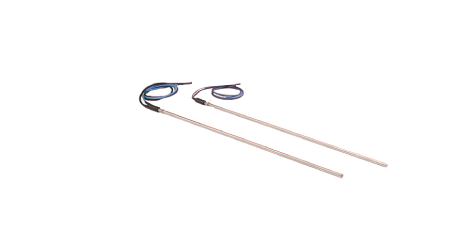
Resistances
Defrost is the process of melting frost and ice that accumulate on the surfaces of air coolers. In cold storage rooms, industrial kitchen sections, and similar areas where defrosting is needed, heaters provide suitable solutions for various heating requirements with different size and power options.
We Are With You Every Step of the Way
Safe Choice
0
+
Export to Countries
0
%
Customer Satisfaction
0
+
Employees
Branches
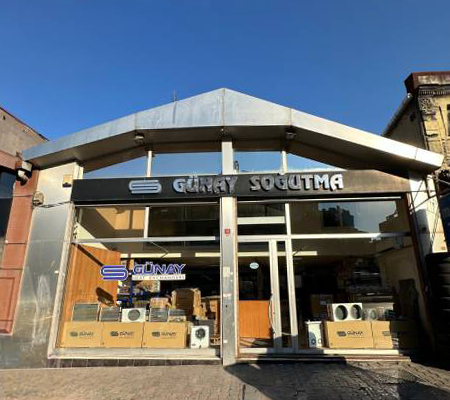
Kocatepe Mahallesi Irmak Cad. No:43-45 Beyoğlu Dolapdere/İstanbul
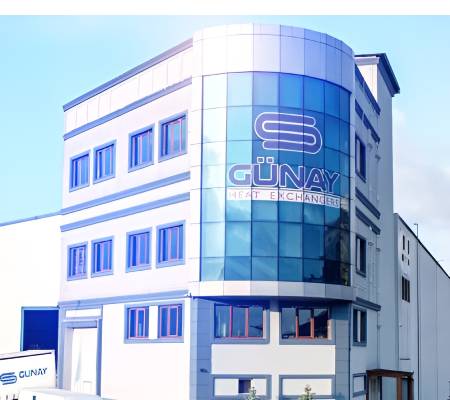
Yassıören Mahallesi Akpınar Sanayi Bölgesi Fırat Sokak No:6/1 Hadımköy-Arnavutköy/İstanbul
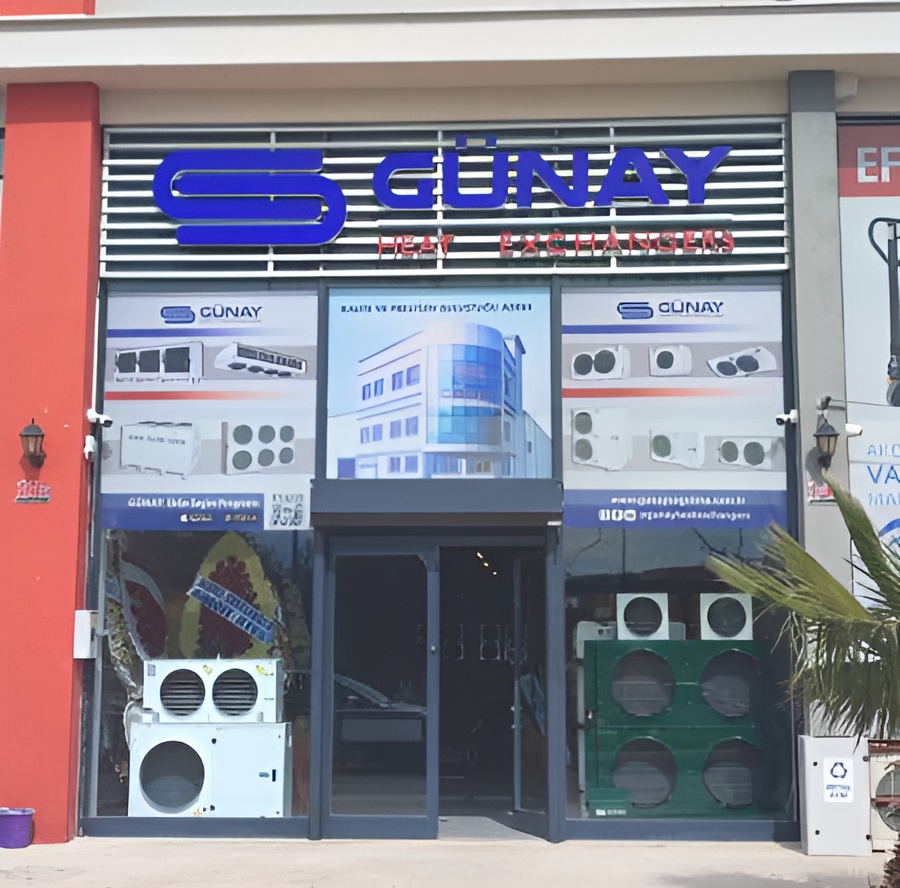
Beşkonaklılar Mahallesi Kırçiçeği Caddesi No:13E Corner City Plaza Kepez/Antalya
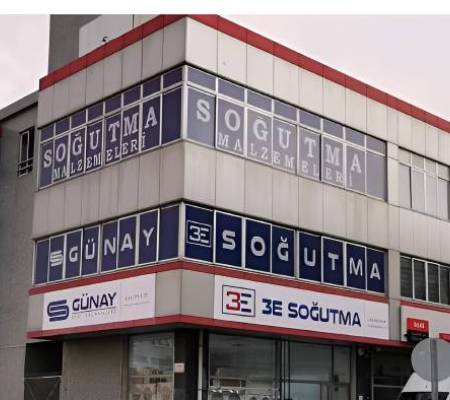
Barbaros Burak Reis Caddesi No:112 D:A, 35090 Bornova/İzmir
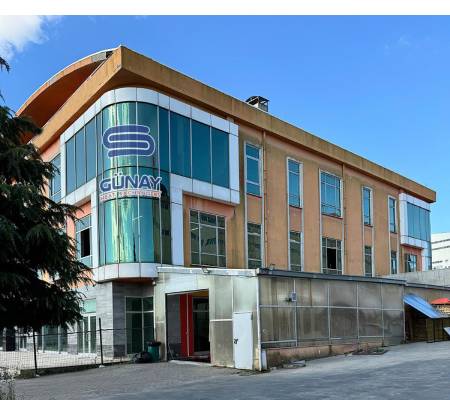
Yassıören Mahallesi Belde Sokak No:17 Hadımköy-Arnavutköy/İstanbul

Education Workshop
For More
Product Selection Program
Günay Heat Exchanger's Product Selection Program allows users to quickly and accurately select products such as evaporators, condensers, and heat exchangers. With its user-friendly interface and intelligent algorithm, it recommends the most suitable solutions for your industry and needs. As Günay Heat Exchanger, we are continuously enhancing the Product Selection Program to provide our customers with a superior experience and to simplify their work.
Blog
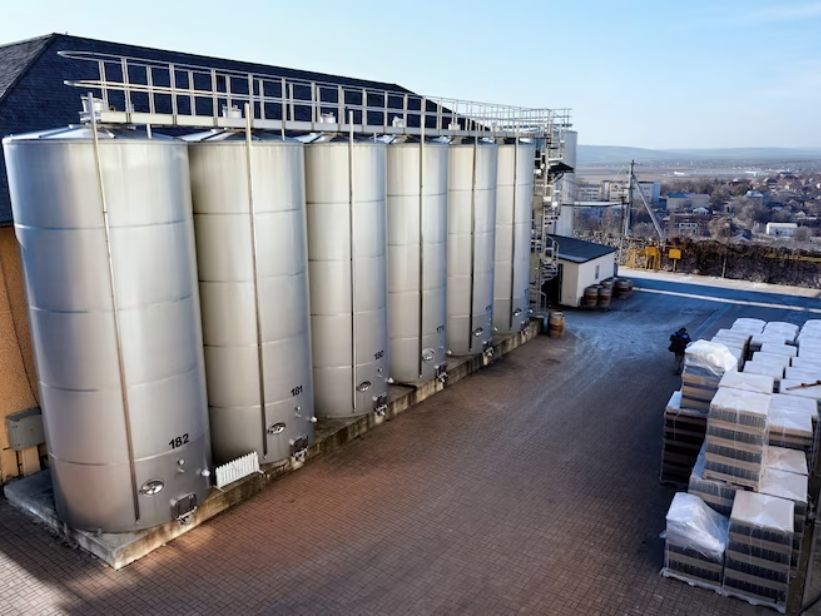
Energy Efficiency in Commercial Condensers: How Does It Reduce Operating Costs?
Table of Contents Why Has Energy Efficiency Become Critical? What Is the Role of Commercial Condensers? Effects of Efficient Condenser Design New Technologies Reducing Energy Consumption Maintenance Continuity and Its Impact on Performance Importance of Material Selection in Heat Transfer Smart Control Systems for Energy Savings How to Measure Cost Reduction with Efficiency Gains? Why Has Energy Efficiency Become Critical? For commercial enterprises, energy efficiency is no longer just a cost-saving tool but an operational necessity. As energy costs continue to rise, global regulations are increasingly focused on reducing carbon emissions. These pressures make it essential to adopt efficient systems, not only for environmental but also for economic sustainability. In particular, energy-intensive equipment like condensers in industrial cooling infrastructure is a primary focus due to their significant share of total operating costs. Transforming high-energy-consuming systems affects not only the direct costs reflected in bills but also the long-term competitiveness of a business. Low energy intensity facilitates compliance with environmental regulations and positions a company as a leader in sustainability policies. Facilities prioritizing energy efficiency also reduce their carbon footprint, meeting corporate social responsibility standards. In this context, redesigning or improving technical components like condensers becomes inevitable. What Is the Role of Commercial Condensers? Condensers are the most critical component in the refrigeration cycle, transferring heat to the external environment and significantly impacting the system’s thermal balance. These devices facilitate the conversion of refrigerant from gas to liquid, playing a direct role in energy efficiency. In commercial applications, these systems are designed for high capacity, long-term, and continuous operation. Thus, the condenser’s performance is directly tied to the efficiency of the entire refrigeration cycle. For businesses, a condenser’s ability to provide energy efficiency is not just a technical matter; it is directly linked to profitability. The more efficiently a condenser operates, the less strain it places on high-energy-consuming components like compressors. This reduces energy costs, extends equipment lifespan, and minimizes maintenance and repair expenses. The design, selection, and control of such a central component are therefore among strategic business decisions. Effects of Efficient Condenser Design Modern condenser designs offer significantly larger heat transfer surfaces and optimized airflow paths compared to traditional systems. These designs enable faster and more effective heat transfer, reducing the system’s energy demand. Achieving the same cooling capacity with less energy not only improves efficiency but also reduces thermal stress on components, extending lifespan and lowering fault risks. Additionally, low-pressure loss pipe structures and finned arrangements maximize the condenser’s contact with air. These advanced engineering solutions ensure the condenser maintains performance with minimal environmental impact. Supported by advanced fan control technologies, these designs significantly enhance not only cooling performance but also overall system stability. In short, an efficient condenser design reduces operating costs and maintenance needs in the long term, improving operational continuity. New Technologies Reducing Energy Consumption Next-generation technologies used in commercial condensers offer revolutionary solutions for reducing energy consumption. Variable-speed fan motors (EC fans) operate based on ambient temperature, preventing unnecessary energy use. Similarly, microprocessor-based control systems ensure the condenser operates only when needed and at the required level, addressing issues like overloading and excessive energy waste. Moreover, sensor-based monitoring systems allow continuous tracking of the condenser’s performance. These sensors analyze critical parameters like temperature, pressure, and humidity, enabling the system to self-adjust automatically. This achieves energy savings and allows the system to optimize itself without user intervention. In high-volume operations, these technologies have become strategic investments, significantly reducing annual energy consumption. Maintenance Continuity and Its Impact on Performance Energy efficiency is achieved not only through technology but also through regular and professional maintenance practices. Dirt, dust, and oil residues accumulating on the condenser significantly reduce heat transfer. This forces the system to operate longer and at higher power, increasing energy consumption. Simple measures like cleaning and periodic checks can prevent most of these losses. Additionally, imbalances in fan motors or blockages in pipes over time can undermine the system’s overall efficiency. In such cases, deviating from energy efficiency goals becomes inevitable. However, a maintenance schedule and inspections by expert teams can ensure the condenser operates close to its original performance. This achieves energy savings, prevents sudden failures, and ensures production continuity. Importance of Material Selection in Heat Transfer One of the most significant factors affecting a condenser’s energy efficiency is the thermal conductivity of the materials used. Copper, with its high thermal conductivity, is the most preferred material in condensers. However, more cost-effective alternatives like aluminum and special alloys are also used. Corrosion-resistant alloys, in particular, withstand outdoor conditions for extended periods, extending the system’s lifespan. Material selection should consider not only conductivity but also mechanical durability and ease of maintenance. Incorrect material choices can lead to rust, leaks, or performance degradation over time. This increases energy consumption and compromises system safety. Therefore, material selection for commercial systems should be treated as an engineering decision. Smart Control Systems for Energy Savings Smart control systems enable the condenser to operate dynamically based on environmental conditions. When ambient temperature drops, the system reduces fan motor speed, minimizing energy consumption. These systems respond instantly to temperature changes, preventing energy waste. They also analyze operational data to create more efficient operating scenarios. Additionally, smart systems offer remote monitoring and intervention, simplifying maintenance processes. The system alerts operators before performance degradation occurs, enabling preemptive action. This improves energy savings and prevents production interruptions. For large-scale commercial operations, smart condenser systems have become one of the most effective digital tools for energy management. How to Measure Cost Reduction with Efficiency Gains? The return on investment in condenser system efficiency can be measured through several key metrics. Reductions in electricity consumption, shorter operating times, and overall system performance stability are primary indicators. Additionally, lower annual maintenance costs and fewer faults directly reflect efficiency. These metrics clearly show the investment’s payback period. Moreover, efficiency investments provide more than just direct cost savings. Improved system reliability enhances product quality and customer satisfaction. Fewer failures and more stable operations increase predictability in operational planning. Combined, these factors transform energy efficiency into not only a technical advantage but also a strategic competitive edge.
Read More
Guide to Choosing the Best Condenser for Industrial Cooling Systems
Table of Contents Function of the Condenser in Industrial Cooling Systems Condenser Selection Based on System Type Comparison of Air-Cooled and Water-Cooled Condensers Impact of Capacity and Space Constraints Energy Efficiency-Focused Condenser Selection Role of Climate and Environmental Factors Condenser Materials and Durability Criteria Long-Term Benefits of Proper Condenser Selection Function of the Condenser in Industrial Cooling Systems The primary purpose of industrial cooling systems is to effectively remove heat generated during production or storage processes. In this process, the condenser serves as the critical component that transfers heat to the external environment, maintaining system balance. Improper selection of the condenser can lead to reduced cooling efficiency and excessive energy consumption. Particularly in large-scale industrial applications, the condenser’s performance directly impacts production quality and continuity. A condenser with inefficient heat transfer causes the system’s compressor to work harder, which not only increases energy costs but also stresses all system components, leading to potential failures. Therefore, in industrial facilities, the condenser must be selected not only based on its heat exchange capacity but also its compatibility with the entire system. Long-lasting, durable, and highly efficient condenser models directly influence the system’s sustainability and operational performance. Condenser Selection Based on System Type Industrial cooling systems can be configured differently based on the process type and environmental conditions. Therefore, condenser selection must be tailored to the specific system type. For instance, cold storage facilities in the food industry require a different condenser design, while systems used in metal processing plants need more durable and high-temperature-resistant models. Selection should consider the system’s capacity, cycle type (water/refrigerant/air), and operating ranges. Additionally, whether the system is stationary or mobile is a determining factor in the condenser structure. Mobile systems favor compact, lightweight, and easy-to-maintain condenser solutions. Stationary systems, however, prefer high-capacity condensers that can integrate with advanced control systems. Accurate analysis of these technical criteria is critical for establishing a long-lasting and efficient system. Comparison of Air-Cooled and Water-Cooled Condensers When selecting a condenser type in industrial systems, a thorough comparison between air-cooled and water-cooled systems is necessary. Air-cooled condensers stand out for their ease of installation and low maintenance costs, making them preferable in areas with limited water resources. However, these condensers typically require more space and may experience efficiency losses in hot weather conditions. Thus, they should be carefully evaluated for facilities in high-temperature environments. In contrast, water-cooled condensers offer higher cooling efficiency and compact sizes, providing space advantages. However, they require continuous water circulation, which can complicate maintenance processes. Factors like water quality, scaling, and corrosion risks are critical for the sustainability of these systems. Evaluating the advantages and disadvantages of both systems is key to making the right choice based on the facility’s physical conditions and budget. Impact of Capacity and Space Constraints One of the primary criteria for condenser selection in industrial systems is capacity requirements. The system’s required heat transfer rate directly determines the condenser’s size and technical specifications. However, high-capacity systems often require large spaces, which can create significant constraints in layout planning. Therefore, condensers must be chosen to provide sufficient cooling power while fitting within the available space. In cases of limited space, high-efficiency compact condensers or vertically arranged systems can be preferred. This allows installation without compromising system performance. Additionally, modular condenser systems offer scalability, aligning with the facility’s growth plans. When the space-capacity balance is properly established, system efficiency is maximized, and operating costs are minimized. Energy Efficiency-Focused Condenser Selection Today, one of the most prioritized criteria in condenser selection is energy efficiency. The energy consumption of a condenser system constitutes a significant portion of the cooling system’s total costs. Highly efficient condensers can deliver the same capacity with less energy, leading to substantial savings on energy bills. Technologies like EC fans, microchannel structures, and advanced control systems offer significant advantages in this regard. Energy efficiency is not only about direct consumption but also about the system’s overall operational balance. A low-efficiency condenser can strain other components, causing imbalances across the system. This increases maintenance costs and shortens system lifespan in the long term. Therefore, when purchasing a condenser, technical data such as energy class, COP (Coefficient of Performance), and heat transfer coefficient should be thoroughly examined. Role of Climate and Environmental Factors The climate characteristics of the region where the condenser will be installed are a critical factor in the selection process. Environmental variables such as temperature, humidity, wind direction, and air quality directly affect the condenser’s performance. For example, condensers operating in hot climates may require specialized fan designs and durable components resistant to high heat. Similarly, stainless materials should be preferred in high-humidity regions. A condenser that cannot adapt to environmental factors suffers efficiency losses over time, requires more frequent maintenance, and has a higher failure rate. This disrupts operational continuity and increases total ownership costs. Therefore, the condenser’s compatibility with environmental conditions and its protection against external factors are of critical importance. A properly configured condenser operates stably despite external conditions, providing reliability to the facility. Condenser Materials and Durability Criteria Materials used in condensers are crucial for ensuring long-term performance and resistance to environmental impacts. Metals with high conductivity, such as copper and aluminum, enhance heat transfer, improving system efficiency. However, for condensers operating outdoors, durable materials like galvanized steel or stainless alloys should also be considered to reduce corrosion risks and maintenance frequency. Details such as the quality of weld points, leak-proof pipe connections, and surface coatings also determine the condenser’s durability. In systems operating under harsh and prolonged conditions, certified and tested materials should be prioritized. Material quality affects not only the device’s lifespan but also the system’s safety and energy performance. Thus, material durability should be a key evaluation criterion alongside price during selection. Long-Term Benefits of Proper Condenser Selection Proper condenser selection may involve a higher initial investment but yields significant savings long-term. Low energy consumption, reduced maintenance needs, and high performance stability directly contribute to the operating budget. Additionally, the right choice ensures uninterrupted production processes, driving efficiency gains. Fewer failures also enhance operational safety. Moreover, energy-efficient condensers reduce carbon emissions, aligning with environmental sustainability goals and enhancing brand value. Compliance with regulations becomes easier, providing advantages during external audits. For these reasons, condenser selection should be treated not just as a technical decision but as a strategic investment.
Read More
Condenser Failures and Preventive Maintenance Strategies
Table of Contents Impact of Condenser Failures in Industrial Systems Common Condenser Failure Types and Symptoms Overheating Issues and Causes Risks Caused by Contamination and Blockages Fan Failures and Airflow Problems Measures Against Corrosion and Material Wear Importance of Periodic Inspection and Cleaning How to Create an Effective Preventive Maintenance Program? Impact of Condenser Failures in Industrial Systems In industrial cooling systems, the condenser is the balance point of the entire cycle. Therefore, any failure in the condenser directly affects system performance. Failures not only reduce cooling capacity but also cause disruptions in production processes and weaken the facility's overall efficiency. Condenser-related system failures often have a cascading effect, negatively impacting compressors, evaporators, and other components. Such systemic imbalances increase energy consumption and lead to rapidly rising operating costs. Moreover, sudden failures can extend downtime, resulting in significant losses, especially in time-sensitive industries. Thus, early detection of condenser failures and regular maintenance strategies play a critical role in the long-term sustainability of industrial operations. Common Condenser Failure Types and Symptoms Condenser failures can generally be categorized under specific types and manifest through early symptoms. Sudden drops in cooling efficiency, overheating of the condenser, irregular fan operation, or high noise levels are indicators of these issues. The most common problems include pipeline leaks, gas escapes, reduced heat transfer due to contamination, and fan motor failures. Many of these issues can be detected early with careful system observation. Additionally, pressure level imbalances may indicate that the condenser is clogged or covered with contamination. This causes the system to consume excessive energy, and overlooking the failure’s source can lead to more significant damage. Proper analysis of symptoms ensures accurate maintenance scheduling and prevents unexpected downtimes. Timely replacement of faulty parts also extends the system’s lifespan. Overheating Issues and Causes Overheating is one of the most significant failure causes directly threatening the condenser’s healthy operation. Insufficient heat dissipation by the refrigerant weakens the condensation process and increases compressor load. This leads to higher energy consumption, elevated system temperatures, and premature component wear. Overheating is often caused by inadequate airflow, fan failures, or dirty heat exchange surfaces. In systems where heat cannot be properly dissipated, temperatures can reach critical levels, causing the system to shut down automatically or fail. To prevent this, the airflow around the condenser must be consistent, fans must operate efficiently, and coil surfaces must be kept clean. In summer months or hot climates, ensuring temperature sensors function correctly is crucial. Risks Caused by Contamination and Blockages One of the most impactful external factors affecting condenser performance is the accumulation of dust, dirt, oil, and other particles over time. In air- or water-cooled condensers, this contamination clogs heat transfer surfaces. Blockages severely limit heat exchange and reduce the condenser’s capacity. Air-cooled condensers operating outdoors are particularly vulnerable to dust, leaves, and oil residues. Such contamination forces the system to expend more energy and eventually leads to failures. Contamination not only causes performance losses but also promotes rusting and wear in internal components. In condensers without regular cleaning, efficiency losses can reach up to 20%. Thus, periodic cleaning is one of the most effective pre-failure measures. Fan Failures and Airflow Problems Fans are among the essential components enabling the condenser to dissipate heat to the environment. Therefore, fan motor failures, blade damage, or balance issues directly impact the system’s overall efficiency. Fan failures typically manifest gradually through increased vibrations, noise, or reduced rotation speed. When these signs are observed, the fan system should be inspected promptly. Inadequate airflow prevents the condenser from dissipating heat, causing the system to overwork. In multi-fan systems, even a single fan failure can disrupt the entire system’s balance. Each fan should be individually checked to ensure synchronized operation. Regular cleaning of fans, lubrication of motor bearings, and tightening of connections help prevent fan-related failures. Measures Against Corrosion and Material Wear Environmental conditions where condensers operate can cause metal surfaces to oxidize and suffer corrosion over time. This issue is more common in systems operating near the sea or in high-humidity areas. Corrosion can occur not only on external surfaces but also inside pipes, severely impairing heat transfer. Advanced corrosion leads to pipe cracks and gas leaks, which become inevitable. Protective surface coatings, stainless materials, and water treatment systems can mitigate such wear. Regular inspections of the condenser’s outer casing and internal pipe structure are vital for early detection. Using anticorrosive chemicals and protecting the system from moisture enhance long-term durability. Combating corrosion is critical not only for performance but also for system safety. Importance of Periodic Inspection and Cleaning One of the most effective preventive maintenance methods is periodic inspection and cleaning. Regular inspection of the condenser enables early detection of potential failure symptoms. These inspections should evaluate pressure levels, temperature differences, fan functionality, gas leaks, and contamination levels. Keeping records of inspections aids in analyzing failure causes over time. Cleaning is particularly crucial for air-cooled condensers operating outdoors. Regular cleaning with water jets, chemical cleaners, or vacuum systems extends the condenser’s lifespan and boosts performance. Neglecting cleaning reduces heat transfer capacity and causes the system to operate under excessive load, increasing energy consumption and shortening component lifespan. How to Create an Effective Preventive Maintenance Program? To achieve long lifespan and high performance in condenser systems, a structured preventive maintenance program is essential. This program should clearly define inspection intervals, responsible personnel, checklists, and post-maintenance reporting processes. Weekly, monthly, and annual inspections can preemptively identify potential issues. Backup strategies for failure-prone parts should also be included. A preventive maintenance program requires support from both technical teams and management. Monitoring system performance, analyzing energy consumption data, and evaluating past failure records allow the maintenance strategy to be optimized over time. This approach not only prevents failures but also ensures production continuity and cost stability, enabling condenser systems to operate efficiently and safely for years.
Read More
Cooled vs. Water Cooled Condensers: Which one is more suitable for you?
Table of Contents How do air-cooled condensers work? How do water-cooled condensers operate? What are the advantages of air-cooled condensers? What are the benefits of water-cooled condensers? Which system is more energy efficient? What are the differences in maintenance costs? Which system is more environmentally friendly? How do installation processes differ? Which condenser is suitable for which industries? How do climate conditions affect the choice? Which system is more cost-effective? Which condenser should you choose? How Do Air-Cooled Condensers Work? Air-cooled condensers work by transferring heat to the surrounding air in cooling systems. The hot refrigerant gas from the compressor passes through the condenser’s tubes, where fans facilitate airflow, causing the gas to condense into a liquid. This process ensures the environment remains cool through heat transfer. Air-cooled condensers are notable for their compact structures and do not require a water source, making them popular in regions with limited water availability. Microchannel technology enhances energy efficiency by improving heat transfer in modern air-cooled condensers. Leading brands in the cooling industry develop these systems with features like noise reduction and durability. They are commonly used in commercial buildings, supermarkets, and small-scale industrial facilities. Air-cooled condensers stand out for their ease of installation and low initial costs. However, their efficiency may decrease in hot climates, as high ambient temperatures hinder heat transfer. Nonetheless, technological innovations continue to improve their performance, offering businesses both economic and practical solutions. How Do Water-Cooled Condensers Operate? Water-cooled condensers perform cooling by transferring heat to water. The hot gas from the compressor passes through the condenser’s tubes, where it comes into contact with water, transferring heat to it. This water is typically cooled through a cooling tower and recirculated into the system. High efficiency is the greatest advantage of water-cooled condensers, as water is a better heat conductor than air. These systems are particularly preferred in large-scale industrial facilities and data centers. Cooling towers are critical components for efficient operation. Leading brands in the cooling industry optimize these condensers for energy savings and longevity. Water-cooled systems provide consistent cooling performance, even in hot climates. However, they require additional costs for water usage and tower maintenance. They are more advantageous in regions with abundant water resources. These systems meet businesses’ needs for high energy efficiency and reliability, offering long-term savings. What Are the Advantages of Air-Cooled Condensers? Air-cooled condensers offer numerous advantages for businesses. One of their biggest benefits is that they do not require a water source, making them ideal for regions with limited water availability. Their ease of installation makes them attractive for small and medium-sized businesses. Low initial costs are a significant factor, especially for businesses with limited budgets. Air-cooled condensers typically feature compact designs, saving space. Microchannel technology increases energy efficiency, reducing operating costs. Leading brands in the cooling industry develop these systems with noise reduction and corrosion-resistant materials. Maintenance processes are simpler and more cost-effective compared to water-cooled systems, as they do not require additional components like cooling towers. However, their performance may decline in high ambient temperatures, which is a consideration in hot climates. Nonetheless, thanks to technological advancements, air-cooled condensers are widely used, from supermarkets to office buildings. These systems are a reliable choice for businesses seeking practicality and cost advantages. What Are the Benefits of Water-Cooled Condensers? Water-cooled condensers stand out for their high efficiency and are particularly preferred in large-scale applications. Thanks to water’s high thermal conductivity, these systems offer superior cooling performance and maintain consistent efficiency, even in hot climates. Energy efficiency is one of their greatest advantages; they consume less energy compared to air-cooled systems. This provides cost savings, especially in data centers and industrial facilities with high cooling demands. Leading brands in the cooling industry design these systems with durable and environmentally friendly materials. Water-cooled condensers operate more quietly and have lower vibration levels, enhancing user comfort. However, they require additional components like cooling towers and water treatment systems, which increase installation and maintenance costs. They are more advantageous in regions with abundant water resources. For businesses seeking high performance and energy savings, water-cooled condensers are a worthwhile long-term investment. Which System is More Energy Efficient? Energy efficiency is a critical factor in condenser selection. Water-cooled condensers generally offer higher energy efficiency because water is a better heat conductor than air. This is particularly advantageous in high-temperature environments or facilities with intensive cooling needs. The use of cooling towers optimizes energy consumption in water-cooled systems. However, these systems require more infrastructure due to additional components. On the other hand, air-cooled condensers have improved energy efficiency thanks to microchannel technology and variable-speed fans. Still, their performance may decline in hot climates, leading to higher energy consumption. Leading brands in the cooling industry develop innovative designs to maximize energy savings in both systems. For example, smart control systems optimize energy use in both types of condensers. Generally, water-cooled condensers are more efficient for large-scale applications, while air-cooled systems may be suitable for smaller businesses with less infrastructure. The choice depends on the business’s needs and budget. What Are the Differences in Maintenance Costs? Maintenance costs are an important criterion when choosing a condenser. Air-cooled condensers generally have lower maintenance costs because they do not require additional components like cooling towers or water treatment systems. Their simple designs make maintenance processes easier and allow technicians to intervene quickly. Routine tasks like fan and coil cleaning are typically low-cost. On the other hand, water-cooled condensers have a more complex structure. Maintenance of cooling towers, water treatment, and pipe cleaning increases costs. Regular testing is required to maintain the chemical balance of water, adding to expenses. Leading brands in the cooling industry use smart technologies to streamline maintenance processes for both systems. For example, IoT sensors can detect issues early, reducing maintenance costs. Air-cooled systems offer an economical option for small businesses, while water-cooled condensers provide long-term savings through high efficiency in large facilities. Maintenance budget and business needs will determine the choice. Which System is More Environmentally Friendly? Choosing an environmentally friendly cooling system is critical for sustainability goals. Water-cooled condensers consume less electricity due to their high energy efficiency, reducing their carbon footprint. However, water usage and chemical treatment processes can have environmental impacts. In regions with limited water resources, their environmental cost increases. Air-cooled condensers, on the other hand, require no water consumption, making them advantageous for water conservation. Environmentally friendly refrigerants are used in both systems to reduce the impact on the ozone layer. Leading brands in the cooling industry improve the environmental impact of both systems by using recyclable materials and energy-efficient designs. Air-cooled condensers may consume more energy in hot climates, increasing carbon emissions. Generally, water-cooled systems excel in energy efficiency, but air-cooled systems conserve water. The climate and water availability of the business’s location play a key role in determining the most environmentally friendly option. How Do Installation Processes Differ? Installation processes vary significantly between air-cooled and water-cooled condensers. Air-cooled condensers offer the advantage of simple installation, as they do not require additional infrastructure like water pipes or cooling towers. This reduces installation time and costs, making them ideal for small and medium-sized businesses. They can be installed in a suitable location and connected to electricity to operate. In contrast, water-cooled condensers require a more complex installation process. The installation of cooling towers, water pipes, and treatment systems is both time-consuming and costly. Leading brands in the cooling industry offer modular designs to simplify the installation of these systems. However, water-cooled systems are often preferred in large-scale facilities due to their high efficiency, making the extra effort worthwhile. Air-cooled condensers are advantageous in space-constrained areas, while water-cooled systems provide consistent performance. Installation budget and infrastructure availability will determine the choice. Which Condenser is Suitable for Which Industries? Different industries prefer air or water-cooled condensers based on their needs. The food industry, particularly cold storage and supermarkets, often uses air-cooled condensers due to their ease of installation and low maintenance costs. The pharmaceutical industry may opt for water-cooled condensers for their consistent performance in precise temperature control. Data centers, with high energy efficiency and continuous cooling needs, typically favor water-cooled systems. Industrial facilities benefit from water-cooled condensers for large-scale cooling demands. On the other hand, office buildings and small commercial spaces choose air-cooled condensers for their compact structures and low initial costs. Leading brands in the cooling industry offer tailored solutions to enhance the efficiency of both systems. For example, microchannel technology makes air-cooled condensers suitable for smaller businesses. Industry needs, budget, and environmental conditions determine the most appropriate condenser. How Do Climate Conditions Affect the Choice? Climate conditions significantly influence condenser selection. Air-cooled condensers are more efficient in temperate climates, where low ambient temperatures facilitate heat transfer. However, their performance may decline in hot and humid regions, increasing energy consumption. Water-cooled condensers offer consistent performance in hot climates, as water’s high thermal conductivity enables effective cooling regardless of ambient temperature. However, these systems rely on water availability, which can be an issue in arid regions. Leading brands in the cooling industry develop innovative solutions to adapt both systems to climate conditions. For example, variable-speed fans in air-cooled condensers improve efficiency in hot weather. Water recycling in water-cooled systems reduces environmental impacts. Businesses should consider their region’s climate and water resources when choosing. Climate is a critical factor for both energy efficiency and long-term costs. Which System is More Cost-Effective? Cost is an important criterion when selecting a condenser. Air-cooled condensers stand out for their low initial costs and simple installation processes. They do not require additional infrastructure like water sources or cooling towers, making them economical for small and medium-sized businesses. Maintenance costs are generally lower due to the absence of complex components. However, increased energy consumption in hot climates can affect long-term costs. Water-cooled condensers have higher initial costs due to the need for cooling towers and water treatment systems. Still, their high energy efficiency provides long-term savings, especially in large-scale facilities. Leading brands in the cooling industry use innovative technologies to reduce costs for both systems. For example, smart control systems optimize energy consumption, enhancing cost-effectiveness. The business’s budget, scale, and energy needs determine which system is more advantageous. Air-cooled systems are typically better for small businesses, while water-cooled systems suit large facilities. Which Condenser Should You Choose? The choice between air-cooled and water-cooled condensers depends on your business’s needs and conditions. Air-cooled condensers are ideal for small businesses and regions with limited water resources due to their ease of installation and low initial costs. Their compact designs save space, and maintenance processes are straightforward. However, efficiency losses may occur in hot climates. Water-cooled condensers, with their high energy efficiency and consistent performance, are suitable for large-scale facilities, data centers, and industrial applications. They are more advantageous in regions with abundant water resources but have higher installation and maintenance costs. Leading brands in the cooling industry offer environmentally friendly and innovative solutions for both systems. Your business’s climate conditions, budget, energy needs, and environmental goals should shape your decision. For example, if sustainability is a priority, water-cooled systems’ energy savings may be appealing. For small-scale businesses, air-cooled condensers are more practical. The right choice ensures long-term efficiency and cost savings.
Read More
Next Generation Commercial Condenser Technologies: Smarter and Sustainable Solutions
Table of Contents What are commercial condensers and what do they do? What do next-generation condenser technologies offer? How is energy efficiency improved? Why is sustainability important in condensers? How do smart technologies impact condenser performance? Which innovative materials are used? What role does IoT play in condenser systems? What is being done to reduce the carbon footprint? How are maintenance processes for commercial condensers simplified? Where are condenser technologies headed in the future? Which industries benefit from next-generation condensers? Why should you invest in next-generation condensers? What are commercial condensers and what do they do? Commercial condensers are considered the heart of cooling systems, removing heat from the environment to facilitate the cooling process. Typically used in commercial buildings, industrial facilities, and cold storage warehouses, these devices convert hot gas from the compressor into liquid, ensuring efficient system operation. Condensers provide energy efficiency and eco-friendly solutions, helping businesses reduce costs. Equipped with modern technologies, next-generation models offer high performance and durability. For instance, microchannel technology enhances heat transfer while reducing device size for space savings. These systems lower energy consumption, reducing businesses’ carbon footprint. Leading brands in the cooling industry ensure condensers are both environmentally friendly and cost-effective with innovative designs. Commercial condensers play a critical role in areas like food storage, pharmaceutical storage, and data centers. These devices support operational continuity while contributing to sustainability goals. With next-generation technologies, condensers are no longer just cooling components but also smart and eco-friendly solutions. What do next-generation condenser technologies offer? Next-generation condenser technologies are transforming the cooling industry with innovations focused on energy efficiency and sustainability. Compared to traditional models, these devices consume less energy and deliver higher performance. For example, variable-speed fans and smart control systems optimize energy use, reducing operating costs. Eco-friendly refrigerants minimize the impact of gases harmful to the ozone layer. Microchannel condensers stand out with their lighter and compact designs, increasing heat transfer efficiency. These technologies are revolutionizing commercial cooling systems. Innovations in the cooling industry make it easier for businesses to achieve both environmental and economic goals. Additionally, next-generation condensers enhance user comfort with features like noise reduction and vibration control. These devices are used in a wide range of applications, from data centers to supermarkets. Smart sensors and IoT integration enable real-time system monitoring, preventing failures. This allows businesses to achieve energy savings and long-term reliability. These innovations are driving the cooling industry toward a smarter and more eco-friendly future. How is energy efficiency improved? Energy efficiency is one of the most significant features of next-generation commercial condensers. These devices significantly reduce energy consumption with variable-speed compressors and optimized fan systems. Compared to traditional condensers, modern models can reduce energy use by up to 30%. Smart control systems automatically adjust operation based on environmental conditions, preventing unnecessary energy waste. For example, reducing fan speed at low temperatures saves energy. Microchannel technology delivers the same performance with less refrigerant, reducing both costs and environmental impact. Leading brands in the cooling industry develop innovative designs to enhance energy efficiency. Special coatings and high-efficiency tube designs improve heat transfer, enabling more cooling with less energy. Additionally, eco-friendly refrigerants support energy efficiency while reducing carbon emissions. These technologies help businesses lower energy bills, providing long-term savings. Ultimately, next-generation condensers offer a sustainable solution both economically and environmentally. Why is sustainability important in condensers? Sustainability is a top priority in the cooling industry today. Commercial condensers are designed to reduce environmental impact, offering businesses both a responsibility and an opportunity. Eco-friendly refrigerants protect the ozone layer while minimizing the carbon footprint. Next-generation condensers are manufactured with recyclable materials and energy-efficient designs. This reduces environmental impact during both production and operation. For example, microchannel technology delivers high performance with less material, supporting sustainability. Energy-saving smart systems help businesses meet environmental goals. The cooling industry plays a critical role in combating climate change, and sustainability is prioritized in condenser designs. Businesses investing in eco-friendly technologies comply with regulations and gain consumer trust. Sustainable condensers reduce energy costs while minimizing environmental impact. This provides significant advantages for industries like food, pharmaceuticals, and data centers. Next-generation condensers combine environmental responsibility with economic benefits. How do smart technologies impact condenser performance? Smart technologies are fundamentally transforming the performance of commercial condensers. IoT integration enables real-time monitoring and optimization of systems. Sensors collect data on temperature, humidity, and energy consumption, adjusting operations to meet system needs. This prevents energy waste and simplifies maintenance processes. For instance, when a fault is detected, the system automatically sends a warning, allowing issues to be resolved before they escalate. AI-supported control systems adjust fan speed or refrigerant flow based on environmental conditions, improving performance. These technologies ensure condensers are more durable and reliable. Smart systems reduce operating costs by enhancing energy efficiency. Leading brands in the cooling industry use IoT and AI to make condensers both eco-friendly and high-performing. These innovations create significant differences in energy savings and operational efficiency, especially in large-scale facilities. Smart condensers enable businesses to offer environmentally friendly and cost-effective solutions, providing a competitive edge. Which innovative materials are used? Next-generation commercial condensers are designed with innovative materials to enhance performance and sustainability. Microchannel aluminum tubes offer a lighter and more efficient alternative to traditional copper tubes. These materials improve heat transfer while requiring less refrigerant. Corrosion-resistant coatings ensure condensers remain long-lasting even in harsh weather conditions. Recyclable materials are increasingly preferred in production to reduce environmental impact. For example, aluminum alloys are both lightweight and eco-friendly. Leading brands in the cooling industry use these materials to enhance energy efficiency and reduce carbon footprints. High-strength composite materials provide additional benefits like vibration and noise reduction. These innovative materials enable the production of more compact and aesthetically pleasing designs. As a result, businesses achieve environmental goals while benefiting from more durable and efficient systems. These materials are shaping the future of cooling technologies. What role does IoT play in condenser systems? The Internet of Things (IoT) makes commercial condenser systems smarter and more efficient. IoT sensors continuously monitor parameters like temperature, pressure, and energy consumption, optimizing system performance. This data is transmitted to cloud-based platforms for analysis, providing businesses with real-time insights. For example, if a condenser shows an abnormal temperature increase, the IoT system sends immediate alerts, mobilizing maintenance teams. Data analytics optimize energy use, reducing costs and preventing failures. IoT integration enables remote control of condensers, offering operational convenience. Leading brands in the cooling industry leverage IoT technology to support proactive management. This is particularly critical in sensitive areas like data centers and cold storage. IoT also enhances energy efficiency, contributing to environmental sustainability. Businesses reduce maintenance costs and improve system reliability with this technology. Ultimately, IoT enables commercial condensers to achieve a smarter, more efficient, and eco-friendly future. What is being done to reduce the carbon footprint? Commercial condensers are equipped with innovative technologies to reduce the carbon footprint. Eco-friendly refrigerants replace traditional gases harmful to the ozone layer, significantly lowering emissions. Energy-efficient designs consume less electricity, reducing carbon emissions. For example, variable-speed fans and compressors optimize energy use, minimizing environmental impact. Microchannel technology reduces carbon footprint during production by using less material and refrigerant. Leading brands in the cooling industry prioritize sustainability with recyclable materials and renewable energy integration. IoT and AI-supported systems further reduce carbon emissions by preventing energy waste. These technologies help businesses comply with environmental regulations while building an eco-friendly image. In industries like food and pharmaceuticals, low-carbon condensers offer both environmental sensitivity and cost advantages. These innovations are driving the cooling industry toward a more sustainable future. How are maintenance processes for commercial condensers simplified? Next-generation commercial condensers are equipped with smart technologies and innovative designs to simplify maintenance processes. IoT sensors continuously monitor system performance, detecting potential issues early and sending real-time alerts to maintenance teams. This reduces unplanned downtime and lowers operating costs. Self-diagnostic systems analyze the condenser’s condition, automatically identifying maintenance needs. For example, issues like filter blockages or refrigerant leaks are instantly reported. Modular designs allow parts to be easily replaced, shortening maintenance time. Leading brands in the cooling industry make maintenance more accessible with user-friendly interfaces and remote access capabilities. These technologies enhance operational efficiency, especially in large-scale facilities. Energy-efficient systems operate with less wear and tear, reducing maintenance frequency. As a result, next-generation condensers enable businesses to manage maintenance processes faster, more cost-effectively, and in an eco-friendly manner, extending system lifespan. Where are condenser technologies headed in the future? Future commercial condenser technologies will be shaped by deeper integration of AI and IoT. Smart systems will self-learn based on environmental conditions, optimizing performance. Quantum computing will accelerate complex cooling simulations, enabling more efficient designs. Biodegradable materials and zero-emission refrigerants will nearly eliminate environmental impact. Condensers powered by renewable energy sources, such as solar or wind, will reduce energy costs. Leading brands in the cooling industry are focusing on developing eco-friendly and high-performance systems. For example, 5G technology will enable faster data transfer for real-time control of IoT devices. Augmented reality (AR)-supported maintenance systems will provide technicians with real-time guidance, speeding up processes. These innovations will make condensers more compact, quieter, and energy-efficient. In the future, condensers will not only be cooling devices but also integral parts of smart cities and sustainable ecosystems. Which industries benefit from next-generation condensers? Next-generation commercial condensers play a critical role in many industries. The food industry uses these technologies in cold storage and supermarkets to preserve product freshness. The pharmaceutical industry benefits from the high performance of condensers in storage areas requiring precise temperature control. Data centers, with their high energy consumption, rely heavily on energy-efficient condensers to reduce costs. These systems prevent server overheating while lowering energy expenses. The automotive industry uses next-generation condensers in cooling systems for electric vehicles. Commercial buildings and hospitals invest in these technologies for comfort and energy savings. Leading brands in the cooling industry offer tailored solutions, enhancing the versatility of condensers. For example, microchannel technology’s compact designs are ideal even for small-scale businesses. Sustainability and low carbon emissions help these industries meet environmental goals. Next-generation condensers drive a cross-industry revolution by improving operational efficiency and offering eco-friendly solutions. Why should you invest in next-generation condensers? Investing in next-generation commercial condensers offers both economic and environmental advantages for businesses. Energy efficiency, the primary appeal of these devices, can reduce energy bills by up to 30%. Smart technologies and IoT integration lower maintenance costs while extending system lifespan. Sustainability is a critical factor for businesses to meet environmental responsibilities. Eco-friendly refrigerants and recyclable materials reduce the carbon footprint, facilitating compliance with regulations. These technologies help businesses build an eco-friendly image with consumers. Leading brands in the cooling industry enhance operational efficiency with innovative designs. For example, microchannel condensers save space in facilities with their compact designs. In industries like food, pharmaceuticals, data centers, and automotive, these technologies deliver both cost savings and high performance. Next-generation condensers provide long-term return on investment while reducing environmental impact. Therefore, investing in these technologies is essential for businesses to gain a competitive edge and contribute to a sustainable future.
Read More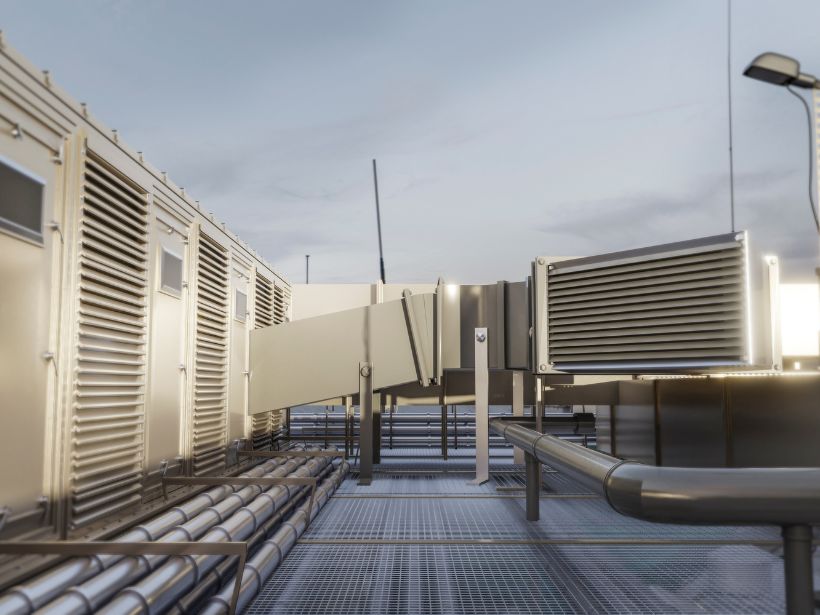
Evaporator Distributor
Evaporator Distributor: The Bridge to Cooling and Industrial Solutions An evaporator distributor is responsible for the supply, logistics, and distribution of evaporators, which are essential components in cooling systems and industrial processes. These distributors play a pivotal role in industries such as food and beverage, chemical, pharmaceutical, energy, and HVAC, providing high-quality products, timely delivery, and technical support to enhance business efficiency. An evaporator distributor serves as a bridge between manufacturers and end-users, ensuring the delivery of optimal cooling systems solutions. In this article, we will explore evaporator distribution processes, product varieties, technological innovations, key considerations for selecting a distributor, and sectoral applications in detail. Our aim is to provide comprehensive insights into evaporator distribution to help your business make informed supply chain decisions. What Does an Evaporator Distributor Do? An evaporator distributor facilitates the delivery of evaporators from manufacturers to customers. This role extends beyond mere product supply, encompassing technical consultation, inventory management, and after-sales services. Evaporators are critical devices used in refrigeration cycles or liquid concentration processes. Distributors select and stock the appropriate evaporator models based on customer needs and ensure timely delivery. For example, they may supply fan-driven evaporators for a food storage facility or corrosion-resistant tubular evaporators for a chemical plant. An evaporator distributor enables manufacturers’ products to reach broader markets, providing businesses with reliable and efficient solutions. Distributors typically collaborate with manufacturers adhering to international standards such as ISO 9001, CE, and ASHRAE. Evaporator Distribution Processes Evaporator distributor companies follow a structured process to ensure seamless product delivery to customers. This process includes the following key stages: Sourcing and Partnerships: Distributors establish agreements with reputable manufacturers to build their product portfolios. For instance, they may partner with leading brands like Alfa Laval or Güntner. Inventory Management: Evaporator models suited to various industries are stocked. Large storage capacities ensure rapid delivery. Customer Consultation: Distributors provide technical support to help customers select the right evaporator, offering advice on energy efficiency or material compatibility. Logistics and Delivery: Products are securely packaged and delivered on time. International shipping involves meticulous customs management. Quality Control: Distributors verify that products from manufacturers meet quality standards. After-Sales Services: Installation guidance, maintenance advice, and technical support enhance customer satisfaction. Market Analysis: Distributors track industry trends to keep their inventory and services up to date. These processes enable evaporator distributor companies to maintain a reliable supply chain. For example, companies like Frigo Block stand out with their extensive distribution networks. Types of Distributed Evaporators An evaporator distributor supplies a variety of evaporator types tailored to different industry needs. Below are the most common evaporator types and their distribution characteristics: Plate Evaporators: Used in food, pharmaceutical, and HVAC systems, valued for their compact design and high efficiency. Flash Evaporators: Ideal for liquid concentration in the food industry. Distributors prioritize models with high pressure resistance. Falling Film Evaporators: Designed for high-volume liquid concentration, commonly distributed for chemical processes. Fan-Driven Evaporators: Widely used in commercial refrigeration systems. Distributors focus on fan performance and energy efficiency. Tubular Evaporators: Preferred in petrochemical and energy sectors. Distributors select models with high thermal conductivity. Multi-Effect Evaporators: Known for energy-saving designs. Environmental sustainability is a key factor in distribution. Dry Expansion Evaporators: Suitable for systems requiring precise temperature control. Distributors emphasize models with sensor integration. This variety allows evaporator distributor companies to cater to diverse industries. Distributors focus on material quality and system performance when selecting products. Key Considerations When Choosing an Evaporator Distributor Selecting the right evaporator distributor is critical for your business’s operational success. A poor choice can lead to supply chain disruptions, substandard products, or increased costs. Here are the key criteria to consider when choosing a distributor: Reliability and Experience: The distributor’s industry experience and manufacturer references indicate trustworthiness. Distributors with over 30 years of experience are often preferred. Product Range: A broad evaporator portfolio ensures solutions for various needs. Fast Delivery: Strong inventory and logistics networks guarantee timely product delivery. Technical Support: Distributors should offer consultation for product selection and installation processes. Competitive Pricing: Distributors providing high-quality products at reasonable prices are advantageous for budget-conscious projects. After-Sales Services: Maintenance and technical support are vital for long-term customer satisfaction. Environmental Responsibility: Distributors offering low-GWP refrigerants and sustainable products support environmental goals. These criteria ensure your business partners with the most suitable evaporator distributor. Technological Innovations in Evaporator Distribution Evaporator distributor companies add value to customers through technological innovations. Here are the latest trends in evaporator distribution: Digital Inventory Management: IoT and AI-based systems optimize inventory tracking and demand forecasting. Eco-Friendly Products: Evaporators using low-GWP refrigerants (R1234yf, CO2) enhance compliance with environmental regulations. Fast Logistics Solutions: Automated warehousing and tracking systems reduce delivery times. Customized Solutions: Distributors offer evaporator models tailored to specific customer needs. Training and Consultation: Distributors provide training on energy efficiency and system optimization. Recycling Programs: Recycling old evaporators supports sustainability goals. Data Analytics: Analyzing customer demand helps refine inventory and distribution strategies. These innovations enhance the competitive edge of evaporator distributor companies. For example, distributors with international logistics networks offer rapid delivery advantages. Sectoral Applications of Evaporators Cooling systems are widely used across various industries, with evaporators forming their core. Below are the primary application areas for evaporators: Food and Beverage: Used for concentrating dairy products, fruit juices, and syrups. Chemical: Critical for the separation and concentration of chemical substances. Pharmaceutical: Used in drug production requiring precise temperature control. Energy: Essential for waste heat recovery and geothermal energy production. Wastewater Treatment: Multi-effect evaporators are used for wastewater concentration. HVAC Systems: Fan-driven evaporators are common in air conditioning and refrigeration units. Marine: Evaporators prevent spoilage in cold chain transportation. This wide range of applications requires evaporator distributor companies to provide industry-specific solutions. Quality and Reliability in Evaporator Distribution An evaporator distributor must ensure that its products meet quality standards. Evaporators compliant with ISO 9001, CE, and ASHRAE standards guarantee reliability. Distributors perform quality checks on products sourced from manufacturers to deliver high-performance solutions. For example, evaporators distributed for the food industry must comply with hygiene standards like FDA and HACCP.
Read More
Evaporator Producer
Evaporator Manufacturer: Leading Solutions in Cooling and Concentration Technologies An evaporator manufacturer designs, produces, and distributes evaporators, which are critical components in cooling systems and liquid concentration processes. These manufacturers play a vital role in industries such as food and beverage, chemical, pharmaceutical, energy, and wastewater treatment, offering energy-efficient, environmentally friendly, and high-quality products. An evaporator manufacturer delivers customized evaporators tailored to industrial and commercial needs, ensuring process optimization. In this article, we will explore evaporator production processes, the range of products offered, technological innovations, quality standards, and sectoral applications in detail. Our goal is to provide comprehensive insights into cooling systems and evaporator manufacturing to help your business select the most suitable solutions. What Does an Evaporator Manufacturer Do? An evaporator manufacturer designs and produces devices that facilitate heat transfer by evaporating a liquid substance or concentrating liquids. Evaporators are used in refrigeration cycles or industrial concentration processes. Manufacturers create standard or customized evaporators based on customer requirements, select appropriate materials, and optimize systems for energy efficiency and durability. For instance, in a food processing plant, an evaporator manufacturer may provide hygienic stainless steel plate evaporators for fruit juice concentration, while for a chemical facility, they might supply corrosion-resistant titanium evaporators. The production process includes design, material procurement, assembly, testing, and quality control. Manufacturers adhere to international standards (ISO 9001, CE, ASHRAE) to compete in global markets. Evaporator Production Processes Evaporator manufacturer companies follow a complex and precise process to produce high-quality evaporators. This process consists of the following key stages: Design and Engineering: Technical specifications are determined based on customer needs. Parameters such as heat transfer coefficient, material type, and system capacity are optimized through engineering calculations. Material Selection: High-quality materials like stainless steel, titanium, copper, or aluminum are chosen. For example, stainless steel is preferred for the food industry, while titanium is used for chemical processes. Production and Assembly: Evaporator components (plates, tubes, fans) are manufactured with precision machinery and assembled. Automation systems enhance production accuracy. Quality Testing: Produced evaporators undergo tests for leak-tightness, pressure resistance, heat transfer performance, and energy efficiency. Surface Treatments: Coatings or nanocoatings may be applied to enhance corrosion resistance. Packaging and Distribution: Evaporators are packaged for safe transport and delivered to customers. After-Sales Support: Manufacturers provide installation, maintenance, and technical support services to ensure customer satisfaction. These processes ensure that evaporator manufacturer companies deliver high-quality and durable products. For example, global leaders like Alfa Laval excel in plate evaporator production. Types of Evaporators and Production Features An evaporator manufacturer produces various evaporator types tailored to different industry needs. Below are the most common evaporator types and key production considerations: Plate Evaporators: Compact and highly efficient, these are used in food, pharmaceutical, and HVAC systems. Production emphasizes stainless steel plates and precise welding techniques. Flash Evaporators: Ideal for liquid concentration in the food industry. Production focuses on materials with high pressure resistance and corrosion protection. Falling Film Evaporators: Designed for high-volume liquid concentration. Tubes are optimized to create a thin liquid film during production. Forced Air (Fan) Evaporators: Used in commercial refrigeration systems. Fan integration and airflow optimization are critical in production. Tubular Evaporators: Preferred in petrochemical and energy sectors. Copper or steel tubes are processed for high thermal conductivity. Multi-Effect Evaporators: Incorporate multiple evaporation stages for energy savings. Production prioritizes energy-efficient designs. Dry Expansion Evaporators: Produced for systems requiring precise temperature control. Sensor and valve integration is carefully implemented during production. This diversity enables evaporator manufacturer companies to offer industry-specific solutions. Factors such as material quality, heat transfer surface design, and system pressure determine evaporator performance. Key Considerations When Choosing an Evaporator Manufacturer Selecting the right evaporator manufacturer is crucial for your business’s efficiency and long-term success. A poor choice can lead to low performance, high energy costs, or maintenance issues. Here are the key criteria to consider when choosing a manufacturer: Experience and Expertise: The manufacturer’s industry experience and references demonstrate reliability. For example, Frigo Block is recognized globally for its 35 years of expertise. Product Quality: Evaporators should meet international standards (ISO, CE) and offer high efficiency and durability. Customization Capabilities: The manufacturer should provide tailored designs, such as hygienic evaporators for the food industry. Technological Innovation: Manufacturers offering IoT integration, nanocoatings, or energy-efficient designs should be prioritized. After-Sales Services: Installation, maintenance, and 24/7 technical support are essential for customer satisfaction. Competitive Pricing: Manufacturers that maintain quality while offering cost-effective solutions are advantageous for budget-conscious projects. Environmental Responsibility: Manufacturers using low-GWP refrigerants and recyclable materials support sustainability goals. These criteria ensure your business partners with the most suitable evaporator manufacturer. Technological Innovations in Evaporator Manufacturing Evaporator manufacturer companies are driving industry advancements through technological innovations. Here are the latest trends in evaporator production: Energy Efficiency: Microchannel technology and multi-effect evaporators reduce energy consumption. Eco-Friendly Refrigerants: Low-GWP refrigerants like R1234yf and CO2 ensure compliance with environmental regulations. Smart Systems: IoT-based sensors enable remote monitoring and optimization of evaporator performance. Compact Designs: Plate and microchannel evaporators offer high efficiency in smaller footprints. Nanotechnology: Nanocoatings prevent corrosion and enhance heat transfer efficiency. Automation: AI-supported control systems improve production precision. Recycling: Recyclable materials and waste heat recovery promote sustainable production. These innovations enhance the competitive edge of evaporator manufacturer companies in the global market. For instance, companies like Güntner are recognized for their energy-efficient evaporators. Sectoral Applications of Evaporators Cooling systems are widely used across various industries, with evaporators forming their core. Below are the primary application areas for evaporators: Food and Beverage: Evaporators are used for concentrating fruit juices, dairy products, and sugar syrups. Chemical: Evaporators play a critical role in the separation and concentration of chemical substances. Pharmaceutical: Used in drug production requiring precise temperature control. Energy: Evaporators are essential for waste heat recovery and geothermal energy production. Wastewater Treatment: Multi-effect evaporators are used for wastewater concentration. HVAC Systems: Fan-driven evaporators are common in air conditioning and refrigeration units. Marine: Evaporators prevent spoilage in cold chain transportation. This wide range of applications requires evaporator manufacturer companies to develop industry-specific solutions. Evaporator Maintenance and Efficiency Evaporator systems can be affected by dust, dirt, corrosion, and scaling. Regular maintenance ensures system efficiency and reduces energy costs. Key maintenance steps include: Cleaning: Heat transfer surfaces should be cleaned regularly using chemical or mechanical methods. Corrosion Control: Protective coatings and material selection prevent corrosion. Refrigerant Monitoring: Proper refrigerant levels are critical for system performance. Sensor Calibration: Automated control systems should be regularly checked. Energy Analysis: Monitoring energy consumption helps implement efficiency-enhancing measures. These steps ensure that evaporator systems operate efficiently and have a long service life. Quality Standards in Evaporator Manufacturing An evaporator manufacturer must ensure that its products comply with international quality standards. ISO 9001, CE, ASHRAE, and food safety standards (FDA, HACCP) guide the production process. Quality control is applied at every stage, from material selection to final testing. For example, stainless steel evaporators for the food industry are produced in compliance with hygienic standards.
Read More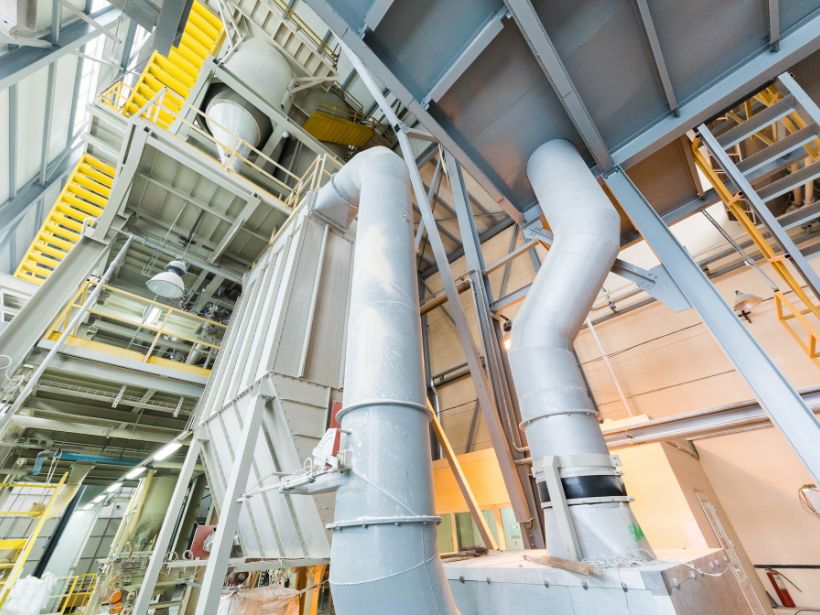
Industrial Evaporator
Industrial Evaporator: Efficient Cooling and Concentration Solutions for Industry An industrial evaporator is a cornerstone of large-scale cooling systems and liquid concentration processes. Playing a pivotal role in industries such as chemical, food, pharmaceutical, and energy, these devices deliver energy efficiency, environmental sustainability, and high performance. An industrial evaporator facilitates heat transfer by evaporating liquids, enabling process optimization. In this article, we will delve into the working principles, types, applications, design features, maintenance requirements, and industry trends of industrial evaporators. Our aim is to provide comprehensive insights into industrial cooling systems, helping your business identify tailored solutions for your needs. What Is an Industrial Evaporator and How Does It Work? An industrial evaporator is a heat exchanger that evaporates a liquid substance, absorbing heat from the environment or concentrating a liquid for industrial processes. This operation is integral to the refrigeration cycle or liquid concentration processes. The evaporator operates in a low-pressure environment, allowing a liquid refrigerant (or process fluid) to absorb heat and transition into a gaseous state. During this process, heat is transferred from the air, liquid, or gas in contact with the evaporator’s surface. For instance, in a food processing plant, an industrial evaporator concentrates liquids like fruit juice or milk, while in a chemical facility, it provides large-scale cooling. The design and material selection of the evaporator directly impact system efficiency and durability, making high-quality components essential for industrial applications. Types of Industrial Evaporators and Technical Specifications Industrial evaporators vary to meet the diverse needs of different sectors, with each type offering optimized technical specifications. Here are the most common industrial evaporator types and their key features: Plate Evaporators: Known for their compact design and high heat transfer efficiency, these are widely used in food, pharmaceutical, and chemical industries. Stainless steel plates ensure corrosion resistance and hygiene. Flash Evaporators: Effective for rapid concentration of high-viscosity liquids, commonly used in the food industry for products like sugar syrup or dairy. They offer high-pressure resistance. Falling Film Evaporators: These optimize heat transfer by creating a thin liquid film, ideal for concentrating large liquid volumes in power plants or wastewater treatment. Forced Circulation Evaporators: Designed for dense liquids or those prone to crystallization, these are prevalent in chemical and mining industries. Tubular Evaporators: Suitable for large-scale cooling or concentration processes, used in petrochemical and energy sectors. Copper or steel tubes provide high thermal conductivity. Natural Circulation Evaporators: Operating with low energy consumption, these are suitable for low-viscosity liquids, offering an economical solution in the chemical industry. Multi-Effect Evaporators: Utilizing multiple evaporation stages to save energy, these are common in food and pulp industries. This diversity allows industrial evaporator systems to be tailored to specific processes. Factors such as material selection (stainless steel, titanium, nickel alloys), heat transfer surface design, and operating pressure determine performance. For example, stainless steel is used in the food industry to meet hygiene standards, while titanium is preferred in chemical processes for corrosion resistance. Applications of Industrial Evaporators Industrial cooling systems and concentration processes are vital across various sectors, with industrial evaporators enhancing efficiency. Here are the primary application areas and examples: Food and Beverage Industry: An industrial evaporator is used to concentrate products like fruit juices, dairy, sugar syrups, and coffee extracts. For instance, multi-effect evaporators are preferred in milk powder production. Chemical Industry: Evaporators are employed for separation, concentration, or purification of chemical substances, such as acid or alkali solutions. Pharmaceutical Industry: Requiring precise temperature control, industrial evaporators are used in drug production, such as purifying active ingredients. Energy Sector: Evaporators play a key role in waste heat recovery or geothermal energy production, with falling film evaporators being common. Wastewater Treatment: Evaporators concentrate and recover industrial wastewater, with multi-effect systems offering energy savings. Pulp and Paper Industry: Evaporators are critical for concentrating black liquor, improving process efficiency. Petrochemical Industry: Tubular evaporators are used in refineries for liquid separation and concentration. This wide range of applications underscores the need for industrial evaporator systems to be customized for sector-specific requirements. For example, Frigo Block in Türkiye provides tailored evaporator solutions for the food and chemical industries. Key Considerations in Industrial Evaporator Design The design of an industrial evaporator must be optimized for a facility’s specific needs. Poor design can lead to energy losses, high maintenance costs, or process inefficiencies. Here are critical factors to consider during design: Material Selection: The chemical properties of the process fluid dictate corrosion resistance needs. Stainless steel, titanium, or nickel alloys are commonly used. Heat Transfer Efficiency: Surface design and flow arrangement impact the heat transfer coefficient. Plate or microchannel designs offer high efficiency. Energy Consumption: Multi-effect or forced circulation systems are optimized for energy savings. Capacity and Scalability: The evaporator must match the facility’s production capacity and be scalable for future needs. Maintenance Ease: Easy-to-clean designs are crucial, especially in food and pharmaceutical industries. Environmental Compliance: Low-GWP refrigerants and eco-friendly materials support sustainability goals. Automation and Control: IoT-based sensors and automated control systems enhance process monitoring and optimization. These factors ensure that industrial evaporator systems are high-performing and durable. For instance, Alfa Laval’s plate evaporators are renowned for their compact design and energy efficiency. Maintenance and Performance Optimization of Industrial Evaporators Evaporators in industrial cooling systems are susceptible to scaling, corrosion, dirt buildup, and other environmental factors. Regular maintenance preserves efficiency and reduces operating costs. Here are key maintenance steps: Surface Cleaning: Scale and dirt on heat transfer surfaces reduce efficiency. Chemical cleaning or high-pressure washing may be applied. Corrosion Control: Material selection and protective coatings prevent corrosion, but regular inspections are essential. Refrigerant Levels: Maintaining the correct refrigerant amount is critical for effective operation. Sensors and Control Systems: Automated sensors and control units require regular calibration. Energy Consumption Analysis: Monitoring energy usage enables efficiency-enhancing measures. Liquid Flow Control: In falling film or forced circulation systems, proper liquid flow must be ensured. Professional Support: Periodic inspections by expert technicians prevent system failures. These maintenance steps prolong the lifespan of an industrial evaporator. For example, regular maintenance of a multi-effect evaporator can reduce energy consumption by up to 25%. Innovations and Trends in Industrial Evaporators In recent years, industrial evaporator technologies have advanced with a focus on energy efficiency and sustainability. Here are key industry trends and future expectations: Energy Efficiency: Multi-effect evaporators and microchannel designs reduce energy consumption, lowering operating costs. Eco-Friendly Refrigerants: Low-GWP refrigerants like R1234yf and CO2 align with environmental regulations. Smart Automation: IoT-based control systems monitor and optimize evaporator performance. Compact Designs: Plate and microchannel evaporators deliver high efficiency in smaller footprints. Nanotechnology: Nanocoatings reduce corrosion and enhance heat transfer. Hybrid Systems: Evaporators powered by renewable energy sources are gaining traction in power plants. Recycling: Recyclable materials and waste heat recovery systems support sustainability goals. These trends position industrial evaporator systems at the forefront of global competition. For example, Günay Heat Exchangers stands out with its energy-efficient and eco-friendly evaporators. Energy Efficiency and Environmental Impact Industrial evaporators significantly influence energy consumption in cooling systems. A high-efficiency evaporator reduces process costs while minimizing environmental impact. Optimized surface designs and low-pressure drop configurations minimize energy use. Materials like stainless steel or titanium enhance heat transfer, enabling operation with less energy. Moreover, industrial evaporator systems using low-GWP refrigerants reduce carbon footprints. For instance, a food processing facility employing an energy-efficient evaporator can cut annual CO2 emissions by up to 20%.
Read More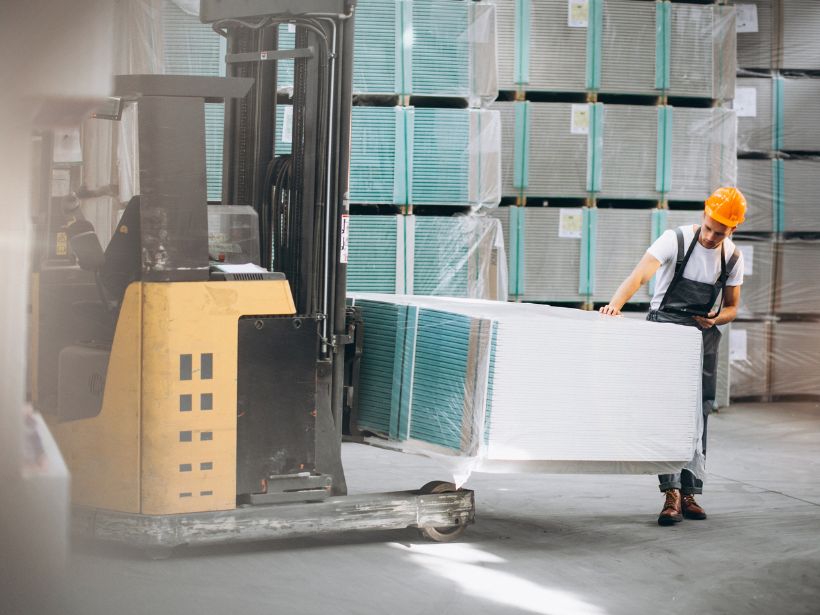
Evaporator Exporter
Evaporator Exporter: Your Global Provider of Cooling Technology Solutions The evaporator, a fundamental component of cooling systems, plays a critical role in both local and international markets. An evaporator exporter delivers these essential components to customers worldwide, offering energy-efficient, eco-friendly, and high-quality solutions. In this article, we will explore the working principles of evaporators, export processes, their types, global applications, key considerations for selecting an evaporator exporter, and innovative trends in international markets. Our goal is to provide comprehensive and up-to-date insights into cooling systems, helping your business identify the most suitable solutions for global markets. What Is an Evaporator and How Does It Work? An evaporator is a heat exchanger in cooling systems that enables the evaporation of liquid refrigerant, absorbing heat from the surrounding environment. This process cools the environment and is a core step in the refrigeration cycle. The evaporator allows low-pressure liquid refrigerant to absorb heat and transition into a gaseous state. During this process, heat is transferred from the air or liquid in contact with the evaporator’s surface. For example, in a refrigerator, the evaporator produces the cool air that keeps the interior chilled. Similarly, in an air conditioning unit, it cools warm air to create a comfortable indoor environment. The efficiency of an evaporator directly impacts the system’s overall performance, which is why an evaporator exporter focuses on exporting products that meet international standards, with high heat transfer coefficients and energy efficiency. Types of Evaporators and Export Characteristics Various types of evaporators are designed to meet specific application needs. An evaporator exporter evaluates this diversity to provide solutions tailored to the demands of global markets. Here are the most common evaporator types and their key export characteristics: Bare Tube Evaporators: Featuring a simple and cost-effective design, these evaporators are typically used in small-scale cooling systems. Ideal for household refrigerators, their affordability makes them popular in developing markets. Exporters prioritize cost-effective, standardized models for this category. Forced Air (Finned) Evaporators: Equipped with fans to rapidly circulate air, these provide uniform cooling. They are commonly used in commercial cooling systems, such as supermarket cold storage units. Exporters offer models optimized for fan integration and airflow efficiency. Plate Evaporators: Known for their compact design and high heat transfer efficiency, plate evaporators are popular in industrial applications requiring energy savings. Exporters supply stainless steel plate models that meet stringent global quality standards. Flash Evaporators: Designed for concentrating high-viscosity liquids, these are widely used in the food industry for processing fruit juices or dairy products. Exporters focus on models with high-pressure resistance and corrosion protection. Falling Film Evaporators: Ideal for concentrating large volumes of liquid, these create a thin liquid film to optimize heat transfer. Exporters provide energy-efficient models for large-scale applications. Dry Expansion Evaporators: These enable controlled refrigerant evaporation, suitable for systems requiring precise temperature control. Exporters supply models with integrated sensors and precision valves. Cellulosic Evaporators: These perform well in humid environments and are often used in marine or high-humidity industrial settings. Exporters source models with humidity-resistant coatings. This diversity enables an evaporator exporter to deliver solutions tailored to various global markets. In the export process, factors such as material quality (stainless steel, aluminum, or copper), heat transfer coefficient, system pressure, and refrigerant type significantly influence evaporator performance. For instance, stainless steel evaporators offer corrosion resistance, while copper tubes provide superior thermal conductivity. Evaporator Export Processes An evaporator exporter manages the process of delivering evaporators from manufacturers to international customers. This process typically includes the following stages: Market Analysis: The exporter analyzes the sectoral needs and technical requirements of target markets. For example, European markets demand high energy efficiency, while Asian markets may prioritize cost-effective solutions. Product Certification: Exported evaporators must comply with international standards (e.g., ISO 9001, CE, ASHRAE). Certification ensures reliability in global markets. Quality Control: Evaporators are tested for leak-tightness, pressure resistance, and heat transfer performance. Pre-export quality checks enhance customer satisfaction. Customs and Logistics: The exporter navigates customs procedures and optimizes logistics to ensure secure and timely delivery of products. Customer Support: Exporters provide technical support for installation, operation, and maintenance to international clients. For example, an evaporator exporter may guide clients on selecting energy-efficient models. These processes ensure that evaporators are exported in compliance with high-quality global standards. For instance, global exporters like Alfa Laval lead in supplying plate evaporator systems with efficient export management. Global Applications of Evaporators Cooling systems are widely used across various industries worldwide, and evaporators form the backbone of these systems. Here are the key industries and example applications where evaporators are essential in global markets: Domestic Cooling: Refrigerators and freezers rely on evaporators to maintain cold interiors. Energy-efficient evaporators are in high demand in European and North American markets. Commercial Cooling: Cold storage units, display cases, and beverage coolers in supermarkets use fan-assisted evaporators. Demand for these systems is growing in the Middle East and Africa. Industrial Cooling: Chemical, pharmaceutical, and food processing plants use evaporators for large-scale cooling and concentration processes. For example, South American food processing facilities require specialized evaporators. Air Conditioning Systems: Air conditioners and HVAC systems rely on evaporators to cool warm air. VRF systems are popular in the Asia-Pacific region. Food and Beverage Industry: Flash evaporators are used to concentrate liquids like fruit juices, dairy products, wine, and beer. These systems are prevalent in European and Australian markets. Marine and Transportation: Evaporators are critical in cold chain logistics, preventing spoilage during long-distance transport. Asia’s maritime sector shows significant demand for evaporators in reefer containers. Energy Production: Some power plants use evaporators to recover waste heat, improving energy efficiency. This is particularly relevant in Europe’s renewable energy-focused markets. This broad range of applications highlights the need for an evaporator exporter to provide solutions tailored to global market demands. For example, companies like Ahmet Yar in Türkiye export specialized evaporators for the food industry, addressing unique international needs. Key Considerations When Choosing an Evaporator Exporter Selecting the right evaporator exporter is critical for your business’s success in international markets. A poor choice can lead to energy losses, high costs, or delivery delays. Here are key factors to consider when choosing an exporter: Product Quality: Ensure the exporter provides high-efficiency, eco-friendly evaporators manufactured with cutting-edge technology. For example, Alfa Laval’s plate flash evaporators are recognized as a global quality benchmark. International Standards: Exported products must comply with standards like ISO 9001, CE, or ASHRAE. Customization Capabilities: Different markets have varying needs. The exporter should offer tailored solutions, such as custom evaporators for food processing plants. Logistics and Delivery: The exporter must have a robust logistics network to ensure secure and timely delivery. After-Sales Support: International clients require installation, maintenance, and repair services. Exporters offering 24/7 technical support are preferred. Market Experience: The exporter’s experience and references in target markets demonstrate reliability. For example, Frigo Block is recognized globally with 35 years of expertise. Competitive Pricing: Exporters offering competitive prices while maintaining quality have an edge, especially in developing markets. These criteria help you select an evaporator exporter that ensures success in global markets. Innovations and Future Trends in Evaporator Exports In recent years, evaporator exporter companies have focused on technological innovations and sustainability-driven solutions. Here are the latest trends and future expectations in evaporator exports: Energy Efficiency and Eco-Friendly Products: Next-generation evaporators consume less energy while delivering high performance. The use of low global warming potential (GWP) refrigerants like R32 and R1234yf is increasing. Smart Control Systems: IoT-enabled evaporators offer remote monitoring, data analytics, and automated optimization, particularly in demand in European markets. Compact and Modular Designs: Plate evaporators and flash evaporators occupy less space while maintaining high efficiency, ideal for Asia’s space-constrained facilities. Recycling and Sustainability: Exporters prioritize evaporators made with recyclable materials, such as stainless steel, to offer eco-friendly solutions. Artificial Intelligence and Automation: AI-based control algorithms optimize energy consumption and enhance performance. Hybrid Systems: Evaporators integrated with renewable energy sources, such as solar-powered cooling systems, are gaining traction in Africa. Nanotechnology Applications: Nanocoatings reduce corrosion on evaporator surfaces, improving heat transfer efficiency and longevity. These trends position an evaporator exporter at the forefront of global competition. For example, Günay Heat Exchangers stands out with its energy-efficient and sustainable solutions in international markets. Evaporator Maintenance and Performance Optimization Evaporators in cooling systems are susceptible to dust, dirt, corrosion, and other contaminants, which can reduce performance and increase energy consumption. Regular maintenance is essential for long-term efficiency and durability. Here are key maintenance steps for evaporators: Surface Cleaning: Dust and dirt buildup on evaporator surfaces reduces heat transfer efficiency. Periodic cleaning prevents performance losses. Sensor and Control System Checks: Evaporator sensors play a critical role in managing the refrigeration cycle. Faulty sensors can compromise system efficiency. Refrigerant Levels: Maintaining the correct refrigerant level is vital for optimal evaporator performance. Corrosion Prevention: Even with corrosion-resistant materials like stainless steel, regular corrosion checks are necessary. Professional Technical Support: Periodic inspections by expert technicians extend system lifespan. Energy Consumption Analysis: Monitoring evaporator energy usage helps optimize performance and reduce costs. Airflow Optimization: In fan-assisted evaporators, ensuring unobstructed airflow is critical for uniform cooling. These maintenance steps extend the lifespan of an evaporator and optimize energy costs. For example, regular maintenance of a plate evaporator can reduce energy consumption by up to 20%. Impact of Evaporators on Energy Efficiency Energy efficiency is a top priority in modern cooling systems design, and evaporators significantly influence overall energy consumption. A high-efficiency evaporator reduces operating costs and environmental impact. For instance, optimized heat transfer surfaces and low-pressure drop designs minimize energy usage. Materials like copper and aluminum enhance efficiency by improving heat transfer, allowing the system to operate with less energy. An evaporator exporter leverages innovative materials and designs to provide competitive advantages in global markets. For example, microchannel technology achieves higher heat transfer in smaller surface areas. Environmental Impact and Sustainability of Evaporators Today, evaporator exporter companies prioritize solutions that reduce environmental impact. Due to the global warming potential of refrigerants, low-GWP options like R1234yf and CO2 are becoming standard in next-generation evaporators. Additionally, the use of recyclable materials, such as stainless steel and aluminum, supports sustainability while ensuring durability. The energy efficiency of evaporators reduces carbon footprints, enabling businesses to meet environmental responsibilities. For example, a food processing plant using an energy-efficient evaporator can significantly lower its annual CO2 emissions.
Read More
Evaporator Supplier
Evaporator Supplier: Your Trusted Partner for Cooling System Solutions The evaporator, a cornerstone of cooling technologies, plays a vital role in both domestic and industrial applications. An evaporator supplier ensures the sourcing and distribution of these critical components, delivering energy-efficient, eco-friendly, and durable solutions. In this article, we will explore the working principles of evaporators, the supply chain processes, their types, applications, key considerations for selecting an evaporator supplier, and the latest industry trends. Our goal is to provide comprehensive and up-to-date insights into cooling systems, helping you identify the most suitable solutions for your business needs. What Is an Evaporator and How Does It Work? An evaporator is a heat exchanger in cooling systems that facilitates the evaporation of liquid refrigerant, absorbing heat from the surrounding environment. This process cools the environment and is a fundamental step in the refrigeration cycle. The evaporator allows low-pressure liquid refrigerant to absorb heat and transition into a gaseous state. During this process, heat from the surrounding air or liquid is transferred to the evaporator’s surface. For instance, in a refrigerator, the evaporator generates the cool air that keeps the interior chilled. Similarly, in an air conditioning unit, it cools warm air to provide a comfortable indoor environment. The efficiency of an evaporator directly impacts the system’s overall performance, which is why an evaporator supplier focuses on sourcing products with high heat transfer coefficients, durability, and energy efficiency. Types of Evaporators and Supply Characteristics Various types of evaporators are designed to meet specific application needs. An evaporator supplier evaluates this diversity to provide tailored solutions for different industries. Here are the most common evaporator types and their key supply characteristics: Bare Tube Evaporators: Featuring a simple and cost-effective design, these evaporators are typically used in small-scale cooling systems. Their low cost and easy maintenance make them ideal for household refrigerators. Suppliers prioritize cost-effective and standardized models for this category. Forced Air (Finned) Evaporators: Equipped with fans to circulate air rapidly, these provide uniform cooling. They are commonly used in commercial cooling systems, such as supermarket cold storage units. Suppliers offer models optimized for fan integration and airflow efficiency. Plate Evaporators: Known for their compact design and high heat transfer efficiency, plate evaporators are popular in industrial applications requiring energy savings. Suppliers provide stainless steel plate models that meet high-quality standards. Flash Evaporators: Designed for concentrating high-viscosity liquids, these are widely used in the food industry for processing fruit juices or dairy products. Suppliers focus on models with high-pressure resistance and corrosion protection. Falling Film Evaporators: Ideal for concentrating large volumes of liquid, these create a thin liquid film to optimize heat transfer. Suppliers offer energy-efficient models for large-scale applications. Dry Expansion Evaporators: These enable controlled refrigerant evaporation, suitable for systems requiring precise temperature control. Suppliers provide models with integrated sensors and precision valves. Cellulosic Evaporators: These perform well in humid environments and are often used in marine or high-humidity industrial settings. Suppliers source models with humidity-resistant coatings. This diversity enables an evaporator supplier to deliver industry-specific solutions. In the supply process, factors such as material quality (stainless steel, aluminum, or copper), heat transfer coefficient, system pressure, and refrigerant type significantly influence evaporator performance. For example, stainless steel evaporators offer corrosion resistance, while copper tubes provide superior thermal conductivity. Evaporator Supply Chain Processes An evaporator supplier manages the process of sourcing evaporators from manufacturers to end-users. This process typically includes the following stages: Needs Assessment: The supplier identifies the client’s industry-specific needs and technical requirements. For instance, the food industry may require evaporators with high corrosion resistance. Product Selection: The supplier selects evaporator models that align with the client’s needs, offering either standard or customized products. Quality Assurance: Supplied evaporators are tested for leak-tightness, pressure resistance, and heat transfer performance. Compliance with standards like ISO 9001 is verified. Logistics and Distribution: The supplier optimizes logistics to ensure timely and secure delivery of products. Technical Support and Consulting: Suppliers provide technical support for installation, operation, and maintenance. For example, an evaporator supplier may guide clients on selecting energy-efficient models. These processes ensure that evaporators are supplied to meet high-quality standards. For instance, global suppliers like Alfa Laval excel in providing plate evaporator systems with robust supply chain management. Applications of Evaporators Across Industries While cooling systems are often associated with household refrigerators and air conditioners, evaporators have a much broader range of applications. Here are key industries and example applications where evaporators are indispensable: Domestic Cooling: Refrigerators and freezers rely on evaporators to maintain cold interiors. Modern appliances use energy-efficient evaporators to reduce power consumption. Commercial Cooling: Cold storage units, display cases, and beverage coolers in supermarkets utilize fan-assisted evaporators to keep products fresh. Industrial Cooling: Chemical, pharmaceutical, and food processing plants use evaporators for large-scale cooling and concentration processes. For instance, pharmaceutical facilities require specialized evaporators for precise temperature control. Air Conditioning Systems: Air conditioners and HVAC systems rely on evaporators to cool warm air, ensuring comfortable indoor environments. VRF systems incorporate evaporators for enhanced energy efficiency. Food and Beverage Industry: Flash evaporators are used to concentrate liquids like fruit juices, dairy products, wine, and beer, maintaining product quality while optimizing energy use. Marine and Transportation: Evaporators are critical in cold chain logistics, preventing spoilage during long-distance transport. Reefer containers rely on evaporators for reliable cooling. Energy Production: Some power plants use evaporators to recover waste heat, improving energy efficiency and reducing environmental impact. This wide range of applications underscores the need for an evaporator supplier to provide solutions tailored to sectoral demands. For example, companies like Ahmet Yar in Türkiye supply specialized evaporators for the food industry, addressing unique industry needs. Key Considerations When Choosing an Evaporator Supplier Selecting the right evaporator supplier is critical for your business’s long-term success. A poor choice can lead to energy losses, high maintenance costs, or system failures. Here are key factors to consider when choosing a supplier: Product Quality: Ensure the supplier provides high-efficiency, eco-friendly evaporators manufactured with cutting-edge technology. For example, Alfa Laval’s plate flash evaporators are renowned for their compact design and energy savings. Customization Capabilities: Different industries have unique needs. The supplier should offer tailored solutions, such as custom evaporators for food processing plants to enhance product quality. After-Sales Support: Installation, maintenance, and repair services are essential for long-term evaporator performance. Suppliers offering 24/7 technical support should be prioritized. Energy Efficiency: With energy costs being a significant expense, energy-efficient evaporators provide long-term cost savings. References and Experience: A supplier’s past projects, client testimonials, and industry experience reflect its reliability. For example, Frigo Block, with 35 years of experience, is a leader in Türkiye’s cooling industry. Certifications and Standards: Verify that the supplier provides products compliant with international standards like ISO 9001, CE, or ASHRAE. Supply Chain Reliability: The supplier should have a robust logistics network to ensure timely and secure delivery of products. These criteria help you select an evaporator supplier that optimizes system performance for your specific needs. Innovations and Future Trends in Evaporator Supply In recent years, evaporator supplier companies have focused on technological innovations and sustainability-driven solutions. Here are the latest trends and future expectations in evaporator supply: Energy Efficiency and Eco-Friendly Products: Next-generation evaporators consume less energy while delivering superior performance. For instance, the use of low global warming potential (GWP) refrigerants like R32 and R1234yf is increasing. Smart Control Systems: IoT-enabled evaporators offer remote monitoring, data analytics, and automated optimization, reducing maintenance costs and preventing system failures. Compact and Modular Designs: Plate evaporators and flash evaporators occupy less space while maintaining high efficiency, ideal for facilities with spatial constraints. Recycling and Sustainability: Suppliers prioritize evaporators made with recyclable materials like stainless steel, which is both durable and environmentally friendly. Artificial Intelligence and Automation: AI-based control algorithms optimize energy consumption and enhance system performance. Hybrid Systems: Evaporators integrated with renewable energy sources, such as solar-powered cooling systems, are gaining traction. Nanotechnology Applications: Nanocoatings reduce corrosion on evaporator surfaces, improving heat transfer efficiency and longevity. These trends position an evaporator supplier at the forefront of global competition. For example, companies like Günay Heat Exchangers stand out with their focus on energy efficiency and sustainable solutions. Evaporator Maintenance and Performance Optimization Evaporators in cooling systems are susceptible to dust, dirt, corrosion, and other contaminants, which can reduce performance and increase energy consumption. Regular maintenance is essential for ensuring long-term efficiency and durability. Here are key maintenance steps for evaporators: Surface Cleaning: Dust and dirt buildup on evaporator surfaces reduces heat transfer efficiency. Regular cleaning prevents performance losses. Sensor and Control System Checks: Evaporator sensors play a critical role in managing the refrigeration cycle. Faulty sensors can compromise system efficiency. Refrigerant Levels: Maintaining the correct refrigerant level is vital for optimal evaporator performance. Incorrect levels can lead to system failures. Corrosion Prevention: Even with corrosion-resistant materials like stainless steel, regular corrosion checks are necessary. Professional Technical Support: Periodic inspections by expert technicians prevent potential issues and extend system lifespan. Energy Consumption Analysis: Monitoring evaporator energy usage helps optimize performance and reduce costs. Airflow Optimization: In fan-assisted evaporators, ensuring unobstructed airflow is critical for uniform cooling. These maintenance steps extend the lifespan of an evaporator and optimize energy costs. For example, regular maintenance of a plate evaporator can reduce energy consumption by up to 20%. Impact of Evaporators on Energy Efficiency Energy efficiency is a top priority in modern cooling systems design, and evaporators significantly influence overall energy consumption. A high-efficiency evaporator reduces operating costs and environmental impact. For instance, optimized heat transfer surfaces and low-pressure drop designs minimize energy usage. The choice of materials, such as copper or aluminum, also enhances efficiency by improving heat transfer, allowing the system to operate with less energy. An evaporator supplier leverages innovative materials and designs to provide competitive advantages. For example, microchannel technology in next-generation evaporators achieves higher heat transfer in smaller surface areas, ideal for compact systems. Additionally, evaporators with energy efficiency certifications, such as Energy Star, help businesses meet sustainability goals. Environmental Impact and Sustainability of Evaporators Today, an evaporator supplier prioritizes solutions that reduce environmental impact. Refrigerants used in cooling systems significantly affect global warming and the ozone layer. As a result, low-GWP refrigerants, such as R1234yf and CO2, are increasingly adopted in next-generation evaporators. Additionally, the use of recyclable materials like stainless steel and aluminum in production enhances sustainability while maintaining durability. The energy efficiency of evaporators also contributes to reducing carbon footprints. For example, a food processing plant using an energy-efficient evaporator can significantly lower its annual CO2 emissions, aligning with corporate sustainability objectives.
Read More
Evaporator Factory
Evaporator Factory: The Core of Cooling Technology Manufacturing The evaporator, a cornerstone of cooling technologies, plays a pivotal role in both domestic and industrial applications. An evaporator factory produces these critical components, delivering energy-efficient, eco-friendly, and durable solutions. In this article, we will explore the working principles of evaporators, their manufacturing processes, types, applications, key considerations for selecting an evaporator factory, and the latest technological trends. Our goal is to provide comprehensive and up-to-date insights into cooling systems, helping you identify the most suitable solutions for your business needs. What Is an Evaporator and How Does It Work? An evaporator is a heat exchanger in cooling systems that facilitates the evaporation of liquid refrigerant, absorbing heat from the surrounding environment. This process cools the environment and is a fundamental step in the refrigeration cycle. The evaporator allows low-pressure liquid refrigerant to absorb heat and transition into a gaseous state. During this process, heat from the surrounding air or liquid is transferred to the evaporator’s surface. For instance, in a refrigerator, the evaporator generates the cool air that keeps the interior chilled. Similarly, in an air conditioning unit, it cools warm air to provide a comfortable indoor environment. The efficiency of an evaporator directly impacts the system’s overall performance, which is why an evaporator factory focuses on producing designs with high heat transfer coefficients, durability, and energy efficiency. Types of Evaporators and Manufacturing Features Various types of evaporators are designed to meet specific application needs. An evaporator factory optimizes this diversity to offer tailored solutions for different industries. Here are the most common evaporator types and their manufacturing characteristics: Bare Tube Evaporators: Featuring a simple and cost-effective design, these evaporators are typically used in small-scale cooling systems. Their low cost and easy maintenance make them ideal for household refrigerators. Manufacturing often involves copper or aluminum tubes. Forced Air (Finned) Evaporators: Equipped with fans to circulate air rapidly, these provide uniform cooling. They are commonly used in commercial cooling systems, such as supermarket cold storage units. Manufacturing focuses on fan integration and airflow optimization. Plate Evaporators: Known for their compact design and high heat transfer efficiency, plate evaporators are popular in industrial applications requiring energy savings. Manufacturing involves stainless steel plates and precision welding techniques. Flash Evaporators: Designed for concentrating high-viscosity liquids, these are widely used in the food industry for processing fruit juices or dairy products. Manufacturing emphasizes high-pressure resistance and corrosion protection. Falling Film Evaporators: Ideal for concentrating large volumes of liquid, these create a thin liquid film to optimize heat transfer. Manufacturing involves high-quality tubing systems and energy-efficient designs. Dry Expansion Evaporators: These enable controlled refrigerant evaporation, suitable for systems requiring precise temperature control. Manufacturing includes precise valve systems and sensor integration. Cellulosic Evaporators: These perform well in humid environments and are often used in marine or high-humidity industrial settings. Manufacturing incorporates humidity-resistant coatings. This diversity enables an evaporator factory to deliver industry-specific solutions. Manufacturing considerations, such as material selection (stainless steel, aluminum, or copper), heat transfer coefficient, system pressure, and refrigerant type, significantly influence evaporator performance. For example, stainless steel evaporators offer corrosion resistance, while copper tubes provide superior thermal conductivity. Manufacturing Processes in Evaporator Factories An evaporator factory manages a complex process from design to production. This process typically includes the following stages: Design and Engineering: Custom designs are developed based on client needs. CAD software and simulation tools are used to optimize heat transfer and energy efficiency. Material Selection: Corrosion-resistant and high-conductivity materials, such as stainless steel or copper, are chosen. Material quality directly affects product longevity and performance. Fabrication: Precision welding, tube bending, and plate assembly are performed to high standards. Testing and Quality Control: Manufactured evaporators undergo tests for leak-tightness, pressure resistance, and heat transfer performance. Compliance with standards like ISO 9001 is verified. Automation and Smart Manufacturing: Modern evaporator factory facilities use robotic arms and IoT-based production lines to enhance efficiency. These processes ensure that evaporators meet high-quality standards. For instance, global companies like Alfa Laval lead in plate evaporator systems with advanced manufacturing technologies. Applications of Evaporators Across Industries While cooling systems are often associated with household refrigerators and air conditioners, evaporators have a much broader range of applications. Here are key industries and example applications where evaporators are indispensable: Domestic Cooling: Refrigerators and freezers rely on evaporators to maintain cold interiors. Modern appliances use energy-efficient evaporators to reduce power consumption. Commercial Cooling: Cold storage units, display cases, and beverage coolers in supermarkets utilize fan-assisted evaporators to keep products fresh. Industrial Cooling: Chemical, pharmaceutical, and food processing plants use evaporators for large-scale cooling and concentration processes. For instance, pharmaceutical facilities require specialized evaporators for precise temperature control. Air Conditioning Systems: Air conditioners and HVAC systems rely on evaporators to cool warm air, ensuring comfortable indoor environments. VRF systems incorporate evaporators for enhanced energy efficiency. Food and Beverage Industry: Flash evaporators are used to concentrate liquids like fruit juices, dairy products, wine, and beer, maintaining product quality while optimizing energy use. Marine and Transportation: Evaporators are critical in cold chain logistics, preventing spoilage during long-distance transport. Reefer containers rely on evaporators for reliable cooling. Energy Production: Some power plants use evaporators to recover waste heat, improving energy efficiency and reducing environmental impact. This wide range of applications underscores the need for an evaporator factory to invest in R&D and industry-specific expertise. For instance, companies like Ahmet Yar in Türkiye design specialized evaporators for the food industry, addressing unique sectoral demands. Key Considerations When Choosing an Evaporator Factory Selecting the right evaporator factory is critical for your business’s long-term success. A poor choice can lead to energy losses, high maintenance costs, or system failures. Here are key factors to consider when choosing a factory: Technological Expertise: Ensure the factory uses cutting-edge technology to produce high-efficiency, eco-friendly evaporators. For example, Alfa Laval’s plate flash evaporators are renowned for their compact design and energy savings. Customization Capabilities: Different industries have unique needs. The factory should offer tailored solutions, such as custom evaporators for food processing plants to enhance product quality. After-Sales Support: Installation, maintenance, and repair services are essential for long-term evaporator performance. Factories offering 24/7 technical support should be prioritized. Energy Efficiency: With energy costs being a significant expense, energy-efficient evaporators provide long-term cost savings. References and Experience: A factory’s past projects, client testimonials, and industry experience reflect its reliability. For example, Frigo Block, with 35 years of experience, is a leader in Türkiye’s cooling industry. Certifications and Standards: Verify that the factory complies with international standards like ISO 9001, CE, or ASHRAE. Production Capacity: The factory should have the infrastructure to meet high-volume production demands. These criteria help you select an evaporator factory that optimizes system performance for your specific needs. Innovations and Future Trends in Evaporator Manufacturing In recent years, evaporator factory operations have focused on technological advancements and sustainability-driven solutions. Here are the latest trends and future expectations in evaporator production: Energy Efficiency and Eco-Friendly Designs: Next-generation evaporators consume less energy while delivering superior performance. For instance, the use of low global warming potential (GWP) refrigerants like R32 and R1234yf is on the rise. Smart Control Systems: IoT-enabled evaporators offer remote monitoring, data analytics, and automated optimization, reducing maintenance costs and preventing system failures. Compact and Modular Designs: Plate evaporators and flash evaporators occupy less space while maintaining high efficiency, ideal for facilities with spatial constraints. Recycling and Sustainability: Factories increasingly use recyclable materials like stainless steel, which is both durable and environmentally friendly. Artificial Intelligence and Automation: AI-based control algorithms optimize energy consumption and enhance system performance. Hybrid Systems: Evaporators integrated with renewable energy sources, such as solar-powered cooling systems, are gaining traction. Nanotechnology Applications: Nanocoatings reduce corrosion on evaporator surfaces, improving heat transfer efficiency and longevity. These trends position an evaporator factory at the forefront of global competition. For example, companies like Günay Heat Exchangers stand out with their focus on energy efficiency and sustainable solutions. Evaporator Maintenance and Performance Optimization Evaporators in cooling systems are susceptible to dust, dirt, corrosion, and other contaminants, which can reduce performance and increase energy consumption. Regular maintenance is essential for ensuring long-term efficiency and durability. Here are key maintenance steps for evaporators: Surface Cleaning: Dust and dirt buildup on evaporator surfaces reduces heat transfer efficiency. Regular cleaning prevents performance losses. Sensor and Control System Checks: Evaporator sensors play a critical role in managing the refrigeration cycle. Faulty sensors can compromise system efficiency. Refrigerant Levels: Maintaining the correct refrigerant level is vital for optimal evaporator performance. Incorrect levels can lead to system failures. Corrosion Prevention: Even with corrosion-resistant materials like stainless steel, regular corrosion checks are necessary. Professional Technical Support: Periodic inspections by expert technicians prevent potential issues and extend system lifespan. Energy Consumption Analysis: Monitoring evaporator energy usage helps optimize performance and reduce costs. Airflow Optimization: In fan-assisted evaporators, ensuring unobstructed airflow is critical for uniform cooling. These maintenance steps extend the lifespan of an evaporator and optimize energy costs. For example, regular maintenance of a plate evaporator can reduce energy consumption by up to 20%. Impact of Evaporators on Energy Efficiency Energy efficiency is a top priority in modern cooling systems design, and evaporators significantly influence overall energy consumption. A high-efficiency evaporator reduces operating costs and environmental impact. For instance, optimized heat transfer surfaces and low-pressure drop designs minimize energy usage. The choice of materials, such as copper or aluminum, also enhances efficiency by improving heat transfer, allowing the system to operate with less energy. An evaporator factory leverages innovative materials and designs to provide competitive advantages. For example, microchannel technology in next-generation evaporators achieves higher heat transfer in smaller surface areas, ideal for compact systems. Additionally, evaporators with energy efficiency certifications, such as Energy Star, help businesses meet sustainability goals. Environmental Impact and Sustainability of Evaporators Today, an evaporator factory prioritizes solutions that reduce environmental impact. Refrigerants used in cooling systems significantly affect global warming and the ozone layer. As a result, low-GWP refrigerants, such as R1234yf and CO2, are increasingly adopted in next-generation evaporators. Additionally, the use of recyclable materials like stainless steel and aluminum in production enhances sustainability while maintaining durability. The energy efficiency of evaporators also contributes to reducing carbon footprints. For example, a food processing plant using an energy-efficient evaporator can significantly lower its annual CO2 emissions, aligning with corporate sustainability objectives.
Read More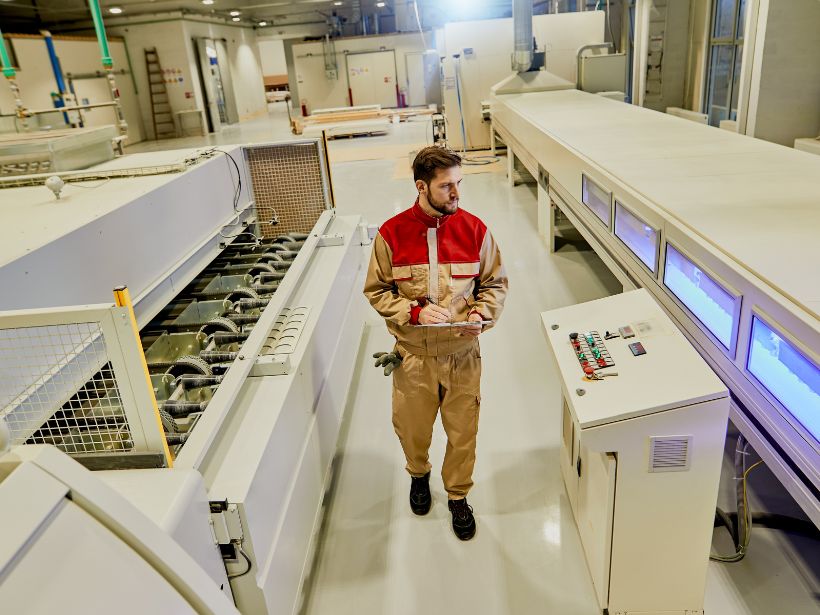
Evaporator Manufacturer
Evaporator Manufacturer: The Heart of Cooling Systems and Innovative Solutions The evaporator, a cornerstone of modern cooling technology, plays a critical role in both domestic and industrial applications. Evaporator manufacturer companies lead the industry by delivering energy-efficient, eco-friendly, and durable solutions. In this article, we’ll dive into the working principles of evaporators, their types, applications, key considerations for selecting a manufacturer, and the latest technological trends. Our goal is to provide comprehensive and up-to-date insights into cooling systems, helping you identify the best solutions for your business needs. What Is an Evaporator and How Does It Work? An evaporator is a heat exchanger in a cooling system that facilitates the evaporation of liquid refrigerant, absorbing heat from the surrounding environment. This process cools the environment and is a fundamental step in the refrigeration cycle. The evaporator allows low-pressure liquid refrigerant to absorb heat and transition into a gaseous state. During this process, heat from the surrounding air or liquid is transferred to the evaporator’s surface. For instance, in a refrigerator, the evaporator generates the cool air that keeps the interior chilled. Similarly, in an air conditioning unit, it cools warm air to provide a comfortable indoor environment. The efficiency of an evaporator directly impacts the overall performance of the system, which is why evaporator manufacturer companies focus on developing designs with high heat transfer coefficients, durability, and energy efficiency. Types of Evaporators and Their Technical Features Various types of evaporators are designed to meet specific application needs. Evaporator manufacturer companies optimize this diversity to offer tailored solutions for different industries. Here are the most common evaporator types and their technical characteristics: Bare Tube Evaporators: Featuring a simple and cost-effective design, these evaporators are typically used in small-scale cooling systems. Their low cost and easy maintenance make them ideal for household refrigerators. Forced Air (Finned) Evaporators: Equipped with fans to circulate air rapidly, these provide uniform cooling. They are commonly used in commercial cooling systems, such as supermarket cold storage units. Plate Evaporators: Known for their compact design and high heat transfer efficiency, plate evaporators are popular in industrial applications requiring energy savings. Companies like Alfa Laval lead in innovative designs for these systems. Flash Evaporators: Designed for concentrating high-viscosity liquids, these are widely used in the food industry for processing fruit juices or dairy products. Falling Film Evaporators: Ideal for concentrating large volumes of liquid, these create a thin liquid film to optimize heat transfer and energy efficiency. Dry Expansion Evaporators: These enable controlled refrigerant evaporation, making them suitable for systems requiring precise temperature control. Cellulosic Evaporators: These perform well in humid environments and are often used in marine or high-humidity industrial settings. This diversity enables evaporator manufacturer companies to deliver industry-specific solutions. Technical features such as material selection (stainless steel, aluminum, or copper), heat transfer coefficient, system pressure, and refrigerant type significantly influence evaporator performance. For example, stainless steel evaporators offer corrosion resistance, while copper tubes provide superior thermal conductivity. Applications of Evaporators Across Industries While cooling systems are often associated with household refrigerators and air conditioners, evaporators have a much broader range of applications. Here are key industries and example applications where evaporators are indispensable: Domestic Cooling: Refrigerators and freezers rely on evaporators to maintain cold interiors. Modern appliances use energy-efficient evaporators to reduce power consumption. Commercial Cooling: Cold storage units, display cases, and beverage coolers in supermarkets utilize fan-assisted evaporators to keep products fresh. Industrial Cooling: Chemical, pharmaceutical, and food processing plants use evaporators for large-scale cooling and concentration processes. For instance, pharmaceutical facilities require specialized evaporators for precise temperature control. Air Conditioning Systems: Air conditioners and HVAC systems rely on evaporators to cool warm air, ensuring comfortable indoor environments. VRF systems incorporate evaporators for enhanced energy efficiency. Food and Beverage Industry: Flash evaporators are used to concentrate liquids like fruit juices, dairy products, wine, and beer, maintaining product quality while optimizing energy use. Marine and Transportation: Evaporators are critical in cold chain logistics, preventing spoilage during long-distance transport. Reefer containers rely on evaporators for reliable cooling. Energy Production: Some power plants use evaporators to recover waste heat, improving energy efficiency and reducing environmental impact. This wide range of applications underscores the need for evaporator manufacturer companies to invest in R&D and industry-specific expertise. For instance, companies like Ahmet Yar in Türkiye design specialized evaporators for the food industry, addressing unique sectoral demands. Key Considerations When Choosing an Evaporator Manufacturer Selecting the right evaporator manufacturer is critical for your business’s long-term success. A poor choice can lead to energy losses, high maintenance costs, or system failures. Here are key factors to consider when choosing a manufacturer: Technological Expertise: Ensure the manufacturer uses cutting-edge technology to produce high-efficiency, eco-friendly evaporators. For example, Alfa Laval’s plate flash evaporators are renowned for their compact design and energy savings. Customization Capabilities: Different industries have unique needs. The manufacturer should offer tailored solutions, such as custom evaporators for food processing plants to enhance product quality. After-Sales Support: Installation, maintenance, and repair services are essential for long-term evaporator performance. Manufacturers offering 24/7 technical support should be prioritized. Energy Efficiency: With energy costs being a significant expense, energy-efficient evaporators provide long-term cost savings. References and Experience: A manufacturer’s past projects, client testimonials, and industry experience reflect its reliability. For example, Frigo Block, with 35 years of experience, is a leader in Türkiye’s cooling industry. Certifications and Standards: Verify that the manufacturer complies with international standards like ISO 9001, CE, or ASHRAE. Material Quality: The materials used in evaporators (e.g., stainless steel or copper) affect corrosion resistance and heat transfer performance, impacting system longevity. These criteria help you select a evaporator manufacturer that optimizes system performance for your specific needs. Innovations and Future Trends in Evaporator Manufacturing In recent years, evaporator manufacturer companies have focused on technological advancements and sustainability-driven solutions. Here are the latest trends and future expectations in evaporator production: Energy Efficiency and Eco-Friendly Designs: Next-generation evaporators consume less energy while delivering superior performance. For instance, the use of low global warming potential (GWP) refrigerants like R32 and R1234yf is on the rise. Smart Control Systems: IoT-enabled evaporators offer remote monitoring, data analytics, and automated optimization, reducing maintenance costs and preventing system failures. Compact and Modular Designs: Plate evaporators and flash evaporators occupy less space while maintaining high efficiency, ideal for facilities with spatial constraints. Recycling and Sustainability: Manufacturers increasingly use recyclable materials like stainless steel, which is both durable and environmentally friendly. Artificial Intelligence and Automation: AI-based control algorithms optimize energy consumption and enhance system performance. Hybrid Systems: Evaporators integrated with renewable energy sources, such as solar-powered cooling systems, are gaining traction. Nanotechnology Applications: Nanocoatings reduce corrosion on evaporator surfaces, improving heat transfer efficiency and longevity. These trends position evaporator manufacturer companies at the forefront of global competition. For example, companies like Günay Heat Exchangers stand out with their focus on energy efficiency and sustainable solutions. Evaporator Maintenance and Performance Optimization Evaporators in cooling systems are susceptible to dust, dirt, corrosion, and other contaminants, which can reduce performance and increase energy consumption. Regular maintenance is essential for ensuring long-term efficiency and durability. Here are key maintenance steps for evaporators: Surface Cleaning: Dust and dirt buildup on evaporator surfaces reduces heat transfer efficiency. Regular cleaning prevents performance losses. Sensor and Control System Checks: Evaporator sensors play a critical role in managing the refrigeration cycle. Faulty sensors can compromise system efficiency. Refrigerant Levels: Maintaining the correct refrigerant level is vital for optimal evaporator performance. Incorrect levels can lead to system failures. Corrosion Prevention: Even with corrosion-resistant materials like stainless steel, regular corrosion checks are necessary. Professional Technical Support: Periodic inspections by expert technicians prevent potential issues and extend system lifespan. Energy Consumption Analysis: Monitoring evaporator energy usage helps optimize performance and reduce costs. Airflow Optimization: In fan-assisted evaporators, ensuring unobstructed airflow is critical for uniform cooling. These maintenance steps extend the lifespan of an evaporator and optimize energy costs. For example, regular maintenance of a plate evaporator can reduce energy consumption by up to 20%. Impact of Evaporators on Energy Efficiency Energy efficiency is a top priority in modern cooling systems design, and evaporators significantly influence overall energy consumption. A high-efficiency evaporator reduces operating costs and environmental impact. For instance, optimized heat transfer surfaces and low-pressure drop designs minimize energy usage. The choice of materials, such as copper or aluminum, also enhances efficiency by improving heat transfer, allowing the system to operate with less energy. Evaporator manufacturer companies leverage innovative materials and designs to provide competitive advantages. For example, microchannel technology in next-generation evaporators achieves higher heat transfer in smaller surface areas, ideal for compact systems. Additionally, evaporators with energy efficiency certifications, such as Energy Star, help businesses meet sustainability goals. Environmental Impact and Sustainability of Evaporators Today, evaporator manufacturer companies prioritize solutions that reduce environmental impact. Refrigerants used in cooling systems significantly affect global warming and the ozone layer. As a result, low-GWP refrigerants, such as R1234yf and CO2, are increasingly adopted in next-generation evaporators. Additionally, the use of recyclable materials like stainless steel and aluminum in production enhances sustainability while maintaining durability. The energy efficiency of evaporators also contributes to reducing carbon footprints. For example, a food processing plant using an energy-efficient evaporator can significantly lower its annual CO2 emissions, aligning with corporate sustainability objectives.
Read More
The New Dimension in Efficiency: Industrial Evaporator Trends for 2025
Table of Contents What Are Industrial Evaporators and Why Are They Important? Technological Innovations in Industrial Evaporators for 2025 Energy Efficiency and Eco-Friendly Designs Smart Automation and IoT Integration New Standards in Materials and Durability Applications of Industrial Evaporators Across Different Industries Innovations in Maintenance and Operational Efficiency Cost and Performance Optimization in 2025 Global Market Trends and Competition The Future Role of Industrial Evaporators What Are Industrial Evaporators and Why Are They Important? Industrial evaporators are critical equipment used to concentrate or separate liquids through evaporation. They play an essential role in industries such as food processing, chemicals, pharmaceuticals, and energy, ensuring processes are carried out efficiently and quickly. These devices facilitate the transformation of a liquid into vapor, removing unwanted components or concentrating valuable substances. For instance, in the dairy industry, evaporators are indispensable for condensing milk, while in wastewater treatment, they help purify liquids. As we approach 2025, the importance of industrial evaporators continues to grow. This is driven by the dual need to meet sustainability goals and the demand for businesses to reduce costs while gaining a competitive edge. Modern evaporator designs consume less energy while operating at higher capacities, enabling companies to minimize their environmental impact and achieve operational efficiency. Furthermore, next-generation evaporators are becoming more flexible and customizable thanks to technological advancements, making them vital tools for modern industries. Technological Innovations in Industrial Evaporators for 2025 The year 2025 promises to be a turning point for industrial evaporators, marked by significant technological leaps. In particular, systems powered by artificial intelligence and machine learning are being used to optimize evaporator performance. These systems analyze process parameters in real-time, minimizing energy consumption while enhancing production quality. For example, algorithms that dynamically adjust an evaporator’s temperature and pressure settings save time and reduce error rates. Another key trend for 2025 is the rise of modular designs. Modular evaporators can be easily scaled and adapted to various processes, offering significant advantages, especially for small and medium-sized enterprises. Additionally, advancements in heat transfer technologies are making evaporators more compact and efficient. Enhanced heat exchangers reduce energy losses, allowing systems to operate at lower costs, further boosting their appeal across industries. Energy Efficiency and Eco-Friendly Designs Energy efficiency will be one of the most critical factors in evaporator design for 2025. In line with global carbon-neutral targets, manufacturers are focusing on developing systems that consume less energy. Multi-effect evaporators (MEE) are a standout technology in this regard, reusing steam across multiple stages to significantly reduce energy consumption. Moreover, evaporators powered by renewable energy sources are gaining traction. Systems integrated with solar or geothermal energy are particularly attractive in regions with high energy costs. Eco-friendly designs not only save energy but also help businesses comply with environmental regulations. This trend holds immense potential, offering both sustainability benefits and long-term cost savings. Smart Automation and IoT Integration With the influence of Industry 4.0, smart automation systems are becoming standard in industrial evaporators. By 2025, evaporators integrated with the Internet of Things (IoT) will offer remote monitoring and control capabilities. This allows businesses to track system performance in real-time and detect potential issues before they escalate. IoT-enabled evaporators also leverage data analytics to take process optimization to the next level. For instance, parameters such as energy consumption or output quality can be analyzed via cloud-based platforms, enabling better decision-making. These systems also streamline maintenance processes, as predictive maintenance algorithms notify operators when equipment requires servicing. This reduces downtime and ensures operational continuity for businesses. New Standards in Materials and Durability The durability of industrial evaporators will gain even greater importance in 2025. For equipment exposed to harsh chemicals or high temperatures, new material technologies are being developed. For example, corrosion-resistant alloys and ceramic coatings are extending the lifespan of evaporators. These materials also reduce maintenance costs, offering economic benefits to businesses. Furthermore, nanotechnology-based surface coatings minimize buildup on evaporator interiors, simplifying cleaning processes. These innovations are particularly impactful in industries like food and pharmaceuticals, where hygiene is paramount. Advances in durability and material quality ensure that evaporators deliver high performance over extended periods. Applications of Industrial Evaporators Across Different Industries Industrial evaporators serve as essential equipment across a wide range of industries. In the food sector, they are critical for concentrating products like fruit juices and dairy. In the chemical industry, evaporators are used for solvent recovery and waste minimization. The pharmaceutical industry relies on high-precision evaporators for purifying active ingredients in sensitive processes. In the energy sector, particularly in geothermal and nuclear power plants, evaporators are vital for liquid separation and energy production. Demand for evaporators in these industries is expected to rise in 2025, driven by the need for more efficient and eco-friendly systems. Customized evaporator designs tailored to each industry’s unique requirements enhance businesses’ competitive strength. Innovations in Maintenance and Operational Efficiency Maintenance processes are crucial for ensuring the longevity of industrial evaporators. In 2025, automated cleaning systems (CIP - Clean-in-Place) will significantly reduce maintenance times. These systems clean evaporator interiors without manual intervention, saving time and maintaining hygiene standards. Additionally, real-time monitoring technologies continuously assess evaporator performance. For example, vibration sensors or thermal cameras detect anomalies instantly, enabling preventive maintenance. These innovations minimize unplanned downtime and boost operational efficiency. As a result, maintenance costs decrease while system reliability increases. Cost and Performance Optimization in 2025 Cost optimization will be a key focus for industrial evaporators in 2025. Systems offering low energy consumption and high output capacity reduce the total cost of ownership (TCO) for businesses. Notably, next-generation evaporators equipped with heat recovery systems maximize energy efficiency by reusing waste heat. Moreover, scalable designs allow businesses to manage initial investments more effectively. For example, a company can start with a low-capacity evaporator and expand it as needed, which is particularly beneficial for firms with capital constraints. Performance optimization enables businesses to achieve more output with fewer resources, ultimately boosting profitability. Global Market Trends and Competition The global evaporator market is expected to experience rapid growth in 2025. The Asia-Pacific region, particularly China and India, is leading due to significant industrial investments. Europe and North America stand out for their increasing demand for sustainable technologies. In these regions, manufacturers complying with environmental regulations gain a competitive advantage. In this highly competitive market, innovation and customer-centricity are key differentiators. Manufacturers are setting themselves apart by offering tailored solutions to meet specific customer needs. Additionally, more flexible production models are being developed to address global supply chain challenges. These trends are accelerating both the growth and diversification of the evaporator market. The Future Role of Industrial Evaporators Industrial evaporators will play a central role in sustainable production and the circular economy in the future. Their importance in areas like waste minimization, water recovery, and energy efficiency will continue to grow. For businesses aiming to achieve zero-waste goals, evaporators will become indispensable. Furthermore, advancements in artificial intelligence and automation will transform evaporators into smarter, self-optimizing systems. This will unlock new levels of efficiency and competitiveness for businesses. Beyond 2025, industrial evaporators will evolve from mere equipment into strategic assets, driving innovation and sustainability across industries.
Read More
From Food to Chemistry: Areas Where Evaporator Technology Is Rising in 2025
Table of Contents What is Evaporator Technology and Why is it Important? The Rise of Evaporators in the Food Industry The Role of Evaporators in the Chemical Industry Evaporators in Energy Efficiency and Sustainability Evaporator Use in Other Industries Innovations in Evaporator Technology in 2025 What is Evaporator Technology and Why is it Important? Evaporators are devices that facilitate heat transfer by enabling the evaporation of a liquid substance. Essentially, they convert a liquid into a gas while absorbing heat from the surroundings, a process utilized across various industrial applications. In 2025, evaporator technology plays a critical role in numerous sectors due to demands for energy efficiency, sustainability, and high performance. From food and chemicals to pharmaceuticals and energy, evaporators have become indispensable for optimizing production processes and reducing environmental impacts. The significance of evaporators stems from both economic and environmental factors. Compared to traditional methods, modern evaporators consume less energy, reducing carbon footprints while lowering costs. Moreover, innovative designs and smart control systems enhance their efficiency and adaptability. In 2025, the diverse applications of this technology across industries make it a pivotal force in shaping the future of industrial processes. The Rise of Evaporators in the Food Industry The food industry is one of the primary domains where evaporator technology is extensively applied. In the production of dairy products, fruit juices, sugar, and ready-to-eat foods, evaporators reduce liquid content to concentrate products. For instance, in powdered milk production, evaporators remove water from milk, enabling the creation of products with extended shelf lives. In 2025, rising demand and sustainability goals in the food sector are further expanding the use of evaporators. Modern evaporators are designed to meet stringent food safety standards. Stainless steel structures and hygienic designs eliminate contamination risks. Additionally, multi-stage evaporator systems reduce energy consumption, thereby lowering production costs. Technologies like thermal vapor recompression (TVR) and mechanical vapor recompression (MVR) enable energy savings in food processing plants while minimizing environmental impacts. Another trend in the food industry is the use of evaporators in plant-based product manufacturing. In the production of vegan milk and protein concentrates, evaporators precisely control liquid content to deliver high-quality results. With increasing investments in this area, evaporator technology will continue to represent the innovative face of the food industry in 2025. The Role of Evaporators in the Chemical Industry The chemical industry is another sector where evaporators are heavily utilized. They are critical for the concentration, purification, and recovery of chemical substances. In 2025, sustainability goals and strict environmental regulations in the chemical industry are driving demand for evaporator technology. For example, in wastewater treatment, evaporators recover chemicals, reducing environmental impacts while enabling the reuse of valuable resources. Crystallization evaporators, used to separate salts, acids, and organic compounds, are widely adopted in chemical plants due to their high energy efficiency and minimal waste production. Moreover, the use of evaporators in biofuel and polymer production is growing. In biofuel production, evaporators concentrate liquids post-fermentation, playing a vital role in the process. Similarly, in polymer production, evaporators recover solvents, reducing costs and enhancing environmental compliance. In 2025, technological advancements in this field will pave the way for a more sustainable chemical industry. Evaporators in Energy Efficiency and Sustainability In 2025, energy efficiency and sustainability are central priorities across all industries. Evaporator technology is key to achieving these goals. While traditional evaporator systems were known for high energy consumption, modern designs have largely addressed this issue. For instance, MVR systems recompress vapor, reducing energy use by up to 90 percent. From a sustainability perspective, evaporators also contribute significantly to waste management. In the food and chemical industries, evaporators integrated with zero liquid discharge (ZLD) systems enable complete wastewater recovery. This facilitates compliance with environmental regulations and supports water conservation efforts. Additionally, evaporator systems powered by renewable energy sources are gaining attention in 2025. Solar or geothermal energy-supported evaporators enable carbon-neutral production processes. Such innovations are particularly appealing to companies aiming to reduce their carbon footprints. Evaporator Use in Other Industries Beyond food and chemicals, evaporators are employed in various other sectors. In the pharmaceutical industry, they are essential for concentrating and purifying active ingredients. High-precision processes in this field often rely on specializedevaporators like vacuum evaporators. In the energy sector, evaporators play a significant role in geothermal power plants and waste heat recovery systems. Evaporators used in desalination processes provide vital solutions in regions facing water scarcity. In 2025, technological advancements in this area are increasing evaporator demand, particularly in regions like the Middle East and Africa. Industries such as paper and textiles also utilize evaporators for liquid waste concentration and recovery. This optimizes production processes while reducing environmental impacts. The broad range of applications across different sectors underscores the versatility and importance of evaporators. Innovations in Evaporator Technology in 2025 The year 2025 marks a period of significant innovation in evaporator technology. The integration of artificial intelligence and the Internet of Things (IoT) is making evaporator systems smarter and more efficient. Real-time data analysis allows systems to optimize energy consumption and predict maintenance needs in advance. Advances in material science are also transforming evaporator designs. Corrosion-resistant alloys and coatings extend equipment lifespan while reducing maintenance costs. Additionally, compact designs deliver high performance in smaller spaces, enhancing facility efficiency. Another innovation is hybrid evaporator systems, which combine thermal and mechanical technologies to offer flexible solutions for diverse industrial needs. Particularly in energy-intensive sectors, these hybrid systems provide significant cost and environmental benefits. These advancements in evaporator technology will accelerate the transition to more efficient and eco-friendly processes in 2025.
Read More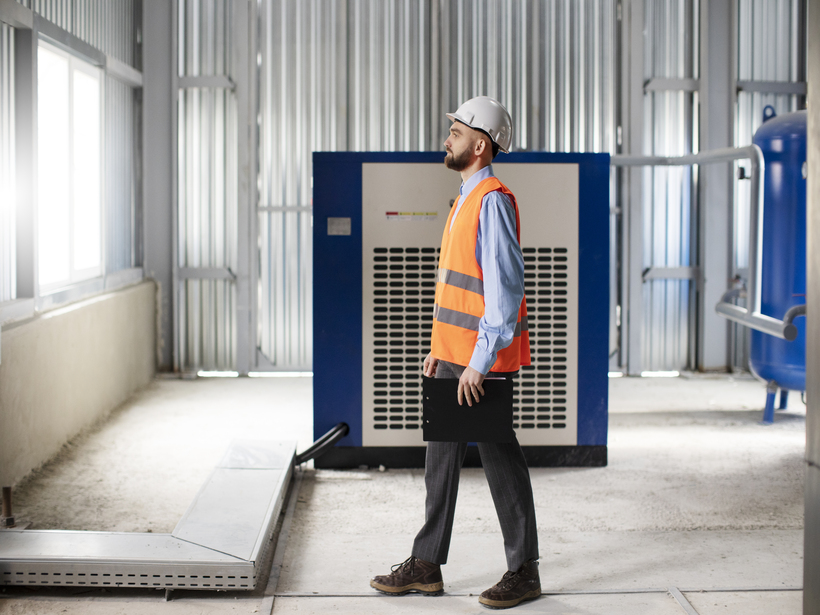
In Which Sectors Will Industrial Evaporators Become Prominent in 2025?
Table of Contents Introduction: The Rising Importance of Evaporators Food and Beverage Industry Chemical and Petrochemical Industry Pharmaceutical Industry Energy and Waste Management Cooling and Climate Control Data Centers and Technology Agriculture and Greenhouse Technologies In 2025, industrial evaporators stand out in multiple sectors by offering energy efficiency, process optimization, and environmental sustainability. These devices play a critical role in processes like liquid evaporation, concentration, and purification. Across industries such as food, chemicals, pharmaceuticals, and energy, evaporators provide cost advantages and environmental compliance. Below, we explore the sectors where this technology is making the most impact in 2025. Introduction: The Rising Importance of Evaporators Industrial evaporators have become an indispensable part of modern industry. In 2025, these devices transform liquids into valuable products, delivering both economic and environmental benefits. Energy-efficient technologies reduce production costs while minimizing carbon footprints. Innovations like mechanical vapor recompression (MVR) and thermal vapor recompression (TVR) enhance the performance of evaporators. Evaporators are notable for their adaptable designs, meeting the needs of various industries. Stainless steel surfaces and automated control systems ensure hygiene and reliability, which are critical in sensitive sectors like food and pharmaceuticals. Additionally, integration with renewable energy sources makes these devices an eco-friendly solution. Food and Beverage Industry The food and beverage sector is one of the primary areas where industrial evaporators are widely used. In the production of milk powder, fruit juice concentrates, sugar syrups, and coffee extracts, evaporators reduce liquid content, shrinking product volume and extending shelf life. In 2025, energy-efficient evaporators deliver hygienic production that meets food safety standards. Automated cleaning systems and stainless steel surfaces eliminate contamination risks. For instance, in dairy products, evaporators preserve nutritional value while evaporating water, offering a significant advantage in organic food production. Modular designs allow use across a wide range, from small-scale businesses to large factories. Evaporators also reduce waste, supporting eco-friendly practices. In the food industry, evaporators lower logistics costs. Concentrated products take up less space and are easier to transport, creating a strategic advantage in global supply chains. Chemical and Petrochemical Industry The chemical and petrochemical industry is a demanding field where evaporators operate under high temperatures and pressures. Evaporators are critical for chemical separation, solvent recovery, and wastewater treatment. In 2025, MVR systems reduce energy consumption, minimizing the environmental impact of evaporators. Corrosion-resistant alloys provide long-lasting performance against aggressive chemicals. Automation systems refine process control, enhancing reliability. In the chemical industry, evaporators support goals like waste minimization and valuable material recovery. For example, separating chemical components from wastewater delivers both economic and environmental gains. The high-efficiency designs of evaporators reduce energy costs and optimize production processes, creating a competitive edge in the chemical sector. Pharmaceutical Industry The pharmaceutical sector is an area where industrial evaporators excel in precision-driven processes. Essential for the concentration and purification of active pharmaceutical ingredients (APIs), evaporators are indispensable. In 2025, evaporators designed to meet GMP standards ensure reliability in sterile production environments. Energy-saving systems lower costs and reduce waste in pharmaceutical production. Precise temperature control preserves the chemical structure of components. Compact designs offer high efficiency in limited spaces, a key advantage for small-scale production of high-value drugs. Evaporators drive innovation and accelerate processes in the pharmaceutical industry. Hygienic coatings and automated cleaning systems facilitate compliance with the industry’s stringent regulations. Energy and Waste Management Energy and waste management is a field where evaporators make a significant difference in environmental sustainability. In wastewater treatment plants, evaporators enable the evaporation of contaminated water and the recovery of valuable materials. For instance, evaporators are used to extract minerals like lithium from mining wastewater. Systems powered by renewable energy reduce energy consumption and carbon footprints. In 2025, solar energy integration offers a cost-effective solution for wastewater treatment in remote areas. This is a strategic step for businesses aiming to align with global climate goals, such as the Paris Agreement. Evaporators support circular economy principles. In the energy sector, evaporators promote the efficient use of renewable resources, delivering environmental and economic benefits. Cooling and Climate Control Industrial evaporators are a core component of cooling and climate control systems. In 2025, these devices are used across a wide range, from cold storage facilities to logistics centers, providing precise temperature control. In food logistics, evaporators are critical for preserving the freshness of perishable goods. Smart control systems and low-energy fans boost evaporator efficiency. Eco-friendly refrigerants support sustainability goals. High-efficiency heat exchangers reduce energy costs, offering both economic and environmental advantages in the cooling sector. Data Centers and Technology In 2025, industrial evaporators are gaining significant traction in the data center and technology sector. The proliferation of artificial intelligence, the Internet of Things (IoT), and high-performance servers has heightened the cooling demands of data centers. evaporators provide precise temperature control, ensuring the reliability and longevity of equipment. Managing the heat generated by high-density computing systems has made evaporators a critical component. Energy efficiency is vital in data centers, where energy consumption is a major cost driver. industrial evaporators address this with designs featuring low-energy fans and optimized heat exchangers. Integrated with free cooling technologies, evaporators leverage ambient temperatures to save energy, particularly in colder climates, offering substantial cost reductions. The compact designs of evaporators optimize space utilization in data centers. Modular systems provide flexibility, allowing rapid adaptation to increasing cooling demands. For instance, when a new server room is added, evaporators can be easily scaled, enabling tech companies to meet growing data processing needs efficiently. In 2025, evaporators are becoming smarter with IoT-based control systems. These systems monitor temperature and humidity in real time, optimizing evaporator performance. AI-driven algorithms dynamically adjust cooling processes to further reduce energy use, lowering operational costs and environmental impact. The use of eco-friendly refrigerants aligns data centers with sustainability goals. The high-efficiency designs of evaporators reduce carbon footprints, helping the tech industry meet its environmental responsibilities. Major cloud computing providers and data center operators are adopting these technologies to gain cost advantages and lead in green technology trends. Agriculture and Greenhouse Technologies Agriculture and greenhouse systems are an innovative field where evaporators are applied. In 2025, evaporators in modern greenhouses maintain optimal temperature and humidity levels to enhance plant growth. Evaporative cooling systems create a cool environment through water evaporation. Energy-saving systems boost agricultural productivity, especially in water-stressed regions. IoT integration enables remote control of evaporators, supporting organic farming and sustainable production models.
Read More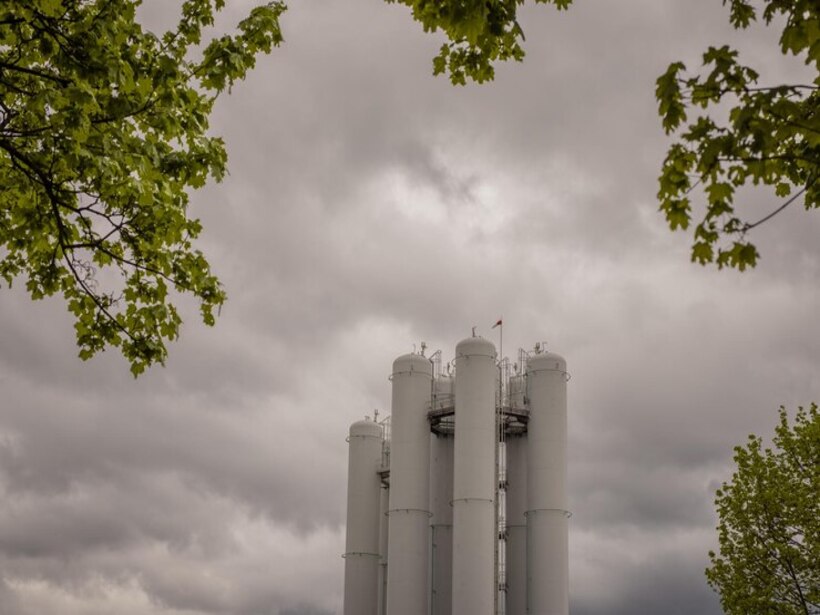
From Liquid to Value: The Strategic Role of Industrial Evaporators in 2025
Table of Contents The Core Role of Evaporators Transformation in the Food Industry Strategic Contributions in the Chemical Industry Precision in the Pharmaceutical Industry Energy and Sustainability Technological Innovations Looking to the Future In 2025, industrial evaporators are revolutionizing industries by transforming liquids into valuable products. These devices have become a cornerstone of modern production, delivering energy efficiency, process optimization, and environmental sustainability. From food and chemicals to pharmaceuticals and energy, evaporators unlock the potential of liquids, offering businesses a competitive edge. Below, we explore the transformative power of these devices in detail. The Core Role of Evaporators Industrial evaporators play a critical role in processes such as liquid evaporation, concentration, and purification. These devices reduce liquid content to minimize volume, enhance product durability, and recover valuable components. For instance, evaporating water in milk powder production or extracting minerals from wastewater in the chemical industry showcases the transformative power of evaporators. Evaporators excel in energy efficiency. Multi-stage systems and mechanical vapor recompression (MVR) technologies minimize energy consumption, reducing operational costs. Additionally, eco-friendly designs lower carbon footprints. Stainless steel surfaces, automated cleaning systems, and precise control mechanisms ensure hygienic and reliable performance, which is vital for sensitive sectors like food and pharmaceuticals. In 2025, evaporators do more than streamline production—they support sustainability goals. Systems integrated with renewable energy sources minimize environmental impact while delivering economic benefits, helping businesses align with global climate objectives. Transformation in the Food Industry The food and beverage industry is one of the primary domains where industrial evaporators are extensively used. In the production of milk powder, fruit juice concentrates, coffee extracts, sugar syrups, and alcoholic beverages, evaporators reduce liquid content, making products more compact and durable. In 2025, energy-efficient evaporators lower production costs while meeting food safety standards. Stainless steel surfaces and automated cleaning systems ensure hygienic production processes. For example, in dairy products, evaporators preserve nutritional value while removing water. This offers a critical advantage in organic and natural food production. Modular designs provide flexibility for both small-scale producers and large facilities. Evaporators also reduce waste, supporting eco-friendly practices and minimizing food loss. In the food industry, evaporators enhance product quality while reducing logistics costs. Concentrated products are easier to transport, saving energy. This provides a strategic advantage in global supply chains. Strategic Contributions in the Chemical Industry The chemical and petrochemical industry is a challenging field where evaporators deliver high performance. Essential for chemical separation, solvent recovery, and wastewater treatment, evaporators are indispensable. In 2025, technologies like MVR and thermal vapor recompression (TVR) reduce energy consumption, minimizing the environmental impact of evaporators. Corrosion-resistant materials ensure durability against acidic and aggressive chemicals. Automation systems enhance process control, improving reliability. In the chemical industry, evaporators support strategic goals like waste minimization and valuable material recovery. For instance, separating chemical components from wastewater offers both economic and environmental benefits, helping businesses comply with regulations. The high-efficiency designs of evaporators lower energy costs in chemical plants. Modular systems also offer adaptability to various production processes, enhancing operational flexibility. Precision in the Pharmaceutical Industry The pharmaceutical industry is a field where industrial evaporators excel in precision and hygiene. Critical for the concentration, purification, and crystallization of active pharmaceutical ingredients (APIs), evaporators play a pivotal role. In 2025, evaporators designed to meet GMP (Good Manufacturing Practices) standards ensure reliability in sterile production environments. Energy-saving technologies reduce costs and waste in pharmaceutical production. Precise temperature and pressure control preserves the chemical integrity of components. Compact designs deliver high efficiency in limited spaces, offering a strategic advantage for small-scale production of high-value drugs. Evaporators accelerate production processes while supporting innovation in the pharmaceutical sector. Hygienic coatings and automated cleaning systems minimize contamination risks, ensuring compliance with stringent industry regulations. Energy and Sustainability Energy and waste management is a domain where evaporators play a key role in environmental sustainability. In wastewater treatment plants, evaporators facilitate the evaporation of contaminated water and the recovery of valuable materials. For example, evaporators are used to extract minerals like lithium from mining wastewater. Evaporators integrated with renewable energy sources reduce energy consumption and carbon footprints. In 2025, solar-powered systems offer cost-effective wastewater treatment solutions in remote areas. This is a strategic step for businesses aiming to align with global climate goals, such as the Paris Agreement. Evaporators support circular economy principles in waste management. In the energy sector, evaporators promote the efficient use of renewable resources, delivering both environmental and economic benefits. Technological Innovations In 2025, industrial evaporators are empowered by technological innovations. IoT-based control systems enable remote monitoring and optimization of evaporators. AI-driven algorithms make energy consumption and maintenance processes more efficient. Nanotechnology-based coatings enhance the resistance of evaporator surfaces to corrosion and fouling. Modular designs offer rapid adaptability to diverse industrial needs. For instance, an evaporator used in the food industry can be easily reconfigured for chemical applications. This flexibility allows businesses to respond quickly to changing market conditions. Energy-efficient fans and optimized heat exchangers further boost evaporator performance. Technological advancements make evaporators more compact and eco-friendly, helping businesses achieve sustainability goals. Looking to the Future In the future, industrial evaporators will open new horizons with more compact, energy-efficient, and eco-friendly models. Systems increasingly integrated with renewable energy sources will strengthen sustainability goals. Advances in AI and IoT technologies will further enhance evaporator performance, boosting business competitiveness and unlocking new applications. The transformative power of evaporators will continue to accelerate industries’ journey from liquid to value. Beyond 2025, these devices will shape an era defined by innovation, optimizing processes and building a more efficient, sustainable world in sectors like food, chemicals, pharmaceuticals, and energy.
Read More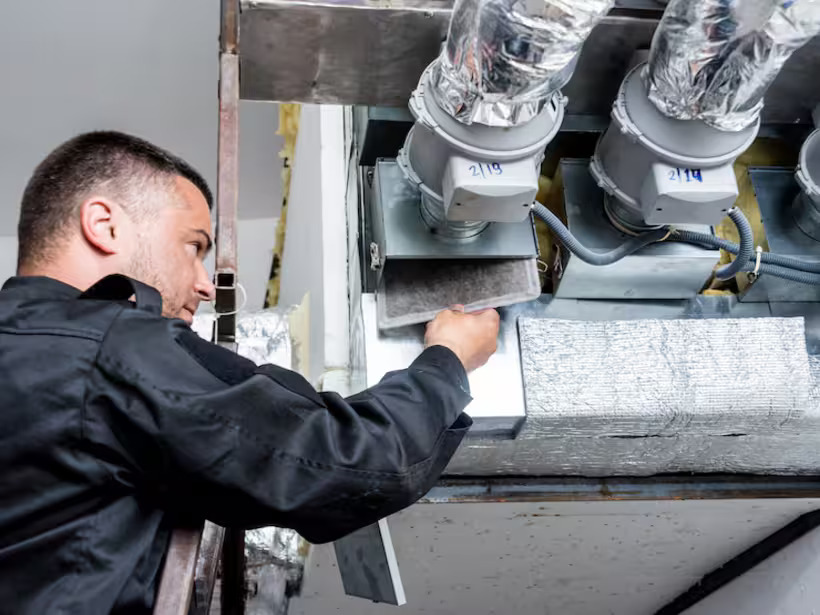
7 Critical Areas Where Industrial Evaporators Will Be Used in 2025
Table of Contents Food and Beverage Industry Chemical and Petrochemical Industry Pharmaceutical Industry Energy and Waste Management Industrial Cooling Systems Agriculture and Greenhouse Systems Electronics and Data Centers In 2025, industrial evaporators continue to play a vital role in numerous sectors of modern industry. These devices facilitate processes such as liquid evaporation, concentration, and cooling, delivering energy efficiency and process optimization. Advanced technologies and eco-friendly designs are further expanding the use of evaporators. Below, we explore in detail the seven critical fields where these devices are most intensively utilized. Food and Beverage Industry The food and beverage industry is one of the primary fields where industrial evaporators are widely employed. In 2025, evaporators are indispensable in processes such as the concentration of dairy products, fruit juice production, sugar syrup preparation, and the distillation of alcoholic beverages. For instance, in milk powder production, evaporators remove a significant portion of water from liquid milk, reducing its volume and extending shelf life. This process is made more efficient with energy-saving multi-stage evaporator systems. Next-generation evaporators, designed to meet food safety standards, incorporate energy-efficient features. Stainless steel surfaces, automated cleaning systems, and precise control mechanisms ensure hygienic production processes. Additionally, these systems minimize waste, promoting an environmentally friendly approach. In the food industry, the use of evaporators reduces costs while enabling the production of high-quality products. Particularly in organic food production, these devices help preserve natural ingredients. Chemical and Petrochemical Industry The chemical and petrochemical industry is a demanding field where evaporators operate under high temperatures and pressures. In 2025, evaporators are extensively used in processes such as chemical separation, solvent recovery, and wastewater treatment. For example, highly efficient evaporator systems (MVR - Mechanical Vapor Recompression) recompress steam to significantly reduce energy consumption, supporting sustainability goals. In this sector, the material quality and durability of evaporators are of paramount importance. Corrosion-resistant alloys provide long-lasting performance against acidic and aggressive chemicals. Advanced automation systems enable precise control of processes, enhancing reliability. In petrochemical plants, evaporators facilitate efficient raw material processing while ensuring compliance with environmental regulations. Pharmaceutical Industry The pharmaceutical industry requires precise and high-standard production processes. Industrial evaporators are used for the concentration, purification, and crystallization of active pharmaceutical ingredients (APIs). In 2025, these devices stand out with hygienic designs compliant with GMP (Good Manufacturing Practices) standards in sterile production environments. Evaporator surfaces are equipped with special coatings to minimize contamination risks. Innovative evaporator technologies save energy and reduce waste in pharmaceutical production. Precise temperature and pressure control ensures the chemical integrity of active ingredients. Additionally, these systems offer flexibility for small-batch production of high-value drugs. The use of evaporators in the pharmaceutical industry accelerates production processes and enhances cost-effectiveness. Energy and Waste Management Energy and waste management is a field where evaporators make a significant impact on environmental sustainability. In 2025, evaporators are widely used in wastewater treatment plants for evaporating contaminated water and recovering valuable materials. For instance, in mining wastewater, evaporators play a critical role in separating valuable minerals like lithium, reducing environmental pollution while generating economic benefits. Evaporator systems integrated with renewable energy sources optimize energy consumption and reduce carbon footprints. Solar-powered evaporators, in particular, are preferred for wastewater treatment projects in remote areas. These systems provide a valuable solution for facilities aiming to align with global climate goals, such as the Paris Agreement. Industrial Cooling Systems Industrial evaporators are essential components of cooling systems. In 2025, these devices are used across a wide range of applications, from large-scale cold storage facilities to logistics centers and food processing plants. In food logistics, evaporators ensure precise temperature control to keep products fresh, which is particularly crucial in global supply chains for perishable goods. Energy efficiency is a top priority in cooling systems. Smart control systems, low-energy fans, and optimized heat exchangers enhance evaporator performance. Environmentally friendly refrigerants are replacing those harmful to the ozone layer. These innovations lower operating costs while minimizing environmental impact. Agriculture and Greenhouse Systems Agriculture and greenhouse systems represent an innovative field where evaporators are used for climate control and humidity management. In 2025, evaporators in modern greenhouses maintain optimal temperature and humidity levels to enhance plant growth. In water-stressed regions, evaporative cooling systems boost agricultural productivity by creating a cool environment through water evaporation, reducing plants’ water requirements. Evaporators support organic farming and sustainable production models by minimizing chemical use. Energy-efficient designs provide cost-effective solutions, particularly for small-scale farms. Additionally, IoT-integrated evaporators enable remote monitoring and management, streamlining agricultural processes. Electronics and Data Centers Data centers and electronics manufacturing facilities are another critical field where industrial evaporators are heavily utilized in 2025. High-performance servers, artificial intelligence systems, and IoT devices require continuous cooling. Evaporators provide precise temperature control, ensuring the reliability and longevity of equipment. Energy consumption is a significant cost factor in data centers. Evaporators offer energy-efficient cooling solutions to alleviate this burden. Systems integrated with free cooling technologies leverage ambient temperatures to save energy. Moreover, the compact designs of evaporators optimize space utilization in data centers.
Read More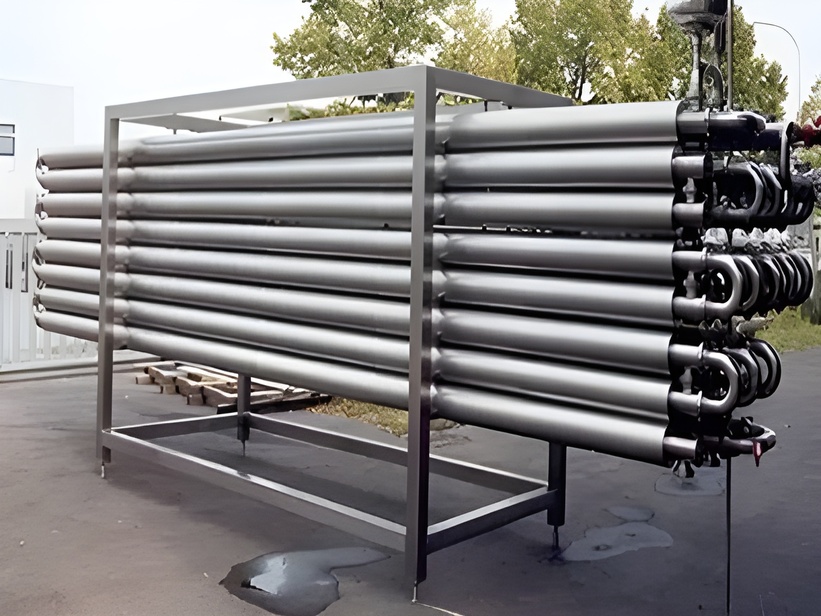
What is an Oil Cooler Exchanger? What is it for?
What is an Oil Cooler Heat Exchanger? What Does It Do? An oil cooler heat exchanger is a device commonly used in industrial machinery and the automotive industry. Its main function is to reduce the temperature of engine oils, ensuring that the engine and other machines operate more efficiently. High oil temperatures can decrease the engine's efficiency and, in the case of overheating, lead to malfunctions. Therefore, oil cooler heat exchangers are critical for ensuring the system operates healthily and efficiently. How Does an Oil Cooler Heat Exchanger Work? The oil cooler heat exchanger facilitates the heat transfer between oil and a liquid (usually water or air). The heated oil from the engine or machine is directed to the heat exchanger. Here, the oil circulates through the internal section of the exchanger, while heat exchange occurs with the liquid on the external section. This heat transfer reduces the oil's temperature, and the cooled oil returns to the system, allowing the engine or machine to operate efficiently. In this way, the engine's lifespan is extended, and efficiency increases. Benefits of Oil Cooler Heat Exchangers Oil cooler heat exchangers provide significant benefits in both industrial machinery and the automotive industry. The primary benefits include preventing engine overheating and improving energy efficiency. Additionally, prolonged exposure of oil to high temperatures can lead to oil degradation and performance loss. Oil cooler heat exchangers maintain temperature control, helping the engine run healthily for longer. Another benefit is lower operational costs, as the heat transfer system makes cooling more efficient. Types of Oil Cooler Heat Exchangers Oil cooler heat exchangers are produced in various types to meet different industrial needs. Each type is designed to suit specific operating conditions and heat management requirements. These types play a critical role in maintaining system efficiency, saving energy, and ensuring long-term use. Here are some common types of oil cooler heat exchangers: Water-Cooled Oil Cooler Heat Exchangers Water-cooled oil cooler heat exchangers are among the most commonly used types in industrial machinery and the automotive industry. These exchangers use the cooling properties of water to reduce the temperature of engine oil. Since water has a high capacity for heat transfer, it provides excellent efficiency. These exchangers are typically used in large and heavy machines, such as generators, press machines, and vehicles with large engines. Water-cooled exchangers also take up less space and improve energy efficiency. Air-Cooled Oil Cooler Heat Exchangers Air-cooled oil cooler heat exchangers are generally used in smaller machines and vehicles. These exchangers use ambient air to reduce the temperature of the oil. Compared to water-cooled exchangers, air-cooled systems require less maintenance as they do not need a water supply. They are commonly used in automobile engines, motorcycles, and smaller industrial machinery. Air-cooled exchangers are more cost-effective and are simpler to install and maintain. Combined Oil Cooler Heat Exchangers Combined heat exchangers integrate both water and air cooling systems. These systems offer the benefits of both cooling methods simultaneously. Combined oil cooler heat exchangers are used especially in complex industrial systems and machines operating under heavy loads. Cooling with both water and air enhances efficiency and reliability. These exchangers optimize both cooling systems, adapting to variable conditions and ensuring the system operates efficiently. Plate Oil Cooler Heat Exchangers Plate oil cooler heat exchangers are another type known for their highly efficient heat transfer capabilities. These exchangers consist of thin metal plates stacked on top of one another, with liquids passing through the gaps between the plates. Oil circulates on one side of the plates, while water or air flows on the other, facilitating heat transfer. Plate heat exchangers stand out due to their compact design and high efficiency. They are typically used in low-volume, high-efficiency systems and are easy to maintain and clean. Tube Oil Cooler Heat Exchangers Tube oil cooler heat exchangers are used in larger systems and heavy machinery. These exchangers transfer heat between a series of tubes. Typically, water or another liquid passes through these tubes, exchanging heat with the oil on the external surface. Tube exchangers are highly effective in large machines due to their high heat transfer capacity. These types are commonly used in industrial machines, generators, and large automotive engines, where high-temperature conditions prevail. Tube exchangers also offer high pressure resistance, ensuring safe operation under harsh conditions. Spiral Oil Cooler Heat Exchangers Spiral oil cooler heat exchangers are preferred in applications where space-saving is crucial. These exchangers have spiral-shaped tubes, and the fluids between the tubes exchange heat with each other. The spiral design provides more efficient heat transfer and allows for a more compact exchanger. Furthermore, spiral exchangers take up less space, making them ideal for use in tight areas. These types of exchangers are frequently used in small industrial machinery and compact engines with space limitations. Conclusion Oil cooler heat exchangers are produced in various types to suit different industrial needs. Water-cooled, air-cooled, combined, plate, tube, and spiral exchangers offer solutions for various operating conditions and system requirements. Choosing the right type of exchanger based on the required cooling capacity and space constraints is essential to enhance system efficiency and ensure long-term use. These types provide various advantages for all types of industrial and automotive applications. Applications of Oil Cooler Heat Exchangers Oil cooler heat exchangers are commonly used in motor vehicles, heavy machinery, industrial equipment, and the automotive industry. In cars, these systems are used to control the temperature of the engine oil. Similarly, in industrial machines, such as presses, generators, and compressors, oil cooler heat exchangers are used to increase efficiency and prevent overheating. These devices are crucial for efficient and healthy operation in all types of industrial and commercial vehicles.
Read More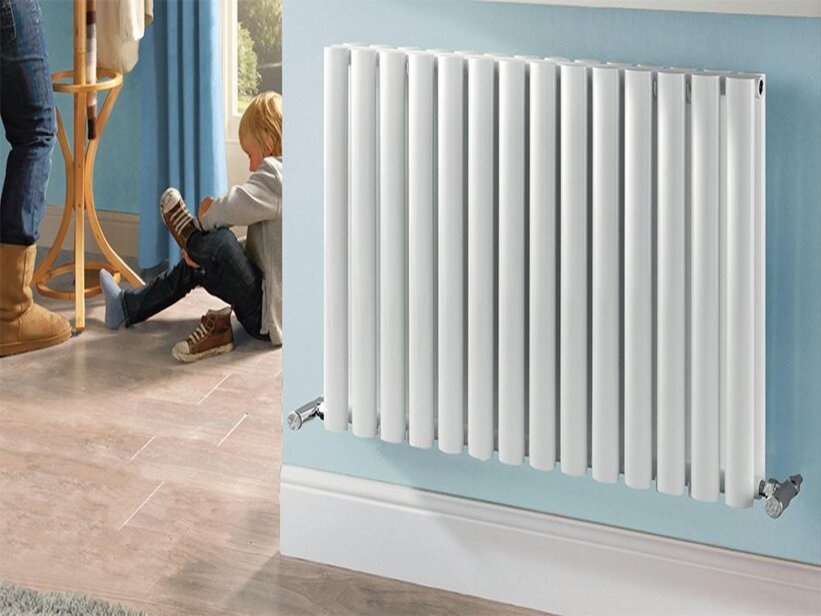
What is a Steam Radiator? What is it for?
What is a Steam Radiator? What Does It Do? A steam radiator is a heating device commonly used in older heating systems and some industrial applications. As the name suggests, these radiators are used in systems where steam is used for heat transfer. Typically, steam radiators work as part of a central heating system, providing heating for indoor spaces in buildings. The use of steam ensures that these radiators operate efficiently and offers the potential for energy savings. How Does a Steam Radiator Work? A steam radiator operates as part of a central heating system. Steam generated by boilers is transported through pipes to the radiator. The high temperature of the steam is transferred to the metal surfaces inside the radiator. These metal surfaces transfer the heat to the surrounding air. This process effectively distributes heat and raises the temperature in the room. As the steam cools down, the evaporated water turns back into liquid and returns to the pipes in the system. This cycle ensures the continuous operation of the heating system and provides even heating in the building. Advantages of Steam Radiators Steam radiators are highly efficient and effective solutions for heating systems. These systems are especially common in old buildings and industrial areas. One of the main reasons for the preference of steam systems is the numerous advantages they offer. The benefits of steam radiators are evident in various aspects, from energy efficiency to durability. In this article, we will examine the advantages of steam radiators in more detail. Efficient Heat Transfer One of the biggest advantages of steam radiators is their ability to transfer heat extremely efficiently. The temperature difference of the steam is transferred to the metal surfaces, which rapidly delivers heat to the surroundings. Since steam carries high temperatures, it quickly heats large areas. This is particularly beneficial in cold weather, providing rapid and effective heating. Additionally, even at lower temperatures, the high energy of steam helps provide heating with less energy consumption. As a result, energy efficiency is achieved, and heating time is shortened. Low Maintenance Requirements Steam radiators require less maintenance compared to other heating systems. The durable structure of steam systems ensures efficient operation even after long periods of use. The mechanical parts in these systems are less mobile, reducing the risk of malfunction. Moreover, the flow of steam is generally steady within the pipes, reducing the chances of blockages or breakdowns. Although periodic maintenance and cleaning are necessary, the maintenance of these systems is less burdensome than that of other heating systems. High Heat Distribution Thanks to their efficient heat transfer, steam radiators have the ability to distribute heat more evenly. This is particularly advantageous in large buildings. As heat radiates from the surface of the radiator, it is directed by a mechanism that ensures it spreads evenly throughout the space. This minimizes temperature differences and ensures that every area is heated to the same degree. This feature allows users to experience the same level of comfort in all areas. This is particularly useful in large offices, factories, and hotels. Easy Installation in Old Buildings Steam radiators are ideal for adapting to central heating systems in older buildings. In many old buildings, steam pipe systems may already be in place, and these radiators can easily be integrated into existing systems. This accelerates the installation process and reduces additional costs. Moreover, they can be easily adapted without damaging the existing infrastructure in the building. This advantage offers great convenience for renovation projects and for those seeking to install modern heating systems in old buildings. Wide Range of Applications Steam radiators are not only used in homes but are also highly efficient in commercial and industrial areas. Hotels, hospitals, large offices, and factories can effectively use steam systems. In large spaces, the high temperature of steam provides long-lasting heating. Additionally, steam systems are highly reliable and can withstand high temperatures. Therefore, in industrial heating needs, steam radiators offer a significant advantage. Low Energy Cost When used correctly, steam radiators provide energy efficiency and reduce energy costs. Due to the rapid and effective heat transfer, more heating is achieved with less energy. Additionally, by speeding up the heating process, energy savings are achieved through shorter heating times. This reduces both energy consumption and long-term energy costs. When properly installed, steam radiators can operate with low operational costs. In conclusion, steam radiators offer significant advantages such as high efficiency, durability, and low maintenance requirements. With their high heat transfer capacity and wide range of applications, they provide effective heating solutions for both commercial and industrial spaces. Additionally, low energy costs and easy installation make these systems a preferred choice. Steam radiators are an ideal choice for energy-efficient and long-lasting heating needs. Disadvantages of Steam Radiators However, steam radiators also have some disadvantages. One of them is the potentially high initial installation costs. The installation of the central heating system and piping can lead to high expenses in some cases. Additionally, controlling steam systems can be more challenging. Since temperature settings are usually fixed, it may be difficult to independently control the temperature of each room. Furthermore, over time, these systems may become less efficient and require regular maintenance. Applications of Steam Radiators Steam radiators are commonly used in large commercial buildings, hotels, factories, and old residential areas. They are also widely preferred in industrial settings and some hospitals. These systems are particularly popular in large buildings, as they provide efficient heating in vast spaces. Additionally, they can replace old heating systems in historical buildings and restoration projects. The efficiency of steam radiators is best demonstrated in large spaces, providing homogeneous heating. Steam radiators offer traditional and efficient heating solutions. The advantages of these systems include fast heating, efficient heating in large areas, and low maintenance requirements. However, they also come with some disadvantages, such as high installation costs and difficult temperature control. The suitability of these systems should be carefully evaluated based on the application area. Overall, steam radiators provide high efficiency and effectiveness in large buildings and industrial facilities.
Read More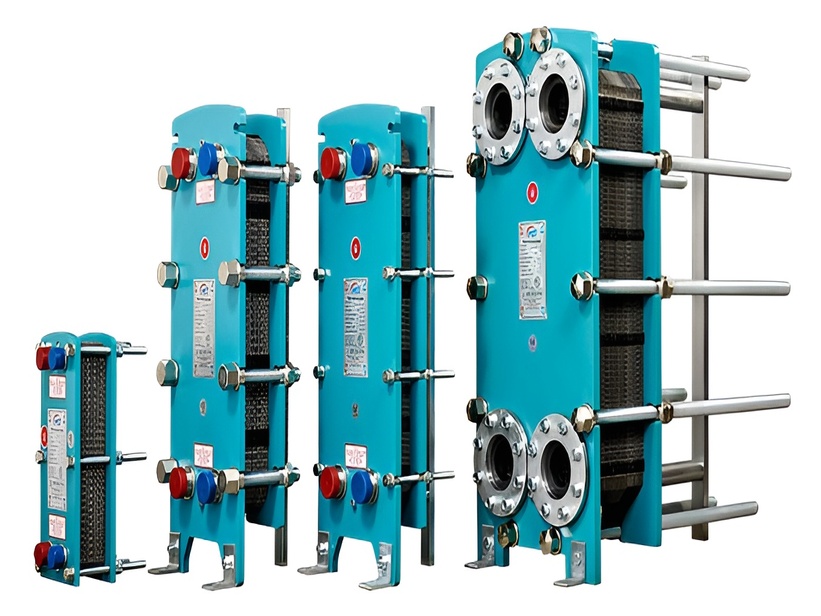
What is an Exchanger? What is it for?
What is a Heat Exchanger? A heat exchanger is a device that transfers heat, typically used to exchange heat between liquids or gases. It allows two different fluids or gases to transfer heat without coming into direct contact. Heat exchangers are commonly used in various industries and applications. Their main function is to transfer heat from one medium to another, balancing the temperature difference. This process is typically achieved through a pipe or plate system. Heat exchangers are designed to be energy-efficient and environmentally friendly, as they minimize energy consumption by transferring heat without wasting energy. These devices are crucial in improving energy efficiency and reducing the consumption of natural resources. How Does a Heat Exchanger Work? A heat exchanger operates by transferring heat between two different fluids. The basic principle is that heat from one fluid is transferred to another, resulting in a temperature change. The fluids do not come into direct contact; instead, they are separated by pipes or plates. As heat is transferred, the temperature of one fluid decreases while the other fluid's temperature increases. This heat transfer occurs through a series of physical processes. Initially, the temperature difference between the two fluids enables heat to be transferred from one to the other. The efficiency of heat transfer can vary based on the design of the heat exchanger. Some heat exchangers are built with special materials and structures to maximize heat transfer. The flow rate, pressure, and temperature of the fluids are key factors in optimizing the performance of a heat exchanger. Applications of Heat Exchangers Heat exchangers are widely used in a variety of industrial applications, including energy production, petrochemical, HVAC (Heating, Ventilation, and Air Conditioning), automotive, food processing, pharmaceuticals, and more. For instance, in power plants, heat exchangers help transfer heat from steam to water, which plays a critical role in generating electricity. In HVAC systems, heat exchangers are used for heating or cooling indoor spaces. In the petrochemical industry, heat exchangers are used to improve the efficiency of chemical processes. In the automotive industry, heat exchangers are an essential component of engine cooling systems. Similarly, in the food processing industry, heat exchangers are employed to regulate the temperature of liquids like milk and fruit juice. The widespread use of heat exchangers in such diverse industries demonstrates their vital role in enhancing efficiency across various sectors. Types of Heat Exchangers Heat exchangers come in various types, each designed to serve different functions and applications. These types differ in terms of the heat transfer method and materials used. Some of the most common types of heat exchangers include: Plate Heat Exchangers, Shell and Tube Heat Exchangers, Air-Cooled Heat Exchangers, and Double Flow Heat Exchangers. Plate heat exchangers use multiple metal plates to transfer heat. Fluids flow through the spaces between the plates, where heat exchange occurs. Shell and tube heat exchangers transfer heat through pipes, with one fluid passing through the pipes while another fluid surrounds them. Air-cooled heat exchangers transfer heat to the air and are typically used for cooling purposes. Double flow heat exchangers allow two different fluids to pass through the same system simultaneously, enhancing heat transfer efficiency. Each type of heat exchanger is designed to meet specific needs in terms of heat transfer efficiency, durability, and application suitability. Factors to Consider When Selecting a Heat Exchanger When selecting a heat exchanger, several important factors must be considered to ensure optimal performance and longevity. First, the capacity of the heat exchanger must be determined. The flow rate of the fluids and the temperature difference between them are crucial factors influencing the heat exchanger's capacity. Material selection is another critical consideration. Different materials affect the heat transfer efficiency and durability of the heat exchanger. For instance, corrosion-resistant materials are essential for long-term use. The design of the heat exchanger is also important, as it determines how efficiently the fluids will flow and how effectively heat will be transferred. Other factors include the ease of installation, maintenance, environmental conditions, and operating environment. Properly evaluating these factors will ensure that the heat exchanger performs efficiently and has a long service life while minimizing costs. Advantages of Heat Exchangers Heat exchangers offer several advantages, making them an indispensable component in many industrial processes. One of the primary benefits is increased energy efficiency, which helps reduce energy costs for businesses. By transferring heat efficiently, heat exchangers minimize energy waste, thus saving on energy consumption. Additionally, they are environmentally friendly since they contribute to energy conservation without harming the environment. Heat exchangers are durable and can operate efficiently for years with proper maintenance. Maintenance is generally straightforward, and when part replacement is needed, it can be done quickly. Furthermore, heat exchangers are typically compact in design, offering space-saving advantages. Their efficiency and eco-friendly nature make them a preferred choice in many industrial and commercial applications.
Read More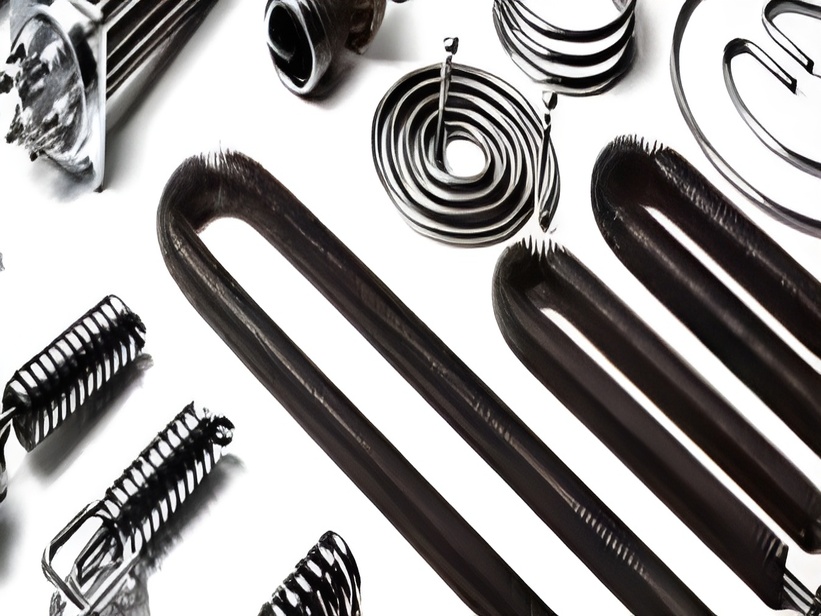
What is Serpentine? What is it for?
What is Serpentine? Serpentine is a group of minerals that are commonly found in nature, resistant to high temperatures, and have a flexible structure. These minerals are generally greenish in color and can vary in type depending on their chemical composition. Serpentine minerals are primarily composed of silicate compounds and are rich in magnesium. Due to these properties, they are used in various industrial fields, particularly for thermal insulation and energy efficiency. Serpentine is a mineral formed through geological processes, especially through the hydrothermal alteration of ultramafic rocks in the oceanic crust. During this process, minerals exposed to high pressure and temperature undergo a transformation called serpentinization. As a result, serpentine minerals become highly resistant to heat and chemical erosion. Therefore, they are preferred in industries, especially in systems exposed to high temperatures. One of the most important application areas of serpentine is the construction sector. Thanks to its thermal insulation properties, it is used to enhance energy efficiency in buildings. Additionally, some types of serpentine offer fire-resistant properties, making them highly advantageous in terms of safety. Furthermore, it is widely used in industrial facilities for coating pipe systems and insulating boilers. Serpentine also has some health-related effects. While types that do not contain asbestos are considered safe, some serpentine varieties may contain asbestos. Serpentine minerals that contain asbestos can be harmful to human health when inhaled. Therefore, safety precautions are essential in areas where serpentine is used. In conclusion, serpentine minerals stand out as a significant material due to their resistance to high temperatures, energy efficiency, and broad industrial applications. However, it should be used with caution, considering the potential health risks. Chemical Properties of Serpentine Serpentine is a crystalline mineral that typically contains magnesium and silica. It is resistant to high temperatures and is used as a long-lasting construction material. What is Serpentine? Serpentine is a group of minerals that are commonly found in nature, resistant to high temperatures, and have a flexible structure. These minerals are generally greenish in color and can vary in type depending on their chemical composition. Serpentine minerals are primarily composed of silicate compounds and are rich in magnesium. Due to these properties, they are used in various industrial fields, particularly for thermal insulation and energy efficiency. Serpentine is a mineral formed through geological processes, especially through the hydrothermal alteration of ultramafic rocks in the oceanic crust. During this process, minerals exposed to high pressure and temperature undergo a transformation called serpentinization. As a result, serpentine minerals become highly resistant to heat and chemical erosion. Therefore, they are preferred in industries, especially in systems exposed to high temperatures. One of the most important application areas of serpentine is the construction sector. Thanks to its thermal insulation properties, it is used to enhance energy efficiency in buildings. Additionally, some types of serpentine offer fire-resistant properties, making them highly advantageous in terms of safety. Furthermore, it is widely used in industrial facilities for coating pipe systems and insulating boilers. Serpentine also has some health-related effects. While types that do not contain asbestos are considered safe, some serpentine varieties may contain asbestos. Serpentine minerals that contain asbestos can be harmful to human health when inhaled. Therefore, safety precautions are essential in areas where serpentine is used. In conclusion, serpentine minerals stand out as a significant material due to their resistance to high temperatures, energy efficiency, and broad industrial applications. However, it should be used with caution, considering the potential health risks. What is Serpentine Used For? Serpentine is primarily used for thermal insulation. It helps retain heat in pipelines, boilers, and power plants. Additionally, it is preferred as a fire-resistant material. Applications of Serpentine Serpentine is widely used in the construction, energy, and industrial sectors. It is particularly preferred in areas that require resistance to high temperature and pressure. Advantages of Serpentine Serpentine is an eco-friendly material with high durability and energy-saving properties. Its fire resistance also offers significant safety advantages. Comparison of Serpentine and Asbestos Serpentine and asbestos are two different mineral groups that share some chemical and physical similarities but have significant differences in terms of health and application areas. Serpentine is a naturally occurring mineral composed of magnesium and silicate compounds, whereas asbestos is better known for its fibrous structure, which poses serious health risks. Serpentine minerals are commonly found in rocks and are used in the construction and industrial sectors due to their heat-resistant properties. However, one type of serpentine mineral, chrysotile, is classified as a type of asbestos. Chrysotile asbestos was historically used extensively in insulation and fire protection systems due to its resistance to high temperatures and abrasion. Because asbestos has a fine fibrous structure, inhaling it can lead to serious health problems. Long-term exposure to asbestos can cause lung diseases such as asbestosis and mesothelioma...
Read More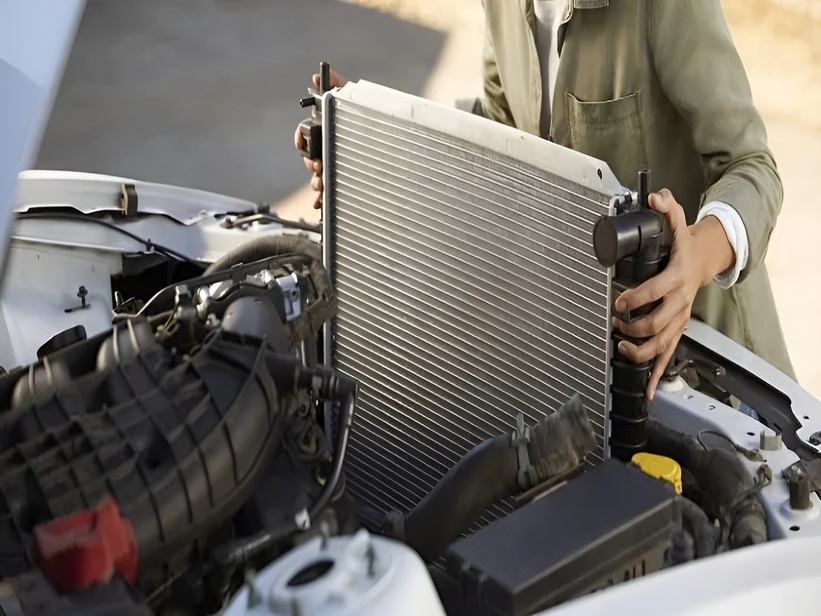
What is a Radiator? What is it for?
A device that allows heat to spread in an environment and is generally used as part of central heating systems. Essentially, these devices, which take heat from a source and transfer it to the environment, increasing the temperature level, are one of the most important elements of modern heating systems. Radiators, widely used in homes, offices, factories, and commercial areas, can have various types and working principles. What is a Radiator? A radiator is a device that transfers energy from a heat source to the air or water through metal surfaces, heating the environment. Generally found in central heating systems, these devices ensure a homogeneous temperature distribution by transporting hot water or steam through pipes. Each radiator is designed to efficiently distribute heat and plays a significant role in energy efficiency. Radiators typically operate using different energy sources. Hot water, steam, or electricity are the primary elements enabling the radiator to function. In central heating systems, hot water transfers its heat to the environment as it passes through the radiator. This process starts with heat contacting metal surfaces and then spreads into the atmosphere via air. This allows the room's temperature to rise rapidly, providing a comfortable heating experience. The working principle of radiators is usually based on convection and conduction. Convection is the process where heated air rises while cooler air replaces it. Conduction, on the other hand, is the direct transfer of heat through metals. With these two principles, radiators effectively heat the surrounding air, increasing the temperature of the environment. History of Radiators The history of radiators dates back to the 19th century. Initially, these devices used for heating were generally made of cast iron and operated with steam. In the early 1800s, especially in Europe, the need for more modern and safer heating methods in buildings increased. During this period, the first hot-water radiators were invented. These devices stood out with their ability to quickly distribute heat and maintain warmth for longer periods. Today, radiators have significantly evolved in terms of design, materials, and energy efficiency. Now, they are both aesthetically appealing and efficient. Radiators produced from various materials have been shaped according to different heating needs and optimized for energy savings. Radiator Working System The working principle of radiators generally starts with transferring water or steam through pipes to the radiator in central heating systems. As hot water enters the radiator’s inner part, it contacts metal surfaces, and heat begins to spread into the environment. This heat is distributed through convection and conduction. Convection enables hot air to rise while cooler air settles, ensuring a balanced temperature in the room. Radiators also play a crucial role in energy efficiency. Modern radiators used today can release more heat with less energy, leading to lower energy consumption and higher efficiency. Particularly, panel radiators used in central heating systems provide high performance with low energy consumption. Radiators are highly effective devices used to regulate the temperature in all types of living spaces. Modern radiators, operating with different energy sources and optimized for better efficiency, provide both a comfortable environment and energy savings. The development of heating systems with advancing technology has enabled radiators to undergo significant evolution in terms of design and functionality. As an indispensable part of today's heating systems, radiators contribute to more sustainable and comfortable living spaces. Radiator Maintenance is extremely important for the efficient operation of heating systems. Especially in winter, ensuring that radiators function correctly plays a critical role in both energy savings and a comfortable heating experience. This article discusses what radiator maintenance is, how it should be performed, and the benefits of regular maintenance. Why is Radiator Maintenance Important? Regular maintenance of radiators extends their lifespan while increasing efficiency. Neglected radiators can become clogged or inefficient over time, reducing heating performance and increasing energy costs. The main purposes of radiator maintenance include: Increased Efficiency: Regular maintenance ensures that the radiator operates more efficiently, reducing energy consumption and allowing faster heating. Energy Savings: A well-maintained radiator provides more heating with less energy, helping to lower electricity or gas bills over time. Longer Lifespan: Regular maintenance extends the lifespan of radiators and prevents early malfunctions. Improved Air Quality: Radiator maintenance enhances indoor air quality, as a dirty radiator can spread germs and unpleasant odors in the air. How to Maintain a Radiator? Maintaining radiators is quite simple, but it needs to be done regularly. Here are the steps for radiator maintenance: Cleaning the Radiator: Over time, radiators can accumulate dust, dirt, and other debris. A dirty radiator cannot heat efficiently. To clean, carefully vacuum the top and bottom of the radiator and wipe it with a damp cloth. Additionally, a vacuum cleaner can be used to remove dirt trapped behind the radiator. Air Bleeding Process: Radiators may not heat efficiently due to air accumulation over time. Air bleeding is the process of releasing trapped air bubbles from the radiator. To do this, carefully open the air release valve at the top of the radiator and let the water flow into a container. Temperature Control: Check the temperature settings of your radiator. If the heating is uneven, the water pressure in the system may be insufficient. In this case, increasing the system pressure might be necessary. Annual Professional Maintenance: In addition to routine maintenance, it is beneficial to have a professional technician inspect the radiator once a year. Experts can check the system, identify potential faults, and perform necessary repairs. Best Time for Radiator Maintenance The ideal time for radiator maintenance is usually in the autumn. Conducting maintenance before winter ensures the heating system is ready for cold weather. However, maintenance can also be performed regularly throughout the winter. Especially air bleeding should be done frequently. Benefits of Radiator Maintenance Radiator maintenance offers many advantages: Heating Efficiency: Regular maintenance allows radiators to heat up faster, making the environment warm in a shorter time. Reduced Energy Consumption: Well-maintained radiators minimize energy consumption, leading to lower utility bills. Extended Radiator Lifespan: Routine maintenance extends the lifespan of radiators and reduces the likelihood of early malfunctions. Comfortable Heating: A well-maintained radiator ensures even heat distribution, creating a more comfortable living space. Radiator maintenance ensures efficient operation and prolongs the lifespan of the device. Regular maintenance not only saves energy but also provides a more comfortable heating experience. Therefore, keeping up with radiator maintenance at regular intervals offers both economic and environmental benefits.
Read More
Latest Evaporator Models and Innovations Expected in 2025
What Innovations Are Expected in Industrial Evaporators in 2025? As of 2025, many innovations and developments are expected in industrial evaporator technologies. First, more compact and efficient evaporator models will come to the fore. These models will be designed to be smaller in size, but more powerful and efficient, in order to save space and increase energy efficiency. At the same time, evaporators equipped with advanced heat transfer technologies will increase cooling efficiency and provide lower energy consumption. It is expected that digitalization and automation solutions will be integrated in new generation evaporators. These systems will allow users to continuously monitor the operating status and efficiency of evaporators. Artificial intelligence-based management systems will make the necessary adjustments to ensure that these devices operate more efficiently. By offering evaporators equipped with these innovative technologies to its customers, Günay Soğutma will ensure that businesses have the latest technology. Features of New Generation Evaporators: What Advantages Does It Offer for Factories in 2025? One of the most important features of the new generation evaporators is their success in increasing energy efficiency. In 2025, evaporators with more efficient heat exchange technologies will provide the same cooling capacity with less energy, creating major energy savings. The longevity of these models will help reduce long-term costs for businesses. Innovative designs will reduce maintenance requirements and enable faults to be detected earlier. However, by using environmentally friendly refrigerants, a lower carbon footprint will be achieved. These new evaporators, which reduce the environmental impact in industrial facilities, will offer significant advantages to businesses in terms of sustainability. With these new generation technologies, Günay Soğutma allows factories to use both efficient and environmentally friendly solutions. Management of Evaporators with Digital Control Systems: How Will This Technology Evolve in 2025? In 2025, digital control systems are expected to be more prevalent in evaporators. These systems monitor the performance of evaporators in real time and allow businesses to constantly monitor the status of the system. Digital solutions allow users to adjust device settings remotely, thus optimizing the efficiency of the system. These solutions make maintenance processes more predictable because malfunctions or performance degradation are detected immediately. New generation digital control systems, supported by artificial intelligence and machine learning, enable evaporators to operate more efficiently. These systems minimize energy consumption by making the most appropriate adjustments according to the operating conditions of each device. Günay Sogutma will help factories create smarter and more flexible production processes by offering evaporator models with digital control systems. How Does Industrial Performance Improve with New Evaporator Models? New evaporator models will significantly increase performance levels in industrial facilities. While these models offer more cooling capacity, they will also provide lower energy consumption. Heat transfer efficiency will reach higher levels thanks to advanced material technologies, which will allow cooling systems to operate more efficiently. Thus, factories will be able to get more efficiency with less energy. Another important feature of these new models is their durability. Specially designed for industrial environments, these evaporators can withstand harsher conditions and have a long lifespan. These systems are optimized to require less maintenance, which will significantly reduce the maintenance costs of businesses. By offering these high-performance evaporators, Günay Sogutma helps businesses make their production processes more efficient. Environmentally Friendly Technologies in Evaporators: What are the Expected Developments in 2025? By 2025, the use of environmentally friendly technologies in industrial evaporators will become more common. These technologies will both provide lower energy consumption and reduce environmental impacts. The refrigerants used in new generation evaporators will not damage the ozone layer and have low global warming potential. The recyclability of the materials used in the systems will create a great advantage in terms of environmental sustainability. Evaporators equipped with environmentally friendly technologies will allow factories to reduce environmental impact and create a more sustainable production process. Günay Cooling will help factories reduce their carbon footprint by offering environmentally friendly solutions. This is not only an environmentally friendly approach, but also contributes to reducing energy costs in the long term. Intelligent Advanced Technologies in Evaporators: Which Aspects Will Develop in 2025? As of 2025, the use of advanced smart technologies in evaporators will increase even more. These technologies will enable industrial evaporators to operate more efficiently and enable innovative solutions such as pre-failure maintenance. Smart sensors and IoT (Internet of Things)-based systems constantly monitor the operating conditions of devices and collect data. These data are used to analyze the general status of the system and provide intervention when necessary. Such smart technologies will continuously optimize the performance of evaporators while also allowing businesses to make more informed decisions. Günay Soğutma produces solutions that will enable factories to operate with high efficiency by offering evaporators equipped with smart technologies. Sure, here are 6 headings and descriptions I would add to complete your content: Innovative Design in Evaporators: What Changes Are Expected in 2025? More efficient and sustainable designs in evaporators are expected in 2025. New models can exhibit more powerful performance while taking up less space, which is an important advantage especially for systems used in narrow spaces. Using lighter materials will increase the portability of devices. Innovative designs will aim to reduce energy consumption while increasing cooling capacity. In addition, evaporators with a more aesthetically modern appearance will provide a stylish and harmonious appearance in industrial areas. A visually aesthetic design can also be an important factor for factory owners. Günay Soğutma introduces new generation technologies to businesses by offering aesthetic and efficient evaporator solutions with such modern designs. What Will Be the Future of Refrigerants in Industrial Evaporators in 2025? By 2025, refrigerants used in industrial evaporators will become more environmentally friendly. The use of fluids that do not harm the ozone layer and have low global warming potential will become widespread. This is a development that will gain more importance as environmental awareness increases. New generation cooling fluids will also provide more efficient cooling processes and create lower energy consumption. These fluids, which increase energy efficiency in industrial facilities, help businesses reduce their costs. Günay Cooling provides both environmental and economic advantages by offering evaporators that work with environmentally friendly cooling fluids. Modular Systems in Evaporator Technologies: How Widespread Will This Trend Become in 2025? In 2025, modular evaporator systems are expected to become widespread. These systems can be customized according to the needs of the factories and can be used in areas of different sizes. Modular structures will also support businesses in their growth processes by providing more flexible and scalable solutions. Modular evaporators also simplify installation and maintenance processes. Because each module can operate independently and when necessary, individual modules can be replaced or maintained without damaging the entire system. Günay Soğutma helps factories increase their operational efficiency by offering evaporator solutions equipped with modular systems. Performance Monitoring and Remote Monitoring of Evaporators: How Advanced Will These Technologies Be in 2025? In 2025, technologies for remotely monitoring and tracking the performance of evaporators will further develop. In this way, businesses can monitor the operating efficiency of evaporators in real time and detect possible malfunctions in advance. Remote monitoring via digital platforms can reduce maintenance costs and increase the performance of the system. These technologies will allow optimizing energy consumption, especially in large industrial facilities. Factory owners can direct their systems more efficiently and achieve more cooling capacity while consuming less energy. By offering evaporators with these remote monitoring technologies to its customers, Günay Soğutma enables businesses to be managed more intelligently. Use of Artificial Intelligence in Evaporators: What Innovations are Expected in 2025? Artificial intelligence (AI) technology is expected to find wider application in evaporators. In 2025, artificial intelligence-supported evaporators can analyze the operating conditions of the system and make automatic adjustments to ensure optimal energy consumption. In this way, cooling systems become much more efficient. Artificial intelligence-based systems also optimize maintenance and repair processes. By analyzing the data of the systems, possible malfunctions can be detected in advance and thus malfunction risks can be eliminated before planned maintenance. Günay Soğutma provides both efficiency and cost advantages to its customers with artificial intelligence-supported evaporator solutions. Intelligent Monitoring Systems in Evaporators: What Changes Will Happen in 2025? In 2025, the use of smart monitoring systems in evaporators will increase. These systems collect and analyze all data of the devices. Real-time monitoring allows users to monitor the efficiency of their systems at all times. Thanks to smart monitoring technologies, factories can make their energy consumption more efficient and determine the maintenance needs of the system in advance. Such monitoring systems make it possible to intervene quickly by alerting the user in case of any malfunction in the system. Smart monitoring systems report energy consumption and performance data, helping factory owners make more informed decisions. Günay Soğutma offers modern and efficient systems to its customers with evaporator solutions that use these advanced monitoring technologies.
Read More
Automation and Digitalization in Evaporators: How Factories are Transforming in 2025
Automation and Digitalization in Evaporators: How Are Factories Transforming in 2025? Automation and digitalization in evaporators will provide a major transformation in industrial cooling systems by 2025. Factories will be able to carry out more efficient and sustainable operations thanks to these new technologies. Automation makes it possible to monitor cooling systems in real time, optimizing energy consumption and preventing system failures. With digitalization, factories can make faster decisions and constantly monitor the performance of their systems. The integration of automation systems makes factories' production processes more efficient and reduces dependence on human intervention. For industrial evaporators, this means faster maintenance, less energy loss and efficient energy use. While digitalization reduces the operational costs of factories, it also makes it easier for factories to achieve their environmental sustainability goals. How to Increase the Performance of Evaporators with Digital Solutions? Digital solutions play an important role in improving the performance of industrial evaporators. By 2025, digital platforms and sensors will allow monitoring the efficient operation of evaporators. These technologies collect and analyze data at every stage of the systems, thus providing instant information about energy consumption and system performance. Real-time monitoring helps continuously optimize cooling systems. Remote monitoring with digital solutions makes the maintenance processes of factories more effective. Digitized evaporators make fault detection faster and minimize system downtime. This allows businesses to produce uninterrupted production and also reduces energy consumption. Günay Soğutma contributes to the more efficient and sustainable operation of factories by offering evaporator systems supported by digital solutions. How Important Are Automated Maintenance and Monitoring Systems in 2025? Automated maintenance and monitoring systems will play a critical role in increasing the efficiency of industrial evaporators by 2025. These systems constantly monitor the condition of evaporators and detect maintenance requirements at regular intervals. Thus, maintenance operations are carried out more efficiently without the need for human intervention. By detecting malfunctions in advance, the system prevents unexpected stops and minimizes energy loss. Günay Cooling provides automatic maintenance and monitoring systems for factories, ensuring that industrial evaporators operate at constant high performance. Thanks to these systems, energy savings are achieved and operating costs are reduced without interrupting production processes. Automatic maintenance systems increase the return on investment by extending the life of evaporators in the long term. How to Save Energy with Automation and Digitalization? Automation and digitalization are one of the most effective methods to save energy in industrial evaporators. By 2025, energy use will be optimized and energy losses will be minimized thanks to automatic control systems. Real-time monitoring and digital systems will direct energy consumption in the most efficient way at each stage of the cooling process. This enables factories to achieve environmental sustainability goals while reducing energy costs. Digitalized evaporators help optimize cooling processes by using algorithms that increase energy efficiency. With these systems, factories achieve high performance by consuming less energy. By offering solutions supported by these digital technologies, Günay Soğutma allows factories to reduce energy costs and perform environmentally friendly operations. How to Increase the Efficiency of Evaporator Systems with Data Collection and Analysis? Data collection and analysis is an important digital strategy used to improve the efficiency of industrial evaporators. As of 2025, sensors used in industrial evaporators will continuously collect data and this data will be analyzed on digital platforms. These analyzes show in which areas the system works more efficiently and in which areas improvements need to be made. Factories can make more accurate decisions and reduce energy consumption based on this data. Thanks to data analysis, evaporators are maintained more effectively. With real-time data, the operating status of the equipment is monitored instantly and possible malfunctions are detected in advance. This system determines the best operating conditions to ensure energy efficiency. Günay Sogutma provides industrial evaporator solutions supported by data collection and analysis, enabling factories to carry out more efficient and sustainable operations. How to Extend the Working Time of Industrial Evaporators with Automation? Automation is a very effective method to extend the operating time of industrial evaporators. As of 2025, thanks to automatic control systems, efficient operation of evaporators will be ensured and malfunctions will be prevented. These systems detect maintenance requirements at the right time and minimize operational interruptions. Thus, evaporators can operate uninterruptedly for longer periods of time and exhibit high performance. Automation simplifies the maintenance of evaporators. As human intervention decreases, failures caused by human error also decrease. This allows the system to operate efficiently for longer. Günay Sogutma helps factories extend their working time and increases their operational efficiency by offering evaporator systems supported by automation technologies. How to Remotely Monitor Evaporators with Digital Solutions? Remote monitoring of evaporators with digital solutions will come to the fore as a technology that will become more widespread in 2025. Factories can remotely monitor their evaporators at every moment via digital platforms. This monitoring allows instantaneous evaluation of system performance and detection of malfunctions in advance. Thanks to remote monitoring, maintenance needs are determined more quickly and the maintenance process is accelerated. Remote monitoring also tracks energy consumption. Factories can continuously evaluate the performance of their systems to optimize energy efficiency. By offering these digital solutions, Günay Soğutma helps factories make their operations more efficient and sustainable. Digitalization and Artificial Intelligence in Evaporators: What are the New Opportunities in 2025? Artificial intelligence and digitalization offer great opportunities to make the operations of industrial evaporators more efficient. By 2025, artificial intelligence algorithms will learn every movement of the evaporators and make constant adjustments to ensure the system operates in the most efficient way. In this way, system performance is maximized while energy consumption is minimized. Digitalization and AI integration allows factories to create smarter and more flexible production processes. Artificial intelligence-supported digital solutions make the performance of evaporators more efficient and more accurately predict maintenance requirements. System faults can be identified in advance, allowing planned maintenance and repairs to be carried out. Günay Cooling enables factories to have smarter and more efficient cooling systems with digitalization and artificial intelligence solutions. New Generation Heat Exchangers in Evaporators: What are the Developments in the Industry in 2025? New generation heat exchangers are an important element that increases energy efficiency in evaporator systems. By 2025, these next-generation heat exchangers are designed to be smaller, lighter and more efficient. These devices, which have higher heat transfer efficiency, reduce the amount of energy used in cooling processes and also provide higher performance. These developments create significant energy saving potential in industrial cooling systems. New generation heat exchangers are one of the basic components of high-efficiency evaporator systems. By using these technologies, industrial facilities achieve a more efficient production process with lower energy costs. By incorporating such advanced technologies, Günay Cooling enables factories to meet the latest cooling solutions. Which Features of Industrial Evaporators Will Stand Out in 2025? Expected developments in industrial evaporators by 2025 will include more efficient energy use, long-lasting systems and sustainable designs. By enabling evaporators to consume less energy, new technologies will reduce the operational costs of factories and reduce their environmental impact. By increasing the durability of these systems, high efficiency will be achieved in long-term use. Digitalization and automation will be at the forefront in the design of industrial evaporators. These features will allow systems to operate faster and more effectively and reduce the risk of failure. Günay Cooling ensures that factories have the most up-to-date cooling technologies by offering evaporator systems equipped with these innovative features. Performance Monitoring and Improvement in Evaporators: What are the Best Practices in 2025? Monitoring the performance of evaporators will become even more important as of 2025. Next-generation digital solutions will make it possible to continuously monitor the performance of cooling systems. With real-time data, factories can analyze the energy efficiency of systems and take the necessary steps to ensure continuous improvement. In case of any disruption in the system, immediate intervention will be provided. Performance monitoring systems prevent operational interruptions by identifying maintenance needs in a timely manner. For industrial evaporators, these systems create a more efficient and sustainable cooling process. Günay Cooling allows factories to operate with high efficiency with such performance monitoring systems. Future Energy Sources in Evaporators: Which Alternatives Will Be Used in 2025? By 2025, there will be a major transformation in energy sources and industrial evaporators will be designed to use more environmentally friendly alternative energy sources. This transformation will require factory owners to look for more sustainable energy solutions. Renewable energy sources such as solar energy and wind energy will be among the alternatives that can be used to meet the energy need in evaporators. ANDNew generation refrigerants that increase the efficiency of industrial evaporators will also begin to be used. These fluids have properties that do not harm the environment and provide high performance. Günay Cooling helps factories achieve their sustainable energy goals by using environmentally friendly energy solutions and fluids.
Read More
Sustainability in Industrial Evaporators: 2025 Standards
What is the Need for Sustainability in Industrial Evaporators in 2025? Sustainability in industrial evaporators has become an important necessity not only to protect the environment, but also to reduce the costs of businesses and increase their efficiency in the long term. As of 2025, environmentally friendly cooling solutions are increasingly preferred. Energy efficiency and environmental impacts are at the forefront of the design of industrial evaporators, especially considering the large energy consumption of the refrigeration industry. Sustainability not only requires less energy consumption, but also requires that the refrigerants used are environmentally friendly. In this sense, industrial evaporators are designed to produce less carbon emissions and are equipped with innovative technologies that reduce environmental impacts. As Günay Cooling, we provide sustainable cooling solutions that comply with 2025 standards, providing both environmentally friendly and economical systems. Energy Efficiency: What Contribution of Industrial Evaporators to Sustainability? In 2025, the energy efficiency of industrial evaporators will continue to be one of the cornerstones of sustainability. These systems provide high efficiency with low energy consumption and significantly reduce the operational costs of factories. Thanks to innovations in the cooling industry, the energy efficiency of evaporators is increasing every year. Energy efficiency not only ensures low energy consumption, but also ensures the same level of cooling performance with less electrical energy. This reduces the energy bills of factories and also minimizes their environmental impact. As Günay Soğutma, we contribute to the spread of environmentally friendly technologies with our energy efficient evaporators that support sustainability. What are Eco-Friendly Refrigerants and Industrial Evaporators? Cooling fluids used in industrial evaporators must be environmentally friendly. As of 2025, alternatives that do not harm the ozone layer and have low global warming potential are preferred instead of traditional refrigerants. Such fluids both protect the environment and increase energy efficiency. Günay Soğutma offers systems equipped with environmentally friendly fluids for all types of industrial needs. These fluids are not only environmentally friendly, but also enable evaporator systems to operate more efficiently. By 2025, the use of sustainable refrigerants will become widespread in all industrial systems, creating a huge positive impact on the environment. Digitalization and Sustainability in Industrial Evaporators In 2025, digitalization will play an important role in increasing the sustainability of industrial evaporators. Digital technologies make it possible to monitor and optimize the performance of evaporators in real time. Smart systems minimize energy consumption by increasing the efficiency of cooling systems and make maintenance processes more effective. These digital systems enable factories to monitor energy usage and make instant adjustments when necessary. At the same time, faults in the system are detected early and unnecessary energy consumption is prevented. Günay Soğutma helps factories achieve their sustainability goals with digitalized industrial evaporator solutions. What is the Role of Temperature Control on Sustainability in Industrial Evaporators? The efficiency of industrial cooling systems is directly related to accurate temperature control. In 2025, technologies that provide more precise temperature control will increase energy efficiency while also preserving product quality. This type of advanced temperature management both optimizes production processes and minimizes energy consumption. Temperature control also reduces environmental impacts, creating a more sustainable production process. Günay Soğutma ensures that production facilities achieve their sustainability targets with advanced temperature control systems used in industrial evaporators. Future Standards: What is the Role of Industrial Evaporators in Sustainability? The role of industrial evaporators in sustainability will become increasingly important in the future. By 2025, environmentally friendly and energy efficient evaporator solutions will become the standard of industrial cooling systems. Innovative features such as advanced heat exchange technologies, digitalization, environmentally friendly fluids and precise temperature control systems will further increase the sustainability of industrial evaporators. Günay Soğutma supports the transformation in the industrial sector with sustainable cooling solutions for 2025. Environmentally friendly evaporators will offer the most economical and environmentally efficient options for your factory. Energy Efficiency and Reducing Environmental Impacts of Industrial Evaporators The energy efficiency of industrial evaporators forms the basis of environmentally friendly production processes by 2025. While these technologies minimize energy consumption in cooling systems, they also reduce environmental impacts. With developing technology, industrial evaporators provide the same level of cooling while consuming less energy, which helps businesses reduce their carbon footprint. High energy efficiency is not only environmentally beneficial, but also reduces operational costs. Thanks to this technology, less electricity is consumed in cooling processes and less greenhouse gas emissions occur. This reduces the energy costs of factories and minimizes their negative impact on the environment. New Refrigerants in Industrial Evaporators: What are the Environmentally Friendly Solutions? Refrigerants are critical for the efficient operation of industrial evaporators. In 2025, the use of environmentally friendly refrigerants will increase even more. These fluids protect the ozone layer, have low global warming potential and do not harm the environment. The use of such fluids in industrial systems increases environmental sustainability while also providing high efficiency. Günay Soğutma offers more sustainable solutions for factories by using environmentally friendly and energy efficient cooling fluids suitable for 2025. While these technologies provide less energy consumption, they also produce environmentally friendly solutions. In the industrial cooling industry, environmentally friendly fluids are becoming a feature that will become a standard in the coming years. Advanced Heat Exchange Systems: What Are Sustainable Evaporator Technologies? Heat exchange systems are an important element to increase efficiency in industrial evaporators. By 2025, more advanced heat exchange technologies will be used, thus reducing energy losses and increasing the performance of the systems. Such innovative heat exchange systems enable cooling processes to operate more efficiently. More efficient heat exchange systems reduce energy consumption inside evaporators while also reducing environmental impacts. These technologies reduce the energy costs of factories and provide more efficient cooling with lower energy. As Günay Cooling, we contribute to the sustainability of industrial cooling systems by using advanced technology heat exchange systems. Digital Innovations and Sustainability of Industrial Evaporators Digitalization plays an important role in increasing sustainability in industrial evaporators. By 2025, digital solutions will be widely used to monitor and optimize the performance of systems. Smart technologies increase the efficiency of evaporators and ensure less energy consumption. Digitalization also optimizes the maintenance processes of the systems. With real-time monitoring, potential problems are detected early so that energy is not lost due to system failures. Günay Sogutma maximizes the efficiency of industrial evaporators by using digital systems. How is Temperature Management and Efficiency Increase in Industrial Evaporators? Temperature management in industrial evaporators is a critical factor in increasing the energy efficiency of systems. By 2025, more precise temperature control systems will allow cooling processes to be managed efficiently and sustainably. These systems prevent unnecessary energy consumption by ensuring optimum temperature levels are maintained during cooling processes. Günay Sogutma helps factories reduce their energy costs and minimize their environmental impacts by using advanced temperature management technologies in their industrial evaporators. These technologies also contribute to maintaining production quality. What are Recycling and Sustainable Evaporator Technologies? By 2025, recycling processes will feature more in the design of industrial evaporators. This is an important development both environmentally and economically. Recycling components of industrial evaporators helps reduce waste while increasing the sustainability of the systems. Günay Cooling contributes to the development of more sustainable cooling systems by offering evaporator solutions focusing on recycling processes. These solutions stand out as technologies that do not harm the nature and provide savings in the long term. The Future of Industrial Evaporators: 2025 and Beyond Industrial evaporators will become more sustainable, energy efficient and environmentally friendly by 2025. New technologies and digitalization will contribute to both businesses and the environment by ensuring that cooling systems operate more efficiently. The future of industrial evaporators will be shaped by efficiency and environmentally friendly solutions. As Günay Soğutma, we continue to develop innovative solutions to contribute to the sustainable future of industrial evaporators. Industrial cooling solutions in 2025 and beyond will be more environmentally friendly, energy efficient and sustainable.
Read More
Energy Efficient Evaporators: The Best Options for Your Plant in 2025
Energy Efficient Evaporators: What Are the Best Options for Your Factory in 2025? In 2025, as energy efficiency becomes more prominent, the selection of energy efficient evaporators for factories becomes critical. This technology provides lower energy consumption in cooling systems and reduces the costs of businesses in the long term. The energy efficiency of evaporators may vary depending on the refrigerants used, motor systems and device design. As Günay Soğutma, the energy efficient evaporators we recommend for factories in 2025 have environmentally friendly features and offer solutions to reduce the carbon footprint of businesses. These systems provide high efficiency, consume less energy, and provide less heat dissipation, thus significantly reducing the cooling costs of your factories. Why Should Energy Efficiency Be a Priority in Evaporator Selection? Factories are constantly looking for ways to minimize energy costs. Energy efficient evaporators reduce the energy consumption of cooling systems, reducing the energy bills of factories. These efficient systems provide the same cooling capacity by consuming less energy, resulting in lower operating costs. By 2025, the use of energy efficient evaporators not only provides cost advantages but also supports environmental sustainability. While factories reduce energy consumption with such systems, they also minimize carbon emissions. Günay Soğutma provides its customers with the highest efficiency in the industry with its environmentally friendly and energy efficient evaporator solutions. What is the Role of New Generation Cooling Fluids Used in Evaporators? In 2025, there have been significant developments in the cooling fluids used to ensure energy efficiency. In particular, refrigerants that do not harm the environment and have low Global Warming Potential (GWP) are more preferred. These fluids enable cooling systems to operate more efficiently while also offering environmentally friendly features. New generation refrigerants operate with higher efficiency, reducing energy consumption and increasing the overall performance of the system. These fluids provide cost advantages to businesses in the long term with low energy consumption. As Günay Cooling, we offer the most efficient solutions for factories with energy efficient evaporators that use environmentally friendly cooling fluids. What are the Innovations in Evaporator Design? As of 2025, significant innovations are seen in evaporator designs. New generation evaporators equipped with features such as more compact structures, low energy consumption and high efficiency have become an excellent option for factories. These innovations have resulted in the production of evaporators that take up less space and consume less energy. New designs are also longer-lasting and durable, and with low maintenance requirements, they reduce the maintenance costs of businesses. While these designs provide high efficiency, they also have user-friendly features. As Günay Soğutma, we make the production processes of factories more efficient with energy efficient evaporator solutions with the latest technologies in the industry. What are the Advantages of Using Smart Technologies in Evaporators? Smart technologies are more widely used in energy efficient evaporators in 2025. These technologies enable evaporators to operate efficiently and also increase energy savings. Intelligent control systems monitor the operating conditions of the evaporator and automatically make adjustments when necessary, thus preventing excessive energy consumption. These systems make maintenance processes faster and more effective by providing remote monitoring and intervention. Thanks to these smart systems, factories can instantly monitor their energy consumption and further increase their efficiency. As Günay Soğutma, we increase the operational efficiency of our customers with our energy efficient evaporator solutions with smart technologies. What are the Maintenance Requirements of Energy Efficient Evaporators? Maintenance of energy efficient evaporators in 2025 may differ from conventional evaporators. Regular maintenance and cleaning are required for these systems to have a long life. In order for the cooling systems to work efficiently, it is important to clean the dust and dirt on the evaporators and to make periodic checks to ensure the fans work properly. KAnnual maintenance is required to increase the performance of the cooling fluids used. Thanks to these maintenances, the efficiency of the system is kept at maximum level. As Günay Soğutma, we ensure that factories maintain system efficiency in the long term by maintaining our energy-efficient evaporators in the best possible way. Energy Efficient Evaporator Usage Areas in Different Sectors Energy efficient evaporators are used not only in industrial facilities but also in many different sectors. The use of such evaporators is increasing in industries such as food production, pharmaceutical industry, automotive and textile. Although the efficiency of cooling systems varies according to sectors, the aim is generally to save energy and create environmentally friendly systems. Especially in areas where temperature control is critical, such as the food industry, the use of energy-efficient evaporators helps keep products fresher and of higher quality. Günay Sogutma provides the highest efficiency in every field by offering energy efficient evaporator solutions tailored to the needs of different sectors. Long-Term Cost Impact of Energy Efficient Evaporators Energy efficient evaporators may cost a little more than other systems at first, but the savings they provide in the long run far exceed this extra cost. These systems significantly reduce the annual energy bills of businesses with lower energy consumption. In addition, energy efficient evaporators have a lower failure rate with less maintenance required. In the long run, the maintenance costs of businesses are also reduced. As Günay Soğutma, we offer evaporator solutions that provide the most appropriate energy efficiency for factories, ensuring that they get a quick return on investment. Performance Criteria to Consider When Choosing an Evaporator One of the most important criteria to consider when choosing an evaporator is the cooling capacity provided by the device. Accurate determination of cooling capacity is vital to the efficiency of the system. The system must be sensitive to environmental effects and the cooling fluids used must have environmentally friendly properties. Energy efficient evaporators operate at low noise levels, allowing factories to operate in a quieter and more comfortable environment. As Günay Sogutma, we help in choosing the most suitable evaporator for factories, taking into account all performance criteria. Innovative Heat Exchange Technologies Used in Evaporators The efficiency of evaporators depends not only on the cooling fluids but also on the heat exchange systems. New generation heat exchange technologies provide the same amount of cooling by consuming less energy. These technologies make heating and cooling processes more efficient, significantly reducing overall energy consumption. Innovative heat exchange systems increase the efficiency of evaporators while also providing faster thermal balancing. This enables faster and more efficient cooling in production processes. Günay Soğutma offers energy efficient evaporator solutions equipped with the most advanced heat exchange technologies in the industry. Advantages Provided by Digitalized Evaporator Systems Digitalization of evaporators in 2025 provides a great advantage for factories. Intelligent systems and digital control mechanisms constantly monitor the operating conditions of the evaporators and make instant adjustments to achieve optimum performance. While these systems optimize energy consumption, they also speed up maintenance processes. Digital systems also offer remote monitoring, allowing factories to monitor their cooling systems at all times. As Günay Soğutma, we help factories manage their energy consumption and maintenance processes more effectively with digitalized evaporator solutions. The Future of Energy Efficient Evaporators: Trends and Prospects By 2025, energy-efficient evaporators have become important devices that provide environmentally friendly cooling solutions not only in industrial cooling systems but all over the world. These devices are expected to become even more efficient and consume less energy in the future. Environmentally friendly refrigerants and solutions integrated with digitalization will be among the most important developments in the industry. In addition, innovative designs will enable energy-efficient evaporators to become more compact and portable. This means more flexibility and lower costs for factories. As Günay Soğutma, we are prepared for the cooling solutions of the future and offer the most innovative and efficient evaporator technologies in the industry.
Read More
Evaporator Technologies in 2025: New Trends and Developments
How Will Evaporator Technologies Change in 2025? Evaporator technologies have an important place in the industrial refrigeration and air conditioning sectors. As we enter 2025, major changes and innovations are observed in this field. As Günay Soğutma, we closely follow the latest developments in the industry in order to best meet our customers' expectations. New generation evaporators attract attention with higher efficiency, environmentally friendly cooling gases and smart control systems. In recent years, sustainability and energy efficiency have become priorities in cooling technologies, as in all branches of industry. As of 2025, traditional systems will be replaced by long-lasting and more durable evaporators that provide low energy consumption. Thanks to innovative designs, operating costs are significantly reduced while the performance of the systems is increased. Which Technological Innovations are at the Forefront in New Generation Evaporators? In new generation evaporators, smart automation systems stand out as one of the most striking innovations. Thanks to advanced sensor technologies and artificial intelligence-supported systems, the operating efficiency of evaporators is optimized, possible malfunctions are detected in advance and maintenance processes are made more effective. In addition, environmentally friendly solutions are gaining great importance. Instead of traditional refrigerants, new generation gases with low global warming potential are used. These developments both reduce energy consumption and minimize environmental impacts. What Developments Are Expected in Evaporators in 2025 in Terms of Energy Efficiency? Rising energy costs direct industrial enterprises to use more efficient systems. New generation evaporators developed in 2025 provide maximum cooling with minimum energy consumption with advanced heat transfer surfaces and high-performance fan systems. FThanks to frequency-controlled motors and intelligent control systems, the operating modes of evaporators can be changed instantly and optimized according to the required cooling level. In this way, businesses both save costs and achieve a more sustainable production process. What Advantages Do Smart Evaporator Systems Offer to Businesses? Today, digitalization is also integrated into industrial cooling systems. Smart evaporators can be monitored remotely with IoT (Internet of Things) technology and automatic adjustments can be made in line with real-time data. This provides businesses with great convenience in operational processes and minimizes the risks of malfunctions. Intelligent control systems ensure that evaporators last longer and prevent unnecessary energy consumption. Thus, businesses gain cost advantages and achieve environmental sustainability targets more easily. What is the Importance of Using Environmentally Friendly Refrigerant in Evaporators? Due to the negative effects of traditional refrigerants on the environment, the transition to environmentally friendly fluids has accelerated by 2025. The use of gases that have a low global warming potential and do not harm the ozone layer is becoming widespread. While this transformation increases energy efficiency, it also brings compliance with international environmental standards. As Günay Soğutma, we offer both sustainable and high-performance solutions to our customers by using environmentally friendly fluids in our new generation evaporator solutions. Why Are Stainless Steel Evaporators Becoming More Popular in 2025? The quality of the materials used in industrial cooling systems is critical for the durability and efficiency of the system. In 2025, the use of stainless steel materials is becoming more common. Stainless steel evaporators show high resistance to corrosion and offer long-lasting use. HIt is especially preferred in the food and pharmaceutical industries because it provides advantages in terms of hygiene and food safety. In this way, businesses make a more economical investment in the long term by reducing maintenance costs. What Role Will IoT Integration Play in Industrial Cooling Systems in 2025? IoT technology offers revolutionary innovations in industrial cooling systems. Thanks to IoT-supported evaporators, systems can be managed remotely by monitoring instantaneous temperature changes. This development enables businesses to manage energy more effectively and helps save large costs by preventing possible system malfunctions. As Günay Cooling, we aim to make our customers' cooling systems more efficient with solutions that integrate the latest IoT technologies. What is the Development of Temperature Control Systems in Evaporator Technologies? Temperature control is an important factor that directly affects the efficiency of cooling systems. By 2025, temperature control systems in evaporators are seen to become more sensitive and dynamic. By adjusting the cooling capacity according to outdoor conditions, these systems both reduce energy consumption and ensure that the products are maintained at the correct temperature. These developments are of critical importance, especially in the food and pharmaceutical industries. In these sectors, the use of high-precision temperature control systems is increasing, considering that temperature changes can directly affect product quality. As Günay Soğutma, we offer customized temperature control for the needs of each business, with industry-specific solutions. What are the Expected Changes in the Maintenance Processes of Evaporators in 2025? Maintenance processes of evaporators are of critical importance for the efficient operation of the system. In 2025, the integration of digital technologies and artificial intelligence-supported systems into maintenance processes has accelerated. Smart systems can predict the periodic maintenance needs of evaporators, thus preventing unexpected malfunctions. In this way, businesses can carry out their maintenance processes in a more planned and efficient manner and encounter fewer malfunctions and interruptions in the long term. Thanks to remote monitoring of systems, maintenance and repair operations can be carried out faster and more effectively. As Günay Sogutma, we aim to extend the life of our customers' devices and ensure business continuity with our advanced maintenance solutions. Which Factors Will Come to the Fore in Evaporator Selection in 2025? Evaporator selection is an important decision that directly affects the efficiency and energy saving of businesses. In 2025, factors such as environmental sustainability, energy efficiency and longevity will come to the fore when choosing evaporators. New generation evaporators offer more cooling capacity while consuming less energy. İSpecially designed evaporators that suit the needs of businesses provide more efficient cooling solutions. As Günay Soğutma, we aim to make our customers' business processes more efficient and sustainable by offering customized evaporator solutions according to the needs of each sector. The Rise of Intelligent Control Systems in Industrial Evaporators By 2025, the use of smart control systems in industrial evaporators has become widespread. These systems constantly monitor factors such as temperature, humidity and pressure and maximize system efficiency by making instant adjustments. It helps speed up the maintenance process by giving early warnings in case of malfunctions. These technologies also provide reporting based on data analysis, allowing businesses to monitor their energy consumption and system performance more effectively. Günay Sogutma optimizes the operational processes of its customers by offering evaporators equipped with smart control systems. How Important Will the Development of Temperature Tolerance in Evaporator Technologies Be in 2025? Temperature tolerance is another important factor that determines the performance of cooling systems. As of 2025, temperature tolerance in evaporators has been improved to extend to wider ranges. This enables systems to operate efficiently in more environmental conditions. Especially in outdoor cooling systems, temperature changes appear to be much less dramatic. These developments provide a significant advantage, especially in regions where climatic conditions are more variable. Systems that provide efficient cooling even in high temperature and humidity conditions increase the competitive advantage in the sector. As Günay Soğutma, we develop systems suitable for all climatic conditions and maximize customer satisfaction.
Read More
Cooling and Heating System Parts
Cooling and Heating System Parts: Enhancing Indoor Comfort Cooling and heating systems are essential for maintaining indoor comfort in residential, commercial, and industrial settings. These systems comprise various components that work together to regulate temperature, humidity, and air quality. Understanding the key parts of cooling and heating systems is crucial for efficient operation, maintenance, and troubleshooting. This comprehensive guide explores the primary components of cooling and heating systems and their roles in ensuring optimal performance. Compressor The compressor is often referred to as the heart of the cooling and heating system. It is responsible for compressing the refrigerant, increasing its pressure and temperature, and facilitating the refrigerant's movement through the system. In cooling mode, the compressor compresses low-pressure refrigerant gas into a high-pressure gas, which then moves to the condenser. In heating mode, some systems use a heat pump where the compressor plays a crucial role in reversing the refrigerant flow to provide heating. Condenser The condenser is a heat exchanger that releases heat from the refrigerant to the outside environment. In cooling systems, the high-pressure refrigerant gas from the compressor flows into the condenser, where it releases heat and condenses into a high-pressure liquid. This process is essential for the refrigerant to transition back to its liquid state before entering the expansion valve. In heating mode, the condenser acts as an evaporator, absorbing heat from the outside air. Evaporator The evaporator is another critical heat exchanger in the system. It absorbs heat from the indoor air, causing the low-pressure liquid refrigerant to evaporate into a gas. This absorption of heat cools the indoor environment. In heating mode, the evaporator acts as a condenser, releasing heat into the indoor space. The evaporator's efficiency directly impacts the overall performance of the cooling and heating system. Expansion Valve The expansion valve, also known as the metering device, regulates the flow of refrigerant into the evaporator. It reduces the pressure of the liquid refrigerant, allowing it to expand and cool before entering the evaporator. This pressure reduction is crucial for the refrigerant to absorb heat efficiently during the evaporation process. Proper functioning of the expansion valve ensures optimal refrigerant flow and system performance. Thermostat The thermostat is the control device that regulates the temperature of the indoor environment. It senses the ambient temperature and signals the cooling or heating system to activate or deactivate accordingly. Modern thermostats offer advanced features such as programmable schedules, remote access, and integration with smart home systems, enhancing energy efficiency and user convenience. Fan Motors and Blowers Fan motors and blowers are responsible for circulating air through the cooling and heating system. In cooling mode, the blower motor pushes cool air from the evaporator into the indoor space. In heating mode, the blower motor circulates warm air from the condenser or heat pump. Efficient fan motors and blowers ensure effective air distribution and consistent indoor comfort. Ductwork Ductwork refers to the network of tubes that distribute conditioned air throughout the building. Properly designed and maintained ductwork is essential for efficient airflow, minimizing energy loss, and ensuring even temperature distribution. Poorly insulated or leaky ducts can lead to reduced system efficiency and increased energy costs. Heat Exchangers Heat exchangers facilitate the transfer of heat between the refrigerant and the air. In cooling systems, they help dissipate heat from the indoor air to the refrigerant, while in heating systems, they transfer heat from the refrigerant to the indoor air. High-quality heat exchangers enhance the system's overall efficiency and performance. Refrigerant Lines Refrigerant lines transport the refrigerant between different components of the cooling and heating system. These lines must be properly sized and insulated to prevent energy loss and ensure efficient refrigerant flow. Regular inspection and maintenance of refrigerant lines are necessary to detect leaks and ensure system integrity. Control Boards and Sensors Control boards and sensors manage the operation of the cooling and heating system. Control boards process input from sensors and execute commands to regulate temperature, airflow, and other system functions. Advanced control boards with integrated sensors enable precise system adjustments, enhancing performance and energy efficiency. Vents and Registers Vents and registers are the points where conditioned air enters the living spaces. They allow for the adjustment of airflow direction and volume, providing personalized comfort to occupants. Proper placement and maintenance of vents and registers are crucial for optimal air distribution and indoor air quality. Air Filters Air filters remove dust, pollen, and other airborne particles from the air before it circulates through the system. Clean air filters improve indoor air quality, protect system components from debris buildup, and enhance overall system efficiency. Regular replacement or cleaning of air filters is essential for maintaining system performance. Humidifiers and Dehumidifiers Humidifiers and dehumidifiers regulate the moisture levels in the indoor environment. Humidifiers add moisture to dry air, enhancing comfort and preventing issues such as dry skin and respiratory irritation. Dehumidifiers remove excess moisture, preventing mold growth and maintaining optimal indoor air quality. These components are often integrated into HVAC systems to provide comprehensive climate control. Zoning Systems Zoning systems divide a building into different zones, each with its own temperature settings. This allows for customized climate control in various areas, enhancing comfort and reducing energy consumption. Zoning systems use multiple thermostats and dampers to regulate airflow and temperature independently in each zone. Insulation Insulation plays a critical role in maintaining the efficiency of cooling and heating systems. Proper insulation minimizes heat transfer between the indoor and outdoor environments, reducing the workload on the HVAC system. High-quality insulation materials contribute to energy savings and consistent indoor temperatures. Maintenance and Troubleshooting Regular maintenance of cooling and heating system parts is essential for ensuring their longevity and optimal performance. Key maintenance tasks include cleaning or replacing air filters, inspecting and cleaning heat exchangers, checking refrigerant levels, and ensuring proper operation of thermostats and control systems. Troubleshooting common issues such as unusual noises, inconsistent temperatures, and reduced airflow can prevent costly repairs and extend the lifespan of the system. Understanding the various parts of cooling and heating systems is fundamental for achieving efficient operation, effective maintenance, and timely troubleshooting. Each component plays a specific role in regulating indoor climate, enhancing comfort, and promoting energy efficiency. By ensuring that all parts are functioning correctly and maintaining them regularly, homeowners and facility managers can maximize the performance and longevity of their HVAC systems.
Read More
Defrost Resistor Solutions
Defrost Resistor Solutions: Enhancing Refrigeration Efficiency Defrost resistor solutions play a critical role in refrigeration systems, particularly in applications such as commercial freezers, industrial refrigeration, and HVAC systems. These resistors are essential for preventing ice buildup on evaporator coils, ensuring consistent performance and extending the lifespan of refrigeration equipment. Effective defrost resistor solutions contribute to improved energy efficiency, reduced maintenance costs, and enhanced overall system reliability. Types of Defrost Resistor Solutions and Their Applications Defrost resistor solutions are available in various types, each designed to meet specific applications and technical requirements. The most common types include electrical defrost resistors, thermal defrost resistors, and integrated defrost systems. Electrical defrost resistors use electrical current to generate heat, effectively melting ice on the evaporator coils. Thermal defrost resistors rely on ambient temperature changes and thermal conductivity to initiate the defrost process. Integrated defrost systems combine both electrical and thermal methods to optimize defrost cycles and enhance system efficiency. Quality Material Selection and Manufacturing Processes The effectiveness and durability of defrost resistor solutions heavily depend on the quality of materials used and the precision of manufacturing processes. Materials such as nichrome wire, ceramic insulators, and high-grade metals ensure optimal heat generation and resistance to corrosion. Advanced manufacturing techniques, including precision winding and automated assembly, contribute to the production of reliable and high-performance defrost resistors. Additionally, stringent quality control measures and performance testing guarantee that each resistor meets the highest industry standards. Energy Efficiency and Sustainability In today's environmentally conscious market, energy efficiency and sustainability are paramount in the design and implementation of defrost resistor solutions. Modern resistors are engineered to maximize heat output while minimizing energy consumption through the use of energy-efficient materials and optimized heating elements. Sustainable manufacturing practices, including the use of recyclable components and the implementation of waste reduction strategies, aim to reduce the environmental impact of production processes. This focus on energy efficiency not only lowers operational costs but also supports global sustainability goals. Technological Innovations and R&D Continuous innovation and investment in research and development are essential for advancing defrost resistor technology. Innovations such as smart defrost control systems and IoT (Internet of Things) integration enhance the functionality and efficiency of defrost processes. Additionally, advancements in heater design and thermal management improve performance and extend the lifespan of defrost resistors. R&D efforts also focus on developing new materials and manufacturing techniques to create more efficient, durable, and environmentally friendly defrost resistor solutions. Customized Solutions and Customer Satisfaction Each refrigeration system and application has unique requirements, making customized defrost resistor solutions essential. Manufacturers collaborate closely with clients to design and engineer resistors that meet specific thermal, spatial, and operational needs. This collaborative approach involves detailed consultations, precise design modifications, and tailored manufacturing processes. Ensuring customer satisfaction through personalized solutions fosters long-term partnerships, drives repeat business, and generates positive referrals. Marketing and Global Competition In the competitive global market, effective marketing strategies are crucial for defrost resistor solution providers. Building a strong brand presence through digital marketing, participation in industry trade shows, and obtaining international certifications can significantly enhance market visibility. Additionally, understanding and adapting to regional market trends and regulatory requirements enable manufacturers to cater to diverse customer bases and maintain a competitive edge on a global scale. Maintenance and Service Support Providing comprehensive maintenance and service support is integral to the success of defrost resistor solutions. Regular maintenance ensures that resistors operate efficiently and extend their service life. Service support includes scheduled inspections, troubleshooting, and replacement of worn-out components. Offering prompt and reliable service enhances customer trust and satisfaction, positioning the manufacturer as a dependable partner in the industry. Industrial Standards and Certifications Adhering to international industrial standards and obtaining relevant certifications are critical for ensuring the quality and reliability of defrost resistor solutions. Certifications such as ISO 9001, CE, and UL validate that the resistors meet specific quality, safety, and performance criteria. Compliance with these standards not only reassures customers of product reliability but also facilitates access to global markets and fosters trust in the brand. Logistics and Supply Chain Management Efficient logistics and supply chain management are essential for the timely delivery and installation of defrost resistor solutions. Effective coordination with suppliers, optimized inventory management, and streamlined distribution processes minimize delays and reduce operational costs. Additionally, leveraging advanced logistics technologies, such as inventory management software and real-time tracking systems, enhances the overall efficiency and reliability of the supply chain. Human Resources and Expertise The expertise and skills of the workforce are fundamental to the innovation and quality of defrost resistor solutions. Investing in the continuous training and development of engineers, technicians, and production staff ensures that the team stays updated with the latest technological advancements and industry best practices. A knowledgeable and skilled workforce drives the creation of innovative solutions and maintains high standards of quality and efficiency. Financial Management and Investment Strategies Robust financial management is crucial for the sustainable growth and expansion of defrost resistor solution manufacturers. Effective financial planning involves allocating resources for research and development, production capacity expansion, and marketing initiatives. Strategic investments in technology and infrastructure enhance operational capabilities and drive long-term success. Additionally, prudent risk management practices safeguard the company against economic fluctuations and market uncertainties. Regulations and Legal Compliance Compliance with various regulations and legal requirements is essential for operating within the global market. Adhering to environmental regulations, safety standards, and industry-specific laws ensures that defrost resistor solutions are not only effective but also environmentally responsible and safe to use. Staying informed about changing regulations and proactively adjusting operations accordingly helps maintain compliance and avoids legal complications. Advanced Technology Integration Integrating advanced technologies into defrost resistor solutions significantly enhances their functionality and performance. Smart sensors and automation systems enable real-time monitoring and control, optimizing heat transfer processes and improving energy efficiency. Additionally, leveraging data analytics and machine learning facilitates predictive maintenance and operational optimization, ensuring that defrost resistors operate at their highest potential. Collaboration with Global Suppliers Forming strategic partnerships with global suppliers allows defrost resistor solution manufacturers to access high-quality materials and cutting-edge technologies. Collaboration with reputable suppliers enhances product quality and accelerates innovation processes. Moreover, maintaining strong relationships with suppliers ensures a reliable supply chain, enabling manufacturers to meet customer demands efficiently and maintain a competitive advantage in the market. Importance of Customer Feedback Customer feedback plays a vital role in the continuous improvement of defrost resistor solutions. Insights from users provide valuable information for refining product designs, enhancing functionality, and addressing any performance issues. Actively seeking and analyzing customer feedback allows manufacturers to make informed decisions, tailor solutions to meet evolving needs, and ensure high levels of customer satisfaction and loyalty. Future Trends Staying ahead of future trends is essential for defrost resistor solution providers to maintain their competitive edge. Emerging trends such as renewable energy integration, energy-efficient designs, and smart grid technologies are shaping the future of defrost resistor technology. Additionally, advancements in materials science, nanotechnology, and artificial intelligence are driving innovations that enhance the performance and sustainability of defrost resistor solutions. By anticipating and adapting to these trends, manufacturers can continue to deliver state-of-the-art solutions that meet the evolving needs of various industries and maintain their leading positions in the market.
Read More
Axial Fans for HVAC
Axial Fans for HVAC: Enhancing Performance in Industries Axial fans play a crucial role in Heating, Ventilation, and Air Conditioning (HVAC) systems by managing airflow, energy efficiency, and system performance. These fans provide effective air distribution across large areas, contributing to comfortable and healthy indoor environments. The correct selection and use of axial fans in HVAC systems are vital for achieving energy savings and reducing operational costs. Types of Axial Fans and Their Applications Axial fans are manufactured in various types, each designed to meet specific applications and technical requirements. The most common types include single-blade fans, multi-blade fans, and variable-pitch fans. Single-blade fans are preferred in small-scale HVAC applications due to their simple design and low cost. Multi-blade fans offer higher airflow and pressure, making them suitable for large-scale systems. Variable-pitch fans allow dynamic adjustment of airflow, maximizing energy efficiency and providing flexible usage. Quality Material Selection and Manufacturing Processes The success and longevity of axial fans for HVAC heavily depend on the quality of materials used and the precision of manufacturing processes. Materials such as stainless steel, aluminum, and composite materials enhance the durability and corrosion resistance of fans. Advanced manufacturing techniques, including precision machining and automated assembly, contribute to the production of high-performance axial fans. Additionally, stringent quality control measures and performance testing ensure that each fan meets the highest industry standards. Energy Efficiency and Sustainability In today's environmentally conscious market, energy efficiency and sustainability are critical factors in the design and implementation of axial fans for HVAC. Modern fans are engineered to minimize energy consumption through the integration of high-efficiency motors and optimized aerodynamic designs. Sustainable manufacturing practices, including the use of recyclable materials and the implementation of waste reduction strategies, aim to reduce the environmental impact of production processes. This focus on energy efficiency and sustainability not only lowers operational costs but also fulfills global environmental responsibilities. Technological Innovations and R&D Continuous innovation and investment in research and development are essential for advancing axial fan technology for HVAC. Innovations such as smart control systems and IoT (Internet of Things) integration enhance the functionality and efficiency of fans. Additionally, advancements in fan aerodynamics and automatic cleaning systems improve performance and user comfort. R&D efforts also focus on developing new materials and manufacturing techniques to create more efficient, durable, and environmentally friendly fans. Customized Solutions and Customer Satisfaction Each industry and application has unique requirements, making customized axial fan solutions essential. Manufacturers work closely with clients to design and engineer fans that meet specific thermal, spatial, and operational needs. This collaborative approach involves detailed consultations, precise design modifications, and tailored manufacturing processes. Ensuring customer satisfaction through personalized solutions fosters long-term partnerships, drives repeat business, and generates positive referrals. Marketing and Global Competition In the competitive global market, effective marketing strategies are crucial for axial fan manufacturers in the HVAC sector. Building a strong brand presence through digital marketing, participation in industry trade shows, and obtaining international certifications can significantly enhance market visibility. Additionally, understanding and adapting to regional market trends and regulatory requirements enable manufacturers to cater to diverse customer bases and maintain a competitive edge on a global scale. Maintenance and Service Support Providing comprehensive maintenance and service support is integral to the success of axial fan solutions for HVAC. Regular maintenance ensures that fans operate efficiently and extend their service life. Service support includes scheduled inspections, troubleshooting, and replacement of worn-out parts. Offering prompt and reliable service enhances customer trust and satisfaction, positioning the manufacturer as a dependable partner in the industry. Industrial Standards and Certifications Adhering to international industrial standards and obtaining relevant certifications are critical for ensuring the quality and reliability of axial fan solutions for HVAC. Certifications such as ISO 9001, CE, and UL validate that the fans meet specific quality, safety, and performance criteria. Compliance with these standards not only reassures customers of product reliability but also facilitates access to global markets and fosters trust in the brand. Logistics and Supply Chain Management Efficient logistics and supply chain management are essential for the timely delivery and installation of axial fan solutions for HVAC. Effective coordination with suppliers, optimized inventory management, and streamlined distribution processes minimize delays and reduce operational costs. Additionally, leveraging advanced logistics technologies, such as inventory management software and real-time tracking systems, enhances the overall efficiency and reliability of the supply chain. Human Resources and Expertise The expertise and skills of the workforce are fundamental to the innovation and quality of axial fan solutions for HVAC. Investing in the continuous training and development of engineers, technicians, and production staff ensures that the team stays updated with the latest technological advancements and industry best practices. A knowledgeable and skilled workforce drives the creation of innovative solutions and maintains high standards of quality and efficiency. Financial Management and Investment Strategies Robust financial management is crucial for the sustainable growth and expansion of axial fan manufacturers in the HVAC sector. Effective financial planning involves allocating resources for research and development, production capacity expansion, and marketing initiatives. Strategic investments in technology and infrastructure enhance operational capabilities and drive long-term success. Additionally, prudent risk management practices safeguard the company against economic fluctuations and market uncertainties. Regulations and Legal Compliance Compliance with various regulations and legal requirements is essential for operating within the global market. Adhering to environmental regulations, safety standards, and industry-specific laws ensures that axial fan solutions for HVAC are not only effective but also environmentally responsible and safe to use. Staying informed about changing regulations and proactively adjusting operations accordingly helps maintain compliance and avoids legal complications. Advanced Technology Integration Integrating advanced technologies into axial fan solutions for HVAC significantly enhances their functionality and performance. Smart sensors and automation systems enable real-time monitoring and control, optimizing heat transfer processes and improving energy efficiency. Additionally, leveraging data analytics and machine learning facilitates predictive maintenance and operational optimization, ensuring that axial fans operate at their highest potential. Collaboration with Global Suppliers Forming strategic partnerships with global suppliers allows axial fan manufacturers in the HVAC sector to access high-quality materials and cutting-edge technologies. Collaboration with reputable suppliers enhances product quality and accelerates innovation processes. Moreover, maintaining strong relationships with suppliers ensures a reliable supply chain, enabling manufacturers to meet customer demands efficiently and maintain a competitive advantage in the market. Importance of Customer Feedback Customer feedback plays a vital role in the continuous improvement of axial fan solutions for HVAC. Insights from users provide valuable information for refining product designs, enhancing functionality, and addressing any performance issues. Actively seeking and analyzing customer feedback allows manufacturers to make informed decisions, tailor solutions to meet evolving needs, and ensure high levels of customer satisfaction and loyalty. Future Trends Staying ahead of future trends is essential for axial fan solution providers in the HVAC sector to maintain their competitive edge. Emerging trends such as renewable energy integration, energy-efficient designs, and smart grid technologies are shaping the future of axial fan technology for HVAC. Additionally, advancements in materials science, nanotechnology, and artificial intelligence are driving innovations that enhance the performance and sustainability of axial fan solutions. By anticipating and adapting to these trends, manufacturers can continue to deliver state-of-the-art solutions that meet the evolving needs of various industries and maintain their leading positions in the market.
Read More
High-Efficiency Condensers
High-Efficiency Condensers: Enhancing Performance in Industries High-efficiency condensers play a crucial role in various sectors such as heating, cooling, and HVAC (Heating, Ventilation, and Air Conditioning) systems. These condensers maximize energy efficiency during heat transfer processes, thereby reducing operational costs. High-efficiency condensers are ideal for meeting modern industrial demands due to their environmentally friendly designs and long lifespans. Types of High-Efficiency Condensers and Their Applications High-efficiency condensers come in various types, each designed to suit specific applications and technical requirements. The most common types include Plate Condensers, Spiral Condensers, and Air-Cooled Condensers. Plate condensers offer compact designs, making them suitable for limited space environments while maintaining high performance. Spiral condensers provide extensive surface areas for optimal heat transfer and are preferred in large-scale systems. Air-cooled condensers are favored for their environmentally friendly operation and minimal maintenance requirements, making them widely used across various industrial applications. Quality Material Selection and Manufacturing Processes The effectiveness and longevity of high-efficiency condensers heavily depend on the quality of materials used and the precision of manufacturing processes. Materials such as stainless steel, aluminum, and copper enhance the durability and corrosion resistance of condensers. Advanced manufacturing techniques, including precision machining and automated assembly, contribute to the production of high-performance condensers. Additionally, stringent quality control measures and performance testing ensure that each condenser meets the highest industry standards. Energy Efficiency and Sustainability In today's environmentally conscious market, energy efficiency and sustainability are critical factors in the design and implementation of high-efficiency condensers. Modern condensers are engineered to minimize energy consumption through the integration of heat recovery systems and high-efficiency heat exchangers. Sustainable manufacturing practices, including the use of recyclable materials and the implementation of waste reduction strategies, aim to reduce the environmental impact of production processes. This focus on energy efficiency and sustainability not only lowers operational costs but also fulfills environmental responsibilities. Technological Innovations and R&D Continuous innovation and investment in research and development are essential for advancing high-efficiency condenser technology. Innovations such as smart control systems and IoT (Internet of Things) integration enhance the functionality and efficiency of condensers. Additionally, advancements in fan aerodynamics and automatic cleaning systems improve performance and user comfort. R&D efforts also focus on developing new materials and manufacturing techniques to create more efficient, durable, and environmentally friendly condensers. Customized Solutions and Customer Satisfaction Each industry and application has unique requirements, making customized high-efficiency condenser solutions essential. Manufacturers work closely with clients to design and engineer condensers that meet specific thermal, spatial, and operational needs. This collaborative approach involves detailed consultations, precise design modifications, and tailored manufacturing processes. Ensuring customer satisfaction through personalized solutions fosters long-term partnerships, drives repeat business, and generates positive referrals. Marketing and Global Competition In the competitive global market, effective marketing strategies are crucial for high-efficiency condenser manufacturers. Building a strong brand presence through digital marketing, participation in industry trade shows, and obtaining international certifications can significantly enhance market visibility. Additionally, understanding and adapting to regional market trends and regulatory requirements enable manufacturers to cater to diverse customer bases and maintain a competitive edge on a global scale. Maintenance and Service Support Providing comprehensive maintenance and service support is integral to the success of high-efficiency condenser solutions. Regular maintenance ensures that condensers operate efficiently and extend their service life. Service support includes scheduled inspections, troubleshooting, and replacement of worn-out parts. Offering prompt and reliable service enhances customer trust and satisfaction, positioning the manufacturer as a dependable partner in the industry. Industrial Standards and Certifications Adhering to international industrial standards and obtaining relevant certifications are critical for ensuring the quality and reliability of high-efficiency condenser solutions. Certifications such as ISO 9001, CE, and UL validate that the condensers meet specific quality, safety, and performance criteria. Compliance with these standards not only reassures customers of product reliability but also facilitates access to global markets and fosters trust in the brand. Logistics and Supply Chain Management Efficient logistics and supply chain management are essential for the timely delivery and installation of high-efficiency condenser solutions. Effective coordination with suppliers, optimized inventory management, and streamlined distribution processes minimize delays and reduce operational costs. Additionally, leveraging advanced logistics technologies, such as inventory management software and real-time tracking systems, enhances the overall efficiency and reliability of the supply chain. Human Resources and Expertise The expertise and skills of the workforce are fundamental to the innovation and quality of high-efficiency condenser solutions. Investing in the continuous training and development of engineers, technicians, and production staff ensures that the team stays updated with the latest technological advancements and industry best practices. A knowledgeable and skilled workforce drives the creation of innovative solutions and maintains high standards of quality and efficiency. Financial Management and Investment Strategies Robust financial management is crucial for the sustainable growth and expansion of high-efficiency condenser manufacturers. Effective financial planning involves allocating resources for research and development, production capacity expansion, and marketing initiatives. Strategic investments in technology and infrastructure enhance operational capabilities and drive long-term success. Additionally, prudent risk management practices safeguard the company against economic fluctuations and market uncertainties. Regulations and Legal Compliance Compliance with various regulations and legal requirements is essential for operating within the global market. Adhering to environmental regulations, safety standards, and industry-specific laws ensures that high-efficiency condenser solutions are not only effective but also environmentally responsible and safe to use. Staying informed about changing regulations and proactively adjusting operations accordingly helps maintain compliance and avoids legal complications. Advanced Technology Integration Integrating advanced technologies into high-efficiency condenser solutions significantly enhances their functionality and performance. Smart sensors and automation systems enable real-time monitoring and control, optimizing heat transfer processes and improving energy efficiency. Additionally, leveraging data analytics and machine learning facilitates predictive maintenance and operational optimization, ensuring that high-efficiency condensers operate at their highest potential. Collaboration with Global Suppliers Forming strategic partnerships with global suppliers allows high-efficiency condenser manufacturers to access high-quality materials and cutting-edge technologies. Collaboration with reputable suppliers enhances product quality and accelerates innovation processes. Moreover, maintaining strong relationships with suppliers ensures a reliable supply chain, enabling manufacturers to meet customer demands efficiently and maintain a competitive advantage in the market. Importance of Customer Feedback Customer feedback plays a vital role in the continuous improvement of high-efficiency condenser solutions. Insights from users provide valuable information for refining product designs, enhancing functionality, and addressing any performance issues. Actively seeking and analyzing customer feedback allows manufacturers to make informed decisions, tailor solutions to meet evolving needs, and ensure high levels of customer satisfaction and loyalty. Future Trends Staying ahead of future trends is essential for high-efficiency condenser solution providers to maintain their competitive edge. Emerging trends such as renewable energy integration, energy-efficient designs, and smart grid technologies are shaping the future of high-efficiency condenser technology. Additionally, advancements in materials science, nanotechnology, and artificial intelligence are driving innovations that enhance the performance and sustainability of high-efficiency condenser solutions. By anticipating and adapting to these trends, manufacturers can continue to deliver state-of-the-art solutions that meet the evolving needs of various industries and maintain their leading positions in the market.
Read More
Industrial Evaporaators
Industrial Evaporators: Enhancing Efficiency in Industries Industrial evaporators play a crucial role in various sectors such as chemicals, food processing, pharmaceuticals, and petrochemicals. These devices facilitate the concentration of products by removing solvents or other components through the evaporation of liquids. Industrial evaporators must be manufactured to high standards of energy efficiency, durability, and performance. Types of Industrial Evaporators and Their Applications Industrial evaporators come in various types, each designed to suit specific applications and technical requirements. The most common types include vacuum evaporators, thermal evaporators, and membrane evaporators. Vacuum evaporators operate under low pressure to reduce heating temperatures, making them ideal for heat-sensitive products. Thermal evaporators use direct heat transfer and are preferred in applications requiring high efficiency. Membrane evaporators utilize selective permeable membranes to separate specific components, offering environmentally friendly solutions. Quality Material Selection and Manufacturing Processes The effectiveness and longevity of industrial evaporators heavily depend on the quality of materials used and the precision of manufacturing processes. Materials such as stainless steel, titanium, and nickel alloys enhance the durability and corrosion resistance of evaporators. Advanced manufacturing techniques, including precision machining and automated welding, contribute to the production of high-performance evaporators. Additionally, stringent quality control measures and performance testing ensure that each evaporator meets the highest industry standards. Energy Efficiency and Sustainability In today's environmentally conscious market, energy efficiency and sustainability are critical factors in the design and implementation of industrial evaporators. Modern evaporators are engineered to minimize energy consumption through the integration of heat recovery systems and high-efficiency heat exchangers. Sustainable manufacturing practices, including the use of recyclable materials and the implementation of waste reduction strategies, aim to reduce the environmental impact of production processes. This focus on energy efficiency and sustainability not only lowers operational costs but also fulfills environmental responsibilities. Technological Innovations and R&D Continuous innovation and investment in research and development are essential for advancing industrial evaporator technology. Innovations such as smart control systems and IoT (Internet of Things) integration enhance the functionality and efficiency of evaporators. Additionally, advancements in fan aerodynamics and automatic cleaning systems improve performance and user comfort. R&D efforts also focus on developing new materials and manufacturing techniques to create more efficient, durable, and environmentally friendly evaporators. Customized Solutions and Customer Satisfaction Each industry and application has unique requirements, making customized industrial evaporator solutions essential. Manufacturers work closely with clients to design and engineer evaporators that meet specific thermal, spatial, and operational needs. This collaborative approach involves detailed consultations, precise design modifications, and tailored manufacturing processes. Ensuring customer satisfaction through personalized solutions fosters long-term partnerships, drives repeat business, and generates positive referrals. Marketing and Global Competition In the competitive global market, effective marketing strategies are crucial for industrial evaporator manufacturers. Building a strong brand presence through digital marketing, participation in industry trade shows, and obtaining international certifications can significantly enhance market visibility. Additionally, understanding and adapting to regional market trends and regulatory requirements enable manufacturers to cater to diverse customer bases and maintain a competitive edge on a global scale. Maintenance and Service Support Providing comprehensive maintenance and service support is integral to the success of industrial evaporator solutions. Regular maintenance ensures that evaporators operate efficiently and extend their service life. Service support includes scheduled inspections, troubleshooting, and replacement of worn-out parts. Offering prompt and reliable service enhances customer trust and satisfaction, positioning the manufacturer as a dependable partner in the industry. Industrial Standards and Certifications Adhering to international industrial standards and obtaining relevant certifications are critical for ensuring the quality and reliability of industrial evaporator solutions. Certifications such as ISO 9001, CE, and UL validate that the evaporators meet specific quality, safety, and performance criteria. Compliance with these standards not only reassures customers of product reliability but also facilitates access to global markets and fosters trust in the brand. Logistics and Supply Chain Management Efficient logistics and supply chain management are essential for the timely delivery and installation of industrial evaporator solutions. Effective coordination with suppliers, optimized inventory management, and streamlined distribution processes minimize delays and reduce operational costs. Additionally, leveraging advanced logistics technologies, such as inventory management software and real-time tracking systems, enhances the overall efficiency and reliability of the supply chain. Human Resources and Expertise The expertise and skills of the workforce are fundamental to the innovation and quality of industrial evaporator solutions. Investing in the continuous training and development of engineers, technicians, and production staff ensures that the team stays updated with the latest technological advancements and industry best practices. A knowledgeable and skilled workforce drives the creation of innovative solutions and maintains high standards of quality and efficiency. Financial Management and Investment Strategies Robust financial management is crucial for the sustainable growth and expansion of industrial evaporator manufacturers. Effective financial planning involves allocating resources for research and development, production capacity expansion, and marketing initiatives. Strategic investments in technology and infrastructure enhance operational capabilities and drive long-term success. Additionally, prudent risk management practices safeguard the company against economic fluctuations and market uncertainties. Regulations and Legal Compliance Compliance with various regulations and legal requirements is essential for operating within the global market. Adhering to environmental regulations, safety standards, and industry-specific laws ensures that industrial evaporator solutions are not only effective but also environmentally responsible and safe to use. Staying informed about changing regulations and proactively adjusting operations accordingly helps maintain compliance and avoids legal complications. Advanced Technology Integration Integrating advanced technologies into industrial evaporator solutions significantly enhances their functionality and performance. Smart sensors and automation systems enable real-time monitoring and control, optimizing heat transfer processes and improving energy efficiency. Additionally, leveraging data analytics and machine learning facilitates predictive maintenance and operational optimization, ensuring that industrial evaporators operate at their highest potential. Collaboration with Global Suppliers Forming strategic partnerships with global suppliers allows industrial evaporator manufacturers to access high-quality materials and cutting-edge technologies. Collaboration with reputable suppliers enhances product quality and accelerates innovation processes. Moreover, maintaining strong relationships with suppliers ensures a reliable supply chain, enabling manufacturers to meet customer demands efficiently and maintain a competitive advantage in the market. Importance of Customer Feedback Customer feedback plays a vital role in the continuous improvement of industrial evaporator solutions. Insights from users provide valuable information for refining product designs, enhancing functionality, and addressing any performance issues. Actively seeking and analyzing customer feedback allows manufacturers to make informed decisions, tailor solutions to meet evolving needs, and ensure high levels of customer satisfaction and loyalty. Future Trends Staying ahead of future trends is essential for industrial evaporator solution providers to maintain their competitive edge. Emerging trends such as renewable energy integration, energy-efficient designs, and smart grid technologies are shaping the future of industrial evaporator technology. Additionally, advancements in materials science, nanotechnology, and artificial intelligence are driving innovations that enhance the performance and sustainability of industrial evaporator solutions. By anticipating and adapting to these trends, manufacturers can continue to deliver state-of-the-art solutions that meet the evolving needs of various industries and maintain their leading positions in the market.
Read More
Cooling System Products
Cooling System Products: Enhancing Efficiency in Industries Cooling system products play a vital role in various applications such as industrial processes, commercial buildings, residential homes, and automotive sectors. These products perform critical functions like temperature control, improving air quality, and increasing energy efficiency. Cooling systems have become an indispensable part of modern life, and the effective operation of these systems relies on selecting the right cooling products. Types of Cooling System Products and Their Applications Cooling system products come in various types, each designed to suit specific applications and technical requirements. The most common types include air conditioners, coolers, heat exchangers, and cooling towers. Air conditioners are used to improve indoor air quality and control temperatures in residential and commercial environments. Coolers are preferred in larger-scale industrial applications, while heat exchangers optimize heat transfer to increase energy efficiency. Cooling towers are utilized in large facilities to effectively dissipate heat. Quality Material Selection and Manufacturing Processes The success of cooling system products heavily depends on the quality of materials used and the precision of manufacturing processes. Materials such as stainless steel, aluminum, and copper enhance the durability and corrosion resistance of the products. Advanced manufacturing techniques, including precision machining and automated assembly, contribute to the production of high-performance cooling products. Additionally, stringent quality control measures, such as performance testing and durability testing, ensure that products meet the highest industry standards. Energy Efficiency and Sustainability In today's environmentally conscious market, energy efficiency and sustainability are crucial factors in the design and implementation of cooling system products. Modern cooling products are engineered to minimize energy consumption while maximizing airflow, incorporating features like energy-efficient motors and optimized airflow systems. Sustainable manufacturing practices, including the use of recyclable materials and the implementation of waste reduction strategies, help reduce the environmental impact of production processes. Focusing on energy efficiency and sustainability allows cooling system manufacturers to lower operational costs and contribute to global environmental goals. Technological Innovations and R&D Continuous innovation and investment in research and development are essential for advancing cooling system technology. Innovations such as smart control systems and IoT (Internet of Things) integration enhance the functionality and efficiency of cooling products. Additionally, advancements in fan design and thermal management technologies improve performance and user comfort. Research and development efforts also focus on developing new materials and manufacturing techniques to create lighter, more durable, and energy-efficient products that meet the evolving needs of various industries. Customized Solutions and Customer Satisfaction Each industry and application has unique requirements, making customized cooling system solutions essential. Manufacturers work closely with clients to design and engineer cooling products that meet specific airflow, noise, and size specifications. This collaborative approach involves detailed consultations, precise design modifications, and tailored manufacturing processes. Ensuring customer satisfaction through personalized solutions fosters long-term partnerships, drives repeat business, and generates positive referrals. Marketing and Global Competition In the competitive global market, effective marketing strategies are crucial for cooling system manufacturers. Building a strong brand presence through digital marketing, participation in industry trade shows, and obtaining international certifications can significantly enhance market visibility. Additionally, understanding and adapting to regional market trends and regulatory requirements enable manufacturers to cater to diverse customer bases and maintain a competitive edge on a global scale. Maintenance and Service Support Providing comprehensive maintenance and service support is integral to the success of cooling system solutions. Regular maintenance ensures that cooling products operate efficiently and extend their service life. Service support includes scheduled inspections, troubleshooting, and replacement of worn-out parts. Offering prompt and reliable service enhances customer trust and satisfaction, positioning the manufacturer as a dependable partner in the industry. Industrial Standards and Certifications Adhering to international industrial standards and obtaining relevant certifications are critical for ensuring the quality and reliability of cooling system solutions. Certifications such as ISO 9001, CE, and UL validate that the products meet specific quality, safety, and performance criteria. Compliance with these standards not only reassures customers of product reliability but also facilitates access to global markets and fosters trust in the brand. Logistics and Supply Chain Management Efficient logistics and supply chain management are essential for the timely delivery and installation of cooling system solutions. Effective coordination with suppliers, optimized inventory management, and streamlined distribution processes minimize delays and reduce operational costs. Additionally, leveraging advanced logistics technologies, such as inventory management software and real-time tracking systems, enhances the overall efficiency and reliability of the supply chain. Human Resources and Expertise The expertise and skills of the workforce are fundamental to the innovation and quality of cooling system solutions. Investing in the continuous training and development of engineers, technicians, and production staff ensures that the team stays updated with the latest technological advancements and industry best practices. A knowledgeable and skilled workforce drives the creation of innovative solutions and maintains high standards of quality and efficiency. Financial Management and Investment Strategies Robust financial management is crucial for the sustainable growth and expansion of cooling system manufacturers. Effective financial planning involves allocating resources for research and development, production capacity expansion, and marketing initiatives. Strategic investments in technology and infrastructure enhance operational capabilities and drive long-term success. Additionally, prudent risk management practices safeguard the company against economic fluctuations and market uncertainties. Regulations and Legal Compliance Compliance with various regulations and legal requirements is essential for operating within the global market. Adhering to environmental regulations, safety standards, and industry-specific laws ensures that cooling system solutions are not only effective but also environmentally responsible and safe to use. Staying informed about changing regulations and proactively adjusting operations accordingly helps maintain compliance and avoids legal complications. Advanced Technology Integration Integrating advanced technologies into cooling system solutions significantly enhances their functionality and performance. Smart sensors and automation systems enable real-time monitoring and control, optimizing airflow processes and improving energy efficiency. Additionally, leveraging data analytics and machine learning facilitates predictive maintenance and operational optimization, ensuring that cooling systems operate at their highest potential. Collaboration with Global Suppliers Forming strategic partnerships with global suppliers allows cooling system manufacturers to access high-quality materials and cutting-edge technologies. Collaboration with reputable suppliers enhances product quality and accelerates innovation processes. Moreover, maintaining strong relationships with suppliers ensures a reliable supply chain, enabling manufacturers to meet customer demands efficiently and maintain a competitive advantage in the market. Importance of Customer Feedback Customer feedback plays a vital role in the continuous improvement of cooling system solutions. Insights from users provide valuable information for refining product designs, enhancing functionality, and addressing any performance issues. Actively seeking and analyzing customer feedback allows manufacturers to make informed decisions, tailor solutions to meet evolving needs, and ensure high levels of customer satisfaction and loyalty. Future Trends Staying ahead of future trends is essential for cooling system solution providers to maintain their competitive edge. Emerging trends such as renewable energy integration, energy-efficient designs, and smart grid technologies are shaping the future of cooling system technology. Additionally, advancements in materials science, nanotechnology, and artificial intelligence are driving innovations that enhance the performance and sustainability of cooling system solutions. By anticipating and adapting to these trends, manufacturers can continue to deliver state-of-the-art solutions that meet the evolving needs of various industries and maintain their leading positions in the market.
Read More
Defrost Heating Elements
Defrost Heating Elements: Effective Solutions in Industries Defrost heating elements play a critical role in various applications such as cooling systems, refrigerators, and HVAC (Heating, Ventilation, and Air Conditioning) systems. These elements prevent or eliminate unwanted frost buildup, ensuring the efficient operation of devices. Defrost heating elements must be manufactured to high standards of energy efficiency, durability, and performance. Types of Defrost Heating Elements and Their Applications Defrost heating elements come in various types, each designed to suit specific applications and operational requirements. The most common types include resistive heaters, infrared heaters, and wire mesh heaters. Resistive heaters generate heat through the passage of electric current and are typically used in smaller devices. Infrared heaters emit heat through infrared radiation, making them effective for larger areas and commonly used in commercial and industrial applications. Wire mesh heaters produce high levels of heat and are suitable for large-scale systems that require robust heating capabilities. Quality Material Selection and Manufacturing Processes The effectiveness and longevity of defrost heating elements heavily depend on the quality of materials used and the precision of manufacturing processes. Materials such as stainless steel, titanium, and nickel alloys are commonly employed to enhance the durability and corrosion resistance of heating elements. Advanced manufacturing techniques, including precision machining and automated welding, contribute to the production of high-performance heating elements. Additionally, stringent quality control measures, such as non-destructive testing and performance benchmarking, ensure that each heating element meets the highest industry standards. Energy Efficiency and Sustainability In today's environmentally conscious market, energy efficiency and sustainability are paramount in the design and manufacturing of defrost heating elements. Modern heating elements are engineered to maximize heat generation while minimizing energy consumption, incorporating features such as energy-efficient motors and optimized heating profiles. Sustainable manufacturing practices, including the use of recyclable materials and the implementation of waste reduction strategies, help reduce the environmental impact of production processes. By focusing on energy efficiency and sustainability, defrost heating element manufacturers not only lower operational costs but also contribute to global environmental goals. Technological Innovations and R&D Continuous innovation and investment in research and development are essential for advancing defrost heating element technology. Innovations such as smart control systems and IoT (Internet of Things) integration enhance the functionality and efficiency of heating elements. Additionally, advancements in heater design and thermal management technologies improve performance and user comfort. Research and development efforts also focus on developing new materials and manufacturing techniques to create lighter, more durable heating elements that meet the evolving needs of various industries. Customized Solutions and Customer Satisfaction Each industry and application has unique requirements, making customized defrost heating element solutions essential. Manufacturers work closely with clients to design and engineer heating elements that meet specific thermal, spatial, and operational needs. This collaborative approach involves detailed consultations, precise design modifications, and tailored manufacturing processes. Ensuring customer satisfaction through personalized solutions fosters long-term partnerships, drives repeat business, and generates positive referrals. Marketing and Global Competition In the competitive global market, effective marketing strategies are crucial for defrost heating element manufacturers. Building a strong brand presence through digital marketing, participation in industry trade shows, and obtaining international certifications can significantly enhance market visibility. Additionally, understanding and adapting to regional market trends and regulatory requirements enable manufacturers to cater to diverse customer bases and maintain a competitive edge on a global scale. Maintenance and Service Support Providing comprehensive maintenance and service support is integral to the success of defrost heating element solutions. Regular maintenance ensures that heating elements operate efficiently and extend their service life. Service support includes scheduled inspections, troubleshooting, and replacement of worn-out parts. Offering prompt and reliable service enhances customer trust and satisfaction, positioning the manufacturer as a dependable partner in the industry. Industrial Standards and Certifications Adhering to international industrial standards and obtaining relevant certifications are critical for ensuring the quality and reliability of defrost heating element solutions. Certifications such as ISO 9001, CE, and UL validate that the heating elements meet specific quality, safety, and performance criteria. Compliance with these standards not only reassures customers of product reliability but also facilitates access to global markets and fosters trust in the brand. Logistics and Supply Chain Management Efficient logistics and supply chain management are essential for the timely delivery and installation of defrost heating element solutions. Effective coordination with suppliers, optimized inventory management, and streamlined distribution processes minimize delays and reduce operational costs. Additionally, leveraging advanced logistics technologies, such as inventory management software and real-time tracking systems, enhances the overall efficiency and reliability of the supply chain. Human Resources and Expertise The expertise and skills of the workforce are fundamental to the innovation and quality of defrost heating element solutions. Investing in the continuous training and development of engineers, technicians, and production staff ensures that the team stays updated with the latest technological advancements and industry best practices. A knowledgeable and skilled workforce drives the creation of innovative solutions and maintains high standards of quality and efficiency. Financial Management and Investment Strategies Robust financial management is crucial for the sustainable growth and expansion of defrost heating element manufacturers. Effective financial planning involves allocating resources for research and development, production capacity expansion, and marketing initiatives. Strategic investments in technology and infrastructure enhance operational capabilities and drive long-term success. Additionally, prudent risk management practices safeguard the company against economic fluctuations and market uncertainties. Regulations and Legal Compliance Compliance with various regulations and legal requirements is essential for operating within the global market. Adhering to environmental regulations, safety standards, and industry-specific laws ensures that defrost heating element solutions are not only effective but also environmentally responsible and safe to use. Staying informed about changing regulations and proactively adjusting operations accordingly helps maintain compliance and avoids legal complications. Advanced Technology Integration Integrating advanced technologies into defrost heating element solutions significantly enhances their functionality and performance. Smart sensors and automation systems enable real-time monitoring and control, optimizing airflow processes and improving energy efficiency. Additionally, leveraging data analytics and machine learning facilitates predictive maintenance and operational optimization, ensuring that defrost heating elements operate at their highest potential. Collaboration with Global Suppliers Forming strategic partnerships with global suppliers allows defrost heating element manufacturers to access high-quality materials and cutting-edge technologies. Collaboration with reputable suppliers enhances product quality and accelerates innovation processes. Moreover, maintaining strong relationships with suppliers ensures a reliable supply chain, enabling manufacturers to meet customer demands efficiently and maintain a competitive advantage in the market. Importance of Customer Feedback Customer feedback plays a vital role in the continuous improvement of defrost heating element solutions. Insights from users provide valuable information for refining product designs, enhancing functionality, and addressing any performance issues. Actively seeking and analyzing customer feedback allows manufacturers to make informed decisions, tailor solutions to meet evolving needs, and ensure high levels of customer satisfaction and loyalty. Future Trends Staying ahead of future trends is essential for defrost heating element solution providers to maintain their competitive edge. Emerging trends such as renewable energy integration, energy-efficient designs, and smart grid technologies are shaping the future of defrost heating element technology. Additionally, advancements in materials science, nanotechnology, and artificial intelligence are driving innovations that enhance the performance and sustainability of defrost heating element solutions. By anticipating and adapting to these trends, manufacturers can continue to deliver state-of-the-art solutions that meet the evolving needs of various industries.
Read More
Axial Fan Factory
Axial Fan Manufacturing: Essential Components in Various Industries Axial fans are critical components used across a wide range of industries, playing a pivotal role in ventilation, cooling, and air circulation processes. From manufacturing facilities and commercial buildings to residential homes and automotive applications, axial fans ensure efficient airflow and temperature regulation. An axial fan factory focuses on producing high-quality fans that meet the diverse needs of different sectors, emphasizing durability, performance, and energy efficiency. Types of Axial Fans and Their Applications Axial fans come in various types, each designed to suit specific applications and operational requirements. The most common types include standard axial fans, inline axial fans, and high-static axial fans. Standard axial fans are widely used in residential and commercial settings for general ventilation. Inline axial fans are ideal for long duct runs and are commonly found in HVAC systems. High-static axial fans are designed to operate in environments with high resistance, making them suitable for industrial applications where robust airflow is necessary. Quality Material Selection and Manufacturing Processes The success of an axial fan factory relies heavily on the quality of materials used and the precision of manufacturing processes. Materials such as stainless steel, aluminum, and high-impact plastics are commonly used to ensure the durability and longevity of fans. Advanced manufacturing techniques, including precision machining and automated assembly, contribute to the production of high-performance axial fans. Additionally, stringent quality control measures, such as non-destructive testing and performance benchmarking, ensure that each fan meets the highest industry standards. Energy Efficiency and Sustainability In today's environmentally conscious market, energy efficiency and sustainability are paramount in axial fan manufacturing. Modern axial fans are designed to maximize airflow while minimizing energy consumption, incorporating features such as energy-efficient motors and optimized blade designs. Sustainable manufacturing practices, including the use of recyclable materials and the implementation of waste reduction strategies, help reduce the environmental impact of production processes. By focusing on energy efficiency and sustainability, axial fan factories not only lower operational costs but also contribute to global environmental goals. Technological Innovations and R&D Continuous innovation and investment in research and development are essential for advancing axial fan technology. Innovations such as smart motors and IoT-enabled controls enhance the functionality and efficiency of axial fans. Additionally, advancements in blade aerodynamics and noise reduction technologies improve performance and user comfort. Research and development efforts also focus on developing new materials and manufacturing techniques to create lighter, more durable fans that meet the evolving needs of various industries. Customized Solutions and Customer Satisfaction Each industry and application has unique requirements, making customized axial fan solutions essential. Axial fan factories work closely with clients to design and engineer fans that meet specific airflow, noise, and size specifications. This collaborative approach involves detailed consultations, precise design modifications, and tailored manufacturing processes. Ensuring customer satisfaction through personalized solutions fosters long-term partnerships, drives repeat business, and generates positive referrals. Marketing and Global Competition In the competitive global market, effective marketing strategies are crucial for axial fan manufacturers. Building a strong brand presence through digital marketing, participation in industry trade shows, and obtaining international certifications can significantly enhance market visibility. Additionally, understanding and adapting to regional market trends and regulatory requirements enable manufacturers to cater to diverse customer bases and maintain a competitive edge on a global scale. Maintenance and Service Support Providing comprehensive maintenance and service support is integral to the success of axial fan solutions. Regular maintenance ensures that fans operate efficiently and extend their service life. Service support includes scheduled inspections, troubleshooting, and replacement of worn-out parts. Offering prompt and reliable service enhances customer trust and satisfaction, positioning the manufacturer as a dependable partner in the industry. Industrial Standards and Certifications Adhering to international industrial standards and obtaining relevant certifications are critical for ensuring the quality and reliability of axial fan solutions. Certifications such as ISO 9001, CE, and UL validate that the fans meet specific quality, safety, and performance criteria. Compliance with these standards not only reassures customers of product reliability but also facilitates access to global markets and fosters trust in the brand. Logistics and Supply Chain Management Efficient logistics and supply chain management are essential for the timely delivery and installation of axial fan solutions. Effective coordination with suppliers, optimized inventory management, and streamlined distribution processes minimize delays and reduce operational costs. Additionally, leveraging advanced logistics technologies, such as inventory management software and real-time tracking systems, enhances the overall efficiency and reliability of the supply chain. Human Resources and Expertise The expertise and skills of the workforce are fundamental to the innovation and quality of axial fan solutions. Investing in the continuous training and development of engineers, technicians, and production staff ensures that the team stays updated with the latest technological advancements and industry best practices. A knowledgeable and skilled workforce drives the creation of innovative solutions and maintains high standards of quality and efficiency. Financial Management and Investment Strategies Robust financial management is crucial for the sustainable growth and expansion of axial fan manufacturers. Effective financial planning involves allocating resources for research and development, production capacity expansion, and marketing initiatives. Strategic investments in technology and infrastructure enhance operational capabilities and drive long-term success. Additionally, prudent risk management practices safeguard the company against economic fluctuations and market uncertainties. Regulations and Legal Compliance Compliance with various regulations and legal requirements is essential for operating within the global market. Adhering to environmental regulations, safety standards, and industry-specific laws ensures that axial fan solutions are not only effective but also environmentally responsible and safe to use. Staying informed about changing regulations and proactively adjusting operations accordingly helps maintain compliance and avoids legal complications. Advanced Technology Integration Integrating advanced technologies into axial fan solutions significantly enhances their functionality and performance. Smart sensors and automation systems enable real-time monitoring and control, optimizing airflow processes and improving energy efficiency. Additionally, leveraging data analytics and machine learning facilitates predictive maintenance and operational optimization, ensuring that axial fans operate at their highest potential. Collaboration with Global Suppliers Forming strategic partnerships with global suppliers allows axial fan manufacturers to access high-quality materials and cutting-edge technologies. Collaboration with reputable suppliers enhances product quality and accelerates innovation processes. Moreover, maintaining strong relationships with suppliers ensures a reliable supply chain, enabling manufacturers to meet customer demands efficiently and maintain a competitive advantage in the market. Importance of Customer Feedback Customer feedback plays a vital role in the continuous improvement of axial fan solutions. Insights from users provide valuable information for refining product designs, enhancing functionality, and addressing any performance issues. Actively seeking and analyzing customer feedback allows manufacturers to make informed decisions, tailor solutions to meet evolving needs, and ensure high levels of customer satisfaction and loyalty. Future Trends Staying ahead of future trends is essential for axial fan solution providers to maintain their competitive edge. Emerging trends such as renewable energy integration, energy-efficient designs, and smart grid technologies are shaping the future of axial fan technology. Additionally, advancements in materials science, nanotechnology, and artificial intelligence are driving innovations that enhance the performance and sustainability of axial fan solutions. By anticipating and adapting to these trends, manufacturers can continue to deliver state-of-the-art solutions that meet the evolving needs of various industries.
Read More
Condenser Solutions
Condenser Solutions: Enhancing Efficiency Across Industries Condenser solutions are pivotal components in numerous industrial and commercial applications, playing a crucial role in heat exchange processes. From HVAC systems and power plants to refrigeration and chemical processing, condensers ensure optimal performance and energy efficiency. Providing effective condenser solutions requires a deep understanding of thermodynamics, material science, and innovative engineering practices. Types of Condensers and Their Applications Condensers come in various types, each tailored to specific applications and operational requirements. The most common types include air-cooled condensers, water-cooled condensers, and evaporative condensers. Air-cooled condensers use ambient air to remove heat, making them ideal for environments where water resources are limited. Water-cooled condensers, on the other hand, utilize water as a cooling medium, providing higher efficiency and better performance in large-scale industrial settings. Evaporative condensers combine the benefits of both air and water cooling, offering enhanced heat rejection while conserving water resources. Quality Material Selection and Manufacturing Processes The effectiveness and longevity of condenser solutions are heavily dependent on the quality of materials used and the precision of manufacturing processes. Materials such as stainless steel, copper, and specialized alloys are commonly employed to ensure durability and resistance to corrosion. Advanced manufacturing techniques, including precision machining and automated welding, contribute to the production of high-performance condensers. Additionally, rigorous quality control measures, including non-destructive testing and performance benchmarking, guarantee that each condenser meets stringent industry standards. Energy Efficiency and Sustainability In today's environmentally conscious market, energy efficiency and sustainability are paramount in the design and implementation of condenser solutions. Modern condensers are engineered to maximize heat transfer efficiency while minimizing energy consumption. Features such as high-efficiency heat exchangers and smart control systems enable precise temperature regulation and reduce operational costs. Furthermore, sustainable practices, including the use of recyclable materials and the integration of energy recovery systems, help reduce the environmental footprint of condenser operations. Technological Innovations and R&D Continuous innovation and investment in research and development are essential for advancing condenser technology. Innovations such as nanotechnology-enhanced surfaces and advanced coatings improve heat transfer rates and reduce fouling, thereby enhancing overall performance. Additionally, the incorporation of IoT (Internet of Things) and AI-driven analytics allows for real-time monitoring and predictive maintenance, ensuring that condensers operate at peak efficiency and reducing downtime. Customized Solutions and Customer Satisfaction Every industry and application has unique requirements, making customized condenser solutions essential. Manufacturers work closely with clients to design and engineer condensers that meet specific thermal, spatial, and operational needs. This collaborative approach involves detailed consultations, precise design modifications, and tailored manufacturing processes. Ensuring customer satisfaction through personalized solutions not only fosters long-term partnerships but also drives repeat business and positive referrals. Marketing and Global Competition In the competitive global market, effective marketing strategies are crucial for condenser solution providers. Building a strong brand presence through digital marketing, participation in industry trade shows, and obtaining international certifications can significantly enhance market visibility. Additionally, understanding and adapting to regional market trends and regulatory requirements enable manufacturers to cater to diverse customer bases and maintain a competitive edge on a global scale. Maintenance and Service Support Providing comprehensive maintenance and service support is integral to the success of condenser solutions. Regular maintenance ensures that condensers operate efficiently and extend their service life. Service support includes scheduled inspections, troubleshooting, and replacement of worn-out parts. Offering prompt and reliable service enhances customer trust and satisfaction, positioning the manufacturer as a dependable partner in the industry. Industrial Standards and Certifications Adhering to international industrial standards and obtaining relevant certifications are critical for ensuring the quality and reliability of condenser solutions. Certifications such as ISO 9001, CE, and ASME validate that the condensers meet specific quality, safety, and performance criteria. Compliance with these standards not only reassures customers of product reliability but also facilitates access to global markets and fosters trust in the brand. Logistics and Supply Chain Management Efficient logistics and supply chain management are essential for the timely delivery and installation of condenser solutions. Effective coordination with suppliers, optimized inventory management, and streamlined distribution processes minimize delays and reduce operational costs. Additionally, leveraging advanced logistics technologies, such as inventory management software and real-time tracking systems, enhances the overall efficiency and reliability of the supply chain. Human Resources and Expertise The expertise and skills of the workforce are fundamental to the innovation and quality of condenser solutions. Investing in the continuous training and development of engineers, technicians, and production staff ensures that the team stays updated with the latest technological advancements and industry best practices. A knowledgeable and skilled workforce drives the creation of innovative solutions and maintains high standards of quality and efficiency. Financial Management and Investment Strategies Robust financial management is crucial for the sustainable growth and expansion of condenser solution providers. Effective financial planning involves allocating resources for research and development, production capacity expansion, and marketing initiatives. Strategic investments in technology and infrastructure enhance operational capabilities and drive long-term success. Additionally, prudent risk management practices safeguard the company against economic fluctuations and market uncertainties. Regulations and Legal Compliance Compliance with various regulations and legal requirements is essential for operating within the global market. Adhering to environmental regulations, safety standards, and industry-specific laws ensures that condenser solutions are not only effective but also environmentally responsible and safe to use. Staying informed about changing regulations and proactively adjusting operations accordingly helps maintain compliance and avoids legal complications. Advanced Technology Integration Integrating advanced technologies into condenser solutions significantly enhances their functionality and performance. Smart sensors and automation systems enable real-time monitoring and control, optimizing heat exchange processes and improving energy efficiency. Additionally, leveraging data analytics and machine learning facilitates predictive maintenance and operational optimization, ensuring that condensers operate at their highest potential. Collaboration with Global Suppliers Forming strategic partnerships with global suppliers allows condenser manufacturers to access high-quality materials and cutting-edge technologies. Collaboration with reputable suppliers enhances product quality and accelerates innovation processes. Moreover, maintaining strong relationships with suppliers ensures a reliable supply chain, enabling manufacturers to meet customer demands efficiently and maintain a competitive advantage in the market. Importance of Customer Feedback Customer feedback plays a vital role in the continuous improvement of condenser solutions. Insights from users provide valuable information for refining product designs, enhancing functionality, and addressing any performance issues. Actively seeking and analyzing customer feedback allows manufacturers to make informed decisions, tailor solutions to meet evolving needs, and ensure high levels of customer satisfaction and loyalty. Future Trends Staying ahead of future trends is essential for condenser solution providers to maintain their competitive edge. Emerging trends such as renewable energy integration, energy-efficient designs, and smart grid technologies are shaping the future of condenser technology. Additionally, advancements in materials science, nanotechnology, and artificial intelligence are driving innovations that enhance the performance and sustainability of condenser solutions. By anticipating and adapting to these trends, manufacturers can continue to deliver state-of-the-art solutions that meet the evolving needs of various industries.
Read More
Evaporator Manufacturer
Evaporator Manufacturing: Indispensable Components of Industry Evaporators are heat transfer devices that play a critical role in various industries. With wide applications in food processing, chemical, pharmaceutical, and HVAC (Heating, Ventilation, and Air Conditioning) systems, evaporators are essential for enhancing product quality and improving the efficiency of manufacturing processes. Being an evaporator manufacturer requires offering durable and efficient units made from high-quality materials. Types of Evaporators and Their Applications Evaporators are produced in various types based on their applications and technical specifications. The most common types of evaporators include vacuum evaporators, surface evaporators, and shell and tube evaporators. Vacuum evaporators operate under low pressure, reducing heating temperatures and making them ideal for processing sensitive products. Surface evaporators provide effective heat transfer due to their large surface areas and are particularly used in the food industry for concentrating liquids. Shell and tube evaporators are widely used in the chemical and pharmaceutical industries due to their high efficiency and flexibility. Quality Material Selection and Manufacturing Processes The success of an evaporator manufacturer depends on the quality of materials used and the meticulous execution of manufacturing processes. Materials such as stainless steel, aluminum, and titanium enhance the durability and corrosion resistance of evaporators. Modern CAD/CAM technologies are utilized in manufacturing processes to produce highly precise components. Additionally, quality control procedures, including rigorous testing, ensure that the products meet standards and have a long lifespan. Energy Efficiency and Sustainability Today, energy efficiency and sustainability have become crucial criteria in evaporator manufacturing. Modern evaporators are designed with components that minimize energy consumption and incorporate recovery systems for energy savings. Sustainable manufacturing processes involve the use of eco-friendly materials and waste management policies, helping manufacturers reduce their environmental impact. This approach not only provides cost advantages but also fulfills environmental responsibilities. Technological Innovations and R&D To gain a competitive edge, evaporator manufacturers continuously invest in research and development. Innovations in new material technologies, optimization of heat transfer surfaces, and smart control systems enhance the performance and lifespan of evaporators. Furthermore, the integration of digitalization and IoT (Internet of Things) allows for remote monitoring and management of evaporators, thereby increasing operational efficiency. Customized Solutions and Customer Satisfaction Each industry and customer has unique needs. A successful evaporator manufacturer must provide customized solutions to meet specific requirements. This involves effective collaboration in areas such as technical consulting, design support, and after-sales services. Customer satisfaction is critical for establishing long-term business relationships and expanding market share. Marketing and Global Competition To compete in the global market, evaporator manufacturers must develop effective marketing strategies. Internationally certified products, robust distribution networks, and digital marketing campaigns enhance brand recognition. Additionally, adapting to regulations and customer expectations in different markets is essential for standing out in global competition. Maintenance and Service Support Evaporators are complex devices that require regular maintenance and service. As a manufacturer, offering comprehensive maintenance services extends the performance and lifespan of products. Professional technical support, spare parts supply, and rapid response teams increase customer satisfaction and reinforce the reliability of the brand. Industrial Standards and Certifications To ensure quality and reliability, evaporator manufacturers must comply with international industrial standards and certifications. ISO 9001, CE certification, and other relevant certifications demonstrate that products meet quality and safety standards. These certifications provide customers with confidence and offer a competitive advantage in the market. Logistics and Supply Chain Management Effective logistics and supply chain management are vital for evaporator manufacturers to ensure uninterrupted production processes. Timely procurement of materials, inventory management, and optimized distribution processes reduce costs and guarantee production continuity. Additionally, developing flexible solutions to address potential disruptions in global supply chains enhances operational efficiency. Human Resources and Expertise The success of evaporator manufacturers relies on a qualified and expert workforce. Continuous training for engineers, technicians, and production staff ensures adaptation to technological advancements and the development of innovative solutions. Moreover, a strong company culture and motivation strategies increase employee productivity and loyalty. Financial Management and Investment Strategies Robust financial management is fundamental for sustainable growth in evaporator manufacturing. Investment strategies should focus on research and development, increasing production capacity, and marketing activities. Financial planning and risk management enhance resilience against economic fluctuations and guarantee long-term success. Regulations and Legal Compliance Compliance with varying legal regulations and industrial standards in different countries is critical for evaporator manufacturers. Adhering to environmental protection laws, occupational health and safety regulations, and other legal requirements ensures legal responsibilities are met and preserves the company's reputation. Therefore, manufacturers must continuously monitor and comply with legal obligations. Advanced Technology Integration Modern evaporators are equipped with smart sensors and automation systems. These technologies enable real-time performance monitoring and optimization of the devices. Additionally, data analytics and artificial intelligence applications facilitate proactive improvements in manufacturing processes. Integrating advanced technologies increases the efficiency of evaporators while reducing operational costs. Collaboration with Global Suppliers Evaporator manufacturers gain access to the best materials and technologies through collaborations with global suppliers. Strategic partnerships accelerate innovation processes and enhance product quality. Furthermore, leveraging supply chain advantages in different markets increases competitive strength. Importance of Customer Feedback Customer feedback provides continuous improvement opportunities for evaporator manufacturers. User experiences offer valuable insights for enhancing product design and functionality. Analyzing and implementing feedback diligently is essential for increasing customer satisfaction and ensuring the market success of products. Future Trends Evaporator manufacturers must closely monitor future market trends and technological developments. Innovations in energy efficiency, sustainability, digitalization, and automation can transform industry dynamics. By anticipating these trends, manufacturers can gain a competitive advantage and maintain a leading position in the market.
Read More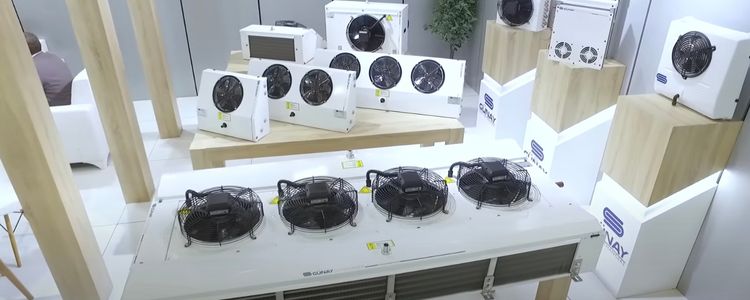
Tested Condensers, Evaporators, Fans and Resistors to Facilitate Production
Table of Contents Streamlining Production: Factory-tested Condensers, Evaporators, Axial Fans, and Resistances The Importance of Factory-tested Equipment in Production Systems Understanding the Role of Condensers in Enhancing Production Efficiency Optimizing Cooling Processes with Advanced Evaporators Maximizing Airflow with Axial Fans: A Key to Efficient Production The Critical Role of Resistances in Industrial Manufacturing How Factory-tested Components Improve Overall Production Performance Streamlining Production: Factory-tested Condensers, Evaporators, Axial Fans, and Resistances In modern manufacturing, efficiency and reliability are paramount. Factory-tested components such as condensers, evaporators, axial fans, and resistances are essential to streamline production and maintain optimal system performance. These components undergo rigorous testing and quality control processes before being implemented in production systems, ensuring they meet the highest standards of durability, efficiency, and safety. By integrating factory-tested components into their systems, manufacturers can reduce downtime, lower maintenance costs, and enhance overall productivity. Factory-tested components contribute significantly to the optimization of production workflows by minimizing potential failures and ensuring continuous, efficient operation. For instance, factory-tested condensers and evaporators provide optimal heat exchange and cooling solutions, crucial for maintaining temperature control in sensitive industrial processes. Additionally, axial fans and resistances ensure that airflow and electrical resistance are regulated precisely, enhancing system efficiency and extending equipment lifespan. The incorporation of these components into production systems helps manufacturers achieve their operational goals with greater precision and reliability. The Importance of Factory-tested Equipment in Production Systems Factory-tested equipment is designed to meet the specific needs of industrial manufacturing environments. The testing process ensures that each component is capable of withstanding the stresses and demands of continuous operation. Factory-tested condensers, evaporators, axial fans, and resistances undergo performance assessments that simulate real-world conditions, allowing manufacturers to detect and address potential issues before they occur in the field. This proactive approach to quality control helps prevent costly disruptions and ensures that systems operate at peak performance. Moreover, factory-tested components provide manufacturers with confidence in the reliability of their equipment. With extensive testing in place, businesses can reduce the risk of equipment failure and minimize the chances of downtime that can severely impact production schedules. This added reliability leads to smoother operations and cost savings in the long run, as less maintenance and fewer replacements are required. Factory-tested equipment also helps ensure compliance with safety standards and regulatory requirements, contributing to safer work environments for employees. Understanding the Role of Condensers in Enhancing Production Efficiency Condensers are essential for maintaining temperature control in various industrial applications. By transferring heat from the production system to a cooling medium, condensers ensure that machinery and processes remain within their optimal temperature range. In manufacturing, overheating can lead to reduced efficiency, equipment damage, or even system failure. Factory-tested condensers are specifically designed to handle high heat loads, providing efficient and reliable cooling solutions. Factory-tested condensers undergo rigorous evaluations to ensure that they can withstand the demanding environments in which they are used. This includes testing for thermal efficiency, durability, and resistance to environmental factors such as humidity and corrosive elements. By using factory-tested condensers, manufacturers can enhance production efficiency, reduce energy consumption, and ensure the longevity of their equipment. Additionally, these condensers help minimize the risks of overheating, leading to smoother and more consistent operations in production systems. Optimizing Cooling Processes with Advanced Evaporators Evaporators play a crucial role in optimizing cooling processes within manufacturing systems. They facilitate the transfer of heat from a system by vaporizing a coolant, which then absorbs excess heat. The efficiency of the evaporator directly impacts the overall performance of the system. Factory-tested evaporators are engineered to maximize heat transfer, ensuring effective cooling and preventing overheating that could disrupt production. These advanced evaporators are rigorously tested for performance and reliability, ensuring they deliver optimal cooling across a variety of applications. Factory testing includes evaluating the evaporator’s capacity to function efficiently in different temperatures and pressure conditions. By incorporating factory-tested evaporators into manufacturing systems, businesses can achieve better temperature regulation, increase operational efficiency, and enhance product quality. Additionally, these evaporators contribute to reducing energy costs by optimizing the cooling process, making them a vital component in modern, energy-efficient manufacturing setups. Maximizing Airflow with Axial Fans: A Key to Efficient Production Axial fans are critical in ensuring the proper airflow within industrial systems, which is necessary for maintaining optimal conditions in production environments. These fans are designed to move air efficiently, supporting the cooling process and helping to regulate temperature and humidity levels. In factory settings, proper airflow is essential for preventing overheating and maintaining a safe working environment. Factory-tested axial fans are designed to provide maximum airflow, ensuring that systems remain efficient and well-ventilated. Factory-tested axial fans are built for durability and efficiency, with rigorous testing to ensure they perform reliably even in demanding conditions. These tests evaluate the fan's airflow capacity, noise levels, and energy consumption, ensuring that they meet the specific needs of manufacturing environments. By incorporating factory-tested axial fans into production systems, manufacturers can optimize airflow, improve ventilation, and enhance the overall performance of their operations. The result is a more efficient production environment, with better temperature and humidity control that contributes to product quality and employee comfort. The Critical Role of Resistances in Industrial Manufacturing Resistances are essential components in electrical circuits and systems used in industrial manufacturing. They regulate the flow of electricity, protecting sensitive equipment from electrical surges and ensuring that power is distributed efficiently. In manufacturing systems, resistances play a crucial role in maintaining the stability of electrical components, preventing overheating and ensuring the smooth operation of equipment. Factory-tested resistances are designed to meet the exact specifications required by industrial applications, providing reliable performance over time. Factory testing ensures that resistances can handle the demands of high-power applications, providing optimal performance in critical manufacturing processes. These resistors are tested for their power rating, tolerance, and resistance values, ensuring they function as expected even under extreme conditions. By selecting factory-tested resistances, manufacturers can reduce the likelihood of equipment failures, optimize electrical efficiency, and improve the safety of their systems. The right resistances contribute to more stable electrical circuits, reducing the need for frequent maintenance and enhancing the overall efficiency of production systems.
Read More
Choosing the Right Resistances: Essential Components for Manufacturing Processes
Table of Contents Choosing the Right Resistances: Essential Components for Manufacturing Processes The Importance of Resistance Selection in Manufacturing Types of Resistors and Their Applications in Industrial Processes Factors to Consider When Choosing the Right Resistances Advances in Resistance Technology for Modern Manufacturing The Environmental Impact of Resistance Selection in Manufacturing Choosing the Right Resistances: Essential Components for Manufacturing Processes Choosing the right resistances is a critical aspect of optimizing manufacturing processes. Resistors are vital components that control the flow of electricity and protect delicate equipment from overcurrent, ensuring the proper functioning of electronic systems. Whether in industrial machinery or consumer electronics, the performance and efficiency of these systems largely depend on the quality and specification of the resistances used. Thus, understanding the importance of selecting the right resistances is essential for enhancing productivity and ensuring the longevity of manufacturing equipment. Selecting the appropriate resistances is not just about cost; it’s also about reliability and long-term performance. The right resistors contribute to smooth production operations, minimize downtime, and prevent damage to sensitive circuits. In addition, they play a crucial role in reducing energy consumption, making them a significant factor in achieving energy-efficient manufacturing processes. The importance of making informed choices when selecting resistors cannot be overstated, as they ensure the seamless operation of complex manufacturing systems that drive industrial production. The Importance of Resistance Selection in Manufacturing Resistance selection impacts the overall efficiency and functionality of manufacturing systems. Inappropriate resistances can lead to poor performance, heat generation, and eventual system failure, disrupting production processes. Ensuring that the resistance values match the system’s requirements guarantees better energy distribution, optimized functionality, and minimal maintenance needs. Proper resistance selection is crucial for sustaining the stability of manufacturing operations over time. Manufacturers must carefully assess the characteristics of resistors, including power rating, tolerance, and temperature coefficient, to ensure they meet the specific demands of the process. The wrong choice can compromise the safety of the equipment, potentially causing malfunctions and downtime, which could result in increased operational costs and delays. Therefore, meticulous resistance selection should be seen as an investment in the overall productivity and success of a manufacturing operation. The reliability of the entire system relies on the precision with which resistors are chosen, making this process a cornerstone of effective manufacturing. Types of Resistors and Their Applications in Industrial Processes There are various types of resistors used in manufacturing, each suited for specific industrial applications. Carbon film resistors are commonly used for general-purpose applications, while metal oxide resistors are designed for high-power operations. Wire-wound resistors, known for their accuracy, are ideal for precise measurements and high-precision applications. Choosing the appropriate type of resistor depends on the operating environment, voltage requirements, and power handling capacity. In industrial processes, resistors are used in a wide range of systems, including control circuits, signal processing equipment, and power regulation devices. The right resistor ensures smooth operation and minimizes the risk of system failure due to power surges or electrical imbalances. As industries continue to evolve, advancements in resistor technology are enabling the development of more specialized and efficient resistors, further enhancing manufacturing processes. For example, in high-performance applications like aerospace or automotive manufacturing, resistors designed to withstand extreme temperatures and pressure variations are critical for ensuring the reliability and safety of the systems they are integrated into. Factors to Consider When Choosing the Right Resistances When selecting resistances, manufacturers need to consider various factors to ensure the best fit for their applications. One of the most critical aspects is the power rating of the resistor, which determines its ability to withstand heat generated by electrical current without failing. Resistance tolerance is another crucial factor, as it dictates how much deviation from the nominal value is acceptable for the application. Temperature stability is also important, as extreme temperatures can cause resistors to change their characteristics, leading to potential performance issues. Additionally, manufacturers should consider the physical size and form factor of the resistor, as it must be compatible with the circuit board or device it will be used in. For some applications, particularly those involving high frequencies or harsh environmental conditions, special types of resistors, such as surface-mount resistors or high-voltage resistors, may be necessary. Understanding these factors is key to selecting the most appropriate resistances that will optimize both performance and durability. It’s also important to account for potential environmental challenges such as humidity, vibration, and exposure to corrosive elements, which may require resistors with enhanced protection or specialized coatings. Advances in Resistance Technology for Modern Manufacturing The development of resistance technology has advanced significantly in recent years, allowing manufacturers to achieve higher levels of efficiency and reliability in their operations. Modern resistances are designed to handle more power, function in extreme temperatures, and offer greater precision than ever before. Innovations such as thin-film resistors, which are used in high-precision applications, and digital resistors that allow for more control over resistance values, are just a few examples of how technology has improved the manufacturing process. These advancements in resistance technology are enabling manufacturers to optimize energy use, improve system longevity, and reduce operational costs. For instance, resistors designed for specific industries, such as automotive or aerospace, are now more durable and versatile, helping to ensure high performance under demanding conditions. With continuous improvements in materials science and electronic design, manufacturers can expect even more efficient and reliable resistances to be integrated into future systems, further boosting productivity and sustainability. The latest innovations also involve the integration of smart technologies into resistors, enabling real-time monitoring and adjustments to ensure optimal performance across a range of industrial applications. The Environmental Impact of Resistance Selection in Manufacturing Choosing the right resistances not only affects the performance and cost-efficiency of manufacturing operations but also has significant environmental implications. As manufacturers strive to reduce their carbon footprint, selecting energy-efficient resistors can play a key role in minimizing energy consumption and waste. High-efficiency resistances help decrease the overall energy usage of a system by ensuring that excess energy is not wasted in the form of heat, thus contributing to a more sustainable manufacturing process. Moreover, the materials used in resistors can also have an environmental impact. Manufacturers are increasingly turning to eco-friendly alternatives, such as resistors made from recyclable or non-toxic materials, to minimize their environmental footprint. By choosing resistances that align with sustainability goals, manufacturers can contribute to both energy efficiency and environmental preservation. This trend is expected to continue as industries increasingly prioritize eco-conscious practices, leading to greener manufacturing solutions worldwide. Additionally, recycling and reusing resistors in industrial processes is becoming more common, contributing to the circular economy and reducing the overall environmental burden of manufacturing operations.
Read More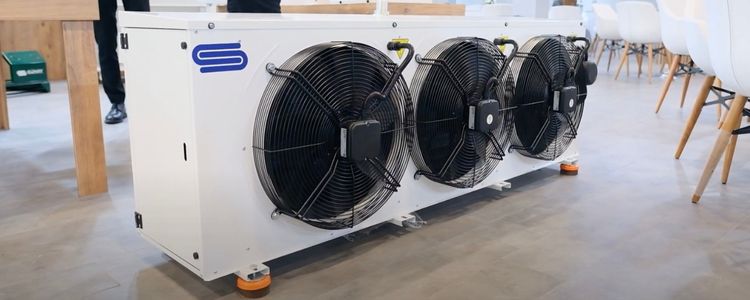
Maximizing Airflow with Axial Fans: Top Solutions for Manufacturers
Table of Contents Understanding the Role of Axial Fans How Axial Fans Work: A Comprehensive Overview Key Applications of Axial Fans in Manufacturing The Importance of Choosing the Right Axial Fan for Your Facility The Impact of Axial Fans on Energy Efficiency The Importance of Axial Fans in Maintaining Industrial Equipment Longevity Top Manufacturers and Solutions for High-Quality Axial Fans Understanding the Role of Axial Fans Axial fans are essential components in many industrial settings, providing necessary airflow for cooling and ventilation systems. These fans are designed to move air along the axis of rotation, which allows them to provide consistent, efficient airflow for machinery and equipment. In manufacturing processes, controlling temperature is vital to avoid overheating and maintain smooth operation. Understanding the function and significance of axial fans enables manufacturers to select the appropriate solution for their needs. The role of axial fans goes beyond simple cooling. In modern manufacturing environments, where efficiency and productivity are prioritized, axial fans play a pivotal role in improving overall operational performance. Proper airflow management also affects other critical aspects such as product quality and machinery reliability. With increasing demands for industrial efficiency, axial fans have become indispensable in maintaining a smooth and effective production process. How Axial Fans Work: A Comprehensive Overview Axial fans work by drawing air into the center of the fan and expelling it in the direction of the fan blades' rotation. This design provides high airflow at low pressure, making them ideal for environments where large volumes of air are required. The blades of the fan are positioned to push air in a straight line, making them highly effective for applications that demand constant, reliable airflow. Axial fans are often distinguished from other types of industrial fans by their straightforward design and ability to move large amounts of air with minimal energy consumption. The efficiency of axial fans makes them an essential part of many cooling systems in manufacturing plants, helping to keep temperatures under control. Their simple yet effective design ensures long-lasting performance with minimal maintenance needs, further contributing to the cost-effectiveness of industrial operations. Key Applications of Axial Fans in Manufacturing Axial fans are commonly used in manufacturing for tasks that require consistent airflow to ensure equipment and machinery operate at optimal temperatures. These fans are especially useful in cooling systems, where they help regulate the temperature of machinery and prevent overheating. In addition, they are often used in air filtration systems to maintain a clean working environment by moving air through filters and removing contaminants. In addition to their cooling applications, axial fans are widely used in ventilation and drying systems. Manufacturing processes often produce excess moisture or fumes, and axial fans help to remove these contaminants from the air, ensuring a healthy and safe work environment. Whether in chemical processing, food production, or heavy machinery operations, axial fans maintain air quality, reduce energy consumption, and improve overall operational efficiency. The Importance of Choosing the Right Axial Fan for Your Facility Choosing the right axial fan for your facility involves considering factors such as airflow capacity, power consumption, and environmental conditions. Incorrect fan selection can lead to inefficiencies, increased energy costs, and potential damage to equipment. It is crucial to match the fan's specifications with the operational requirements of the facility to ensure optimal performance. Choosing the right axial fan extends beyond simply selecting a fan that fits the physical dimensions of the space. Other considerations, such as noise levels, reliability in different temperature conditions, and resistance to corrosion, also come into play. A detailed assessment of the facility's airflow needs, alongside expert consultation, can help manufacturers make the best choice. Ultimately, this leads to improved system reliability, less downtime, and a reduction in long-term operational costs. The Impact of Axial Fans on Energy Efficiency Energy efficiency is one of the primary considerations when selecting any industrial equipment, and axial fans are no exception. These fans are designed to provide high airflow with minimal energy consumption, making them an ideal choice for energy-conscious manufacturers. By optimizing the airflow, axial fans reduce the need for excessive cooling or ventilation, thereby lowering overall energy costs. The role of axial fans in enhancing energy efficiency becomes even more critical as industries look to reduce their carbon footprints and meet regulatory standards. By utilizing energy-efficient fans, companies can reduce their operational costs and improve their sustainability efforts. Moreover, axial fans' low maintenance requirements further contribute to long-term cost savings, making them an attractive option for businesses seeking both efficiency and environmental responsibility. The Importance of Axial Fans in Maintaining Industrial Equipment Longevity Proper cooling is vital for extending the lifespan of industrial equipment. Axial fans play a crucial role in maintaining the right temperature for machinery and preventing overheating, which can cause wear and tear over time. Consistent airflow helps to dissipate heat from components, ensuring they remain within their operational temperature range and function efficiently for a longer period. In industries where equipment is subjected to intense operating conditions, axial fans are particularly beneficial. By reducing the risk of thermal damage and maintaining the integrity of sensitive components, these fans help to minimize downtime and repair costs. Their role in protecting equipment enhances productivity and ensures that machinery operates at peak performance for as long as possible. The longevity of industrial machinery depends heavily on the cooling systems in place, and axial fans are an essential component in this equation. Top Manufacturers and Solutions for High-Quality Axial Fans There are many manufacturers offering high-quality axial fans designed for industrial applications. These manufacturers provide a range of options to suit different operational needs, from fans that offer low noise levels to those designed for high airflow in demanding environments. It is important to select a manufacturer that is known for producing durable, reliable products that meet industry standards. Leading manufacturers often offer advanced solutions that integrate axial fans into larger systems, such as air conditioning or ventilation setups. These fans are engineered to deliver optimal performance while minimizing energy consumption and maintenance needs. By working with trusted suppliers, manufacturers can ensure that they are investing in axial fans that contribute to both operational efficiency and long-term equipment health. Additionally, customer support and warranty services offered by top manufacturers ensure that businesses have the support they need for ongoing operations.
Read More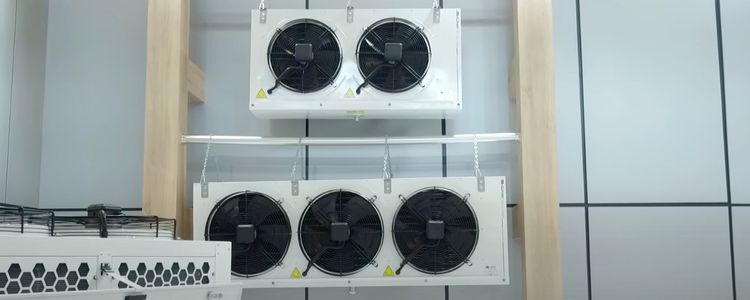
The Role of Evaporators in Industrial Production: Optimizing Efficiency
Table of Contents Introduction to Evaporators in Industrial Production Understanding the Function of Evaporators Types of Evaporators Used in Industrial Applications Importance of Efficient Evaporators Energy Efficiency and Cost Reduction through Evaporators Maintenance of Evaporators for Maximum Performance The Role of Evaporators in Industrial Production: Optimizing Efficiency Evaporators are vital components in many industrial applications, playing an essential role in separating liquids from gases by utilizing heat. In manufacturing processes, evaporators help remove volatile substances from liquids, concentrating the remaining material. Whether in food processing, chemical production, or HVAC systems, these devices optimize thermal efficiency and ensure operations remain consistent and energy-efficient. With their capacity to transfer heat efficiently, evaporators are crucial in maintaining the right balance of temperature and material properties. As industries advance, the role of evaporators continues to evolve to meet increasing demands for performance and sustainability. In industrial production, evaporators extend beyond simple liquid removal. By controlling phase changes, they improve production speed and reduce waste. With the growing emphasis on sustainability, efficient evaporators help reduce fuel use and carbon emissions. The role of evaporators in optimizing manufacturing efficiency continues to evolve, making them indispensable to modern industrial processes. Their versatility allows them to meet specific needs in diverse industries, increasing their value in global manufacturing. Introduction to Evaporators in Industrial Production Evaporators are essential in many industries, providing a heat transfer mechanism to remove water or solvents from materials. Their design and efficiency directly affect the productivity and energy consumption of production systems. Evaporators are used in food and beverage, pharmaceutical, chemical processing, and HVAC industries, aiding in refining raw materials and concentrating solutions. As industries scale, the demand for energy-efficient evaporators has increased, leading to advancements in technology. This growth has created new opportunities for the development of more energy-efficient and environmentally friendly solutions. The working principle of evaporators is based on heat transfer, causing liquids to evaporate and leave behind concentrated substances. Modern evaporators are designed for minimal energy consumption and environmental impact. Their role in industrial production continues to expand, making them a cornerstone of efficiency optimization. With advancements in automation and control systems, evaporators now offer higher precision in temperature and pressure management, further enhancing their efficiency. Understanding the Function of Evaporators Evaporators separate components by converting a liquid into vapor using heat, essential for concentrating solutions or distilling chemicals. This process is vital in industries like pharmaceuticals, where consistency is crucial. The liquid is exposed to heat, causing it to vaporize, and the vapor is separated from the liquid. Evaporators help maintain precise product composition, which is critical in many industries. Their ability to control evaporation rates ensures that the final product meets the required standards. Evaporators come in different designs, such as falling film evaporators, forced circulation evaporators, and flash evaporators, each suited to specific applications. For example, falling film evaporators are used in sensitive products like fruit juices. Efficient evaporation relies on controlling temperature, pressure, and flow rates to achieve optimal conditions for the material. This ensures high-quality, consistent products. Understanding these different evaporator types allows industries to select the most appropriate system for their needs. Types of Evaporators Used in Industrial Applications There are various evaporator types, each designed for specific needs. Falling film evaporators are common in the food and beverage industry for their efficient liquid evaporation at low temperatures. Forced circulation evaporators are often used for high-viscosity liquids, especially in chemical processing. These systems use a pump to circulate the liquid, ensuring it remains at an optimal temperature and flow rate. Such flexibility in design ensures that each application can achieve the highest efficiency possible. Flash evaporators are ideal for rapid evaporation of volatile substances by lowering the pressure in the system. These evaporators are common in chemical processing and desalination. Plate evaporators are compact and efficient, suitable for heat-sensitive materials. The choice of evaporator depends on the specific industrial process and its unique needs. With the ongoing advancements in evaporator technology, new hybrid systems are being developed to combine the benefits of multiple evaporator types for enhanced performance. Importance of Efficient Evaporators Efficiency is key in evaporators, as they are responsible for a significant portion of a production system's energy consumption. Efficient evaporators reduce energy use, maximizing vaporized liquid per energy unit. These systems not only lower energy costs but also reduce environmental impact by minimizing fuel use. Energy-efficient evaporators are critical in reducing carbon emissions and meeting sustainability goals. Moreover, reducing energy consumption directly translates to lower operating costs, enhancing the bottom line of manufacturing facilities. Efficient evaporators contribute to the reliability of production systems. In industries with strict quality and temperature control needs, inefficiencies in the evaporation process can result in product quality issues or production delays. High-performance evaporators ensure continuous operations and product consistency. With real-time monitoring, modern evaporators can adapt to maintain optimal efficiency. This adaptability is vital for keeping production running smoothly and preventing costly interruptions in the supply chain. Energy Efficiency and Cost Reduction through Evaporators Energy-efficient evaporators play a significant role in reducing operational costs. Modern systems optimize heat transfer and capture waste heat, reusing it to further reduce energy consumption. These energy-saving features help meet sustainability goals while lowering carbon footprints. Cost savings can be reinvested into system improvements or production expansion. As industries increasingly focus on environmental responsibility, these systems offer a competitive edge by helping companies maintain profitability and compliance with regulations. Energy-efficient evaporators also help manufacturers comply with environmental regulations aimed at reducing energy consumption. These systems demonstrate a commitment to sustainability, preventing penalties for non-compliance. The savings realized from energy-efficient evaporators can enhance competitiveness in the market, driving long-term profitability. The adoption of energy-efficient technologies ensures that companies can stay ahead of the curve and maintain operational excellence. Maintenance of Evaporators for Maximum Performance Regular maintenance is crucial for maintaining evaporator performance. Cleaning the surfaces to remove scale or fouling ensures efficient heat transfer. Pump, valve, and sensor inspections help keep the system running smoothly. Proactive maintenance identifies issues early, preventing costly downtime or failures. By implementing a thorough maintenance schedule, production systems can continue to operate efficiently and reduce the risk of unexpected shutdowns. Maintaining refrigerants and heat transfer fluids is essential for optimal operation and product quality. Routine checks and fluid management ensure the system works effectively. A comprehensive maintenance schedule, including preventive and corrective measures, maximizes the evaporator’s lifespan and minimizes inefficiencies. By regularly replacing worn components and addressing minor issues, manufacturers can extend the life of their evaporators and prevent costly repairs.
Read More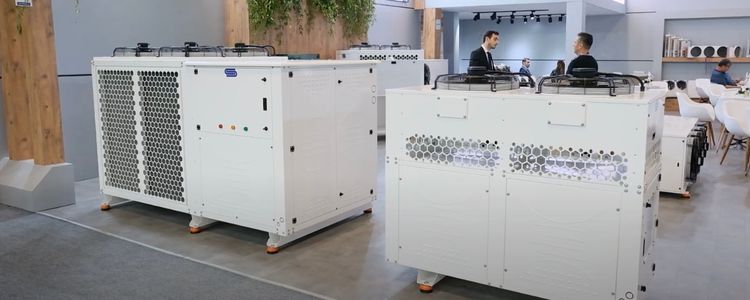
Efficient Condensers: Enhancing Cooling Performance in Manufacturing
Table of Contents Importance of Efficient Condensers in Manufacturing Types of Efficient Condensers Benefits of High-Performance Condensers Energy Efficiency and Environmental Impact Choosing the Right Condenser for Your Manufacturing Process Maintenance and Troubleshooting of Condensers Efficient Condensers: Enhancing Cooling Performance in Manufacturing Efficient condensers are vital components of modern manufacturing systems, serving as the backbone of cooling and heat transfer mechanisms. These devices are critical in managing the temperature of machinery and processes, ensuring that systems operate at optimal levels. With manufacturing processes often generating significant heat, condensers help to dissipate this heat, preventing equipment damage and ensuring continuous, smooth operation. By transferring heat from refrigerants to ambient air or water, efficient condensers make it possible to maintain temperatures within specific parameters, preventing overheating and promoting energy efficiency. In addition to cooling applications, condensers are fundamental in various industries, from food and beverage production to electronics and pharmaceuticals, where strict temperature control is essential. With the growing demand for sustainability, industries are increasingly turning to energy-efficient condensers that not only provide effective cooling but also help reduce energy consumption and environmental impact. Importance of Efficient Condensers in Manufacturing Efficient condensers are integral to the performance and reliability of manufacturing systems. In sectors such as food processing, where maintaining specific temperatures is crucial to product quality, condensers ensure that temperature-sensitive processes remain within safe limits. Similarly, in chemical manufacturing and pharmaceuticals, temperature regulation is critical for both the safety of operations and the quality of the end product. Without high-performance condensers, equipment could overheat, leading to breakdowns and increased maintenance costs. Furthermore, condensers help minimize the impact of temperature fluctuations on both the manufacturing process and the environment. For instance, industries that rely heavily on refrigeration and air conditioning for production benefit from condensers that offer consistent cooling performance, even in fluctuating external conditions. The use of these high-efficiency condensers ensures that products are produced under optimal conditions, minimizing waste and maximizing productivity. The result is a more stable, cost-efficient operation that can meet the growing demand for high-quality products in an increasingly competitive marketplace. Types of Efficient Condensers There are various types of condensers, each designed to meet different cooling needs based on the specific requirements of the manufacturing process. Air-cooled condensers are one of the most common types and are typically employed in environments where water supply is scarce or unavailable. These condensers rely on ambient air to dissipate the heat absorbed from the refrigerant. They are widely used in small- to medium-sized operations due to their relatively simple design and ease of installation. While they may require more energy to operate compared to water-cooled systems, their lower initial cost and reduced water consumption make them an attractive option for certain applications. On the other hand, water-cooled condensers are designed to offer more consistent cooling by using water to absorb and remove heat from the refrigerant. These condensers are commonly used in larger facilities or where higher cooling capacities are required, as water can absorb more heat efficiently than air. They are typically employed in large-scale industrial operations such as HVAC systems, refrigeration systems, and large chemical plants. However, water-cooled systems require a continuous water source and are often more complex to maintain than air-cooled systems. Another increasingly popular option is the evaporative condenser, which combines the features of both air- and water-cooled systems. This type of condenser uses a combination of air and water to enhance the cooling process. Benefits of High-Performance Condensers The primary advantage of high-performance condensers is their ability to optimize heat transfer, which directly impacts cooling efficiency and energy consumption. By effectively removing heat from the refrigerant, these condensers ensure that cooling systems operate at peak efficiency, reducing the need for additional energy inputs. This not only lowers electricity costs but also enhances the overall performance of the system, leading to fewer breakdowns and increased equipment lifespan. Additionally, high-performance condensers contribute to improved temperature stability, which is essential in industries where precision is key. For example, in pharmaceutical manufacturing, maintaining a consistent temperature ensures that products meet stringent quality standards. In food production, temperature control is critical to preserving the quality and safety of products. With the ability to provide consistent and reliable cooling, high-performance condensers ensure that these industries can meet their operational requirements while minimizing waste and product defects. Energy Efficiency and Environmental Impact Energy efficiency plays a crucial role in modern manufacturing, as companies face increasing pressure to reduce their energy consumption and environmental impact. Efficient condensers help manufacturers meet these challenges by offering advanced technology that reduces energy use while maintaining or even improving cooling performance. This reduction in energy consumption can significantly lower operating costs, making it a highly attractive option for companies looking to stay competitive in an energy-conscious world. Moreover, the environmental impact of condensers is significantly mitigated through the use of eco-friendly refrigerants and cooling methods. Traditional refrigerants used in older systems can have a high global warming potential (GWP), contributing to climate change. In contrast, modern condensers utilize refrigerants with lower GWP, as well as more sustainable cooling techniques, to reduce their environmental footprint. Choosing the Right Condenser for Your Manufacturing Process When selecting a condenser for a manufacturing process, it’s important to consider various factors, including cooling capacity, space requirements, and energy efficiency. The size of the condenser must match the heat load generated by the manufacturing equipment, ensuring that the system can handle the cooling demands without excessive energy consumption. For larger operations, water-cooled or evaporative condensers may be more suitable due to their higher cooling capacities, while smaller operations might benefit from air-cooled systems. Space availability also plays a significant role in condenser selection. Air-cooled systems, for example, require sufficient space for air circulation and heat dissipation, while water-cooled systems need a reliable water source. Manufacturers should carefully evaluate the physical space available in their facilities and choose a condenser that fits within those constraints while still providing optimal cooling performance. Maintenance and Troubleshooting of Condensers To ensure efficient operation, regular maintenance is essential for all types of condensers. This includes tasks such as cleaning the coils to remove dirt and debris, checking refrigerant levels, and inspecting the system for any signs of wear and tear. Neglecting maintenance can lead to reduced efficiency, higher energy costs, and potential system failures. Manufacturers should establish a regular maintenance schedule and ensure that trained personnel are responsible for conducting the necessary inspections and repairs. Troubleshooting is equally important when dealing with condenser performance issues. Common problems include reduced cooling capacity, refrigerant leaks, or abnormal noises. By quickly identifying and addressing these issues, manufacturers can prevent further damage to the system and avoid costly repairs or replacements. For example, a decrease in cooling capacity may indicate a refrigerant leak or clogged coils, both of which can be resolved through routine maintenance or professional servicing.
Read More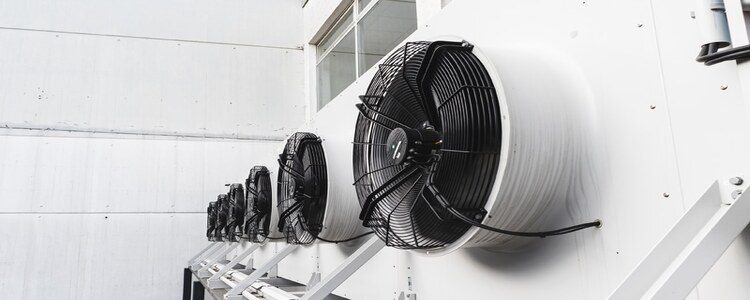
Axial Fans Providing the Best Air Flow in the Industry: Working Principles and Application Areas
Contents Working Principles of Axial Fans The Role of Axial Fans in the Industrial Field Axial Fan Designs Providing the Best Airflow in the Industry Efficiency and Energy Saving Features of Axial Fans Various Application Areas of Axial Fans Maintenance and Long-Lasting Use of Axial Fans Technological Innovations That Increase the Airflow Performance of Axial Fans The Future of Axial Fans and New Trends Working Principles of Axial Fans Axial fans are devices used to provide high air flow by pushing air directly in a parallel direction. These fans draw in air as the rotor rotates and push it outwards in the same direction. Its operating principle is based on directing the air in a horizontal movement, which ensures efficient air flow, especially in large areas. Axial fans generally work effectively in low pressure, high flow systems. In axial fans, rotor blades play an important role in directing and accelerating the air flow. The fan's motor rotates the rotor blades, sucking in air and pushing it outward in a directed manner. This mechanism makes it possible to provide uninterrupted and effective air flow, especially in industrial areas. These types of fans generally operate with high efficiency and provide low energy consumption, but they may be insufficient in applications where more air pressure is required. The Role of Axial Fans in the Industrial Field Axial fans have an important place in industrial applications. These fans are used to provide air circulation and control the temperature of the environment, especially in large areas. In large areas such as factories, warehouses, mines and power plants, axial fans play a critical role in improving air quality and maintaining temperature balance. These fans help to remove the dirty air in the environment as they provide high flow rate. In industrial use, axial fans are preferred especially in cooling systems and ventilation systems. It increases air flow in ventilation systems, making the environment healthier and more comfortable. At the same time, in areas where large machines operate, these fans perform the cooling function required for the machines to operate efficiently. Axial fans provide safe and efficient solutions that optimize the air management of industrial environments. Axial Fan Designs Providing the Best Airflow in the Industry The best axial fan designs in the industry should have features that provide high airflow and low energy consumption. These fans feature aerodynamically designed rotor blades and powerful motors for optimal performance. Designs that increase the efficiency of fans provide more air flow while also making it possible to operate with minimum energy loss. Modern axial fans minimize sound levels, providing a quieter working environment for users. The materials used in axial fan designs are also important. Durable materials such as stainless steel and aluminum contribute to the long life of the fans. Well-designed fans can direct airflow efficiently and continue working smoothly even in the event of any blockage. Such designs are capable of showing high performance, especially in heavy industrial conditions. Efficiency and Energy Saving Features of Axial Fans Axial fans save energy with optimized designs to increase efficiency. These fans are capable of providing high airflow with low energy consumption. Energy efficiency is achieved through improvements made in the fan's motor, rotor blades and general design. Modern axial fans significantly reduce the energy costs of businesses by preventing unnecessary energy expenditures. The efficiency of fans is of great importance, especially in continuously operating industrial applications. In industrial facilities, the high efficiency operation of axial fans with low energy reduces both operational costs and environmental impacts. Energy efficient fans are an important step towards providing sustainable energy solutions. These fans offer an environmentally friendly and economical solution by saving energy while providing high performance. Various Application Areas of Axial Fans Axial fans are used in a wide range of applications, from industrial ventilation and cooling systems to commercial and residential spaces. In the agricultural sector, axial fans are also used in greenhouse ventilation systems. These fans provide the airflow needed for healthy growth of plants and optimize temperature control. Another application area is HVAC systems. Axial fans increase energy efficiency by performing ventilation and cooling functions in large buildings. The automotive industry is an important area of use for axial fans. Axial fans are used in engine cooling systems to ensure efficient operation of vehicle engines. Axial fans are also used to regulate air flow in transportation vehicles such as airplanes and ships. These fans perform even in all kinds of harsh environments, and are especially critical in air transportation and maritime transportation. In such applications, axial fans provide a safe and efficient solution that directs air flow. Maintenance and Long-Lasting Use of Axial Fans Regular maintenance of axial fans ensures long-lasting and efficient operation of the systems. Fans can become inefficient over time due to dust and dirt accumulation. Therefore, periodic cleaning and motor checks extend the life of the fan and increase its performance. Regular maintenance of axial fans reduces the risk of malfunctions and prevents sudden stops. Operations such as lubrication and vibration control are also important for fan motors to function properly. Axial fans can increase noise levels and reduce airflow if not maintained. Therefore, it is necessary to get service from experts in the maintenance of fans. Maintenance and cleaning processes increase the performance of the fan and ensure long-term use, which helps reduce operating costs. Technological Innovations That Increase the Airflow Performance of Axial Fans Developing technology offers innovative solutions to increase the airflow performance of axial fans. New generation axial fans have improved aerodynamic designs to provide more efficient airflow and are integrated with modern digital control systems to operate the motors more efficiently. These innovations enable fans to provide high performance with low energy consumption. Technological advances allow axial fans to operate quieter and require less maintenance. In addition, sensors and automatic control systems instantly monitor the air flow of the fans and make the necessary adjustments. In this way, the fans always work in the most efficient way. Thanks to the use of advanced materials, the fans become more durable, making them ideal for harsh industrial conditions. The Future of Axial Fans and New Trends Axial fan technology aims to provide more sustainable and environmentally friendly solutions in the future. Innovative designs will allow the development of fans that consume less energy and provide greater efficiency. With digitalization and IoT (Internet of Things) integration, fans will become smarter and their performance will be optimized thanks to automatic control systems. However, future technologies will be directed towards producing more efficient and quieter fans. The use of axial fans will become more widespread in innovative areas such as electric vehicles and sustainable buildings. Fans will provide more efficient air flows in industrial and commercial applications, reducing environmental impacts by minimizing energy consumption. In this way, axial fans will become products that offer more economical, environmentally friendly and efficient solutions in the future.
Read More
Resistance Systems: High Performance Solutions for Industrial Heat Management
Contents The Role of Resistance Systems in Industrial Heat Management High Performance Resistance Systems and Efficiency Usage Areas of Resistance Systems in Different Industries More Efficient Heat Management with Developing Technologies Energy Efficiency and Environmental Impacts in Resistance Systems Fast Temperature Control and Safety in Resistance Systems Advantages of Long Life Resistance Systems Future Resistance Technologies and Innovations The Role of Resistance Systems in Industrial Heat Management Resistance systems are of critical importance in industrial heat management. These systems, which are used effectively in a wide range of areas from heat production to control, provide high efficiency. In industrial processes, maintaining certain temperature levels directly affects production quality. Proper design and use of resistance systems allows energy consumption to be optimized. Proper functioning of thermal management provides increased performance and lowers operating costs for all types of industrial applications. These systems work on the principle of directly converting electrical energy into heat. In the industrial field, high temperatures are needed in many sectors such as metal processing, food production or automotive. Resistance systems support these processes to occur efficiently by providing the correct amount of heat. The quality of the materials used in heat conduction greatly affects the overall efficiency of the systems. Therefore, correct material selection and technological developments ensure higher performance of the systems. High Performance Resistance Systems and Efficiency High-performance resistance systems play an important role in increasing efficiency in industrial heat management. These systems provide the same level of heat production while consuming less energy. Such resistors allow heating elements to work more efficiently. Performance varies depending on the materials, design and manufacturing techniques used. Resistance systems, especially those with high temperature resistance, do not lose their effectiveness even in long-term use. Advanced resistance designs respond faster to heating processes and reach targeted temperature levels in a short time. This provides a significant advantage, especially in production processes, because the shortening of the heating process increases the overall production speed. Additionally, these systems increase safety by minimizing problems such as overheating. High-performance systems not only provide efficient heat management, but also reduce environmental impact by saving energy. Usage Areas of Resistance Systems in Different Industries The usage areas of resistance systems are quite wide, considering the diversity of industrial processes. These systems are frequently used in sectors such as metal processing, automotive production and plastic processing. For example, in metal heat treatment processes, high temperatures are required for materials to reach the desired hardness level. Resistance systems ensure that these processes occur in an uninterrupted and controlled manner. These systems, which are used in cooking and drying processes in the food industry, provide more homogeneous cooking by keeping the temperatures in the facility at a certain level. Resistance systems reduce operational costs by providing energy efficiency in such industries. Thanks to systems that can meet all types of industrial cooling and heating needs, it is possible to carry out processes quickly and safely. This provides high performance and low energy consumption in production lines. This diversity across different industries demonstrates the flexibility and versatility of resistance systems. More Efficient Heat Management with Developing Technologies Developing technologies constantly offer innovative solutions to increase the efficiency of resistance systems. New generation electronic circuits and digital control systems allow more precise control of heating processes. These systems automate temperature control, eliminating human errors and increasing energy efficiency. Technological developments also reduce maintenance costs by making resistance elements more durable and long-lasting. Sensors used in heat management collect real-time data and constantly monitor heat levels. This data helps analyze the performance of the system. Resistors produced with advanced materials work more efficiently even at higher temperatures. This reduces energy losses and helps reduce operating costs. Innovative technologies contribute to making industries more sustainable by providing more efficient solutions in industrial cooling and heating systems. Energy Efficiency and Environmental Impacts in Resistance Systems Energy efficiency is a critical factor in industrial resistance systems. An efficient resistance system can reach the same temperature level by consuming less energy. This allows for a reduction in environmental impacts while reducing energy costs. Minimizing losses in the process of converting electrical energy into heat increases the overall efficiency of the system. Designs made using environmentally friendly materials and technologies ensure sustainable energy use. To ensure energy efficiency, it is important that the resistance elements heat up efficiently and retain heat for a long time. This allows energy losses to be reduced and systems to operate with lower energy consumption. Advanced systems minimize environmentally damaging emissions. Reducing environmental impacts enables companies to achieve their sustainability goals. These improvements in resistance systems offer solutions that benefit both businesses and the environment. Fast Temperature Control and Safety in Resistance Systems Fast temperature control in resistance systems plays a critical role, especially in industrial production processes. Fast-response systems shorten production times by quickly reaching targeted temperature levels. Such systems are equipped with mechanisms that increase occupational safety. Heat levels can be constantly monitored, thus preventing problems such as overheating. Systems that can operate safely help protect the workforce. Technologies that optimize thermal control give users greater control over the system. This creates a more efficient and safe environment in production processes. Systems that provide rapid temperature control also minimize energy losses. In this way, businesses can achieve higher efficiency at lower costs. Thermal security is indispensable for the operation of industrial facilities, and systems that provide rapid temperature control are an important element that increases this security. Advantages of Long Life Resistance Systems Long-lasting resistance systems require less maintenance in industrial areas, providing significant savings to businesses. These systems, made of durable materials, offer longer-term use. This significantly reduces the maintenance and repair costs of businesses. Long-lasting systems malfunction less frequently and do not cause disruptions in production lines. Durable resistance systems are more resistant to overheating and other adverse conditions. Thanks to these features, it increases the operational efficiency of businesses. Long-life systems allow industrial facilities to operate more sustainably and cost-effectively. Thus, businesses achieve high efficiency with lower operating costs in the long run. Such systems accelerate the return on investment and provide a more economical production process. Future Resistance Technologies and Innovations Innovations in resistance technologies constantly aim to provide more efficient and environmentally friendly solutions. With developing technology, faster heating, higher efficiency and lower energy consumption are provided. In the future, the materials used in resistance systems will be more durable and environmentally friendly. Digital control systems will make heat management more precise and safe. New generation resistance systems will have the capacity to produce more heat by consuming less energy. These technologies provide more sustainable and cost-effective solutions in industrial applications. Innovative designs and use of materials allow systems to operate longer and more efficiently. The future holds great potential for cleaner and more efficient solutions in industrial heat management.
Read More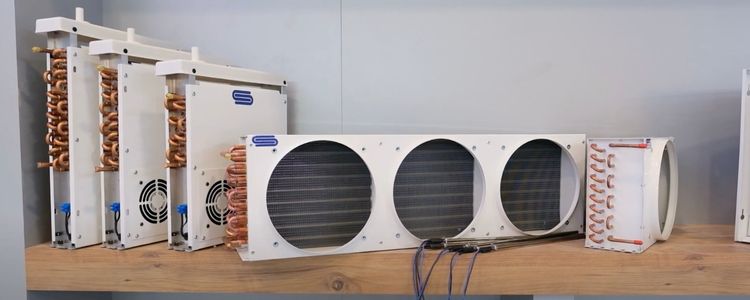
New Developments in Refrigeration Technologies: The Future of Evaporator and Condenser Systems
Contents Innovative Designs and Developing Engineering Methods in Cooling Systems Modular Cooling Systems: Flexibility and Efficiency The Role of Temperature Monitoring and Remote Monitoring Systems Artificial Intelligence Supported Possible Failure Prediction in Cooling Systems Social Impacts and Social Responsibility: Sustainable Cooling Systems Energy Efficient Cooling Methods Advanced Fluid Technologies in Industrial Cooling Systems Cooling Solutions of the Future: Rapidly Changing Market and Innovation Innovative Designs and Developing Engineering Methods in Cooling Systems Cooling systems are constantly evolving with innovative engineering methods and designs. Especially in recent years, research in this field has allowed the development of smaller and more compact systems. The materials used have also undergone a major change to make designs more efficient. These materials are specially selected to provide better heat transfer and less energy consumption. In order to make cooling systems environmentally friendly, new generation fluids with low GWP (Global Warming Potential) and ODP (Ozone Depletion Potential) levels have begun to be used. These innovative designs in industrial cooling systems have a significant impact on both increasing efficiency and reducing operating costs. Cooling solutions, especially integrated into HVAC (Heating, Ventilation and Air Conditioning) systems, demonstrate high performance in different sectors. New designs allow users to achieve higher efficiency with less energy. In this process, it is also of great importance to maintain the balance between aesthetics and functionality. In the future, the development of more flexible and versatile cooling systems will increase the pace of innovation in industries. Modular Cooling Systems: Flexibility and Efficiency Modular cooling systems stand out as another innovative solution that provides flexibility in the field of industrial cooling. These systems are structured with modules that can be customized and expanded according to users' needs. While each module provides a specific cooling capacity, additional modules can be added or removed as needed. This feature provides a great advantage, especially for facilities with variable production capacity. Modular systems provide energy efficiency and also minimize maintenance costs. In addition, the maintenance and management of cooling systems becomes much simpler, since each module can be monitored independently and intervened when necessary. Modular structures allow industrial cooling systems to become more flexible. These systems, which can be adapted to different sectoral needs, offer great convenience to the user both during and after the installation phase. Such systems will become more widespread in the future and will increase the efficiency of industrial facilities. Modular systems will play an important role in reducing operational costs and reducing environmental impacts. Modular cooling systems continue to be rapidly adopted in many sectors as they offer efficient solutions in terms of both cost and time. The Role of Temperature Monitoring and Remote Monitoring Systems Temperature control is of critical importance in industrial cooling systems. Temperature monitoring systems enable instantaneous monitoring of temperatures during the cooling process and allow rapid intervention in case the system encounters any problems. These systems instantly monitor the performance of cooling devices using sensors and digital monitoring platforms. Technologies that allow users to monitor devices with remote access make management processes more efficient. Such systems increase the overall efficiency of businesses with optimizations that increase the energy efficiency of devices. The use of temperature monitoring systems in cooling systems is of great importance, especially in the food and pharmaceutical industries. In these sectors, temperature controls must be carried out constantly to preserve the products in a healthy way. Digital monitoring systems also collect data and make reports, so businesses can make healthier decisions. Thanks to advanced monitoring systems, the status of the devices can be monitored in real time and precautions can be taken before any malfunction occurs. This significantly reduces maintenance costs in the long run. Real-time monitoring and analysis ensures high safety and quality in cooling processes, as well as increasing efficiency. Artificial Intelligence Supported Possible Failure Prediction in Cooling Systems Artificial intelligence and machine learning add a new dimension to the maintenance processes of industrial cooling systems. Artificial intelligence-supported systems can predict possible malfunctions in devices and ensure timely maintenance. This increases the overall efficiency of the system while ensuring uninterrupted operation. By analyzing historical data, machine learning algorithms predict future malfunctions and maintenance planning is made according to these predictions. In this way, unwanted malfunctions are prevented and the life of the system is extended. Thanks to these technologies, businesses can maintain efficient operations for longer periods of time at less cost. AI-supported cooling systems also allow users to optimize maintenance processes. For example, artificial intelligence algorithms that monitor a device's temperature values send an alert when it detects an abnormal situation. Thanks to these warnings, intervention is made before the device causes a possible malfunction. Thus, businesses gain advantages in terms of both efficiency and security. Artificial intelligence also analyzes energy consumption and offers solutions that will provide lower energy consumption. These developments not only provide great cost savings in the long term, but also minimize the environmental impact of businesses. Social Impacts and Social Responsibility: Sustainable Cooling Systems The development of industrial cooling systems is done in a way that will benefit not only businesses but also societies. Developing environmentally friendly systems is of great importance for the sustainability of societies. Such efforts aimed at achieving zero carbon targets provide a cleaner and healthier environment for societies. Sustainable cooling systems enable important steps to be taken to reduce energy consumption and provide environmentally friendly solutions. These solutions also offer financial benefits to businesses in the long term, because energy efficient systems reduce operating costs. Within the scope of social responsibility, the use of environmentally friendly materials in cooling systems is encouraged. These materials help reduce greenhouse gas emissions and protect nature. Businesses' environmentally friendly production by adopting sustainable solutions not only enables them to make profits but also provides social benefits. Such practices make it possible for future generations to live in a cleaner world. Industrial cooling systems contribute to the development of societies with this environmentally sensitive approach. Innovative studies in this field allow important steps to be taken for a healthier world in line with both environmental and social responsibilities. Energy Efficient Cooling Methods The efficient operation of industrial cooling systems depends on minimizing energy consumption. Energy efficient cooling methods reduce the energy costs of businesses and minimize the environmental impact. These methods aim to increase energy efficiency by using advanced compressor technologies and refrigerants that provide lower energy consumption. Such systems increase the operational efficiency of businesses, providing both financial gain and environmentally friendly solutions. Efficient cooling systems are further optimized with the advancement of technology and lower energy consumption is achieved. Energy efficient cooling systems allow users to achieve the same performance by consuming less energy. Such innovations in cooling systems help to significantly reduce energy consumption in industrial facilities. These systems also allow businesses to fulfill their environmental responsibilities by reducing their carbon footprint. Increasing efficiency not only provides cost savings to businesses, but also contributes to a more sustainable production process. Therefore, ensuring energy efficiency will be an issue that will become more prominent in cooling systems in the future. Advanced Fluid Technologies in Industrial Cooling Systems One of the factors that play an important role in the development of industrial cooling systems is the advancement of fluid technologies used. Fluids form the basis of cooling processes and directly affect cooling efficiency. New generation fluids help cooling systems consume less energy by providing higher efficiency at low temperatures. Such fluids are environmentally friendly and prevent the release of harmful gases into the atmosphere. At the same time, the life of the fluids is extended, ensuring that the systems operate efficiently for a longer period of time. These technologies make significant contributions to reducing environmental impacts in the cooling industry. Newly developed refrigerants have optimized chemical compositions to increase energy efficiency. These fluids can operate with high efficiency even at lower temperatures. The effect of fluids on cooling systems is of great importance. Thanks to developing technologies, the fluids used in cooling systems are becoming more efficient, safer and environmentally friendly.
Read More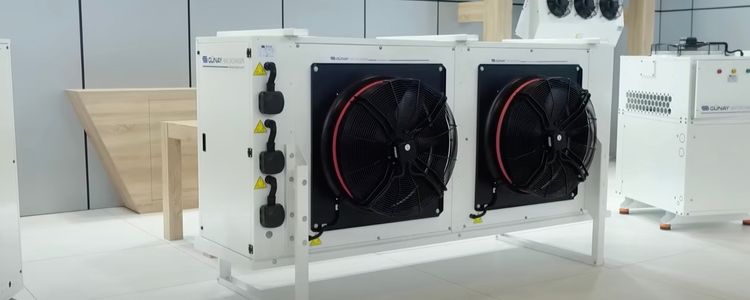
Increase Cooling Performance by Saving Energy with Axial Fans
Contents What are Axial Fans? The Role of Axial Fans in Cooling Systems Energy-Saving Axial Fan Technologies Factors to Consider When Selection of Axial Fans Use of Axial Fans in Various Industries Increasing Cooling Performance with Axial Fans Maintenance and Efficiency of Axial Fans What are Axial Fans? Axial fans are fans that push air in a parallel direction, frequently used in industrial cooling and ventilation systems. These fans have the capacity to produce very high air flow and provide efficient results when operating at low pressures. The impeller inside the fan rotates and pushes the air forward, thus creating air flow. They are generally used in industrial facilities, cooling towers, HVAC (Heating, Ventilation, Air Conditioning) systems and cooling of various machines. Axial fans are generally known for their energy efficiency and high air flow. Due to their design, these fans minimize energy consumption and at the same time offer high performance. Because they direct airflow directly and quickly, they are ideal for cooling and ventilation in large areas. In order to save energy, axial fans are designed to have efficient operating capacity. The Role of Axial Fans in Cooling Systems Axial fans are one of the basic components of cooling systems. They are used in large industrial areas, data centers and cooling towers to effectively remove heat. These fans play a critical role in ensuring that cooling systems operate efficiently. Whether in commercial buildings or manufacturing facilities, axial fans perform functions such as ventilation, temperature control and preventing devices from overheating. The efficiency of an axial fan depends on its operation in harmony with its environment. In cooling systems, they are generally used to cool overheated machines. In cooling towers, hot water is removed by evaporation. Axial fans offer a very effective solution in such applications because they provide high air flow. Fans direct the airflow properly, thus increasing cooling performance and reducing energy consumption. Axial fans are especially preferred for cooling large machines because they create very high air flow. This allows the system to work more efficiently by removing heat quickly. Directing the fans correctly is important for energy efficiency. Therefore, correctly placed and designed axial fans can significantly reduce energy consumption. Energy-Saving Axial Fan Technologies Axial fans have become more energy efficient with developing technology. While traditional fans consume more energy and offer lower performance, today's axial fans provide higher air flow with lower energy. In this way, businesses can achieve more efficient cooling performance by consuming less energy. Variable speed control, high efficiency motors and aerodynamic wing designs come to the fore among axial fan technologies to save energy. Variable speed control increases energy efficiency by adjusting the fan's motor speed according to cooling needs. Fans operating at high speeds consume more energy. However, when the cooling need decreases, unnecessary energy consumption can be prevented by reducing the fan speed. This provides a significant advantage for large businesses because it can significantly reduce energy bills. High efficiency motors are another technology used in axial fans. These engines provide high performance by consuming less energy. Likewise, aerodynamic designs also increase the efficiency of fans. The design of the fan blades allows air to move with less resistance, thus creating more airflow and reducing energy consumption. Thanks to such innovations, axial fans offer better results with less energy in cooling processes. Factors to Consider When Selection of Axial Fans Axial fan selection is very important for the efficiency of a cooling system. Correct fan selection is necessary to save energy and increase cooling performance. There are some basic factors that need to be taken into consideration for axial fans to work efficiently. First, the air flow capacity of the fan must match the needs of the system. Each system requires a certain air flow rate. Therefore, it is necessary to choose a fan with high efficiency and appropriate capacity. Another important factor is the efficiency of the fan motor. High efficiency motors can offer the same performance with lower energy consumption. This provides a significant cost advantage, especially in large industrial facilities. The size and design of the fan are also important factors affecting the choice. Fans with large diameters and aerodynamic structures work more efficiently. Correct sizing of fans should be selected based on ventilation needs. The operating conditions of the fan should also be taken into account. Axial fans can exhibit different performances in different environmental conditions. Elements such as high humidity, dust or temperature can affect the operating efficiency of the fan. Therefore, considering the operating conditions when choosing an axial fan helps achieve more efficient results in the long run. Use of Axial Fans in Various Industries Axial fans are widely used in many different industries. These fans are preferred in many industrial areas with their energy efficient structures. Axial fans have an important place in cooling systems in many different sectors such as food processing, chemical production, power plants and data centers. In the food processing industry, axial fans are used to both cool the products and provide ventilation in production facilities. These fans are especially effective in cooling hot environments and preserve the freshness of food products. In the chemical industry, axial fans are used to ensure the healthy progress of production processes. Since temperature control is of great importance in the production of chemical substances, axial fans are widely preferred in this sector. The usage area of axial fans in data centers is quite wide. Fans take over the cooling task to prevent the servers from overheating. Likewise, axial fans are used in power plants. In cooling towers in power plants, axial fans play an important role in removing heat and regulating the temperature of the water. Increasing Cooling Performance with Axial Fans Axial fans, when selected and placed correctly, can significantly improve cooling performance. In large industrial facilities, axial fans accelerate air flow and enable cooling processes to occur more effectively. These fans help cooling systems operate more efficiently and reduce energy consumption. Fans play an important role, especially in cooling towers. In these systems, hot water evaporates and mixes with the air. Axial fans move air rapidly, increasing evaporation and providing faster cooling. This allows the cooling system to work faster and more efficiently. Properly directing the airflow of axial fans increases cooling efficiency. Correct fan placement is one of the most effective ways to increase cooling performance. Placing axial fans in cooling systems at the right angle ensures that the air is distributed homogeneously to all parts of the system. This allows effective cooling of the entire system. At the same time, regular maintenance is required for fans to operate efficiently. Regular maintenance maintains the efficiency of fans and saves energy. Maintenance and Efficiency of Axial Fans Regular maintenance is very important for axial fans to work efficiently. Over time, the fan's blades and motor can become covered with dust and dirt, reducing efficiency. Regular fan maintenance saves energy and increases cooling performance. Lubrication must also be done for the fan motor to function properly. The aerodynamic structure of fan blades is very important to ensure efficient air flow. The smoothness of the wings ensures that the air flow is directed properly. Keeping the blades clean and fresh will increase the efficiency of the fan. Checking the fan motor helps prevent any overheating or malfunction. For efficient cooling, axial fans should be maintained at regular intervals. Professional services can be obtained for this. In this way, the life of the fan is extended and energy consumption is minimized.
Read More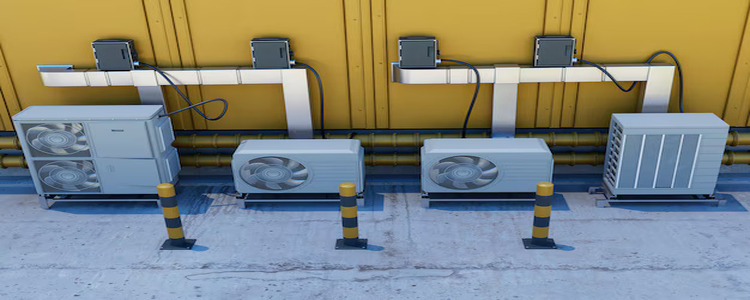
Efficiency in Industrial Cooling Systems: Evaporator and Condenser Selection
Contents The Importance of Industrial Cooling Systems Evaporator and Condenser Selection Evaporator Types and Selection Condenser Types and Selection Productivity Enhancing Technologies Energy Efficiency and Environmentally Friendly Solutions Maintenance and Monitoring Systems Productivity Strategies by Sector The Importance of Industrial Cooling Systems Industrial cooling systems play a critical role as a key element of production processes in many industries. Particularly in the food processing, chemical, pharmaceutical and energy sectors, the proper functioning of cooling systems is indispensable both to maintain product quality and to ensure that production processes continue efficiently and safely. In the food industry, if temperature control is not maintained, products deteriorate rapidly, causing both major economic losses and serious risks to public health. In the chemical industry, correct cooling systems are essential to ensure the stability and effectiveness of products because chemical reactions are often sensitive to heat. These systems not only protect products but also help businesses manage energy efficiency, sustainability and environmental impact. The correct design of industrial cooling systems provides businesses with high energy savings and significantly reduces operating costs. Modern industrial facilities are constantly developing innovative solutions to minimize the energy consumption of cooling systems and reduce their carbon footprint. Therefore, investments in cooling systems offer businesses not only a cost advantage in the long term, but also the opportunity to fulfill their social responsibilities by displaying an environmentally friendly approach. Evaporator and Condenser Selection: Its Role in Efficiency One of the most important factors that increase efficiency in industrial cooling systems is related to the selection of the right evaporator and condenser. The evaporator is a critical component in cooling systems that allows the refrigerant to evaporate and absorb heat. This process is the beginning of the cooling process, and a high-efficiency evaporator increases the overall efficiency of the system by absorbing more heat with less energy consumption. On the other hand, the condenser converts the vapor refrigerant back into liquid and releases the heat to the atmosphere. The efficient operation of the condenser ensures that heat is removed from the environment quickly, thus increasing the energetic efficiency of the system. Since the balance between evaporator and condenser has a direct impact on the overall performance of the system, the selection of both components is very important. This selection should be made according to the characteristics of the sector in which the cooling system will be used. For example, while rapid cooling and low temperature values may be at the forefront in the food industry, high pressure systems may be preferred in the chemical industry. The dimensions of evaporators and condensers should be compatible with the capacity, and efficiency should be ensured by keeping energy consumption to a minimum. A poorly selected evaporator or condenser increases the energy consumption of the system and increases the operational costs of the business. Therefore, choosing the right device ensures that cooling systems are long-lasting and efficient. New technologies developed for cooling systems enable these components to deliver higher performance with lower energy. In particular, energy efficient evaporators and condensers reduce the environmental impact of businesses and reduce energy costs. Evaporator Types and Selection Evaporators are one of the most important components of industrial cooling systems and there are two main types: air-cooled and water-cooled evaporators. While air-cooled evaporators provide cooling with air, water-cooled evaporators provide cooling using water. Water-cooled evaporators generally provide higher efficiency but impose some additional requirements in terms of supplying and managing water. Evaporator selection should be made according to the facility's climatic conditions, water resources availability and energy efficiency targets. For example, water-cooled evaporators can work more efficiently in regions where water is abundant, while air-cooled evaporators may be more suitable in areas where water is limited. The size of the evaporators also depends on the type of refrigerant used and the cooling capacity. In large facilities, evaporators with larger capacity should be preferred. Condenser Types and Selection Condensers are another critical component of the refrigeration cycle. There are two main types of condensers: air-cooled and water-cooled condensers. While air-cooled condensers allow heat to be removed through air, water-cooled condensers remove heat through water. Water-cooled condensers can generally be more efficient because water has a higher heat carrying capacity. However, there may be difficulties in supplying and managing water. Condenser selection should be made depending on the capacity of the cooling system, operating conditions and environmental factors. For example, air-cooled condensers may be more effective in hot climates, while water-cooled condensers may be preferred in cold climates. Refrigerants with low GWP values should be used to ensure energy efficiency. Environmentally friendly refrigerants help businesses reduce their carbon footprint. Productivity Enhancing Technologies There are many innovative technologies that increase efficiency in industrial cooling systems. These technologies enable cooling systems to operate more efficiently and save energy. Intelligent control systems, sensors and software constantly monitor the operating conditions of cooling systems and make instant adjustments. This prevents unnecessary energy consumption of the system and optimizes its performance. Another efficiency-enhancing technology is inverter technology. Inverters save energy by adjusting the motor speed according to the needs of the system. Such technologies enable cooling systems to operate more flexibly and dynamically. It significantly reduces energy consumption by increasing the performance of cooling systems. In this way, businesses can reduce both their costs and environmental impacts. Energy Efficiency and Environmentally Friendly Solutions Energy efficiency is a fundamental criterion in the design of industrial cooling systems. Efficient cooling systems reduce the energy consumption of businesses and minimize their environmental impact. Providing energy efficiency in industrial facilities not only saves costs but also contributes to environmental sustainability by reducing carbon emissions. Environmentally friendly cooling solutions include the use of refrigerants with low GWP (Global Warming Potential). These refrigerants do not damage the ozone layer and have low global warming potential. Waste heat recovery systems provide additional energy savings by using the excess heat released during cooling processes. Such solutions both reduce the costs of the business and reduce its environmental impact. Maintenance and Monitoring Systems Regular maintenance and monitoring are very important to increase the efficiency of cooling systems. Proper functioning of all components of cooling systems helps maintain efficiency. Regular maintenance extends the life of the system and prevents possible malfunctions. Especially in high-capacity systems, monitoring the system allows malfunctions to be detected immediately. Sensors and smart software used in modern cooling systems facilitate the performance monitoring process. These software detect inefficiencies in the system and increase efficiency by making instant adjustments. Thanks to such technologies, businesses can constantly monitor the performance of their cooling systems and intervene when necessary. Proactive maintenance approaches prevent major malfunctions and reduce maintenance costs. Productivity Strategies by Sector Efficiency strategies for industrial cooling systems in different sectors are shaped in line with sector-specific needs. For example, while the reliability and efficiency of cooling systems are at the forefront in food processing facilities, the environmental effects and costs of the refrigerants used are important in the chemical industry. Since each industry has different needs and challenges, each business must develop strategies that suit its needs. Although energy efficiency is a common goal in all sectors, environmental sustainability may be more prominent in some sectors. Especially in environmentally sensitive sectors, applications such as low GWP refrigerants and waste heat recovery are preferred. Efficiency-increasing solutions in industrial cooling systems must be customized for each sector and adapted to the specific requirements of the sector.
Read More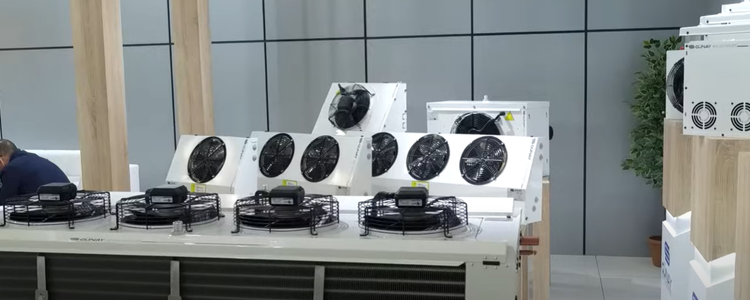
Evaporator Selection
What is an evaporator? The evaporator is one of the most important components of cooling systems. This device, which carries out the evaporation process of the liquid refrigerant, takes the heat from the environment and performs the cooling process. By absorbing the hot air indoors, the liquid refrigerant passing over this air draws heat through evaporation and reduces the ambient temperature. Günay Soğutma has been specializing in this field since 1986 and offers both serial and special production evaporators. Evaporators generally come in two main types: air-cooled and water-cooled. While air-cooled systems take heat from the ambient air, water-cooled systems transfer heat with water. Air-cooled evaporators offer a simpler and lower-cost solution, while water-cooled evaporators provide higher efficiency. Choosing between these two types according to the users' needs and installation conditions is very important for the effectiveness of the system. Factors to Consider When Choosing an Evaporator There are a few basic elements to consider when choosing an evaporator. First, the size of the area to be used and its cooling need must be determined. The temperature of the environment, humidity and the features of the devices to be used help to calculate the evaporator capacity accurately. This calculation prevents selecting an under- or over-capacity device and improves energy efficiency. Secondly, climatic conditions and temperature ranges of the environment must be taken into account. Especially in hot climates, it may be necessary to choose a more powerful and durable evaporator. This increases the efficiency of the cooling system and reduces operating costs. Günay Soğutma offers solutions that suit the needs of each customer by providing guidance in this process with its wide product range. What Capacity of Evaporator Should be Selected? The capacity of evaporators is measured in BTU (British Thermal Unit). The correct capacity should be determined by taking into account factors such as the size of the area to be used, indoor temperature and outdoor conditions. Choosing a device with the wrong capacity may increase energy consumption and may not provide the desired cooling efficiency. When choosing capacity, heat load calculation is important. This calculation takes into account the temperature effect of devices, people and other heat sources in the environment. In this way, the cooling system works most efficiently. Günay Soğutma's expert team helps select evaporators of the right capacity by making these calculations. This both saves energy and contributes to the longevity of the system. What are the differences between air-cooled and water-cooled evaporators? Air-cooled evaporators work by transferring heat from the air and generally take up less space. These types of systems are easier to install and generally offer low-cost options. Air-cooled evaporators are widely preferred in small areas and mobile applications. However, their efficiency may decrease in high temperature and humidity conditions. Water-cooled evaporators require more complex installation but can provide higher efficiency. Since water is a better heat transfer medium, water-cooled systems can remove more heat effectively. Such systems are preferred in large industrial facilities and commercial applications. Günay Soğutma meets the needs of customers by offering high quality products of both types and produces solutions to increase system efficiency. Why is Energy Efficiency Important? Energy efficiency is very important in terms of both reducing operating costs and providing environmentally friendly solutions. Energy efficient evaporators offer the same cooling capacity while consuming less electricity. This reduces operating costs and minimizes environmental impacts in the long run. Energy-saving systems also play an important role in terms of sustainability. The energy efficiency of evaporators is determined by SEER (Seasonal Energy Efficiency Ratio) or EER (Energy Efficiency Ratio) values. These values are used to measure the energy consumption and efficiency of the device. Günay Soğutma aims to provide solutions that are sensitive to both users' budgets and the environment with its highly energy efficient products. In this way, customers can achieve high performance with lower energy costs. What are the Usage Areas of Evaporators? Evaporators have a wide range of uses and are used in various applications in different sectors. It is used in many areas, from industrial cooling systems to commercial coolers, from air conditioning systems to refrigerators. Especially in the food industry, evaporators are vital to keep products fresh and extend their shelf life. It is also widely preferred in air conditioning systems. Evaporators are used in both residential and commercial buildings to ensure indoor comfort. Günay Soğutma develops evaporators suitable for every need by offering special solutions to its customers in different sectors. This is an important approach to meet customers' expectations by following the innovations in the sector. Why is Choosing the Right Material Important? The material quality of evaporators is a factor that directly affects the life and performance of the device. Materials such as stainless steel, copper and aluminum increase durability and ensure long-term use. Material selection also affects the cooling efficiency of the device. High-quality materials increase resistance to external factors and reduce maintenance needs. When quality materials are used, the performance of evaporators increases and their longevity is ensured. Günay Sogutma prioritizes user satisfaction by offering evaporators produced with high quality materials. This is of great importance in terms of both energy efficiency and control of operating costs. How Should Evaporator Maintenance and Cleaning Be Done? Regular maintenance and cleaning of evaporators is critical to maintaining the performance of the systems. Dirt and dust deposits can negatively affect heat transfer and increase energy consumption. Therefore, periodic cleaning is recommended. Maintenance operations include checking fan motors, cleaning the evaporator surface and inspecting connection points. Maintenance operations must be carried out by experts. In this way, possible problems are detected in advance and necessary precautions are taken. By providing maintenance and repair services to its users, Günay Sogutma ensures the long life of the systems and helps them operate efficiently. Thus, the performance of the systems is constantly monitored and kept at the best level. What are the Different Types of Evaporators? Evaporators are available in different types depending on their purpose of use and structure. Air-cooled, water-cooled, volute and plate evaporators are the most common types. Each type is designed for different applications, offering specific advantages. While air-cooled evaporators generally offer more compact options with lower installation costs; water-cooled evaporators can provide higher efficiency. Plate evaporators are used to provide high efficiency in smaller areas. Such systems are generally preferred in industrial applications. Günay Soğutma provides its customers with different options for all types of evaporators and solutions that suit their needs. This diversity makes it easier for users to access effective and efficient cooling systems in different areas. Methods to Save Energy in Evaporators Several methods can be applied to evaporators to save energy. First, choosing a device of the right capacity increases energy efficiency. Devices with insufficient or excessive capacity may increase energy consumption and lead to unnecessary costs. In addition, regular maintenance and cleaning of evaporators is important to maintain efficiency. Another method is to use timers and automatic control systems. These systems optimize energy consumption and stop the device from operating when it is not needed. Günay Cooling helps users reduce their costs by developing energy-saving evaporators. Such applications both increase operating efficiency and offer an environmentally friendly approach. What is the Working Principle of Evaporators? The working principle of evaporators is a fundamental part of the refrigeration cycle. When the liquid refrigerant enters the evaporator, it evaporates by taking heat from the environment. This process turns the refrigerant into a gas while lowering the temperature of the interior. This gas is then transmitted to the compressor and compressed to become liquid again. This cycle continues continuously and performs the cooling process. In this process, the surface of the evaporator allows the environment to effectively carry out the evaporation process by absorbing hot air. Günay Cooling provides both comfort and energy savings by producing evaporators that provide high efficiency in this process. In this way, users can increase indoor comfort with an effective cooling system. What should be done to ensure long life of evaporators? There are some important points to ensure the long life of evaporators. First, performing regular maintenance and cleaning improves the performance of systems. Dirty and neglected evaporators both increase energy consumption and shorten the life of the system. Users should perform these operations regularly and get professional support. Additionally, proper installation and mounting methods are also important. Improper installation may negatively affect the efficiency of the device. Günay Soğutma helps evaporators show the best performance by providing correct installation services with its expert team. Thus, the life of the systems is extended and users can enjoy long-term use with less maintenance costs.
Read More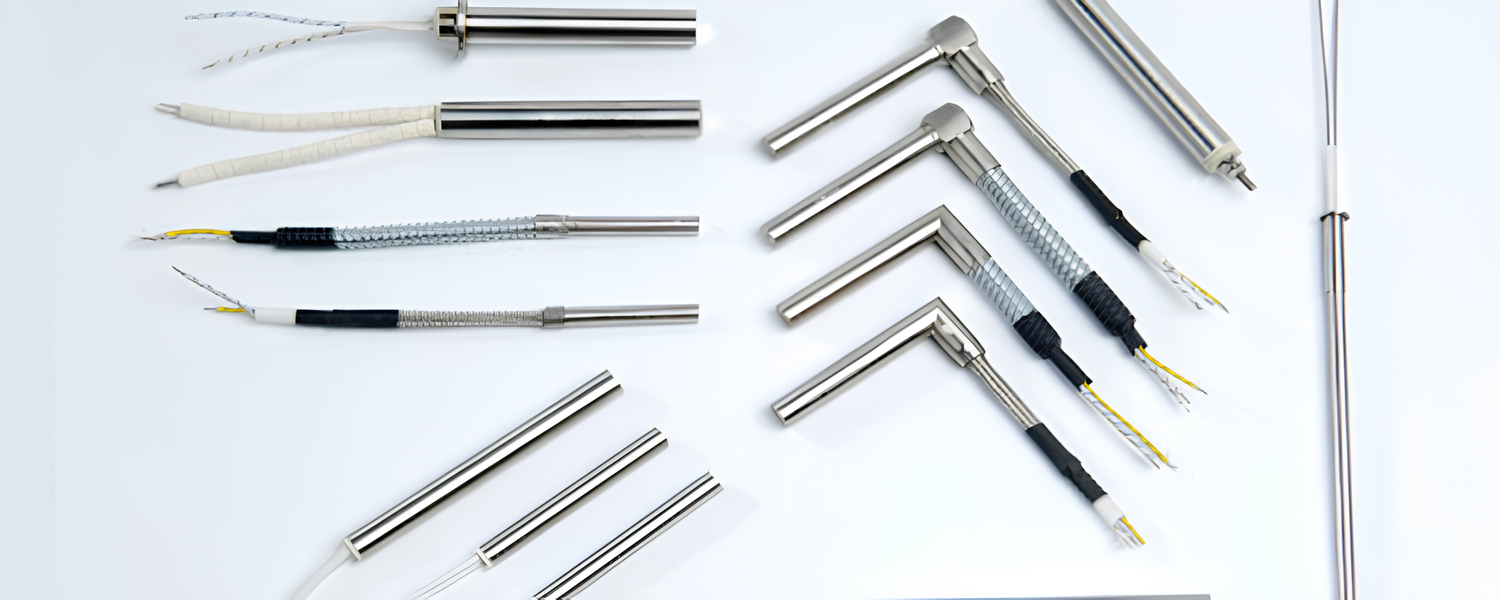
What is Resistance?
What is Resistance? Resistance is the resistance to the passage of electric current and is an essential component of electrical heating devices. In any electrical circuit, it is an element that affects the flow of current. This component is used to heat a specific area or device by converting electrical energy into heat. As Günay Soğutma, our company, which has been in the sector since 1986, offers quality resistance solutions in various heating systems along with evaporators, condensers and heat exchangers. Resistors are produced with different material and structure combinations. Materials such as metal, carbon and ceramics are factors that affect the energy efficiency of resistors. Each of these materials has different characteristics in terms of heat generation and durability. It becomes possible to provide optimal performance with various resistance types according to the needs of the users. What is the Working Principle of Resistance? The working principle of the resistor is based on the production of heat when electric current passes. When electric current passes through the resistance material, friction occurs between the material atoms, resulting in heat. This temperature varies depending on the material used and the design of the resistor. Günay Sogutma provides both energy saving and effective heat production by offering resistance solutions suitable for the needs of users. The effectiveness of resistors depends on the magnitude of the current and the properties of the material. A well-designed resistor can produce more heat while consuming less energy. The performance of resistors in many areas such as electric stoves, heaters and industrial systems increases energy efficiency and ensures user satisfaction. What are the Resistance Types? Resistors are divided into various types according to their functions and areas of use. Electrical resistances can generally be classified as wire resistance, carbon resistance, ceramic resistance and capacitive resistance. Wire resistors are produced by using metal wire as a winding and are generally used in high temperature applications. Carbon resistors are preferred because they are low cost and can be produced in various sizes. Ceramic resistors stand out with their resistance to high temperatures. Since they are generally made of ceramic material, they are resistant to high temperatures and chemical effects. Capacitive resistors are used to store and discharge electrical energy. Günay Soğutma meets the expectations of users by offering various resistance solutions according to different needs. Where is resistance used? Resistors have a wide range of applications in many different industries. Electric heaters, electric stoves, refrigerators, air conditioners and industrial heating systems are areas where resistors are widely used. These devices use resistors to provide temperature control and generate heat in a specific area. Günay Soğutma aims to increase customer satisfaction by offering resistance solutions for various industrial applications. Resistors are also used in the automotive industry. Resistors are preferred for engine heaters, in-car heating systems and energy management in networks. In the agricultural sector, the healthy growth of plants is supported by using resistors in greenhouse heating systems. Such applications demonstrate the versatile use potential of resistors. How is the Material Selection of the Resistance? The material used in the construction of the resistor is a critical factor affecting the performance and durability of the device. Generally, various materials such as metal, carbon, ceramic and polymer are used. Metal resistors offer fast heating properties thanks to their conductivity. Metals such as copper, aluminum and stainless steel are generally preferred materials in resistor production. The high thermal conductivity of these materials provides energy efficiency. Carbon and ceramic materials offer advantages in certain applications. While carbon provides low cost and lightness, ceramic materials stand out with their resistance to high temperatures. Therefore, choosing materials according to the needs of users increases the efficiency and durability of the resistor. Günay Soğutma ensures customer satisfaction by offering resistance solutions produced with quality materials. How is the Heat Production of the Resistance? The resistance produces heat when electric current passes. This heat is a physical phenomenon known as the Joule effect. As the electric current passes through the resistance material, heat is released due to collisions between the material atoms. The heat produced varies depending on the structure of the resistance, the magnitude of the current and the properties of the material. The amount of heat production is generally proportional to the square of the current. Heat generation by resistors plays an important role in many applications. For example, the heat production properties of resistors are used to obtain the desired temperature values in electric stoves and heating systems. Günay Sogutma offers products that meet the needs of users with the resistance solutions it has developed in order to increase the efficiency of heating systems. What are the Safety Precautions of the Resistance? It is important to take safety precautions when using resistors. These heat-generating devices can increase the risk of fire in case of overheating. For this reason, there are some important points to consider during the installation of resistors. First, the resistor must be placed appropriately and ventilation must be provided when necessary. This is a critical step to prevent overheating. Correct electrical connections of the resistors are also important for safety. Incorrect connections can lead to short circuits and potential hazards. Günay Sogutma helps minimize possible risks by guiding its users on the safe use of resistors. Safe use both prolongs the life of the device and protects the health of the users. What is the Energy Efficiency of Resistance? Energy efficiency of resistors is an important issue in terms of saving energy and reducing operating costs. High quality resistors have the capacity to produce more heat with less energy. This allows users to control costs by reducing energy consumption. Energy efficiency contributes to both reducing environmental impacts and achieving economic benefits. Günay Soğutma aims to provide high performance to its customers at low costs by offering high energy efficient resistance solutions. These solutions help achieve effective results in industrial applications and home use. Energy efficiency is an increasingly important issue in today's world and helps users achieve their sustainability goals. What is the Life Cycle of Resistance? The life cycle of resistors includes the production phase, usage, maintenance and ultimately disposal phase. During the production phase, the selection of quality materials and appropriate design affects the durability of the product. Correct installation and maintenance during use will extend the life of the resistor. Periodic maintenance is critical to maintaining the performance of the resistor. The destruction phase is important in minimizing environmental impacts. Recycling resistors that have completed their useful life helps preserve natural resources. Günay Soğutma works to reduce environmental impacts by offering sustainable solutions throughout the life cycle of its products. What are the advantages of resistors? The use of resistors brings many advantages. Firstly, thanks to their effectiveness in heat production, energy savings can be achieved. The fact that they can be produced from different materials offers flexibility to users. Resistor types suitable for different applications find a wide range of usage in industrial and commercial areas. Resistors also provide advantages in maintenance and repair processes. Thanks to their durable structure, they offer long-term performance. This reduces users' maintenance costs. Günay Soğutma aims to increase efficiency by offering high-advantage resistance solutions to its customers. What is the Future of Resistance? In the future, resistance technologies will develop further and provide solutions focused on energy efficiency and environmental sustainability. Smart energy systems and automation technologies will be integrated to increase the performance of the resistors. Such innovations both save energy and increase user comfort. The development of new materials and design techniques will improve the performance of resistors and provide more options in various application areas. Günay Soğutma will continue to produce solutions suitable for future needs by following technological developments. How is the Maintenance and Repair of the Resistance? Maintenance and repair of resistors are important to extend the life of the product and maintain its performance. The first step is to clean the resistor regularly. Dirt and dust deposits can negatively affect heating performance. Therefore, cleaning the surface of the resistor increases heat transfer. Checking the connection points helps prevent possible electrical malfunctions. Repair of a faulty resistor should be done by experts. The product should be tested by qualified technicians and replaced if necessary. Günay Sogutma contributes to the long life of the resistors by providing maintenance and repair support to its users.
Read More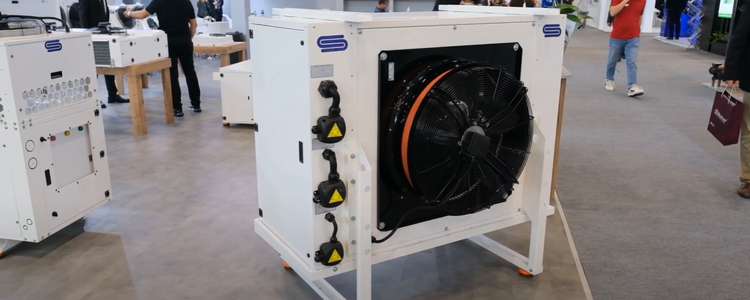
What is Axial Fan?
What is Axial Fan? An axial fan is a type of fan system that directs airflow in an axial (direct) direction. Thanks to its blades, which are generally designed in a straight or spiral shape, the air moves along the axis of the motor as the fan rotates. Axial fans are known for their ability to provide high air flow and are widely used in many industrial applications. Günay Soğutma has an important place in the sector with the production of such fans since 1986. The main function of axial fans is to increase air circulation and control the ambient temperature. While providing air flow, it also offers features such as energy efficiency and low noise level. These types of fans often operate as part of cooling systems such as heat exchangers, evaporators, and condensers. The high efficiency of axial fans makes them preferred in air management systems in various industries. What is the Working Principle of Axial Fans? Axial fans have a simple working principle that directs the air flow thanks to the rotation of the rotor. The blades of the fan pull the air in with the rotation movement and blow it out. This process acts as a kind of "pump", allowing air to flow. When the air enters the fan, it accelerates thanks to the design of the blades and exits at a higher speed at the fan's exit. This flow may vary depending on the power provided by the fan's motor. Axial fans generally operate with low pressure differences, so the airflow rate may vary depending on ambient conditions and the location of the fan. Energy efficiency plays an important role in the design of these fans. Günay Soğutma offers solutions that meet the needs of users by using modern engineering techniques and materials in order to increase the efficiency of axial fans. What are the Usage Areas of Axial Fans? Axial fans are versatile devices with a wide range of applications. They are used in HVAC systems, industrial refrigeration, agriculture, food processing, automotive industry and many other areas. Axial fans are widely preferred, especially in the ventilation systems of buildings, to improve indoor air quality. They undertake the task of providing an effective air flow for heating and cooling processes in industrial facilities. In the food processing industry, axial fans are critical for temperature control and humidity regulation. In order to maintain the quality of the products and prevent the formation of unwanted microorganisms, these fans provide correct air circulation. In the agricultural sector, axial fans in greenhouse air conditioning systems create ideal air conditions that support the healthy growth of plants. What are the advantages of Axial Fans? The advantages provided by axial fans make them a preferred option for many applications. First of all, thanks to their ability to provide high air flow, they can create an effective air flow in large areas. They provide energy efficiency by operating with low energy consumption. This feature helps businesses reduce energy costs and also contributes to environmental sustainability. Low noise levels are another important advantage of axial fans. These fans generally operate quietly, increasing comfort indoors. The fact that they offer easy installation and maintenance supports users in choosing these devices. Günay Soğutma prioritizes user satisfaction by developing products that meet the needs of businesses with the axial fan solutions it offers. What are the Axial Fan Types? Axial fans are produced in different types according to various design and structure features. These include fixed blade, adjustable blade and centrifugal fan types. While fixed-blade fans are designed to provide a specific airflow, adjustable-blade fans can optimize airflow according to the user's needs. These types of fans generally offer greater flexibility and control. Centrifugal fans, on the other hand, use a different principle in directing air flow and are generally preferred in applications requiring high pressure. However, axial fans are more commonly used in low-pressure applications due to their ability to provide high flow rates. Günay Soğutma meets the needs of its customers with various axial fan types and offers suitable solutions for different industries. How Should Axial Fans Be Maintained? Regular maintenance of axial fans is of great importance in maintaining their performance and extending their life. First, it is necessary to keep the fan blades clean. Dust and dirt accumulated on the blades can block airflow and reduce the efficiency of the fan. Therefore, regular cleaning operations should be carried out. Keeping the mounting location of the fan clean is also necessary for the fan to function properly. It is important to check the fan's motor and other components regularly. Wear of the motor or loosening of the belts can negatively affect the efficiency of the fan. Günay Sogutma aims to ensure that fan systems always operate at their best performance by guiding users in the maintenance of their fans. Regular maintenance contributes to preventing malfunctions and saving energy. What is the Efficiency of Axial Fans? The efficiency of axial fans indicates the ratio of air flow produced by motor power. This determines how much airflow a fan uses while using it. High efficiency means less energy consumption and more air flow. Günay Sogutma adopts modern engineering approaches in the design of fans to increase efficiency. In this way, users can achieve high performance with lower energy costs. Efficiency may also vary depending on the fan's operating conditions. Factors such as operating environment temperature, humidity level, and fan location can affect the fan's performance. Optimization of axial fans is a critical issue for every application. For this reason, Günay Sogutma aims to increase efficiency by offering fan solutions that suit the needs of users. What is the Sound Level of Axial Fans? The sound level of axial fans is an important factor that determines the comfort level in the areas where they are used. These fans are generally known for their quiet operation. Low noise levels are one of the main reasons why axial fans are preferred in indoor ventilation systems. Günay Soğutma uses modern materials and engineering techniques to minimize sound levels in its designs. The noise level of the fan may vary depending on the operating conditions and the speed of the fan. The shape and design of the blades of axial fans are among the factors that affect the noise level. Therefore, it aims to increase comfort by offering solutions that suit the needs of users. Quiet operation provides a significant advantage in both living spaces and industrial facilities. What is the Power Source of Axial Fans? Axial fans usually work with electric motors. These motors create airflow by causing the fan to rotate. Electric motors play an important role in energy efficiency. Günay Soğutma aims to reduce the costs of businesses by offering axial fans equipped with energy-saving motors to its customers. In some special applications, alternative energy sources can also be used. Renewable sources such as solar energy or wind energy can be used to meet the energy needs of axial fans. While such solutions increase environmental sustainability, they also contribute to the energy independence of businesses. Energy efficiency has become an increasingly important issue today. What is the External Design of Axial Fans? The external design of axial fans plays an important role in terms of aesthetics as well as their performance. Fans, which are generally made of metal or plastic materials, provide advantages in terms of durability and lightness. The shape and placement of the blades are specifically designed to optimize airflow. This design increases the operating efficiency of the fan and also provides ease of installation. The external appearance of the fan may vary depending on the requirements of the application. While durable and functional designs are generally preferred in industrial applications, aesthetic elements may be at the forefront in interior use. Günay Soğutma offers various options to its customers by offering aesthetic and functional axial fan designs suitable for the needs of different industries. What is the Role of Axial Fans in Temperature Control? Axial fans play an important function in terms of temperature control. Especially in HVAC systems, these fans are of critical importance for cooling hot air and distributing cold air. In ventilation systems, hot air is thrown out by axial fans, while cold air is directed indoors. This process helps keep the environment at a comfortable temperature. Temperature control also plays a major role in industries such as food processing and agriculture. Axial fans are used in these sectors to maintain the quality of products and support healthy growth. Günay Soğutma aims to increase efficiency in various industries by offering solutions that meet the needs of users regarding temperature control. What is the Future of Axial Fans? In the future, more innovative and environmentally friendly solutions will come to the fore in the design of axial fans. Energy efficiency and environmental sustainability have become an important focus today. The fact that axial fans consume less energy and provide more air flow forms the basis of developments in this field. Günay Sogutma continues to develop high efficiency axial fans in accordance with this trend. With the advancement of technology, modern applications such as digital control systems and sensors have the potential to optimize the performance of axial fans. Thanks to these technologies, users can control their fans more effectively and save energy. The future of axial fans plays an important role not only in terms of efficiency but also in terms of environmental impact.
Read More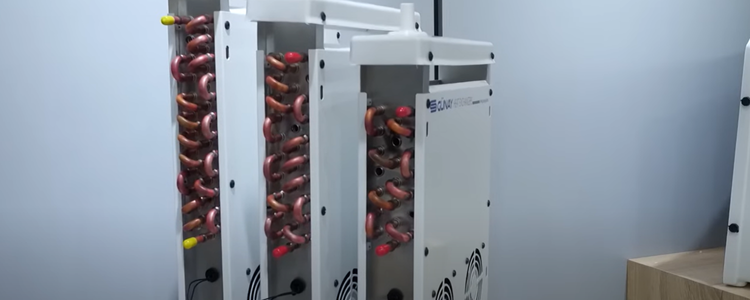
The Role of Condensers
What is a Condenser? The condenser is an important component of cooling systems. This device enables the gaseous refrigerant to turn into liquid. The condenser works on the principle of heat exchange, reducing the temperature of the refrigerant and thus transitioning it into liquid form. Günay Soğutma has been producing condensers since 1986 and appeals to a wide range of customers by offering both serial and special production options. The efficiency of condensers has a direct impact on the overall performance of cooling systems. The function of condensers generally occurs in two stages. First, high pressure gas from the compressor enters the condenser. Here, it becomes liquid by taking heat from environmental factors (e.g. air or water). The condenser helps reduce energy consumption by ensuring this process occurs effectively. Thus, it allows businesses to reduce energy costs. What is the Working Principle of the Condenser? As a critical part of the refrigeration cycle, the condenser operates on the principles of heat transfer. Gaseous refrigerant exits the compressor under high pressure and is directed into the condenser. Inside the condenser, the refrigerant absorbs heat from the surrounding cooling medium (air or water). During this process, the molecules of the refrigerant separate from each other and evaporation occurs. The condenser ensures that heat is removed effectively in this process. During evaporation, the gaseous refrigerant turns into liquid form. This transformation takes place under high pressure and temperature. The efficiency of condensers depends on the type of refrigerant used, ambient conditions and the design of the condenser. Günay Soğutma, with its experience in this field, produces condensers that provide high efficiency. Thus, users can achieve more cooling capacity by consuming less energy. What are the Condenser Types? Condensers are manufactured in different types according to various designs and functions. Generally, there are air-cooled, water-cooled and natural convection condensers. While air-cooled condensers perform cooling using the surrounding air, water-cooled condensers benefit from the heat capacity of water. Both types offer advantages according to specific applications and are preferred according to their areas of use. While air-cooled condensers are commonly used in commercial cooling systems and air conditioning systems, water-cooled condensers are preferred in large industrial facilities. In addition, specially designed condensers are produced for the needs of specific sectors. Günay Soğutma meets customers' expectations by offering suitable solutions for every sector with its wide product range. What are the advantages of condensers? Condensers play an important role in increasing the efficiency of cooling systems. The most important advantage of these devices is that they provide energy saving. High efficiency condensers enable the refrigerant to turn into liquid more quickly and effectively. In this way, the energy consumption of the system decreases and operating costs decrease. Energy efficiency is an important source of savings, especially in large facilities. In addition, the use of condensers also reduces environmental impacts. Less energy consumption directly contributes to reducing carbon emissions. Günay Soğutma pays attention to developing environmentally friendly solutions and aims to provide users with both economic and environmental benefits by using modern technologies. The long-lasting and durable structures of condensers contribute to the budgets of businesses by reducing maintenance costs. Why is Condenser Maintenance Important? Condenser maintenance is critical to improving the performance of cooling systems. Regular maintenance ensures efficient operation of the condenser and prevents malfunctions. Dirt, dust and other debris accumulated on the outer surface of the condenser can negatively affect heat transfer and reduce the efficiency of the system. Therefore, periodic cleaning and maintenance operations are necessary for the healthy operation of the cooling system. During maintenance, the operating conditions of the condenser should be reviewed and necessary checks should be made. Abnormal conditions such as extreme temperature or pressure can affect the overall performance of the system. Günay Cooling aims to ensure that cooling systems always operate at optimum levels by providing regular maintenance services to its customers. Such measures reduce the costs of businesses in the long run and extend the life of the system. What are the Usage Areas of Condenser? Condensers are critical components that have a wide range of uses. Industry, food, HVAC systems and commercial refrigeration applications are among the sectors where condensers are commonly used. Especially in the food industry, condensers are used to provide effective cooling to preserve the freshness of products and ensure appropriate storage conditions. Condensers also play an important role in HVAC systems. In systems designed to meet the heating, ventilation and air conditioning needs of buildings, the efficiency of condensers directly affects the overall energy consumption. Günay Soğutma produces special solutions for these sectors and offers products that meet the needs of its customers. The use of condensers is of great importance in terms of both efficiency and product quality. Condenser and Energy Efficiency Energy efficiency is one of the most important issues today and plays a big role in the design of condensers. High efficiency condensers enable the refrigerant to turn into liquid by consuming less energy. This reduces energy costs by increasing the overall performance of cooling systems. Günay Cooling helps users achieve both economic and environmental advantages by producing highly energy efficient condensers. Energy efficiency not only provides cost savings, but also contributes to reducing carbon emissions. Less energy consumption means more efficient use of natural resources. Advanced designs of condensers offer greater cooling capacity with lower energy consumption. This helps users achieve sustainability goals and reduces environmental impacts. What is the Heat Exchange Capacity of Condensers? The heat exchange capacity of condensers is an important factor that determines the efficiency of cooling systems. Heat exchange capacity refers to the amount of heat the condenser can transfer in a certain period of time. This capacity may vary depending on the design of the condenser, the properties of the refrigerant used and the ambient conditions. Condensers with high heat exchange capacity provide faster and more effective cooling. Günay Cooling uses modern engineering solutions and materials to increase heat exchange capacity. Innovations in the design of condensers optimize heat transfer, allowing users to achieve higher performance with lower energy consumption. This feature becomes especially important in large-scale cooling applications. How is the Heat Transfer of the Condenser? Heat transfer is one of the operating principles of condensers, and this process occurs by heat exchange between two different environments. The condenser provides heat transfer thanks to the interaction of the refrigerant inside it with the environment. The gaseous refrigerant inside the condenser turns into a liquid by absorbing heat from the environmental environment (air or water). In this process, the temperature and pressure of the external environment are critical factors that affect the efficiency of heat transfer. The design of the condenser has been specially developed to optimize heat transfer. Features such as curved pipes or large surface area increase heat exchange and thus provide more effective cooling. Condensers offered by Günay Soğutma are designed taking these principles into consideration to ensure high efficiency and long life. Such innovative approaches allow users to achieve performance and energy efficiency goals. What is the Working Environment of the Condenser? The operating environment of the condenser is an important factor affecting its efficiency and performance. The condenser generally operates using air or water. While air-cooled condensers perform cooling using outdoor air, water-cooled condensers benefit from the heat capacity of water. The temperature, pressure and humidity level of the operating environment directly affect the efficiency of the condenser. In the design of condensers, it is important to develop solutions suitable for the characteristics of the working environment. For example, in hot climates the efficiency of air-cooled condensers may decrease due to the influence of outside temperatures. Günay Cooling offers condensers designed to adapt to various climatic conditions, allowing users to achieve effective cooling in all kinds of environments. What Should Be Considered When Choosing a Condenser? Condenser selection has a huge impact on the efficiency and performance of the cooling system. Factors to consider when choosing the right condenser include application needs, cooling capacity, energy efficiency and operating conditions. Determining the appropriate condenser type for each application increases the overall performance of the system. Material quality and durability are also important when choosing a condenser. Condensers made of high quality materials offer a long-lasting and low-maintenance solution. Günay Cooling aims to provide effective and efficient cooling in every sector by offering its customers the condenser solutions that best suit their needs. Therefore, it is critical that the selected condenser has the qualities to best meet the needs of the business. What is the Future of Condensers? In the future, more environmentally friendly and energy efficient solutions are expected to come to the fore in the design of condensers. As climate change and sustainability issues become increasingly important, the demand for energy-saving technologies is increasing. In accordance with this trend, Günay Soğutma continues to develop high efficiency condensers with innovative engineering solutions. The use of modern technologies such as digitalization and automation has the potential to improve the performance of condensers. Sensors and control systems can improve energy efficiency by optimizing the operating conditions of condensers. By investing in such technologies, Günay Soğutma aims to provide solutions that meet the needs of the future. The development of condensers plays an important role not only in terms of efficiency but also environmental sustainability.
Read More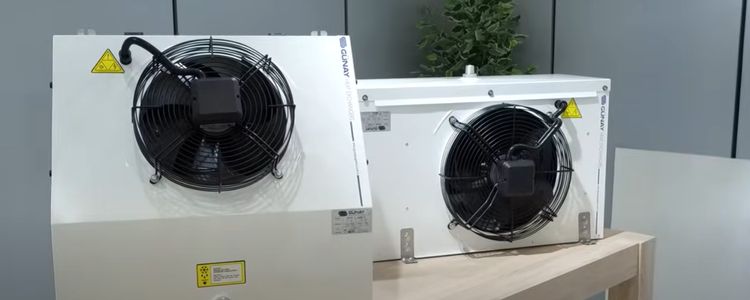
What is an Evaporator?
What is the Definition of Evaporator? Evaporator is a device that enables liquid refrigerant in cooling systems to evaporate and turn into gas. It is a critical part of the refrigeration cycle and generally cools the environment by removing heat from the environment during the evaporation process. This process allows the temperature in a particular area to be lowered by utilizing heat exchange. Günay Soğutma has a wide product range of evaporators since 1986 and offers both mass and special production options. In this context, with high quality materials and modern design principles, evaporators offer a long-lasting and efficient cooling experience. The evaporation process is a physical change that occurs within the evaporator. Liquid refrigerant evaporates at a certain temperature by absorbing heat. Since this process takes place by taking heat from the surrounding air or other environment, it ensures that the cooling system works effectively. Evaporators are used in many areas, from industrial applications to commercial cooling systems. For example, it is an ideal solution for storing fresh products in the food industry. In particular, the cold air generated during the evaporation process helps food products maintain their freshness by extending their shelf life. What are the Evaporator Types? Evaporators are divided into several different types based on various design and functional differences. These include air-cooled, water-cooled and specially designed evaporators. While air-cooled evaporators perform cooling using ambient air, water-cooled ones benefit from the heat capacity of water. While air-cooled evaporators are generally preferred in commercial areas, cold storages and industrial applications; Water-cooled evaporators are used in industrial facilities with larger cooling needs. Additionally, some evaporators are systems specifically designed for a particular application. For example, different types of evaporators have been developed for food cooling, HVAC systems or industrial cooling processes. In addition, specially designed evaporators, optimized according to the needs in a wide variety of industries, play an important role in increasing the efficiency of businesses. This diversity allows users to find the most suitable solutions according to their needs. By offering this diversity, Günay Soğutma develops solutions suitable for the special demands of customers in every sector. How Do Evaporators Work? The working principle of evaporators is based on the physical properties of the refrigerant. When the refrigerant enters the evaporator, it begins to evaporate by taking heat from the environment. This process causes the temperature inside the evaporator to drop. During evaporation, the molecules of the fluid separate from each other and pass into vapor form. This is the basic process that allows the environment to cool. Especially in hot weather, the efficiency of the evaporator becomes more obvious. High temperatures cause the refrigerant to absorb more heat, providing more effective cooling. After evaporation, the gaseous refrigerant is directed to the compressor. The compressor compresses this gas, increases its temperature, and then sends it to the condenser section. In the condenser, the gas turns into liquid again and the cycle is completed. This cycle occurs continuously and performs the function of the cooling system. Evaporators offered by Günay Soğutma are designed to carry out this cycle with the highest efficiency. Thus, users can achieve more cooling capacity with less energy. What are the advantages of evaporator? Evaporators have many advantages. First of all, they offer an energy-efficient cooling process. The evaporation feature of the refrigerant provides heat intake, allowing more cooling with less energy. They can be made suitable for different applications with various design and size options. In addition, evaporators help reduce operating costs by increasing the overall performance of the cooling system. Thanks to their long-lasting structure, the need for maintenance is also reduced. Thus, it provides cost advantages for both businesses and users. What are the Usage Areas of Evaporators? Evaporators are widely used in many industries. Areas such as food processing facilities, refrigeration and storage systems, industrial refrigeration and HVAC systems are the places where evaporators are most frequently used. It is effectively used in the food industry to preserve the freshness of products and extend their shelf life. Evaporators also play an important role in automotive, white goods and air conditioning systems. This diversity increases the functionality and flexibility of evaporators and offers customizable solutions for different applications. How Should Evaporator Maintenance Be Done? Regular maintenance is important for evaporators to work efficiently. As a first step, the evaporator needs to be cleaned. Dirt and dust can hinder heat transfer and reduce the efficiency of the system. Therefore, the outer surface and internal structure of the evaporator should be checked and cleaned regularly. Refrigerant levels, ports and general operating condition should be reviewed regularly. These checks are critical for early detection of potential problems. Regular maintenance extends the life of the system and provides higher efficiency with fewer malfunctions. Things to Consider When Choosing an Evaporator Evaporator selection should be made according to the purpose of use and need. First of all, the cooling capacity should be determined and a model suitable for the needs of the business should be preferred. This directly affects the effectiveness and energy efficiency of the system. The design and material quality of the evaporator should also be taken into consideration. Evaporators made of long-lasting and durable materials reduce maintenance requirements and increase the overall performance of the system. It is recommended to conduct detailed research to provide the most suitable solutions for users' needs. How to Increase the Energy Efficiency of Evaporators? The energy efficiency of evaporators depends on several factors. First of all, an evaporator of appropriate size and capacity should be selected. An oversized or small evaporator can waste energy. The right choice increases the overall performance and efficiency of the system. Thermal insulation in the system is also important. Good insulation prevents heat loss and ensures that the evaporator operates with less energy consumption. In addition, regular maintenance and cleaning operations also play a critical role in increasing energy efficiency. What is the Working Environment of Evaporators? The operating environment of evaporators has a great impact on its efficiency. Factors such as temperature, humidity and air flow directly affect the performance of the evaporator. Good airflow increases the efficiency of the cooling system. Otherwise, heat transfer may decrease and the efficiency of the system may decrease. Temperature changes in the working environment also affect the efficiency of the evaporator. When the ambient temperature rises, the evaporator may need to consume more energy. Therefore, the characteristics of the environment where the system will be installed should be taken into account. Innovations and Developments of Evaporators Today, evaporator technology is in constant development. New materials and design techniques allow the production of more efficient and durable evaporators. Energy efficiency-oriented designs reduce users' costs by increasing environmental sustainability. Digital control systems and remote monitoring technologies have also begun to be used in evaporators. These innovations enable the system's performance to be monitored instantly and necessary adjustments to be made quickly. Thus, it is aimed to both save energy and provide users with a better experience. What Are Common Problems with Evaporators? Some common problems can occur with evaporators. These include problems such as low efficiency, icing and excessive noise. Low efficiency is usually caused by lack of maintenance or insufficient refrigerant level. This causes the system to not function properly. Icing is another common problem that occurs in the cooling area of the evaporator. This can happen due to insufficient air flow or the effects of low temperatures. Excessive noise may be caused by malfunctions in the fan motor or other components. Detecting problems in a timely manner is critical to improving the overall performance of the system. The Future of Evaporators and Sectoral Trends In the future, evaporator technology is expected to see more innovation and development. Energy efficiency and environmentally friendly designs are among the priority targets. In this context, studies are continuing on refrigerants that consume less energy and do not harm the environment. Industry 4.0 applications and smart systems are used to increase the performance of evaporators. Remote control and monitoring systems allow users to manage their systems more efficiently. These developments will help the industry progress more efficiently and sustainably in the future.
Read More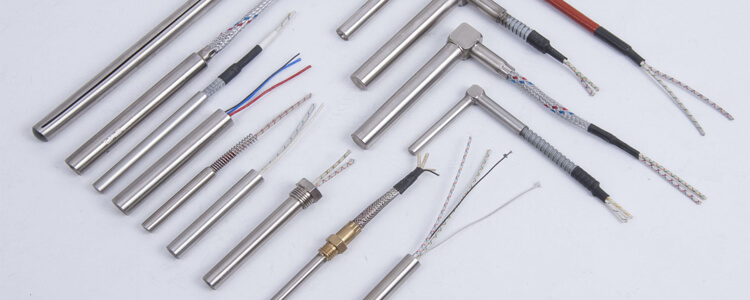
What are resistances, what do they do and where are they used?
What is Resistance? A resistor is a component that converts electrical energy into heat and is widely used in various industrial, commercial and domestic applications. Essentially, it is an element that heats up by providing resistance when an electric current passes. This heat enables electrical energy to be converted directly into thermal energy. Resistors are usually manufactured from materials such as metal wire, ceramic or carbon, and their electrical resistance is designed to operate within a certain temperature range. It is found in homes, especially in hot water producing devices, ovens and heating systems. In industry, it is used in heating processes, drying machines and various production equipment. Correct selection and maintenance are important for the efficient operation of the resistors. Choosing the appropriate type of resistor, especially for different applications, can be critical in terms of energy efficiency and performance. Therefore, choosing a resistor suitable for your usage area will both save energy and extend the life of your devices. How Does Resistance Work? A resistor is a resistance element through which electric current passes, and its basic function is to convert electrical energy into heat energy. The working principle is based on Ohm's Law; that is, when current passes through a resistor, electrical energy is released as heat across the resistor. The internal structure of the resistor usually contains high resistance metal wire or ceramic material. These materials produce high temperatures when they pass electric current. This heat provides the temperature needed by the user by heating the environment around the resistance. For example, in an electric stove or hot water kettle, the resistance converts the electric current into heat, and this heat causes water to boil or food to cook. In order for the resistor to work efficiently, it must operate at the correct voltage and current values. In addition, proper cooling and maintenance procedures extend the life of the resistor and increase its performance. Therefore, it is of great importance to correctly select and use the resistor according to the requirements of the device in which it is installed. What are the Basic Functions of Resistors? The basic function of resistors is to convert electrical energy into heat energy. Passing an electric current through a material with high resistance causes this material to heat up and the surrounding environment to warm up. This process is based on Ohm's Law; Electric current passing through the resistor turns into heat depending on the resistor value. For example, resistors in electric stoves, water heaters and various heating devices convert this electrical energy into heat, ensuring the device operates effectively. Resistors are also used to provide temperature control. Heating elements often work in conjunction with thermostatic controls to help maintain a certain temperature level. This both increases energy efficiency and ensures the safety of the device. They perform essential functions in applications such as cooking food on electric stoves, boiling water in kettles, and providing heat in various industrial processes. Correct selection and maintenance of resistors are important factors affecting the performance of the devices and ensure long-lasting use. In Which Sectors Is Resistance Use Common? Resistors play a critical role in various industries and offer a wide range of applications. Electric heating devices are one of these sectors. In the home appliance industry, resistors are widely used in products such as electric stoves, water heaters, ovens and heating blankets. These devices make the daily life of users easier while performing indoor heating and cooking processes effectively. In the industrial field, resistors are used especially in production processes and applications that require temperature control. In sectors such as plastic processing, metal melting and food processing, resistors are used to bring and process materials to certain temperatures. Additionally, in the automotive and aviation industries, resistors are used to warm up the engine and other components and reduce the risk of freezing. Applications in this sector emphasize the ability of resistors to provide reliable and effective thermal management. The fact that resistors have such a wide range of applications allows them to be designed and optimized in accordance with sectoral needs. This both increases energy efficiency and maximizes the performance of devices and systems. What are the Different Types and Features of Resistors? Resistors come in various types and features used in heating applications. The most common among these types are metal, ceramic and closed resistors. Metal resistors are preferred because they are particularly resistant to high temperatures and long-lasting. They are generally produced from alloys such as iron, nickel or chromium and are used in applications such as electric stoves and water heaters. These types of resistors offer reliable performance thanks to their high thermal conductivity and durability. Ceramic resistors are preferred in various industrial applications because they distribute heat more evenly and can operate at lower temperatures. Ceramic material is very effective at absorbing and radiating heat and is often used in electric heating devices, dryers and industrial ovens. Closed resistors are used especially in applications requiring high security. These resistances are usually created with heating elements contained in a metal tube and are thus protected from environmental effects. They are commonly found in electric stoves, ovens and laboratory equipment. Each type of resistor is designed according to specific application needs, and when choosing based on its features, factors such as heating capacity, durability and safety should be taken into account. This diversity enables the resistors to offer a wide range of uses and offers suitable solutions for every sector. What are the types of resistances you can use at home? Various types of resistances that you can use at home are designed to meet different needs in daily life. The most common types of household resistors include metal, ceramic and carbon resistors. Metal resistors are known for their durability and rapid heating capacity. It is often used in electric stoves, water heaters and ovens. These resistors can withstand high temperatures and provide reliable performance over long periods of use. Ceramic resistors are another type that is frequently preferred in home heating applications. These types of resistors are often used in electric heaters, dryers and some kitchen appliances because they distribute heat more evenly and can be effective at lower temperatures. Ceramic material is very effective in absorbing and dissipating heat, which increases energy efficiency and provides more comfortable heating. Carbon resistors are suitable for those looking for a more innovative solution at home. Carbon-based resistors offer particularly energy-saving heating solutions and are often used in modern electric heaters and radiators. These types of resistors attract attention with their high energy efficiency and low energy consumption. Each type of resistor is optimized for specific home needs, and when choosing, it is important to determine the most suitable type based on your intended use and energy efficiency. What are the Usage Areas and Advantages of Industrial Type Resistors? Industrial type resistors are specially designed for applications requiring high temperatures and durability in industrial processes. These types of resistors have a wide range of uses in heavy industry applications such as metal production, plastic processing, glass and ceramic production. Since they are often used in environments requiring high performance, they are known for their durability and long life. Metal and ceramic based ones are preferred in industrial furnaces and heating systems thanks to their capacity to withstand high temperatures. The advantages of industrial type resistors include high energy efficiency and excellent temperature control. These resistors help control processes with precision, providing stable performance over a wide temperature range. In addition, their long lifespan, generally due to their strong structure, reduces maintenance costs and replacement frequency. These features make industrial type resistors both a cost-effective and reliable option. In high temperature applications and continuous operating conditions, such resistors play an important role in industrial facilities with their reliability and performance. What Should Be Considered When Choosing Resistance? There are many important factors to consider when choosing a resistor. First, the suitability of the resistor to be used for the application area should be taken into consideration. For example, ceramic resistors are preferred for an application requiring high temperatures, while metal resistors may be sufficient for lower temperatures. Also important is the power capacity of the resistor; Choosing a resistor compatible with the wattage required by your application will ensure that your system operates efficiently. Another important point is the size and shape of the resistor. The physical dimensions and mounting method of the resistor must be suitable for the area where it will be used. Therefore, a resistor of the correct size and type should be selected according to the residential area. In addition, the material quality and durability of the resistor are also factors to be considered. Resistors made of high quality materials offer long-lasting and less maintenance-requiring solutions. Finally, energy efficiency should also be considered; An efficient resistor reduces energy consumption, reducing costs and reducing environmental impact. Choosing the right resistor by paying attention to these factors will provide great benefits in terms of performance and longevity. How Can You Increase the Energy Efficiency of Resistors? Increasing the energy efficiency of resistors both saves costs and reduces environmental impacts. First, it is important to choose and use resistors correctly. Resistors with wattage and voltage values appropriate to the application area should be preferred. For high efficiency, the appropriate type of resistor should be selected to keep the energy need to a minimum and to transmit heat effectively. Additionally, regular maintenance of the resistor is another important step that increases energy efficiency. Dirty or broken resistors may cause energy loss, so regular cleaning and control should be ensured. In order to increase the energy efficiency of resistors, attention should also be paid to insulation and thermal insulation. In order to minimize heat loss, using appropriate insulation materials around the resistance reduces energy loss and increases efficiency. Additionally, integrated operation of resistors with control systems can optimize energy use. Intelligent control systems save energy by ensuring that the resistor operates only when necessary. Such systems minimize energy consumption while optimizing the use of resistance, thus providing a more sustainable solution. How to Maintain and Clean Resistances? Regular maintenance and cleaning of the resistors both extends the life of the device and increases its performance. Maintenance may vary depending on the intended use of the resistor and operating conditions. First, the device must be turned off and unplugged to ensure the safety of electrical connections. Then, dirt and residue accumulated on the surface of the resistor should be gently cleaned with a soft cloth or brush. Water stains and mineral deposits may occur, especially on resistors operating in water vapor or humid environments; Therefore, it needs to be cleaned regularly. Dirt and debris can reduce the efficiency of the resistor and cause energy loss. During the cleaning process, abrasive cleaners should be avoided. Chemical cleaners or abrasive materials can damage the surface of the resistor and lead to loss of performance in the long term. Instead, it's best to clean using a mild soapy water solution. After cleaning, the resistor should be dried completely and the electrical connection points should be checked. Additionally, regularly checking the area around the resistor and keeping the ventilation holes clean prevents the device from overheating and performance degradation. These simple maintenance and cleaning steps ensure that the resistor operates longer and more efficiently. What is the Relationship Between Resistors and Heating Systems? The relationship between resistors and heating systems plays a critical role in many areas of modern life. Resistors are components that convert electrical energy into heat, and thanks to these basic features, they are at the heart of heating systems. A heating system usually includes a resistance element; This element creates resistance while passing electric current, and this resistance turns into heat. This heat is transferred to the air, water or other media circulating within the system, thus providing the desired ambient temperature. Electric heaters, water heaters and even some industrial heating systems used in homes work based on this principle. The use of resistors in heating systems has a great impact on energy efficiency and control. A well-designed heating system ensures that the resistor operates correctly and thus minimizes energy loss. The quality of the resistors directly affects the performance of the heating system. High-quality resistors consume less energy and last longer, reducing costs in the long run. In addition, regular maintenance and appropriate selection of resistors increases the overall efficiency of the system and prevents malfunctions. Therefore, the relationship between heating systems and resistances is critical for both energy saving and long life of the system. What are the ways to extend the life of the resistor? There are several effective ways to extend the life of resistors, and these methods can both improve their performance and reduce maintenance costs. First, the resistor must be used properly and overheating conditions must be avoided. The operating conditions of the resistors must comply with the maximum temperature and voltage limits specified by the manufacturer. Overheating can shorten the life of the resistor and reduce its performance. It is therefore recommended to check heating systems regularly and use protective devices such as thermostats when necessary. Secondly, regular cleaning and maintenance of the resistor is also important. Dirt and debris on the resistor can affect the heating process and cause the resistor to consume more energy. It is necessary to clean lime and mineral deposits, especially in resistances that come into contact with water, such as water heaters. This cleaning process increases the effectiveness of the resistor and extends its life. Additionally, regular maintenance and checks help detect any wear or faults at an early stage, preventing bigger problems and extending the life of the resistor. These simple but effective steps preserve performance and reduce costs in the long run.
Read More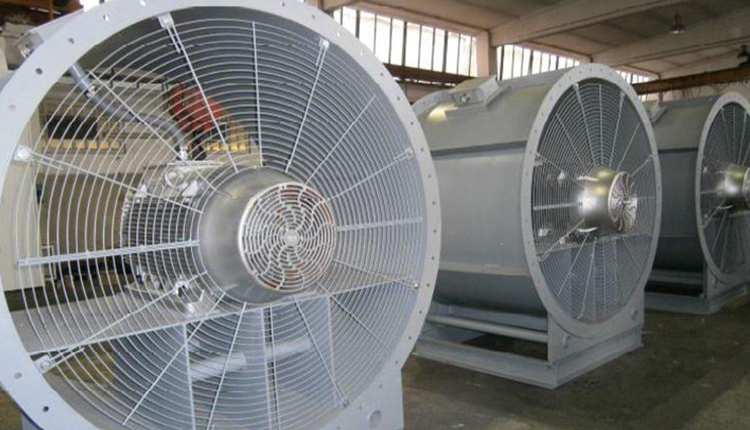
What are axial fans, what do they do and where are they used?
What is Axial Fan? An axial fan is a type of fan system that directs airflow in a direct axis. These fans draw air from one end and blow it from the other end with the help of a rotating propeller. They are generally used in industrial applications, ventilation systems and air conditioning systems. The main feature of axial fans is that they provide high air flow, which makes them ideal for creating an effective air flow in large areas. Energy-efficient axial fans typically deliver large airflows with low energy consumption, which saves energy in the long run. The selection of axial fans may vary depending on the intended use. When choosing the right fan, features such as the size of the fan, airflow capacity and motor power should be taken into consideration. In addition, conditions such as temperature and humidity of the environment where the fan will be used are also important. There are special designs for fans that will operate in industrial environments or harsh conditions. Regular maintenance of axial fans can increase their performance and lifespan. Therefore, both those seeking information and those considering purchasing should take these factors into consideration when choosing the axial fan that best suits their needs. How Does Axial Fan Work? Axial fans are devices that provide air flow directly and in parallel. These types of fans contain a series of propellers, usually rotated by a motor. The rotational movement of the engine also enables the rotation of the propellers. The centrifugal force created by the propellers as they rotate draws and pushes the air along the axis of the fan. This process allows air to move in one direction, usually horizontally or in a straight line. Axial fans are used to provide effective air movement in large areas thanks to this simple and effective mechanism. The working principle of axial fans is very useful for optimizing air circulation and cooling in both industrial and commercial spaces. Users who intend to purchase can choose products that suit their needs by considering the air flow capacity and energy efficiency of axial fans. Users who intend to receive service can receive professional support to increase the performance of the systems and ensure their efficiency. Users looking for information can gain a better understanding of the features of these devices by learning how axial fans work and in which areas they are effective. What are the Basic Features of Axial Fans? Axial fans are devices with a simple but effective mechanism that directs air flow along the axis. One of its main features is that the fan's blades rotate on a horizontal axis. This provides ventilation by pushing air along a direct, parallel direction. One of the most important advantages of axial fans is that they provide highly efficient air circulation in large areas. Additionally, they are generally very easy to install and use, thanks to their compact and lightweight design. These features make axial fans a popular choice in both commercial and industrial applications. Another key feature is the energy efficiency of axial fans. Most axial fans are equipped with motors that optimize energy consumption, resulting in cost savings over long-term use. Additionally, axial fans offer models that can operate with low noise levels, making them especially suitable for use in sound-sensitive environments. Users who intend to purchase should take energy efficiency and performance criteria into consideration when choosing the fan that best suits their needs thanks to these features. People who intend to receive service can increase system efficiency by getting help from experts for correct fan selection and maintenance. By learning about these basic features of axial fans, users seeking information can better understand the advantages of these devices in various applications. Industrial Axial Fans: What Do They Do and How to Use them? Industrial axial fans are powerful and effective devices designed to meet large-scale air circulation and ventilation needs. These fans provide effective air circulation in large areas by providing high volume air flow under low pressure. Industrial axial fans are used especially in workshop areas, production facilities and storage areas. Such fans are critical to improve the air quality of the environment, keep temperatures under control and prevent moisture-related problems. Industrial axial fans generally offer high efficiency thanks to their large propellers and powerful motors. Its use usually begins with the installation and orientation of the fan; Directing airflow to targeted areas is important for optimal performance. Additionally, these fans are often designed to operate continuously in industrial applications, requiring regular maintenance and cleaning. Users who intend to purchase should choose the model that suits the needs of the application while evaluating the capacity and energy efficiency of the fan. Those who intend to receive service can increase system performance by getting expert help in the installation, maintenance and repair of industrial axial fans. Users looking for information can evaluate this information to understand the advantages and usage areas of industrial axial fans. What are the differences between Axial Fan and Radial Fan? Axial fans and radial fans are two different types of fans used to direct airflow, and each offers advantages for certain applications. Axial fans direct airflow parallel to the axis of the fan. In this type of fan, air moves outward from the center of the impeller and is generally used to provide large volumes of air flow under low pressure. Axial fans are generally preferred for air circulation and ventilation in large areas. For example, the air quality of the environment is improved by using these fans in industrial workshops or storage areas. On the other hand, radial fans (or centrifugal fans) direct airflow in a direction perpendicular to the axis of the fan. In these fans, air is pushed outward from the center as it rotates around the impellers, resulting in high-pressure air flow. Radial fans are used in applications requiring higher pressure and generally provide more effective airflow in tighter spaces. Therefore, these fans are often used in air conditioning systems, air purification units and other built-in systems. While radial fans perform more effectively in narrow spaces, axial fans optimize ventilation processes in large areas. Users should consider the airflow and pressure characteristics the fan provides when choosing between an axial or radial fan depending on their needs. While axial fans are effective in large areas, radial fans are suitable for high pressure and narrower areas. What are the Usage Areas and Advantages of Axial Fans? Axial fans are devices used to provide effective air flow in large areas and offer great advantages in various application areas. These fans direct airflow parallel to the axis of their blades, making them ideal for applications that require large volumes of air circulation. It is frequently preferred in industrial facilities, workshops and large storage areas to increase air circulation and improve the air quality of the environment. It also helps distribute heat effectively by being used in cooling electronic devices and air conditioning systems. In sectors such as agriculture and greenhouse cultivation, axial fans can be very effective to support the healthy growth of plants and provide temperature and humidity control. Axial fans have many advantages. Thanks to their ability to provide high air flow, they provide effective ventilation and cooling in large areas. These energy-efficient fans typically deliver large airflows with low energy consumption, reducing energy costs and creating an environmentally friendly option. Additionally, since their structures are generally simple, maintenance and repairs can be done quite easily and economically. Available in a variety of sizes and capacities, they provide solutions to suit different application needs, enabling users to choose the right axial fan according to their specific requirements. In Which Sectors Are Axial Fans Used? Axial fans offer a wide range of uses due to their ability to provide effective airflow and cooling in various industries. In industrial facilities, axial fans are often preferred to prevent overheating of large equipment and machines. These fans improve employee comfort and productivity by increasing air circulation in production areas, storage facilities and assembly lines. In addition, in workshop environments and areas where large machines are located, it regulates air flow and ensures the dispersion of dust and other particles, which increases both working efficiency and equipment life. In the agricultural and greenhouse sectors, axial fans are used to support the healthy growth of plants. In order to control humidity and temperature in the greenhouse, these fans help plants grow more efficiently by creating homogeneous air distribution. It is also used in ventilation and drying processes, increasing the quality and shelf life of the products. Additionally, axial fans are included in air conditioning systems to improve air circulation in commercial buildings and offices. These uses demonstrate the versatility of axial fans and their suitability for different industry needs. Points to Consider When Choosing Axial Fan When choosing an axial fan, there are a few important points to consider in terms of performance and efficiency. First, the flow capacity and air flow rate of the fan must be determined. This determines how much air the fan can move and how effective cooling it will provide. High-flow axial fans can be more effective in large areas or areas with high heat load, while low-flow fans are suitable for smaller areas. Additionally, the operating noise of the fan is also an important factor. In industrial and commercial use, silent operation increases comfort, especially in business environments. Another important point is the material quality of the fan. The blades of axial fans, usually made of metal or durable plastic, ensure long life and durability. Additionally, the energy efficiency of the fan can affect operating costs. Energy efficient models provide energy savings in the long term and reduce environmental impacts with low energy consumption. The installation and maintenance requirements of the fan should also be considered; Some models offer easy assembly and maintenance features, saving users time and labor. Taking these factors into consideration will make it easier to choose a suitable and long-lasting axial fan. Tips to Increase the Efficiency of Axial Fans To increase the efficiency of axial fans, it may be useful to consider some basic tips. First, it is important to take care of the cleanliness of the fan. Dust and dirt accumulated on the fan blades can block air flow and reduce the fan's performance. Cleaning the fan at regular intervals ensures free airflow and increases efficiency. Additionally, it must be ensured that the mounting location and direction of the fan are appropriate. The fan must be positioned correctly, without any objects obstructing the air flow. Another important point is to maintain the fan motor. Regular lubrication and checks of the motor help the fan to operate more quietly and efficiently. Additionally, to increase the energy efficiency of the fan, energy-saving models can be preferred. These types of fans offer the same level of performance while consuming less energy. Finally, selecting the fan in appropriate sizes and capacities also plays a critical role in terms of efficiency. Choosing a fan that suits your needs both saves energy and provides more effective air circulation. These simple but effective tips can help maximize the performance and efficiency of axial fans. Things to Know in Maintenance and Repair of Axial Fans Maintenance and repair of axial fans is critical to ensure long-lasting and efficient operation of the fans. First, performing regular maintenance improves the performance of the fan and prevents malfunctions. The fan's blades and motor can become covered in dust and dirt over time, which can obstruct airflow. Therefore, the fan needs to be cleaned periodically. Cleaning the blades and motor prevents the accumulation of dust and dirt, thus maintaining the efficiency of the fan and reducing energy consumption. Additionally, it is important to check the fan's components regularly; Problems such as loose screws, worn bearings or damaged parts must be detected in a timely manner. During the repair process, using the correct spare parts is of great importance. When defective parts need to be replaced, using original and compatible spare parts increases the performance and reliability of the fan. In addition, lubricating the fan motor and tightening its mechanical connections are also important maintenance steps. If you encounter a problem that requires expertise in the maintenance and repair of the fan, the best option is to seek help from a professional technician. Experts ensure that the fan is repaired correctly and prevents possible future problems. These approaches ensure trouble-free operation and long life of axial fans. Energy Efficiency and Saving Methods of Axial Fans The energy efficiency of axial fans is a critical factor for saving energy and reducing operating costs. The first step to improving energy efficiency is correct sizing of the fan. Insufficient or oversized fans can negatively affect the efficiency of the system. Therefore, choosing fans in appropriate sizes and capacities saves energy. Additionally, regular maintenance and cleaning is required to ensure the fan's airflow is optimal. Dirty or clogged fans consume more energy and reduce their efficiency. Another way to increase energy savings is to use variable speed control systems. These systems adjust the speed of the fan according to ambient conditions and thus prevent unnecessary energy consumption. Using variable speed drives (VSD) in particular ensures that the fan consumes only the amount of energy needed, resulting in a significant reduction in energy costs in the long run. Additionally, correct installation and ventilation conditions must be provided to increase the energy efficiency of the fan. With these measures, you can increase the performance of axial fans and minimize energy consumption. Different Types and Application Areas of Axial Fans axial Fans are devices that come in various types and have a wide range of applications. Essentially, axial fans direct airflow in parallel and different designs are customized according to specific needs. Bladed axial fans, is the most common type of this type of fans. Thanks to their large diameter wings, they provide high volume air movement in large areas. These features make them ideal for cooling and ventilation systems in places such as industrial facilities, large buildings and warehouse areas. They are also used in large air conditioning systems and ceiling fans because they provide effective temperature control with large air flows. Another type bladeless axial fans It has more compact and aesthetically modern designs. These fans are often used in small commercial spaces and offices. Its bladeless design increases safety and reduces maintenance requirements. They attract attention with their quiet operation and low energy consumption, especially in places where aesthetic concerns are important. Both types offer customized models for various application areas that increase energy efficiency and improve performance. This diversity allows axial fans to be used efficiently in different sectors.
Read More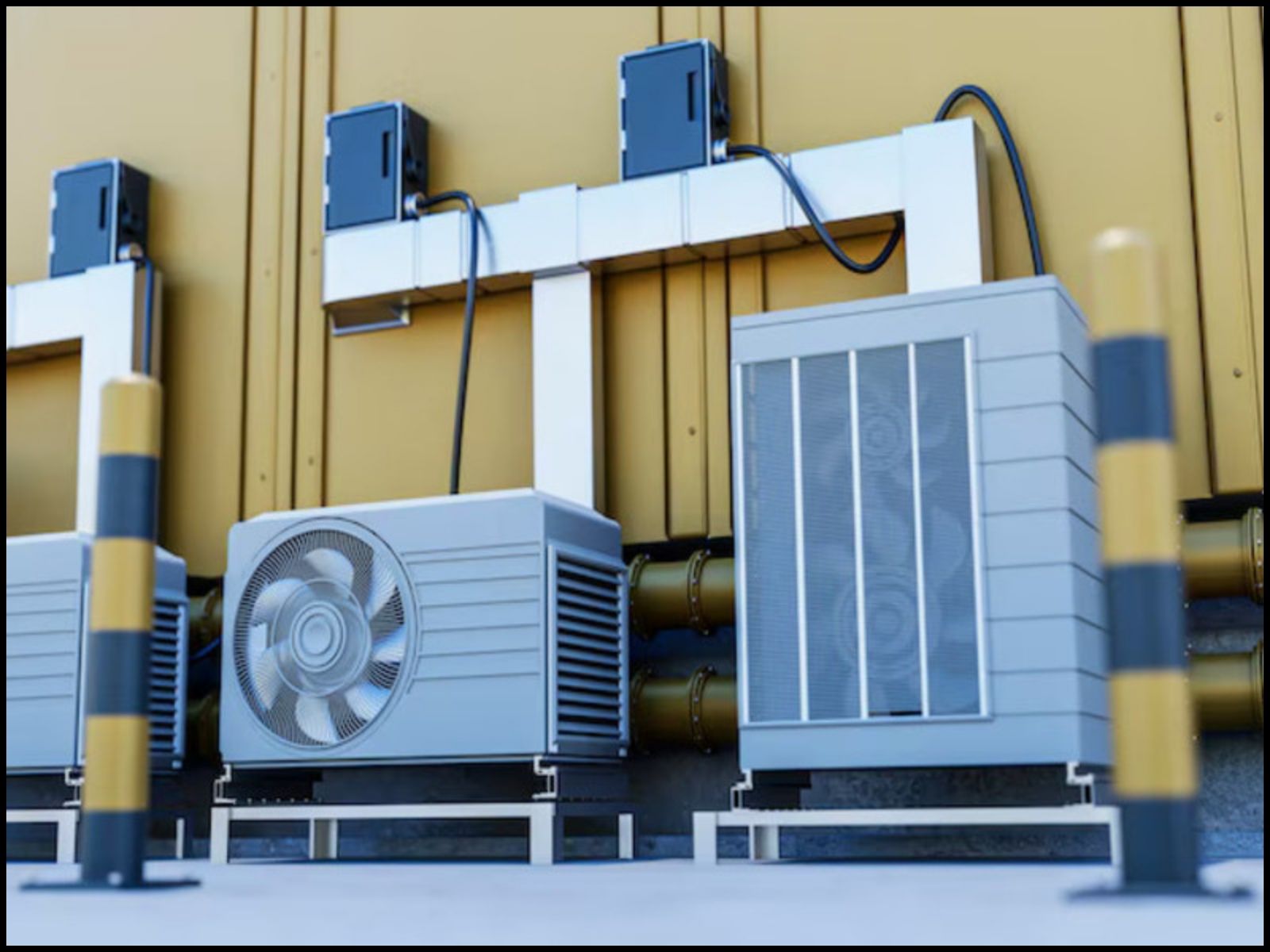
What are condensers, what do they do and where are they used?
What is a Condenser? The condenser is an essential component used in various cooling and heating systems. It is generally used to convert the vapor resulting from the evaporation process into liquid. Its basic function is to cool the gaseous fluid at high temperature and pressure and turn it into a liquid. This process allows the device to operate efficiently by removing heat from the cooling systems. Condensers play a critical role, especially in air conditioning systems, chillers and industrial processes. Factors to consider when choosing a condenser include capacity, energy efficiency and quality of materials used. Highly energy efficient condensers save energy in the long run and reduce operating costs. Moreover, the right choice will extend the life of the device and increase its performance. If you are considering purchasing a condenser, choosing a model with a capacity suitable for your needs and with high energy efficiency will optimize both your costs and energy consumption. Additionally, you can keep the performance of the device at a high level with professional maintenance services, which ensures the long life of the device. How Does Condenser Work? The condenser is a component that has a critical function in cooling and heating systems, and its working principle is quite simple. The condenser supports the cooling or heating process of the system by converting the gaseous fluid into liquid. The process begins with the gas at high pressure and temperature entering the condenser and cooling it. The surfaces of the condenser absorb heat from the surrounding air or a cooling liquid, turning the gas into a liquid. This process causes the fluid to lose energy and turn into a liquid. Efficient operation of condensers is critical for energy saving and long life of the system. A correctly selected condenser can reduce operating costs by increasing energy efficiency. If you are considering purchasing a condenser, you should make sure that the capacity of the device suits your needs and meets energy efficiency standards. Additionally, professional maintenance and cleaning maintains the performance and efficiency of the condenser, ensuring its trouble-free operation for a long time. Our experts can help you choose the condenser that best suits your needs and perform regular maintenance, so you can keep your system's performance at the highest level. What are the Basic Functions of Condensers? Condensers are components that play a vital role in cooling and heating systems. Their basic function is to ensure that gaseous fluid turns into liquid. This conversion process generally occurs by cooling gases with high temperature and pressure as they pass through the condenser. Condensers are used especially in air conditioners, refrigerators and industrial cooling systems. During cooling of the fluid, heat is transferred from the condenser surfaces to the environment and thus the gas becomes liquid. This process is critical to ensure efficient operation of the system and energy saving. If you are considering purchasing or servicing a condenser, you should ensure that its function meets the needs of your system. Proper operation of condensers optimizes energy consumption and reduces long-term costs. Additionally, regular maintenance increases the performance of condensers and prevents malfunctions. By getting expert help on this matter, you can choose the most suitable condenser for your system and complete periodic maintenance operations. In this way, you can both extend the life of your device and keep energy efficiency at the highest level. In Which Sectors Are Condensers Used? Condensers are widely used in various industrial and commercial fields. These function as a critical part of cooling and heating systems. For example, in the food processing and storage industries, condensers are used to ensure efficient operation of refrigerators and freezers. These devices support products to stay fresh and meet high quality standards. Additionally, condensers are used in HVAC (heating, ventilation and air conditioning) systems to control the indoor temperatures of buildings and increase energy efficiency. Proper selection and maintenance of condensers is critical for those who want to increase energy efficiency. Businesses prefer high-performance condenser systems to save energy and reduce operating costs. Additionally, in industrial applications, especially in large-scale cooling systems, condensers optimize cooling processes and increase operational efficiency. Selection and maintenance of condensers professionally is an important factor in both the purchasing and service process. This ensures long-lasting, reliable performance and saves on energy costs. What are the advantages of condensers? Condensers play an important role in improving the efficiency of cooling and heating systems. These devices reduce operating costs by saving energy. Energy efficient condensers provide high-performance cooling and heating processes, reducing environmental impacts and minimizing energy bills. This provides a significant cost advantage, especially in large-scale commercial and industrial applications. Additionally, energy-saving condensers increase the overall performance of the system and ensure a long-lasting device. Professional maintenance and regular cleaning maintain the performance of condensers and reduce the risk of malfunction. Regular checking and maintenance of condensers increases the efficiency of the system, resulting in lower operating costs. This is a critical advantage for users who intend to both purchase and receive services. The advantages of condensers offer a wide range of effects in terms of both energy savings and system efficiency. Therefore, correct selection and regular maintenance ensure high performance and cost savings in the long run. What is the Relationship Between Condensers and Cooling Systems? Condensers are one of the basic components of cooling systems and ensure the systems operate effectively. In cooling systems, condensers remove heat by converting the evaporated refrigerant into liquid. This process increases the efficiency of cooling systems and helps maintain desired temperatures. Condensers directly affect the performance of the cooling system; because the condensation process of the refrigerant determines the overall efficiency of the system. The efficiency of condensers reduces the energy consumption of the cooling system and provides better performance at lower costs. Energy efficient condensers save energy and reduce operating costs by increasing the efficiency of cooling systems. Additionally, professional maintenance and regular cleaning maintain the performance of condensers and prevent system failures. For users who intend to both purchase and receive service, this important role of condensers guarantees the effective operation and long-lasting performance of cooling systems. Therefore, correct condenser selection and maintenance is critical to the efficiency of cooling systems. What are the Contributions of Condensers to Energy Efficiency? Condensers play an important role in improving energy efficiency because they are one of the essential parts of cooling systems. In cooling systems, condensers function to finish the evaporation process of the refrigerant and turn it into liquid. This process controls temperature levels on the inside of the system by removing heat. A good condenser performs the cooling process more effectively, which means reduced energy consumption. In this context, energy efficient condensers optimize the performance of cooling systems, reducing electricity consumption and reducing energy costs. For users who intend to purchase, highly energy efficient condensers provide long-term cost savings. Professional maintenance and cleaning increases the efficiency of condensers and extends the life of the system. Users who intend to receive service can ensure that their systems operate at best performance with regular maintenance and checks. This both increases energy efficiency and reduces environmental impact. For users seeking information, the contributions of condensers to energy efficiency are of great importance in terms of both energy savings and environmental sustainability. What are the Different Condenser Types and Their Usage Areas? Condensers serve different application areas with their various types. They are basically divided into three main types: air-cooled, water-cooled and air-water combined condensers. Air-cooled condensers are used in a system cooled by air flow and are generally preferred in small-scale applications. Water-cooled condensers, on the other hand, expel heat with the help of water and are used in large industrial systems. Air-water combined condensers increase efficiency by using both air and water cooling methods. Users intending to purchase should evaluate the advantages and application areas of these different types to determine which type of condenser suits their needs. Users who intend to receive service can choose the condenser that best suits their system's needs with professional help. Users looking for information can make more informed decisions by learning in which areas various types of condensers are used. What are the Common Usage Areas and Application Examples of Condensers? Condensers are widely used in various sectors and their usage areas cover a wide range. It plays a critical role especially in cooling systems, air conditioning units, refrigerators and industrial cooling applications. For example, in air conditioning systems used to increase energy efficiency in large commercial buildings, condensers are an integral part of the cooling process. In addition, condensers used in the food processing industry to ensure the effectiveness of cooling systems support the freshness of products. Users who intend to purchase can find the most efficient solution by researching the applications in which condensers are used that suit their needs. Users who intend to receive service can optimize their systems by knowing application examples and usage areas. Users looking for information can learn about different application examples of condensers and determine in which areas they will provide the best performance. What are the Industrial Areas and Systems Where Condensers Are Used? Condensers play a vital role in many industrial fields. They are used in large-scale cooling systems, especially in the energy production, chemical and petrochemical sectors. Condensers used in power plants to turn steam into liquid increase the efficiency of the system. In the chemical industry, it plays a critical role in managing chemical reactions and cooling products. It is also used extensively in petrochemical plants to reduce energy consumption and optimize processes. Intended purchasers should consider the specific requirements of the system when selecting suitable condensers for industrial applications. Users who intend to receive service can make their systems more effective by getting help from experts for industrial use. Users looking for information can gain more comprehensive information by learning the importance of condensers in industrial areas and how they are used. What are the features to consider when choosing a condenser? There are some basic features to consider when choosing a condenser. First of all, the capacity and type of the condenser must suit the needs of the system in which it will be used. When choosing between air-cooled, water-cooled or combined types, local climatic conditions and energy efficiency of the system should be taken into account. In addition, the material quality, durability and maintenance requirements of the condenser are also important. Users who intend to purchase can increase the performance of their systems by evaluating the capacity and type of the condenser. Users who intend to receive service can choose the most suitable condenser with expert advice and maximize efficiency after installation. Users looking for information can make informed decisions by obtaining detailed information about the features that should be taken into account when choosing a condenser.
Read More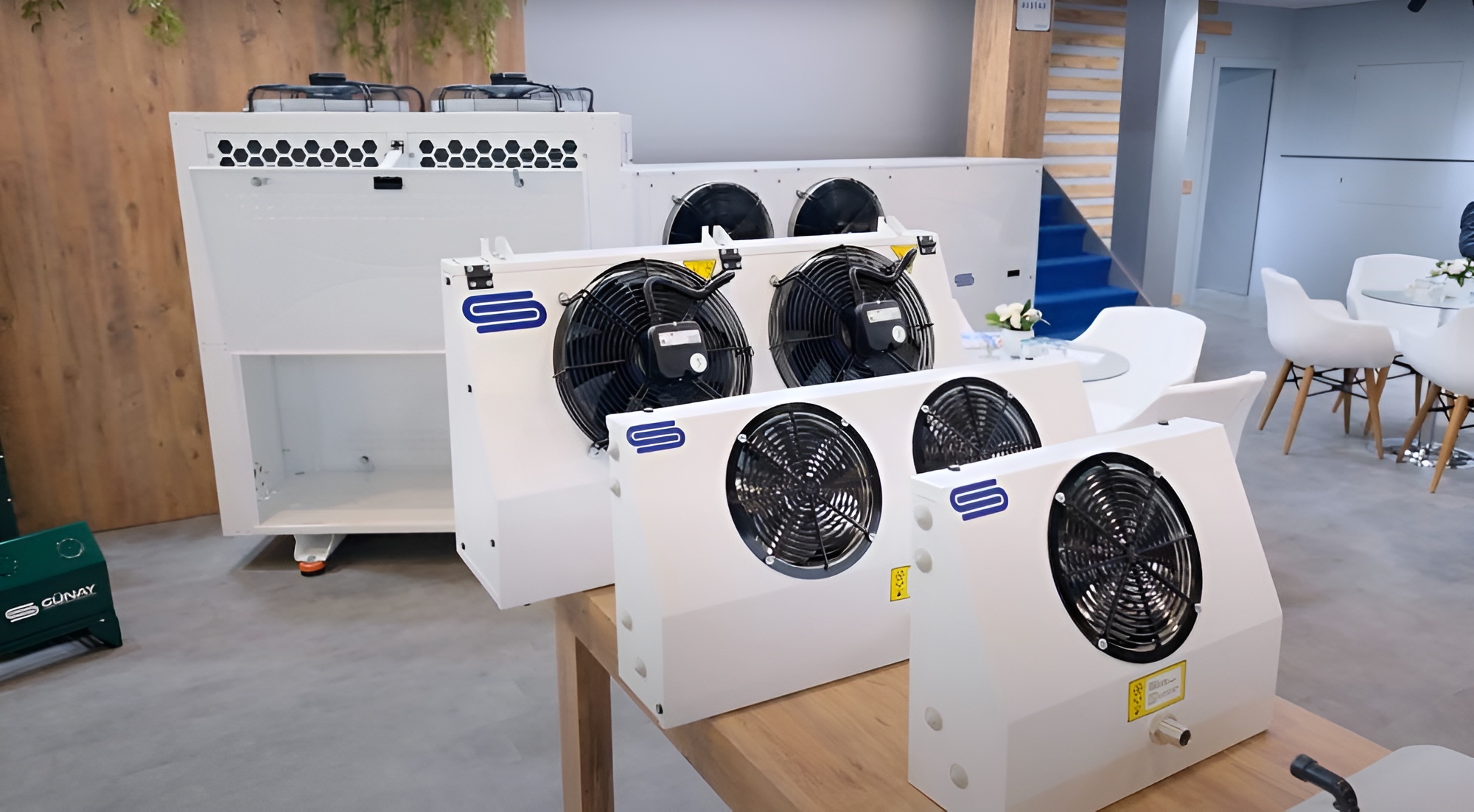
What is an evaporator, what does it do and where is it used?
What is an evaporator? The evaporator is a basic component in cooling and heating systems and generally transfers heat by causing the liquid refrigerant to evaporate. Its primary function is to lower the temperature of the environment as part of the cooling process. Evaporators increase the efficiency of the device and save energy by extracting heat through evaporation. These features enable them to have a wide range of uses in both industrial and commercial areas. Evaporators are used primarily in refrigeration systems, air conditioning units, refrigerators and industrial processes. In cooling systems, it extracts heat from the air and releases cooled air or liquid. This makes the environment cooler and more comfortable. If you need to purchase a cooling or air conditioning system, choosing a quality evaporator can directly affect the performance of the system. Therefore, it is important to choose the evaporator model that best suits your needs by getting professional support. Additionally, if you are looking for information on the maintenance and efficiency of your existing system, receiving service from an expert technician can provide energy savings and performance increases in the long run. How Does Evaporator Work? The evaporator is a critical component at the heart of refrigeration and air conditioning systems, and its primary function is to ensure the evaporation of liquid refrigerant. This process is designed to increase the efficiency of the cooling system. The working principle of the evaporator involves the refrigerant absorbing heat as it passes through a coil or surface. The refrigerant evaporates from its liquid form and takes heat from the environment, thus decreasing the temperature of the environment. This evaporation process allows the cooling process to occur. The effective operation of evaporators directly affects the performance of the cooling system. If you are considering purchasing a new cooling device or are experiencing performance problems with your current system, choosing a high-quality evaporator is very important. Additionally, regular maintenance of evaporators is necessary to ensure long life and efficient operation. Getting maintenance and repair services from a professional technician can increase your system's energy efficiency and reduce your operating costs. Therefore, it would be beneficial for users who are both seeking information and intending to receive service to receive expert support to maximize your system performance. What are the Basic Functions of Evaporators? Evaporators play a critical role in cooling systems and have many different functions. Its basic function is to transfer heat by enabling the evaporation of the refrigerant. This process helps cool an environment; That is, by withdrawing heat from the environment, the temperature of the environment is lowered. For example, in a refrigerator or air conditioning system, evaporators control the temperature of the environment, allowing the device to operate effectively. This function is very important in terms of energy efficiency and comfort. Correct selection and maintenance of evaporators directly affects the performance and life of the device. If you are considering purchasing a new cooling system, choosing a quality evaporator with suitable features will increase the efficiency of your system and reduce your energy costs. Getting support from expert technicians to improve the performance of your current system or troubleshoot problems will ensure the smooth operation and long life of your device. For users both seeking information and intending to seek service, understanding the basic functions and maintenance requirements of evaporators will help you make more informed decisions. Where are evaporators used? Evaporators play an important role in a variety of industrial and commercial applications and have a wide range of uses. Especially in cooling and air conditioning systems, evaporators help cool the environment by allowing the liquid refrigerant to evaporate. This is used in many areas, from air conditioners in homes to central cooling systems in office buildings to large industrial facilities. It also serves as a critical component in household appliances such as refrigerators and freezers. Proper selection and maintenance of evaporators can have a direct impact on the efficiency of the device. When purchasing a new cooling or air conditioning system, choosing an evaporator with features that fit your needs will improve the device's performance and reduce energy costs. In addition, getting professional support to improve the performance of your existing system or to have it maintained ensures efficient operation of the system and guarantees its long life. For users who are both looking for information and intending to receive service, understanding the wide range of uses of evaporators and the benefits they provide will help you make more informed decisions. In Which Sectors Are Evaporators Common? Evaporators play a critical role in many industries and are widely used in a variety of applications. Cooling and air conditioning systems are found in a wide range of locations, from homes to large commercial buildings. In these systems, evaporators contribute to the cooling of the environment by allowing the liquid refrigerant to evaporate. It also serves as an important component in refrigerators, freezers and other cooling devices. These areas of use enable evaporators to find a wide range of applications in commercial and residential applications. Evaporators also play an important role in industrial fields such as food processing, chemical and pharmaceutical sectors. In these sectors, evaporators are used to perform processes such as evaporating, concentrating and cooling liquids. The performance and durability of evaporators are of critical importance, especially in environments requiring high temperature and pressure. If you are considering purchasing a new cooling system or experiencing performance problems in your current system, choosing an evaporator with the right features and benefiting from professional maintenance services can increase the efficiency of your system and ensure its long life. For both information seekers and service intenders, understanding the importance of evaporators in different industries will help you make informed decisions. How Do Cooling Systems Work with Evaporators? Evaporators are one of the key components of cooling systems and serve a critical function to provide effective cooling. In these systems, it cools the environment by allowing the refrigerant to evaporate. Evaporators generally enable the liquid refrigerant in cooling systems to evaporate by absorbing heat. This process begins with the evaporation of the refrigerant under high temperature and pressure, and heat is extracted from the environment, providing low temperature. The evaporation process of evaporators ensures that the cooling system operates efficiently and target temperature levels are maintained. The relationship between evaporators and cooling systems is important both for users seeking information and intending to purchase or receive service. Correct selection and maintenance of evaporators directly affects the performance of cooling systems. When purchasing a new cooling system or maintaining an existing system, it is necessary to consider the capacity, efficiency and durability of evaporators. Additionally, ensuring the correct operation of the system by getting professional support can reduce energy costs and extend the life of the device. With information that helps users both understand how their cooling systems work and optimize system performance, they can make more informed and effective decisions. What are the Different Types and Uses of Evaporators? Evaporators, with their different types and uses, play an important role in various industrial and commercial applications. In general, there are several basic types of evaporators: air-cooled, water-cooled, and atmospheric. Air-cooled evaporators enable the evaporation of refrigerant using outdoor air and are generally used in small and medium-sized systems. Water-cooled evaporators are generally preferred in large-scale cooling systems because they evaporate the refrigerant using water. Atmospheric evaporators, on the other hand, are in direct contact with the atmosphere and are used in various industrial processes. Each evaporator type is designed for specific areas of use and needs. For example, air-cooled evaporators are often used in residential and commercial cooling applications, while water-cooled evaporators are used in large industrial facilities and cooling systems. Atmospheric evaporators are effective in concentrating or cooling liquids in the food processing, chemical and pharmaceutical industries. The correct selection of evaporators is important for users who intend to both purchase and receive service; because each type and model offers different performance and energy efficiency features. By understanding the advantages and application areas of different evaporator types, information-seeking users can choose the most efficient solution to suit their needs and improve long-term performance. What are the features to consider when choosing an evaporator? When choosing an evaporator, it is necessary to consider many important features. First of all, the energy efficiency, performance and longevity of the system are critical factors for both purchasing and service users. An energy efficient evaporator reduces operating costs and reduces environmental impact. In addition, the cooling capacity of the evaporator must be suitable for its intended use; This provides adequate performance for your need. Another important feature is the type of evaporator. Air-cooled, water-cooled or atmospheric types should be preferred according to different application needs. To make a good choice, users must also consider the installation and maintenance requirements of the system. A quality evaporator can operate smoothly for many years with regular maintenance. Users looking for information can determine the most suitable and efficient option by examining the product's technical specifications, warranty period and maintenance requirements. Choosing an evaporator with the right features allows you to achieve the best results in terms of both performance and cost. How to Increase the Energy Efficiency of Evaporators? Increasing the energy efficiency of evaporators is of great importance in terms of both reducing operating costs and reducing environmental impacts. When choosing an energy-efficient evaporator, the energy efficiency class, cooling capacity and design features of the device should be taken into account. Models with high energy efficiency provide the same performance by consuming less energy and provide cost savings in the long term. Additionally, regular maintenance and cleaning maintains the optimum performance of evaporators. Dirty or clogged evaporators can increase energy consumption and reduce efficiency. For users who intend to receive service, providing professional maintenance and cleaning services is an effective way to increase energy efficiency. Additionally, energy-saving improvements using modern technology are another important factor to consider. Energy efficient systems and automation solutions manage cooling processes more effectively and minimize energy consumption. How to Maintain and Clean Evaporator? Regular maintenance and cleaning of evaporators is critical to improve the performance of the system and extend its life. The cleaning process usually involves clearing the evaporator of dust, dirt and other contaminants. This process increases cooling efficiency and reduces energy consumption. During maintenance, the evaporator grills, fans and cooling surfaces should be carefully cleaned. Cleaning should be done using special cleaning solutions and brushes. It is also necessary to check fan motors and electrical connections. For users who intend to purchase or receive services, companies that provide professional maintenance services carry out these operations with expert teams. Such services provide the opportunity to both clean and check the overall health of the system. By regularly maintaining evaporators, users seeking information can optimize the performance of the device and ensure its longevity. In particular, maintenance of frequently used systems in winter and summer can be carried out more effectively with annual performance evaluations. What Cleaning and Maintenance Products Should Be Used for Evaporators? It is vital to use the correct cleaning and maintenance products to ensure that evaporators operate effectively and extend their life. Chemical cleaners with special formulations are generally preferred in cleaning processes. These products effectively clean dirt and dust on the evaporator's grills and cooling surfaces, while also preventing material damage. Generally, acidic or alkaline cleaning solutions are used and these products should be used in accordance with the application instructions. Users seeking information should turn to cleaners formulated for industrial use rather than household cleaning products. Those who intend to purchase or receive services can purchase products from companies that provide professional cleaning equipment and chemicals. Additionally, auxiliary equipment such as special brushes, air blowers and filter cleaning tools are also used during cleaning. Regular use of such products ensures that evaporators operate with high efficiency and reduces energy costs. Professional companies that offer maintenance services can guide you on the correct use of these products and methods. What are the ways to extend the life of evaporators? Extending the life of evaporators is a critical step to both maintain their performance and reduce costs in the long run. First, regular maintenance and cleaning keeps evaporators working effectively. Dust, dirt and other contaminants can reduce the efficiency of evaporators and cause wear. Therefore, regular cleaning and maintenance of the evaporator will extend the life of the device. Additionally, using the right cleaning products and tools ensures effective cleaning without damaging the internal structure of the device. It is very useful to benefit from professional maintenance services for users looking for information and those who want to receive service. These services check the internal parts of evaporators, detect leaks and make necessary repairs. For those who intend to purchase, choosing quality and durable evaporators ensures long-lasting use. Additionally, performing regular performance evaluations and system checks ensures that possible malfunctions are detected early and repairs are made in a timely manner. These approaches ensure that evaporators operate more efficiently for longer periods of time and prevent unexpected malfunctions. What are the Common Problems and Solutions for Evaporators? Evaporators play an important role in cooling and ventilation systems, but some common problems can be encountered. These include poor performance, excessive ice formation, and leaks. Poor performance can often be caused by dirty filters or clogged air ducts. Cleaning or replacing filters regularly improves airflow and solves performance problems. Excessive ice formation is usually caused by low refrigerant levels or incorrect temperature settings. In this case, it is necessary to check the refrigerant levels and ensure that the system is set correctly. For users seeking information, it is important to detect and resolve such problems early. Those who intend to purchase can minimize such problems by choosing high-quality evaporators. For those who want to receive professional service, expert help is required to diagnose problems correctly and solve them effectively. This approach both extends the life of the device and increases energy efficiency. Why Are Professional Maintenance Services Necessary for Evaporators? Evaporators are complex devices that require regular maintenance and cleaning. Professional maintenance services are critical to maintaining optimum performance and extending the life of these devices. These services detect potential problems in the internal structure of evaporators at an early stage and perform repairs. Professional technicians safely clean and maintain all components of the device using the correct cleaning products and techniques. Additionally, these experts detect leaks, leaks, and other mechanical problems in the system, ensuring effective operation of the device. Users seeking information should understand the need for professional maintenance to maintain the efficiency and performance of their devices. For those who intend to purchase, working with companies that provide high quality and reliable maintenance services ensures the long life of the device. Users who intend to receive service will achieve fewer malfunctions and higher energy efficiency thanks to professional maintenance. This both reduces costs and increases the performance of the device.
Read More
Evaporator Maintenance and Cleaning
Why is Evaporator Maintenance Important? Evaporator maintenance is critical for both performance and longevity. Regular maintenance of evaporators ensures efficient operation of the device and optimizes energy consumption. Dirty or clogged evaporators reduce the efficiency of cooling or heating systems, which can lead to higher energy bills and more frequent breakdowns. Additionally, poorly maintained evaporators can shorten the life of the device and lead to large repair costs. Therefore, not neglecting evaporator maintenance saves money in the long run and supports the trouble-free operation of the system. Hiring a professional maintenance service ensures that all components of your evaporator are properly cleaned and inspected. This service increases the performance of the device and prevents possible malfunctions. Additionally, regular cleaning and maintenance increases the energy efficiency of the device, reducing your energy costs. Chemicals and cleaning methods used in evaporator maintenance should be chosen taking into account the safety of both your device and the environment. Therefore, by getting professional support, you can have a care process that is both safe and effective. How to Clean Evaporator? Evaporator cleaning is a critical process to ensure efficient operation of the system and achieve energy savings. Before starting the cleaning process, it is necessary to disconnect the device from the electricity supply and take safety precautions. As a first step, a soft brush or vacuum is used to clean the outer surface of the evaporator from dust and dirt. Afterwards, special cleaning solutions can be used to remove any dirt accumulated on the inside of the evaporator. These solutions provide effective cleaning without damaging metal surfaces. During the cleaning process, ensure that all dirt and residue is removed and the device must be completely dried. The tools and chemicals to be used for evaporator cleaning are important for the success of the cleaning process. Tools such as compressed air blasting, small brushes, and cleaning cloths effectively remove dirt and dust. Chemically, cleaners specially formulated for evaporators should be preferred. These chemicals ensure cleaning without affecting the performance of the device. Using these tools and chemicals correctly, professional maintenance services thoroughly clean both the interior and exterior surfaces of the device. In this way, the long life of the device and increased energy efficiency are ensured. For both those seeking information and those intending to purchase or service, regular cleaning and maintenance will guarantee the trouble-free operation of your system. Which Tools and Chemicals Should Be Used in Evaporator Maintenance? The right tools and chemicals used in evaporator maintenance play a critical role in increasing the efficiency and life of the device. First, compressed air blasters and small brushes help effectively remove dust and dirt from evaporator surfaces. Additionally, cleaning cloths and microfiber towels ensure that surfaces are cleaned without damaging them during the cleaning process. These tools provide great convenience, especially in hard-to-reach areas and detailed cleaning. Chemical cleaners are also an important part of the maintenance process. Cleaning solutions specially formulated for evaporators can effectively dissolve dirt and debris. These chemicals are generally acidic or alkaline and provide deep cleaning without damaging the surfaces. When applied in accordance with the instructions for use, these products improve the performance of the evaporator and optimize energy efficiency. If you are considering professional service, experienced technicians provide comprehensive maintenance using these tools and chemicals correctly. This ensures both long life and high performance of the device. How Often Should Evaporator Cleaning Be Done? Evaporator cleaning is a process that must be performed regularly to maintain the performance and efficiency of the device. In general, cleaning of evaporators should be done at least once or twice a year. However, this frequency may vary depending on the intensity of use, environmental conditions and type of device. For example, systems operating in heavily dusty or dirty environments should be cleaned more frequently. Additionally, regular maintenance of the device during seasonal changes or periods of high usage helps prevent performance problems. How often evaporator cleaning should be done also directly affects the energy efficiency of the device. Dirty or clogged evaporators can increase system energy consumption and reduce performance. Therefore, regular cleaning and maintenance operations both save energy and extend the life of the device. Professional service providers ensure the efficient operation of your device by determining cleaning schedules that suit your needs. For both users seeking information and intending to purchase or service, regular cleaning supports trouble-free operation and longevity of the device. What are the Most Common Mistakes in Evaporator Maintenance? Mistakes made in evaporator maintenance can negatively affect the performance of the device and cause major problems in the long run. One of the most common mistakes is irregular cleaning and maintenance. Users may neglect regular maintenance to prevent the evaporator from becoming dirty or clogged. This reduces the energy efficiency of the device and may cause system malfunctions. Additionally, the wrong tools or chemicals used in cleaning operations can damage the surfaces of the evaporator. This leads to both performance loss and costly repairs. Another common mistake is neglecting the safety precautions that should be taken into consideration during maintenance. Failure to disconnect the electrical connections may cause damage to the device during cleaning operations. Additionally, users intervening on their own instead of professional help may cause them to use methods that do not comply with the technical specifications of the device. Therefore, for users who are both seeking information and intending to receive service, correct maintenance methods and professional support ensure the healthy operation and long life of the device. By avoiding these errors, it is possible to save energy and maximize the performance of the device. Why is it important to get professional help in evaporator maintenance? Getting professional help in evaporator maintenance is a critical step to ensure long-lasting and efficient operation of your appliance. Professional technicians understand the internal structure and functioning of evaporators in depth and carry out maintenance and repairs in the most accurate way. This expertise increases device performance, optimizes energy efficiency and prevents malfunctions. In addition, special tools and cleaning chemicals used during professional maintenance provide effective cleaning without damaging the surfaces of the device. For users seeking information, the advantages of professional help are obvious. Experts with technical knowledge and experience quickly detect and solve problems that may be encountered during maintenance. This both improves the performance of the device in the short term and prevents costly repairs in the long term. For users who intend to purchase or receive service, receiving professional support protects the warranty of the device and ensures safe use. Professional maintenance increases the efficiency of the device, saves energy and ensures that users experience fewer problems in the long run. What are the Natural and Chemical Cleaners Used in Evaporator Cleaning? The cleaners used in evaporator cleaning are important factors affecting the performance of the device. Natural cleaners are an ideal choice for users looking for environmentally friendly and harmless options. In particular, ingredients such as vinegar and baking soda can be effective in removing dirt and dust. While vinegar can dissolve lime and mineral deposits thanks to its acidic structure, baking soda cleans dirt on surfaces with its slightly abrasive feature. These natural methods provide cleaning without harming the environment and can be easily applied by home users. Chemical cleaners are used to provide deeper and faster cleaning. Cleaning solutions specially formulated for evaporators can effectively dissolve dirt and debris. These chemicals usually contain acidic or alkaline ingredients and are suitable for professional use. These cleaners provide powerful cleaning without damaging metal surfaces. Users who are considering getting professional service can increase the performance of their devices by using these products. For users both seeking information and intending to purchase, choosing the right cleaning product supports the efficiency and longevity of the device. What is the Effect of Evaporator Maintenance on Energy Efficiency? Evaporator maintenance is a critical factor that directly affects energy efficiency. Regular maintenance optimizes the device's performance and reduces energy consumption. Dirty or clogged evaporators consume more energy in cooling and heating because the device has to work harder to maintain the desired temperature. This causes energy bills to increase and the life of the system to shorten. Regular cleaning and maintenance increases the efficiency of the device, saving energy and reducing environmental impacts. For users looking for information, this is an important way to keep energy costs under control. For users who intend to purchase or receive service, professional maintenance services can improve the energy efficiency of the device. Experts optimize energy consumption, ensuring the correct operation of the device. In this way, users save energy in the short term and preserve the performance of the device in the long term. Professional maintenance provides great benefits in terms of both efficiency and cost. What are the Safety Precautions to be Considered in Evaporator Maintenance? Paying attention to safety precautions during evaporator maintenance is essential for the safety of both users and the device. First, disconnecting the device from power before starting maintenance operations is a critical step. This eliminates the risk of electric shock and prevents possible accidents during cleaning. Additionally, reading the labels of the cleaning chemicals used and using them in accordance with the instructions reduces the risk of chemical exposure. For users seeking information, it is important to learn about safe cleaning and maintenance methods. For users who intend to purchase or receive service, professional maintenance services carry out the operations by taking these security measures. Professional services play an important role in both security and ensuring the proper operation of the device. How Much Does Evaporator Cleaning Cost? The cost of evaporator cleaning varies depending on the size of the device, the level of contamination and the cleaning method used. In general, while costs may be low for simple cleaning operations, costs may increase in cases requiring deep cleaning and maintenance. Additionally, professional maintenance services can impact cost due to the special chemicals and equipment used during cleaning processes. Users looking for information may want to get a general idea of the costs, while users intending to purchase or receive services can compare the prices of these services to determine the most suitable option. To determine the cost of professional cleaning services, it is helpful to obtain quotes from various service providers and evaluate the prices that suit your needs. What is the Effect of Evaporator Maintenance on the Life of the Device? Regular evaporator maintenance significantly extends the life of the device. A clean and well-maintained evaporator will experience less wear and tear. A dirty or clogged device can cause the motor and other components to overwork, leading to premature failure and shortened device life. Regular maintenance ensures proper operation of the system and maintains the performance of the device, meaning long-lasting use. For users who intend to purchase or receive service, the long-term benefits of regular maintenance services are great. Professional services ensure optimal operation of the device, extending its life and preventing costly repairs. For users seeking information, knowing the positive impact such services can have on device longevity can help them make more informed decisions. What are the Best Methods for Evaporator Cleaning? The best methods for evaporator cleaning are important for both effective cleaning and protection of the device. Firstly, it is necessary to regularly vacuum and clean the surfaces of the device to prevent the accumulation of dust and dirt. For deep cleaning operations, using professional cleaning products and chemicals gives the best results. These chemicals can effectively dissolve dirt and debris, but instructions for use should be followed. While users looking for information may be familiar with these methods, for users intending to purchase or receive services, professional cleaning services often provide the best results. Experts increase the performance and extend the life of the device by using appropriate cleaning methods. Professional services ensure the best results in terms of both device health and efficiency.
Read More
Condenser Maintenance and Repair
What are the Importance and Benefits of Condenser Maintenance? Condenser maintenance is critical for both energy efficiency and equipment longevity. Regular maintenance ensures condensers operate at optimum performance. A well-maintained condenser transfers heat effectively, which reduces energy consumption and therefore lowers energy bills. Dirty and neglected condensers cause the system to overheat and reduce efficiency. This can lead to both higher energy costs and premature equipment failure. Additionally, thanks to regular maintenance, small problems can be detected and repaired before they escalate, thus preventing larger and costly malfunctions. This proactive approach reduces system outages and emergencies. Well-maintained condensers also reduce environmental impacts because less energy consumption means lower carbon emissions. This contributes to environmental sustainability and helps the business fulfill its responsibility for the environment. How to Clean Condenser? Condenser cleaning is a critical step in maintaining the effectiveness and efficiency of cooling and heating systems. Cleaning improves the performance of the device and extends its life. As a first step, turn off the device's power supply and ensure that the system is completely turned off. Disconnecting electrical connections to take safety precautions prevents possible accidents during cleaning. Then, remove all obstacles around the condenser and open the work area to comfortably clean the device. Use a soft brush or vacuum to clean the surface of the condenser from dust and dirt. This process cleans the debris on the fan and heat exchange surfaces. In particular, dirt accumulated on heat exchange surfaces can hinder heat transfer and reduce system efficiency. Carefully cleaning the fan blades ensures that the fan operates effectively. For deeper cleaning, you can use a hose to apply a gentle spray of water to the outer surface of the condenser. However, be careful that water does not come into direct contact with electrical parts. Avoid keeping the water pressure high as this may damage delicate parts of the device. After cleaning, allow the condenser to dry completely. During cleaning, check for areas that are obstructing air flow or are clogged and clean these areas if necessary. It is also important to replace or clean air filters regularly, as dirty filters restrict airflow and reduce the efficiency of the device. Finally, after all cleaning operations are completed, turn on the power supply of the system again and check whether the device operates normally. Cleaning should be done at regular intervals and should help detect problems that affect the performance of the device in advance. These steps ensure long-lasting and efficient operation of the condenser. Cleaning increases energy efficiency and prevents system failures, which reduces costs and environmental impacts. How Often Should Condenser Cleaning Be Done? Condenser cleaning is a process that must be performed regularly to maintain the efficiency and life of the system. The frequency of cleaning may vary depending on the type of device used, environmental conditions and intensity of use. In general, there are some basic guidelines on how often condenser cleaning should be done. First, as a general rule, it is recommended that condensers be cleaned at least twice a year. These cleanings are usually done in spring and autumn. Seasonal transitions are periods when the device is more exposed to outdoor conditions and may cause the accumulation of external factors such as dust, dirt and leaves. Therefore, cleaning during these periods ensures that the system works effectively. More frequent cleaning may be required under heavy use conditions or due to environmental factors. For example, condensers located in industrial facilities or dusty areas may need to be cleaned more frequently. Additionally, in condensers located in dense forests or green areas, the accumulation of leaves and other organic matter may occur more quickly, so the frequency of cleaning should be increased. Environmental conditions around the condenser also affect the frequency of cleaning. If the condenser is exposed to heavy dust, pollen or polluted air conditions, more frequent cleaning may be required. Considering environmental conditions and adjusting the cleaning frequency according to these conditions maintains the efficiency of the device. Condenser Fan Maintenance and Troubleshooting The condenser fan plays a critical role in the efficient operation of cooling and heating systems. Maintenance of the fan and elimination of possible problems directly affects the performance and life of the device. Here are some important things to consider when maintaining and troubleshooting a condenser fan: Regular maintenance of the condenser fan ensures efficient operation of the system. First, it is important to keep the area around the fan clean. Dust, dirt and other foreign materials accumulated around the fan blades and motor may prevent the fan from working efficiently. Therefore, it is necessary to clean the area around the fan regularly and prevent dust accumulation. Using a soft brush or vacuum, carefully clean the fan blades. To ensure that the fan blades and motor are working properly, these parts need to be checked regularly. If the fan blades are bent or damaged, this can cause the fan to operate unevenly and cause vibrations. Fixing or replacing bent or damaged blades ensures proper fan operation. It is also important to check if the fan motor is working properly. If there is abnormal noise or vibration in the sound of the engine, this may indicate that the engine may be worn or needs lubrication. Lubricating the engine's bearings can help the engine run quieter and more efficiently. If there is a problem with the engine itself, it may be necessary to seek help from a professional technician. Another factor that can affect the performance of the fan is the electrical connections. Make sure cables and connections are tight and secure. Loose connections can cause the fan to run erratically or stop completely. If you see any wear or damage to the electrical connections, it is necessary to repair or replace them. Regular maintenance on the fan's motor or other parts prevents potential malfunctions and improves the overall performance of the system. Additionally, monitoring the fan's performance helps detect potential problems early. Any abnormality in the fan's performance must be addressed quickly. How to Check Condenser Refrigerant Levels? Having the correct level of refrigerant directly affects the performance and energy efficiency of the system. Controlling fluid levels is necessary to prevent system failures and ensure long life of the device. Here are the steps to check the condenser refrigerant levels: First, it is important to ensure the security of the system. Turn off the condenser's power supply and make sure the system is completely turned off. Disconnecting electrical connections ensures a safe working environment and eliminates the risk of possible electric shock. To check the refrigerant levels, you can use the manometer or pressure gauges included in the system. The manometer next to the condenser measures the pressure of the refrigerant and evaluates this pressure to provide information about fluid levels. The readings seen on the manometer should be compared to the normal ranges specified by the manufacturer. In order to make accurate pressure gauge readings, you should pay attention to the operating conditions of the system. Cooling systems must generally be tested at a specific operating temperature or load. Under these conditions, pressure gauge readings help you determine correct refrigerant levels. If the pressure gauge reading shows a value outside the normal range, there may be a problem with the refrigerant levels. Low levels can often be a sign of a leak or leak, so you should check the system for any leaks. Once leaks are detected and repaired, refrigerant levels should be readjusted. Observation windows or fluid level indicators on the system can also be used. These gauges visibly show the refrigerant level and allow users to quickly assess the situation. However, these indicators may not provide accurate information in all cases, so they should be used in conjunction with pressure gauge readings. How to Maintain Condenser Pipes and Connections? Condenser pipes and connections play a vital role in the efficient operation of cooling and heating systems. Regular maintenance of these components increases the performance of the system and prevents malfunctions. Here are the steps you should consider when maintaining condenser pipes and connections: First of all, it is important to ensure safety before starting the maintenance process. Turn off the condenser's power supply and make sure the system is completely turned off. Disconnecting electrical connections ensures a safe working environment and eliminates the risk of possible electric shock. Start by cleaning the outside surfaces of the condenser tubes and connections. You can use a soft brush or damp cloth for this process. Dust, dirt and other foreign matter accumulated on the pipes can hinder heat transfer and reduce the efficiency of the system. You can prevent these deposits by cleaning the surface of the pipes regularly. Check pipes and connections for leaks. Leaks can cause loss of refrigerant and affect the performance of the system. Whenever you detect any leaks in pipes or connections, you should use appropriate methods to repair these leaks. Repairing leaks and adding the necessary fluid ensures proper operation of the system. Also check the ports regularly. Situations where ports become loose or worn can cause refrigerant leaks and reduce the efficiency of the system. Make sure connections are tight and secure. If there are loose connections, tighten them or replace fasteners if necessary. Make sure pipes and connections are properly insulated. Insulation prevents energy loss and increases the efficiency of the system. If there is any damage or wear to the insulating materials, repair or replace them. Proper insulation ensures effective transport of refrigerant. Cleaning and Maintenance of the Heat Exchange Surfaces of the Condenser The heat exchange surfaces of the condenser play a critical role in the efficient operation of cooling and heating systems. These surfaces are designed to provide heat transfer, but they can become dirty over time, which can affect the performance of the system. Here are the steps to be taken into consideration when cleaning and maintaining the heat exchange surfaces of the condenser: First of all, it is important to ensure safety before starting the cleaning process. Turn off the condenser's power supply and make sure the system is completely turned off. Disconnecting electrical connections ensures a safe working environment and eliminates the risk of possible electric shock. Before cleaning the heat exchange surfaces, you can use a soft brush or vacuum to remove dust, dirt and other foreign matter that has accumulated on the surfaces. This initial cleaning removes any major dirt and dust from the surfaces. Another important point to consider when cleaning surfaces is the use of high pressure water. A cleaning process with high water pressure may cause deformation or damage of the heat exchange surfaces. Therefore, it is better to keep the water pressure low and do gentle cleaning. After completing the cleaning process, check the structural integrity of the heat exchange surfaces. If there is any damage or deformation on the surfaces, this may affect the heat transfer efficiency. The fins on the surfaces can be corrected. By making only the necessary corrections, you can maintain the effectiveness of the heat exchange surfaces. In addition to cleaning and maintenance, heat exchange surfaces need to be checked regularly. Monitoring the performance of the condenser can help you understand whether surfaces are dirty and how efficiency is. Additionally, performance tests and observations allow you to detect if there are any problems with the system. How to Detect and Repair Leaks in the Condenser System? Leaks in condenser systems can both reduce energy efficiency and affect the performance of the system. Detecting and repairing leaks in a timely manner ensures long life and efficient operation of the system. Here are the steps to detect and repair leaks in the condenser system: To detect leaks, you first need to perform a visual inspection. Check the exterior of the condenser, pipes and connections for any debris, corrosion or damage. Leaks are often visible in these areas, and visual inspection can help you identify potential leak points. Another important step is to use appropriate equipment to detect leaks. Refrigerant leak detectors are effective tools for detecting leaks. These detectors can help you identify the presence of leaks where refrigerant comes into contact with air. Additionally, soapy water solutions can also be used. This solution, applied on pipes and connections, creates bubbles at leaks and allows you to visually detect leaks. Once the leak is detected, you must first power off the system for repair. Disconnecting electrical connections ensures a safe working environment and eliminates the risk of possible electric shock. Clean the area where the leak is located and prepare the necessary materials for repair. To repair leaks, sealants or welding techniques are often used. If there are minor leaks in the pipes, sealants or special sealing tapes can be used. These materials ensure that the leak is effectively sealed. However, for major leaks or pipe damage, more extensive repairs such as welding or pipe replacement may be required. In such cases, it is best to contact a professional technician. After repair, ensure that the repaired area is completely dry and the leak is successfully sealed before restarting the system. Before restarting the system, check refrigerant levels and add fluid if necessary. Checking and Maintenance of the Condenser's Electrical System Before checking the condenser's electrical system, it is important to take safety precautions. Before intervening in the electrical system, turn off the system's power supply. This eliminates the risk of electric shock and ensures a safe working environment. Turn off the main switch on the electrical panels and cut off the power flow by placing a lock if necessary. As a first step, visually check electrical connections and cables. Check if the cables are frayed, broken or burnt. Also make sure the ports are loose. Loose connections can cause erratic electrical flow and potential malfunction. Tighten or replace cables and connections as necessary. The next step is to check the fuses and circuit breakers in the electrical panels. Observe for blown fuses or circuit breakers. Blown fuses or circuit breakers may indicate an overload or short circuit in the electrical system. If necessary, replace with appropriate capacity fuses or circuit breakers. What are the improvements that can be made to increase the efficiency of the condenser? First, the heat exchange surfaces of the condenser need to be cleaned regularly. Dirty or clogged heat exchange surfaces can reduce the efficiency of the system by hindering heat transfer. Cleaning dust and dirt on surfaces increases heat transfer and reduces energy consumption. It is important to use appropriate cleaning materials and techniques for the cleaning process. Optimizing airflow around the condenser can also increase efficiency. Obstacles or obstructions around the condenser can restrict airflow, affecting the performance of the system. Therefore, keeping the area around the condenser clean and open allows airflow to pass freely. Also make sure fans and airflow diverters are working properly. Using energy efficient fans can improve the performance of the condenser. Modern, energy-efficient fans provide higher airflow with lower energy consumption. Regular maintenance of fan motors and replacement when necessary increases the efficiency of the system. Additionally, controlling the speed of fans and using variable speed fan systems optimizes energy consumption. It is important to check refrigerant levels regularly and add as needed. Low refrigerant levels can affect the efficiency of the condenser and increase energy consumption. Adjusting refrigerant levels correctly ensures optimum performance of the system. Improving the insulation of the condenser can also increase efficiency. Insufficient insulation can cause heat loss and increase energy consumption. Strengthening the insulation of the condenser reduces energy loss and increases the efficiency of the system. It is also important to perform regular maintenance and performance tests to monitor system performance. Periodic maintenance detects potential problems in the system early and provides regulations that increase efficiency. Additionally, performance tests are used to evaluate the energy consumption and efficiency of the system. Finally, choosing the capacity of the condenser to suit system needs can increase efficiency. A condenser of appropriate capacity optimizes the energy efficiency of the system and increases its performance. Make sure the capacity of the condenser meets the system requirements. In short, to increase the efficiency of the condenser, improvements such as cleaning the heat exchange surfaces, optimizing the air flow, using energy efficient fans, controlling the refrigerant levels, improving the insulation, performing regular maintenance and performance tests and selecting the appropriate capacity can be applied. These steps increase the energy efficiency of the condenser and optimize system performance. What are the Safety Precautions to be Considered in Condenser Maintenance? Condenser maintenance must be done carefully for high performance and safety. First, before starting maintenance, it is a critical step to completely turn off the system's power supply. To avoid the risk of electric shock, it is necessary to disconnect the device from the electrical connections. This ensures a safe working environment and prevents possible electrical accidents. The use of personal protective equipment is another important factor that increases safety. Equipment such as glasses, gloves, protective clothing and safety shoes provide protection against hazards that may be encountered during maintenance. In particular, it is necessary to use appropriate protectors to reduce the possibility of contact with chemicals or dust. Extra care should be taken when working with refrigerants. These chemicals can leak and cause health problems. Therefore, when checking for leaks of refrigerants or making changes, you must use protective equipment and follow safe working methods. Condensers generally operate under high temperature and pressure. During maintenance under these conditions, care should be taken to avoid direct contact with hot surfaces and care should be taken when intervening in pressurized systems. Temperature and pressure control contributes to the safe maintenance process. It is important that only personnel with the necessary training and authority perform maintenance operations. Trained technicians accurately assess potential hazards and ensure a safe maintenance process. In addition, regular inspection of vehicles and equipment used during maintenance is necessary to prevent possible accidents. Damaged or malfunctioning vehicles can increase safety risks.
Read More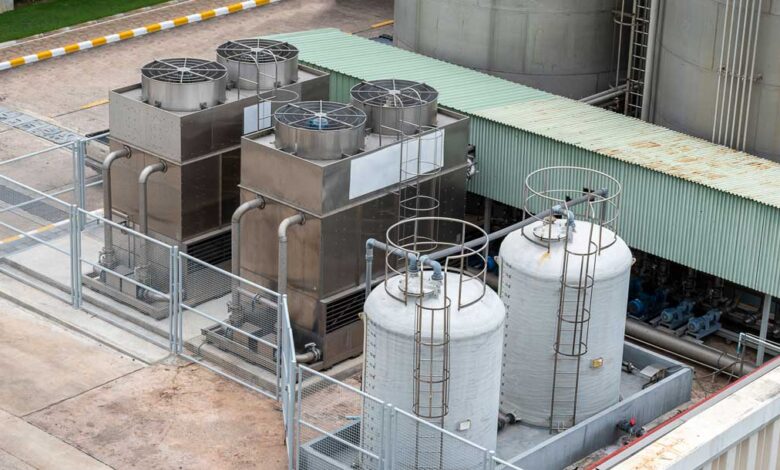
Energy Efficiency of Condensers
condenser Why? Condenser is a device used in cooling and heating systems that enables the transformation of a gaseous substance into a liquid. Its main function is to dissipate the heat generated during heating or cooling processes and to convert gas into liquid. Condensers play a critical role, especially in air conditioning systems, chillers, steam systems and industrial processes. The working principle of the condenser is based on a cooling or heating process that turns gas into liquid. The gas is cooled by a cooling medium in the condenser, usually at high temperature and pressure. As a result of this cooling process, the gas condenses and becomes liquid. This liquid is then removed from the system and the process continues. condensers There are various types of condensers, including air-cooled condensers, water-cooled condensers, and vapor compression condensers. While air-cooled condensers distribute heat using the surrounding air; Water-cooled condensers remove heat using water. Vapor compression condensers are generally used in industrial processes and enable the conversion of vapor into liquid. condensers, energy efficiency ve system performance is an important component. Correctly selected and well-maintained condensers increase the efficiency of cooling and heating systems and reduce energy consumption. Therefore, the selection and maintenance of condensers is critical to ensure long-lasting and effective operation of systems. How to Provide Energy Efficiency with Condenser? Condensers are critical components that increase energy efficiency in cooling and heating systems. Energy efficiency is important to both reduce costs and reduce environmental impact. Here are some key points about how condensers ensure energy efficiency: Condensers effectively dissipate heat during the process of converting high-temperature gases into liquid. This process is important to save energy because it minimizes energy loss during the conversion of gas to liquid. In this way, cooling and heating systems work more efficiently and consume less energy. To increase the energy efficiency of condensers cooling capacities should be determined carefully. The capacity of the condenser should be chosen to meet the cooling or heating load required by the system. Using a condenser of the correct capacity optimizes energy consumption and prevents overload, which increases energy savings. Regular maintenance and cleaningMaintains the performance and energy efficiency of condensers. Condensers can become dirty over time, which can affect heat transfer and increase energy consumption. A clean and regularly maintained condenser performs better and reduces energy consumption. High efficiency condenser models and technologies have been developed to increase energy efficiency. Modern condensers are equipped with energy-saving features and advanced heat transfer technologies. These types of condensers offer lower energy consumption and higher efficiency. condensers cooling medium also affects energy efficiency. While air-cooled condensers operate depending on the temperature of the external environment, water-cooled condensers provide a more stable cooling environment. This can affect the overall energy efficiency of the system. Choosing the right condenser type can increase energy efficiency. What to Consider When Choosing an Energy Efficient Condenser? When choosing an energy efficient condenser, it is important to pay attention to various factors to improve the performance of your system and save energy. First, the capacity of the condenser must be determined to meet the needs of your application. While insufficient capacity may cause the system to operate inefficiently and cause energy loss, excess capacity may also lead to energy waste. Therefore, it is very important to choose a condenser of the right capacity to meet your needs. The energy efficiency of condensers is generally SEER (Seasonal Energy Efficiency Ratio) or EER (Energy Efficiency Ratio) It is measured by standards such as. These efficiency ratios indicate the energy consumption and performance of the condenser. Condensers with high efficiency classes provide lower energy consumption and provide cost savings in the long term. Therefore, choosing models with high energy efficiency provides both environmental and economic benefits. Environmental conditions can affect the performance of the condenser. For example, while air-cooled condensers operate depending on the outdoor temperature, water-cooled condensers provide a more stable cooling environment. Therefore, considering the environmental conditions in which the condenser will be placed optimizes system performance. Ease of maintenance and cleaning is another important factor to consider. Regular maintenance of condensers maintains their performance and energy efficiency. Easy-to-clean and maintainable models are long-lasting and work efficiently. Therefore, it is necessary to carefully evaluate the maintenance requirements and consider the ease of cleaning. Technological Innovations That Increase the Energy Efficiency of Condensers Condensers play an important role in cooling and heating systems, and various technological innovations are used to increase energy efficiency and reduce operational costs. These innovations optimize the performance of condensers, reducing energy consumption and increasing the overall efficiency of the systems. In recent years, variable speed compressors technology has significantly increased the energy efficiency of condensers. This technology optimizes energy consumption and increases the efficiency of the system by adjusting the speed of the compressor according to the needs of the system. Variable speed compressors save energy and support more stable operation of the system. Electronic expansion valvesis another innovation that increases the performance of condensers. These valves allow the correct amount of refrigerant to be controlled and optimize heat transfer. This reduces energy consumption and helps the system operate more efficiently. Highly efficient heat exchange surfaces It is also an important technological innovation. Advanced heat exchange surfaces carry out heat transfer more effectively and thus increase the energy efficiency of the condenser. These surfaces enable smaller and lighter condenser designs, simplifying installation and maintenance processes. Intelligent control systemsis another innovation used to increase the energy efficiency of condensers. These systems analyze real-time data, optimizing the operating conditions of the system and minimizing energy consumption. Intelligent control systems coordinate various components of the system to improve performance and maximize energy savings. High performance fans ve low noise engines It is also among the technologies that increase the energy efficiency of condensers. These fans optimize airflow, improving heat transfer and reducing energy consumption. Low-noise motors provide quieter operation and increase energy efficiency. Ways to Optimize Energy Consumption of Condensers Condensers play an important role in cooling and heating systems, and optimizing energy consumption is critical to both reducing costs and reducing environmental impact. Here are ways to optimize the energy consumption of condensers: The first step in reducing energy consumption is Choosing the right capacity condenser. The capacity of the condenser must suit the needs of the system. Insufficient capacity may cause the system to overwork and waste energy, while excess capacity may cause unnecessary energy consumption. Therefore, choosing a condenser that suits the needs of your application increases energy efficiency. Regular maintenance and cleaning It is also an important way to optimize energy consumption. Regular cleaning and maintenance of condensers ensures efficient heat transfer. Dirty and neglected condensers can increase energy consumption because dirt and dust reduce the efficiency of heat transfer surfaces. Therefore, periodic maintenance and cleaning saves energy. To increase the performance of condensers high efficiency fans ve engines It is also useful to use . Modern fans and motors provide lower energy consumption and better performance. This optimizes airflow and improves heat transfer, thus reducing energy consumption. Electronic expansion valves ve variable speed compressors Technological innovations such as can be effective in optimizing energy consumption. Electronic expansion valves allow the correct amount of refrigerant to be controlled and optimize heat transfer. Variable speed compressors reduce energy consumption by adjusting the speed of the compressor according to the needs of the system. condensers selection in accordance with environmental conditions can also increase energy efficiency. Air-cooled and water-cooled condensers offer different performance characteristics for different environmental conditions. Choosing a condenser suitable for environmental conditions allows the system to operate more efficiently and optimizes energy consumption. Advantages and Usage Areas of High Energy Efficient Condensers Highly energy efficient condensers have an important place in modern cooling and heating systems and offer various advantages. Such condensers reduce costs and minimize environmental impacts by reducing energy consumption. Here are the advantages and usage areas of highly energy efficient condensers: The most obvious advantage of energy efficient condensers is is low energy consumption. High efficiency condensers provide the same amount of heat transfer while consuming less energy. This provides significant savings in energy costs and reduces operating expenses. Energy efficient devices result in lower energy bills in the long run and provide economic benefits to businesses. These types of condensers reducing environmental impacts It also plays an important role in the Reducing energy consumption reduces carbon emissions and other greenhouse gas emissions. Thanks to their environmentally friendly features, energy efficient condensers help achieve sustainability goals and minimize negative impacts on the environment. Energy efficient condensers, better performance and longer life presents. High efficiency ensures less load and less wear on the system, which means fewer malfunctions and a longer lifespan. Long-lasting equipment reduces maintenance and replacement costs, providing businesses with less downtime and higher efficiency. These condensers are also Advanced technology and intelligent control systems Contains. Intelligent control systems optimize system performance and increase energy savings by analyzing real-time data. These technological innovations manage the operating conditions of the system in the most efficient way and use energy in the best way. Energy efficient condensers, various in areas of use can work effectively. They are widely used in commercial buildings, industrial facilities, data centers and cold storages. In such applications, high energy efficiency ensures that operational costs are kept under control and the systems operate sustainably. Tips and Maintenance Recommendations to Improve the Performance of Condensers Condensers play an important role in cooling and heating systems, and regular maintenance and certain strategies should be implemented to improve the performance of these devices and maximize energy efficiency. Here are tips and maintenance to improve the performance of condensers suggestions: Firstly, regular cleaning and maintenance are critical to improving the performance of condensers. The condenser's heat exchange surfaces and fan blades may be affected by dust and dirt accumulation. These accumulations can reduce the efficiency of the system by hindering heat transfer. Therefore, periodic cleaning and maintenance of the condenser ensures that performance is maintained. Another important maintenance recommendation is control of refrigerant levels. Insufficient refrigerant levels can prevent the condenser from operating efficiently and increase energy consumption. Regularly checking refrigerant levels and maintaining them at required levels contributes to improved performance. Optimizing airflow is another important factor that increases performance. Keeping the area around the condenser open and free of obstacles allows air flow freely. Obstacles or blocked airways negatively affect heat transfer and reduce efficiency. Therefore, it is necessary to keep the area around the condenser clean and clear. condenser regular checking of compressor and fan motors is also important in increasing performance. Compressor and fan motors are critical components to ensure efficient operation of the system. Faulty or worn motors can cause performance problems and increase energy consumption. Therefore, it is important to regularly check the engines and perform the necessary maintenance. Ensuring thermostat and control systems are working properly is another factor that affects performance. Improperly adjusted thermostats or faulty control systems can cause undesirable operation of the condenser. This can lead to wasted energy and loss of efficiency. Regularly checking thermostat settings and control systems helps optimize performance. Energy Efficiency and Condenser Capacity: The Importance of Making the Right Choice Condensers are critical components that ensure efficient operation of cooling and heating systems. However, choosing the right condenser capacity is vital to maximize energy efficiency and achieve long-term cost savings. Here are some key points that explain why the right choice of energy efficiency and condenser capacity is so important: Choosing the right condenser capacitydirectly affects system performance. The capacity of the condenser must suit the heat transfer needs of the system. Insufficient capacity may cause the system to overwork and thus waste energy. This results in higher energy consumption and increased operating costs. On the other hand, excessive capacity can lead to unnecessary energy consumption and inefficient operation of equipment. Therefore, choosing a condenser with a capacity suitable for system needs increases energy efficiency and reduces operational costs. Energy efficient condensersProvides cost advantage to businesses. Energy efficient devices deliver the same performance while consuming less energy, significantly reducing energy bills. Additionally, energy efficient condensers provide a more sustainable operation by reducing environmental impacts. Low energy consumption also reduces carbon emissions and provides an environmentally friendly solution. Correct determination of condenser capacity, extends the life of the system. A condenser of appropriate capacity ensures balanced operation of the system and prevents overload. This leads to less wear on the equipment and a reduced risk of malfunction. Long-lasting and trouble-free equipment reduces maintenance and replacement costs. Energy efficiency and correct condenser capacity selection, It is also important in the system design and installation stages. In system design, correct calculation of the capacity of the condenser affects the overall efficiency of the system. Additionally, choosing a condenser of the right capacity ensures compatible operation with all components of the system and contributes to optimizing performance. Environmental Factors Affecting the Energy Efficiency of Condensers The energy efficiency of condensers is greatly affected by environmental factors. Environmental temperature directly affects the performance of the condenser. High outdoor temperatures can reduce the efficiency of the condenser because the device consumes more energy and has difficulty dissipating heat. Additionally, humidity in the environment can also affect performance; High humidity can negatively affect heat transfer and increase energy consumption. Cleaning the area where the condensers are located and ensuring good air flow is also critical. Dirty or blocked airways make heat transfer difficult, reducing energy efficiency. Regular monitoring and management of these environmental factors increases the energy efficiency of condensers and optimizes system performance. Tools That Can Be Used to Monitor the Energy Efficiency of Condensers Various tools and technologies are available to monitor the energy efficiency of condensers. Firstly, energy monitoring systems Using it, energy consumption and performance data can be monitored in real time. These systems detect inefficiencies by analyzing energy usage. Moreover, thermal cameras Using it, the temperature distribution of the condenser can be monitored and overheating or cooling zones can be detected. data loggers stores long-term performance data and is used to analyze performance trends. Automatic control systemsDynamically adjusts system settings to optimize performance. These tools are critical for increasing energy efficiency and improving system performance. Ways Energy-Efficient Condensers Provide Long-Term Cost Savings Energy efficient condensers provide significant cost savings in the long run. First, these devices consume less energy, which leads to lower energy bills. In the long term, energy-saving condensers reduce the impact of high energy costs and contribute to the operating budget. Additionally, energy efficient condensers offer lower maintenance and repair needs and less risk of failure. This reduces maintenance costs and overall operating expenses of the system. Additionally, energy-efficient technologies generally last longer, reducing the need for premature equipment replacement. These cost advantages reduce the total cost of ownership of energy efficient condensers and provide long-term financial gains to businesses. Energy Efficiency Standards and Certificates for Condensers Various energy efficiency standards and certifications are available for condensers. For example, SEER (Seasonal Energy Efficiency Ratio) ve EER (Energy Efficiency Ratio)are standards that measure the seasonal and instantaneous energy efficiency of condensers. These rates evaluate the energy consumption and performance of the device. AHRI (Air-Conditioning, Heating, and Refrigeration Institute) certification verifies that devices meet certain energy efficiency standards. Moreover, ENERGY STAR certification identifies products that are highly energy efficient and that such products contribute to environmental sustainability goals. These standards and certifications provide consumers with assurance about the quality and performance of energy efficient products and encourage them to save energy. Energy Efficiency of New Generation Condensers: Comparison with Conventional Products New generation condensers offer significant advantages over traditional products in terms of energy efficiency. Modern condensers are equipped with more advanced technology and intelligent control systems, resulting in higher energy efficiency. New generation models increase performance by offering better heat transfer and lower energy consumption. Additionally, these devices generally offer lower environmental impacts and better performance indicators. Compared to traditional condensers, new generation products consume less energy, require less maintenance and provide long-term cost savings. These advanced features make modern condensers a more sustainable and economical option, maximizing energy efficiency.
Read More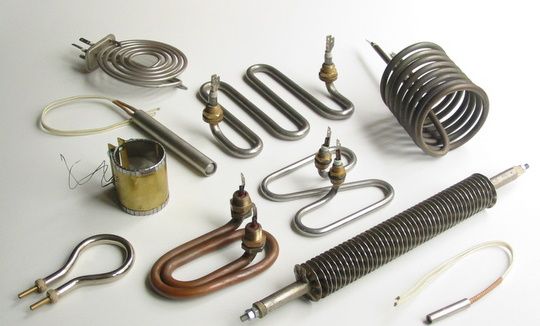
Resistance Types and Usage Areas
What is Resistance? Resistor is a circuit element that converts electrical energy into heat energy. Basically, it resists the passage of electric current, allowing energy to be released and this energy to be converted into heat. It is usually produced from metals and coated with high temperature resistant materials. Resistors come in different sizes and shapes and are widely used in industrial, commercial and domestic applications. Examples of usage areas include water heaters, ovens, refrigerators, industrial heaters and cooling systems. Industry leading companies such as Günay Soğutma offer quality resistance solutions that provide efficiency in cooling and heating systems. In Which Areas Is Resistance Used? Resistors play a critical role in many sectors by converting electrical energy into heat energy. It is used in a wide range of both industrial and domestic uses. It is the main component that provides heating, especially in electrical household appliances, such as water heaters, ovens, washing machines, dishwashers and irons. These devices make our daily lives easier by providing fast and efficient heating. In the industrial field, the usage area of resistors is much wider. Resistors are an important component in processes requiring high temperatures in sectors such as plastic and rubber production, food processing, chemical heating, metal processing and glass production. For example, resistors used in chemical and petrochemical plants are effective in heating chemicals, producing steam or maintaining process temperatures. In addition, in cooling systems, especially refrigerators and air conditioners, resistors are used for defrosting to melt frozen surfaces. This ensures efficient operation of devices. Günay Sogutma helps increase energy efficiency in different sectors by offering quality resistance solutions for industrial and domestic needs. What Should Be Considered When Choosing Resistance? Resistor selection is a critical step to ensure high performance and reliability in industrial and commercial applications. Choosing the right resistor is of great importance in terms of energy efficiency, cost savings and system life. Here are the basic points to consider when choosing a resistor: First, it is important to identify application needs. Factors such as the area where the resistance will be used, the required temperature range and heating rate are decisive in the selection. For example, different applications such as hot water heating, steam production or air heating may require different resistor types and features. Temperature range is also an important criterion. The maximum and minimum temperature ranges that the resistor can withstand must comply with the requirements of the application. Choosing a resistor that is resistant to temperature changes of the application increases system performance and reliability. Energy efficiency is a critical factor for reducing costs and environmental impact. Energy efficient resistors minimize energy losses and provide lower energy consumption. This reduces energy costs in the long run and provides an environmentally friendly option. The material and structure of the resistor should also be taken into consideration. Materials such as stainless steel, ceramic or aluminum affect durability and lifespan. In addition, the structural features of the resistor facilitate the installation and maintenance processes. Compliance with safety standards ensures safe use of resistors. Choosing products that comply with international standards such as CE and UL increases safety during use and minimizes potential risks. What are the Resistance Types Used in Industrial Applications? Resistors used in industrial applications are produced in various types to meet specific needs and each has different functions. Pipe resistors are generally used in water heating systems, heating boilers and steam engines. Their ability to withstand high temperatures and provide energy efficiency makes them popular in industrial heating solutions. Ceramic resistors are especially preferred in plastic processing machines and ovens. These resistors, which are resistant to high temperatures, provide rapid heating and high temperature stability, saving energy and providing long-lasting performance. Cable resistors are used in various applications thanks to their flexible structure. It offers an effective heating solution especially in cooling systems, water pipes and surface heating systems. These resistors attract attention with their ease of installation and low energy consumption. Finned resistors are used in air heating systems and provide fast, homogeneous heating. These types of resistors are preferred in industrial air heaters and similar devices, offering high efficiency and long life. Electrical Resistors: What are their Features and Advantages? Electrical resistors are an important technological component that converts electric current into heat. These types of resistors are widely used in a variety of applications and offer many advantages. The most distinctive feature of electrical resistors is energy conversion with high efficiency. Electrical energy is converted directly into heat and thus heating processes are carried out quickly and effectively. This feature increases its use in many areas such as home appliances and industrial heating systems. Electrical resistors are commonly found in appliances such as water heaters, ovens, irons and air conditioners. Another important feature is its low maintenance requirement. Electrical resistors are generally manufactured from durable materials and offer long-lasting performance. This reduces maintenance costs and increases the reliability of the devices. One of the advantages of electrical resistances is their rapid heating and cooling abilities. This both saves energy and increases application efficiency. Additionally, electrical resistors offer high precision in terms of temperature control. This is a critical advantage, especially for processes and devices with sensitive thermal requirements. Electric resistances provide ease of use and space saving. They can be produced in a variety of shapes and sizes without requiring extensive installation, making them suitable for different areas of application. Ceramic Resistors: High Temperature Resistant Solutions Ceramic resistors are durable and efficient heating elements, especially preferred in industrial applications requiring high heat. These resistors take advantage of the natural insulating properties of the ceramic material, providing safe and stable performance even at high temperatures. Ceramic resistors generally increase energy efficiency by distributing heat evenly and in a controlled manner. One of the most obvious advantages of ceramic resistors is their ability to withstand high temperatures. Their ability to operate at 1000°C and above makes them ideal for heat-intensive processes such as plastic and rubber processing, glass production, metalworking and furnace applications. In such applications, operations are carried out quickly, safely and efficiently thanks to ceramic resistors. Additionally, ceramic resistors are long-lasting and maintenance-free. Even though it operates at high temperatures, it offers trouble-free performance for a long time thanks to the durability of the ceramic material. This reduces costs by preventing stoppages and malfunctions in industrial production processes. In addition, ceramic resistors reduce operating costs by providing energy efficiency. The ability to quickly radiate heat saves energy and helps reach the desired temperature level in a short time. Usage Areas of Cylindrical (Pipe) Resistors Cylindrical (tube) resistors are effective heating elements used in a wide variety of applications. These types of resistors have a cylindrical structure and are known for their ability to withstand high temperatures. They are widely preferred in industrial and commercial areas. Cylindrical resistors are frequently used in premium water heaters and central heating systems. These resistances heat the water quickly and effectively, ensuring that the systems operate at high performance. Their high efficiency and durability make them ideal for long-term use. Cylindrical resistors are of great importance in industrial applications, especially in sectors such as metal processing, plastic injection and glass production. These resistors provide reliable and continuous heating in processes requiring high temperatures, thus increasing the efficiency of production processes. Cylindrical resistances are also used in ovens and stoves. In these applications, it helps cook foods or other ingredients properly by providing equal and homogeneous heat distribution. These types of resistances play an important role, especially in cooking and heating processes. Cylindrical resistances also have an important place in steam production systems. In steam boilers and generators, they serve as an effective heat source to convert water into steam, ensuring continuous and reliable steam production in industrial applications. In laboratories, cylindrical resistors are preferred during sensitive operations such as chemical reactions and material tests. Their high temperature performance and reliability make them an ideal solution for such applications. How to Provide Efficient Heating with Oven Resistances? Furnace resistors play a critical role in providing highly efficient heating in industrial and commercial furnaces. These resistors make it possible to distribute heat evenly and control certain temperatures with precision. There are several important factors to increase the efficiency of oven resistances and ensure optimum performance. First, the quality of the resistance material is of great importance. Resistors made of high quality materials are longer lasting and durable. This allows the resistors to operate more efficiently at high temperatures and reduces maintenance requirements. Heat dissipation is a critical factor in the efficiency of furnace resistors. A well-designed resistance system ensures that heat is distributed evenly to every corner of the oven. This ensures uniform cooking or heating of food or ingredients, thus reducing energy loss and increasing the efficiency of the process. Heat control systems optimize the performance of oven resistances. Precise temperature settings and regular control mechanisms ensure that desired temperature levels are accurately maintained. This both increases energy efficiency and improves product quality. Insulation is also important to save energy. Good insulation of the inner surface of the oven prevents heat from escaping to the outside and thus reduces energy loss. This allows the resistors to consume less energy and operate more efficiently. Finally, regular maintenance and cleaning ensures sustainable oven resistance efficiency. Dirty or worn resistors prevent heat dissipation effectively and increase energy consumption. Regular maintenance extends the life of the resistors and maintains their efficient performance. Use of Cable Resistors in Cooling Systems Cable resistors have a wide range of uses as an effective heating solution in cooling systems. Thanks to their flexible structure and high heating capacity, they provide reliable performance in various cooling applications. Cable resistors often support the efficient operation of pipelines, water systems and cooling equipment. One of the most important areas of use of cable resistances in cooling systems is defrosting and anti-icing processes. Glacier formation may occur frequently, especially in cooling systems, depending on external environmental conditions. By wrapping the cable on resistors, pipelines or cooling surfaces, it prevents the formation of ice and ensures trouble-free operation of the systems. This both increases efficiency and reduces maintenance costs. Cable resistors are also used to provide temperature control. In cooling systems, certain temperature levels may need to be maintained. Cable resistors precisely control the desired temperature ranges, ensuring that the systems operate with optimum performance. This is a significant advantage in terms of energy saving and efficiency. Cable resistors are also used to prevent structures such as water pipes and tanks from freezing. Especially in cold climates, freezing of water can cause serious problems in systems. Cable resistors are wrapped around pipelines to keep the water at a certain temperature and reduce the risk of freezing. Cable resistors are an effective solution to increase the performance of cooling equipment and ensure energy efficiency. These resistors optimize the operation of cooling systems, reducing energy consumption and extending system life. Use of Resistance in Hot Water and Steam Systems The use of resistance in hot water and steam systems plays a critical role in ensuring high efficiency and reliable performance. These resistors support the retention and continuous flow of water and steam at desired temperatures, especially in industrial and commercial applications. In hot water systems, resistors are often used in water heaters and central heating systems. In these systems, resistors heat water quickly and effectively by converting electrical energy into heat. Providing hot water constantly and in sufficient quantities is important for both comfort and functionality. By ensuring that the water remains at the desired temperature, the resistors both save energy and increase the reliability of the system. In steam systems, resistors play a key role in steam production. In steam boilers and generators, high heat is required to convert water into steam. Resistors serve as an effective heat source in this process and ensure that steam is produced continuously and efficiently. This is especially critical in industrial processes, power plants and large-scale steam systems. Factors such as energy efficiency and temperature control optimize the performance of resistors. Modern resistors are equipped with precise temperature settings and regular control mechanisms, which both reduce energy consumption and ensure that desired temperature levels are accurately maintained. This allows systems to operate more efficiently and have a longer lifespan. Maintenance and cleaning also play an important role. Regular maintenance increases the performance of the resistors and prevents malfunctions. Dirty or worn resistors can prevent heat dissipation effectively and increase energy consumption. What is PTC (Positive Temperature Coefficient) Resistor? What are the advantages? PTC (Positive Temperature Coefficient) resistors are a special type of resistors whose resistance increases as the temperature increases. These types of resistors have safety and performance features that can operate within a certain temperature range. It is a heating solution that offers various advantages in terms of The working principle of PTC resistors is based on the material's ability to increase resistance with temperature. This feature makes them attractive in a variety of applications. One of the biggest advantages of PTC resistors is that they provide automatic temperature control and safety. As the temperature increases, the resistance of the resistor increases, which allows the current to decrease and therefore the temperature to be controlled automatically. This prevents overheating and potential fire risks, thus increasing safety. Energy efficiency is also an important advantage of PTC resistors. As the temperature increases, energy consumption naturally decreases because the resistance of the resistor increases, causing the current to decrease. This saves energy and reduces electricity costs. PTC resistors are also long-lasting and low-maintenance products. Due to their material properties, PTC resistors generally show less wear and tear. This requires less frequent maintenance and replacement, thus reducing long-term costs. Fast heating and constant temperature performance are among the other advantages of PTC resistors. These resistors can heat up quickly and reach the desired temperature and keep this temperature balanced. This feature is especially useful in applications that require precise temperature control. Specially Designed Resistors Used in Industrial Machines Specially designed resistors used in industrial machines are heating solutions customized to various industrial needs in order to provide high performance and reliability. These resistors are designed to meet specific application requirements while supporting the efficient operation of machines. The main areas and advantages where specially designed resistors are used are: Specially designed resistors play a critical role in processes requiring high temperatures in industrial machines. Particularly in industries such as metal processing, plastic production and glass production, these resistors allow high temperatures to be precisely controlled. This improves the process quality and ensures the durability of the products. Adaptable designs are made to suit specific application needs. Since industrial machines are generally of different sizes and shapes, resistors are designed in accordance with the internal structures of these machines. This harmony ensures equal distribution of heat and effective performance. Energy efficiency is also an important advantage of specially designed resistors. Efficient heating in industrial machines reduces energy consumption and reduces costs. Specially designed resistors provide maximum performance with minimum energy loss, which provides energy savings in the long term. Durability and longevity are critical in industrial applications. Specially designed resistors are produced to withstand high temperatures and aggressive chemical environments. These features enable machines to run smoothly for longer and reduce maintenance costs. Fast heating and precise temperature control are also among the advantages provided by specially designed resistors. In industrial processes, fast and accurate temperature control increases the efficiency of production processes and ensures quality. High Performance Resistance Options from Günay Sogutma GUnay Cooling increases the efficiency and ensures the reliability of your heating systems by offering high-performance resistance solutions for industrial and commercial applications. Our company offers specially designed resistors and standard solutions for the needs of various sectors, allowing you to find suitable options for all types of applications. The resistance options offered by Günay Sogutma stand out with high heating efficiency and reliable performance. Our products are designed to meet a wide range of high temperature requirements, from industrial processes to commercial applications. Resistors produced with different materials, from stainless steel to ceramic materials, guarantee durability and long-lasting performance. Energy efficiency is one of the most important features of our products. As Günay Cooling, our energy-saving resistance solutions provide low energy consumption and high performance. This lowers your costs and reduces environmental impact. Our resistors are designed to suit your application requirements and offer maximum efficiency with minimum energy loss. Security is another important priority. Our products are manufactured in accordance with international safety standards, minimizing risks during use. Our resistors with CE and other certifications provide reliable performance. Specially designed resistors offered by Günay Soğutma can be adapted to specific application needs. Whether you use it in hot water heating systems or steam production, we offer a solution that suits your needs. With features such as rapid heating, precise temperature control and durability, it provides high efficiency in various industrial processes. By prioritizing customer satisfaction, we offer a wide range of products to meet all your resistance needs. With Günay Soğutma's high-performance resistance solutions, you can obtain reliable and efficient heating solutions in your industrial and commercial applications.
Read More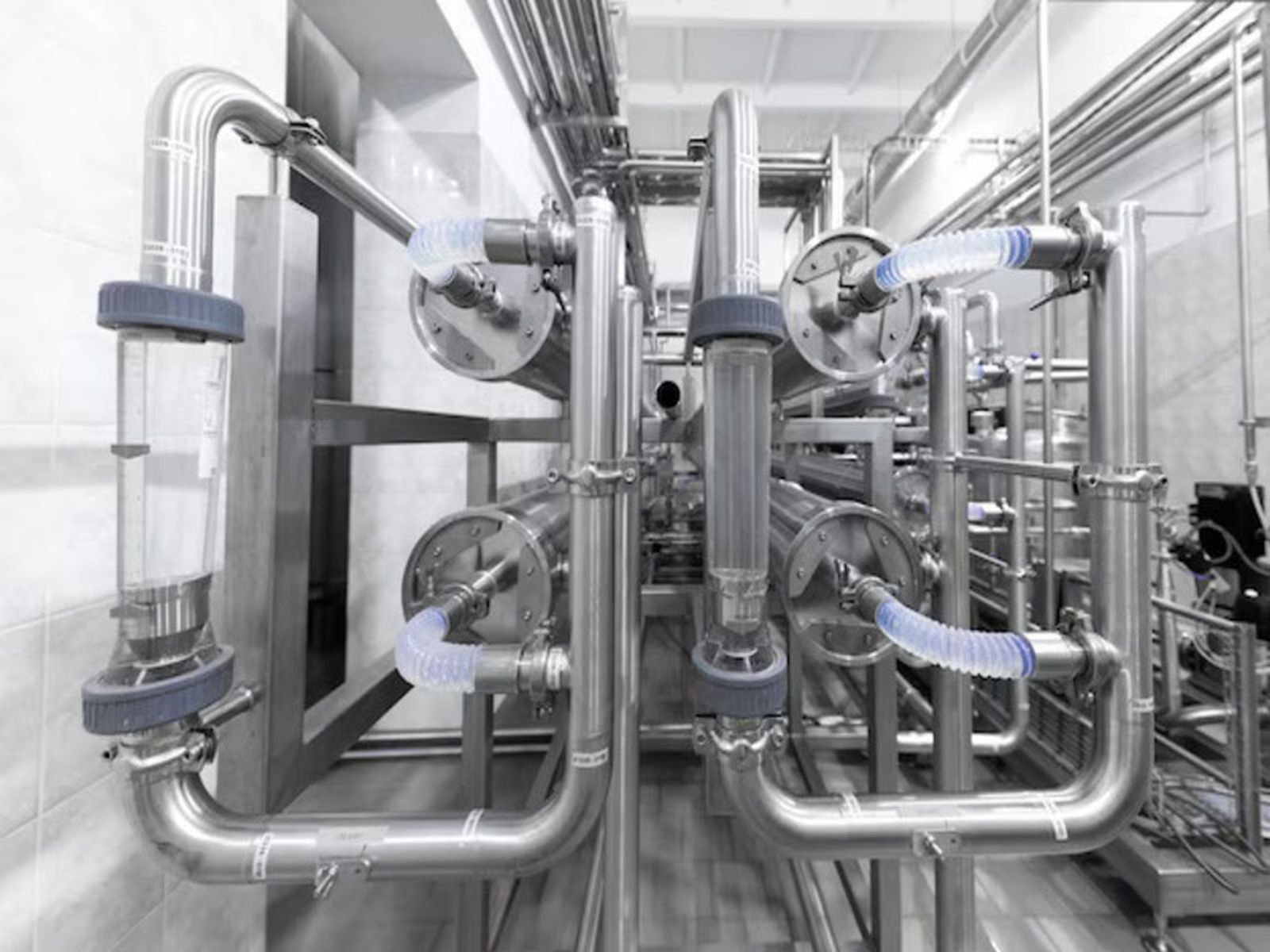
High Efficiency Condensers
What is a High Efficiency Condenser? High efficiency condenser is a device used in cooling and air conditioning systems and aims to increase energy efficiency. Its basic function is to efficiently remove the heat energy of the refrigerants used in cooling systems from the environment and thus optimize the performance of the system. High efficiency condensers, especially high performance cooling systems, industrial applications ve commercial buildings It is used in various areas such as. These condensers, high capacity cooling, low energy consumption ve longevity It offers advantages such as: Thanks to their innovative designs, they consume less energy in the cooling process and reduce environmental impacts. Additionally, these devices are often high efficiency heat exchanger technologies ve modern refrigerants It increases the overall energy efficiency of the system. The use of high-efficiency condensers both reduces operating costs and ensures sustainable energy use, making them an ideal option for modern cooling solutions. What is the Basic Working Principle of High Efficiency Condensers? The basic working principle of high efficiency condensers is to effectively remove the heat energy of the refrigerant used in cooling systems from the environment. These condensers, Designs that optimize heat transfer ve advanced heat exchanger technologies It works using . The refrigerant comes from the evaporator within the system and enters the condensing unit. Here, the fluid is highly efficient fan systems ve large heat surfaces It gives heat to the ambient air. During this process, the temperature of the refrigerant drops and it becomes liquid. These high efficiency condensers, low energy consumption It increases the overall efficiency of the system by providing energy costs reduces. Moreover, modular designs ve high capacity fluid circulations Thanks to high efficiency condensers, high temperature changes manages efficiently. These principles maximize the efficiency of modern refrigeration and air conditioning systems by increasing the performance and durability of condensers. What are the Main Advantages of High Efficiency Condensers? The key benefits of high-efficiency condensers significantly increase energy efficiency and operational performance. First, these condensers low energy consumption provides savings on energy bills by reducing operating costs. High performance heat transfer Thanks to this, the overall efficiency of cooling systems increases, providing more cooling with less energy. Additionally, high efficiency condensers Technologies that reduce environmental impact It minimizes carbon emissions and ensures sustainable energy use. Long-lasting designs and use of advanced materials This reduces maintenance requirements and increases the overall durability of the system. These advantages clearly demonstrate the reasons why high-efficiency condensers are preferred in modern cooling systems, thus reducing costs and providing environmentally friendly solutions. How Do Energy-Saving High-Efficiency Condensers Work? Energy-saving, high-efficiency condensers are specially designed cooling systems to increase energy efficiency. These condensers, advanced heat exchanger technologies ve optimized fan systems It works using . The refrigerant comes out of the evaporator and comes to the condenser unit, where it becomes liquid by giving off heat to the ambient air. In this process, high efficiency condensers high capacity heat transfer surfaces ve low energy consuming motors It effectively removes heat using Moreover, digital control systems ve smart sensor technologies Thanks to this, condensers monitor and optimize performance in real time, thus minimizing energy use. These technologies enable cooling systems to consume less energy and operate with higher efficiency, which reduces energy costs and environmental impacts. Energy-saving, highly efficient condensers are one of the key components of modern cooling systems and provide sustainable solutions for businesses. What Should Be Considered in the Maintenance of High Efficiency Condensers? Things to consider in the maintenance of high efficiency condensers are critical to maximize the performance and life of the system. Firstly, regular cleaning should be done; Fan blades and heat exchanger surfaces must be cleaned of dust and dirt, thus maintaining heat transfer efficiency. Moreover, refrigerant levels ve pressure values It should be checked periodically and possible leaks or leaks should be detected quickly. electrical connections ve control systems It should be reviewed regularly to identify any signs of wear or malfunction. condensers fin and tube networks Checking it for any physical damage or deformation helps detect problems that affect the efficiency of the system in advance. Moreover, annual professional maintenance services should be obtained and regular reports should be received from experts on the performance, energy efficiency and safety of the system. These maintenance practices ensure that high-efficiency condensers last long and perform at their best, so energy costs and environmental impacts are kept to a minimum. How to Control the Temperature of High Efficiency Condensers? Temperature control of high efficiency condensers plays a critical role to ensure the efficiency and safety of the system. Firstly, digital temperature sensors ve smart control panels The temperature levels of the condensers are constantly monitored using These sensors provide real-time data and detect temperature fluctuations immediately. temperature control systems, variable frequency drives (VFD) ve automatic regulation valves It optimizes the performance of the condenser and regulates the flow of cooling fluid. Moreover, refrigerant pressure ve heat exchanger surface temperatures Parameters such as are checked and adjusted regularly. Long-term data analysis ve maintenance reportsallows taking proactive measures regarding temperature control of the system. These control mechanisms ensure that high-efficiency condensers perform optimally under all conditions and maximize energy efficiency, reducing operating costs and extending system life. Where are High Efficiency Condensers Used? High efficiency condensers offer a wide range of uses in a variety of industrial and commercial applications. In cooling systemsThey are preferred especially in large-scale buildings, shopping malls and industrial facilities to increase energy efficiency and reduce operating costs. Cooling and air conditioning systems These condensers, which are of critical importance for chilled water systems ve buzhaneler It is also used in specific applications such as Food and beverage industry, chemical production ve data centers These devices are used to meet high-performance cooling requirements in areas such as Moreover, power plants ve oil refineries In heavy industrial processes such as, high efficiency condensers effectively manage high temperatures and save energy. These areas of use highlight the energy efficiency and reliability of high-efficiency condensers, increasing the performance and sustainability of businesses. What Should Be Done to Improve the Performance of High Efficiency Condensers? A number of strategies can be applied to improve the performance of high efficiency condensers. Firstly, regular maintenance ve cleaning operations must be carried out; Dust and dirt deposits can reduce heat transfer efficiency. Fan and heat exchanger surfaces Keeping it clean ensures that airflow remains at optimum levels. Moreover, refrigerant levels ve pressure values Checking it regularly prevents leaks and performance drops. temperature control systems ve thermostats Make sure it is set correctly; This increases the efficiency of the condenser and saves energy. Energy efficient motors ve variable frequency drives Using it optimizes system performance and reduces energy consumption. Moreover, temperature sensors ve control panels Being compatible with current technology ensures that performance is constantly monitored and necessary adjustments are made in a timely manner. These applications ensure that high-efficiency condensers have a long life and perform at their best, thus reducing operating costs and increasing energy efficiency. How to Clean High Efficiency Condensers? Cleaning of high efficiency condensers is critical for efficient operation and long life of the device. cleaning process, First, turn off the power supply It starts with, thus ensuring safe cleaning. As a first step, exterior surfaces ve fan bladesis cleaned with air pressure or removed from dust and dirt with a soft brush. heat exchanger surfaces dirt and residue on it, special cleaning solutions or chemical cleaners is resolved using . During cleaning, big particles cleaning and your fins It is necessary to ensure that it is in proper condition. Moreover, air flow around the condenser It is important to keep the surrounding area clean and open to avoid obstruction. fan motors ve temperature sensors Other components such as are also inspected and cleaned or serviced if necessary. Finally, after cleaning testing system performance ve temperature sensors Checking whether it is working correctly increases the effectiveness of the system and ensures energy efficiency. Regular and correct cleaning practices maintain the optimum performance of high-efficiency condensers and increase energy savings. Which High Efficiency Condenser Type Suits Your Needs? To determine which type of high efficiency condenser suits your needs, you need to consider several important factors. Firstly, cooling capacity ve operating conditions evaluate; For large scale industrial applications usually which kondenserler or direct air cooled condensers preferred for smaller applications liquid cooled condensers may be suitable. energy efficiency When it comes to the fore, efficient fan motors ve advanced heat exchanger technologies Condensers containing this should be preferred. environmental conditions also plays an important role; For extremely hot or dusty environments to protective coatings Models that have it may be more suitable. Moreover, noise level ve ease of maintenance Factors such as should also be taken into account in the selection process. save energy ve improve performance for inverter technology ve temperature control systems Condensers containing are ideal choices. By evaluating these factors when choosing the most suitable high-efficiency condenser type for your needs, you can optimize the performance of your business and reduce your energy costs. How to Achieve Energy Efficiency with High Efficiency Condensers? High efficiency condensers offer several critical features and technologies to increase energy efficiency. Firstly, inverter technology Its use optimizes energy consumption by adjusting the motor speed of the condensers according to demand. Moreover, advanced heat exchanger designsprovides more effective heat transfer, thus reducing energy loss and increasing overall efficiency. Low noise and high performance providing high efficiency fan motorsMaximizes performance by keeping energy consumption to a minimum. Automatic temperature control systems manages the operating conditions of the condenser in the most efficient way, thus optimizing energy consumption. Moreover, energy-saving coating and insulating materialsSupports energy efficiency by reducing heat loss. Organised maintenance and cleaning This process ensures that the condensers operate at high performance and minimizes energy consumption. Finally, intelligent control systems ve remote viewing Its features save energy by constantly monitoring performance. When these features and technologies come together, high-efficiency condensers significantly increase energy efficiency, lowering operating costs and reducing environmental impacts. What are the Basic Requirements for Installing High Efficiency Condensers? There are several basic requirements to consider when installing high efficiency condensers. Firstly, installation area suitability is important; For condensers to operate efficiently sufficient air flow must be provided. Therefore, around condensers open spaces should be left and structures that may obstruct Care should be taken to ensure that there is no Secondly, electrical connections must be done correctly and must be safely isolated, because high efficiency condensers generally require high power. Make sure the mounting location is flat and solid This ensures stable operation and long life of the device. Moreover, cooling system design Accordingly, the condenser pipe connections ve drainage systems must be installed correctly. climate conditions should also be taken into consideration; Suitable for extremely hot or humid environments protective coatings ve cooling features should be preferred. Noise levels Sound insulation measures can be taken to minimize noise. Finally, a professional assessment before installation should be done and full compliance with instructions must be provided. Meeting these basic requirements ensures that high-efficiency condensers operate with optimum performance and energy efficiency is achieved. What are the Sectoral Application Areas of High Efficiency Condensers? High efficiency condensers play an important role in various sectoral applications and offer great advantages in providing energy efficiency. Food and Beverage IndustryIn , high efficiency condensers increase the performance of cooling systems, keeping products fresh and reducing energy costs. Pharmaceutical IndustryIn , these condensers improve the quality and safety of production processes by providing precise temperature control and reliable performance. Commercial Buildings and Shopping MallsIn , condensers are used in large HVAC systems, reducing energy consumption and improving indoor comfort. Industrial FacilitiesIn , high efficiency condensers increase the efficiency of cooling systems used in production processes and provide energy savings. Moreover, data centers ve telecommunication facilitiesIn , condensers prevent servers and equipment from overheating, increasing the reliability and performance of the systems. Finally, in the chemical industry High efficiency condensers used for process cooling reduce energy costs while minimizing environmental impacts. Applications in these sectors demonstrate both the economic and environmental advantages of high-efficiency condensers.
Read More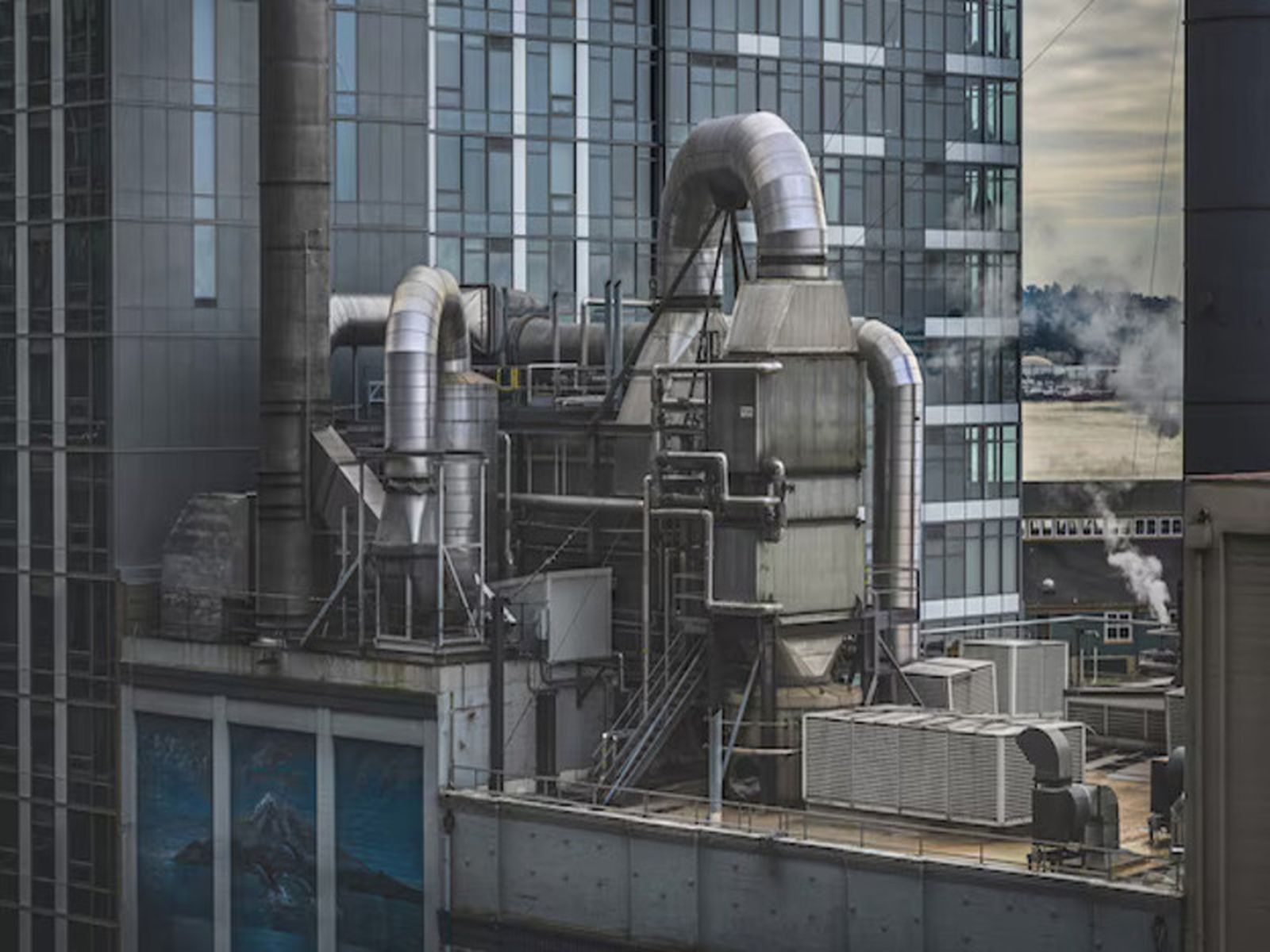
Industrial Evaporators
What Are Industrial Evaporators and How Do They Work? Industrial evaporators are important equipment used in large-scale cooling and evaporation processes. These devices provide cooling through evaporation of liquids and are used in a variety of industrial processes. The basic working principle is to vaporize the liquid by heating it through a heat exchanger. In industrial evaporators, the liquid is first heated and evaporation occurs. The resulting steam is then condenser It is condensed into liquid in the units and removed from the system. In this process, energy efficiency Variable speed fans and compressors are used to provide Additionally, modern evaporators intelligent control systems Equipped with a system that optimizes system performance by making automatic adjustments based on outdoor temperatures and indoor temperature conditions. Industrial evaporators, with their high capacity and efficient operating features, are preferred in large-scale applications that require cooling. What are the Advantages of Industrial Evaporators? Industrial evaporators are critical equipment preferred in industrial applications by providing many advantages. Firstly, high energy efficiency they present; modern evaporators, advanced heat exchanger technologies ve variable speed control systems Equipped with , which optimizes energy consumption and reduces operational costs. Additionally, industrial evaporators high capacity cooling They can be used effectively in large-scale processes. Long-lasting durability Thanks to their features, they show reliable performance even in harsh industrial conditions. Another advantage is are flexible application areas; These units can be used in chemical processing, food production, pharmaceutical industry and many other industries. Ease of maintenance and cleaning They also stand out with; Regular maintenance requirements are kept to a minimum, ensuring constant high performance of the system. Moreover, intelligent control systems Thanks to this, automatic adjustments can be made and the efficiency of the system can be increased. These advantages make industrial evaporators an attractive option in terms of both energy savings and operational efficiency. How Does the Working Principle of Industrial Evaporators Work? The working principle of industrial evaporators is designed to effectively manage the evaporation and cooling processes of liquids. These units have a device that allows the liquid to be heated and evaporated. heat exchanger uses. First, a liquid evaporator It is pumped to the unit and heated by a heat source there. heated liquid, evaporation It becomes vapor during the process. The resulting steam is transported to the outside environment or condenser It is directed to the unit, condensed and turned into liquid again. In this process, sciences ve compressors By using components such as, the process of heating and evaporating the liquid is optimized. Modern industrial evaporators, variable speed control systems Equipped with; These systems increase energy efficiency and improve performance by making automatic adjustments based on environmental conditions and process requirements. Thanks to this working principle, industrial evaporators provide high capacity and efficient cooling while keeping operational costs under control. Which Industrial Evaporator Type Suits Your Needs? Determining which type of industrial evaporator suits your needs depends on your intended use and operational requirements. Firstly, air cooled evaporatorsis generally suitable for applications seeking low-cost and maintenance-free solutions. These types of evaporators provide cooling by using the surrounding air flow and perform effectively in open air conditions. Water cooled evaporators It is preferred for higher capacity and efficient cooling needs. These units provide cooling using water and are frequently used in large-scale industrial facilities. Water-cooled evaporators generally offer better energy efficiency but require regular water cleaning and maintenance. Commercial and industrial applications Suitability varies depending on the size of the system, the amount of product to be processed and the environmental conditions. Dry type evaporators They are often ideal for sensitive processes such as food processing and the chemical industry, as these types of evaporators provide cooling without direct contact with the products. Modular evaporatorsis suitable for applications seeking flexibility and scalability. These types of evaporators allow the system to be expanded or replaced as needed, offering long-term compatibility and investment protection. Considering these factors when choosing the type of evaporator that best suits your needs will ensure optimal performance and efficiency. What are the Technologies that Increase Energy Efficiency in Industrial Evaporators? Technologies that increase energy efficiency in industrial evaporators are critical to lower operational costs and reduce environmental impact. The first of these technologies is variable speed compressorsis. These compressors optimize energy consumption and prevent overload by adjusting speed according to the real-time energy needs of the system. Moreover, intelligent control systems ve auto sensors It manages energy use in the most efficient way by instantly responding to environmental conditions and load changes. Another important technology is heat recovery systemsis. These systems enable the recovery of waste heat generated during the operation of the evaporator and convert this heat into energy that can be used in other processes. High efficiency heat exchangers It also saves energy; These devices keep energy losses to a minimum by increasing heat transfer. Dry type evaporatorscan reduce energy consumption compared to water-cooled systems because such systems increase energy efficiency by eliminating water use. Moreover, modular designs This makes it possible to scale the system according to capacity needs, further increasing energy efficiency. These technologies reduce the energy consumption of industrial evaporators and improve their operational performance. What are the Maintenance and Cleaning Tips for Industrial Evaporators? Regular maintenance and cleaning are critical to ensure that industrial evaporators operate efficiently and have a long life. Firstly, regular cleaning procedures should be implemented. Heat exchanger surfaces of the evaporator and filter should be cleaned periodically; This prevents the accumulation of dust, dirt and other contaminants and increases the efficiency of the system. Moreover, steam sewer systems ve water entry and exit points It should be checked and cleaned regularly, as clogged or dirty spots can negatively affect the performance of the system. Refrigerant levels ve leak checks should also be done regularly. Low fluid levels can reduce the efficiency of the system and cause damage in the long run. Compressor and fans The performance of moving parts such as should also be reviewed and lubricated if necessary; This prevents wear and high energy consumption. Moreover, intelligent control systems Software updates and calibrations must be made. These systems provide operators with information about the system's operating conditions and optimize energy efficiency. High quality care and cleaning products Its use is also important; Appropriate cleaning agents and protective products extend the life of the device and preserve its performance. These maintenance and cleaning tips ensure consistently high performance of industrial evaporators and offer long-term reliable use. What are the methods that increase the performance of industrial evaporators? Various methods applied to improve the performance of industrial evaporators are important to optimize the efficiency and effectiveness of the system. Firstly, regular cleaning of heat exchanger surfaces should be done. Dirt and debris can hinder heat transfer and reduce the performance of the system, so surfaces must be kept clean and functioning properly. Moreover, variable speed compressors Its use provides increased performance by optimizing the energy consumption of the system. These compressors prevent unnecessary energy consumption by adjusting their speed according to real-time needs. Regular check of refrigerants and renewing it when necessary also increases performance. Insufficient fluid levels or degraded fluids negatively affect the efficiency of the evaporator. Automatic control systems Up-to-date software and calibrations must be made so that the operating conditions of the system are correctly monitored and managed. Moreover, smart sensors ve airflow optimization applications increase energy efficiency and improve performance by instantly responding to environmental conditions. Energy recovery systems It is also important to use . These systems enable the recovery of waste heat generated during evaporator operation and convert this heat into energy that can be used in other processes. Modular designs With it, the capacity of the system can be easily adjusted according to needs, allowing performance to be optimized. These methods increase the performance of industrial evaporators, helping to improve both energy efficiency and process efficiency. How to Provide Temperature Control and Management of Industrial Evaporators? Temperature control and management of industrial evaporators is a critical process to maintain system efficiency and product quality. Firstly, advanced control systems Temperature levels are constantly monitored and adjusted. These systems, digital thermometers ve automatic control panels It collects temperature data in real time and makes the necessary adjustments. temperature sensors ve process control devicesmeasures temperatures at various points in the system and quickly detects abnormal changes. These sensors maintain temperature ranges appropriate to the operating conditions of the system and minimize temperature fluctuations. Moreover, heat exchanger systems To ensure efficient operation, regular maintenance should be carried out and contaminated or damaged components should be replaced in a timely manner. temperature control valves ve fan speed controllers Equipment such as optimizes air flow and cooling effect, thus helping to maintain desired temperature ranges. energy management systems ve smart softwareBy further refining temperature control, it minimizes energy consumption and increases system performance. Stemperature monitoring systems Regular calibration and updating is required. This increases the accuracy of measurements and the overall reliability of the system. These methods effectively ensure temperature control and management of industrial evaporators, thus contributing to the stable and efficient execution of processes. What should be considered in the installation of industrial evaporators? Things to consider when installing industrial evaporators are vital to ensure long-lasting and efficient operation of the system. Firstly, suitability of the installation area should be checked. The evaporator should be selected in an area with adequate air flow and maintenance access; This increases the efficiency of heat transfer and the overall performance of the system. Moreover, ground flatness and load carrying capacity should also be taken into consideration; ground irregularities and overload can negatively affect the efficiency of the system. Electrical and water connections must be done correctly. Make sure that electrical connections and water lines are leak-proof and safe. Moreover, flammable gases and other hazardous substances It is necessary to keep away from these connections. High quality and suitable fasteners Its use increases the reliability of the system and prevents malfunctions. Post-installation tests should be done and all functions of the system should be checked. These tests verify that the evaporator is operating correctly and that all system components are compatible. operating and maintenance manuals must be properly installed and operators must receive the necessary training; This contributes to optimal performance and long-term reliable use of the system. High efficiency filters and cooling fluids should be used and checked regularly. This increases the energy efficiency of the system and reduces operating costs. These considerations enable the installation of industrial evaporators to be carried out smoothly and effectively. What are the Energy-Saving Features of Industrial Evaporators? Industrial evaporators have a variety of energy-saving features and can significantly reduce businesses' energy costs. Firstly, variable speed compressors It is widely used in these systems. These compressors prevent unnecessary energy consumption and provide more efficient operation by adjusting their speed according to the real-time energy needs of the system. Moreover, energy recovery systems Thanks to this, the waste heat produced by evaporators during operation can be recovered and used in other processes, which provides energy savings. Low energy consumption fans ve intelligent control systems It also increases energy efficiency. Fans are designed to provide only the necessary airflow, and intelligent control systems optimize system operation, keeping energy use to a minimum. High efficiency heat exchangers It maximizes heat transfer, reduces energy losses and thus provides energy savings. Automatic temperature and pressure control systemsensures that the system is always in the most efficient operating conditions. These systems constantly monitor temperature and pressure and correct abnormal changes, thus preventing energy waste. Moreover, modular design Its features make it possible to provide the exact required capacity and optimize energy consumption. These features increase the energy efficiency of industrial evaporators, reducing both operational costs and environmental impacts. These energy-saving features play an important role in a sustainable business. What are the Types and Usage Areas of Industrial Evaporators? Industrial evaporators have a wide range of applications with various types and usage areas. Dry evaporatorsIt is used in air-cooled systems and is generally suitable for environments with low humidity. These types of evaporators provide efficient heat transfer by bringing the cooling liquid into direct contact with the air. Heat exchanger evaporators It is used in liquid-cooling systems and ensures effective transfer of heat in industrial processes. Temperature controlled evaporatorsIt is preferred in applications requiring precise temperature. These evaporators constantly monitor and adjust the system temperature, thus maintaining the quality and safety of the products. Immersion evaporatorsIt is used for the direct transfer of heat in liquid or gaseous media and is generally preferred in the chemical and food industries. These types support high-capacity cooling operations. Industrial evaporators have a wide range of uses and each serves specific needs. Food and beverage industryuses evaporators for cooling and processing liquid products. chemical industryIt refers to various types of evaporators for the control of chemical reactions and processing of products. Moreover, in the pharmaceutical industry Special evaporators are used to ensure the stability of products and solutions. In ventilation and air conditioning systems These devices control the weather conditions and provide a comfortable environment in buildings. The types and uses of industrial evaporators are optimized according to the specific requirements of each sector, allowing them to be used effectively in a variety of industrial applications.
Read More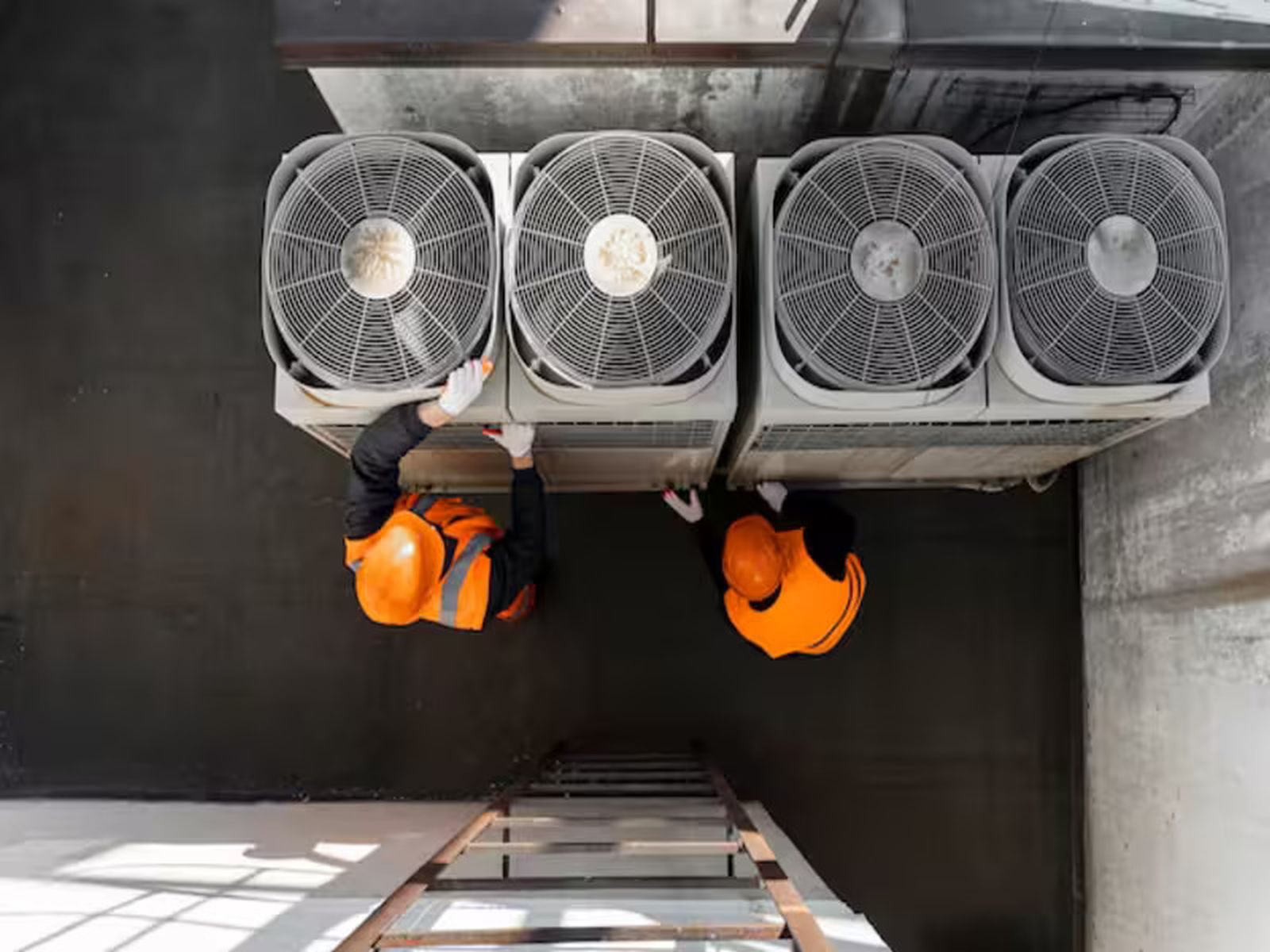
Condenser Units
What Are Condensing Units and How Do They Work? Condenser units are components that play a critical role in refrigeration and air conditioning systems. Their main function is to ensure the evaporation of the cooling fluid and to remove the heat generated as a result of this process. Condenser units are usually a heat exchanger ve fan Contains. During the process, the refrigerant exists in the form of high-pressure and hot gas when evaporated by the evaporator. This gas is directed to the condenser units where it transfers heat to ambient air. This heat transfer causes the cooling fluid to condense and become liquid. The working principle of condenser units can be explained simply: Cooling fluid, condenser coils As it circulates inside, it releases heat to the environment with the air blown by the fans. This process ensures that the system can cool efficiently. condenser units, air cooled or water cooled There are two main types. In air-cooled units, heat is released through air, while in water-cooled units, heat is released using cooling water. These units are designed to provide high performance and energy efficiency and are used in a variety of industrial and commercial applications. What are the Basic Functions of Condenser Units? The basic functions of condenser units play a critical role in ensuring the effective operation of refrigeration and air conditioning systems. First, condenser units condensation of the cooling fluid provides. The high pressure gas evaporated by the cooling system is directed to the condenser unit where it transfers heat to the environment. This heat transfer causes the gas to condense into liquid, thus making the cooling fluid usable again. Second, condenser units releases heat to ambient air or water, thus increasing the efficiency of the cooling system. In air-cooled units, heat is transferred with air blown by fans, while in water-cooled units, heat is removed using water. Third, condenser units regulates system pressure and temperature, which ensures that the system operates safely and efficiently. Moreover, Modern technologies that optimize energy efficiency By using it, energy consumption is reduced and performance is increased. Condenser units provide high performance and reliability in industrial and commercial cooling systems, extending the overall efficiency and life of the systems. Which Condenser Unit Type Suits Your Needs? The selection of condenser unit types should be based on specific needs and application requirements. Air cooled condensing unitsis the most commonly used type and is generally known for its low maintenance requirements. These units transfer heat with the outside air and are easy to install. Generally commercial buildings ve industrial facilities It is used in large areas such as On the other hand, water cooled condensing unitsprovides greater energy efficiency because it transfers heat to water, resulting in lower operating temperatures and higher performance. Water cooled units, large scale industrial facilities ve data centers It is preferred in applications such as Another option is dual phase condensing units It combines both water and air cooling methods. Such units provide flexibility in variable weather conditions and energy saving provides. M.modular condenser unitsioffers flexibility and scalability with multiple unit combinations, making them growing facilities ve application changes makes it suitable for When choosing the type of condensing unit that suits your needs, it is important to consider factors such as energy efficiency, maintenance requirements and size of the application area. How to Increase Energy Efficiency with Condenser Units? Various strategies can be implemented to increase energy efficiency with condenser units. Firstly, high efficiency condensing units should be selected. These units minimize energy consumption and optimize performance using modern technologies. Energy saving fans ve variable speed controlled motorsIt plays an important role in increasing the energy efficiency of condenser units. Moreover, regular maintenance and cleaningensures efficient operation of the units; Dirty heat exchangers and clogged filters increase energy consumption, reducing efficiency. With this, heat recovery systems Using it can increase the energy efficiency of condensing units. These systems save energy by reusing waste heat and reduce total energy consumption. Working conditions suitable for outdoor temperature Creating also increases energy efficiency; condensing units must be optimized according to the ambient temperature. Moreover, intelligent control systems ve automatic adjustment mechanisms Monitoring and adjusting the performance of units in real time increases energy efficiency. These strategies enable condensing units to operate more sustainably and economically. What are the Maintenance and Cleaning Tips for Condenser Units? Regular maintenance and cleaning are vital for long-lasting and efficient operation of condenser units. Firstly, regular cleaning of condenser coils must be provided. Dust and dirt accumulated in the coils prevent heat transfer, reducing energy efficiency. Therefore, coils should be cleaned at least once a year and professional cleaning services should be used if necessary. Moreover, fan blades and motors Cleaning ensures proper air flow and increases the performance of the system. Fans and motors must be cleaned of dust and dirt. Checking filters regularly and it is also important to clean it; Clogged filters block airflow and put extra load on the unit. water levels ve leak check If any leakage or low water level is detected in water-cooled systems, immediate action must be taken. Moreover, Protective covers suitable for outdoor conditions ve general checks several times a yearIt helps protect the units from external factors and keep the performance constantly high. By following these maintenance and cleaning tips, the efficiency of condenser units can be increased and long-lasting performance ensured. What are the Advantages of Condenser Units? Condenser units play an important role in cooling and air conditioning systems with their various advantages. Firstly, energy efficiency they provide; modern condensing units reduce costs and reduce environmental impact by using technologies that optimize energy consumption. Moreover, low maintenance They are known for; Air-cooled units generally have low maintenance and the systems operate reliably for long periods of time. high performance They provide effective cooling in large areas. Water-cooled condenser units offer high performance and efficiency, especially in large-scale industrial facilities and data centers. Moreover, flexible use offers the advantage; Different types of condensing units can be adapted to varying needs and provide effective performance in different environmental conditions. Environmentally friendly technologies By using it, they manage waste heat more efficiently and support environmental sustainability. How to Control Temperature and Performance Management of Condenser Units? Temperature control and performance management of condensing units are critical to ensuring the efficiency and reliability of the system. Firstly, temperature sensors and control panels Using this method, the temperature of the condenser unit is constantly monitored. These sensors detect temperature changes within the unit and transmit them to the control panels, ensuring that the system remains at optimum operating temperature. Variable speed fans ve compressorsmanages performance and optimizes energy consumption by quickly responding to temperature changes. During temperature control, outdoor temperature is also taken into consideration. Most modern condensing units, intelligent control systems Equipped with; These systems increase the efficiency of the system by making automatic adjustments according to external environmental conditions. Moreover, regular maintenance and cleaning, improves unit performance; Dirty coils and clogged filters make temperature control difficult and reduce energy efficiency. System performance monitoring software Using it, unit performance is monitored in real time and necessary adjustments are made. These methods effectively manage the temperature control and overall performance of condensing units. What Features Do High Efficiency Models of Condenser Units Have? High efficiency condensing units have various advanced features to provide energy savings and performance optimization. First, these units variable speed fans ve compressors Equipped with. These features minimize energy consumption and increase performance by adjusting fan and compressor speed according to the operating conditions of the system. High performance heat exchangersBy optimizing heat transfer, it provides more efficient cooling and reduces energy losses. Additionally, in high efficiency models intelligent control systems is found; These systems increase energy efficiency by making automatic adjustments according to outdoor conditions and indoor temperature requirements. Advanced insulation materials ve low noise levels Additional features such as provide energy savings and increase environmental comfort. Energy efficiency classes Compliant with , these units verify their performance against international standards and reduce energy costs. These features enable high-efficiency condensing units to deliver superior performance in a variety of industrial and commercial applications. What are the Energy Saving Technologies Related to Condenser Units? Various technologies are used to save energy in condenser units. Firstly, variable speed control technologyis an important innovation that increases energy efficiency. This technology optimizes energy consumption and prevents unnecessary energy expenditure by adjusting the speed of fans and compressors according to the current load and environmental conditions. Intelligent control systems It also saves energy; these systems monitor outdoor temperatures and indoor air conditions in real time and automatically adjust unit performance. High efficiency heat exchangers ve optimized coil designs It plays a critical role in energy saving; These elements provide higher performance with less energy by increasing heat transfer. Moreover, energy recovery systemsBy reusing waste heat, it increases energy efficiency and reduces total energy consumption. Advanced insulation materials It minimizes heat losses and increases cooling performance. What are the Installation Process of Condenser Units and Things to Consider? The installation process of condensing units is critical to performance and efficiency and includes several critical steps. Firstly, Choosing the right layout and mounting location should be done. Condenser units must be in a location where sufficient air flow can be provided and protected from extreme temperature effects. Moreover, high efficiency insulation materials It is important to minimize heat loss and increase energy efficiency by using During installation, Correct electrical and cooling connections must; This directly affects unit performance and ensures safety. Proper piping and leak checks should also be done; Pipe connections must be solid and leak-proof to ensure efficient cooling. Level and alignment checks of condenser units Correct operation and long-lasting performance of the units must be ensured.
Read More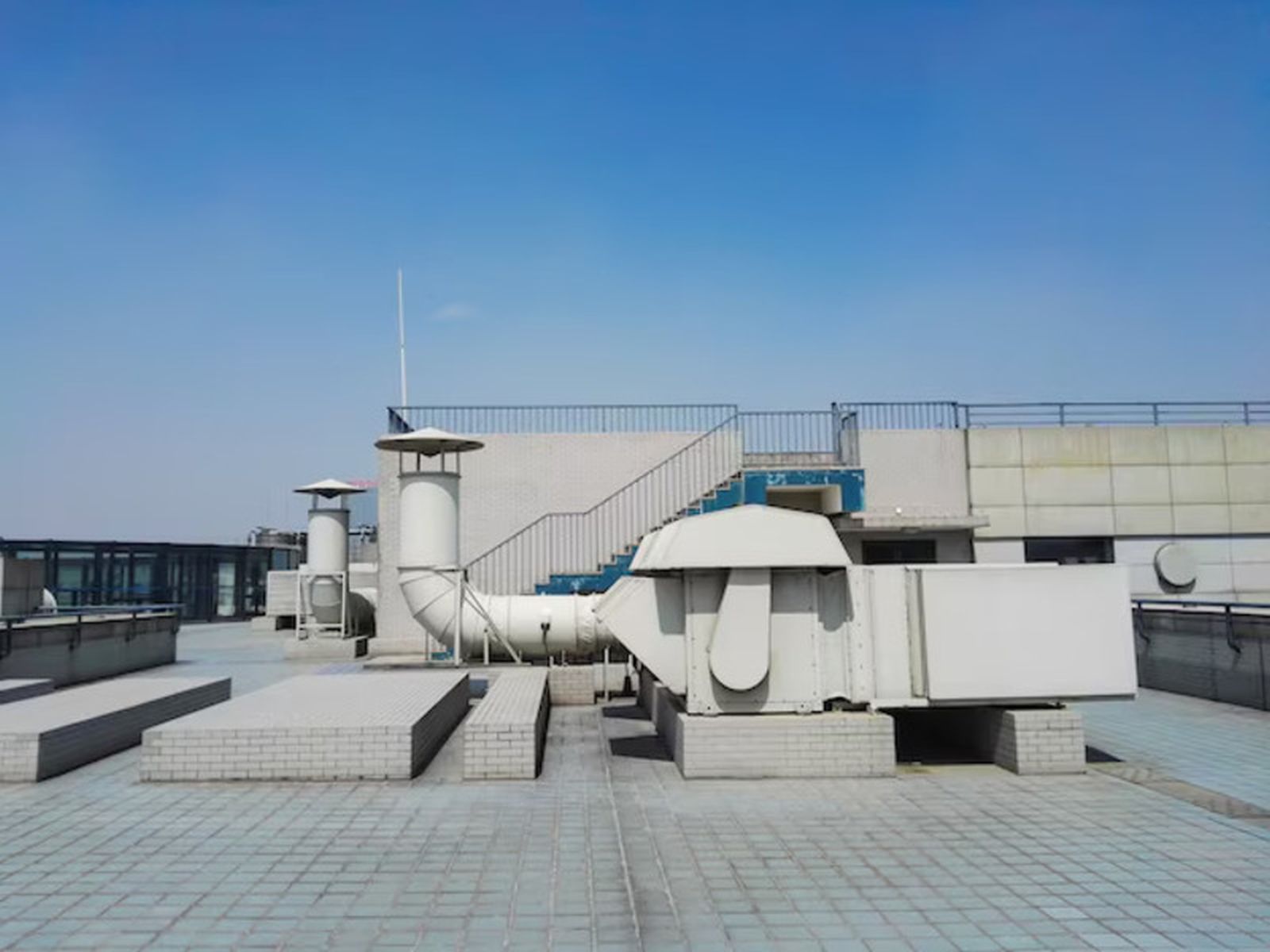
Evaporator Systems
What are Evaporator Systems? Evaporator systems are important components used to evaporate liquid in a variety of industrial and commercial applications. These systems are devices in which the liquid is evaporated with the help of heat energy and provides cooling by taking heat from the environment. It plays a critical role especially in cooling and air conditioning processes. Evaporators evaporate the liquid by providing heat transfer and thus cool the environment. Modern evaporator systems are equipped with advanced technologies that increase energy efficiency; This both reduces costs and reduces environmental impact. There are various types of evaporators, including air-cooled, water-cooled and vapor-cooled evaporators, each designed to suit different application needs. Evaporator systems are used in large industrial cooling systems, to regulate the indoor climate in commercial buildings, and to evaporate liquids in the chemical and food industries. Regular maintenance, cleaning and performance testing are required to ensure these systems operate effectively. Evaporator systems are an indispensable tool in industrial cooling and air conditioning processes with the energy efficiency and performance advantages they provide. How Do Evaporator Systems Work? Evaporator systems are important components that perform cooling by evaporating the liquid. These systems work on the principle of heat transfer and are generally used in industrial cooling and air conditioning systems. The principle of operation is quite simple: the liquid evaporates inside the evaporator and begins to absorb heat. The evaporator system usually operates with a refrigerant. This fluid is at low temperature and pressure when it enters the evaporator. Thanks to the heat exchanger surfaces inside the evaporator, the fluid evaporates by absorbing the heat from the environment. During this process, the surrounding temperature drops, resulting in the cooling effect. This evaporation process improves the performance of the cooling system and supports energy efficiency. Evaporators generally come in three main types: air-cooled, water-cooled, and vapor-cooled evaporators. Air-cooled evaporators enable the liquid to evaporate by cooling from the air; Water-cooled evaporators achieve more effective cooling by using water; Vapor-cooled evaporators provide cooling with steam. Each type is selected based on application and efficiency needs. Evaporator systems can also feature a variety of technologies that increase the performance and efficiency of the system. These technologies include high-efficiency heat exchangers and intelligent control systems. Regular maintenance and cleaning ensures efficient operation of the system and extends its life. What are the Advantages of Evaporator Systems? Evaporator systems offer many advantages in industrial and commercial cooling applications. The main advantages provided by these systems are: High Energy Efficiency: Evaporator systems transfer heat through the evaporation of the liquid. This process minimizes energy consumption and provides high energy efficiency. Evaporators equipped with modern technologies reduce operating costs by increasing energy savings. Improved Cooling Performance: Evaporators provide effective performance in various cooling systems. It provides highly efficient cooling through evaporation of the liquid and thus optimizes temperature control. This improves temperature regulation in industrial facilities and commercial buildings. Long-Term Durability: Evaporator systems produced with quality materials are long-lasting and durable. This ensures reliable performance and low maintenance requirements over the long term. With regular maintenance, the life of the system can be extended and its performance maintained. Environmentally Friendly: Evaporator systems provide environmentally friendly cooling solutions. These energy efficient systems minimize environmental impacts by reducing carbon emissions. Additionally, environmental sustainability is supported by using refrigerants that do not harm the environment. Various Application Areas: Evaporator systems are available in various types for different needs. Air-cooled, water-cooled and vapor-cooled evaporators suit a variety of industrial and commercial applications. This diversity allows the systems to be used in a wide range. Low Operating Costs: Thanks to its energy efficiency and long-lasting durability, the operating costs of evaporator systems are low. Less energy consumption and maintenance requirements contribute to lower overall costs. In Which Sectors Are Evaporator Systems Used? Evaporator systems have a wide range of usage in various sectors. In the industrial sector, especially in areas where high temperatures must be controlled, such as metal processing, chemistry and plastic production, evaporators provide effective cooling. It is used in the food and beverage industry to keep products fresh and ensure storage conditions; These systems protect the quality and safety of products in food processing plants and cold storages. Evaporator systems are preferred to regulate the indoor climate in commercial buildings, shopping malls and offices, thus providing a comfortable environment and energy efficiency. Additionally, in energy production facilities, especially power plants, these systems are used for temperature control and cooling purposes. This wide range of uses demonstrates the importance and ability of evaporator systems to adapt to a variety of applications. What are the Maintenance and Repair Tips for Evaporator Systems? Maintenance and repair of evaporator systems are critical to ensure the performance and long-lasting operation of the system. Regular maintenance increases the efficiency of the system and prevents malfunctions. As a first step, the evaporator should be cleaned. Dust, dirt and other contaminants can affect heat transfer, so surfaces need to be cleaned regularly. It is also important to check the system for leaks and review refrigerant levels regularly. Verifying that evaporator fans and motors are working and making sure the system is properly ventilated is also part of the maintenance process. Periodically, checks by a professional technician are necessary to evaluate the overall performance of the system and detect possible problems at an early stage. During these checks, critical parts such as pipe connections, seal conditions and electrical components are also reviewed. Maintenance and repair operations maintain the high performance of the system and reduce costs in the long term, thus supporting the efficient and reliable operation of evaporator systems. How to Increase Cooling Performance with Evaporator Systems? Several important strategies can be implemented to improve the cooling performance of evaporator systems. First, regular maintenance and cleaning of the system should be ensured. Dust and dirt debris can reduce cooling efficiency by hindering heat transfer. Therefore, evaporator surfaces and heat exchanger fins must be kept clean. Additionally, it should be ensured that the refrigerant levels are at appropriate levels and the sealing properties of the fluid should be checked. It is also important to regularly review fan speeds and motors and make adjustments as necessary to improve cooling performance. To optimize the efficiency of the evaporator system, ensure that the system is correctly sized and installed. Additionally, energy consumption can be reduced and cooling capacity can be increased by choosing high-efficiency evaporators equipped with modern technologies. Finally, using intelligent control systems that monitor the temperature and pressure parameters of the system enables continuous monitoring and improvement of performance. These strategies increase the cooling performance of evaporator systems, improving both energy efficiency and overall system efficiency. What are the differences between evaporator systems and dry cooling systems? Evaporator systems and dry cooling systems offer different approaches to cooling applications and each has certain advantages. Evaporator systems provide cooling by evaporating liquid. In these systems, the liquid evaporates on the heat exchanger surfaces and absorbs heat from the environment, thus cooling occurs. This process provides highly efficient cooling performance but requires water consumption and can pose maintenance challenges in some cases. Dry cooling systems, on the other hand, use direct airflow for cooling. In these systems, the cooling fluid comes into contact with the air and releases the heat. Dry cooling systems reduce environmental impact by keeping water usage to a minimum and require lower maintenance because they do not face water scaling and similar problems. However, the cooling capacity of dry cooling systems may vary depending on the environmental temperature; Therefore, performance may decrease at high temperatures. Additionally, dry cooling systems may have disadvantages such as generally taking up a larger space and fan noise. What are the Technologies that Increase Energy Efficiency in Evaporator Systems? Technologies that increase energy efficiency in evaporator systems offer various innovations to optimize system performance and reduce energy consumption. Firstly, variable speed fans Its use can significantly reduce energy consumption. These fans prevent unnecessary energy consumption by adjusting their speed according to the cooling requirements of the system. Secondly, intelligent control systems ve temperature sensors usage monitors and optimizes system performance in real time. These sensors constantly monitor the operating conditions of the system and make adjustments when necessary, saving energy. Moreover, high efficiency heat exchangers ve energy recovery systemsIt minimizes energy consumption by increasing heat transfer. Energy recovery systems reduce energy costs by reusing the heat released from the system. Advanced isolation techniques It also reduces cooling losses, thus providing less energy consumption. Finally, modular designs ve low power consumption compressorsreduces overall operating costs by increasing the energy efficiency of the system. These technologies provide effective solutions to increase the energy efficiency of evaporator systems and reduce their environmental impact. What are the Best Maintenance Practices for Evaporator Systems? Best maintenance practices are very important to ensure efficient and long-lasting operation of evaporator systems. Firstly, regular cleaning By cleaning dust and dirt accumulated on the evaporator surfaces, it improves heat transfer and increases the efficiency of the system. During cleaning, the heat exchanger fins and filters also need to be checked. Secondly, checking refrigerant levels ve leak detection should be done regularly. Fluid levels must be maintained at the appropriate level for the system to maintain optimal performance. Thirdly, maintenance of fans and motorsis important to ensure proper functioning of these components. Cleaning fan blades and periodically checking motors supports the overall performance of the system. Moreover, control of electrical components should be done and make sure that all connections are secure. Pipe joints and gaskets Critical parts such as these should be inspected regularly for leaks or wear. Finally, professional inspection and adjustment operations should not be neglected; These inspections, performed by expert technicians, detect and prevent possible problems in the system at an early stage and help optimize performance. These maintenance practices ensure long-lasting performance by ensuring that evaporator systems operate reliably and efficiently. How to Choose Cooling Units Working with Evaporator Systems? There are several important factors to consider when choosing cooling units compatible with evaporator systems. Firstly, cooling capacity must be determined correctly; The selected unit must be capable of meeting the cooling needs of the business. Capacity directly affects the performance and energy efficiency of the system. Secondly, energy efficiency High cooling units should be preferred. Energy efficient units reduce operating costs and reduce environmental impact. System compatibility It is also an important criterion; selected refrigeration units must be compatible with the existing evaporator system and integrated correctly to ensure optimal performance. Thirdly, maintenance and service requirements should be taken into consideration. Easy maintenance and service access increases the performance and reliability of the system in the long term. Moreover, noise levels ve working conditions should also be evaluated; Cooling units should be selected appropriately for the operating environment and operate at minimum noise level. Finally, expert advice ve user reviews Taking this into account, brands and models with proven reliability in the market should be preferred. Considering these factors ensures efficient and reliable operation of refrigeration units operating with evaporator systems. How Sustainable Are Evaporator Systems? The sustainability of evaporator systems varies depending on various factors. These systems should be evaluated for energy efficiency and environmental impact. Highly energy efficient evaporator systems reduce operating costs and reduce environmental impacts by minimizing energy consumption. Especially high efficiency heat exchangers ve variable speed fans Modern technologies such as optimize the energy use of these systems. Moreover, energy recovery systems Their use contributes to making systems more sustainable, because these technologies reduce energy consumption by reusing the heat released from the system. However, the sustainability of evaporator systems should also be evaluated in terms of water consumption. Because traditional evaporator systems require the use of water, they can have an impact on water resources. For this reason, dry cooling systems Alternative solutions such as can increase environmental sustainability by reducing water consumption. In addition, regular maintenance and cleaning increases the efficiency of the systems, prolongs their life and reduces waste generation.
Read More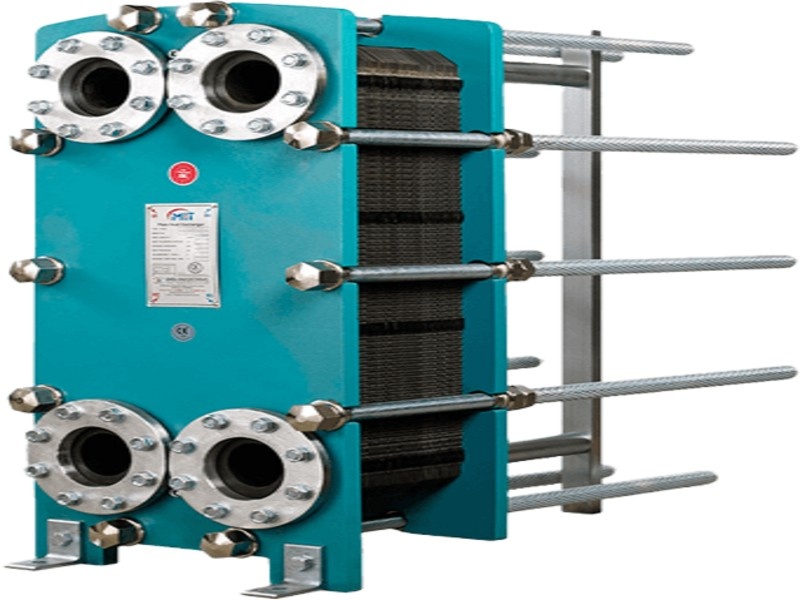
Heat Exchanger Suppliers
What Factors Should Businesses Consider When Choosing Heat Exchanger Suppliers? When selecting heat exchanger suppliers, businesses should carefully consider several key factors to ensure they make the most suitable choice for their needs. Firstly, product quality and reliability are paramount. Businesses should assess the supplier's reputation for manufacturing high-quality heat exchangers that meet industry standards and specifications. This includes examining the materials used, construction techniques, and adherence to quality control processes. Additionally, businesses should evaluate the supplier's experience and expertise in heat exchanger technology. Suppliers with a proven track record and extensive knowledge can provide valuable insights and recommendations to help businesses select the most appropriate heat exchanger design for their specific applications. Another critical factor to consider is customization and flexibility. Each business may have unique requirements or operating conditions that necessitate customized heat exchanger solutions. Therefore, businesses should partner with suppliers who offer flexibility in design and customization options. This allows for the adaptation of heat exchangers to fit specific space constraints, performance criteria, or compatibility with existing systems. Additionally, businesses should assess the supplier's customer support and service capabilities. A responsive and reliable supplier will provide ongoing support, technical assistance, and timely delivery of products, ensuring smooth integration and operation of heat exchangers within the business's processes. By carefully evaluating these factors, businesses can make informed decisions when choosing heat exchanger suppliers and ultimately optimize their thermal management systems for efficiency and performance. How Do Heat Exchanger Suppliers Ensure the Quality and Reliability of Their Products? Heat exchanger suppliers employ various strategies to ensure the quality and reliability of their products, starting from the selection of materials to the final testing stages. Firstly, suppliers source high-quality materials from trusted suppliers known for their reliability and performance. This includes corrosion-resistant metals, durable alloys, and specialized coatings to enhance heat transfer efficiency and longevity. Moreover, suppliers invest in advanced manufacturing processes and technologies to maintain consistency and precision in production. Automated welding, CNC machining, and robotic assembly minimize errors and ensure uniformity in heat exchanger construction, reducing the risk of defects or weaknesses in the final product. Quality assurance continues with rigorous testing protocols conducted throughout the manufacturing process. Heat exchanger suppliers perform comprehensive performance tests, such as pressure testing, leak detection, and thermal cycling, to validate the integrity and efficiency of their products. These tests simulate real-world operating conditions and verify that the heat exchangers can withstand varying temperatures, pressures, and fluid flow rates without compromising performance or safety. Additionally, suppliers often adhere to industry standards and certifications, such as ASME, ISO, or TEMA, to demonstrate compliance with quality management systems and regulatory requirements. By prioritizing quality control measures and testing procedures, heat exchanger suppliers instill confidence in their products' reliability and durability, ensuring customer satisfaction and trust in their brand. Which Industries Commonly Rely on Heat Exchanger Suppliers for Their Operations? Heat exchanger suppliers serve a wide array of industries that heavily rely on their products for efficient operation. One such industry is the power generation sector, where heat exchangers are integral components of thermal power plants, nuclear power plants, and renewable energy facilities. These facilities use heat exchangers to transfer heat from steam turbines, condensers, and reactor systems, playing a crucial role in energy production. Additionally, the HVAC (Heating, Ventilation, and Air Conditioning) industry relies heavily on heat exchanger suppliers for various applications. Heat exchangers are essential components of HVAC systems, facilitating the exchange of heat between indoor and outdoor environments to regulate temperatures in residential, commercial, and industrial buildings. Whether it's for heating, cooling, or ventilation purposes, heat exchangers play a vital role in maintaining comfortable and healthy indoor environments across different sectors. What Types of Heat Exchangers Are Offered by Leading Suppliers in the Market? Leading heat exchanger suppliers offer a diverse range of heat exchanger types to cater to the varying needs of different industries and applications. One common type is the shell and tube heat exchanger, which consists of a shell (outer vessel) containing multiple tubes through which fluid flows. This design facilitates efficient heat transfer between two fluids, making it suitable for applications such as HVAC systems, power generation, and chemical processing. Another popular option is the plate heat exchanger, which comprises multiple plates stacked together with gaskets to create alternating channels for fluid flow. Plate heat exchangers offer compactness, high thermal efficiency, and ease of maintenance, making them ideal for applications with space constraints or where frequent cleaning is required. Moreover, leading suppliers often offer specialized heat exchanger designs tailored to specific industries or operating conditions. For instance, in the food and beverage industry, suppliers provide sanitary heat exchangers designed to meet strict hygiene standards and regulations. These heat exchangers feature smooth, easy-to-clean surfaces and sanitary connections to prevent contamination and ensure product quality. Additionally, suppliers offer custom-designed heat exchangers for unique applications or extreme operating conditions. Whether it's for high-pressure, high-temperature, corrosive, or hazardous environments, leading suppliers leverage advanced engineering and manufacturing capabilities to deliver innovative heat exchanger solutions that meet the most demanding requirements of their customers. How Do Heat Exchanger Suppliers Customize Solutions to Meet Specific Requirements? Heat exchanger suppliers excel in customizing solutions to meet specific requirements by leveraging their expertise, flexibility, and advanced engineering capabilities. Firstly, suppliers collaborate closely with customers to understand their unique needs, operating conditions, and performance criteria. This involves conducting thorough consultations and assessments to gather detailed specifications and requirements. Based on this information, suppliers then utilize computer-aided design (CAD) software and advanced modeling techniques to develop customized heat exchanger designs that precisely align with the customer's specifications. This may involve modifying standard designs or creating entirely new solutions tailored to the customer's specific application, space constraints, or performance goals. Additionally, heat exchanger suppliers offer flexibility in materials, construction methods, and configuration options to accommodate diverse requirements. Whether it's selecting specialized alloys for corrosive environments, incorporating additional features for enhanced efficiency, or optimizing heat exchanger geometry for specific flow rates and temperature ranges, suppliers tailor every aspect of the solution to meet the customer's needs. Furthermore, suppliers maintain open communication throughout the customization process, providing regular updates, prototypes, and feedback to ensure alignment with the customer's expectations. By prioritizing collaboration, innovation, and flexibility, heat exchanger suppliers deliver customized solutions that not only meet but often exceed the specific requirements of their customers, ultimately enhancing performance, efficiency, and reliability in various industries and applications. What Are the Advantages of Partnering With Reputable Heat Exchanger Suppliers? Partnering with reputable heat exchanger suppliers offers numerous advantages for businesses seeking reliable thermal management solutions. Firstly, reputable suppliers prioritize product quality and reliability, ensuring that their heat exchangers are built to the highest standards using premium materials and advanced manufacturing techniques. This translates to superior performance, durability, and longevity, reducing the risk of unexpected downtime and costly repairs. Additionally, reputable suppliers often have extensive experience and expertise in heat exchanger technology, enabling them to provide valuable guidance and support throughout the partnership. From initial consultation to after-sales service, businesses can rely on their supplier's knowledge and assistance to optimize their thermal management systems for maximum efficiency and effectiveness. Furthermore, partnering with reputable heat exchanger suppliers fosters trust and confidence in the supply chain. Businesses can rest assured that they are receiving genuine, high-quality products backed by reputable warranties and customer service commitments. This reliability is particularly crucial for industries where uninterrupted operation is critical, such as power generation, chemical processing, and HVAC. Moreover, reputable suppliers often offer a wide range of heat exchanger options, including custom solutions tailored to specific requirements. This versatility allows businesses to find the perfect heat exchanger solution to suit their unique needs, whether it's for a large-scale industrial project or a specialized application. Overall, partnering with reputable heat exchanger suppliers empowers businesses to optimize their operations, minimize risks, and achieve long-term success in their respective industries.
Read More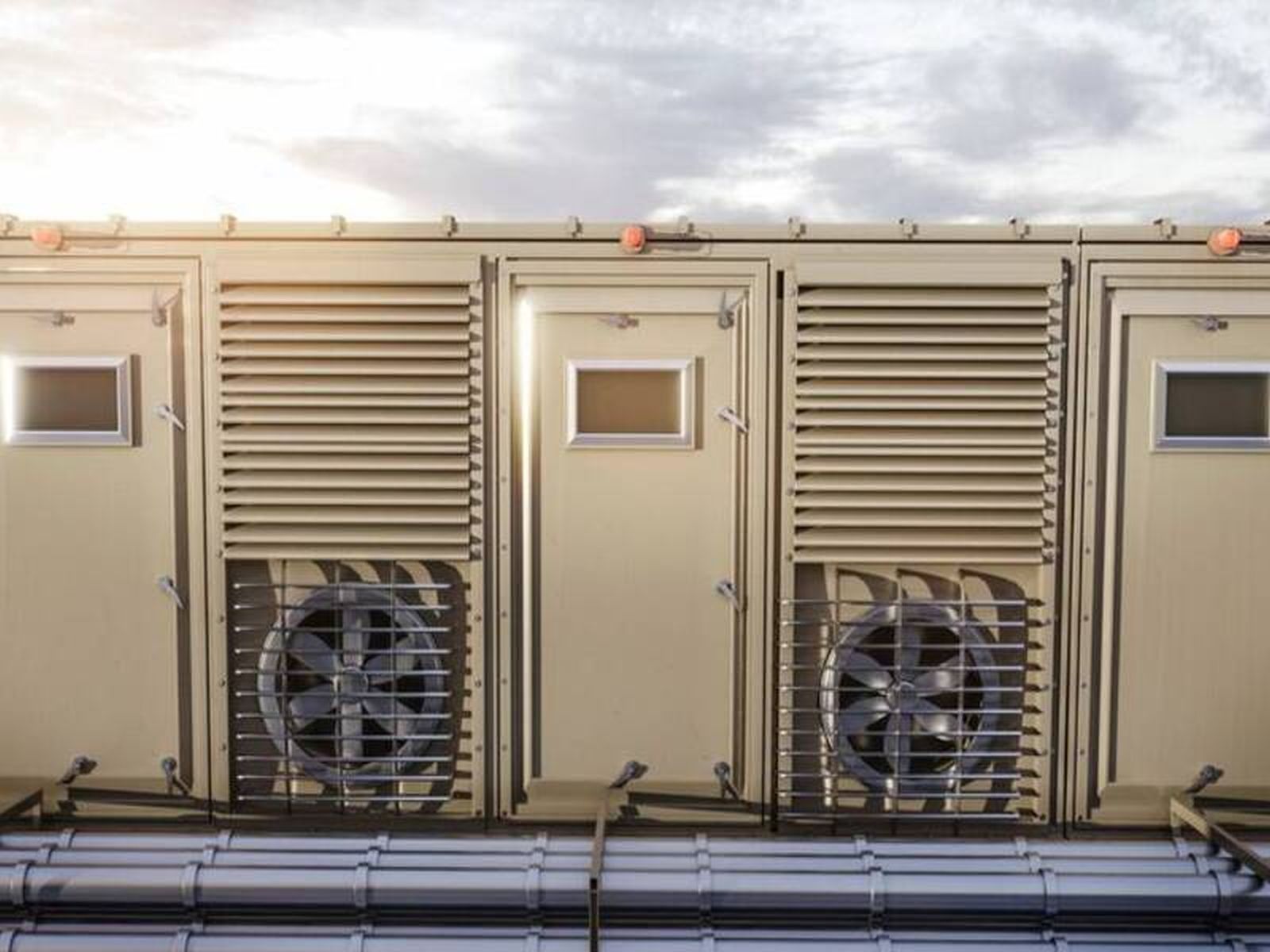
Industrial Refrigeration Systems
What Are the Key Components of Industrial Refrigeration Systems? Industrial refrigeration systems are complex setups designed to provide efficient cooling for various industrial processes. They consist of several key components, each playing a vital role in the refrigeration cycle. The primary components include compressors, condensers, evaporators, expansion valves, and refrigerants. Compressors are responsible for compressing refrigerant gases, raising their pressure and temperature. Condensers then cool and liquefy the refrigerant, releasing heat to the surroundings. Evaporators absorb heat from the target environment, causing the refrigerant to evaporate and thus cooling the area. Expansion valves regulate the flow of refrigerant into the evaporator, controlling the cooling process. Refrigerants are the medium that cycles through these components, undergoing phase changes to facilitate heat transfer. Each component must work in harmony for the system to function efficiently, ensuring optimal cooling performance in industrial settings. Industrial refrigeration systems play a crucial role in various sectors, including food processing, pharmaceuticals, cold storage, and HVAC. These systems are essential for preserving perishable goods, maintaining controlled environments for manufacturing processes, and supporting research and development activities. The efficiency and reliability of industrial refrigeration systems depend heavily on the quality and compatibility of their components. Therefore, selecting the right components and ensuring proper installation and maintenance are vital for maximizing system performance and longevity. Additionally, advancements in technology have led to the development of more energy-efficient and environmentally friendly refrigeration solutions, driving the evolution of industrial refrigeration systems to meet modern demands for sustainability and efficiency. How Do Industrial Refrigeration Systems Differ From Commercial Ones? Industrial refrigeration systems differ from commercial ones primarily in terms of scale, capacity, and application. Industrial systems are typically larger and more powerful, designed to handle the cooling needs of large-scale industrial processes, such as food processing plants, cold storage facilities, and chemical manufacturing plants. They often operate continuously and are capable of providing precise temperature control over large areas or volumes. In contrast, commercial refrigeration systems are typically smaller and less powerful, intended for use in retail stores, restaurants, supermarkets, and other commercial establishments. While they still provide cooling for perishable goods and products, they are generally designed for smaller-scale applications and may not require the same level of precision or capacity as industrial systems. Additionally, commercial systems may have different features and components tailored to the specific needs of the retail or foodservice industry, such as display cases, walk-in coolers, or ice machines. What Industries Rely Heavily on Industrial Refrigeration Systems? Many industries rely on industrial refrigeration systems to maintain the quality of products and optimise production processes. The food industry requires refrigeration systems when processing a wide range of products, from agricultural produce to meat, dairy and seafood. Cold chain management keeps products fresh, reducing spoilage and waste, while providing long-term storage and transport for frozen food products. The chemical industry also relies on industrial refrigeration systems, which control temperature during storage, processing and transport of chemicals. Other industries such as power generation, pharmaceuticals, automotive, plastics and metalworking also rely on industrial refrigeration systems to maintain the quality of products, improve the performance of equipment and ensure a reliable production process. The demand for industrial cooling systems is increasing at a time when businesses continue to improve technology and efficiency to increase productivity and gain a competitive advantage. Therefore, industrial refrigeration systems have become a critical component in many different industries. These systems are vital for industrial applications such as food, chemical, pharmaceutical, automotive, energy and many more. The reliability, durability and energy efficiency of refrigeration systems have become a key performance element for businesses in these industries. What Are the Different Types of Refrigerants Used in Industrial Refrigeration Systems? The different types of chillers used in industrial cooling systems are usually selected based on factors such as thermal performance, environmental effects and safety. Here are a few main types commonly used in these systems: Freons (Hydrofluorocarbons - HFCs): Freons are a type of refrigerant that has long been widely used in industrial refrigeration applications. However, due to their damaging effects on the ozone layer, their use is gradually decreasing due to environmental concerns. Ammonia (NH3): Ammonia is one of the most widely used refrigerants in industrial refrigeration systems. It is preferred due to its high thermal conductivity and effective cooling capacity. However, it requires careful handling due to the risk of being toxic and explosive. CO2 (Carbon Dioxide): CO2 has been gaining popularity in industrial cooling systems in recent years. An environmentally friendly option, CO2 has low global warming potential and is seen as a low-cost alternative. It is especially common in supermarkets and food processing plants. Hydrocarbons (Propane, Isobutane): Hydrocarbons are naturally occurring and environmentally friendly refrigerants. In recent years, they are more preferred in industrial refrigeration systems because they attract attention with their low environmental impact and effective cooling performance. How Do Industrial Refrigeration Systems Ensure Food Safety and Quality? Industrial refrigeration systems play a critical role in the food industry to ensure safety and quality. These systems ensure that food is stored and transported at the appropriate temperature, reducing the risk of spoilage. However, they not only ensure low temperatures, but also pay attention to factors such as humidity and ventilation. For example, when storing fruit and vegetables, appropriate humidity levels are important to maintain the freshness of the products. Furthermore, ventilation systems help to remove unwanted gases and odours from storage areas so that the flavour and quality of the products are maintained. All these measures show that industrial refrigeration systems are a critical component to ensure food safety and quality. Industrial refrigeration systems are vital to ensure food safety and quality. These systems provide the necessary environment for the storage and transport of food products at the appropriate temperature. In particular, low temperatures inhibit the growth of bacteria and microorganisms, thus preventing food spoilage. Furthermore, additional factors such as humidity and ventilation control are also important to maintain the freshness and quality of food. For example, when storing sensitive foods such as meat and seafood, low temperatures as well as appropriate humidity levels must be maintained. Therefore, industrial refrigeration systems play a critical role in ensuring reliable and quality products in the food industry. What Maintenance Practices Are Essential for Industrial Refrigeration Systems? Maintenance of industrial refrigeration systems is vital to ensure the efficiency and reliability of the systems. These systems need to be cleaned and checked regularly. For example, evaporation coils and fans should be cleaned and checked at regular intervals. Refrigerant levels and pressures should also be monitored regularly and adjusted if necessary. Electrical connections and components should also be checked periodically and serviced as necessary. All these maintenance practices ensure the smooth operation of industrial refrigeration systems and help prevent failures. Regular maintenance of industrial cooling systems is important to improve the performance and durability of the systems. These maintenance practices include changing filters, checking the oil levels of compressors and cleaning them if necessary. In addition, the tightness of the connections in the system should also be checked regularly. In addition, it is also important to check the thermal insulation and renew it when necessary, as good thermal insulation improves energy efficiency and makes systems run more efficiently. All these maintenance practices ensure the long life and stable operation of industrial refrigeration systems.
Read More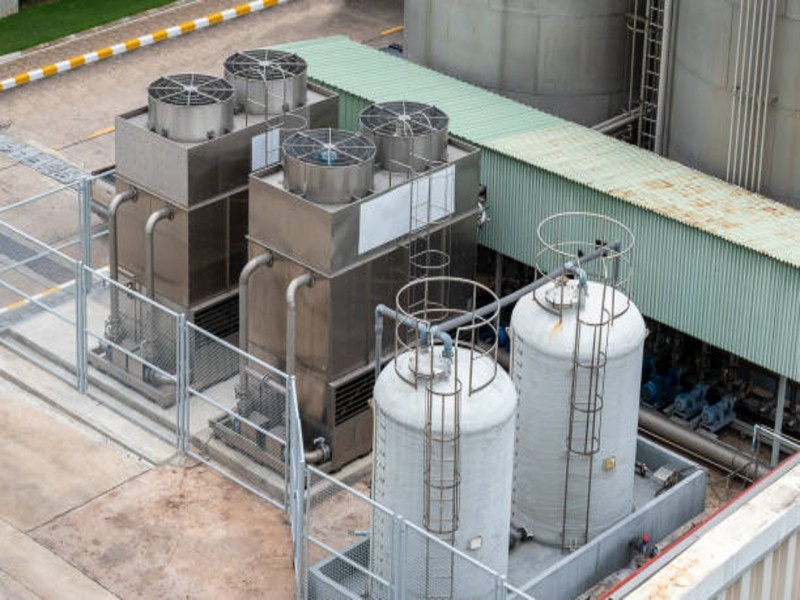
Industrial Process Cooling Suppliers
What Factors Should Businesses Consider When Selecting Industrial Process Cooling Suppliers? When selecting industrial process cooling suppliers, businesses should consider several crucial factors to ensure they choose the most suitable partner for their needs. Firstly, product quality and reliability are paramount. Businesses should assess the supplier's reputation for manufacturing high-quality cooling systems that meet industry standards and specifications. This involves examining the materials used, construction techniques, and adherence to quality control processes. Additionally, businesses should evaluate the supplier's experience and expertise in industrial process cooling technology. Suppliers with a proven track record and extensive knowledge can provide valuable insights and recommendations to help businesses select the most appropriate cooling solutions for their specific applications. Moreover, businesses should consider the supplier's ability to offer comprehensive support and services throughout the entire lifecycle of the cooling system. This includes assistance with system design, installation, commissioning, and ongoing maintenance. A reliable supplier will provide responsive customer support, technical expertise, and timely delivery of parts and components, ensuring smooth integration and optimal performance of the cooling system. Additionally, businesses should assess the supplier's commitment to energy efficiency and sustainability. Industrial process cooling systems consume a significant amount of energy, so choosing a supplier that offers energy-efficient solutions can help businesses reduce operating costs and minimize their environmental footprint. By carefully evaluating these factors, businesses can make informed decisions when choosing industrial process cooling suppliers and ultimately optimize their cooling processes for efficiency and reliability. How Do Industrial Process Cooling Suppliers Ensure the Reliability and Efficiency of Their Systems? Industrial process cooling suppliers employ various strategies to ensure the reliability and efficiency of their systems, starting with meticulous design and engineering processes. These suppliers invest in advanced technology and utilize computer-aided design (CAD) software to create customized cooling solutions tailored to the specific needs of their clients. By carefully considering factors such as heat load, temperature requirements, space constraints, and energy efficiency goals, suppliers optimize the design of their systems to deliver maximum performance and reliability. Furthermore, industrial process cooling suppliers prioritize the selection of high-quality components and materials for their systems. They source premium-grade compressors, heat exchangers, pumps, and other critical parts from reputable manufacturers known for their reliability and durability. Additionally, suppliers conduct rigorous testing and quality assurance procedures throughout the manufacturing process to ensure that every component meets or exceeds industry standards. This includes performance testing under various operating conditions and simulated environments to validate system reliability and efficiency. By adhering to strict quality control measures and using top-of-the-line components, industrial process cooling suppliers ensure that their systems deliver consistent and dependable performance, ultimately helping their clients optimize their industrial processes. Which Industries Commonly Rely on Industrial Process Cooling Suppliers for Their Operations? Industrial process cooling suppliers are integral partners for a wide range of industries that rely on efficient temperature control to optimize their operations. One such industry is manufacturing, where precise cooling is essential for various production processes. Manufacturers of plastics, metals, chemicals, and pharmaceuticals utilize industrial process cooling systems to maintain optimal temperatures during molding, casting, extrusion, and other manufacturing processes. Additionally, industries such as automotive, aerospace, and electronics rely on industrial process cooling suppliers to regulate temperatures in machining operations, welding processes, and heat treatment applications, ensuring product quality and consistency. Moreover, the food and beverage industry heavily depends on industrial process cooling suppliers for refrigeration and chilling solutions. Food processing plants, breweries, wineries, and dairy facilities utilize industrial cooling systems to maintain food safety standards, preserve product freshness, and extend shelf life. Similarly, the healthcare sector relies on industrial process cooling suppliers for precise temperature control in medical imaging equipment, laboratory processes, and pharmaceutical manufacturing. Furthermore, industries such as data centers and power generation utilize industrial cooling systems to dissipate heat generated by electronic equipment and machinery, ensuring reliable operation and preventing overheating-related failures. Overall, industrial process cooling suppliers serve as essential partners across diverse industries, enabling businesses to optimize their processes, enhance productivity, and maintain quality standards. What Types of Industrial Process Cooling Solutions Are Offered by Leading Suppliers in the Market? Leading suppliers in the industrial process cooling market offer a wide array of solutions tailored to meet the diverse needs of their customers. One common type is the chiller system, which is widely used in various industrial applications to remove heat from process fluids or equipment. Chillers come in different configurations, including air-cooled and water-cooled variants, and use refrigeration cycles to provide precise temperature control. These systems are suitable for cooling applications in manufacturing, plastics processing, pharmaceuticals, and more. Additionally, leading suppliers offer cooling towers, which are essential for dissipating heat from large-scale industrial processes. Cooling towers utilize the evaporation of water to remove heat from process fluids, making them ideal for applications such as power generation, HVAC systems, and chemical processing plants. Furthermore, leading suppliers often provide specialized cooling solutions tailored to specific industries or applications. For instance, in the food and beverage industry, suppliers offer hygienic cooling systems designed to meet stringent sanitary requirements and preserve product quality. These systems may include stainless steel components, clean-in-place (CIP) systems, and food-grade refrigerants to ensure compliance with food safety standards. In the pharmaceutical sector, suppliers offer precise temperature control solutions for critical processes such as drug manufacturing and storage. These solutions may incorporate advanced monitoring and control systems to maintain regulatory compliance and product integrity. Overall, leading suppliers in the industrial process cooling market strive to offer a comprehensive range of high-quality solutions to meet the diverse needs of their customers across various industries and applications. How Do Industrial Process Cooling Suppliers Tailor Their Solutions to Meet Specific Industry Requirements? Industrial process cooling suppliers excel in tailoring their solutions to meet specific industry requirements through a combination of expertise, innovation, and customization options. These suppliers begin by conducting thorough consultations with clients to gain a deep understanding of their unique needs, operational challenges, and industry-specific regulations. By gathering detailed information about factors such as temperature ranges, space limitations, energy efficiency goals, and product specifications, suppliers can design tailored cooling solutions that precisely align with the client's requirements. Moreover, industrial process cooling suppliers offer flexibility in design and configuration options to accommodate diverse industry needs. This includes selecting the most suitable cooling technology, such as chiller systems, cooling towers, or hybrid solutions, based on the specific application and operational parameters. Additionally, suppliers may incorporate additional features or accessories into their systems to address industry-specific challenges or regulatory standards. For example, in industries with stringent cleanliness requirements, such as food processing or pharmaceuticals, suppliers may offer hygienic design options with stainless steel construction and easy-to-clean surfaces. Furthermore, suppliers may provide specialized controls and monitoring systems to ensure compliance with industry regulations and standards. By prioritizing collaboration, customization, and innovation, industrial process cooling suppliers deliver tailored solutions that meet the unique needs and challenges of each industry they serve. What Are the Benefits of Partnering With Reputable Industrial Process Cooling Suppliers? Partnering with reputable industrial process cooling suppliers offers numerous benefits for businesses seeking reliable and efficient cooling solutions. Firstly, reputable suppliers prioritize product quality and reliability, ensuring that their cooling systems are built to the highest standards using premium materials and advanced manufacturing techniques. This translates to superior performance, durability, and longevity, reducing the risk of unexpected downtime and costly repairs. Additionally, reputable suppliers often have extensive experience and expertise in industrial cooling technology, enabling them to provide valuable guidance and support throughout the partnership. From initial consultation to after-sales service, businesses can rely on their supplier's knowledge and assistance to optimize their cooling systems for maximum efficiency and effectiveness. Moreover, partnering with reputable industrial process cooling suppliers fosters trust and confidence in the supply chain. Businesses can rest assured that they are receiving genuine, high-quality products backed by reputable warranties and customer service commitments. This reliability is particularly crucial for industries where uninterrupted operation is critical, such as manufacturing, food processing, and pharmaceuticals. Furthermore, reputable suppliers often offer a wide range of cooling solutions, including custom options tailored to specific requirements. This versatility allows businesses to find the perfect cooling solution to suit their unique needs, whether it's for process cooling, equipment cooling, or temperature control. Overall, partnering with reputable industrial process cooling suppliers empowers businesses to optimize their operations, minimize risks, and achieve long-term success in their respective industries.
Read More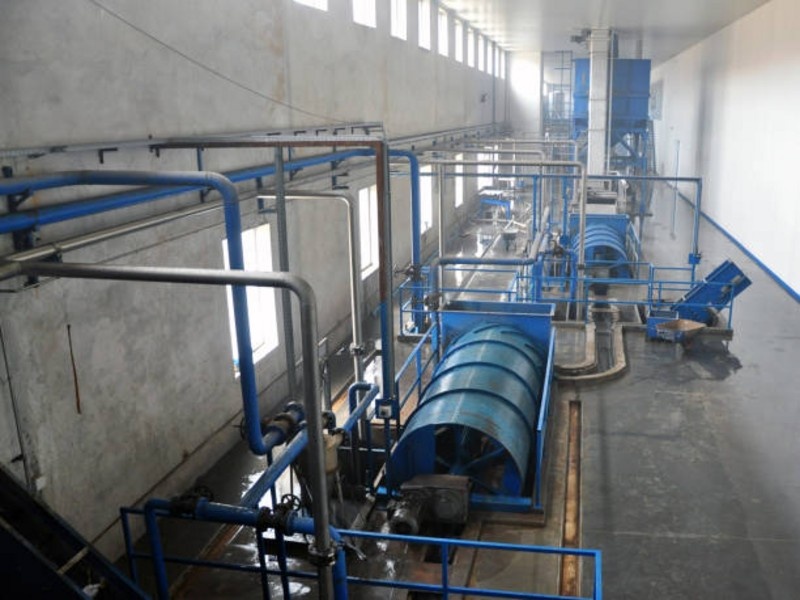
Industrial Process Cooling
What Are the Key Components of Industrial Process Cooling Systems? The main components of industrial process cooling systems consist of various parts that are brought together to provide an effective cooling process. These components include a refrigerant (usually a refrigerant gas or liquid), a compressor, a condenser, an expansion valve, and an evaporator. While the refrigerant absorbs and transports heat, the compressor compresses the refrigerant, increasing its temperature. The condenser then cools the compressed refrigerant, condensing it and turning it into liquid. The expansion valve expands the refrigerant, reducing its pressure and allowing it to enter the evaporator. The evaporator lowers the temperature in the process by absorbing the heat of the refrigerant and cooling it. When these components come together, industrial process cooling systems operate efficiently and provide the desired temperature range.The major components of industrial process cooling systems come together to ensure the systems operate effectively. These components include a chiller, a compressor, a condenser, an expansion valve, and an evaporator. While the refrigerant absorbs and transports heat, the compressor compresses the refrigerant, increasing its temperature. The condenser then cools the compressed refrigerant, condensing it and turning it into liquid. The expansion valve expands the refrigerant, reducing its pressure and allowing it to enter the evaporator. The evaporator lowers the temperature in the process by absorbing the heat of the refrigerant and cooling it. With the combination of these components, industrial process cooling systems operate reliably and effectively, providing the desired temperature level in the process. How Does Industrial Process Cooling Improve Manufacturing Efficiency? Industrial process cooling is considered a critical means of improving manufacturing efficiency. These systems keep the heat generated during the process under control, ensuring that the equipment operates at optimum temperature. As a result, overheating of machinery and equipment is prevented and process processes become more stable. Additionally, industrial process cooling systems can improve the quality of products. For example, in the metal processing industry, the cooling process reduces the temperature generated during the shaping of metal parts, increasing process efficiency and also improving the surface quality of machined parts. Therefore, industrial process cooling systems increase the efficiency of manufacturing businesses, making production processes more competitive.Industrial process cooling is considered a critical means of improving manufacturing efficiency. These systems keep the heat generated during the process under control, ensuring that the equipment operates at optimum temperature. As a result, overheating of machinery and equipment is prevented and process processes become more stable. Additionally, industrial process cooling systems can improve the quality of products. For example, in the plastic injection molding process, the cooling system speeds up production processes by reducing mold cooling time and also increases the dimensional stability of molded parts. In this way, industrial process cooling systems increase the competitiveness of manufacturing enterprises and maximize production efficiency. What Industries Rely on Industrial Process Cooling for Their Operations? Industrial process cooling is critical in many industries and plays an indispensable role in supporting the operations of these industries. In particular, the metalworking industry is highly dependent on industrial process cooling systems. Cooling systems are used to control high temperatures that occur during operations such as metal cutting, drilling, grinding and welding. Similarly, the plastic and rubber industries also rely on industrial process cooling systems. These systems must be used for proper cooling and hardening of materials during processes such as plastic injection molding, extrusion and casting. The food industry is also heavily dependent on industrial process cooling systems. Maintaining appropriate temperature conditions during the processing, storage and transportation of food products is vital, requiring the use of industrial process refrigeration systems.Many industries rely on industrial process cooling systems to maintain their operations and ensure product quality. In particular, the chemical industry uses these systems to control the high temperatures that occur during reactions. Stable temperature conditions in chemical processes ensure the quality of the products and the homogeneity of the ingredients. Additionally, the power generation industry also has a significant dependence on industrial process cooling systems. Power plants cool equipment such as turbines and generators using industrial cooling systems, increasing efficiency and reducing wear. Likewise, the pharmaceutical industry requires industrial process cooling systems because temperature control is critical in delicate manufacturing processes. These industries all rely on industrial process cooling systems to ensure the safety, efficiency and quality of their processes. What Are the Different Types of Industrial Process Cooling Technologies Available? Industrial process cooling technologies offer a variety of options, which vary depending on the needs and applications of businesses. Primarily, water cooling systems are a common option for industrial process cooling. In these systems, water removes heat from the process equipment and is cooled by a cooling tower or chiller, then circulated for reuse. Air cooling systems are preferred to reduce water usage. In these systems, air is passed around the equipment via a fan and carries away heat. Another option, coolants, are especially ideal for low-temperature applications. Cooling liquids are preferred when water cannot be used or is not suitable and are generally used with special cooling systems.Industrial process cooling technologies offer a variety of options, which vary depending on the needs and applications of businesses. Water cooling systems are a common option for industrial process cooling. In these systems, water removes heat from the process equipment and is cooled by a cooling tower or chiller, then circulated for reuse. Air cooling systems are preferred to reduce water usage. In these systems, air is passed around the equipment via a fan and carries away heat. Another option, coolants, are especially ideal for low-temperature applications. Cooling liquids are preferred when water cannot be used or is not suitable and are generally used with special cooling systems. These different technologies provide a variety of options to meet industrial process cooling needs. How Do Industrial Process Cooling Systems Maintain Optimal Temperature Levels? Industrial process cooling systems use a variety of methods to maintain optimal temperature levels. These systems continuously monitor the temperature levels of process equipment, often through thermal sensors and control systems. When the temperature of the equipment rises above the specified limits, the cooling systems are automatically activated and the cooling process begins. Cooling is usually achieved through water or coolants. For example, using a chiller, heat is removed from process equipment and cooled, then recycled to maintain the desired temperature level. This process ensures that industrial process cooling systems precisely and consistently maintain optimal temperature levels.Industrial process cooling systems use a variety of methods to maintain optimal temperature levels. These systems continuously monitor the temperature levels of process equipment, often through thermal sensors and control systems. When the temperature of the equipment rises above the specified limits, the cooling systems are automatically activated and the cooling process begins. Cooling is usually achieved through water or coolants. For example, using a chiller, heat is removed from process equipment and cooled, then recycled to maintain the desired temperature level. This process ensures that industrial process cooling systems precisely and consistently maintain optimal temperature levels. What Factors Should Businesses Consider When Choosing Industrial Process Cooling Solutions? Businesses must consider a number of factors when choosing industrial process cooling solutions. First, it is important for businesses to understand their current processing requirements and practices. Each industry may have different cooling needs, so businesses need to evaluate factors such as process temperature requirements, cooling capacity and continuous operating conditions. Secondly, it is important for businesses to consider their budget and resources. Industrial process cooling systems can be costly to invest in, so it is important for businesses to choose an appropriate solution by taking their long-term budget and financial planning into account. Additionally, energy efficiency should also be considered because energy costs can form a significant part of operating expenses. Finally, it is important for businesses to choose a solution that suits their existing facilities and infrastructure. The installation and integration of industrial process cooling systems must match the structure and requirements of existing facilities, so it is important to select the appropriate equipment.Businesses must consider a number of factors when choosing industrial process cooling solutions. First, it is important for businesses to understand their current processing requirements and practices. Each industry may have different cooling needs, so businesses need to evaluate factors such as process temperature requirements, cooling capacity and continuous operating conditions. Secondly, it is important for businesses to consider their budget and resources. Industrial process cooling systems can be costly to invest in, so it is important for businesses to choose an appropriate solution by taking their long-term budget and financial planning into account. Additionally, energy efficiency should also be considered because energy costs can form a significant part of operating expenses. Finally, it is important for businesses to choose a solution that suits their existing facilities and infrastructure. The installation and integration of industrial process cooling systems must match the structure and requirements of existing facilities, so it is important to select the appropriate equipment.
Read More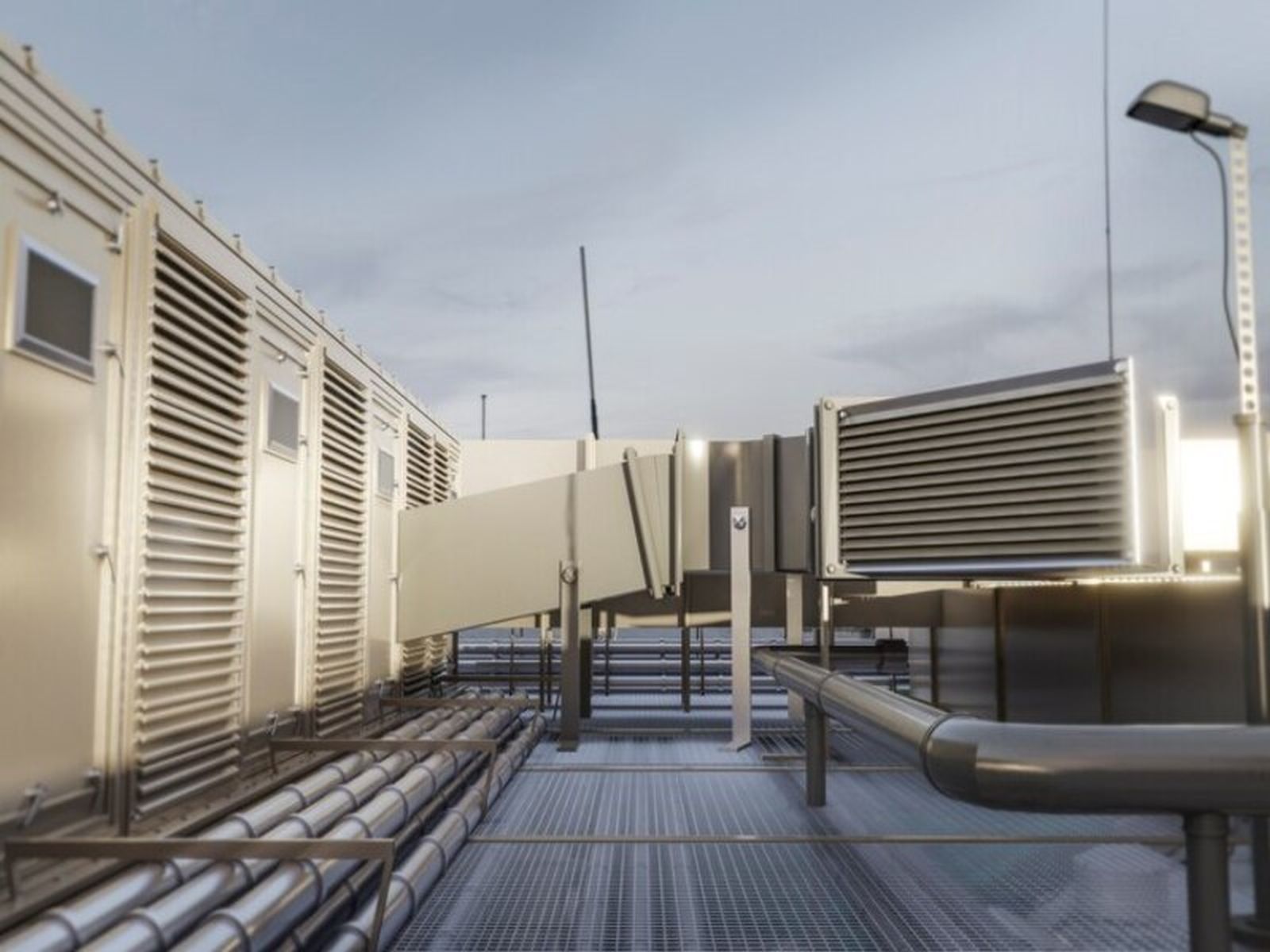
Industrial Cooling Equipment
What Are the Key Features to Consider When Choosing Industrial Cooling Equipment? When selecting industrial cooling equipment, several key features should be carefully considered to ensure optimal performance and efficiency. First and foremost, it's essential to assess the cooling capacity of the equipment, which is typically measured in BTUs (British Thermal Units) or tons of refrigeration. Understanding your specific cooling requirements based on factors such as the size of the space, heat load, and ambient temperature conditions is crucial in determining the appropriate cooling capacity needed. Additionally, the energy efficiency of the cooling equipment is paramount, as it directly impacts operational costs and environmental sustainability. Look for equipment with high Energy Efficiency Ratio (EER) or Seasonal Energy Efficiency Ratio (SEER) ratings, indicating superior energy performance. Another important factor is the type of refrigerant used in the cooling system, considering both its environmental impact and regulatory compliance. Opt for equipment that utilizes eco-friendly refrigerants with low Global Warming Potential (GWP) and Ozone Depletion Potential (ODP) to minimize environmental harm. Furthermore, consider the durability, reliability, and maintenance requirements of the cooling equipment to ensure long-term performance and minimal downtime. Features such as corrosion-resistant materials, advanced controls for automated operation, and easy access for servicing and repairs can contribute to the overall effectiveness and longevity of industrial cooling systems. By carefully evaluating these key features, businesses can make informed decisions when selecting industrial cooling equipment that meets their specific needs while maximizing efficiency and performance. How Does Industrial Cooling Equipment Contribute to Process Efficiency in Manufacturing? Industrial cooling equipment plays a crucial role in enhancing process efficiency in manufacturing by maintaining optimal operating conditions for machinery and equipment. In manufacturing processes, excessive heat can adversely affect the performance and lifespan of machinery, leading to reduced productivity and increased downtime. Industrial cooling equipment helps mitigate these issues by dissipating heat generated during production processes, thereby preventing overheating and ensuring consistent performance of critical equipment. By maintaining the required temperature levels, cooling equipment facilitates precise control over manufacturing conditions, which is particularly vital in industries such as electronics, automotive, and pharmaceuticals, where even minor fluctuations in temperature can impact product quality and integrity. Additionally, efficient cooling systems contribute to energy savings and cost reduction by minimizing the need for manual intervention and optimizing the use of resources. Overall, industrial cooling equipment plays a pivotal role in optimizing process efficiency, enhancing product quality, and maximizing operational productivity in manufacturing environments. What Are the Different Types of Industrial Cooling Equipment Commonly Used in Various Industries? Industrial cooling equipment comes in various types, each tailored to specific industrial needs and applications across different sectors. One common type is air-cooled chillers, which are widely used in industries such as HVAC, food and beverage, and plastics processing. These chillers utilize ambient air to dissipate heat from the refrigerant, making them suitable for outdoor installation and areas where water availability is limited. Another type is water-cooled chillers, which are preferred in industrial settings with high cooling demands and ample water supply. These chillers use water as a cooling medium and are known for their efficiency and reliability, making them suitable for large-scale manufacturing plants and data centers. Additionally, evaporative cooling systems are gaining popularity due to their energy efficiency and environmentally friendly operation. These systems utilize the evaporation of water to lower the temperature of air or process fluids, making them ideal for cooling applications in arid climates and industries such as power generation and chemical processing. Overall, the choice of industrial cooling equipment depends on factors such as cooling capacity, space availability, water availability, energy efficiency, and specific industry requirements. How Do Industrial Cooling Systems Differ From Traditional Air Conditioning Units? Industrial cooling systems and traditional air conditioning units serve similar purposes, but they differ significantly in terms of scale, capacity, and application. Traditional air conditioning units are designed for small-scale cooling needs, typically in residential, commercial, or small office spaces. They use a refrigeration cycle to remove heat from indoor air and expel it outside, maintaining a comfortable temperature indoors. In contrast, industrial cooling systems are engineered for large-scale cooling requirements in industrial settings such as manufacturing plants, data centers, and chemical processing facilities. These systems are capable of handling much higher cooling loads and often incorporate more sophisticated components and controls to meet the specific needs of industrial processes. Industrial cooling systems may utilize various cooling technologies such as chillers, cooling towers, and evaporative coolers to achieve efficient cooling across a wide range of industrial applications. Overall, while both types of systems serve the purpose of cooling, industrial cooling systems are designed for heavy-duty use in demanding industrial environments, offering higher capacity, durability, and customization options to meet industrial cooling requirements effectively. What Are the Maintenance Requirements for Industrial Cooling Equipment to Ensure Optimal Performance? To ensure optimal performance and longevity of industrial cooling equipment, regular maintenance is essential. The maintenance requirements for industrial cooling equipment vary depending on the type of system and its specific components. However, some common maintenance tasks include inspecting and cleaning cooling coils, filters, and condenser fins to remove dirt, debris, and other contaminants that can obstruct airflow and reduce efficiency. Additionally, checking for refrigerant leaks, inspecting electrical connections, lubricating moving parts, and calibrating controls are crucial steps to maintain proper functioning. Regular inspections and preventive maintenance schedules help identify potential issues early, preventing costly breakdowns and downtime. It's also important to follow manufacturer recommendations and guidelines for maintenance procedures to ensure compliance with safety standards and warranty requirements. Overall, proactive and regular maintenance is key to maximizing the performance, efficiency, and reliability of industrial cooling equipment, ultimately optimizing operations and minimizing disruptions in industrial processes. What Factors Should Businesses Consider When Investing in Industrial Cooling Equipment? When investing in industrial cooling equipment, businesses should consider several key factors to ensure they choose the most suitable system for their needs. Firstly, understanding the specific cooling requirements of their operations is crucial. This includes factors such as the size of the space to be cooled, the temperature and humidity levels required, and any specialized cooling needs for particular processes or equipment. Businesses should also evaluate the energy efficiency of the cooling equipment, considering both initial costs and long-term operational expenses. Opting for energy-efficient systems can lead to significant savings on utility bills over time. Additionally, reliability and durability are essential considerations. Industrial cooling equipment should be robust enough to withstand the demands of continuous operation in challenging industrial environments. Businesses should research the reputation and track record of manufacturers to ensure they provide high-quality, reliable products. Furthermore, compatibility with existing infrastructure and integration with other systems, such as HVAC or process control systems, should be assessed to ensure seamless operation. Finally, businesses should consider factors such as maintenance requirements, warranty coverage, and available technical support when making their investment decisions. By carefully evaluating these factors, businesses can select industrial cooling equipment that meets their needs effectively, contributes to operational efficiency, and provides a solid return on investment.
Read More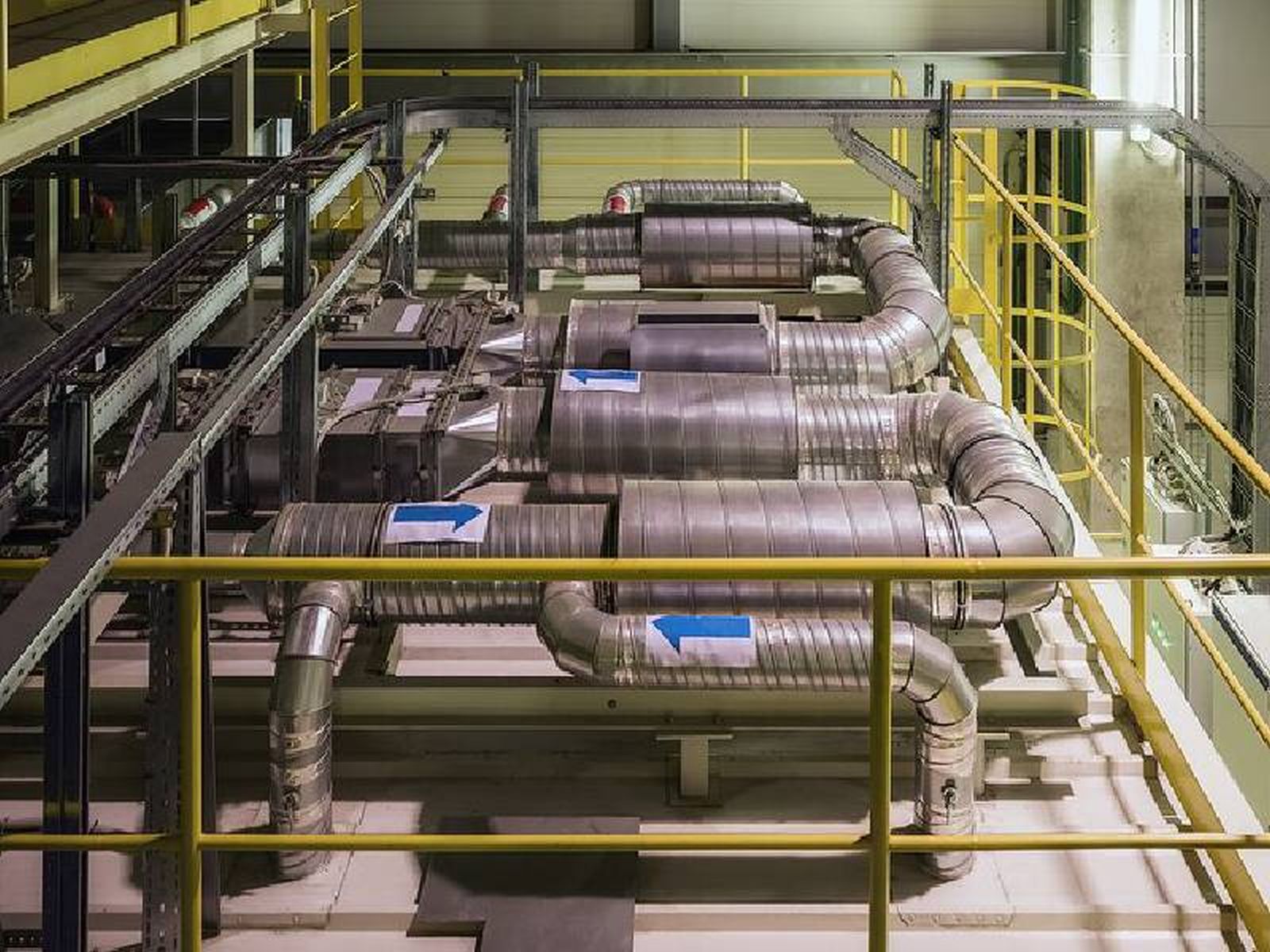
Industrial Heat Exchangers
What Are Industrial Heat Exchangers and How Do They Work? Industrial heat exchangers are devices designed to transfer heat between two or more fluids, typically to either cool or heat them. They are widely used in various industrial processes across different sectors such as manufacturing, chemical processing, power generation, and HVAC systems. Heat exchangers operate based on the principle of thermal energy transfer through conduction, convection, or radiation. The basic working principle involves two fluid streams flowing in close proximity but separated by a solid wall. Heat is transferred from one fluid to the other through the wall, without the fluids coming into direct contact, thereby maintaining their respective properties. This exchange of heat enables efficient temperature control, energy conservation, and process optimization within industrial systems. Industrial heat exchangers come in various designs and configurations, including shell and tube, plate and frame, finned tube, and spiral heat exchangers, each tailored to suit specific applications and operating conditions. Overall, these devices play a crucial role in facilitating heat transfer processes essential for the smooth operation of industrial operations while improving energy efficiency and reducing operating costs. How to Choose the Right Industrial Heat Exchanger for Your Application? Choosing the right industrial heat exchanger for your application involves several key considerations to ensure optimal performance and efficiency. Firstly, understanding the specific requirements of your process is essential. Factors such as fluid type, flow rate, temperature range, and pressure conditions must be carefully evaluated to determine the most suitable heat exchanger design and materials. For instance, corrosive fluids may require materials with high resistance to corrosion, while high-pressure applications may necessitate robust construction and thicker walls. Secondly, evaluating the available space and installation requirements is crucial. Different heat exchanger designs have varying footprints and mounting configurations, so it's essential to assess whether the chosen unit can fit within the available space and be installed easily without disrupting existing operations. Thirdly, considering the long-term maintenance and operational costs is important. Some heat exchanger designs may require more frequent cleaning or maintenance, leading to higher operational expenses over time. Opting for a design with minimal maintenance requirements and a proven track record of reliability can help minimize downtime and overall operating costs. Additionally, seeking recommendations and expertise from reputable suppliers or consulting with experienced engineers can provide valuable insights into selecting the most suitable heat exchanger for your application. They can offer guidance on design considerations, material selection, and performance expectations based on their industry knowledge and expertise. By carefully evaluating these factors and seeking expert advice, you can make an informed decision and choose the right industrial heat exchanger that meets your specific application needs while ensuring efficient and reliable operation. What Industries Commonly Use Industrial Heat Exchangers? Industrial heat exchangers find widespread application across various industries due to their versatile nature and ability to facilitate heat transfer processes efficiently. One of the primary sectors that extensively utilize heat exchangers is the manufacturing industry. These heat exchangers are integral components in equipment and machinery used for metalworking, plastic processing, and other manufacturing processes where precise temperature control is critical for product quality and consistency. Additionally, the chemical processing industry relies heavily on heat exchangers for tasks such as heating, cooling, condensing, and evaporation in chemical reactors, distillation columns, and other processing units. Heat exchangers are also indispensable in power generation facilities, including thermal power plants, where they play a vital role in cooling steam condensers, heating boiler feedwater, and recovering waste heat to improve overall energy efficiency. Other industries such as food and beverage processing, HVAC systems, pharmaceuticals, and automotive manufacturing also utilize industrial heat exchangers for various thermal management applications, underscoring their importance and widespread usage across diverse industrial sectors. What Are the Different Types of Industrial Heat Exchangers Available? Industrial heat exchangers come in a variety of types, each designed to suit specific applications and operating conditions. One common type is the shell and tube heat exchanger, which consists of a bundle of tubes housed within a cylindrical shell. Fluid flows through the tubes while another fluid passes over the tubes, facilitating heat transfer through the tube walls. Another popular type is the plate heat exchanger, which comprises multiple plates stacked together with alternating channels for the hot and cold fluids. Plate heat exchangers offer high heat transfer efficiency and are compact in size, making them suitable for space-constrained environments. Additionally, there are finned tube heat exchangers, air-cooled heat exchangers, and spiral heat exchangers, each with unique designs optimized for specific applications such as air heating, gas cooling, or liquid-to-liquid heat exchange. The choice of heat exchanger type depends on factors such as operating temperature and pressure, fluid properties, space availability, and desired efficiency, with manufacturers offering a range of options to meet diverse industrial needs. What Materials Are Used in the Construction of Industrial Heat Exchangers? Industrial heat exchangers are constructed using a variety of materials selected based on their compatibility with the fluids being processed, operating conditions, and cost-effectiveness. Common materials include stainless steel, due to its corrosion resistance and durability, making it suitable for applications involving aggressive fluids or high temperatures. Copper and brass are also popular choices for their excellent thermal conductivity, making them ideal for heat transfer applications. Additionally, titanium is favored for its exceptional corrosion resistance, particularly in highly corrosive environments such as those found in chemical processing industries. For specialized applications, exotic alloys like Inconel and Hastelloy may be used to withstand extreme temperatures and harsh chemical environments. The selection of materials depends on factors such as the nature of the fluids, operating temperatures and pressures, maintenance requirements, and budget considerations, with manufacturers offering a range of material options to meet specific industrial needs. How Do Industrial Heat Exchangers Contribute to Energy Efficiency? Industrial heat exchangers play a crucial role in enhancing energy efficiency across various industrial processes. These devices facilitate the transfer of heat between two or more fluids at different temperatures, enabling the recovery and reuse of thermal energy that would otherwise be lost. By efficiently transferring heat from hot process streams to cooler ones, heat exchangers help to minimize energy consumption and reduce the need for additional heating or cooling equipment. This not only conserves energy but also lowers operational costs and environmental impact. Moreover, the use of heat exchangers promotes process optimization by maintaining optimal temperature levels, improving overall system performance, and ensuring consistent product quality. With advancements in heat exchanger design and technology, industries can achieve significant energy savings and sustainability goals while enhancing their competitiveness in the global market.
Read More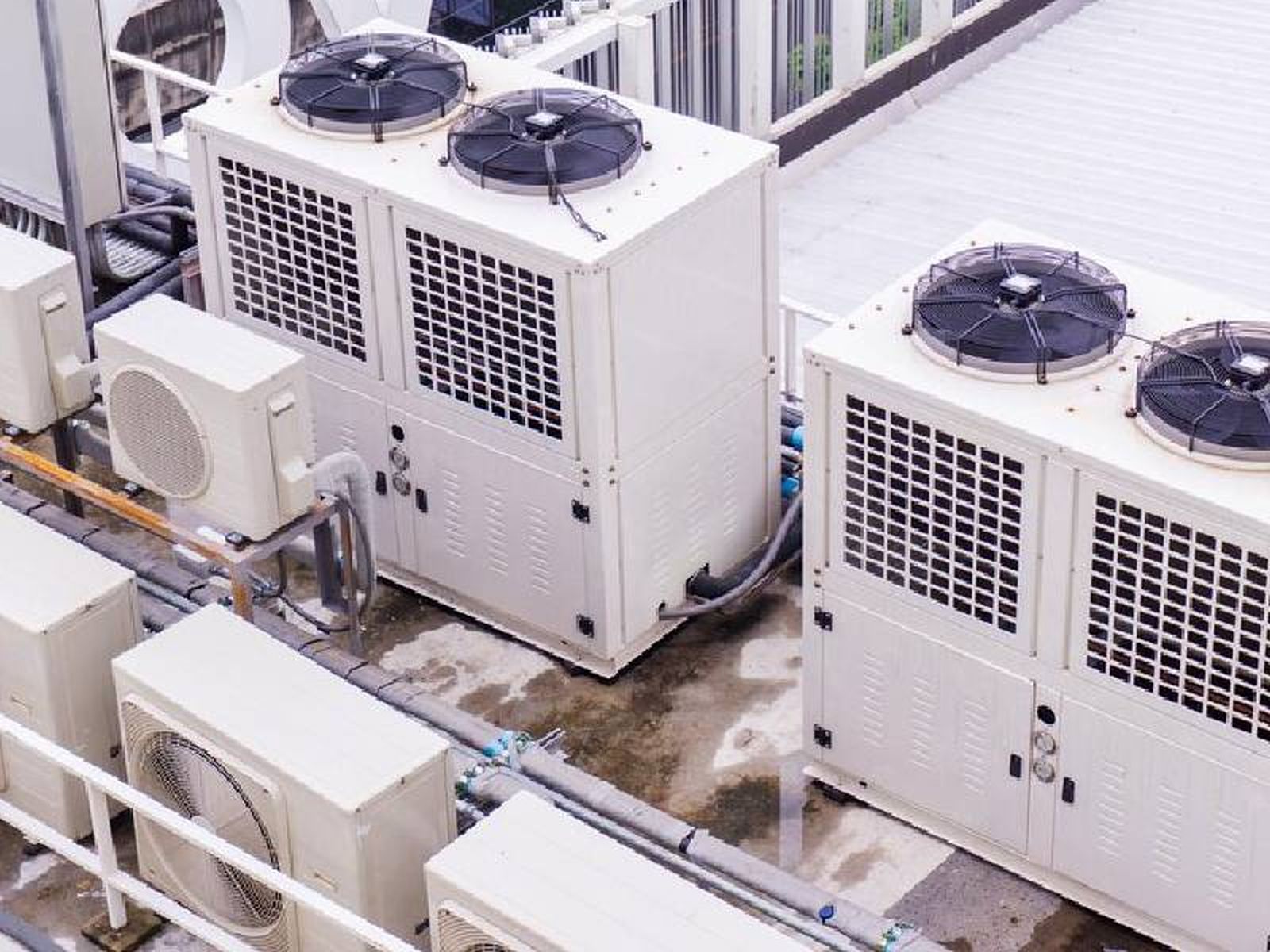
Refrigeration Condenser Manufacturer
What Are the Key Features to Look for in a Refrigeration Condenser Manufacturer? When selecting a refrigeration condenser manufacturer, several key features should be considered to ensure optimal performance and reliability. One crucial aspect is the manufacturer's reputation and experience in the industry. Look for manufacturers with a proven track record of producing high-quality condensers and serving satisfied customers. Additionally, consider the manufacturer's expertise in refrigeration technology and engineering capabilities. A manufacturer with extensive experience and technical knowledge can offer valuable insights and recommendations to meet your specific refrigeration needs and application requirements. Furthermore, evaluate the manufacturer's product range and customization options. Choose a manufacturer that offers a diverse selection of condenser types, sizes, and configurations to accommodate various refrigeration systems and operating conditions. Customization capabilities are also essential, as they allow condenser designs to be tailored to specific space constraints, performance goals, and environmental factors. Additionally, prioritize manufacturers that adhere to industry standards and regulations, such as ASME (American Society of Mechanical Engineers) codes or ISO (International Organization for Standardization) certifications, to ensure product quality, safety, and compliance. Lastly, consider factors such as manufacturing processes, quality control measures, warranty coverage, and customer support services offered by the manufacturer. By evaluating these key features comprehensively, you can choose a reputable refrigeration condenser manufacturer that meets your requirements and delivers reliable and efficient cooling solutions for your refrigeration applications. How Do I Find the Top Refrigeration Condenser Manufacturers in the Industry? Finding the top refrigeration condenser manufacturers in the industry requires thorough research and consideration of various factors. One effective approach is to utilize online resources such as industry directories, forums, and review websites. These platforms often provide valuable insights, ratings, and reviews from customers and industry experts, helping you identify reputable manufacturers with a proven track record of delivering high-quality products and exceptional service. Additionally, you can leverage search engines to conduct targeted searches using relevant keywords such as "top refrigeration condenser manufacturers" or "best condenser suppliers." This can help you discover prominent manufacturers that are widely recognized for their expertise, innovation, and reliability in the industry. Moreover, networking within the industry and seeking recommendations from peers, colleagues, and industry associations can provide valuable insights and referrals to top condenser manufacturers. Attending trade shows, conferences, and exhibitions related to refrigeration and HVAC systems is another effective way to connect with leading manufacturers, explore their product offerings, and discuss your specific requirements in person. Furthermore, don't hesitate to reach out directly to manufacturers to request product catalogs, technical specifications, and quotes. By carefully evaluating manufacturers based on factors such as reputation, experience, product range, customization capabilities, quality standards, and customer feedback, you can identify the top refrigeration condenser manufacturers that best align with your needs and preferences. What Types of Refrigeration Systems Do Condenser Manufacturers Specialize In? Condenser manufacturers specialize in a wide range of refrigeration systems to cater to diverse industrial, commercial, and residential applications. One common type is air-cooled condensers, which are widely used in HVAC systems, refrigerators, freezers, and air conditioning units. These condensers utilize ambient air to dissipate heat from the refrigerant, making them suitable for various cooling applications where water availability or space constraints are a concern. Another type is water-cooled condensers, which rely on water as the cooling medium. Water-cooled condensers are commonly employed in large-scale industrial refrigeration systems, process cooling applications, and chillers, offering efficient heat transfer and enhanced performance. Additionally, condenser manufacturers specialize in specialized refrigeration systems such as evaporative condensers, which combine elements of air and water cooling to achieve optimal heat rejection. Evaporative condensers are commonly used in industrial refrigeration, power plants, and process cooling applications, offering high efficiency and water conservation benefits. Furthermore, some manufacturers specialize in custom-designed refrigeration systems tailored to specific requirements and operating conditions. These custom solutions may include remote condensing units, cascade refrigeration systems, and low-temperature refrigeration systems for specialized applications such as food processing, pharmaceuticals, and cold storage. By specializing in various types of refrigeration systems, condenser manufacturers can address a wide range of cooling needs and deliver solutions that meet the unique requirements of different industries and applications. What Materials Are Commonly Used in the Construction of Refrigeration Condensers by Manufacturers? Refrigeration condenser manufacturers commonly use several materials in the construction of their products to ensure durability, efficiency, and optimal performance. One of the most commonly used materials is copper, prized for its excellent thermal conductivity and corrosion resistance. Copper tubes and fins are often used in the construction of condenser coils, allowing for efficient heat transfer and effective cooling. Another commonly used material is aluminum, known for its lightweight, cost-effectiveness, and good heat transfer properties. Aluminum fins and tubes are frequently utilized in air-cooled condensers, providing efficient heat dissipation and durability in various operating conditions. Additionally, manufacturers may employ stainless steel for certain components of refrigeration condensers, particularly in applications where corrosion resistance and sanitation are critical, such as food processing or pharmaceutical industries. Stainless steel offers excellent resistance to corrosion, chemicals, and high temperatures, ensuring long-term reliability and hygiene. Furthermore, manufacturers may use other materials such as brass, galvanized steel, or specialized alloys depending on specific application requirements, environmental factors, and budget considerations. By selecting appropriate materials and construction techniques, refrigeration condenser manufacturers can engineer robust and reliable products that meet the demanding needs of various industries and applications while ensuring longevity and efficiency. How Do Refrigeration Condenser Manufacturers Ensure Energy Efficiency and Performance? Refrigeration condenser manufacturers employ several strategies to ensure energy efficiency and optimal performance in their products. One key approach is the design and engineering of condenser coils to maximize heat transfer efficiency while minimizing energy consumption. This involves optimizing the geometry, size, and spacing of coil fins and tubes to enhance airflow and facilitate effective heat dissipation. Additionally, manufacturers utilize advanced materials with high thermal conductivity, such as copper or aluminum, to promote efficient heat transfer and reduce energy losses during the cooling process. Furthermore, manufacturers may incorporate innovative features such as variable speed fans, advanced refrigerant circuits, and smart controls to optimize system operation, reduce energy consumption, and adapt to changing load conditions in real-time. Moreover, refrigeration condenser manufacturers invest in research and development to continuously improve the efficiency and performance of their products. This includes exploring new technologies, materials, and manufacturing processes that offer enhanced energy efficiency, reliability, and sustainability. Additionally, manufacturers may conduct rigorous testing and performance evaluations to ensure that their condensers meet or exceed industry standards for energy efficiency and environmental sustainability. By prioritizing energy-efficient design, innovative technologies, and stringent quality control measures, refrigeration condenser manufacturers can deliver products that not only reduce energy consumption and operating costs but also contribute to a more sustainable and environmentally friendly refrigeration industry. What Are the Latest Advancements in Refrigeration Condenser Manufacturing Technology? The field of refrigeration condenser manufacturing has witnessed significant advancements in recent years, driven by technological innovations aimed at enhancing energy efficiency, performance, and sustainability. One notable advancement is the development of microchannel condenser technology, which utilizes small-diameter tubes and enhanced surface geometries to achieve higher heat transfer rates and improved efficiency compared to traditional finned tube designs. Microchannel condensers offer compact size, reduced refrigerant charge, and lower airside pressure drop, making them ideal for space-constrained applications and improving overall system performance. Furthermore, advancements in materials science have led to the emergence of novel materials and coatings that enhance corrosion resistance, durability, and thermal conductivity in refrigeration condenser manufacturing. For example, manufacturers are increasingly utilizing advanced alloys, polymer composites, and nano-coatings to improve heat transfer efficiency, reduce maintenance requirements, and extend the lifespan of condenser components. Additionally, the integration of smart technologies such as IoT-enabled sensors, predictive analytics, and remote monitoring capabilities is transforming the way refrigeration condensers are operated and maintained. These technologies enable real-time performance monitoring, proactive maintenance scheduling, and optimization of system operation, leading to improved reliability, energy efficiency, and cost savings for end-users. Overall, the latest advancements in refrigeration condenser manufacturing technology are driving innovation and reshaping the landscape of the refrigeration industry towards more efficient, sustainable, and environmentally friendly solutions.
Read More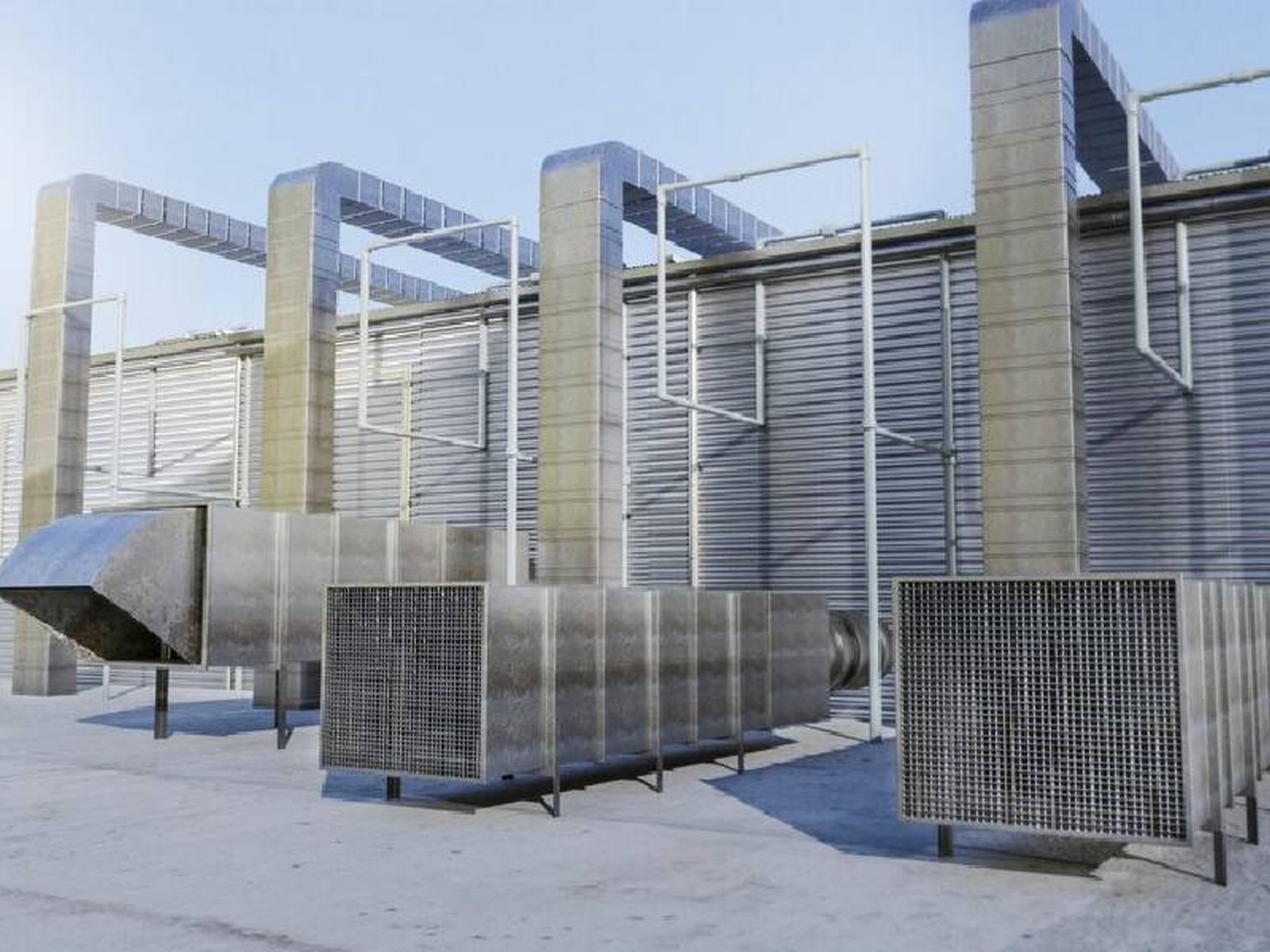
HVAC Condenser Manufacturer
Table of Contents What Are The Qualities Of A Reliable HVAC Condenser Manufacturer? How To Choose The Best HVAC Condenser Manufacturer For Your Project? What Are The Different Types Of HVAC Condensers Manufactured By Leading Companies? What Factors Influence The Efficiency And Performance Of HVAC Condenser Units? What Materials Are Commonly Used In The Production Of HVAC Condensers By Manufacturers? What Are The Latest Innovations In HVAC Condenser Manufacturing Technology? What Are The Qualities Of A Reliable HVAC Condenser Manufacturer? A reliable HVAC condenser manufacturer possesses several key qualities that set them apart in the industry. Firstly, expertise and experience are crucial. A reputable manufacturer typically has a team of skilled engineers and technicians with extensive knowledge of HVAC systems, thermodynamics, and heat transfer principles. This expertise enables them to design and produce condensers that meet the specific requirements of HVAC applications, ensuring optimal performance and efficiency. Additionally, reliability is essential. A top HVAC condenser manufacturer offers products known for their reliability, durability, and longevity. They use high-quality materials, advanced manufacturing techniques, and rigorous quality control processes to produce condensers that withstand the rigors of HVAC operation and deliver consistent performance over time. Moreover, customization and flexibility are key attributes of a reliable HVAC condenser manufacturer. They offer a wide range of condenser types, sizes, and configurations to accommodate different HVAC system designs and specifications. Whether it's rooftop units, split systems, or ductless mini-splits, a reliable manufacturer can tailor condenser designs to suit specific application requirements, space constraints, and performance goals. Furthermore, customer support and service are vital aspects. A reputable manufacturer provides excellent customer service, offering technical assistance, responsive communication, and reliable after-sales support. They work closely with customers to understand their needs, provide expert guidance throughout the project lifecycle, and ensure that condenser solutions meet or exceed expectations. Overall, these qualities distinguish a reliable HVAC condenser manufacturer, ensuring that they deliver high-quality products and support to their clients in the HVAC industry How To Choose The Best HVAC Condenser Manufacturer For Your Project? Choosing the best HVAC condenser manufacturer for your project requires careful consideration of several factors. Firstly, assess the manufacturer's reputation and track record in the industry. Look for manufacturers with a solid reputation for producing high-quality condensers and serving satisfied customers. Online reviews, testimonials, and references can provide valuable insights into their performance and reliability. Additionally, consider the manufacturer's experience and expertise in HVAC condenser design and manufacturing. A manufacturer with years of experience and a deep understanding of HVAC systems is better equipped to meet your project requirements and provide valuable insights and recommendations. Furthermore, evaluate the manufacturer's product range and customization capabilities. Choose a manufacturer that offers a diverse range of condenser types, sizes, and configurations to accommodate your project specifications and HVAC system requirements. Customization options are also essential, as they allow you to tailor condenser designs to meet specific application needs, space constraints, and performance goals. Additionally, consider factors such as manufacturing processes, quality control measures, and certifications. Ensure that the manufacturer adheres to industry standards and regulations, such as ASME (American Society of Mechanical Engineers) codes or ISO (International Organization for Standardization) certifications, to guarantee product quality and reliability. Lastly, prioritize manufacturers that provide excellent customer support, technical assistance, and after-sales service to ensure a smooth project experience from start to finish. By evaluating these factors comprehensively, you can choose the best HVAC condenser manufacturer that aligns with your project needs, goals, and expectations effectively. What Are The Different Types Of HVAC Condensers Manufactured By Leading Companies? Leading HVAC companies manufacture various types of condensers to meet the diverse needs of their customers and applications. One common type is the air-cooled condenser, which uses ambient air as the cooling medium. These condensers are suitable for rooftop units, split systems, and other HVAC applications where water availability or space constraints limit the use of water-cooled systems. Another type is the water-cooled condenser, which relies on water as the cooling medium. These condensers are often used in larger HVAC systems, central plants, and industrial applications, providing efficient heat exchange and cooling. Furthermore, HVAC companies manufacture evaporative condensers, which combine air and water to remove heat from the refrigerant. These condensers are highly efficient and suitable for areas with high ambient temperatures or limited airflow. Additionally, some companies offer specialty condensers such as dual-circuit condensers, condensing units with integrated controls, and modular condenser systems for scalability and flexibility in HVAC system design. By offering a range of condenser types and configurations, leading HVAC companies cater to various project requirements, space constraints, environmental conditions, and performance goals, ensuring optimal efficiency and reliability in HVAC systems. What Factors Influence The Efficiency And Performance Of HVAC Condenser Units? The efficiency and performance of HVAC condenser units are influenced by several key factors. Firstly, proper sizing is crucial. Condenser units that are undersized or oversized for the HVAC system can lead to inefficiencies, increased energy consumption, and reduced performance. It's essential to select a condenser unit that matches the cooling load and capacity requirements of the system to ensure optimal operation. Secondly, the design and construction of the condenser unit play a significant role. High-quality materials, such as copper or aluminum tubing and fins, promote efficient heat transfer and corrosion resistance, enhancing the unit's performance and longevity. Moreover, the configuration and layout of the condenser coils also impact efficiency. Condenser coils with a larger surface area and tighter spacing facilitate better heat transfer and airflow, improving overall efficiency. Additionally, factors such as ambient temperature, humidity levels, and airflow conditions can affect condenser performance. Proper installation, regular maintenance, and cleaning of the condenser unit are essential to ensure optimal airflow, heat exchange, and efficiency. Furthermore, advancements in technology, such as variable-speed compressors, advanced refrigerants, and smart controls, can significantly enhance the efficiency and performance of HVAC condenser units, leading to energy savings and improved comfort levels. By considering these factors and implementing best practices, HVAC systems can achieve maximum efficiency and performance, delivering reliable cooling solutions for various applications and environments. What Materials Are Commonly Used In The Production Of HVAC Condensers By Manufacturers? Manufacturers of HVAC condensers commonly use a variety of materials to ensure durability, efficiency, and reliability in their products. One of the most prevalent materials is copper due to its excellent thermal conductivity and corrosion resistance properties. Copper is often used in the construction of condenser coils and tubing, facilitating efficient heat transfer and enhancing overall performance. Another commonly used material is aluminum, prized for its lightweight nature and resistance to corrosion. Aluminum is often utilized in the manufacturing of condenser fins, which play a crucial role in dissipating heat from the refrigerant to the surrounding air. Additionally, manufacturers may incorporate stainless steel in certain components of HVAC condensers, such as frames or brackets, to enhance durability and resistance to corrosion in harsh environments. Furthermore, some condenser units may feature components made from brass or other copper alloys, providing a balance of strength, corrosion resistance, and cost-effectiveness. By leveraging these materials in the production of HVAC condensers, manufacturers can ensure that their products deliver optimal performance, longevity, and reliability, meeting the diverse needs of residential, commercial, and industrial HVAC applications. What Are The Latest Innovations In HVAC Condenser Manufacturing Technology? In recent years, HVAC condenser manufacturing has seen several significant innovations aimed at improving efficiency, performance, and sustainability. One notable advancement is the integration of variable-speed compressor technology in condenser units. Variable-speed compressors adjust their speed and capacity based on real-time cooling demands, allowing for precise temperature control and significant energy savings. This technology enables condenser units to operate more efficiently, reducing energy consumption and enhancing overall system performance. Additionally, advancements in refrigerants have led to the development of eco-friendly and low-GWP (Global Warming Potential) alternatives to traditional refrigerants like R-22. These new refrigerants offer improved environmental sustainability and compliance with regulations such as the Montreal Protocol and the Kigali Amendment. Furthermore, smart technology and connectivity have revolutionized HVAC condenser manufacturing. Many condenser units now feature built-in sensors, IoT (Internet of Things) connectivity, and advanced control systems that enable remote monitoring, diagnostics, and optimization. Smart condenser units can detect and diagnose issues in real-time, allowing for proactive maintenance and troubleshooting to prevent costly downtime. Moreover, advanced materials and manufacturing processes, such as microchannel coils, polymer coatings, and additive manufacturing techniques, are being adopted to improve the durability, corrosion resistance, and thermal efficiency of HVAC condensers. These innovations represent the latest trends in HVAC condenser manufacturing, driving improvements in energy efficiency, sustainability, and operational performance across residential, commercial, and industrial HVAC system
Read More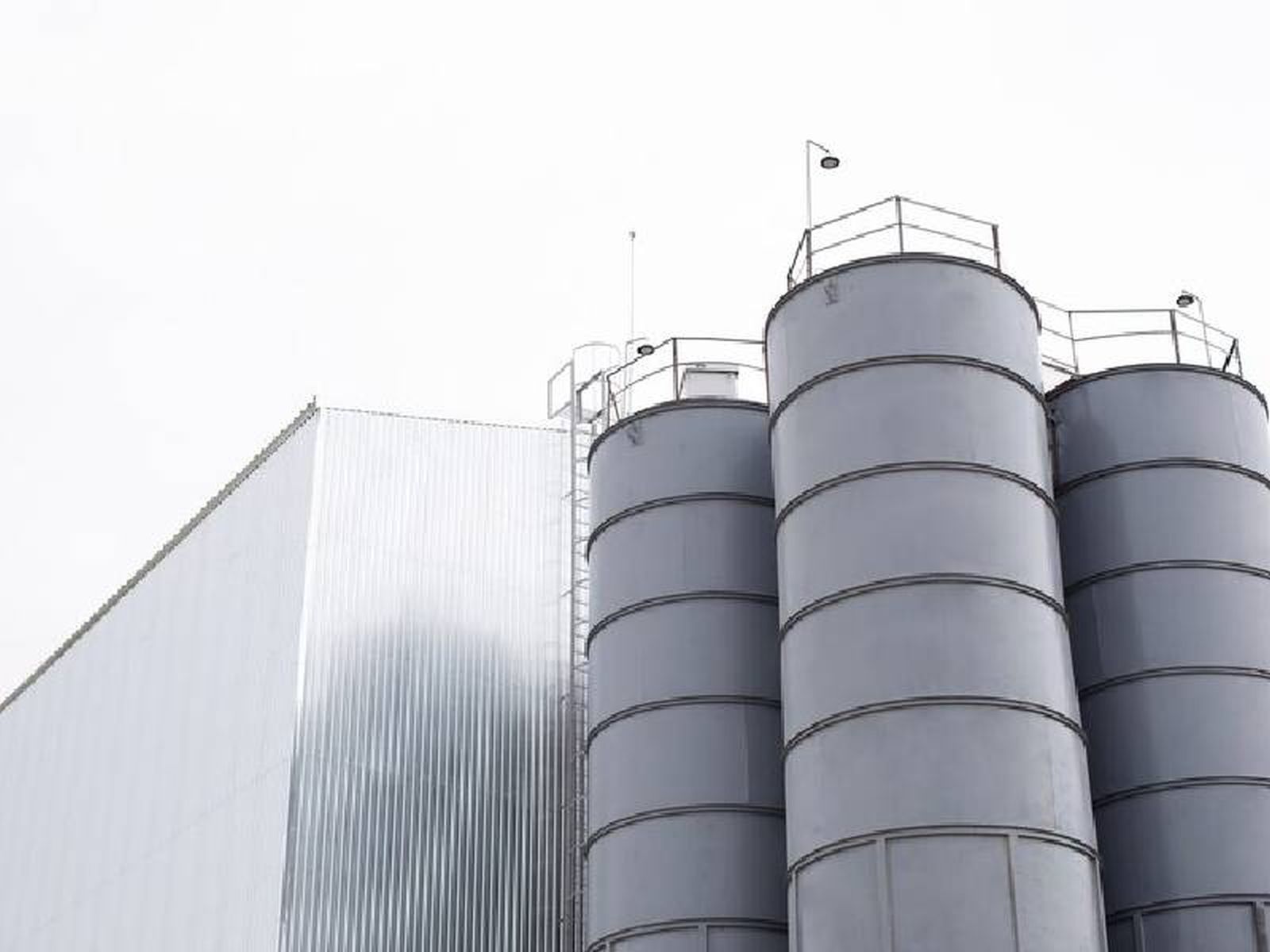
Industrial Condenser Manufacturer
Table of Contents What Are The Key Characteristics Of An Industrial Condenser Manufacturer? How To Choose The Right Industrial Condenser Manufacturer For Your Project? What Industries Rely On Industrial Condenser Manufacturers For Their Operations? What Types Of Condensers Can Industrial Condenser Manufacturers Produce? What Factors Determine The Quality Of Industrial Condensers Manufactured? What Materials Are Commonly Used By Industrial Condenser Manufacturers? What Are The Key Characteristics Of An Industrial Condenser Manufacturer? An industrial condenser manufacturer possesses several key characteristics that set them apart in the market. Firstly, expertise and experience are paramount. A reputable manufacturer typically has a team of skilled engineers and technicians with extensive knowledge of thermodynamics, fluid dynamics, and heat transfer principles. This expertise allows them to design and engineer condenser units that are highly efficient, reliable, and tailored to meet the specific needs of various industries. Additionally, versatility is crucial. A top condenser manufacturer offers a wide range of condenser types, sizes, and configurations to accommodate diverse applications across different sectors such as power generation, chemical processing, HVAC, and more. They can customize condenser designs to suit unique requirements, whether it involves space constraints, temperature ranges, or fluid properties. Furthermore, quality and compliance are non-negotiable. A reputable industrial condenser manufacturer adheres to stringent quality control measures and industry standards throughout the manufacturing process. They use high-quality materials, employ advanced manufacturing techniques, and conduct thorough testing and validation to ensure that their products meet or exceed customer expectations and regulatory requirements. Moreover, customer support and service are essential aspects. A reliable condenser manufacturer provides excellent customer service, offering technical assistance, prompt responses to inquiries, and reliable after-sales support. They maintain open communication channels with clients, collaborate closely throughout the project lifecycle, and stand behind their products with warranties and maintenance services. Overall, these key characteristics distinguish top industrial condenser manufacturers, ensuring that they deliver superior products and services to their customers. How To Choose The Right Industrial Condenser Manufacturer For Your Project? Choosing the right industrial condenser manufacturer for your project requires careful consideration of several factors. Firstly, assess the manufacturer's expertise and experience in designing and manufacturing condensers for your specific industry and application. Look for manufacturers with a proven track record of delivering high-quality condenser solutions and serving clients in your industry sector. Additionally, consider the manufacturer's capabilities in terms of customization and flexibility. A manufacturer that offers customizable designs, various sizes, and adaptable configurations can better meet your project requirements and specifications. Furthermore, evaluate the manufacturer's commitment to quality and compliance. Ensure that they adhere to industry standards and regulations relevant to condenser manufacturing, such as ASME (American Society of Mechanical Engineers) codes or ISO (International Organization for Standardization) certifications. Additionally, assess the manufacturer's quality control processes, material sourcing practices, and testing procedures to ensure that their products meet or exceed your quality expectations. Moreover, consider factors such as production capacity, lead times, and customer support. Choose a manufacturer that can accommodate your project timeline, volume requirements, and provide responsive customer service throughout the project lifecycle. By carefully evaluating these factors, you can select the right industrial condenser manufacturer that aligns with your project needs, goals, and expectations effectively. What Industries Rely On Industrial Condenser Manufacturers For Their Operations? Industrial condenser manufacturers play a critical role in supporting various industries that rely on efficient cooling solutions for their operations. One such industry is power generation, where condensers are integral components of steam turbine power plants. These condensers help convert steam back into water by extracting heat, thereby improving the overall efficiency of power generation processes. Additionally, industries such as chemical processing heavily rely on industrial condensers for applications such as distillation, solvent recovery, and chemical synthesis. Condensers facilitate precise temperature control and efficient heat transfer, essential for optimizing process performance and productivity in chemical manufacturing operations. Moreover, industrial condenser manufacturers serve industries such as petroleum refining, HVAC (heating, ventilation, and air conditioning), food and beverage processing, pharmaceutical manufacturing, and automotive manufacturing. In petroleum refining, condensers are utilized in various refining processes to remove impurities and separate different components from crude oil. HVAC systems rely on condensers for cooling and dehumidification, maintaining comfortable indoor environments in residential, commercial, and industrial buildings. In the food and beverage industry, condensers are essential for refrigeration and freezing processes, preserving food products' freshness and quality. Similarly, pharmaceutical manufacturing relies on condensers for precise temperature control during drug production and storage. Lastly, automotive manufacturing utilizes condensers in engine cooling systems to regulate engine temperature and optimize performance. Overall, industrial condenser manufacturers serve a wide range of industries, providing essential cooling solutions that support their operations and contribute to overall efficiency and productivity. What Types Of Condensers Can Industrial Condenser Manufacturers Produce? Industrial condenser manufacturers have the capability to produce various types of condensers to suit different applications and industries. One common type is the shell and tube condenser, which consists of a shell filled with tubes through which a cooling fluid passes. These condensers are widely used in power plants, chemical processing, HVAC systems, and refrigeration applications due to their robust construction and efficient heat transfer capabilities. Another type is the air-cooled condenser, which uses ambient air as the cooling medium. These condensers are commonly found in HVAC systems, refrigeration units, and industrial cooling towers, offering advantages such as space-saving design and simplified installation. Furthermore, industrial condenser manufacturers can produce plate heat exchanger condensers, which utilize multiple plates to facilitate heat transfer between fluids. These compact and highly efficient condensers are suitable for applications requiring high heat transfer rates and minimal footprint, such as food processing and pharmaceutical manufacturing. Additionally, manufacturers can produce evaporative condensers, which use the evaporation of water to remove heat from a fluid stream. These condensers are often employed in refrigeration and air conditioning systems, offering energy-efficient cooling solutions. Overall, industrial condenser manufacturers offer a diverse range of condenser types, each tailored to specific applications, performance requirements, and environmental conditions. What Factors Determine The Quality Of Industrial Condensers Manufactured? Several factors contribute to determining the quality of industrial condensers manufactured by condenser manufacturers. Firstly, the choice of materials plays a crucial role. High-quality materials with excellent corrosion resistance, thermal conductivity, and mechanical strength are essential for ensuring the durability and reliability of condenser units. Stainless steel, copper, aluminum, and titanium are commonly used materials known for their superior properties in condenser manufacturing. Secondly, the manufacturing process itself is pivotal. Advanced manufacturing techniques such as precision machining, robotic welding, and automated assembly ensure consistency, accuracy, and reliability in the production of condenser units. Quality control measures throughout the manufacturing process, including material inspection, dimensional checks, and performance testing, help identify and rectify any defects or deviations from specifications. Moreover, adherence to industry standards and regulations is vital for maintaining quality. Condenser manufacturers that comply with standards set by organizations such as ASME (American Society of Mechanical Engineers) or ISO (International Organization for Standardization) demonstrate their commitment to quality and excellence in manufacturing. Additionally, continuous improvement initiatives, feedback mechanisms, and customer satisfaction surveys allow manufacturers to refine their processes and products further, ensuring that they consistently deliver high-quality condensers that meet or exceed customer expectations. Overall, a combination of material quality, manufacturing processes, adherence to standards, and a focus on continuous improvement contributes to the overall quality of industrial condensers manufactured by condenser manufacturers. What Materials Are Commonly Used By Industrial Condenser Manufacturers? Industrial condenser manufacturers commonly utilize various materials to meet the diverse needs of their clients and the requirements of different applications. One of the most commonly used materials is stainless steel, prized for its excellent corrosion resistance, durability, and strength. Stainless steel is suitable for a wide range of industrial environments, making it a popular choice for condenser tubes, headers, and shells. Another prevalent material is copper and its alloys, such as brass. Copper boasts superior thermal conductivity, making it ideal for heat transfer applications. Condenser coils and tubes often feature copper construction, ensuring efficient heat exchange and optimal performance. Additionally, aluminum and its alloys are frequently employed by industrial condenser manufacturers, especially in air-cooled condenser designs. Aluminum offers a balance of lightweight properties and corrosion resistance, making it suitable for applications where weight reduction and durability are essential. Titanium is another material of choice for industrial condensers, particularly in demanding environments where corrosion resistance and strength are paramount. By leveraging these materials, condenser manufacturers can tailor their products to meet specific performance requirements, environmental conditions, and client preferences, ensuring optimal efficiency and reliability in various industrial applications.
Read More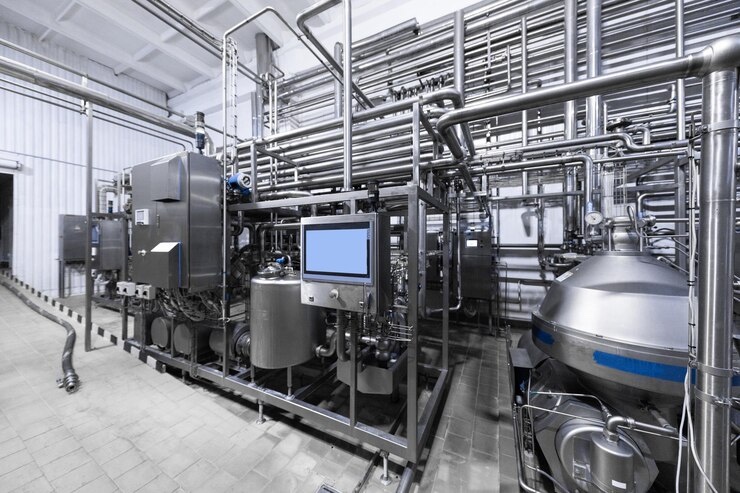
Custom Condenser Manufacturer
Table of Contents What Services Do Custom Condenser Manufacturers Offer? How To Choose The Best Custom Condenser Manufacturer For Your Needs? What Industries Benefit From Custom Condenser Manufacturing Services? How Long Does It Take For A Custom Condenser Manufacturer To Complete An Order? What Quality Control Measures Do Custom Condenser Manufacturers Employ? What Materials Are Commonly Used By Custom Condenser Manufacturers? What Services Do Custom Condenser Manufacturers Offer? Custom condenser manufacturers offer a range of specialized services to meet the unique needs and requirements of their customers. One primary service is custom engineering and design, where manufacturers work closely with clients to develop tailored condenser solutions that address specific application challenges. This involves conducting thorough assessments of the operating conditions, fluid properties, space constraints, and performance objectives to create customized condenser designs optimized for efficiency, reliability, and cost-effectiveness. Additionally, custom condenser manufacturers provide prototyping and testing services to validate the performance and functionality of the proposed designs before full-scale production. Moreover, custom condenser manufacturers offer comprehensive project management services to oversee the entire project lifecycle, from initial concept development to final installation and commissioning. This includes coordinating with suppliers, managing timelines and budgets, and ensuring compliance with regulatory requirements and industry standards. Furthermore, manufacturers may offer aftermarket support services such as maintenance, repair, and spare parts supply to ensure ongoing performance and reliability of custom condenser units throughout their operational lifespan. By offering these specialized services, custom condenser manufacturers enable industrial clients to obtain tailored cooling solutions that meet their specific needs, performance requirements, and budget constraints effectively. How To Choose The Best Custom Condenser Manufacturer For Your Needs? Choosing the best custom condenser manufacturer for your needs requires careful consideration of several factors. Firstly, assess the manufacturer's expertise and experience in custom condenser design, engineering, and manufacturing. Look for manufacturers with a proven track record of delivering high-quality, reliable custom solutions for a diverse range of industries and applications. Additionally, consider the manufacturer's capabilities in terms of technology, facilities, and resources. A manufacturer equipped with advanced design software, state-of-the-art manufacturing technologies, and experienced engineering teams is better positioned to meet your specific requirements and deliver innovative solutions. Furthermore, evaluate the manufacturer's reputation and reliability in the industry. Seek feedback from past clients, read customer reviews, and review case studies to gauge the manufacturer's performance, customer satisfaction levels, and adherence to deadlines and budgets. Additionally, consider factors such as responsiveness, communication, and customer support. A manufacturer that communicates effectively, responds promptly to inquiries, and provides excellent customer service throughout the project lifecycle is more likely to deliver a positive experience and satisfactory results. Lastly, assess the manufacturer's commitment to quality, safety, and compliance. Ensure that the manufacturer adheres to industry standards, certifications, and regulatory requirements relevant to custom condenser manufacturing. By carefully evaluating these factors, you can choose the best custom condenser manufacturer that aligns with your needs, expectations, and project goals effectively. What Industries Benefit From Custom Condenser Manufacturing Services? Custom condenser manufacturing services cater to a wide range of industries that require specialized cooling solutions tailored to their unique needs and applications. One such industry is power generation, where custom condensers are essential components in steam turbine power plants. These condensers play a crucial role in converting steam back into liquid form by extracting heat, thus improving the overall efficiency of power generation processes. Additionally, industries such as chemical processing rely on custom condensers for various applications such as distillation, solvent recovery, and chemical synthesis. Custom condenser solutions enable precise temperature control, efficient heat transfer, and optimal process performance in chemical manufacturing operations. Furthermore, industries such as petroleum refining, HVAC (heating, ventilation, and air conditioning), food and beverage processing, pharmaceutical manufacturing, and automotive manufacturing also benefit from custom condenser manufacturing services to meet their specific cooling requirements effectively. By providing tailored solutions, custom condenser manufacturers support the diverse needs of these industries, ensuring efficient operation, reliability, and productivity in their processes. How Long Does It Take For a Custom Condenser Manufacturer to Complete an Order? The time it takes for a custom condenser manufacturer to complete an order can vary depending on several factors. One significant factor is the complexity of the custom condenser design and specifications. More intricate designs with specific requirements may require additional time for engineering and customization. Additionally, the availability of materials and components can impact lead times, especially if certain materials need to be sourced or manufactured to meet project specifications. Furthermore, the manufacturer's current workload and production capacity can influence turnaround times. A manufacturer with a higher workload or limited production capacity may have longer lead times compared to one with more resources and flexibility. Overall, custom condenser manufacturers typically provide estimated lead times based on the project scope, complexity, and current production schedules to give customers a clear expectation of when their orders will be completed. What Quality Control Measures Do Custom Condenser Manufacturers Employ? Custom condenser manufacturers implement a range of quality control measures to ensure that their products meet the highest standards of performance, reliability, and safety. One common practice is rigorous material inspection and testing. Manufacturers carefully examine incoming materials and components to verify their quality, integrity, and compliance with specifications. This includes dimensional checks, material composition analysis, and testing for mechanical properties such as strength and durability. Additionally, manufacturers employ advanced manufacturing techniques and technologies to maintain consistency and precision in component fabrication. This includes CNC machining, robotic welding, and automated assembly processes, which minimize variations and defects in the finished product. Furthermore, custom condenser manufacturers conduct comprehensive testing and validation procedures to verify the performance and functionality of the condenser units. This includes pressure testing, leak testing, and performance testing under simulated operating conditions to ensure that the condensers meet design specifications and performance requirements. Additionally, manufacturers may undergo certifications and audits by independent organizations such as ISO (International Organization for Standardization) or ASME (American Society of Mechanical Engineers) to validate their quality management systems and adherence to industry standards. By implementing these quality control measures, custom condenser manufacturers ensure that their products consistently deliver superior performance, reliability, and durability, ultimately providing value and peace of mind to their customers. What Materials are Commonly Used by Custom Condenser Manufacturers? Custom condenser manufacturers utilize a variety of materials to meet the diverse needs and requirements of their customers. One of the most commonly used materials is stainless steel, known for its excellent corrosion resistance, mechanical properties, and durability. Stainless steel is particularly well-suited for condenser applications in industries such as power generation, chemical processing, and food and beverage, where exposure to corrosive environments is a concern. Additionally, copper and copper alloys are widely used in condenser manufacturing due to their superior thermal conductivity, making them ideal for heat transfer applications. Copper tubes and fins are often employed in condenser designs to enhance heat exchange efficiency and performance. Moreover, aluminum alloys are another popular choice for custom condenser manufacturers, offering a combination of lightweight, corrosion resistance, and thermal conductivity. Aluminum condensers are commonly used in automotive cooling systems, HVAC applications, and air-cooled condenser units where weight savings and thermal efficiency are critical. Furthermore, custom condenser manufacturers may also utilize specialized materials such as titanium, brass, and various polymer composites to meet specific performance requirements or address unique operating conditions. By leveraging a range of materials, custom condenser manufacturers can tailor their products to the specific needs of their customers, ensuring optimal performance, longevity, and reliability in various industrial applications.
Read More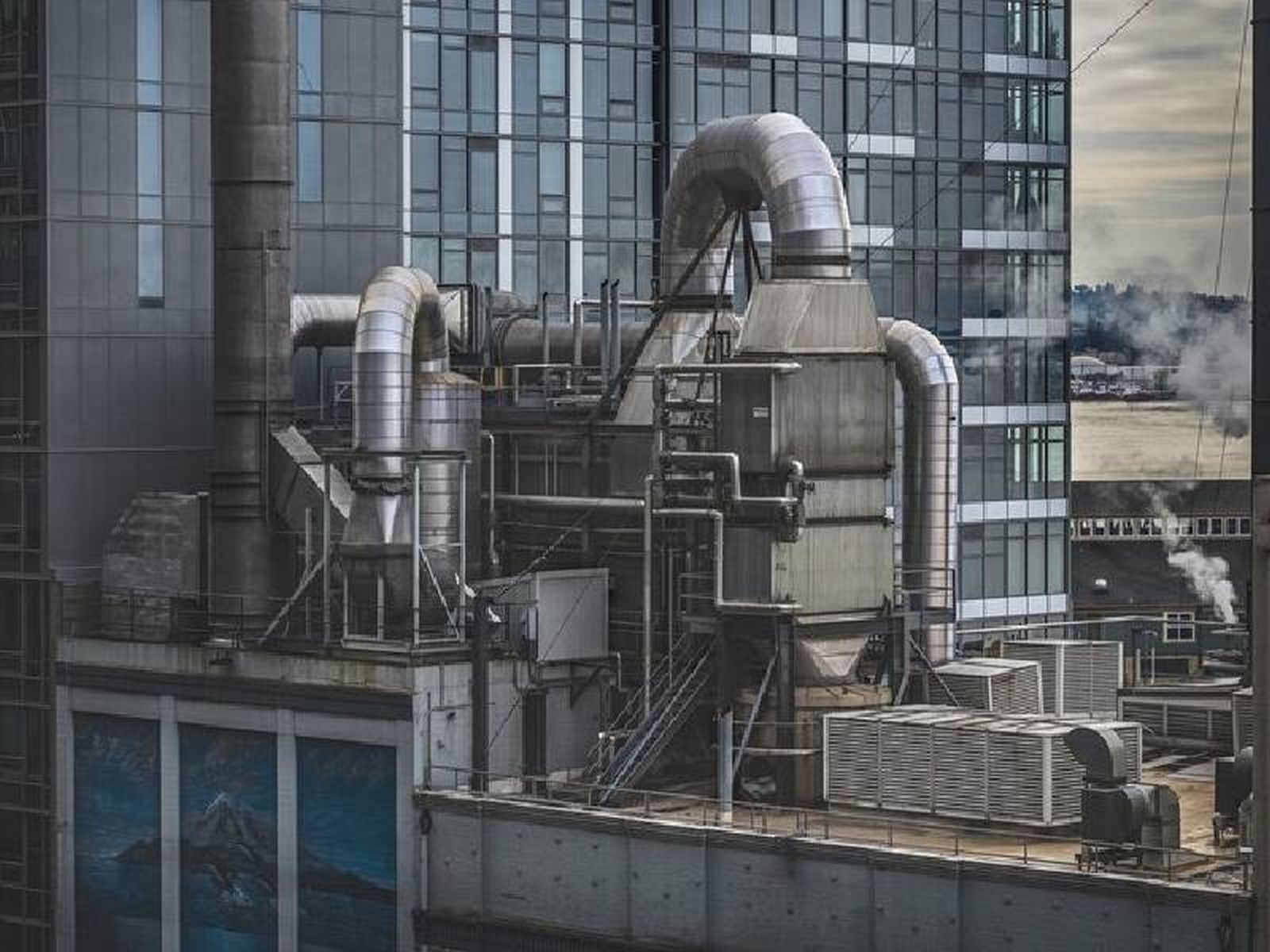
Condenser Manufacturer
Table of Contents According To Which Criteria Should A Condenser Manufacturer Be Selected? What Are The Advantages Of Co-Operating With A Condenser Manufacturer? What Types Of Industries Do Condenser Manufacturers Serve? What Are The Different Products And Services Offered By Condenser Manufacturers? How Do Condenser Manufacturers Provide Quality Products? What Types Of Technologies Do Condenser Manufacturers Use? According to Which Criteria Should a Condenser Manufacturer be Selected? When selecting a condenser manufacturer, several key criteria should be considered to ensure the optimal performance and reliability of the condenser unit. Firstly, it's essential to assess the manufacturer's reputation and track record in the industry. Researching customer reviews, testimonials, and case studies can provide insights into the manufacturer's reliability, product quality, and customer satisfaction levels. Additionally, evaluating the manufacturer's experience and expertise in condenser design, engineering, and manufacturing is crucial. A manufacturer with extensive experience and specialized knowledge in condenser technology is more likely to deliver high-quality products that meet specific application requirements. Another important criterion is the manufacturer's adherence to industry standards and certifications. Ensure that the manufacturer complies with relevant industry standards such as ASME, ISO, or API, which guarantee the quality, safety, and performance of the condenser units. Moreover, consider the manufacturer's ability to customize condenser solutions to meet unique project requirements. A manufacturer that offers flexible design options, custom engineering capabilities, and tailored solutions can better address the specific needs and challenges of each application. Additionally, evaluating the manufacturer's technical support, after-sales service, and warranty offerings is essential for ongoing support and maintenance of the condenser unit throughout its lifecycle. By carefully considering these criteria, industrial users can select a condenser manufacturer that offers reliable, high-performance solutions tailored to their specific needs and requirements. What Are The Advantages of Co-operating With a Condenser Manufacturer? Collaborating with a condenser manufacturer offers several advantages for industrial users seeking reliable and efficient cooling solutions. Firstly, condenser manufacturers typically possess specialized expertise and experience in condenser design, engineering, and manufacturing. By leveraging their knowledge and skills, industrial users can benefit from customized condenser solutions tailored to their specific application requirements. Manufacturers can offer valuable insights and recommendations on the most suitable condenser design, materials, and configurations to optimize performance, energy efficiency, and operational reliability. Secondly, partnering with a condenser manufacturer provides access to advanced technologies and innovative solutions. Manufacturers often invest in research and development to enhance their product offerings and stay abreast of industry trends and advancements. By collaborating with a manufacturer at the forefront of technological innovation, industrial users can access cutting-edge condenser technologies that offer improved performance, efficiency, and sustainability. Additionally, condenser manufacturers typically provide comprehensive technical support, customer service, and after-sales assistance. This ensures seamless integration, installation, and operation of the condenser unit, as well as ongoing maintenance, troubleshooting, and parts replacement services as needed. Overall, cooperating with a condenser manufacturer offers industrial users access to expertise, innovation, and support to meet their cooling needs effectively and efficiently. What Types of Industries do Condenser Manufacturers Serve? Condenser manufacturers serve a diverse range of industries that rely on efficient cooling systems for their operations. One prominent sector is the power generation industry, where condensers play a vital role in steam turbine power plants. These condensers extract heat from steam exiting the turbine, converting it back into liquid form for re-circulation, thus improving the overall efficiency of power generation. Another key industry is the chemical processing sector, where condensers are used in various processes such as distillation, solvent recovery, and chemical synthesis. Condensers help cool and condense vaporized chemicals, enabling separation and purification of different components in chemical mixtures. Additionally, condenser manufacturers cater to industries such as petroleum refining, where condensers are integral to processes like oil refining, gas processing, and petrochemical production. In HVAC (heating, ventilation, and air conditioning) systems, condenser units are essential for cooling refrigerants in air conditioning and refrigeration applications across residential, commercial, and industrial buildings. Furthermore, condenser manufacturers serve industries such as food and beverage processing, pharmaceutical manufacturing, and automotive manufacturing, where cooling systems are essential for maintaining product quality, process efficiency, and equipment performance. Overall, condenser manufacturers play a crucial role in supporting a wide array of industries by providing reliable and efficient cooling solutions tailored to their specific needs and applications. What Are The Different Products and Services Offered by Condenser Manufacturers? Condenser manufacturers offer a variety of products and services to meet the diverse cooling needs of their customers across different industries. One primary product offered by condenser manufacturers is the condenser unit itself, available in various configurations such as shell-and-tube, plate, or air-cooled condensers. These units are designed to efficiently transfer heat and condense vapor into liquid form, essential for processes like power generation, chemical processing, HVAC systems, and more. Additionally, condenser manufacturers may provide custom-engineered solutions tailored to specific project requirements, offering flexibility in design, material selection, and performance specifications. In addition to manufacturing condenser units, condenser manufacturers often offer a range of associated products and services to support their customers throughout the entire project lifecycle. This includes engineering and design services to assist with system layout, sizing, and integration into existing processes. They may also provide installation, commissioning, and maintenance services to ensure proper operation and longevity of the condenser units. Furthermore, condenser manufacturers may offer spare parts, retrofitting, and upgrade services to extend the lifespan and enhance the performance of existing condenser systems. Overall, condenser manufacturers strive to deliver comprehensive solutions encompassing products, engineering expertise, and support services to meet the cooling needs of various industries effectively. How Do Condenser Manufacturers Provide Quality Products? Condenser manufacturers ensure the quality of their products through a combination of rigorous quality control processes, advanced manufacturing techniques, and adherence to industry standards. One key aspect is the use of high-quality materials and components sourced from reputable suppliers. Manufacturers carefully select materials such as stainless steel, copper, or aluminum alloys known for their corrosion resistance, thermal conductivity, and durability. Additionally, condenser manufacturers employ state-of-the-art manufacturing processes and technologies to ensure precision, consistency, and reliability in the production of condenser units. This includes advanced welding techniques, precision machining, and automated assembly lines to minimize defects and ensure product quality. Moreover, condenser manufacturers implement stringent quality control measures at every stage of the manufacturing process, from raw material inspection to final product testing. This includes comprehensive material testing, dimensional checks, pressure testing, and performance validation to verify conformance to design specifications and industry standards. Additionally, manufacturers often undergo certifications and audits by independent organizations such as ISO (International Organization for Standardization) or ASME (American Society of Mechanical Engineers) to demonstrate compliance with quality management systems and regulatory requirements. By prioritizing quality at every step of the manufacturing process, condenser manufacturers ensure that their products meet the highest standards of performance, reliability, and longevity, ultimately delivering value and satisfaction to their customers. What Types of Technologies Do Condenser Manufacturers Use? Condenser manufacturers utilize a variety of technologies to design, engineer, and manufacture efficient and reliable condenser units. One of the primary technologies employed is computer-aided design (CAD) and modeling software, which allows engineers to create detailed 3D models of condenser components and systems. CAD software enables precise design iterations, optimization of thermal performance, and integration of complex features such as fins, tubes, and baffles for enhanced heat transfer. Additionally, manufacturers utilize computational fluid dynamics (CFD) simulations to analyze fluid flow patterns, heat transfer characteristics, and pressure distributions within condenser units. CFD simulations help optimize the design of heat exchanger surfaces, improve thermal efficiency, and minimize pressure drop across the system. Furthermore, condenser manufacturers leverage advanced manufacturing technologies such as CNC (computer numerical control) machining, laser cutting, and robotic welding to ensure precision and consistency in component fabrication. These technologies enable tight tolerances, intricate geometries, and high-quality finishes, resulting in reliable and durable condenser units. Additionally, manufacturers may employ advanced materials and coatings technologies to enhance the corrosion resistance, thermal conductivity, and durability of condenser components. For example, nanostructured coatings or corrosion-resistant alloys can improve the performance and longevity of condenser tubes in harsh operating environments. Overall, condenser manufacturers harness a range of advanced technologies to deliver innovative, high-performance condenser solutions that meet the demanding requirements of various industrial applications.
Read More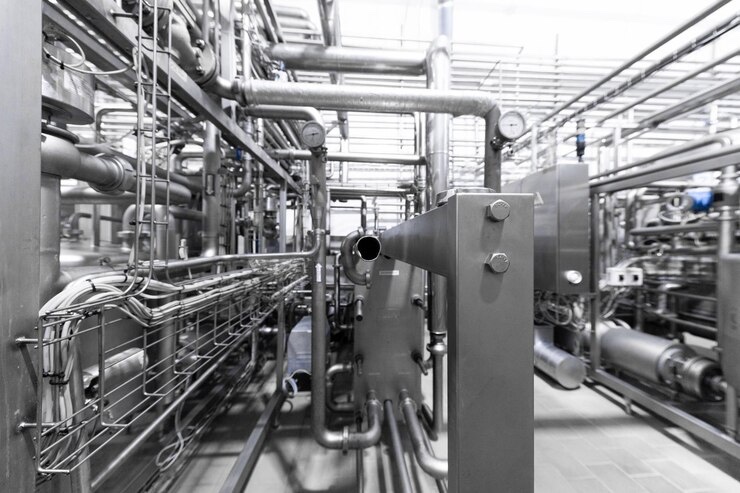
Industrial Heat Exchangers
Table of Contents What are Industrial Heat Exchangers and How Do They Work? In Which Industrial Processes Are Industrial Heat Exchangers Used? What Kind of Materials are Industrial Heat Exchangers Made of? What Are the Types of Industrial Heat Exchangers and What Are Their Functions? What Methods Can Be Used to Improve the Efficiency of Industrial Heat Exchangers? What Should Be Considered When Choosing Heat Exchangers? What are Industrial Heat Exchangers and How Do They Work? Industrial heat exchangers are devices used to transfer heat between two or more fluids, typically for the purpose of cooling or heating processes in various industrial applications. These devices are crucial in industries such as power generation, chemical processing, petroleum refining, HVAC systems, and food processing, among others. Heat exchangers work on the principle of thermal conductivity, where heat is transferred from a hot fluid to a cooler fluid without the fluids coming into direct contact. They consist of a series of tubes, plates, or coils through which the fluids flow, allowing heat to be exchanged. In most cases, one fluid flows inside the tubes or channels, while the other flows outside, facilitating the transfer of heat between them. Industrial heat exchangers come in various types, including shell-and-tube, plate-and-frame, spiral, and finned-tube heat exchangers, each designed for specific applications and operating conditions. These devices operate based on the principle of heat transfer through conduction, convection, and radiation. The hot fluid transfers its heat to the walls of the heat exchanger, which then transfers the heat to the cooler fluid through the surface area of contact. As the fluids flow through the heat exchanger, temperature gradients drive the heat transfer process, allowing the desired temperature adjustments to be achieved. The efficiency and effectiveness of industrial heat exchangers depend on factors such as the design, material construction, flow rates, temperature differentials, and fluid properties. Proper maintenance and monitoring are essential to ensure optimal performance and longevity of heat exchangers in industrial operations. In Which Industrial Processes Are Industrial Heat Exchangers Used? Industrial heat exchangers find widespread use in a variety of industrial processes across numerous sectors. One common application is in power generation, where heat exchangers are employed to extract heat from steam produced by boilers and transfer it to water to generate steam for turbines. In chemical processing plants, heat exchangers play a critical role in heating or cooling chemicals during reactions, distillation, or separation processes. They are also integral to petroleum refining processes, where they facilitate the heating or cooling of crude oil, gas, or various petroleum products. Additionally, heat exchangers are essential components in HVAC (heating, ventilation, and air conditioning) systems, where they regulate the temperature of air or water for comfort or process cooling purposes in buildings, hospitals, data centers, and other facilities. Moreover, heat exchangers are utilized in food processing industries for tasks such as pasteurization, sterilization, and heating or cooling of food products during manufacturing or preservation processes. Overall, industrial heat exchangers are indispensable in enhancing efficiency, optimizing energy usage, and maintaining optimal operating conditions in a wide range of industrial processes. What Kind of Materials are Industrial Heat Exchangers Made of? Industrial heat exchangers are constructed from a variety of materials chosen based on factors such as the operating conditions, the type of fluids being processed, and the desired longevity of the heat exchanger. Common materials include metals such as stainless steel, carbon steel, copper, and aluminum. Stainless steel is often preferred for its corrosion resistance and durability, making it suitable for applications involving corrosive fluids or high temperatures. Carbon steel is another popular choice due to its strength and affordability, although it may be susceptible to corrosion in certain environments. Copper is valued for its excellent thermal conductivity, making it ideal for heat exchangers requiring efficient heat transfer. Aluminum is lightweight and offers good thermal conductivity, making it suitable for applications where weight is a concern, such as automotive or aerospace industries. In addition to metals, industrial heat exchangers may also utilize non-metallic materials such as ceramics, plastics, and composites in certain specialized applications. Ceramic materials offer high resistance to corrosion and thermal shock, making them suitable for extreme operating conditions. Plastics such as polyethylene and polypropylene are used in heat exchangers handling corrosive fluids due to their chemical resistance and affordability. Composites, which are made from a combination of materials such as fiberglass and epoxy, offer a balance of strength, corrosion resistance, and light weight, making them suitable for specific industrial requirements. Overall, the choice of materials for industrial heat exchangers is crucial in ensuring optimal performance, durability, and safety in various industrial processes. What Are the Types of Industrial Heat Exchangers and What Are Their Functions? Industrial heat exchangers come in several types, each designed for specific applications and operating conditions. One common type is the shell-and-tube heat exchanger, consisting of a cylindrical shell with multiple tubes running through it. Fluid flows through the tubes while another fluid circulates around the tubes within the shell. These heat exchangers are versatile and widely used in various industries for tasks such as cooling or heating liquids, gases, or vapors. Plate heat exchangers are another popular type, featuring multiple thin plates stacked together with alternating channels for the passage of fluids. They offer efficient heat transfer and compact design, making them suitable for applications with space constraints, such as HVAC systems, refrigeration, and food processing. Another type is the finned-tube heat exchanger, which incorporates fins attached to the tubes to increase the surface area for heat transfer. These heat exchangers are commonly used in HVAC systems, air conditioning, and refrigeration to enhance heat transfer efficiency. Additionally, spiral heat exchangers utilize coiled or spiral-shaped tubes to achieve efficient heat transfer in applications with high fouling or viscous fluids. They are used in industries such as pulp and paper, wastewater treatment, and chemical processing. Each type of industrial heat exchanger serves specific functions such as heating, cooling, condensing, evaporating, or recovering waste heat in various industrial processes. By selecting the appropriate type of heat exchanger based on the application requirements, industries can optimize energy usage, enhance process efficiency, and ensure reliable operation. What Methods Can Be Used to Improve the Efficiency of Industrial Heat Exchangers? Improving the efficiency of industrial heat exchangers is essential for optimizing energy usage and enhancing overall process performance. One method to achieve this is by increasing the heat transfer surface area within the heat exchanger. This can be accomplished by using fins, turbulators, or corrugated surfaces on the heat transfer surfaces to promote turbulence and enhance heat transfer rates. Additionally, employing advanced heat transfer enhancement techniques such as microchannel heat exchangers or structured surfaces can further increase efficiency by maximizing heat transfer coefficients. Another approach is to optimize the design and configuration of heat exchangers to minimize pressure drop while maximizing heat transfer. This involves carefully selecting the size, shape, and arrangement of heat transfer surfaces to ensure uniform flow distribution and minimize flow resistance. Furthermore, improving fluid properties or enhancing fluid flow characteristics can contribute to better heat exchanger performance. This can be achieved by using high-performance heat transfer fluids, such as nanofluids or phase change materials, which offer superior thermal conductivity compared to traditional fluids. Additionally, employing advanced flow control techniques such as flow modulation, swirl flow, or fluid pulsation can help enhance turbulence and promote efficient heat transfer. Regular maintenance and cleaning of heat exchangers are also crucial for maintaining efficiency over time. Removing fouling deposits, scaling, or corrosion from heat transfer surfaces can restore heat exchanger performance and prevent efficiency losses. Overall, implementing these methods can significantly improve the efficiency of industrial heat exchangers, leading to energy savings, reduced operating costs, and improved process reliability. What Should Be Considered When Choosing Heat Exchangers? Several factors should be taken into consideration when selecting heat exchangers for industrial applications. Firstly, it's crucial to assess the specific requirements of the intended application, including the desired temperature range, flow rates, pressure conditions, and the type of fluids involved. Different heat exchanger types and designs are better suited for particular operating conditions, so understanding these parameters is essential for choosing the most appropriate solution. Secondly, considering the material compatibility with the process fluids is vital to prevent corrosion, fouling, or degradation of the heat exchanger components. Choosing materials with excellent corrosion resistance and thermal conductivity can ensure long-term reliability and efficiency. Furthermore, evaluating the space available for installation and the overall footprint of the heat exchanger is important, especially in applications with limited space constraints. Plate heat exchangers, for example, offer a compact design suitable for tight spaces, while shell-and-tube heat exchangers may require more space but offer versatility and higher heat transfer capabilities. Additionally, considering factors such as ease of maintenance, accessibility for cleaning, and potential for future expansion or modification is crucial for long-term operational efficiency. Lastly, comparing the initial investment costs, operating expenses, and expected lifecycle costs of different heat exchanger options can help determine the most cost-effective solution for the specific application. By carefully considering these factors, industrial users can select heat exchangers that meet their performance requirements, budget constraints, and operational needs effectively.
Read More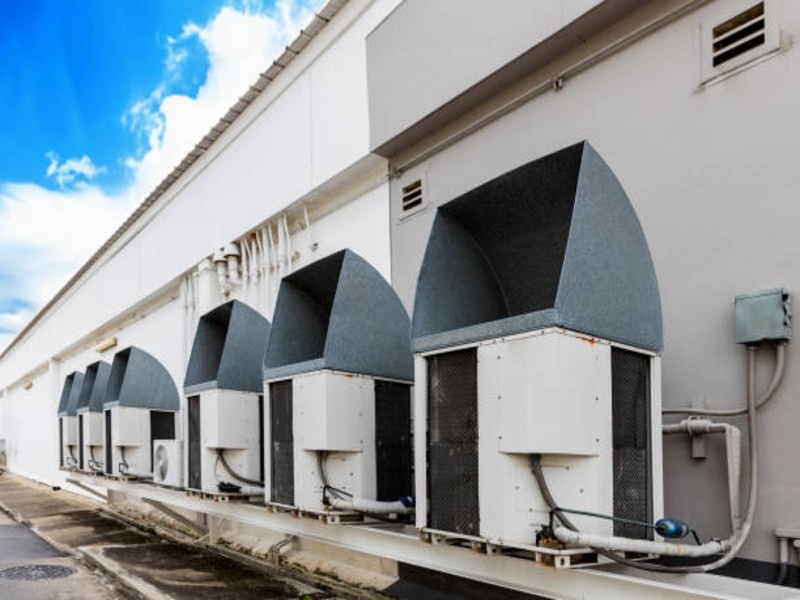
Refrigeration System Suppliers
What Factors Should Businesses Consider When Choosing Refrigeration System Suppliers? When selecting refrigeration system suppliers, businesses should carefully consider several key factors to ensure they make the most suitable choice for their needs. Firstly, product quality and reliability are paramount. Businesses should assess the supplier's reputation for manufacturing high-quality refrigeration systems that meet industry standards and specifications. This involves examining the materials used, construction techniques, and adherence to quality control processes. Additionally, businesses should evaluate the supplier's experience and expertise in refrigeration technology. Suppliers with a proven track record and extensive knowledge can provide valuable insights and recommendations to help businesses select the most appropriate refrigeration system for their specific applications. Moreover, businesses should consider the supplier's ability to offer comprehensive support and services throughout the entire lifecycle of the refrigeration system. This includes assistance with system design, installation, commissioning, and ongoing maintenance. A reliable supplier will provide responsive customer support, technical expertise, and timely delivery of parts and components, ensuring smooth integration and optimal performance of the refrigeration system. Additionally, businesses should assess the supplier's commitment to energy efficiency and sustainability. Refrigeration systems consume a significant amount of energy, so choosing a supplier that offers energy-efficient solutions can help businesses reduce operating costs and minimize their environmental footprint. By carefully evaluating these factors, businesses can make informed decisions when choosing refrigeration system suppliers and ultimately optimize their cold chain operations for efficiency and reliability. How Do Refrigeration System Suppliers Ensure the Quality and Efficiency of Their Products? Refrigeration system suppliers implement various measures to guarantee the quality and efficiency of their products, starting with meticulous selection of components and materials. They source high-quality compressors, evaporators, condensers, and other critical parts from reputable manufacturers known for reliability and performance. Additionally, suppliers prioritize advanced engineering and design processes to optimize system efficiency. Through computer-aided design (CAD) software and simulation tools, they fine-tune system configurations to minimize energy consumption and maximize cooling capacity. Moreover, suppliers conduct rigorous testing and quality assurance procedures throughout the manufacturing process. This includes performance testing under various operating conditions, such as temperature extremes and load capacities, to validate system reliability and efficiency. Additionally, suppliers often adhere to industry standards and certifications, such as ENERGY STAR and ASHRAE, to demonstrate compliance with energy efficiency guidelines. Furthermore, suppliers may offer innovative features such as variable-speed compressors, thermal insulation enhancements, and smart control systems to further improve system efficiency and performance. By prioritizing quality control measures, advanced technology, and adherence to industry standards, refrigeration system suppliers ensure that their products deliver optimal performance and efficiency to meet the needs of their customers. Which Industries Commonly Rely on Refrigeration System Suppliers for Their Operations? Refrigeration system suppliers play a crucial role in various industries where temperature control and preservation of perishable goods are essential. One such industry is the food and beverage sector, where refrigeration systems are used for storing, transporting, and preserving food products. From food processing plants to grocery stores and restaurants, reliable refrigeration systems are vital for maintaining food quality, freshness, and safety. Additionally, the pharmaceutical and healthcare industries heavily rely on refrigeration system suppliers for storing medications, vaccines, and biological samples at precise temperature ranges to ensure efficacy and compliance with regulatory standards. Moreover, industries such as chemicals, manufacturing, and logistics utilize refrigeration systems for cooling processes, equipment, and warehouses. Overall, refrigeration system suppliers serve as indispensable partners across various sectors, enabling businesses to meet stringent temperature control requirements and maintain efficient operations. What Types of Refrigeration Systems Are Offered by Leading Suppliers in the Market? Leading refrigeration system suppliers offer a diverse range of refrigeration systems to meet the specific needs of various industries and applications. One common type is the vapor compression refrigeration system, which is widely used in commercial and industrial settings. These systems employ compressors, condensers, evaporators, and refrigerants to remove heat from a space or substance, providing efficient cooling for food storage, HVAC applications, and process cooling. Another popular option is the absorption refrigeration system, which utilizes a heat source such as natural gas or waste heat to drive the refrigeration cycle. Absorption systems are often used in areas where electricity is limited or expensive, such as remote locations or off-grid facilities. Moreover, leading suppliers often offer specialized refrigeration systems tailored to specific industries or requirements. For instance, in the food and beverage industry, suppliers provide walk-in coolers, refrigerated display cases, and blast chillers designed to meet the unique storage and preservation needs of perishable goods. In the pharmaceutical sector, suppliers offer medical-grade refrigeration systems with precise temperature control and monitoring capabilities to store vaccines, medications, and biological samples safely. Additionally, suppliers may offer innovative and energy-efficient refrigeration solutions, such as cascade refrigeration systems, hybrid systems, and variable refrigerant flow (VRF) systems, to meet the evolving demands of their customers and regulatory standards. Overall, leading refrigeration system suppliers strive to offer a comprehensive range of high-quality refrigeration solutions, catering to the diverse needs of their customers across various industries. How Do Refrigeration System Suppliers Customize Solutions to Meet Specific Requirements? Refrigeration system suppliers excel in customizing solutions to meet specific requirements by leveraging their expertise, innovation, and flexibility. They begin by conducting thorough consultations with clients to understand their unique needs, operational constraints, and performance criteria. This involves gathering detailed information about the application, including temperature ranges, space limitations, energy efficiency goals, and regulatory compliance requirements. Based on this information, suppliers utilize advanced engineering capabilities and industry knowledge to develop tailored refrigeration solutions that precisely align with the client's specifications. Furthermore, refrigeration system suppliers offer flexibility in design and configuration options to accommodate diverse client needs. This includes selecting the most suitable refrigeration technology, such as vapor compression or absorption systems, and incorporating additional features or accessories to enhance performance or meet specific regulatory standards. Additionally, suppliers may offer modular designs or scalable solutions that can be easily adapted or expanded as client needs evolve over time. Throughout the customization process, suppliers maintain open communication with clients, providing regular updates, prototypes, and opportunities for feedback to ensure alignment with the client's expectations. By prioritizing collaboration, innovation, and flexibility, refrigeration system suppliers deliver tailored solutions that address the unique challenges and requirements of their clients, ultimately enhancing performance, efficiency, and reliability in various industries and applications. What Are the Benefits of Partnering With Reputable Refrigeration System Suppliers? Partnering with reputable refrigeration system suppliers offers numerous benefits for businesses seeking reliable and efficient cooling solutions. Firstly, reputable suppliers prioritize product quality and reliability, ensuring that their refrigeration systems are built to the highest standards using premium materials and advanced manufacturing techniques. This translates to superior performance, durability, and longevity, reducing the risk of unexpected downtime and costly repairs. Additionally, reputable suppliers often have extensive experience and expertise in refrigeration technology, enabling them to provide valuable guidance and support throughout the partnership. From initial consultation to after-sales service, businesses can rely on their supplier's knowledge and assistance to optimize their refrigeration systems for maximum efficiency and effectiveness. Moreover, partnering with reputable refrigeration system suppliers fosters trust and confidence in the supply chain. Businesses can rest assured that they are receiving genuine, high-quality products backed by reputable warranties and customer service commitments. This reliability is particularly crucial for industries where uninterrupted operation is critical, such as food and beverage, pharmaceuticals, and healthcare. Furthermore, reputable suppliers often offer a wide range of refrigeration system options, including custom solutions tailored to specific requirements. This versatility allows businesses to find the perfect refrigeration solution to suit their unique needs, whether it's for cold storage, process cooling, or temperature-controlled transportation. Overall, partnering with reputable refrigeration system suppliers empowers businesses to optimize their operations, minimize risks, and achieve long-term success in their respective industries.
Read More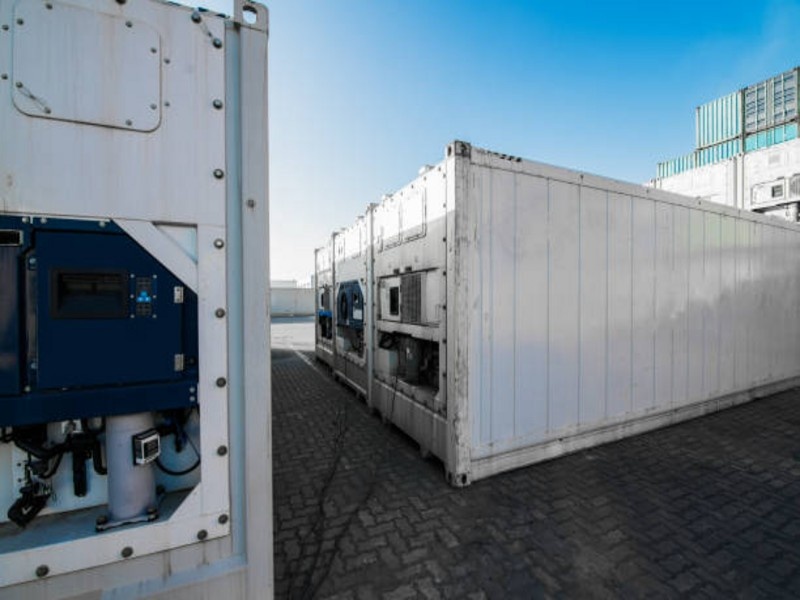
Cooling Equipment Suppliers
What Factors Should Businesses Consider When Selecting Cooling Equipment Suppliers? When selecting cooling equipment suppliers, businesses should consider several critical factors to ensure they make the most suitable choice for their needs. Firstly, product quality and reliability are paramount. Businesses should thoroughly assess the supplier's reputation for manufacturing high-quality cooling equipment that meets industry standards and specifications. This involves examining the materials used, construction techniques, and adherence to quality control processes. Additionally, businesses should evaluate the supplier's experience and expertise in cooling technology. Suppliers with a proven track record and extensive knowledge can provide valuable insights and recommendations to help businesses select the most appropriate cooling equipment for their specific applications. Moreover, businesses should assess the supplier's ability to offer customized solutions and flexibility. Each business may have unique requirements or operating conditions that necessitate tailored cooling equipment solutions. Therefore, businesses should partner with suppliers who can accommodate customization options and offer flexibility in design and configuration. This allows for the adaptation of cooling equipment to fit specific space constraints, performance criteria, or compatibility with existing systems. Additionally, businesses should consider the supplier's customer support and service capabilities. A responsive and reliable supplier will provide ongoing support, technical assistance, and timely delivery of products, ensuring smooth integration and operation of cooling equipment within the business's processes. By carefully evaluating these factors, businesses can make informed decisions when choosing cooling equipment suppliers and ultimately optimize their thermal management systems for efficiency and performance. How Do Cooling Equipment Suppliers Ensure the Reliability and Performance of Their Products? Cooling equipment suppliers employ various strategies to ensure the reliability and performance of their products, starting with the selection of high-quality materials and components. These suppliers source materials from trusted suppliers known for their reliability and durability, ensuring that their cooling equipment can withstand the rigors of demanding operating conditions. Additionally, suppliers invest in advanced manufacturing processes and technologies to maintain consistency and precision in production. Automated assembly lines, CNC machining, and robotic welding minimize errors and ensure uniformity in the construction of cooling equipment, reducing the risk of defects or weaknesses in the final product. Furthermore, cooling equipment suppliers conduct rigorous testing and quality control measures throughout the manufacturing process. Performance testing, including pressure testing, thermal cycling, and vibration analysis, simulates real-world operating conditions and verifies the reliability and efficiency of the cooling equipment. Any potential issues are identified and addressed before the products are released to the market, ensuring that customers receive reliable and high-performing cooling solutions. Additionally, suppliers often adhere to industry standards and certifications, such as ISO 9001, to demonstrate their commitment to quality management systems and regulatory compliance. By prioritizing quality control measures, testing protocols, and adherence to standards, cooling equipment suppliers instill confidence in the reliability and performance of their products, ultimately satisfying customer needs and expectations. Which Industries Commonly Rely on Cooling Equipment Suppliers for Their Operations? Cooling equipment suppliers play a crucial role in various industries that require effective thermal management solutions to maintain optimal operating conditions. One such industry is manufacturing, where cooling equipment is essential for regulating temperatures in industrial processes and machinery. From metal fabrication to plastic molding, manufacturing operations generate significant heat that must be efficiently dissipated to prevent equipment damage and ensure product quality. Cooling equipment suppliers provide a wide range of solutions, including chillers, cooling towers, and air conditioning units, tailored to meet the specific needs of manufacturing facilities. Additionally, the data center industry heavily relies on cooling equipment suppliers to maintain the temperature and humidity levels necessary for optimal server performance. As data centers host an increasing amount of computing equipment in confined spaces, effective cooling becomes paramount to prevent overheating and equipment failure. Cooling equipment suppliers offer precision cooling solutions, such as computer room air conditioners (CRAC) and liquid cooling systems, designed to remove heat efficiently while minimizing energy consumption and operational costs. Moreover, industries such as food and beverage, pharmaceuticals, and healthcare rely on cooling equipment suppliers for refrigeration systems to preserve perishable goods, medications, and biological samples. Overall, cooling equipment suppliers serve as essential partners across various industries, enabling businesses to maintain efficient operations and meet regulatory requirements. What Types of Cooling Equipment Are Offered by Leading Suppliers in the Market? Leading cooling equipment suppliers offer a diverse range of cooling solutions to meet the specific needs of various industries and applications. One common type is the chiller, which is widely used for industrial and commercial cooling purposes. Chillers come in various configurations, including air-cooled and water-cooled, and use refrigeration cycles to remove heat from a liquid or air stream. These versatile systems are suitable for applications such as process cooling, HVAC, and food processing. Another popular option is cooling towers, which are commonly used in HVAC systems and industrial processes to remove heat from water or other fluids through evaporation. Cooling towers come in different designs, such as crossflow and counterflow, and offer efficient heat rejection while minimizing water usage. Moreover, leading suppliers often offer specialized cooling equipment tailored to specific industries or requirements. For instance, in the data center industry, suppliers provide precision cooling solutions such as computer room air conditioners (CRAC) and in-row cooling units designed to maintain precise temperature and humidity levels for optimal server performance. Additionally, suppliers offer refrigeration systems for applications such as food storage, pharmaceuticals, and chemical processing. These systems include walk-in coolers, refrigerated display cases, and cold storage facilities, ensuring the preservation of perishable goods and sensitive materials. Overall, leading cooling equipment suppliers strive to offer a comprehensive range of high-quality cooling solutions, catering to the diverse needs of their customers across various industries. How Do Cooling Equipment Suppliers Tailor Solutions to Meet Specific Client Needs? Cooling equipment suppliers excel in tailoring solutions to meet specific client needs by employing a combination of expertise, innovation, and customization options. Firstly, suppliers engage in thorough consultations with clients to understand their unique requirements, operating conditions, and performance criteria. This involves gathering detailed information about the application, including factors such as temperature ranges, space constraints, energy efficiency goals, and budget considerations. Based on this information, suppliers leverage their engineering capabilities and industry knowledge to develop customized cooling solutions that precisely align with the client's specifications. Moreover, cooling equipment suppliers offer flexibility in design and configuration options to accommodate diverse client needs. This includes selecting the most suitable cooling technology, such as air-cooled or water-cooled systems, and incorporating additional features or accessories to enhance performance or meet specific regulatory requirements. Additionally, suppliers may offer modular designs or scalable solutions that can be easily adapted or expanded as client needs evolve over time. Throughout the customization process, suppliers maintain open communication with clients, providing regular updates, prototypes, and opportunities for feedback to ensure alignment with the client's expectations. By prioritizing collaboration, innovation, and flexibility, cooling equipment suppliers deliver tailored solutions that address the unique challenges and requirements of their clients, ultimately enhancing performance, efficiency, and reliability in various industries and applications. What Are the Benefits of Partnering With Reputable Cooling Equipment Suppliers? Partnering with reputable cooling equipment suppliers offers several key benefits for businesses seeking reliable thermal management solutions. Firstly, reputable suppliers prioritize product quality and reliability, ensuring that their cooling equipment is built to the highest standards using premium materials and advanced manufacturing techniques. This translates to superior performance, durability, and longevity, reducing the risk of unexpected downtime and costly repairs. Additionally, reputable suppliers often have extensive experience and expertise in cooling technology, enabling them to provide valuable guidance and support throughout the partnership. From initial consultation to after-sales service, businesses can rely on their supplier's knowledge and assistance to optimize their thermal management systems for maximum efficiency and effectiveness. Furthermore, partnering with reputable cooling equipment suppliers fosters trust and confidence in the supply chain. Businesses can rest assured that they are receiving genuine, high-quality products backed by reputable warranties and customer service commitments. This reliability is particularly crucial for industries where uninterrupted operation is critical, such as manufacturing, data centers, and food processing. Moreover, reputable suppliers often offer a wide range of cooling equipment options, including custom solutions tailored to specific requirements. This versatility allows businesses to find the perfect cooling equipment solution to suit their unique needs, whether it's for a large-scale industrial project or a specialized application. Overall, partnering with reputable cooling equipment suppliers empowers businesses to optimize their operations, minimize risks, and achieve long-term success in their respective industries.
Read More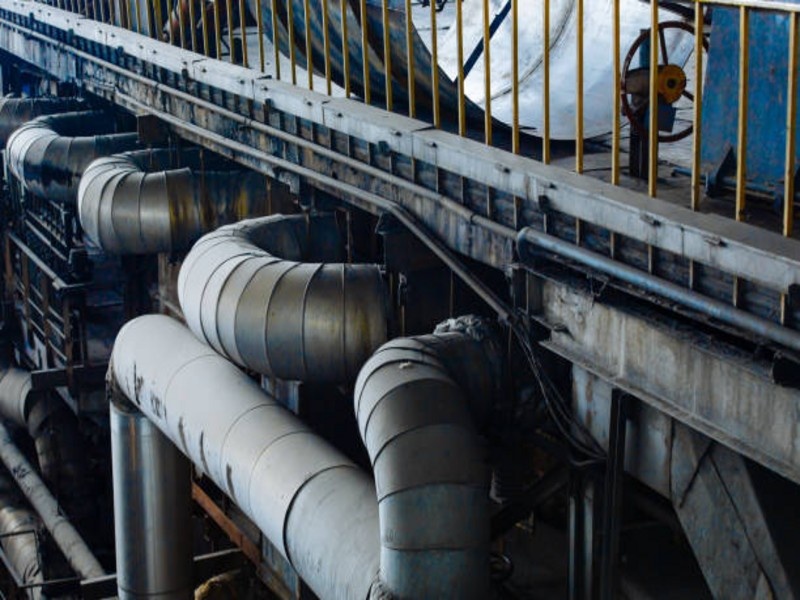
Heat Exchangers Suppliers
What Factors Should Businesses Consider When Choosing Heat Exchanger Suppliers? When selecting heat exchanger suppliers, businesses should carefully consider several key factors to ensure they make the most suitable choice for their needs. Firstly, product quality and reliability are paramount. Businesses should assess the supplier's reputation for manufacturing high-quality heat exchangers that meet industry standards and specifications. This includes examining the materials used, construction techniques, and adherence to quality control processes. Additionally, businesses should evaluate the supplier's experience and expertise in heat exchanger technology. Suppliers with a proven track record and extensive knowledge can provide valuable insights and recommendations to help businesses select the most appropriate heat exchanger design for their specific applications. Another critical factor to consider is customization and flexibility. Each business may have unique requirements or operating conditions that necessitate customized heat exchanger solutions. Therefore, businesses should partner with suppliers who offer flexibility in design and customization options. This allows for the adaptation of heat exchangers to fit specific space constraints, performance criteria, or compatibility with existing systems. Additionally, businesses should assess the supplier's customer support and service capabilities. A responsive and reliable supplier will provide ongoing support, technical assistance, and timely delivery of products, ensuring smooth integration and operation of heat exchangers within the business's processes. By carefully evaluating these factors, businesses can make informed decisions when choosing heat exchanger suppliers and ultimately optimize their thermal management systems for efficiency and performance. How Do Heat Exchanger Suppliers Ensure the Quality and Reliability of Their Products? Heat exchanger suppliers employ various strategies to ensure the quality and reliability of their products, starting from the selection of materials to the final testing stages. Firstly, suppliers source high-quality materials from trusted suppliers known for their reliability and performance. This includes corrosion-resistant metals, durable alloys, and specialized coatings to enhance heat transfer efficiency and longevity. Moreover, suppliers invest in advanced manufacturing processes and technologies to maintain consistency and precision in production. Automated welding, CNC machining, and robotic assembly minimize errors and ensure uniformity in heat exchanger construction, reducing the risk of defects or weaknesses in the final product. Quality assurance continues with rigorous testing protocols conducted throughout the manufacturing process. Heat exchanger suppliers perform comprehensive performance tests, such as pressure testing, leak detection, and thermal cycling, to validate the integrity and efficiency of their products. These tests simulate real-world operating conditions and verify that the heat exchangers can withstand varying temperatures, pressures, and fluid flow rates without compromising performance or safety. Additionally, suppliers often adhere to industry standards and certifications, such as ASME, ISO, or TEMA, to demonstrate compliance with quality management systems and regulatory requirements. By prioritizing quality control measures and testing procedures, heat exchanger suppliers instill confidence in their products' reliability and durability, ensuring customer satisfaction and trust in their brand. Which Industries Commonly Rely on Heat Exchanger Suppliers for Their Operations? Heat exchanger suppliers serve a wide array of industries that heavily rely on their products for efficient operation. One such industry is the power generation sector, where heat exchangers are integral components of thermal power plants, nuclear power plants, and renewable energy facilities. These facilities use heat exchangers to transfer heat from steam turbines, condensers, and reactor systems, playing a crucial role in energy production. Additionally, the HVAC (Heating, Ventilation, and Air Conditioning) industry relies heavily on heat exchanger suppliers for various applications. Heat exchangers are essential components of HVAC systems, facilitating the exchange of heat between indoor and outdoor environments to regulate temperatures in residential, commercial, and industrial buildings. Whether it's for heating, cooling, or ventilation purposes, heat exchangers play a vital role in maintaining comfortable and healthy indoor environments across different sectors. What Types of Heat Exchangers Are Offered by Leading Suppliers in the Market? Leading heat exchanger suppliers offer a diverse range of heat exchanger types to cater to the varying needs of different industries and applications. One common type is the shell and tube heat exchanger, which consists of a shell (outer vessel) containing multiple tubes through which fluid flows. This design facilitates efficient heat transfer between two fluids, making it suitable for applications such as HVAC systems, power generation, and chemical processing. Another popular option is the plate heat exchanger, which comprises multiple plates stacked together with gaskets to create alternating channels for fluid flow. Plate heat exchangers offer compactness, high thermal efficiency, and ease of maintenance, making them ideal for applications with space constraints or where frequent cleaning is required. Moreover, leading suppliers often offer specialized heat exchanger designs tailored to specific industries or operating conditions. For instance, in the food and beverage industry, suppliers provide sanitary heat exchangers designed to meet strict hygiene standards and regulations. These heat exchangers feature smooth, easy-to-clean surfaces and sanitary connections to prevent contamination and ensure product quality. Additionally, suppliers offer custom-designed heat exchangers for unique applications or extreme operating conditions. Whether it's for high-pressure, high-temperature, corrosive, or hazardous environments, leading suppliers leverage advanced engineering and manufacturing capabilities to deliver innovative heat exchanger solutions that meet the most demanding requirements of their customers. How Do Heat Exchanger Suppliers Customize Solutions to Meet Specific Requirements? Heat exchanger suppliers excel in customizing solutions to meet specific requirements by leveraging their expertise, flexibility, and advanced engineering capabilities. Firstly, suppliers collaborate closely with customers to understand their unique needs, operating conditions, and performance criteria. This involves conducting thorough consultations and assessments to gather detailed specifications and requirements. Based on this information, suppliers then utilize computer-aided design (CAD) software and advanced modeling techniques to develop customized heat exchanger designs that precisely align with the customer's specifications. This may involve modifying standard designs or creating entirely new solutions tailored to the customer's specific application, space constraints, or performance goals. Additionally, heat exchanger suppliers offer flexibility in materials, construction methods, and configuration options to accommodate diverse requirements. Whether it's selecting specialized alloys for corrosive environments, incorporating additional features for enhanced efficiency, or optimizing heat exchanger geometry for specific flow rates and temperature ranges, suppliers tailor every aspect of the solution to meet the customer's needs. Furthermore, suppliers maintain open communication throughout the customization process, providing regular updates, prototypes, and feedback to ensure alignment with the customer's expectations. By prioritizing collaboration, innovation, and flexibility, heat exchanger suppliers deliver customized solutions that not only meet but often exceed the specific requirements of their customers, ultimately enhancing performance, efficiency, and reliability in various industries and applications. What Are the Advantages of Partnering With Reputable Heat Exchanger Suppliers? Partnering with reputable heat exchanger suppliers offers numerous advantages for businesses seeking reliable thermal management solutions. Firstly, reputable suppliers prioritize product quality and reliability, ensuring that their heat exchangers are built to the highest standards using premium materials and advanced manufacturing techniques. This translates to superior performance, durability, and longevity, reducing the risk of unexpected downtime and costly repairs. Additionally, reputable suppliers often have extensive experience and expertise in heat exchanger technology, enabling them to provide valuable guidance and support throughout the partnership. From initial consultation to after-sales service, businesses can rely on their supplier's knowledge and assistance to optimize their thermal management systems for maximum efficiency and effectiveness. Furthermore, partnering with reputable heat exchanger suppliers fosters trust and confidence in the supply chain. Businesses can rest assured that they are receiving genuine, high-quality products backed by reputable warranties and customer service commitments. This reliability is particularly crucial for industries where uninterrupted operation is critical, such as power generation, chemical processing, and HVAC. Moreover, reputable suppliers often offer a wide range of heat exchanger options, including custom solutions tailored to specific requirements. This versatility allows businesses to find the perfect heat exchanger solution to suit their unique needs, whether it's for a large-scale industrial project or a specialized application. Overall, partnering with reputable heat exchanger suppliers empowers businesses to optimize their operations, minimize risks, and achieve long-term success in their respective industries.
Read More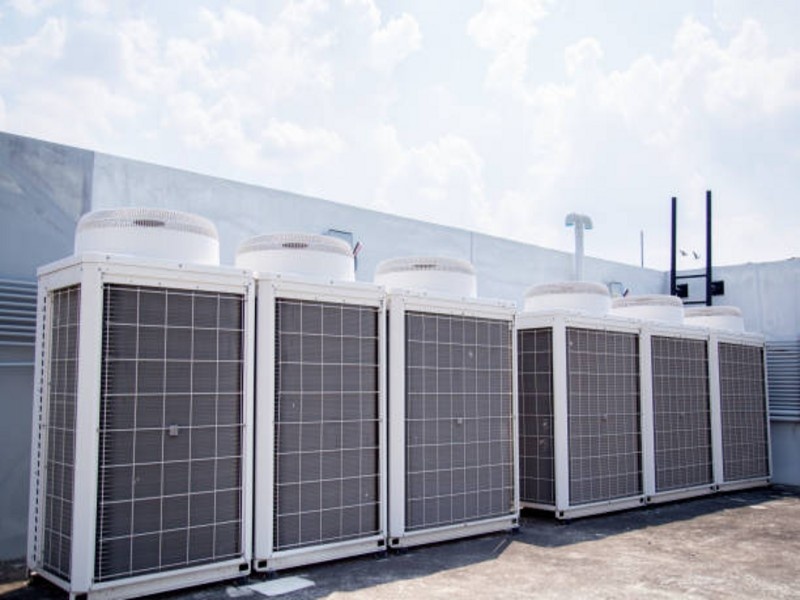
Industrial Condenser Solutions
What Are the Key Features to Consider When Choosing Industrial Condenser Solutions? There are important features to consider when choosing industrial condenser solutions. First, efficiency is of great importance. An efficient condenser reduces the energy consumption of the business and lowers operating costs. Therefore, a condenser that provides high efficiency should be preferred. However, the size and capacity of the condensers must also be taken into account. A size and capacity that suits the cooling needs of the business must be selected. Additionally, durability and longevity are also an important factor. It is important that condensers to be used in industrial environments are designed to withstand frequent and intense operating conditions. Products from a reliable brand should be preferred and should be expected to provide long-term performance.There are important features to consider when choosing industrial condenser solutions. First, efficiency is of great importance. An efficient condenser reduces the energy consumption of the business and lowers operating costs. Therefore, a condenser that provides high efficiency should be preferred. However, the size and capacity of the condensers must also be taken into account. A size and capacity that suits the cooling needs of the business must be selected. Additionally, durability and longevity are also an important factor. It is important that condensers to be used in industrial environments are designed to withstand frequent and intense operating conditions. Products from a reliable brand should be preferred and should be expected to provide long-term performance. How Do Industrial Condenser Solutions Optimize Cooling Efficiency in Manufacturing? Industrial condenser solutions play an important role in optimizing cooling efficiency in manufacturing processes. These solutions increase machine efficiency by keeping businesses' equipment and systems at appropriate temperature levels. In particular, it prevents the uncontrolled spread of high temperatures and reduces malfunctions that may occur due to overheating. Industrial condensers also help reduce energy costs for businesses by increasing energy efficiency. An efficient condenser system optimizes businesses' energy consumption and reduces environmental impact. In addition, regular maintenance and cleaning of industrial condensers increases cooling efficiency and ensures continuous and reliable operation of the business.Industrial condenser solutions play an important role in optimizing cooling efficiency in manufacturing processes. These solutions increase machine efficiency by keeping businesses' equipment and systems at appropriate temperature levels. In particular, it prevents the uncontrolled spread of high temperatures and reduces malfunctions that may occur due to overheating. Industrial condensers also help reduce energy costs for businesses by increasing energy efficiency. An efficient condenser system optimizes businesses' energy consumption and reduces environmental impact. In addition, regular maintenance and cleaning of industrial condensers increases cooling efficiency and ensures continuous and reliable operation of the business. Therefore, industrial condenser solutions are a critical component to maximize cooling efficiency in the manufacturing industry. What Industries Commonly Utilize Industrial Condenser Solutions for Their Processes? Industrial condenser solutions are widely used across many industries and are designed to meet a variety of process requirements. In particular, the chemical industry is highly dependent on industrial condenser solutions. In chemical production processes, keeping reaction temperatures under control is critical, and condensers are commonly used to cool reactors used in this industry. Additionally, the food processing industry frequently uses industrial condenser solutions. Food products must be kept at certain temperature conditions during the processing process, and therefore refrigeration equipment is needed in food production facilities. Industrial condensers are used in food processing processes to reduce temperature and maintain the quality of products.Industrial condenser solutions are widely used across many industries and are designed to meet a variety of process requirements. In particular, the power generation industry is significantly dependent on industrial condenser solutions. Power plants rely on condenser systems to cool turbines, and these systems play an important role in electricity production by increasing the efficiency of turbines. Additionally, the pharmaceutical industry also uses industrial condenser solutions. In drug production, reaction temperatures may need to be controlled and products may need to be cooled. Therefore, the use of condensers in pharmaceutical manufacturing facilities is common and critical to ensuring product quality and safety. What Types of Industrial Condenser Solutions Are Available for Different Applications? There are various industrial condenser solutions for different applications. First, air-cooled condensers are a common option. These types of condensers are systems where air is used directly for cooling and is passed around it via fans to lower the temperature of the vapor or liquid. Air-cooled condensers reduce water usage and are preferred in open areas or areas where water resources are limited. Another option, water-cooled condensers, are systems in which water is processed, absorbs heat and performs the cooling process. Water-cooled condensers provide high efficiency and are preferred in more intensive operations. Additionally, evaporative condensers are also used in different applications. These types of condensers are systems that remove heat through the evaporation of water and are generally used in large facilities or industrial cooling systems.There are various condenser solutions for different industrial applications. First, air-cooled condensers are a common option. These types of condensers are systems where air is used directly for cooling and is passed around it via fans to lower the temperature of the vapor or liquid. Air-cooled condensers reduce water usage and are preferred in open areas or areas where water resources are limited. Another option, water-cooled condensers, are systems in which water is processed, absorbs heat and performs the cooling process. Water-cooled condensers provide high efficiency and are preferred in more intensive operations. Additionally, evaporative condensers are also used in different industrial applications. These types of condensers are systems that remove heat through the evaporation of water and are generally used in large facilities or industrial cooling systems. How Do Industrial Condenser Solutions Ensure Optimal Heat Transfer and Performance? Industrial condenser solutions use a variety of design features and technologies to ensure optimal heat transfer and performance. Primarily, high quality materials and special designs are used for effective heat transfer. These materials have a structure that can transmit heat quickly and efficiently. In addition, properly designing the pipes and channels inside the condensers ensures homogeneous circulation of liquid or vapor, which provides more effective cooling. Additionally, the surface area of condensers is also important because a larger surface area provides greater heat transfer. For this reason, industrial condensers are often designed with arrangements such as cross-flow or tube stacking, which increases the surface area and provides more effective cooling.Industrial condenser solutions use a variety of design features and technologies to ensure optimal heat transfer and performance. Primarily, high quality materials and special designs are used for effective heat transfer. These materials have a structure that can transmit heat quickly and efficiently. In addition, properly designing the pipes and channels inside the condensers ensures homogeneous circulation of liquid or vapor, which provides more effective cooling. Additionally, the surface area of condensers is also important because a larger surface area provides greater heat transfer. For this reason, industrial condensers are often designed with arrangements such as cross-flow or tube stacking, which increases the surface area and provides more effective cooling. Thanks to these design features, industrial condenser solutions provide optimal heat transfer and performance, increase the efficiency of businesses and help them maintain their operations reliably. What Factors Should Businesses Consider When Selecting Industrial Condenser Solutions? There are many factors that businesses should consider when choosing industrial condenser solutions. First, it is important for businesses to understand their current cooling needs and applications. Each industry may have different cooling requirements, so businesses need to evaluate factors such as process temperature requirements, cooling capacity and continuous operating conditions. Secondly, it is important for businesses to consider their budget and resources. Industrial condenser solutions can have high investment costs, so it is important for businesses to choose a suitable solution by taking their long-term budget and financial planning into consideration. Additionally, energy efficiency should also be considered because energy costs can form a significant part of operating expenses. Finally, it is important for businesses to choose a solution that suits their existing facilities and infrastructure. The installation and integration of industrial condenser solutions must match the structure and requirements of existing facilities, so it is important to select the appropriate equipment. Considering these factors helps businesses choose the most suitable industrial condenser solution and optimize their operations.There are many factors that businesses should consider when choosing industrial condenser solutions. First, it is important for businesses to understand their current cooling needs and applications. Each industry may have different cooling requirements, so businesses need to evaluate factors such as process temperature requirements, cooling capacity and continuous operating conditions. Secondly, it is important for businesses to consider their budget and resources. Industrial condenser solutions can have high investment costs, so it is important for businesses to choose a suitable solution by taking their long-term budget and financial planning into consideration. Additionally, energy efficiency should also be considered because energy costs can form a significant part of operating expenses. Finally, it is important for businesses to choose a solution that suits their existing facilities and infrastructure. The installation and integration of industrial condenser solutions must match the structure and requirements of existing facilities, so it is important to select the appropriate equipment. Considering these factors helps businesses choose the most suitable industrial condenser solution and optimize their operations.
Read More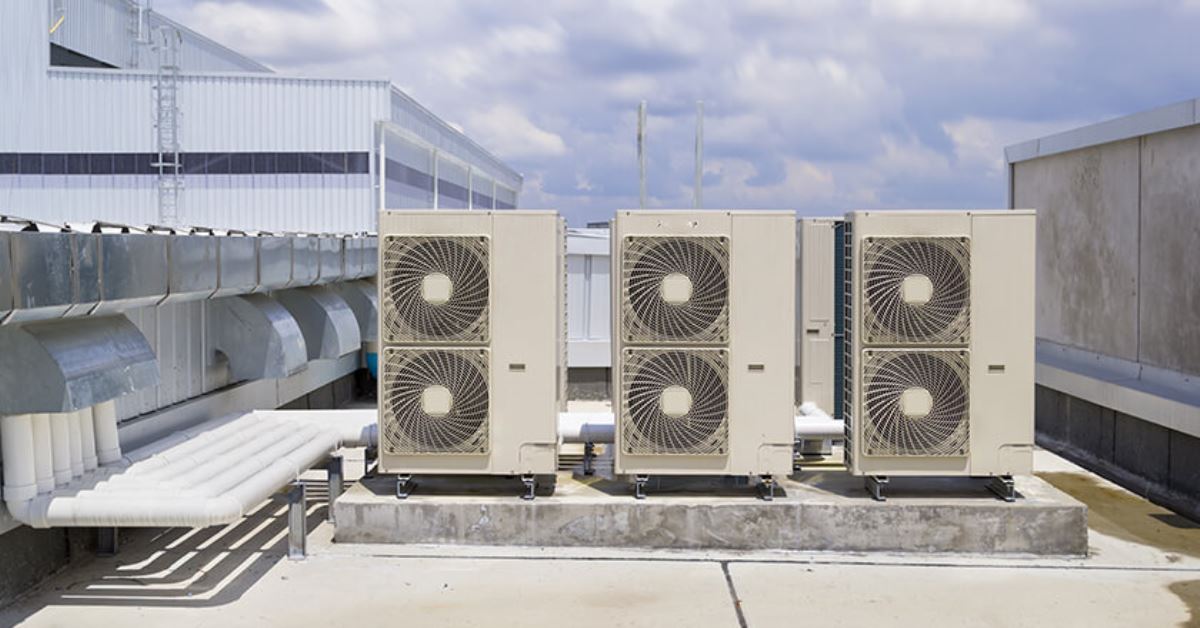
Condenser Suppliers
What Are the Key Factors to Consider When Choosing Condenser Suppliers? When selecting condenser suppliers, reliability, reputation, and technical expertise are paramount. Choose suppliers with a proven track record of delivering high-quality condensers on time and offering expert guidance in product selection and technical support. Additionally, consider factors such as pricing, product range, customization options, and commitment to sustainability. Opt for suppliers that offer competitive pricing without compromising on quality, provide a diverse range of condenser products, offer customization services, and prioritize eco-friendly manufacturing practices. By carefully evaluating these key factors, businesses can make informed decisions and establish partnerships that meet their condenser needs efficiently and sustainably. How Do Condenser Suppliers Ensure Product Quality and Reliability? Condenser suppliers prioritize product quality and reliability through stringent quality control measures and advanced testing protocols. Firstly, they source high-grade materials from trusted suppliers to ensure the durability and performance of their condensers. This includes using corrosion-resistant metals and durable components to withstand varying operating conditions. Additionally, suppliers employ state-of-the-art manufacturing processes, such as precision machining and automated assembly, to maintain consistency and accuracy in production. Quality assurance doesn't stop at the manufacturing stage; it extends to rigorous testing procedures. Condenser suppliers conduct comprehensive performance tests, including pressure testing, thermal cycling, and vibration analysis, to validate the reliability and efficiency of their products. These tests simulate real-world operating conditions and help identify any potential issues before the condensers reach the market. Furthermore, suppliers often adhere to industry standards and certifications, such as ISO 9001, to demonstrate their commitment to quality management systems. By prioritizing quality and reliability throughout the supply chain, condenser suppliers establish trust with customers and uphold their reputation as industry leaders. What Industries Commonly Rely on Condenser Suppliers for Their Operations? Condenser suppliers cater to a diverse range of industries that heavily rely on their products for efficient operations. One prominent sector is the HVAC (Heating, Ventilation, and Air Conditioning) industry, where condensers play a vital role in cooling systems for residential, commercial, and industrial buildings. These condensers help regulate indoor temperatures by transferring heat from the air conditioning systems to the outside environment, ensuring comfortable and controlled climates year-round. Additionally, the automotive industry heavily depends on condenser suppliers for vehicle cooling systems. Automotive condensers are integral components of air conditioning systems in cars, trucks, and other vehicles, helping to dissipate heat generated by the engine and maintain optimal operating temperatures. As the automotive market continues to grow, the demand for high-quality condensers from reliable suppliers remains constant. Another significant industry that relies on condenser suppliers is the power generation sector. Power plants, both conventional and renewable, utilize condensers as essential components in steam turbine systems. Condensers help convert steam back into water by transferring heat away from the turbine, allowing for the continuous and efficient operation of power generation facilities. Furthermore, condenser suppliers serve the refrigeration industry, providing condensers for commercial refrigeration units, cold storage facilities, and refrigerated transportation systems. These condensers assist in maintaining low temperatures necessary for preserving perishable goods and ensuring food safety. Overall, condenser suppliers are indispensable partners for various industries, contributing to the smooth functioning of essential systems and processes across the globe. What Types of Condensers Do Leading Suppliers Offer in the Market? Leading condenser suppliers offer a diverse range of condenser types to meet the specific needs of various industries and applications. One common type is the air-cooled condenser, which is widely used in HVAC systems and industrial cooling applications. These condensers utilize ambient air to dissipate heat, eliminating the need for water as a cooling medium and making them suitable for locations where water availability or quality is limited. Another popular option is the water-cooled condenser, commonly found in power plants and refrigeration systems. Water-cooled condensers use water as a cooling medium to remove heat from the system, offering higher efficiency and performance compared to air-cooled counterparts. Additionally, leading suppliers often offer specialized condenser designs tailored to specific industries or requirements. For example, in the automotive sector, suppliers provide automotive condensers designed to withstand the demanding conditions of vehicle cooling systems, ensuring reliable performance and durability. In the refrigeration industry, suppliers offer evaporative condensers that use water evaporation to enhance heat transfer efficiency, ideal for large-scale refrigeration applications. Moreover, some suppliers offer innovative hybrid condenser designs that combine features of both air-cooled and water-cooled systems, providing flexibility and efficiency advantages in certain applications. Overall, leading condenser suppliers strive to offer a comprehensive range of high-quality condenser options, catering to the diverse needs of their customers across various industries. How Do Condenser Suppliers Accommodate Custom Specifications and Requirements? Condenser suppliers excel in accommodating custom specifications and requirements by offering tailored solutions and flexible manufacturing processes. These suppliers understand that each customer may have unique needs, whether it's specific dimensions, materials, or performance criteria for their condenser systems. To meet these demands, suppliers often have in-house engineering teams capable of designing custom condensers according to client specifications. This involves collaborating closely with customers to understand their exact requirements and then developing detailed designs that meet or exceed expectations. Moreover, condenser suppliers leverage advanced manufacturing technologies and techniques to produce custom solutions efficiently and cost-effectively. Computer-aided design (CAD) and computer numerical control (CNC) machining enable precise fabrication of complex components, ensuring accuracy and consistency in custom condenser production. Additionally, suppliers maintain a wide range of materials and components in stock, allowing for quick turnaround times and flexibility in meeting varying customer demands. Whether it's modifying existing designs or creating entirely new solutions, condenser suppliers prioritize customer satisfaction by accommodating custom specifications with expertise and innovation. What Are the Benefits of Partnering With Reputable Condenser Suppliers? Partnering with reputable condenser suppliers offers numerous benefits for businesses across various industries. Firstly, reputable suppliers prioritize quality and reliability, ensuring that their condenser products meet or exceed industry standards. This translates to enhanced performance, durability, and longevity of condenser systems, reducing the risk of unexpected downtime and costly repairs. Additionally, reputable suppliers often have extensive experience and expertise in condenser technology, providing valuable guidance and support throughout the procurement process. From initial consultation to after-sales service, businesses can rely on their supplier's knowledge and assistance to optimize their condenser solutions for maximum efficiency and effectiveness. Furthermore, partnering with reputable condenser suppliers fosters trust and confidence in the supply chain. Businesses can rest assured that they are receiving genuine, high-quality products backed by reputable warranties and customer service commitments. This reliability is particularly crucial for industries where uninterrupted operation is critical, such as power generation, HVAC, and refrigeration. Moreover, reputable suppliers often offer a wide range of condenser options, including custom solutions tailored to specific requirements. This versatility allows businesses to find the perfect condenser solution to suit their unique needs, whether it's for a large-scale industrial project or a specialized application. Overall, partnering with reputable condenser suppliers empowers businesses to optimize their operations, minimize risks, and achieve long-term success in their respective industries.
Read More
Fill out the form to discover the most suitable high-end products for your projects. Contact Us Now.
Strong Connections Through Fair Participation
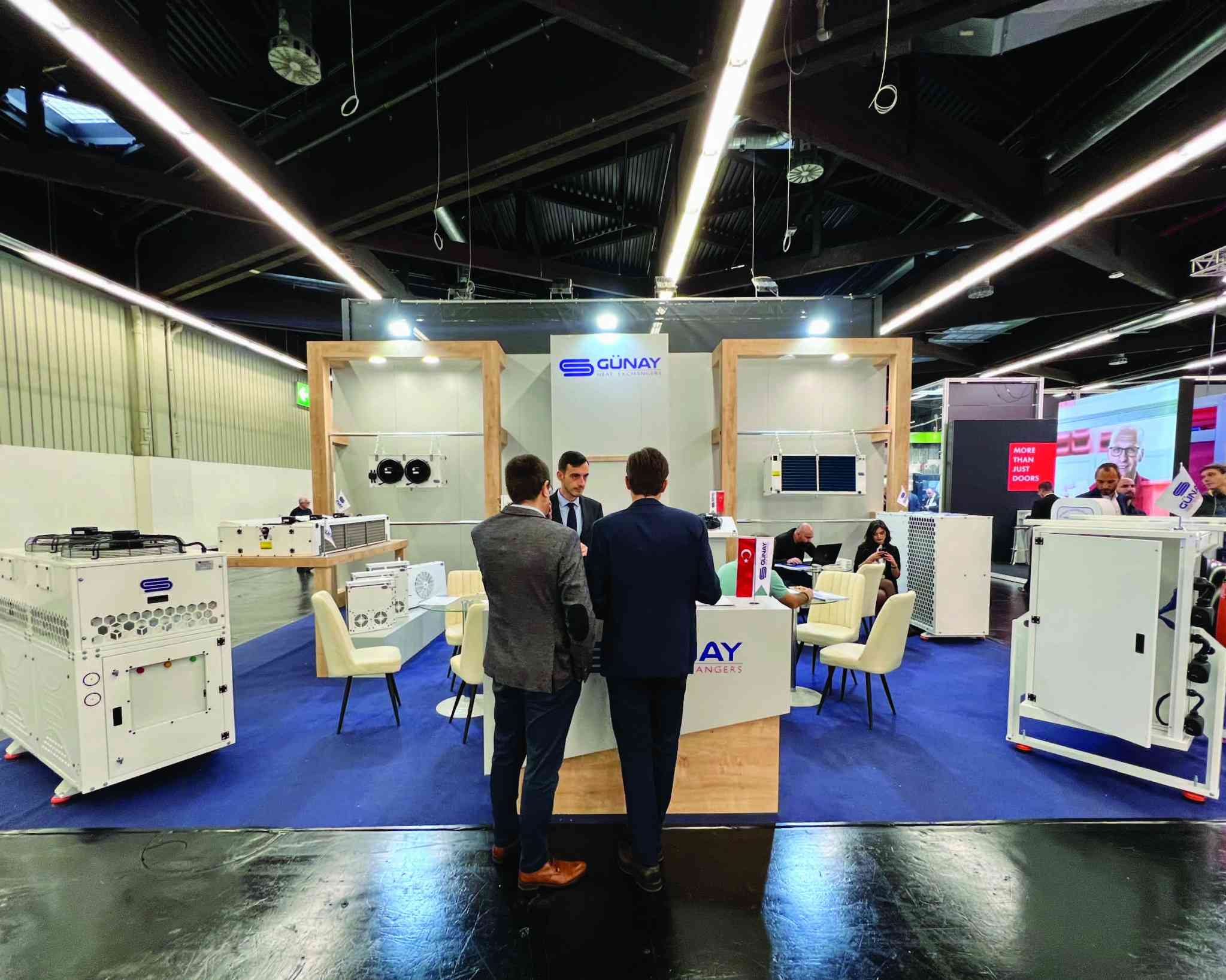
Chillventa 2022
Thank You to Everyone Who Joined Us at Chillventa 2022! We would like to extend our heartfelt thanks to all participants and valued customers who visited our stand at Chillventa 2022. Your interest and the time you shared with us were a tremendous source of motivation, allowing us to present our innovative cooling solutions and share our vision within the industry. The connections we have built with you strengthen our leadership goals and inspire us to provide more efficient and sustainable solutions in the future. We look forward to building new projects and strong partnerships together!
Read More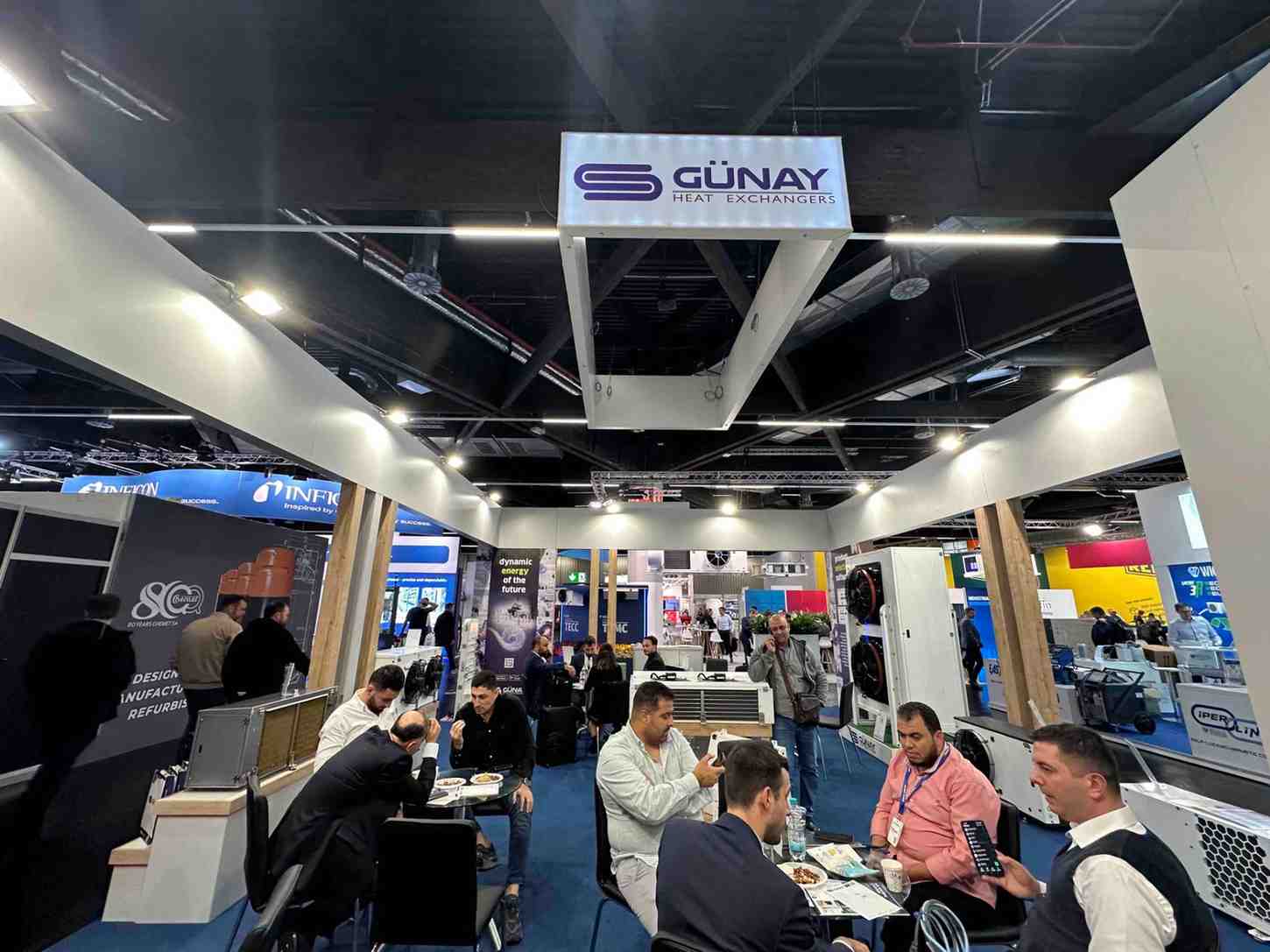
Chillventa 2024
Günay Soğutma participated in the Chillventa 2024 Fair, seizing the opportunity to showcase the latest innovations in the sector. During the event, we shared our newest technologies and solutions in the field of cooling and air conditioning with attendees. The fair served as an important platform to connect with industry professionals and foster new collaborations. Visitors had the chance to explore our innovative products and sustainable solutions while gaining insight into our customer-oriented approach. Chillventa 2024 provided not only an opportunity for knowledge exchange but also a chance to keep up with the latest industry trends. We are pleased to have established new business connections and strengthened existing relationships through this experience. We would like to extend our gratitude to all the visitors who joined us at the fair. We eagerly look forward to meeting you again at future events!
Read More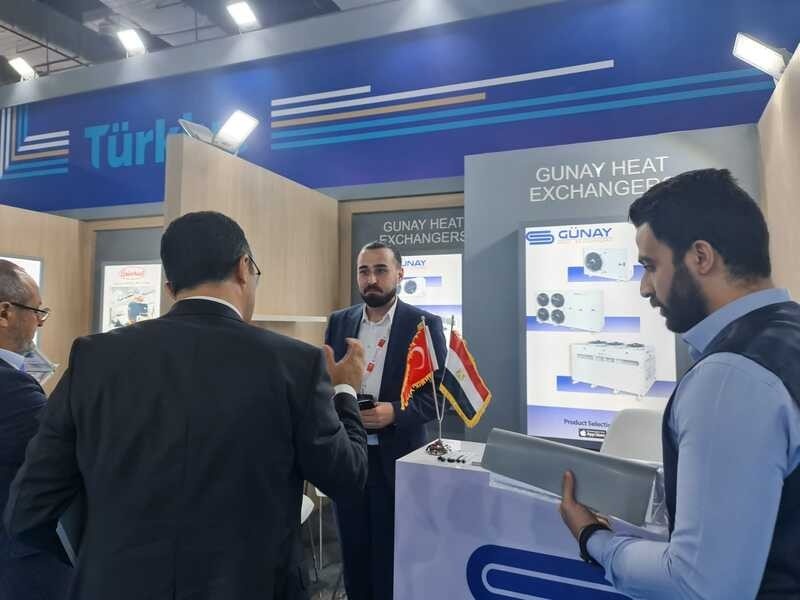
HVAC-R Egypt Expo 2024
With the solutions we presented at HVAC-R EGYPT EXPO, we reinforced our reliability and sustainability principles in the refrigeration and heat transfer sector in Egypt.
Read More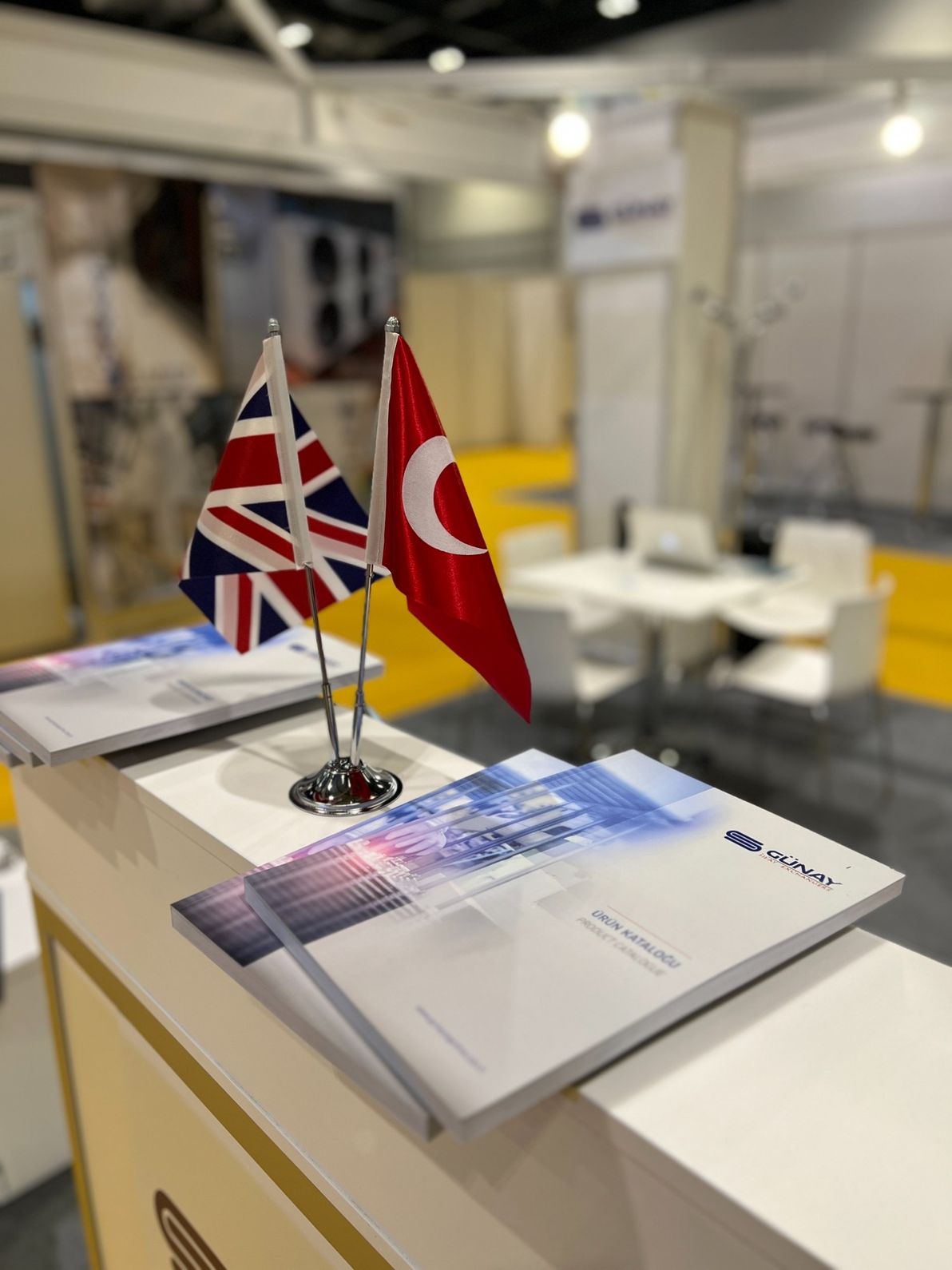
HVAC-R London 2023
HVAC Refrigeration Live, as an important event in the industry, offered a very valuable experience for us. We would like to express our sincere thanks to all exhibitors and customers who visited our booth for their interest and time. The strong ties we have established with you give us great motivation to maintain our leadership in the industry and to carry our solution-oriented approach even further.
Read More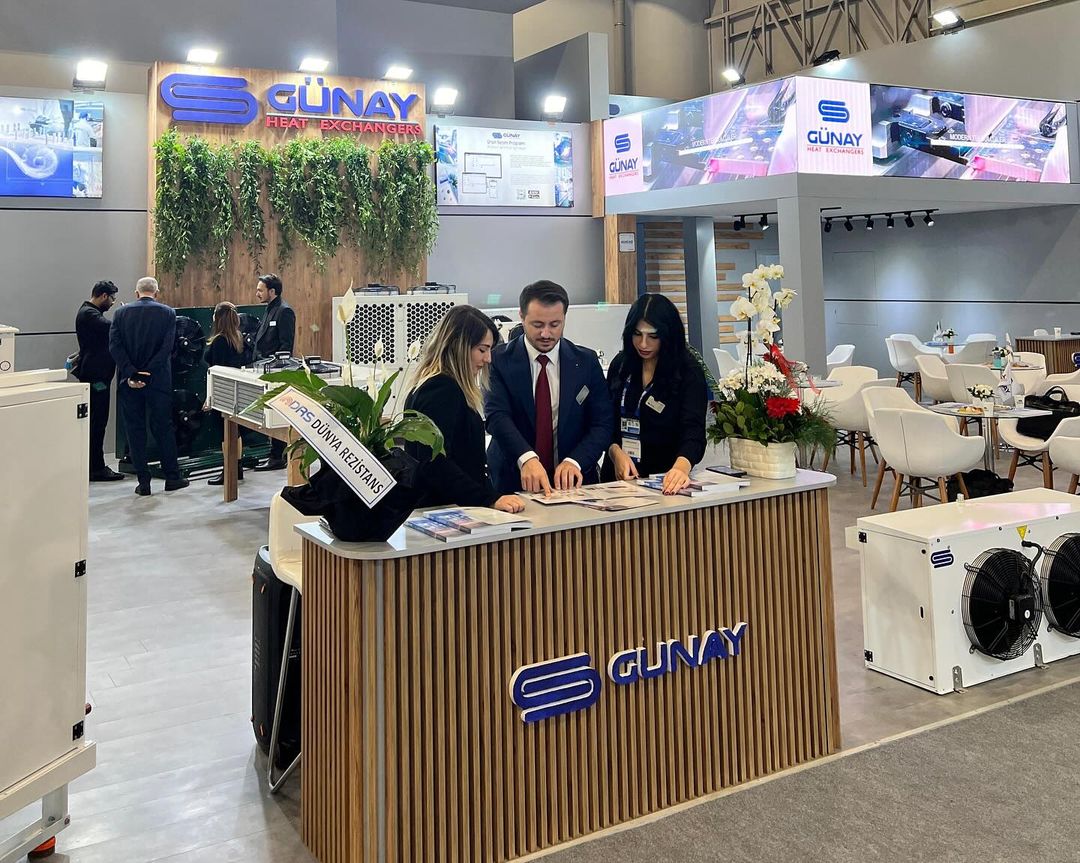
ISK-SODEX Istanbul 2023
We participated in ISK-SODEX 2023, one of the leading exhibitions of the air conditioning industry. We would like to thank all our customers and exhibitors who showed great interest in our stand.
Read More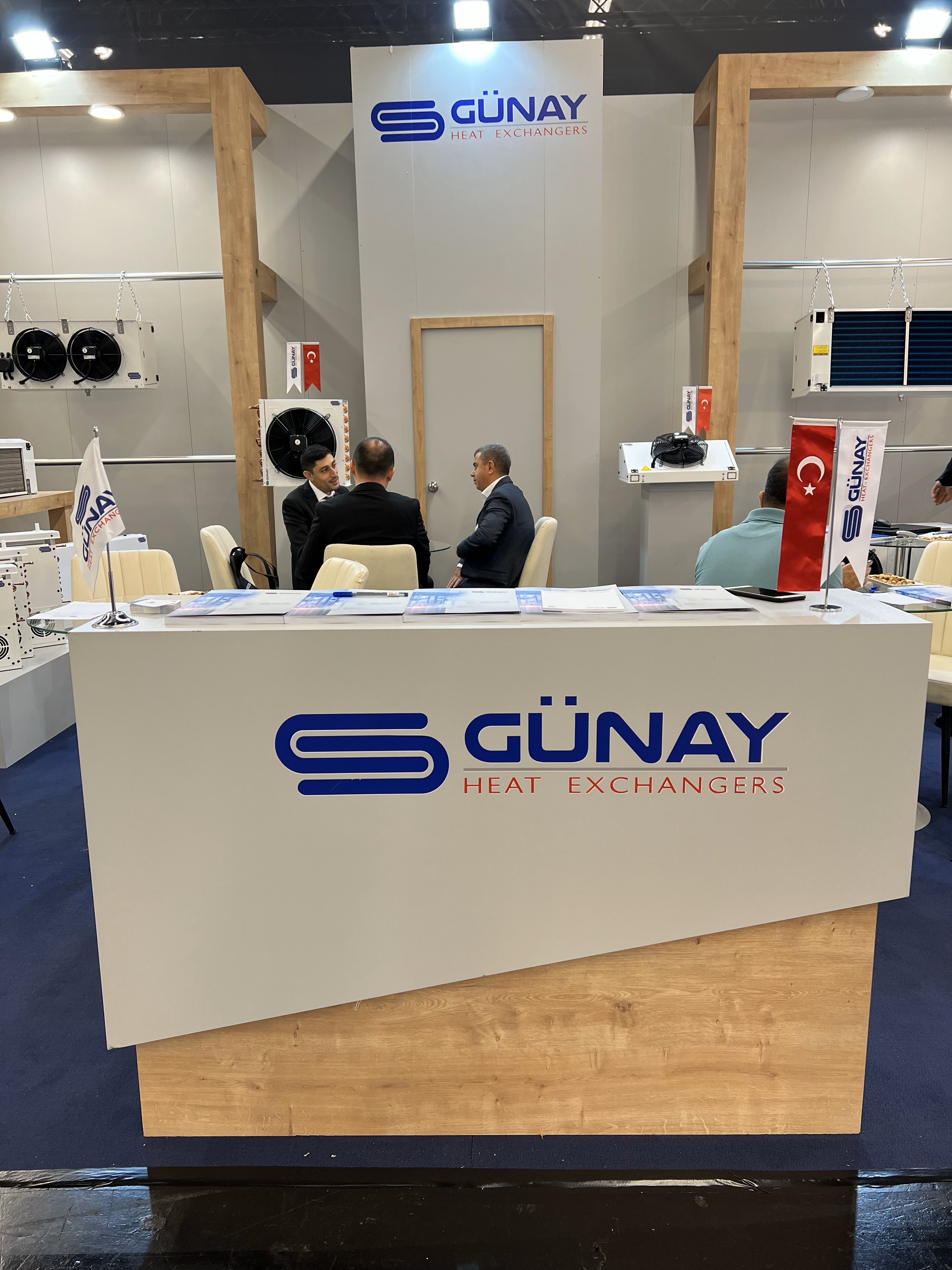
AquaTherm Exhibition 2023
Thank you to all our customers and exhibitors who visited our booth at AquaTherm Exhibition 2023. Your intense interest made us very happy and we were proud to share our innovations in the sector.
Read More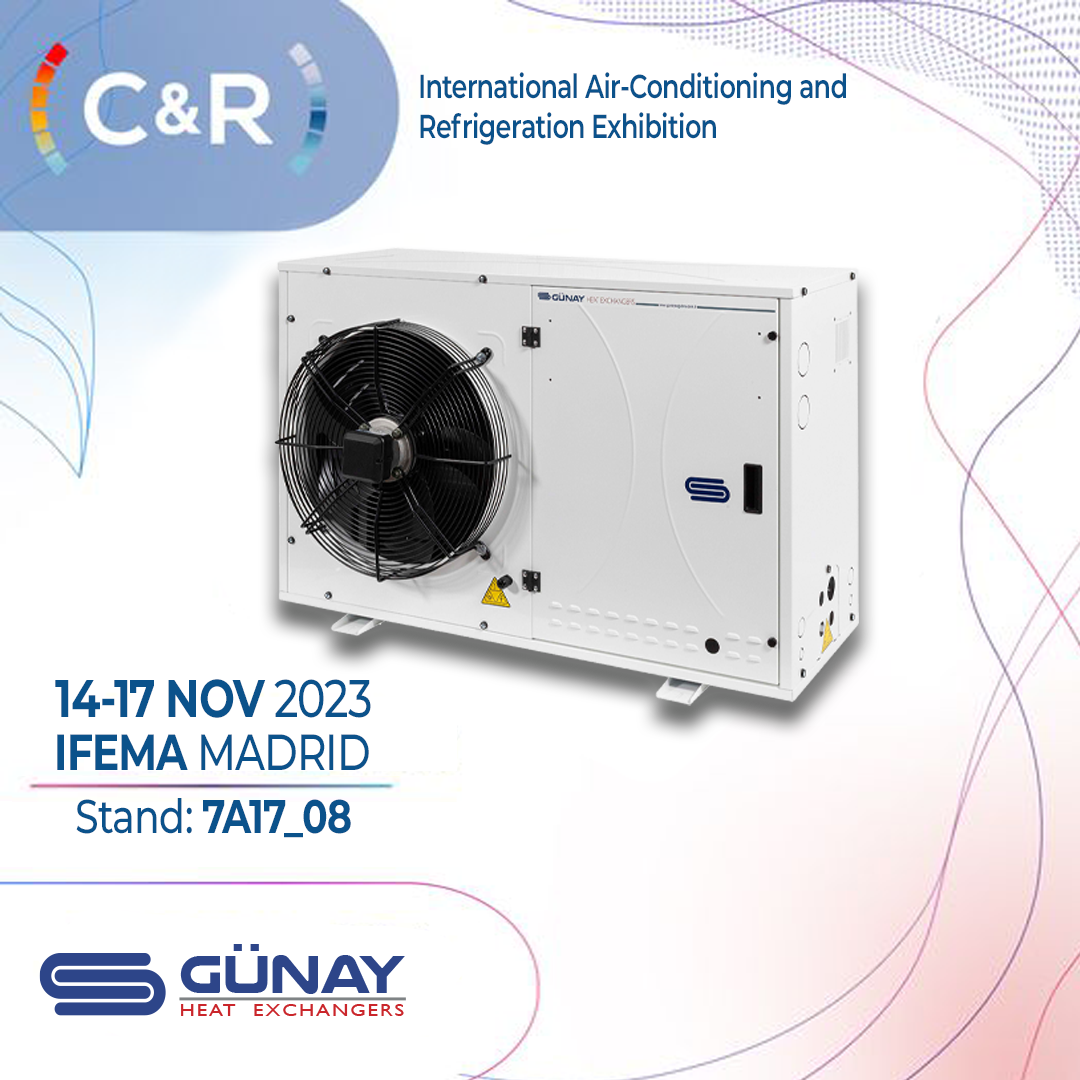
C&R Madrid 2023
The C&R Madrid 2023 fair was an unforgettable experience for us as an important event in the industry. We extend our heartfelt thanks to all participants and customers who visited our stand for their interest and time. The connections we established with you inspire us to continue our leadership in the industry and strengthen our solution-oriented approach. We look forward to building a more efficient and sustainable future togethe
Read More
dynamic energy of the future

